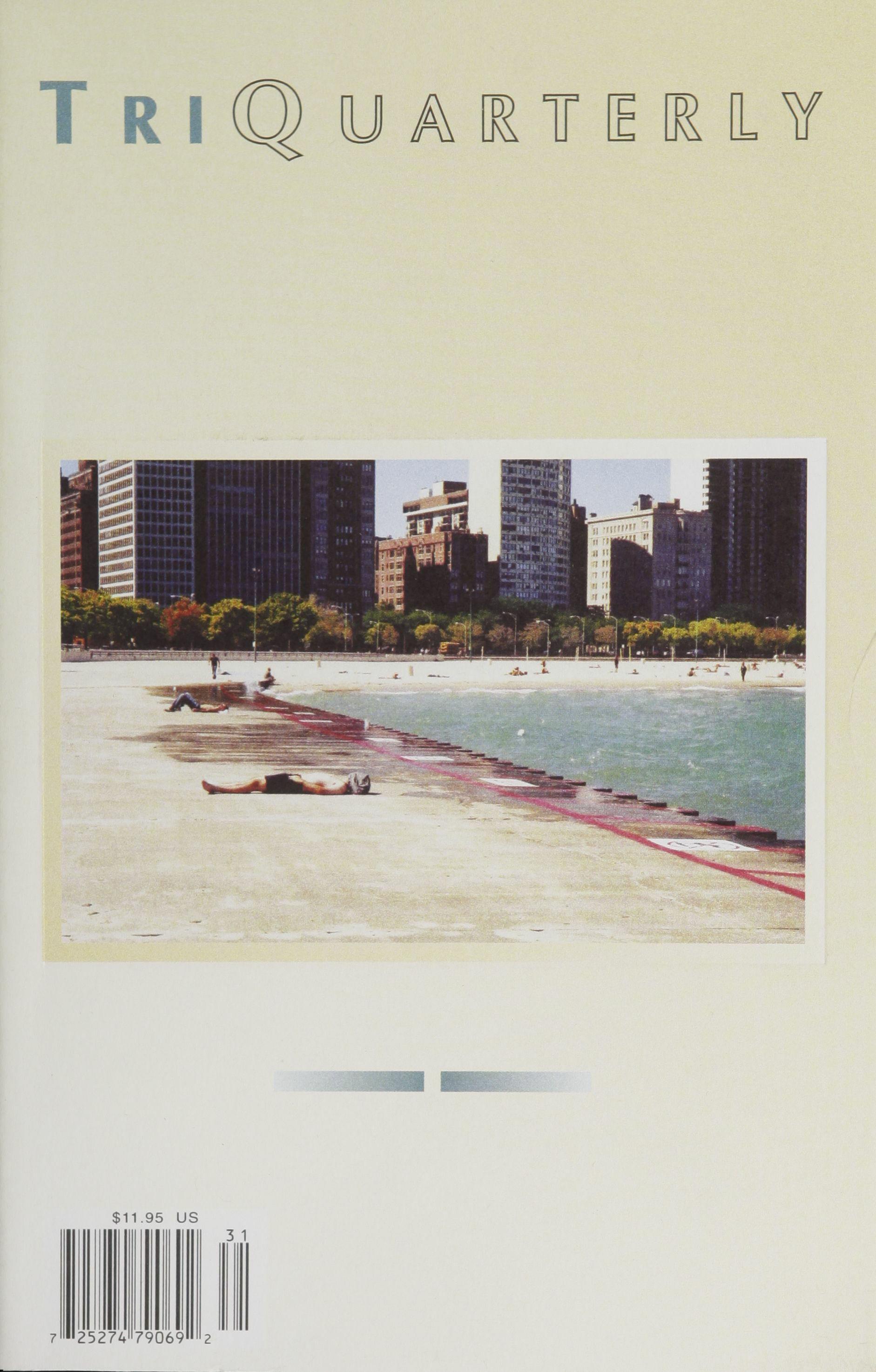
$11.95 US 3 1 7 25274 79069 2

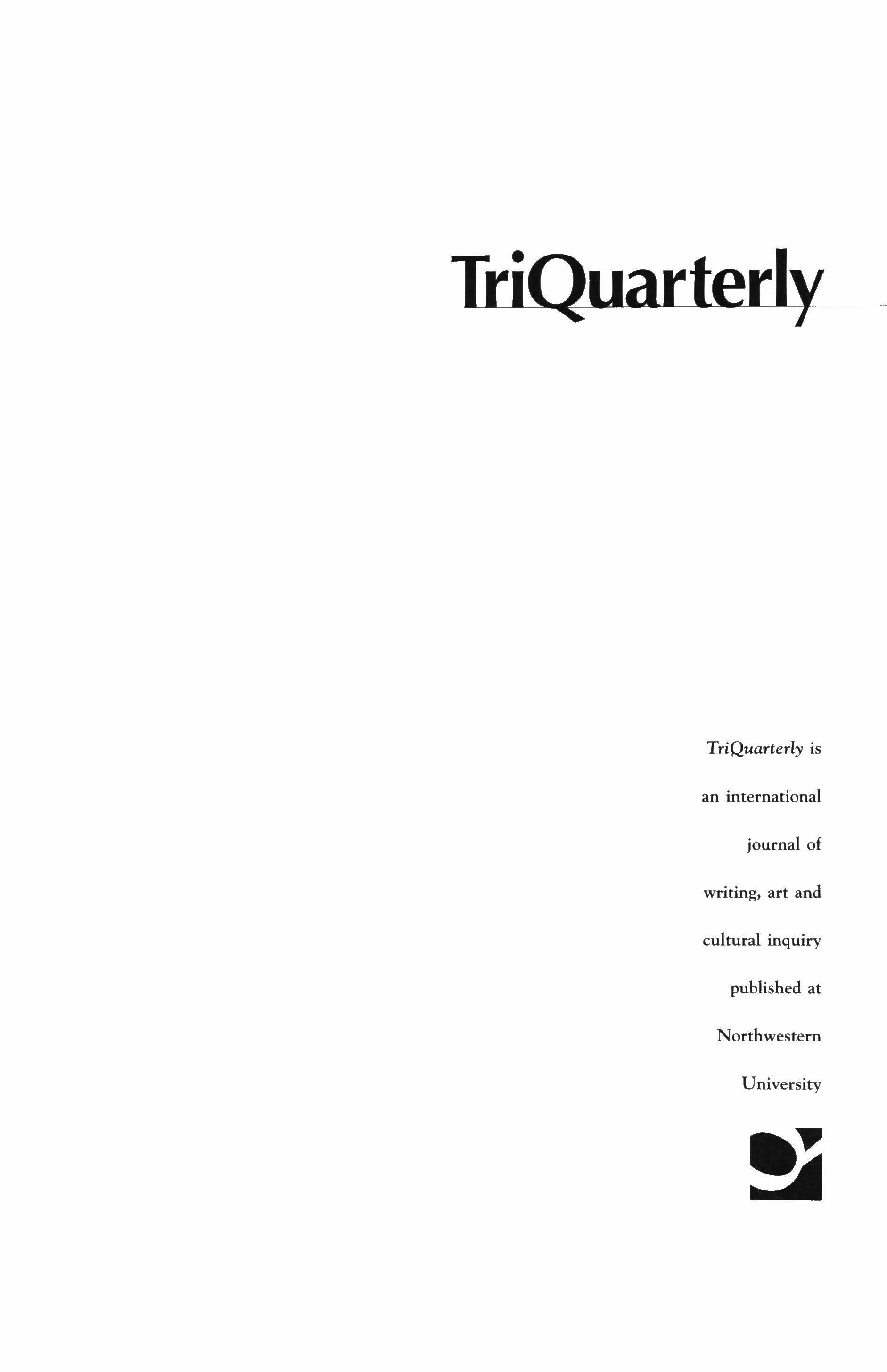
is an international journal of writing, art and cultural inquiry published at Northwestern University
TriQuarterly TriQuarterly

TriQuarterly
Editor
Susan Firestone Hahn
Associate Editor
Ian Morris
Operations Coordinator Kirstie Felland
Production Manager
Mike Brooks
Production Editor
Vincent Chung
Cover Design
Gini Kondziolka
Editorial Assistant
Adam Travis
TriQuarterly Fellow W. Huntting Howell
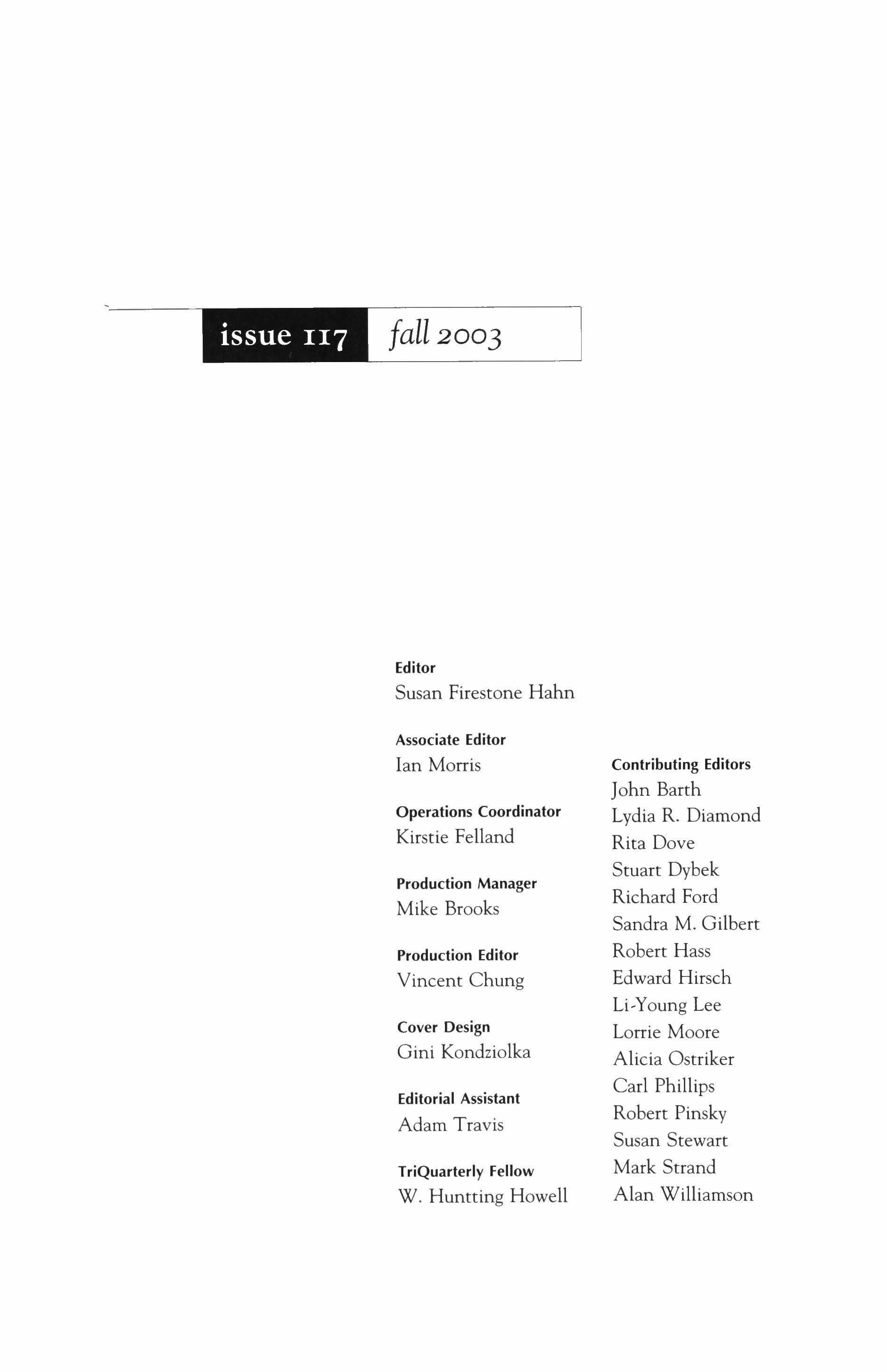
Contributing Editors
John Barth
Lydia R. Diamond
Rita Dove
Stuart Dybek
Richard Ford
Sandra M. Gilbert
Robert Hass
Edward Hirsch
Li-Young Lee
Lorrie Moore
Alicia Ostriker
Carl Phillips
Robert Pinsky
Susan Stewart
Mark Strand
Alan Williamson
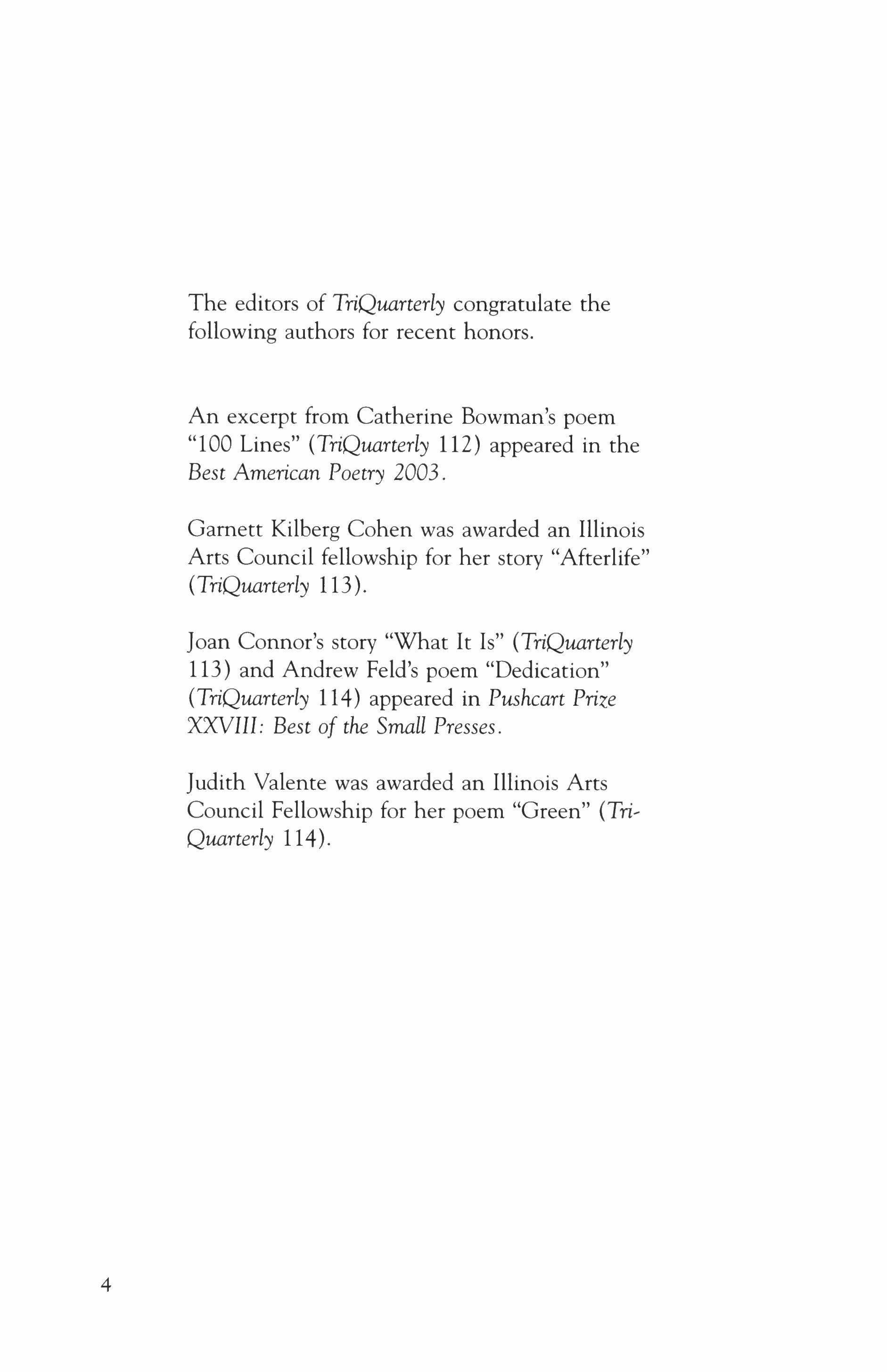
The editors of TriQuarterly congratulate the following authors for recent honors.
An excerpt from Catherine Bowman's poem "100 Lines" (TriQuarterly 112) appeared in the Best American Poetry 2003.
Garnett Kilberg Cohen was awarded an Illinois Arts Council fellowship for her story "Afterlife" (TriQuarterly 113).
Joan Connor's story "What It Is" (TriQuarterly 113) and Andrew Feld's poem "Dedication" (TriQuarterly 114) appeared in Pushcart Prize XXVIII: Best of the Small Presses.
Judith Valente was awarded an Illinois Arts Council Fellowship for her poem "Green" (Tri, Quarterly 114).
4
poems
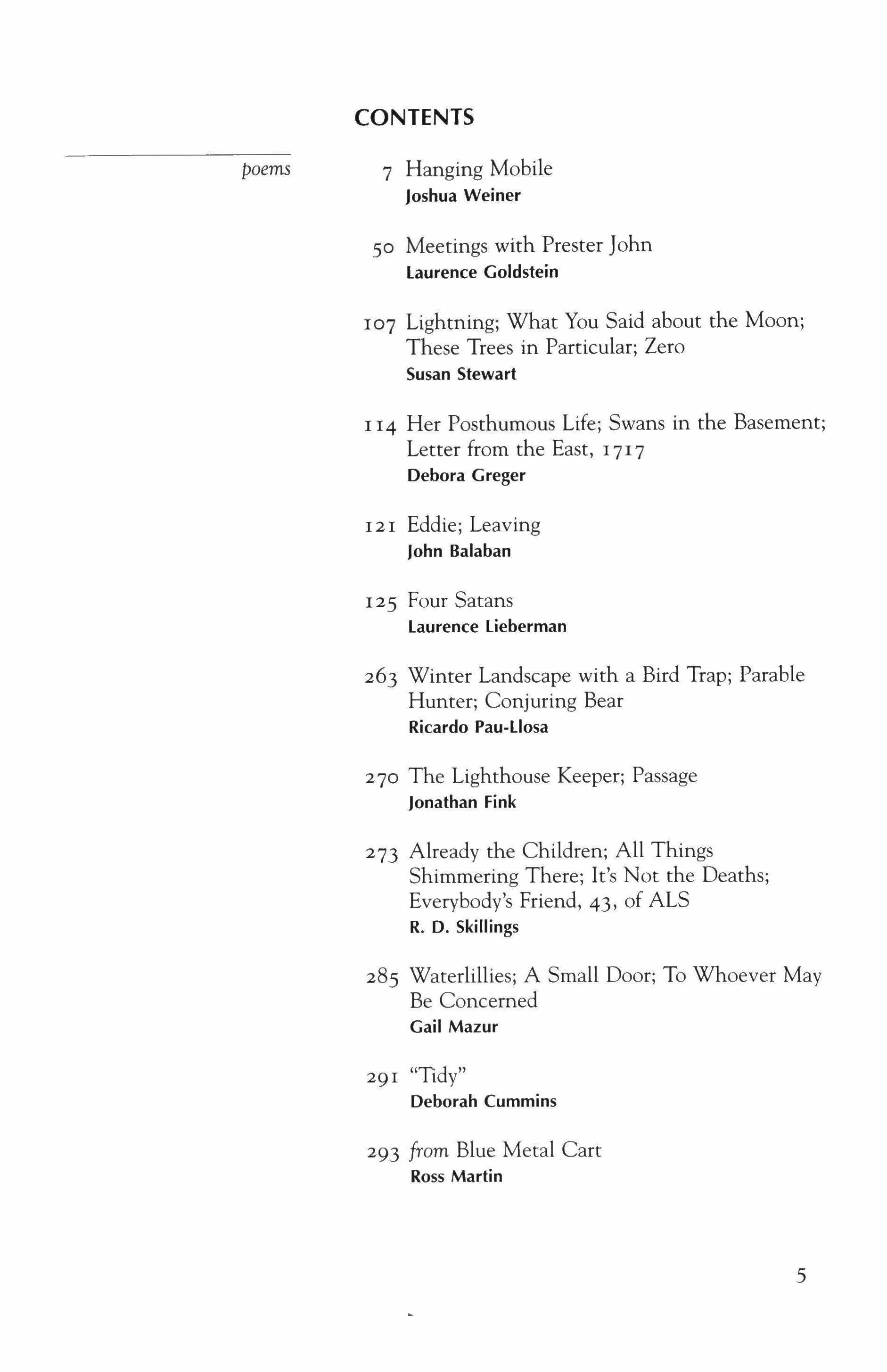
7 Hanging Mobile
Joshua Weiner
50 Meetings with Prester John
Laurence Goldstein
107 Lightning; What You Said about the Moon; These Trees in Particular; Zero
Susan Stewart
I 14 Her Posthumous Life; Swans in the Basement; Letter from the East, 17 I 7
Debora Greger
121 Eddie; Leaving
John Balaban
125 Four Satans
Laurence Lieberman
263 Winter Landscape with a Bird Trap; Parable Hunter; Conjuring Bear
Ricardo Pau-L1osa
270 The Lighthouse Keeper; Passage
Jonathan Fink
273 Already the Children; All Things Shimmering There; It's Not the Deaths; Everybody's Friend, 43, of ALS
R. D. Skillings
285 Waterlillies; A Small Door; To Whoever May Be Concerned
Gail Mazur
291 "Tidy"
Deborah Cummins
293 from Blue Metal Cart
Ross Martin
CONTENTS
5
295 Allegro; Oracle of the Great Oak; The Double David Yezzi fiction 9 Que Quieres
Stuart Dybek
I29 Miss Ellen Jameson Is Not Deceased
Stephen Schottenfeld
I59 The Lake
Jason Brown
I73 Beautiful
Cristina Henriquez I 8 I Dream Boy
David Michael Kaplan
2 I 8 Statuesque
Meredith Steinbach essay 77 Beckett and Kafka
Gary Adelman drama 3 I The Inside
Lydia R. Diamond interview 6I A Conversation with Edward Hirsch
Donna Seaman
300 Contributors
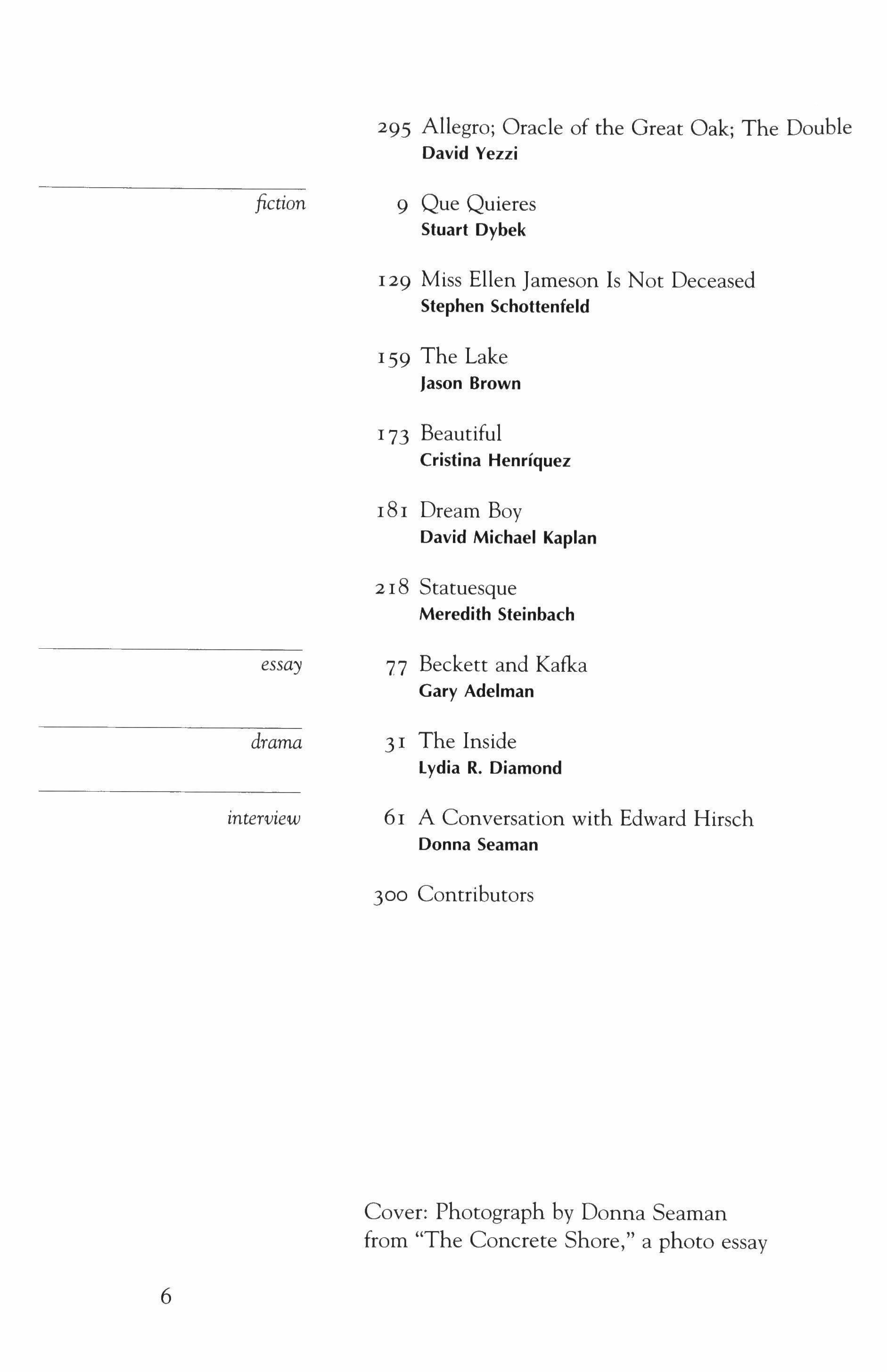
Cover: Photograph by Donna Seaman from "The Concrete Shore," a photo essay
6
]oshua Weiner
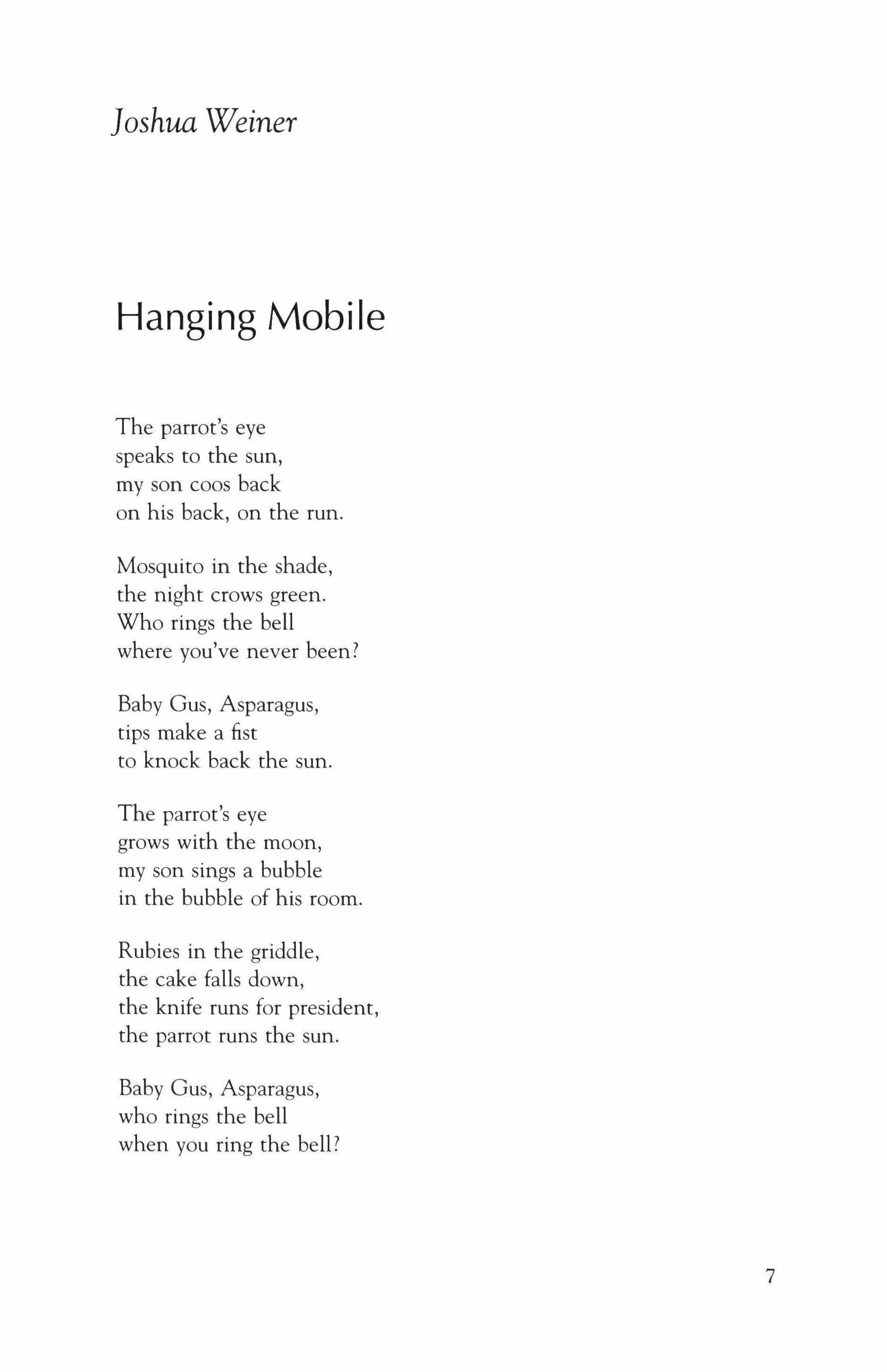
Hanging Mobile
The parrot's eye speaks to the sun, my son coos back on his back, on the run.
Mosquito in the shade, the night crows green. Who rings the bell where you've never been?
Baby Gus, Asparagus, tips make a fist to knock back the sun.
The parrot's eye grows with the moon, my son sings a bubble in the bubble of his room.
Rubies in the griddle, the cake falls down, the knife runs for president, the parrot runs the sun.
Baby Gus, Asparagus, who rings the bell when you ring the bell?
7

Smoke across the bridge plunders the eyes, the wind speaks back what you recognize.
Jimmies rain down the frozen zone, the drops drop green, who dropped the sun?
8
Stuart Dybek

Que Quieres
My brother, Mick, crossing the country on a Greyhound Ameripass, has stopped in Chicago, and stands before the old apartment building on Washtenaw where we grew up. Out in front, lounging on the cracked, concrete steps as we used to, five chicos-teenagers wearing gang colors-stare in his direction. Maybe they're Satan Disciples, maybe Two-Twos, maybe La Raza; the gangs in this neighborhood come and go, leaving the RIP of graffiti behind.
"Que tu quieres?"-What do you want?-one of the Disciples asks him.
Mick is on his roundabout way to Memphis where our father, who has never missed a day of work to illness, is scheduled to have exploratory surgery. That's what they're calling it, but the doctor took me aside to say, "Be prepared, because, frankly, we're not sure what we're going to find when we open him up."
Mick says he wants to be there when Sir wakes from the anesthetic, to be by his side in case the doctor's diagnosis sounds more like being sentenced.
But Mick also wants to take advantage of the Ameripass that he purchased with what should have been the rent money for his bathdown-the-hall flop in a rooming house for men only. It's across from a block of porno places in Hell's Kitchen, and it's where he's been living since a fire totaled his apartment on Delancey Street.
9

"Who needs a fucking ripoffdump? I can live on buses," he told me.
Mick has decided that "as long as he's traveling back in time to see our father," he might as well "visit other shrines of memory"-his phrases, irony intended.
On this trip, he's already stopped in D.C. where he once camped in a tent city of civil rights activists and was twice arrested protesting Vietnam. From D.C. he rode the bus to Pittsburgh, where he was hop, ing to find Joy, a Cambodian woman to whom he was married for a month-in fact, she's still legally his wife; they never bothered with a divorce. That was years ago, in New Orleans, when, as a favor to a friend, Mick married Joy to get her past Immigration. Mick was living with another woman at the time and, after a month, Joy moved on as planned to stay with relatives in Houston. After she'd gone, Mick realized she haunted him, that though he'd never touched her, he'd fallen in love with her. He's been looking for Joy off and on ever since, and whenever he does, I know something isn't right in his life. Over the years he'd heard that she was in San Diego, in Portland, in Den, ver, but this time he had an address for her on Kish Way in Pittsburgh. He couldn't make out any of the names scribbled under the mailboxes when he found the apartment building, but the hallways smelled like Asia. He began knocking at doors. Behind some of them, people shouted back, but the doors didn't open; other doors remained silent. Finally, he jotted a note saying he loved her on the back of one of the Chinese take,out menus piled in a corner, and slipped it beneath a silent door, the one that a flash of intuition told him was hers, then got back on the Greyhound.
Mick's plan is to visit our father in Memphis, then to continue on to New Orleans, a city where he lived for seven years before moving to New York-years of working on barges that traveled the Gulf coast, of tending bar, waiting tables, becoming an actor. And New Orleans is another place where he's seen the inside of a prison.
But now, Mick is back in Chicago, the city where he was born. He was fourteen, at the end of his freshman year in high school, when our father got transferred to Memphis. For me that was an opportunity to move out and stay behind on my own; Mick had no choice but to transfer to Memphis, too. In Memphis, they lived in a ranch house, not an apartment building, and Mick slept alone in a bedroom fur, nished with our twin beds from the flat on Washtenaw. He piled the bed that had been mine with the books in which he'd lose himselfDostoyevski, Proust, Kafka, [ung. At school, he was getting into fights
10

and failing most of his classes. I remember Moms, whom we'd rechristened Mammy after the move south, telling me how sometimes she'd check on Mick at night and find him poring over a Chicago street map spread open on his desk.
He's bought our father a present, a souvenir of Chicago-a kiel� basa. That was the first thing Mick did after finding his way from the Greyhound station back to our old neighborhood: buy two long links of smoked Polish sausage from Slotkowski's, which, Mick unerringly recalls, was our father's favorite butcher shop. Mick prides himself on having a photographic memory. He claims he can remember actually being born. Mick has become a devotee of Santeria, and his santero in the Bronx has encouraged him to recall his childhood through dreams. Each night Mick sets a half-full water glass beside his bed-it's a charm that promotes significant dreams. He is seeking a moment in childhood that will explain the shape his life has taken. He dreams of our old cold water flat on Eighteenth Street where his crib stood in the dining room; he remembers me staring in at him through the wooden bars, whispering, "shut up, crybaby"; he remembers our father lifting him from the crib, rocking Mick in his arms over to the open fourth story window, and holding him out beyond the ledge, still rocking him, perhaps considering whether to throw him out, or maybe just soothing his diaper rash in the night breeze. There's something about our father Mick is trying to summon up. Maybe it resides in the recurring dreams in which Sir stands above the crib when the household is asleep, striking sulphurous, blue-tipped stick matches and holding the flame close to Mick's face, while Mick, awake in the dark, stares up in silence. In the dream, he knows he must remain silent. His life depends on it.
"That never happened. Dad wouldn't stand there wasting matches," I said when Mick implied that at some point Sir wanted to kill him.
"How would you know?"
"Hey, he's only my father too."
"Yeah, and don't you think it's a little weird that you, the first born, get Anglicized to Perry like you're some fucking admiral, and I get named after our crazy OP grandfather who they left to rot in the state madhouse."
Even before his conversion to Santeria, Mick and I often disagreed as to which of us more accurately recalled the past. He'd tell me about Sir dangling him in outer space above Eighteenth Street, and I'd remember there was a fire escape under the window. I'd recall a family vacation at Eagle Lake, a weedy, little Michigan lake with a mud
II
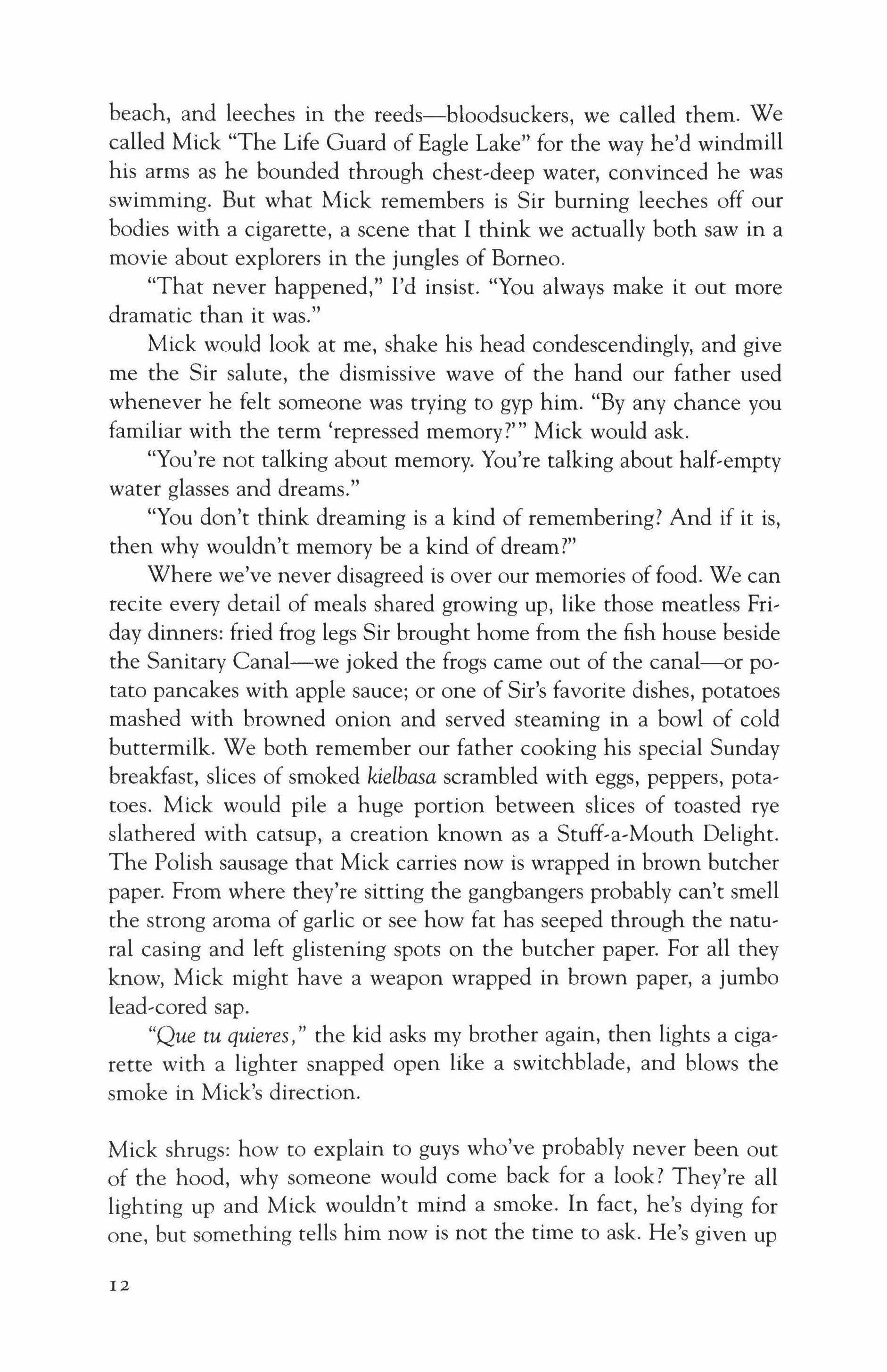
beach, and leeches in the reeds-bloodsuckers, we called them. We called Mick "The Life Guard of Eagle Lake" for the way he'd windmill his arms as he bounded through chest-deep water, convinced he was swimming. But what Mick remembers is Sir burning leeches off our bodies with a cigarette, a scene that I think we actually both saw in a movie about explorers in the jungles of Borneo.
"That never happened," I'd insist. "You always make it out more dramatic than it was."
Mick would look at me, shake his head condescendingly, and give me the Sir salute, the dismissive wave of the hand our father used whenever he felt someone was trying to gyp him. "By any chance you familiar with the term 'repressed memory?" Mick would ask.
"You're not talking about memory. You're talking about half-empty water glasses and dreams."
"You don't think dreaming is a kind of remembering? And if it is, then why wouldn't memory be a kind of dream?"
Where we've never disagreed is over our memories of food. We can recite every detail of meals shared growing up, like those meatless Friday dinners: fried frog legs Sir brought home from the fish house beside the Sanitary Canal-we joked the frogs came out of the canal-or potato pancakes with apple sauce; or one of Sir's favorite dishes, potatoes mashed with browned onion and served steaming in a bowl of cold buttermilk. We both remember our father cooking his special Sunday breakfast, slices of smoked kielbasa scrambled with eggs, peppers, potatoes. Mick would pile a huge portion between slices of toasted rye slathered with catsup, a creation known as a Stuff-a-Mouth Delight. The Polish sausage that Mick carries now is wrapped in brown butcher paper. From where they're sitting the gangbangers probably can't smell the strong aroma of garlic or see how fat has seeped through the natural casing and left glistening spots on the butcher paper. For all they know, Mick might have a weapon wrapped in brown paper, a jumbo lead-cored sap.
"Que tu quieres," the kid asks my brother again, then lights a cigarette with a lighter snapped open like a switchblade, and blows the smoke in Mick's direction.
Mick shrugs: how to explain to guys who've probably never been out of the hood, why someone would come back for a look? They're all lighting up and Mick wouldn't mind a smoke. In fact, he's dying for one, but something tells him now is not the time to ask. He's given up
12
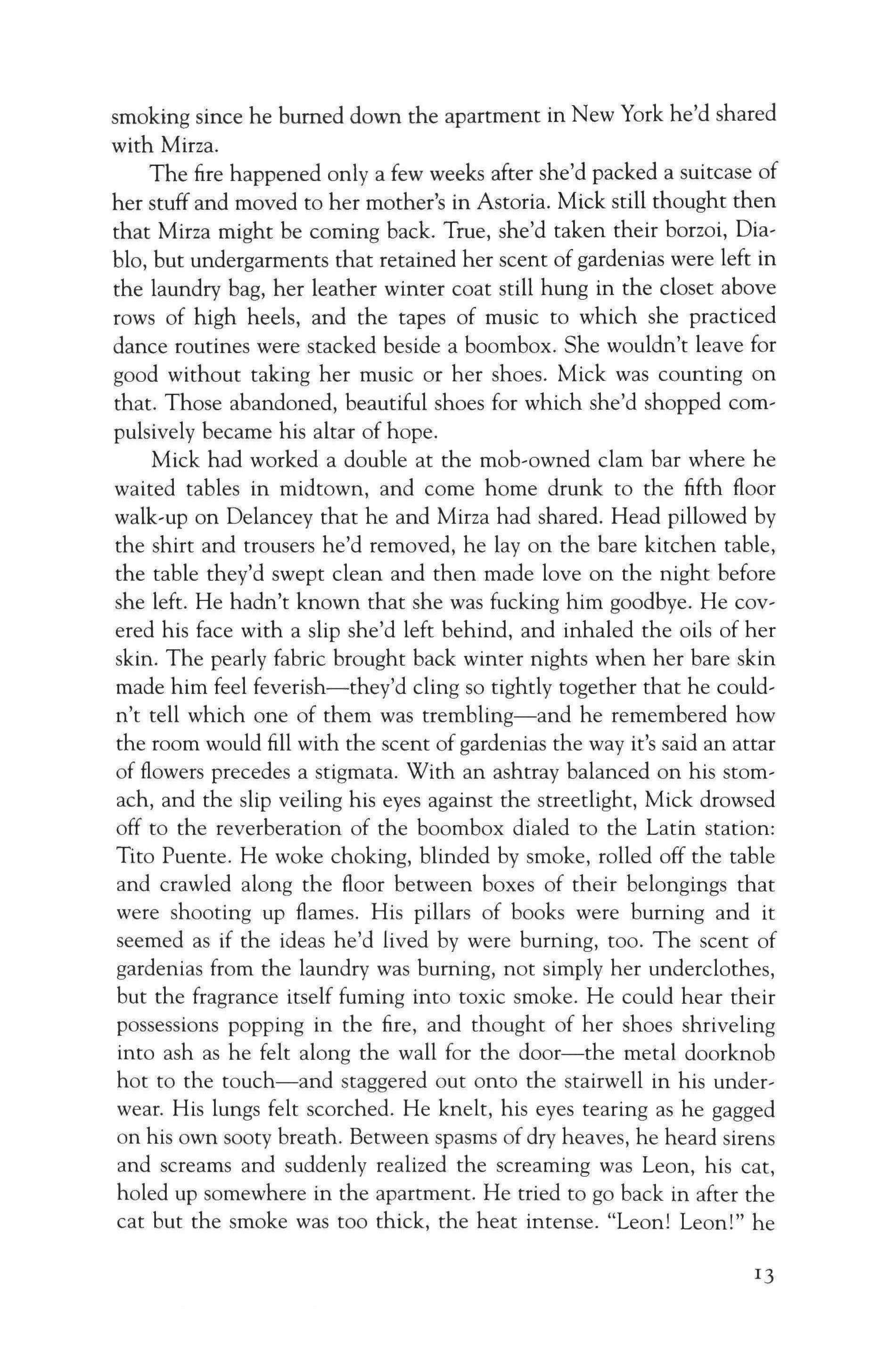
smoking since he burned down the apartment in New York he'd shared with Mirza.
The fire happened only a few weeks after she'd packed a suitcase of her stuff and moved to her mother's in Astoria. Mick still thought then that Mirza might be coming back. True, she'd taken their borzoi, Diablo, but undergarments that retained her scent of gardenias were left in the laundry bag, her leather winter coat still hung in the closet above rows of high heels, and the tapes of music to which she practiced dance routines were stacked beside a boombox. She wouldn't leave for good without taking her music or her shoes. Mick was counting on that. Those abandoned, beautiful shoes for which she'd shopped compulsively became his altar of hope.
Mick had worked a double at the mob-owned clam bar where he waited tables in midtown, and come home drunk to the fifth floor walk-up on Delancey that he and Mirza had shared. Head pillowed by the shirt and trousers he'd removed, he lay on the bare kitchen table, the table they'd swept clean and then made love on the night before she left. He hadn't known that she was fucking him goodbye. He covered his face with a slip she'd left behind, and inhaled the oils of her skin. The pearly fabric brought back winter nights when her bare skin made him feel feverish-they'd cling so tightly together that he couldn't tell which one of them was trembling-and he remembered how the room would fill with the scent of gardenias the way it's said an attar of flowers precedes a stigmata. With an ashtray balanced on his stomach, and the slip veiling his eyes against the streetlight, Mick drowsed off to the reverberation of the boombox dialed to the Latin station: Tito Puente. He woke choking, blinded by smoke, rolled off the table and crawled along the floor between boxes of their belongings that were shooting up flames. His pillars of books were burning and it seemed as if the ideas he'd lived by were burning, too. The scent of gardenias from the laundry was burning, not simply her underclothes, but the fragrance itself fuming into toxic smoke. He could hear their possessions popping in the fire, and thought of her shoes shriveling into ash as he felt along the wall for the door-the metal doorknob hot to the touch-and staggered out onto the stairwell in his underwear. His lungs felt scorched. He knelt, his eyes tearing as he gagged on his own sooty breath. Between spasms of dry heaves, he heard sirens and screams and suddenly realized the screaming was Leon, his cat, holed up somewhere in the apartment. He tried to go back in after the cat but the smoke was too thick, the heat intense. "Leon! Leon!" he
13
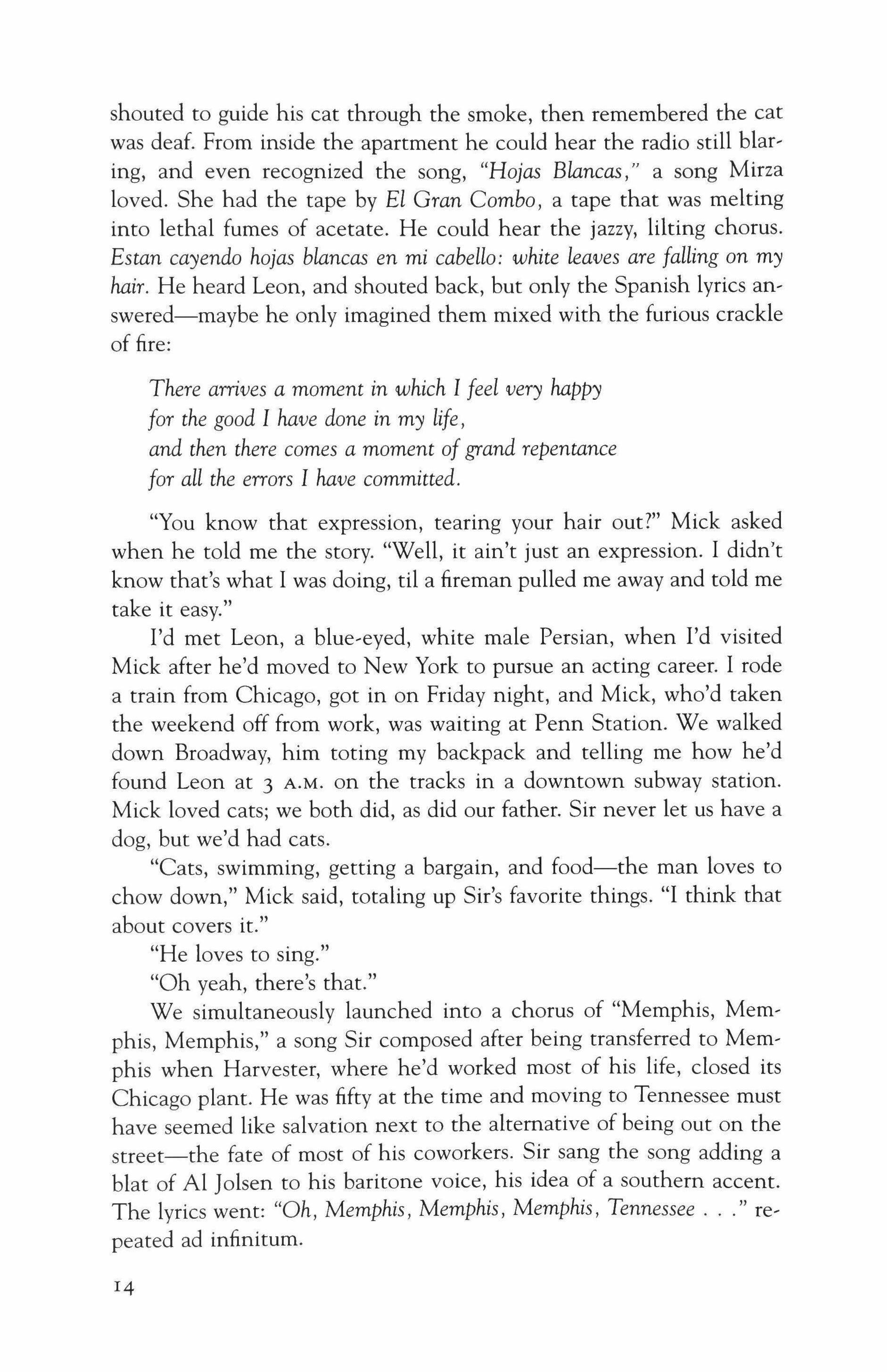
shouted to guide his cat through the smoke, then remembered the cat was deaf. From inside the apartment he could hear the radio still blaring, and even recognized the song, "Hojas Blancas," a song Mirza loved. She had the tape by El Gran Combo, a tape that was melting into lethal fumes of acetate. He could hear the jazzy, lilting chorus. Estan cayendo hojas blancas en mi cabello: white leaves are falling on my hair. He heard Leon, and shouted back, but only the Spanish lyrics answered-maybe he only imagined them mixed with the furious crackle of fire:
There arrives a moment in which I feel very happy for the good I have done in my life, and then there comes a moment ofgrand repentance for all the errors I have committed.
"You know that expression, tearing your hair out!" Mick asked when he told me the story. "Well, it ain't just an expression. I didn't know that's what I was doing, til a fireman pulled me away and told me take it easy."
I'd met Leon, a blue-eyed, white male Persian, when I'd visited Mick after he'd moved to New York to pursue an acting career. I rode a train from Chicago, got in on Friday night, and Mick, who'd taken the weekend off from work, was waiting at Penn Station. We walked down Broadway, him toting my backpack and telling me how he'd found Leon at 3 A.M. on the tracks in a downtown subway station. Mick loved cats; we both did, as did our father. Sir never let us have a dog, but we'd had cats.
"Cats, swimming, getting a bargain, and food-the man loves to chow down," Mick said, totaling up Sir's favorite things. "I think that about covers it."
"He loves to sing."
"Oh yeah, there's that."
We simultaneously launched into a chorus of "Memphis, Memphis, Memphis," a song Sir composed after being transferred to Memphis when Harvester, where he'd worked most of his life, closed its Chicago plant. He was fifty at the time and moving to Tennessee must have seemed like salvation next to the alternative of being out on the street-the fate of most of his coworkers. Sir sang the song adding a blat of Al Jolsen to his baritone voice, his idea of a southern accent. The lyrics went: "Oh, Memphis, Memphis, Memphis, Tennessee repeated ad infinitum.
14
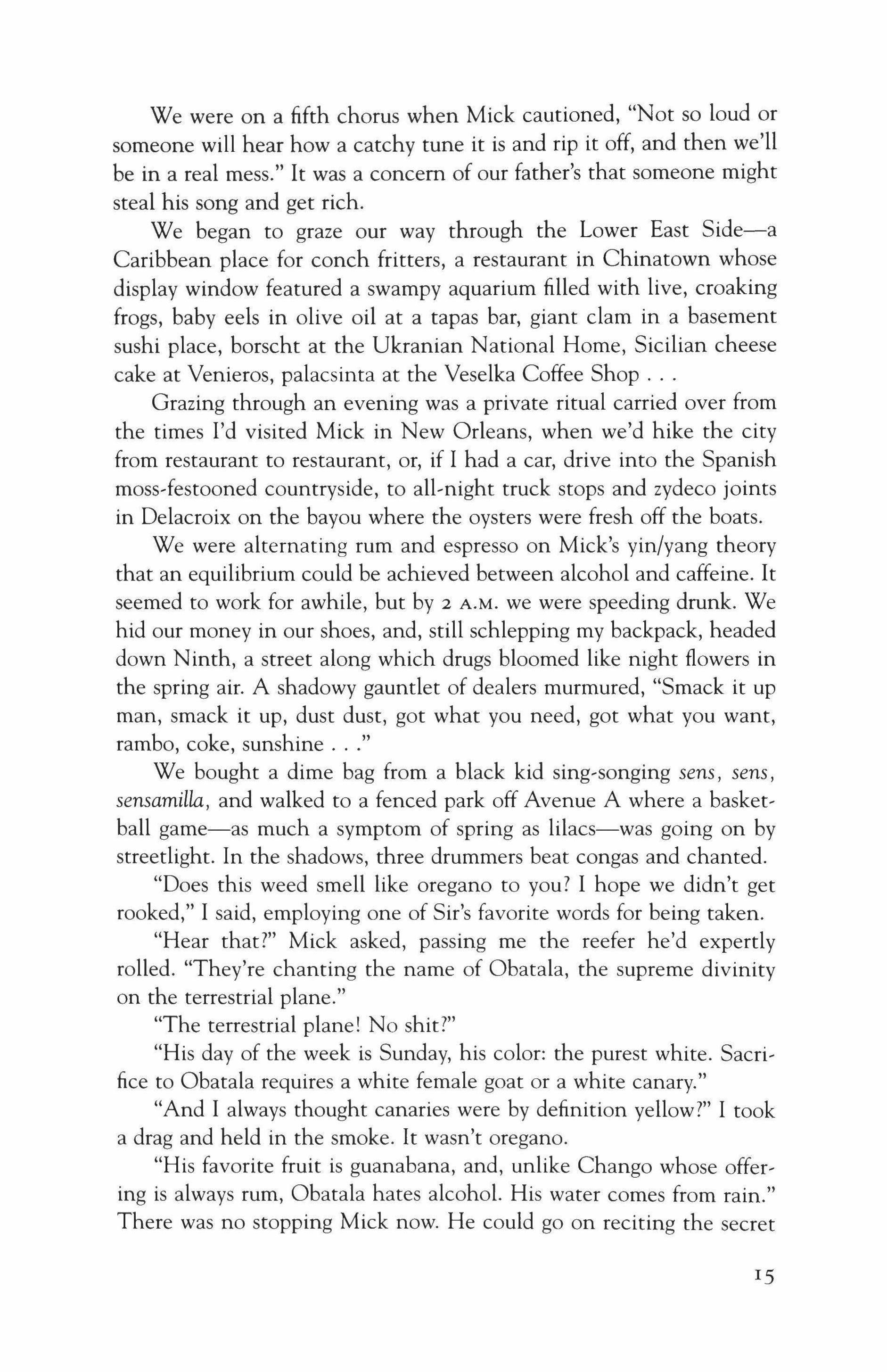
We were on a fifth chorus when Mick cautioned, "Not so loud or someone will hear how a catchy tune it is and rip it off, and then we'll be in a real mess." It was a concern of our father's that someone might steal his song and get rich.
We began to graze our way through the Lower East Side-a Caribbean place for conch fritters, a restaurant in Chinatown whose display window featured a swampy aquarium filled with live, croaking frogs, baby eels in olive oil at a tapas bar, giant clam in a basement sushi place, borscht at the Ukranian National Home, Sicilian cheese cake at Venieros, palacsinta at the Veselka Coffee Shop
Grazing through an evening was a private ritual carried over from the times I'd visited Mick in New Orleans, when we'd hike the city from restaurant to restaurant, or, if I had a car, drive into the Spanish moss-festooned countryside, to all-night truck stops and zydeco joints in Delacroix on the bayou where the oysters were fresh off the boats.
We were alternating rum and espresso on Mick's yin/yang theory that an equilibrium could be achieved between alcohol and caffeine. It seemed to work for awhile, but by 2 A.M. we were speeding drunk. We hid our money in our shoes, and, still schlepping my backpack, headed down Ninth, a street along which drugs bloomed like night flowers in the spring air. A shadowy gauntlet of dealers murmured, "Smack it up man, smack it up, dust dust, got what you need, got what you want, rambo, coke, sunshine
We bought a dime bag from a black kid sing-songing sens, sens, sensamilla, and walked to a fenced park off Avenue A where a basketball game-as much a symptom of spring as lilacs-was going on by streetlight. In the shadows, three drummers beat congas and chanted.
"Does this weed smell like oregano to you? I hope we didn't get rooked," I said, employing one of Sir's favorite words for being taken.
"Hear that?" Mick asked, passing me the reefer he'd expertly rolled. "They're chanting the name of Obatala, the supreme divinity on the terrestrial plane."
"The terrestrial plane! No shit?"
"His day of the week is Sunday, his color: the purest white. Sacrifice to Obatala requires a white female goat or a white canary."
"And I always thought canaries were by definition yellow?" I took a drag and held in the smoke. It wasn't oregano.
"His favorite fruit is guanabana, and, unlike Chango whose offering is always rum, Obatala hates alcohol. His water comes from rain." There was no stopping Mick now. He could go on reciting the secret
15
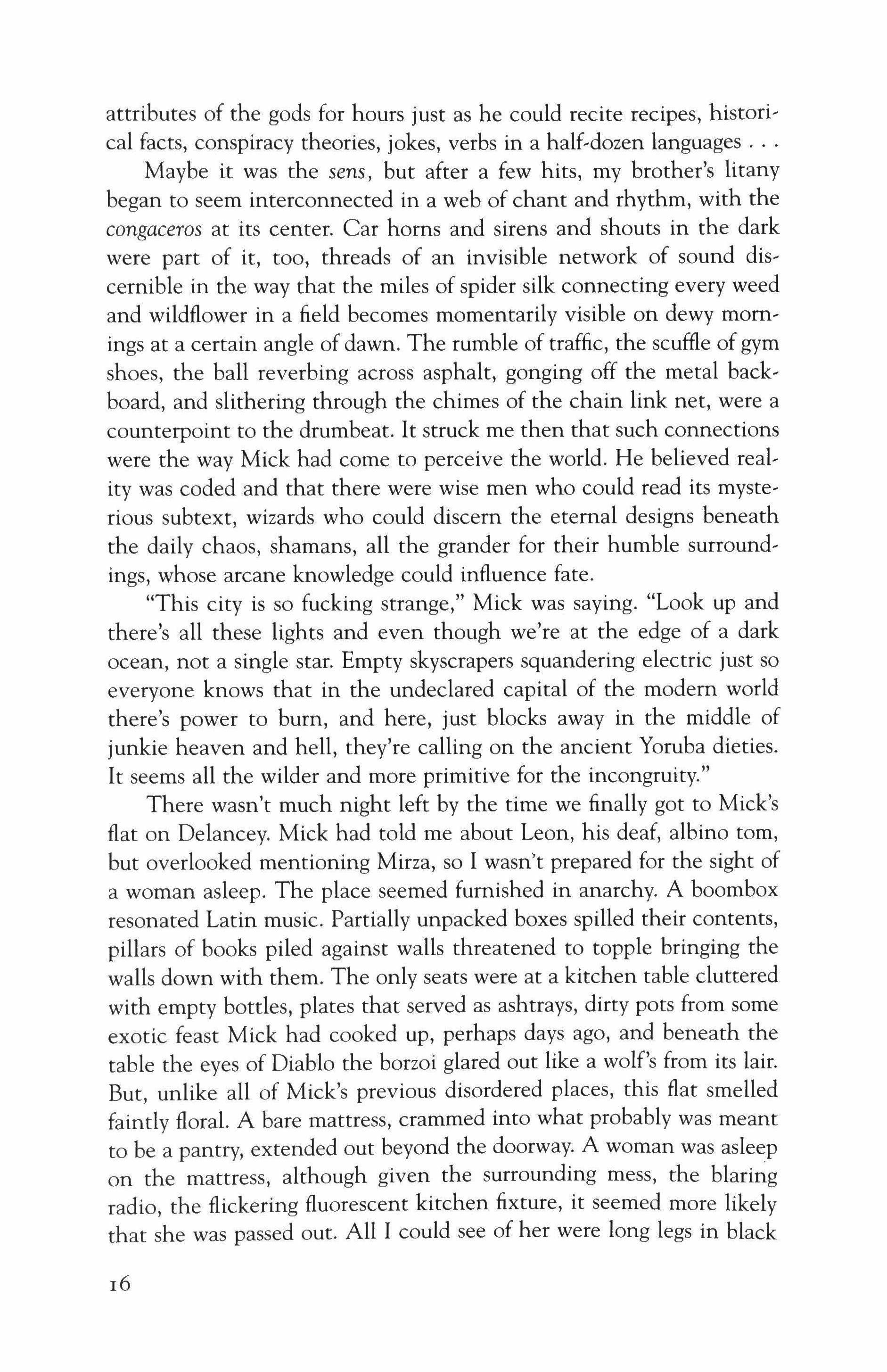
attributes of the gods for hours just as he could recite recipes, historical facts, conspiracy theories, jokes, verbs in a half-dozen languages
Maybe it was the sens, but after a few hits, my brother's litany began to seem interconnected in a web of chant and rhythm, with the congaceros at its center. Car horns and sirens and shouts in the dark were part of it, too, threads of an invisible network of sound discernible in the way that the miles of spider silk connecting every weed and wildflower in a field becomes momentarily visible on dewy mornings at a certain angle of dawn. The rumble of traffic, the scuffle of gym shoes, the ball reverbing across asphalt, gonging off the metal backboard, and slithering through the chimes of the chain link net, were a counterpoint to the drumbeat. It struck me then that such connections were the way Mick had come to perceive the world. He believed reality was coded and that there were wise men who could read its mysterious subtext, wizards who could discern the eternal designs beneath the daily chaos, shamans, all the grander for their humble surroundings, whose arcane knowledge could influence fate.
"This city is so fucking strange," Mick was saying. "Look up and there's all these lights and even though we're at the edge of a dark ocean, not a single star. Empty skyscrapers squandering electric just so everyone knows that in the undeclared capital of the modern world there's power to burn, and here, just blocks away in the middle of junkie heaven and hell, they're calling on the ancient Yoruba dieties. It seems all the wilder and more primitive for the incongruity."
There wasn't much night left by the time we finally got to Mick's flat on Delancey. Mick had told me about Leon, his deaf, albino tom, but overlooked mentioning Mirza, so I wasn't prepared for the sight of a woman asleep. The place seemed furnished in anarchy. A boombox resonated Latin music. Partially unpacked boxes spilled their contents, pillars of books piled against walls threatened to topple bringing the walls down with them. The only seats were at a kitchen table cluttered with empty bottles, plates that served as ashtrays, dirty pots from some exotic feast Mick had cooked up, perhaps days ago, and beneath the table the eyes of Diablo the borzoi glared out like a wolf's from its lair. But, unlike all of Mick's previous disordered places, this flat smelled faintly floral. A bare mattress, crammed into what probably was meant to be a pantry, extended out beyond the doorway. A woman was asleep on the mattress, although given the surrounding mess, the blaring radio, the flickering fluorescent kitchen fixture, it seemed more likely that she was passed out. All I could see of her were long legs in black

net stockings and red high heels--one red shoe, to be exact, the other presumably kicked off. The immobile perfection of those tawny legs sticking from the doorway made it appear wholly possible that my brother was bedding down with the bottom half of a mannequin. Mick didn't seem to notice anything out of the ordinary.
"You didn't mention a roommate. You sure it's all right for me to crash here?"
"No problem. My girlfriend, mi amiguita, Mirza," he said by way of introduction. "Mirza meet mi mana, Perry."
The legs didn't stir.
"See," he said. "She's totally cool with it." Then he dropped his voice, "If she asks how old I am don't tell her."
"Why not? Why would she ask me?"
"She's very curious about my family. Don't tell her anything. She'll misinterpret it. We're having our little squabbles lately."
For what was left of the night, I slept in my clothes on a musty pile of drapes wedged between boxes, on the bare floor, with Leon curled purring on my chest, and Diablo snarling, his fangs bared at my throat each time I shifted, futilely searching for a comfortable position.
When I woke to Saturday, light was defogging the grated, unwashed windows. Leon sat perched on the refrigerator observing Mirza, who, dressed in a tank top and jogging sweats, stood at the stove with her back to me, whisking canned milk and cinnamon into a pot of coffee. From the pantry doorway, Mick's bare, hairy legs stuck out over the mattress as Mirza's had the night before. The radio played Bach and the borzoi gnawed at something under the table.
"Buenos dias," Mirza said, glancing over her shoulder. I was struck by how broad her shoulders were. She had the build and muscle tone of a gymnast. Her kinky hair was cropped short, dyed bronze, a shade that matched her skin. She wasn't pretty so much as beautiful in a handsome way.
"Good morning," I said.
She handed me a steaming mug. "I can see the family resemblance. Especially in the cheek bones. You are Yimmy's brother."
"Whose brother?" I asked.
"Yimmy."
I was groggy and wondered if Yimmy was some Caribbean term of endearment. "You mean Mick?"
"Mick? No, Yimmy, Yimmy Delacroix."
"Yeah, mi hermano," I said.
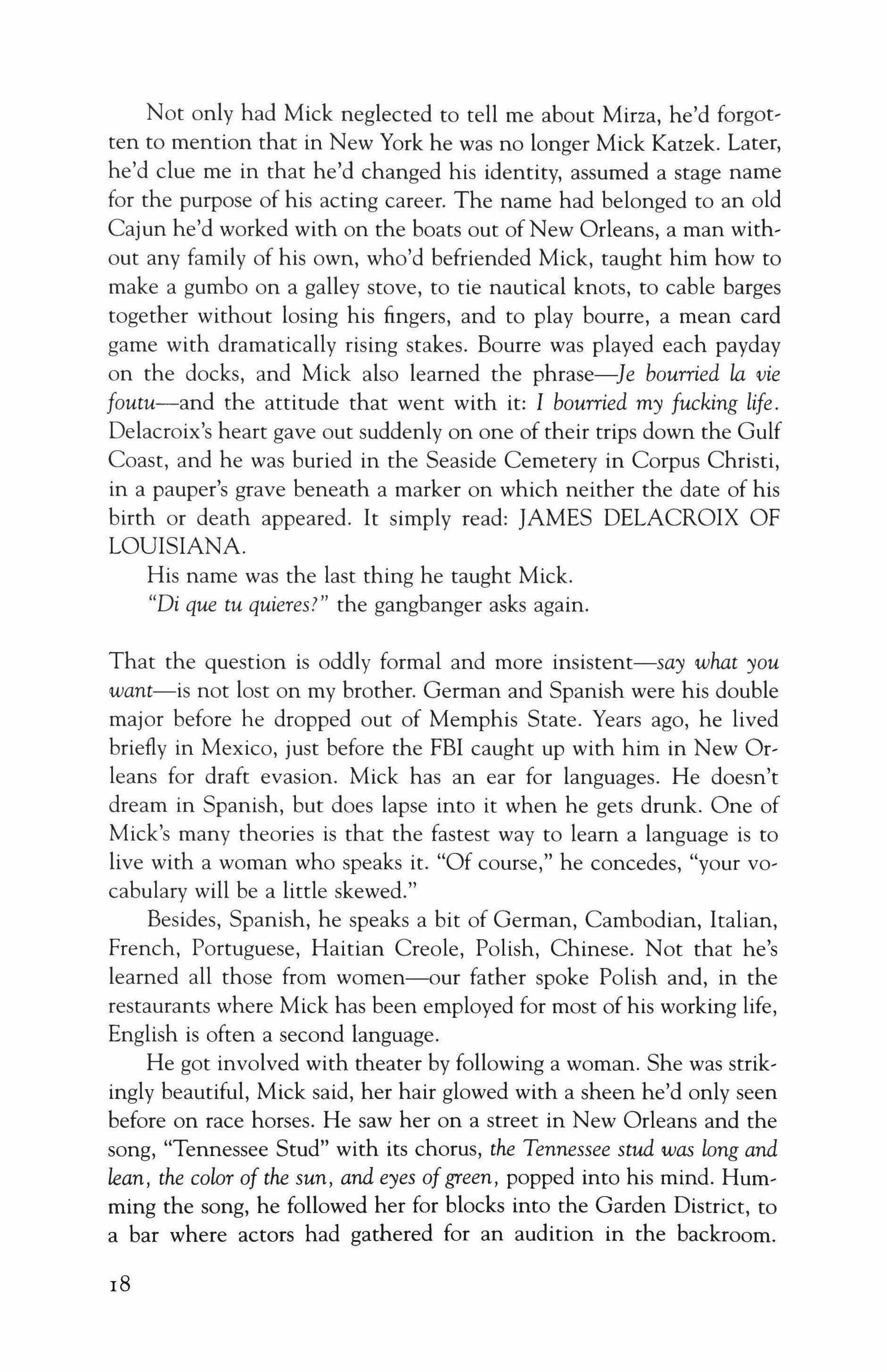
Not only had Mick neglected to tell me about Mirza, he'd forgot' ten to mention that in New York he was no longer Mick Katzek. Later, he'd clue me in that he'd changed his identity, assumed a stage name for the purpose of his acting career. The name had belonged to an old Cajun he'd worked with on the boats out of New Orleans, a man with, out any family of his own, who'd befriended Mick, taught him how to make a gumbo on a galley stove, to tie nautical knots, to cable barges together without losing his fingers, and to play bourre, a mean card game with dramatically rising stakes. Bourre was played each payday on the docks, and Mick also learned the phrase-Ie bourried la vie foutu-and the attitude that went with it: I bourried my fucking life. Delacroix's heart gave out suddenly on one of their trips down the Gulf Coast, and he was buried in the Seaside Cemetery in Corpus Christi, in a pauper's grave beneath a marker on which neither the date of his birth or death appeared. It simply read: JAMES DELACROIX OF LOUISIANA.
His name was the last thing he taught Mick.
"Di que tu quieres?" the gangbanger asks again.
That the question is oddly formal and more insistent-say what you want-is not lost on my brother. German and Spanish were his double major before he dropped out of Memphis State. Years ago, he lived briefly in Mexico, just before the FBI caught up with him in New Or, leans for draft evasion. Mick has an ear for languages. He doesn't dream in Spanish, but does lapse into it when he gets drunk. One of Mick's many theories is that the fastest way to learn a language is to live with a woman who speaks it. "Of course," he concedes, "your vocabulary will be a little skewed."
Besides, Spanish, he speaks a bit of German, Cambodian, Italian, French, Portuguese, Haitian Creole, Polish, Chinese. Not that he's learned all those from women-our father spoke Polish and, in the restaurants where Mick has been employed for most of his working life, English is often a second language.
He got involved with theater by following a woman. She was strikingly beautiful, Mick said, her hair glowed with a sheen he'd only seen before on race horses. He saw her on a street in New Orleans and the song, "Tennessee Stud" with its chorus, the Tennessee stud was long and lean, the color of the sun, and eyes ofgreen, popped into his mind. Hum, ming the song, he followed her for blocks into the Garden District, to a bar where actors had gathered for an audition in the backroom.
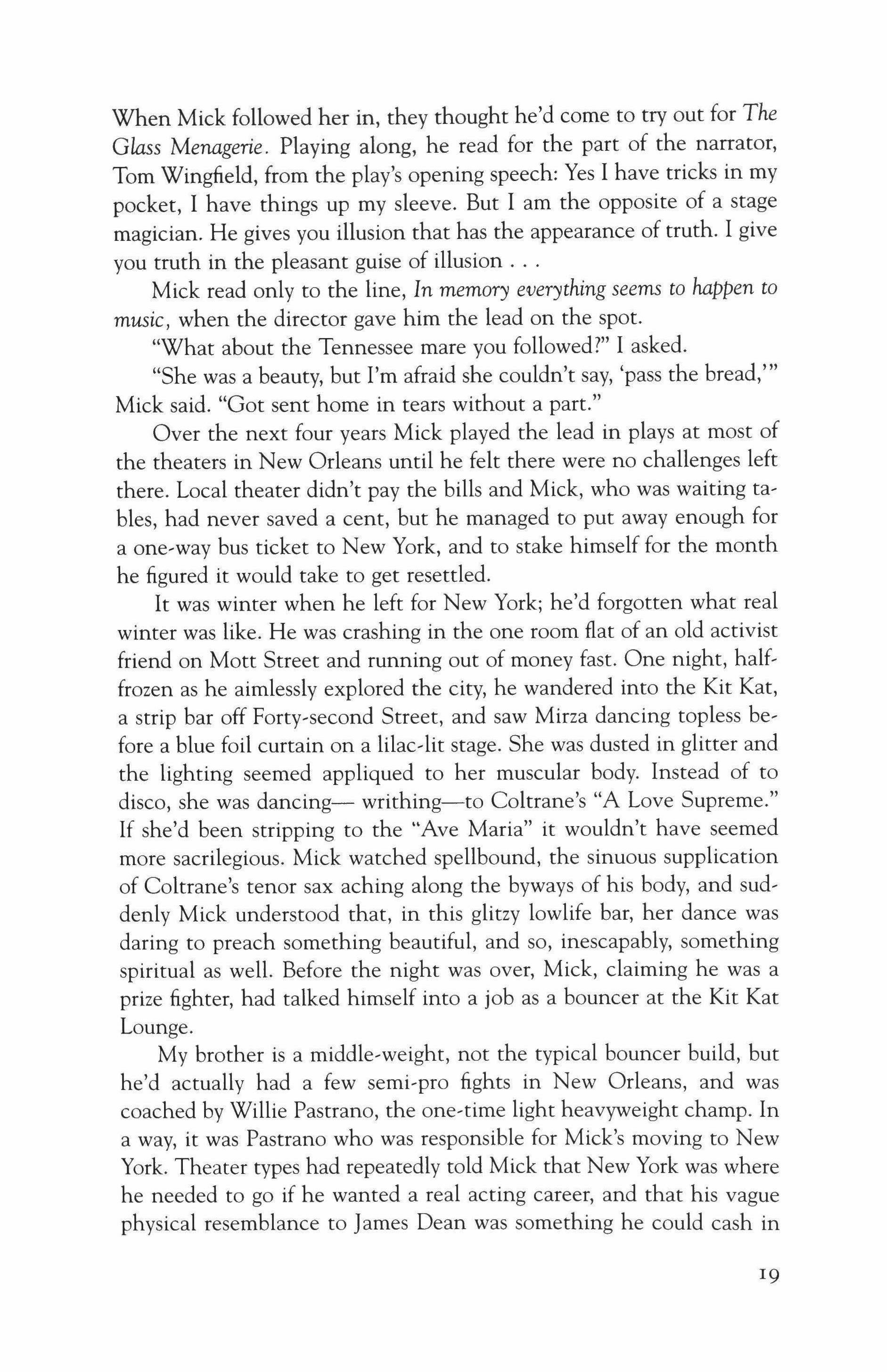
When Mick followed her in, they thought he'd come to try out for The Glass Menagerie. Playing along, he read for the part of the narrator, Tom Wingfield, from the play's opening speech: Yes I have tricks in my pocket, I have things up my sleeve. But I am the opposite of a stage magician. He gives you illusion that has the appearance of truth. I give you truth in the pleasant guise of illusion
Mick read only to the line, In memory everything seems to happen to music, when the director gave him the lead on the spot.
"What about the Tennessee mare you followed?" I asked.
"She was a beauty, but I'm afraid she couldn't say, 'pass the bread,'" Mick said. "Got sent home in tears without a part."
Over the next four years Mick played the lead in plays at most of the theaters in New Orleans until he felt there were no challenges left there. Local theater didn't pay the bills and Mick, who was waiting tables, had never saved a cent, but he managed to put away enough for a one-way bus ticket to New York, and to stake himself for the month he figured it would take to get resettled.
It was winter when he left for New York; he'd forgotten what real winter was like. He was crashing in the one room flat of an old activist friend on Matt Street and running out of money fast. One night, halffrozen as he aimlessly explored the city, he wandered into the Kit Kat, a strip bar off Forty-second Street, and saw Mirza dancing topless before a blue foil curtain on a lilac-lit stage. She was dusted in glitter and the lighting seemed appliqued to her muscular body. Instead of to disco, she was dancing- writhing-to Coltrane's "A Love Supreme." If she'd been stripping to the "Ave Maria" it wouldn't have seemed more sacrilegious. Mick watched spellbound, the sinuous supplication of Coltrane's tenor sax aching along the byways of his body, and suddenly Mick understood that, in this glitzy lowlife bar, her dance was daring to preach something beautiful, and so, inescapably, something spiritual as well. Before the night was over, Mick, claiming he was a prize fighter, had talked himself into a job as a bouncer at the Kit Kat Lounge.
My brother is a middle-weight, not the typical bouncer build, but he'd actually had a few semi-pro fights in New Orleans, and was coached by Willie Pastrano, the one-time light heavyweight champ. In a way, it was Pastrano who was responsible for Mick's moving to New York. Theater types had repeatedly told Mick that New York was where he needed to go if he wanted a real acting career, and that his vague physical resemblance to James Dean was something he could cash in
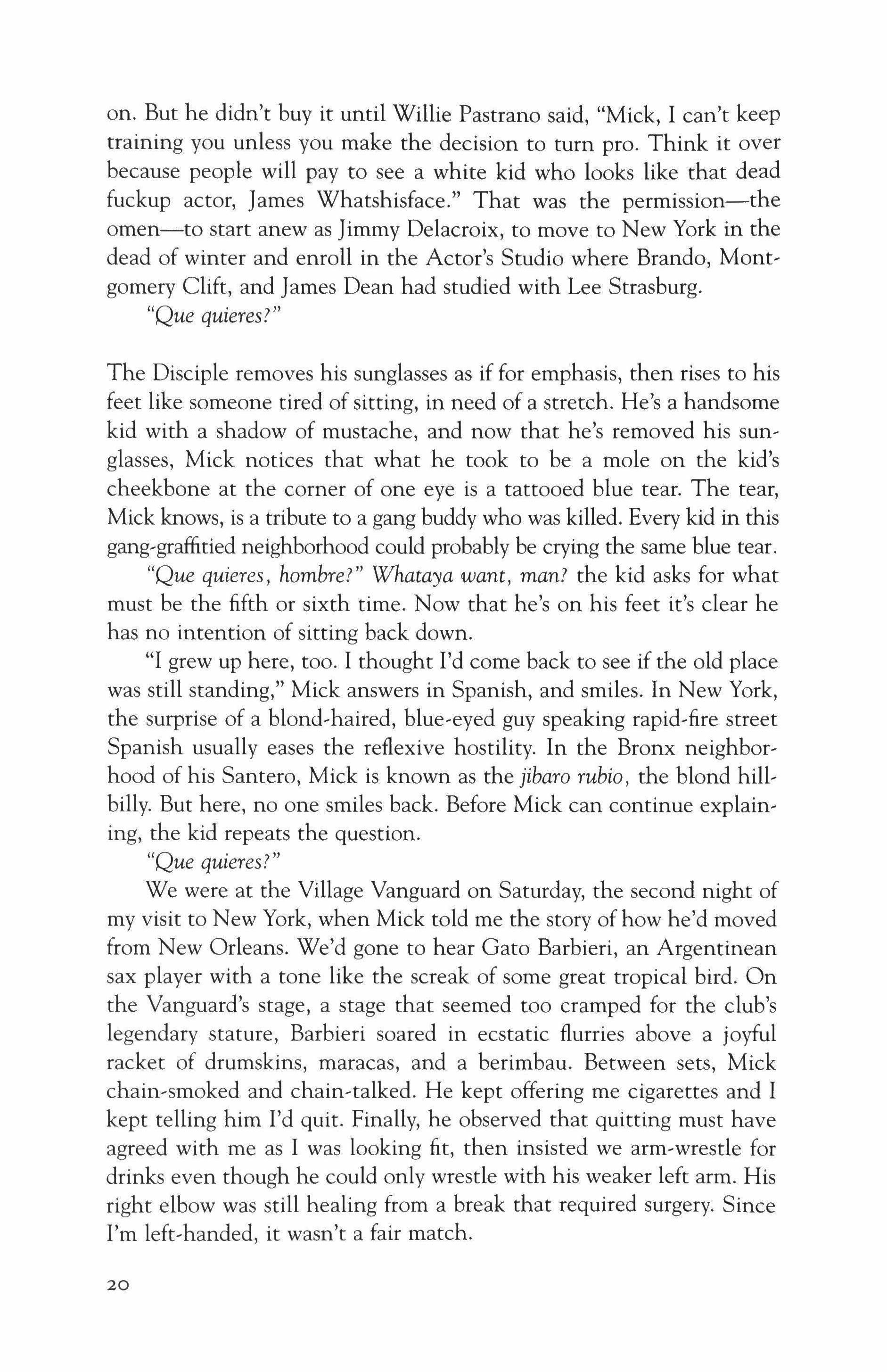
on. But he didn't buy it until Willie Pastrano said, "Mick, I can't keep training you unless you make the decision to turn pro. Think it over because people will pay to see a white kid who looks like that dead fuckup actor, James Whatshisface." That was the permission-the omen-to start anew as Jimmy Delacroix, to move to New York in the dead of winter and enroll in the Actor's Studio where Brando, Montgomery Clift, and James Dean had studied with Lee Strasburg.
"Que quietest"
The Disciple removes his sunglasses as if for emphasis, then rises to his feet like someone tired of sitting, in need of a stretch. He's a handsome kid with a shadow of mustache, and now that he's removed his sunglasses, Mick notices that what he took to be a mole on the kid's cheekbone at the corner of one eye is a tattooed blue tear. The tear, Mick knows, is a tribute to a gang buddy who was killed. Every kid in this gang-graffitied neighborhood could probably be crying the same blue tear.
"Que quieres, hombre?" Whataya want, man? the kid asks for what must be the fifth or sixth time. Now that he's on his feet it's clear he has no intention of sitting back down.
"I grew up here, too. I thought I'd come back to see if the old place was still standing," Mick answers in Spanish, and smiles. In New York, the surprise of a blond-haired, blue-eyed guy speaking rapid-fire street Spanish usually eases the reflexive hostility. In the Bronx neighborhood of his Santero, Mick is known as the jibaro rubio, the blond hillbilly. But here, no one smiles back. Before Mick can continue explaining, the kid repeats the question.
"Que quietest"
We were at the Village Vanguard on Saturday, the second night of my visit to New York, when Mick told me the story of how he'd moved from New Orleans. We'd gone to hear Gato Barbieri, an Argentinean sax player with a tone like the screak of some great tropical bird. On the Vanguard's stage, a stage that seemed too cramped for the club's legendary stature, Barbieri soared in ecstatic flurries above a joyful racket of drumskins, maracas, and a berimbau. Between sets, Mick chain-smoked and chain-talked. He kept offering me cigarettes and I kept telling him I'd quit. Finally, he observed that quitting must have agreed with me as I was looking fit, then insisted we arm-wrestle for drinks even though he could only wrestle with his weaker left arm. His right elbow was still healing from a break that required surgery. Since I'm left-handed, it wasn't a fair match.
20
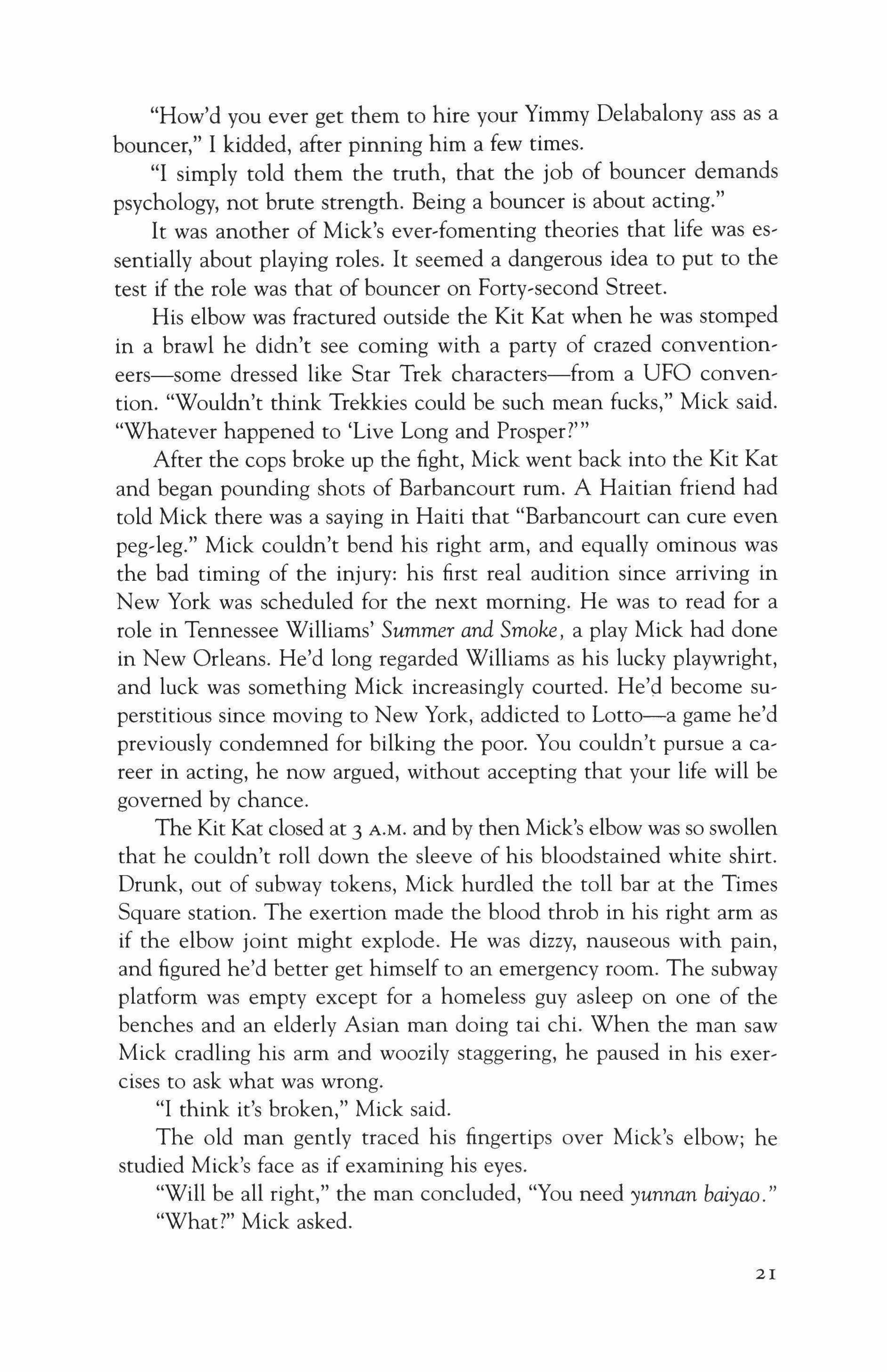
"How'd you ever get them to hire your Yimmy Delabalony ass as a bouncer," I kidded, after pinning him a few times.
"I simply told them the truth, that the job of bouncer demands psychology, not brute strength. Being a bouncer is about acting."
It was another of Mick's ever-fomenting theories that life was essentially about playing roles. It seemed a dangerous idea to put to the test if the role was that of bouncer on Forty-second Street. His elbow was fractured outside the Kit Kat when he was stomped in a brawl he didn't see coming with a party of crazed convention, eers-some dressed like Star Trek characters-from a UFO convention. "Wouldn't think Trekkies could be such mean fucks," Mick said. "Whatever happened to 'Live Long and Prosper?'"
After the cops broke up the fight, Mick went back into the Kit Kat and began pounding shots of Barbancourt rum. A Haitian friend had told Mick there was a saying in Haiti that "Barbancourt can cure even peg-leg." Mick couldn't bend his right arm, and equally ominous was the bad timing of the injury: his first real audition since arriving in New York was scheduled for the next morning. He was to read for a role in Tennessee Williams' Summer and Smoke, a play Mick had done in New Orleans. He'd long regarded Williams as his lucky playwright, and luck was something Mick increasingly courted. He'd become superstitious since moving to New York, addicted to Lotto-a game he'd previously condemned for bilking the poor. You couldn't pursue a career in acting, he now argued, without accepting that your life will be governed by chance.
The Kit Kat closed at 3 A.M. and by then Mick's elbow was so swollen that he couldn't roll down the sleeve of his bloodstained white shirt. Drunk, out of subway tokens, Mick hurdled the toll bar at the Times Square station. The exertion made the blood throb in his right arm as if the elbow joint might explode. He was dizzy, nauseous with pain, and figured he'd better get himself to an emergency room. The subway platform was empty except for a homeless guy asleep on one of the benches and an elderly Asian man doing tai chi. When the man saw Mick cradling his arm and woozilv staggering, he paused in his exercises to ask what was wrong.
"I think it's broken," Mick said.
The old man gently traced his fingertips over Mick's elbow; he studied Mick's face as if examining his eyes.
"Will be all right," the man concluded, "You need yunnan baiyao." "What?" Mick asked.
21
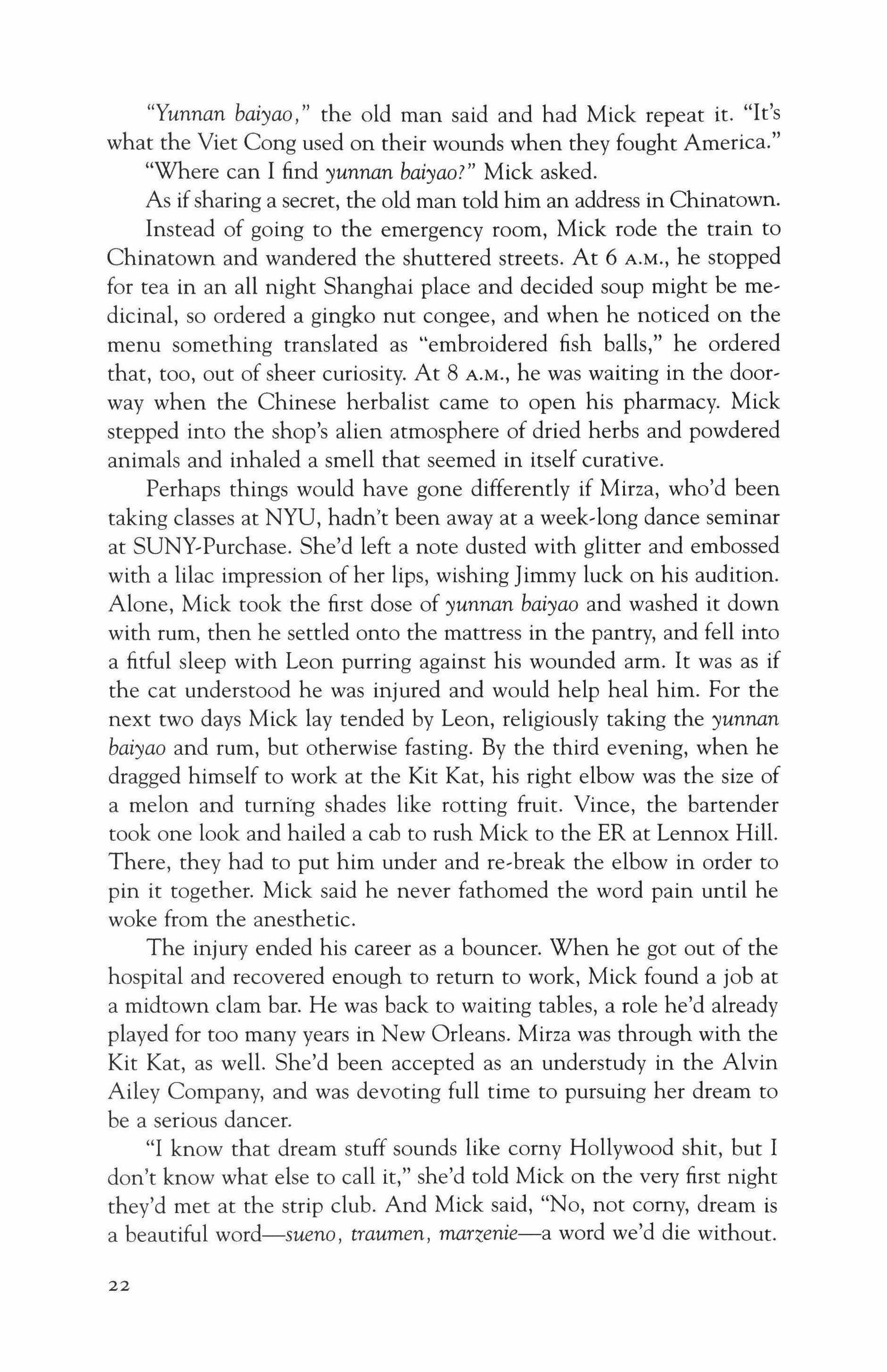
"Yunnan baiyao," the old man said and had Mick repeat it. "It's what the Viet Cong used on their wounds when they fought America."
"Where can I find yunnan baiyao?" Mick asked.
As if sharing a secret, the old man told him an address in Chinatown. Instead of going to the emergency room, Mick rode the train to Chinatown and wandered the shuttered streets. At 6 A.M., he stopped for tea in an all night Shanghai place and decided soup might be medicinal, so ordered a gingko nut congee, and when he noticed on the menu something translated as "embroidered fish balls," he ordered that, too, out of sheer curiosity. At 8 A.M., he was waiting in the doorway when the Chinese herbalist came to open his pharmacy. Mick stepped into the shop's alien atmosphere of dried herbs and powdered animals and inhaled a smell that seemed in itself curative.
Perhaps things would have gone differently if Mirza, who'd been taking classes at NYU, hadn't been away at a week-long dance seminar at SUNY-Purchase. She'd left a note dusted with glitter and embossed with a lilac impression of her lips, wishing Jimmy luck on his audition. Alone, Mick took the first dose of yunnan baiyao and washed it down with rum, then he settled onto the mattress in the pantry, and fell into a fitful sleep with Leon purring against his wounded arm. It was as if the cat understood he was injured and would help heal him. For the next two days Mick lay tended by Leon, religiously taking the yunnan baiyao and rum, but otherwise fasting. By the third evening, when he dragged himself to work at the Kit Kat, his right elbow was the size of a melon and turning shades like rotting fruit. Vince, the bartender took one look and hailed a cab to rush Mick to the ER at Lennox Hill. There, they had to put him under and re-break the elbow in order to pin it together. Mick said he never fathomed the word pain until he woke from the anesthetic.
The injury ended his career as a bouncer. When he got out of the hospital and recovered enough to return to work, Mick found a job at a midtown clam bar. He was back to waiting tables, a role he'd already played for too many years in New Orleans. Mirza was through with the Kit Kat, as well. She'd been accepted as an understudy in the Alvin Ailey Company, and was devoting full time to pursuing her dream to be a serious dancer.
"I know that dream stuff sounds like corny Hollywood shit, but I don't know what else to call it," she'd told Mick on the very first night they'd met at the strip club. And Mick said, "No, not corny, dream is a beautiful word-sueno, traumen, marzenie-a word we'd die without.
22
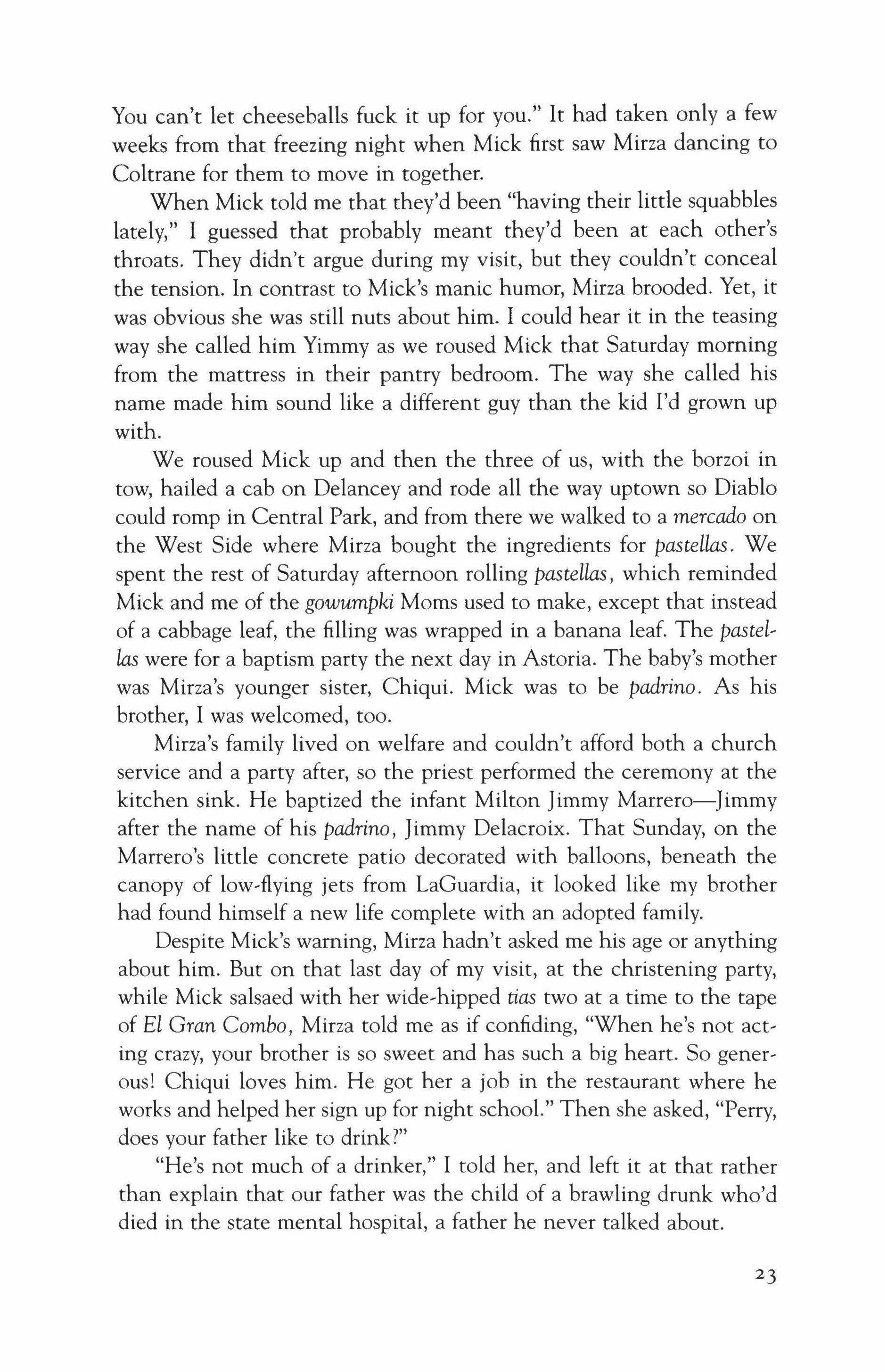
You can't let cheeseballs fuck it up for you." It had taken only a few weeks from that freezing night when Mick first saw Mirza dancing to Coltrane for them to move in together.
When Mick told me that they'd been "having their little squabbles lately," I guessed that probably meant they'd been at each other's throats. They didn't argue during my visit, but they couldn't conceal the tension. In contrast to Mick's manic humor, Mirza brooded. Yet, it was obvious she was still nuts about him. I could hear it in the teasing way she called him Yimrny as we roused Mick that Saturday morning from the mattress in their pantry bedroom. The way she called his name made him sound like a different guy than the kid I'd grown up with.
We roused Mick up and then the three of us, with the borzoi in tow, hailed a cab on Delancey and rode all the way uptown so Diablo could romp in Central Park, and from there we walked to a mercado on the West Side where Mirza bought the ingredients for pastellas. We spent the rest of Saturday afternoon rolling pastellas, which reminded Mick and me of the gowumpki Moms used to make, except that instead of a cabbage leaf, the filling was wrapped in a banana leaf. The pastel� las were for a baptism party the next day in Astoria. The baby's mother was Mirza's younger sister, Chiqui. Mick was to be padrino. As his brother, I was welcomed, too.
Mirza's family lived on welfare and couldn't afford both a church service and a party after, so the priest performed the ceremony at the kitchen sink. He baptized the infant Milton Jimmy Marrero-Jimmy after the name of his padrino, Jimmy Delacroix. That Sunday, on the Marrero's little concrete patio decorated with balloons, beneath the canopy of low-flying jets from LaGuardia, it looked like my brother had found himself a new life complete with an adopted family.
Despite Mick's warning, Mirza hadn't asked me his age or anything about him. But on that last day of my visit, at the christening party, while Mick salsaed with her wide-hipped tias two at a time to the tape of El Gran Combo, Mirza told me as if confiding, "When he's not acting crazy, your brother is so sweet and has such a big heart. So generous! Chiqui loves him. He got her a job in the restaurant where he works and helped her sign up for night school." Then she asked, "Perry, does your father like to drink?"
"He's not much of a drinker," I told her, and left it at that rather than explain that our father was the child of a brawling drunk who'd died in the state mental hospital, a father he never talked about.
23
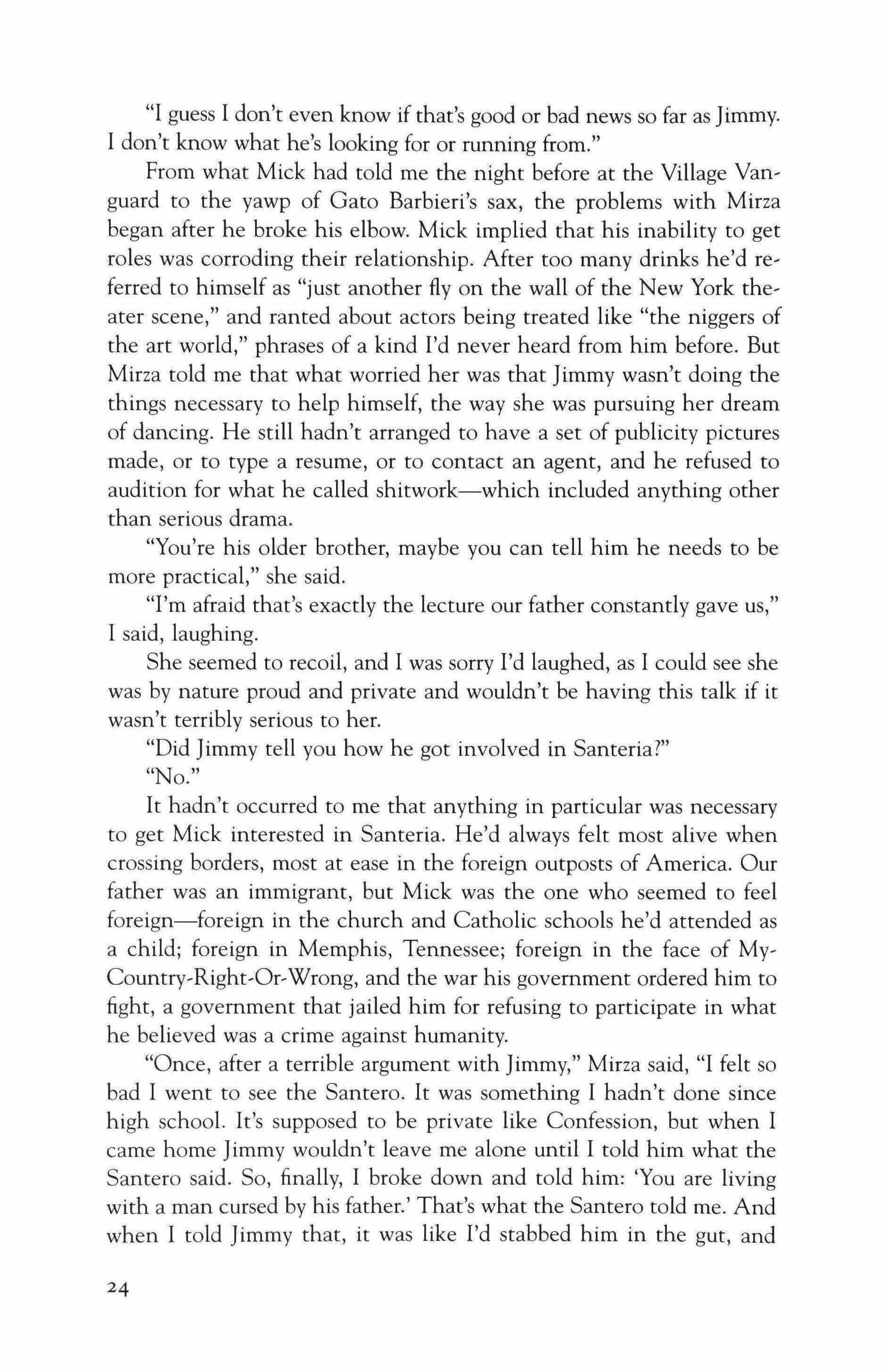
"I guess I don't even know if that's good or bad news so far as Jimmy. I don't know what he's looking for or running from."
From what Mick had told me the night before at the Village Vanguard to the yawp of Gato Barbieri's sax, the problems with Mirza began after he broke his elbow. Mick implied that his inability to get roles was corroding their relationship. After too many drinks he'd referred to himself as "just another fly on the wall of the New York theater scene," and ranted about actors being treated like "the niggers of the art world," phrases of a kind I'd never heard from him before. But Mirza told me that what worried her was that Jimmy wasn't doing the things necessary to help himself, the way she was pursuing her dream of dancing. He still hadn't arranged to have a set of publicity pictures made, or to type a resume, or to contact an agent, and he refused to audition for what he called shitwork-which included anything other than serious drama.
"You're his older brother, maybe you can tell him he needs to be more practical," she said.
"I'm afraid that's exactly the lecture our father constantly gave us," I said, laughing.
She seemed to recoil, and I was sorry I'd laughed, as I could see she was by nature proud and private and wouldn't be having this talk if it wasn't terribly serious to her.
"Did Jimmy tell you how he got involved in Santeria?" "No."
It hadn't occurred to me that anything in particular was necessary to get Mick interested in Santeria. He'd always felt most alive when crossing borders, most at ease in the foreign outposts of America. Our father was an immigrant, but Mick was the one who seemed to feel foreign-foreign in the church and Catholic schools he'd attended as a child; foreign in Memphis, Tennessee; foreign in the face of MyCountrv-Right-Or-Wrong, and the war his government ordered him to fight, a government that jailed him for refusing to participate in what he believed was a crime against humanity.
"Once, after a terrible argument with Jimmy," Mirza said, "I felt so bad I went to see the Santero. It was something I hadn't done since high school. It's supposed to be private like Confession, but when I came home Jimmy wouldn't leave me alone until I told him what the Santero said. So, finally, I broke down and told him: 'You are living with a man cursed by his father.' That's what the Santero told me. And when I told Jimmy that, it was like I'd stabbed him in the gut, and
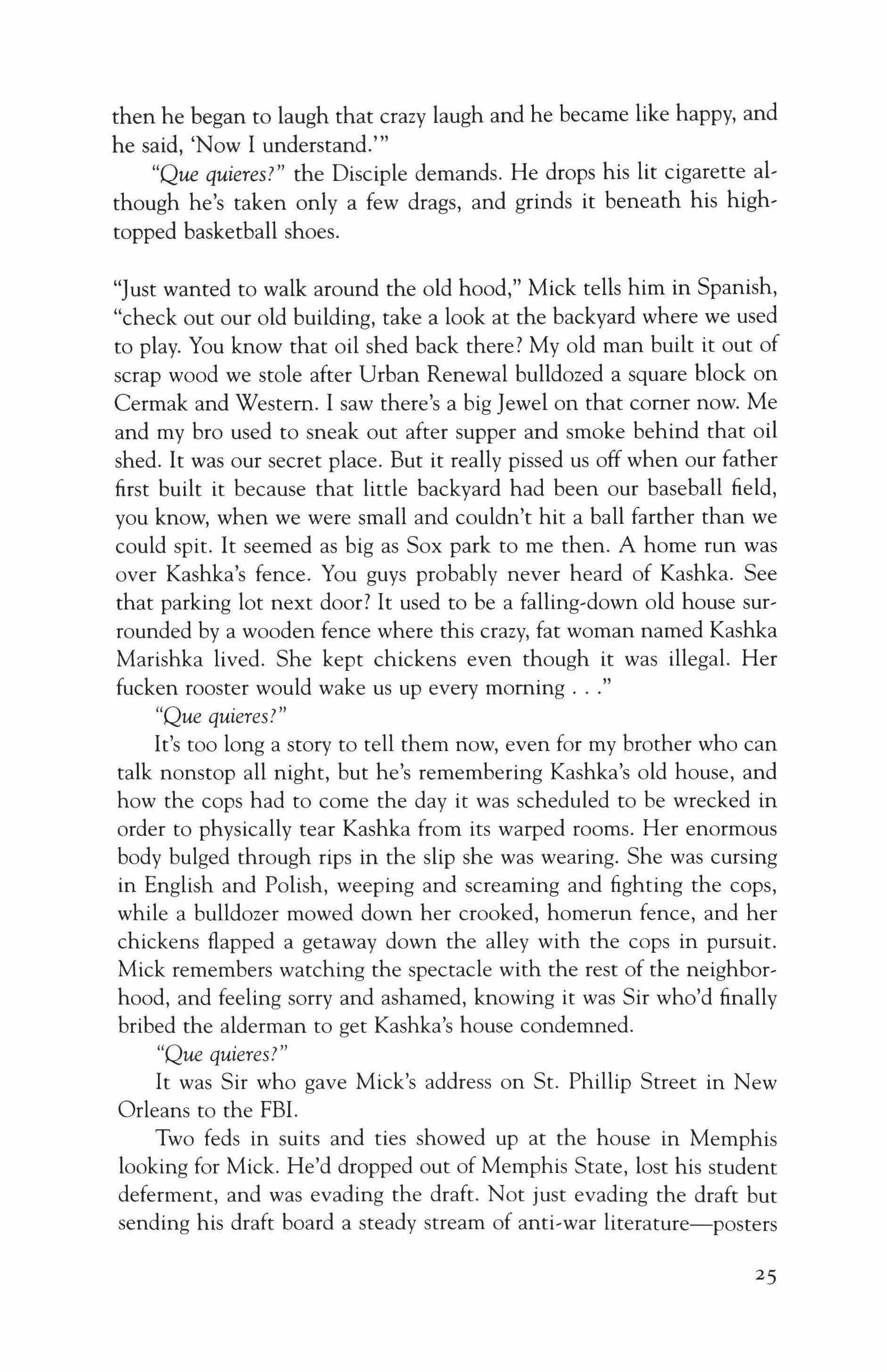
then he began to laugh that crazy laugh and he became like happy, and he said, 'Now I understand.'"
"Que quieres?" the Disciple demands. He drops his lit cigarette although he's taken only a few drags, and grinds it beneath his hightopped basketball shoes.
"Just wanted to walk around the old hood," Mick tells him in Spanish, "check out our old building, take a look at the backyard where we used to play. You know that oil shed back there? My old man built it out of scrap wood we stole after Urban Renewal bulldozed a square block on Cermak and Western. I saw there's a big Jewel on that comer now. Me and my bro used to sneak out after supper and smoke behind that oil shed. It was our secret place. But it really pissed us off when our father first built it because that little backyard had been our baseball field, you know, when we were small and couldn't hit a ball farther than we could spit. It seemed as big as Sox park to me then. A home run was over Kashka's fence. You guys probably never heard of Kashka. See that parking lot next door? It used to be a falling-down old house surrounded by a wooden fence where this crazy, fat woman named Kashka Marishka lived. She kept chickens even though it was illegal. Her fucken rooster would wake us up every morning "
"Q 7" ue qUleres.
It's too long a story to tell them now, even for my brother who can talk nonstop all night, but he's remembering Kashka's old house, and how the cops had to come the day it was scheduled to be wrecked in order to physically tear Kashka from its warped rooms. Her enormous body bulged through rips in the slip she was wearing. She was cursing in English and Polish, weeping and screaming and fighting the cops, while a bulldozer mowed down her crooked, homerun fence, and her chickens flapped a getaway down the alley with the cops in pursuit. Mick remembers watching the spectacle with the rest of the neighborhood, and feeling sorry and ashamed, knowing it was Sir who'd finally bribed the alderman to get Kashka's house condemned.
"Que quieres?"
It was Sir who gave Mick's address on St. Phillip Street in New Orleans to the FBI.
Two feds in suits and ties showed up at the house in Memphis looking for Mick. He'd dropped out of Memphis State, lost his student deferment, and was evading the draft. Not just evading the draft but sending his draft board a steady stream of anti-war literature-posters
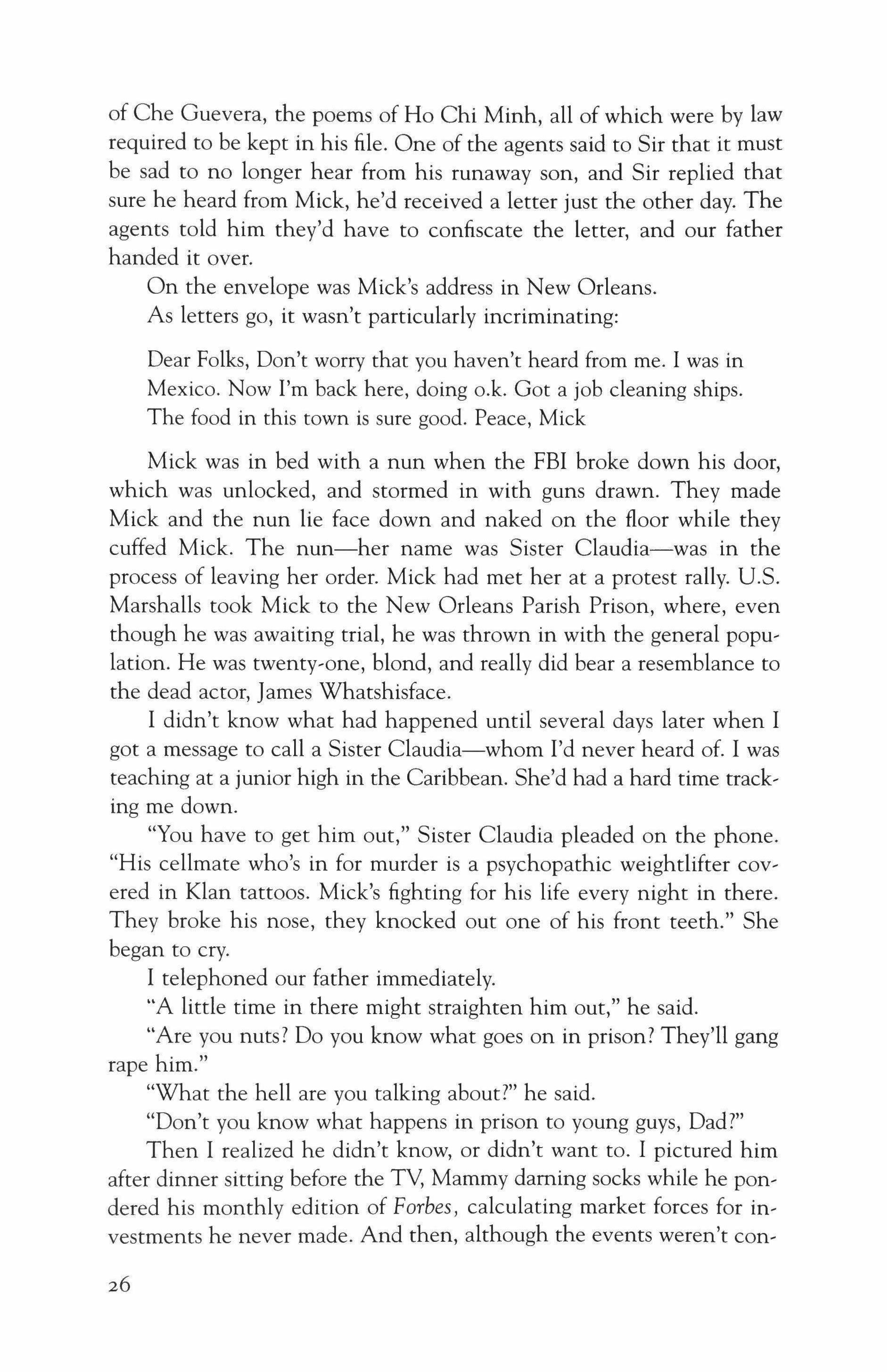
of Che Guevera, the poems of Ho Chi Minh, all of which were by law required to be kept in his file. One of the agents said to Sir that it must be sad to no longer hear from his runaway son, and Sir replied that sure he heard from Mick, he'd received a letter just the other day. The agents told him they'd have to confiscate the letter, and our father handed it over.
On the envelope was Mick's address in New Orleans.
As letters go, it wasn't particularly incriminating:
Dear Folks, Don't worry that you haven't heard from me. I was in Mexico. Now I'm back here, doing o.k. Got a job cleaning ships.
The food in this town is sure good. Peace, Mick
Mick was in bed with a nun when the FBI broke down his door, which was unlocked, and stormed in with guns drawn. They made Mick and the nun lie face down and naked on the floor while they cuffed Mick. The nun-her name was Sister Claudia-was in the process of leaving her order. Mick had met her at a protest rally. U.S. Marshalls took Mick to the New Orleans Parish Prison, where, even though he was awaiting trial, he was thrown in with the general population. He was twenty-one, blond, and really did bear a resemblance to the dead actor, James Whatshisface.
I didn't know what had happened until several days later when I got a message to call a Sister Claudia-whom I'd never heard of. I was teaching at a junior high in the Caribbean. She'd had a hard time tracking me down.
"You have to get him out," Sister Claudia pleaded on the phone. "His cellmate who's in for murder is a psychopathic weightlifter covered in Klan tattoos. Mick's fighting for his life every night in there. They broke his nose, they knocked out one of his front teeth." She began to cry.
I telephoned our father immediately.
"A little time in there might straighten him out," he said.
"Are you nuts? Do you know what goes on in prison? They'll gang rape him."
"What the hell are you talking about?" he said.
"Don't you know what happens in prison to young guys, Dad?"
Then I realized he didn't know, or didn't want to. I pictured him after dinner sitting before the TV, Mammy darning socks while he pondered his monthly edition of Forbes, calculating market forces for investments he never made. And then, although the events weren't con-
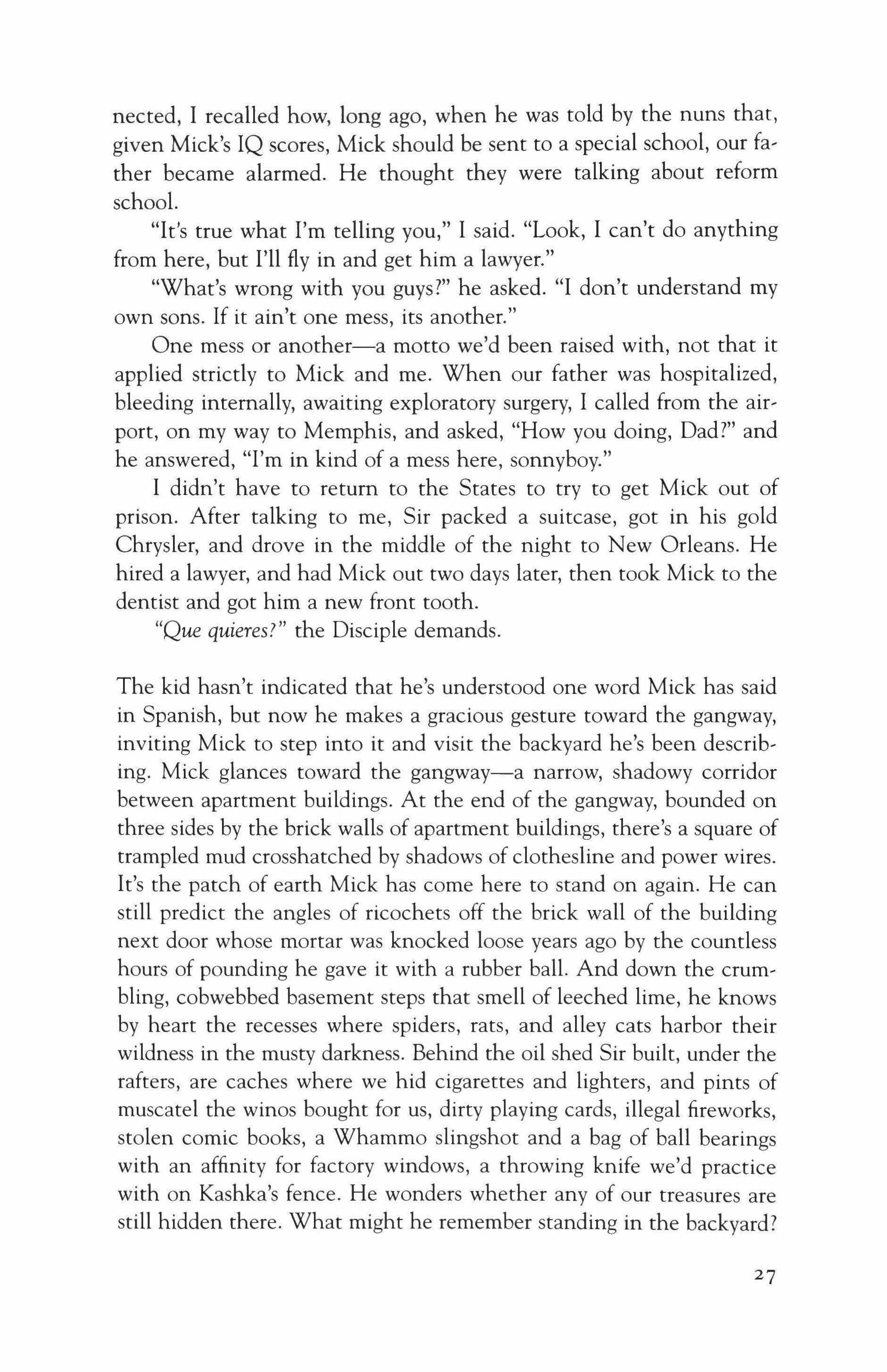
nected, I recalled how, long ago, when he was told by the nuns that, given Mick's IQ scores, Mick should be sent to a special school, our fa' ther became alarmed. He thought they were talking about reform school.
"It's true what I'm telling you," I said. "Look, I can't do anything from here, but I'll fly in and get him a lawyer."
"What's wrong with you guys?" he asked. "I don't understand my own sons. If it ain't one mess, its another."
One mess or another-a motto we'd been raised with, not that it applied strictly to Mick and me. When our father was hospitalized, bleeding internally, awaiting exploratory surgery, I called from the air' port, on my way to Memphis, and asked, "How you doing, Dad?" and he answered, "I'm in kind of a mess here, sonnyboy."
I didn't have to return to the States to try to get Mick out of prison. After talking to me, Sir packed a suitcase, got in his gold Chrysler, and drove in the middle of the night to New Orleans. He hired a lawyer, and had Mick out two days later, then took Mick to the dentist and got him a new front tooth.
"Que quieres?" the Disciple demands.
The kid hasn't indicated that he's understood one word Mick has said in Spanish, but now he makes a gracious gesture toward the gangway, inviting Mick to step into it and visit the backyard he's been describing. Mick glances toward the gangway-a narrow, shadowy corridor between apartment buildings. At the end of the gangway, bounded on three sides by the brick walls of apartment buildings, there's a square of trampled mud crosshatched by shadows of clothesline and power wires. It's the patch of earth Mick has come here to stand on again. He can still predict the angles of ricochets off the brick wall of the building next door whose mortar was knocked loose years ago by the countless hours of pounding he gave it with a rubber ball. And down the crumbling, cobwebbed basement steps that smell of leeched lime, he knows by heart the recesses where spiders, rats, and alley cats harbor their wildness in the musty darkness. Behind the oil shed Sir built, under the rafters, are caches where we hid cigarettes and lighters, and pints of muscatel the winos bought for us, dirty playing cards, illegal fireworks, stolen comic books, a Whammo slingshot and a bag of ball bearings with an affinity for factory windows, a throwing knife we'd practice with on Kashka's fence. He wonders whether any of our treasures are still hidden there. What might he remember standing in the backyard?
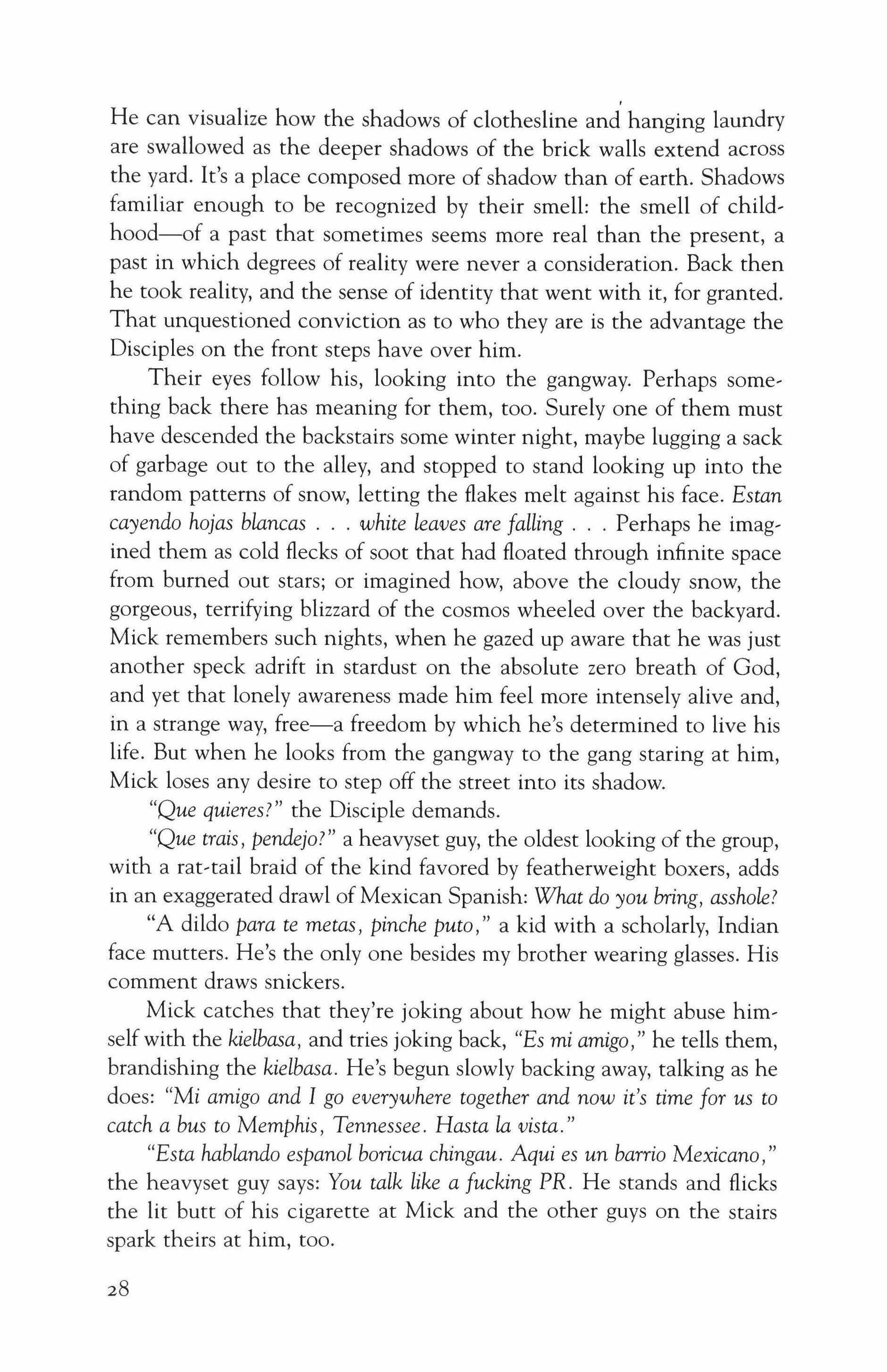
He can visualize how the shadows of clothesline and hanging laundry are swallowed as the deeper shadows of the brick walls extend across the yard. It's a place composed more of shadow than of earth. Shadows familiar enough to be recognized by their smell: the smell of childhood-of a past that sometimes seems more real than the present, a past in which degrees of reality were never a consideration. Back then he took reality, and the sense of identity that went with it, for granted. That unquestioned conviction as to who they are is the advantage the Disciples on the front steps have over him.
Their eyes follow his, looking into the gangway. Perhaps something back there has meaning for them, too. Surely one of them must have descended the backstairs some winter night, maybe lugging a sack of garbage out to the alley, and stopped to stand looking up into the random patterns of snow, letting the flakes melt against his face. Estan cayendo hojas blancas white leaves are falling Perhaps he imagined them as cold flecks of soot that had floated through infinite space from burned out stars; or imagined how, above the cloudy snow, the gorgeous, terrifying blizzard of the cosmos wheeled over the backyard. Mick remembers such nights, when he gazed up aware that he was just another speck adrift in stardust on the absolute zero breath of God, and yet that lonely awareness made him feel more intensely alive and, in a strange way, free-a freedom by which he's determined to live his life. But when he looks from the gangway to the gang staring at him, Mick loses any desire to step off the street into its shadow.
"Que quieres?" the Disciple demands.
"Que tsais, pendejo?" a heavyset guy, the oldest looking of the group, with a rat-tail braid of the kind favored by featherweight boxers, adds in an exaggerated drawl of Mexican Spanish: What do you bring, asshole?
"A dildo para te metas, pinche puto," a kid with a scholarly, Indian face mutters. He's the only one besides my brother wearing glasses. His comment draws snickers.
Mick catches that they're joking about how he might abuse himself with the kielbasa, and tries joking back, "Es mi amigo," he tells them, brandishing the kielbasa. He's begun slowly backing away, talking as he does: "Mi amigo and I go everywhere together and now it's time for us to catch a bus to Memphis, Tennessee. Hasta la vista."
"Esta hablando espanol boricua chingau. Aqui es un barrio Mexicano," the heavyset guy says: You talk like a fucking PRo He stands and flicks the lit butt of his cigarette at Mick and the other guys on the stairs spark theirs at him, too.
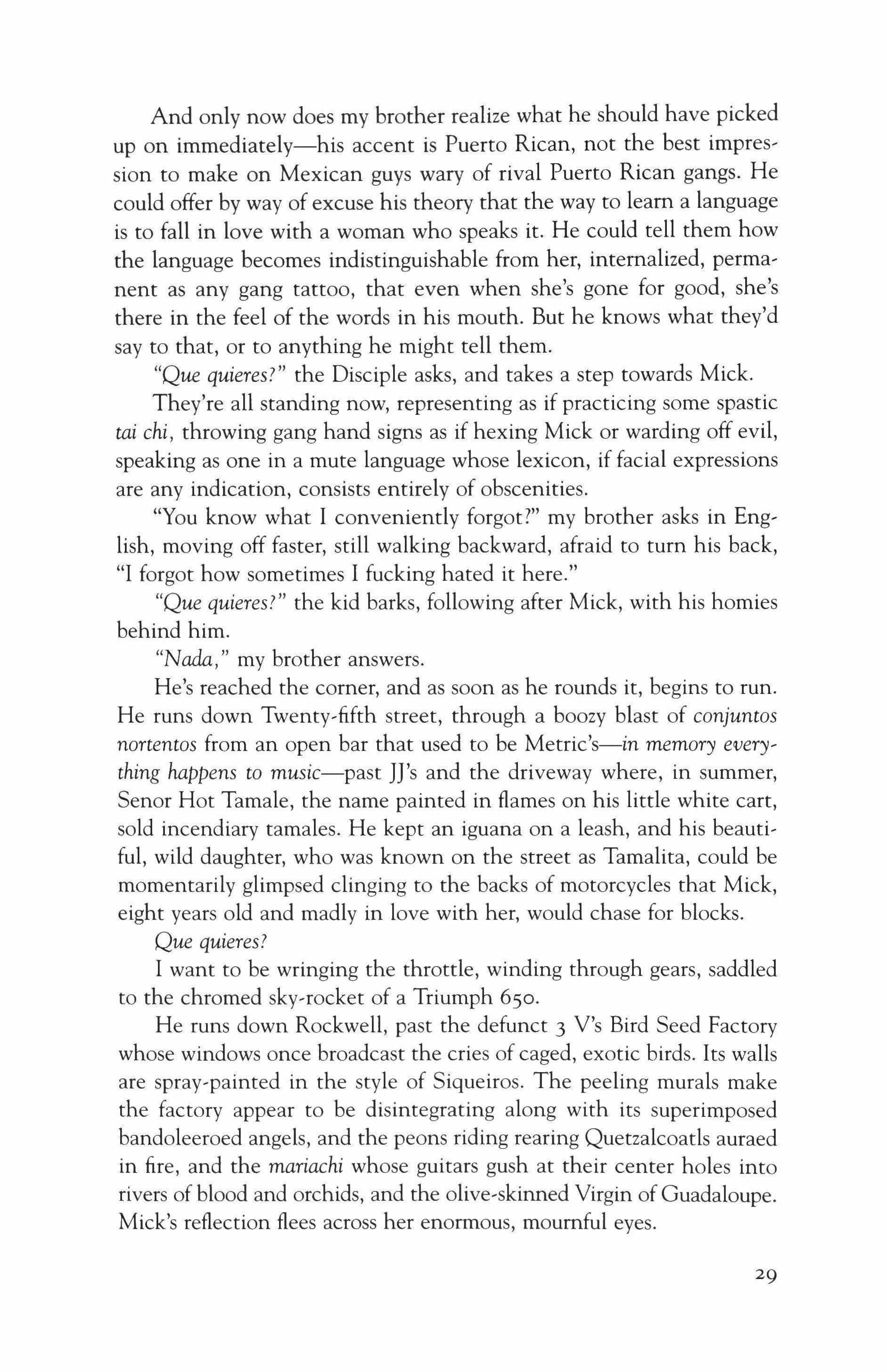
And only now does my brother realize what he should have picked up on immediately-his accent is Puerto Rican, not the best impression to make on Mexican guys wary of rival Puerto Rican gangs. He could offer by way of excuse his theory that the way to learn a language is to fall in love with a woman who speaks it. He could tell them how the language becomes indistinguishable from her, internalized, permanent as any gang tattoo, that even when she's gone for good, she's there in the feel of the words in his mouth. But he knows what they'd say to that, or to anything he might tell them.
"Que quieres?" the Disciple asks, and takes a step towards Mick.
They're all standing now, representing as if practicing some spastic tai chi, throwing gang hand signs as if hexing Mick or warding off evil, speaking as one in a mute language whose lexicon, if facial expressions are any indication, consists entirely of obscenities.
"You know what I conveniently forgot?" my brother asks in Eng' lish, moving off faster, still walking backward, afraid to tum his back, "I forgot how sometimes I fucking hated it here."
"Que quieres?" the kid barks, following after Mick, with his homies behind him.
"Nada," my brother answers.
He's reached the comer, and as soon as he rounds it, begins to run. He runs down Twenty-fifth street, through a boozy blast of conjuntos nortentos from an open bar that used to be Metric's-in memory every, thing happens to music-past JJ's and the driveway where, in summer, Senor Hot Tamale, the name painted in flames on his little white cart, sold incendiary tamales. He kept an iguana on a leash, and his beautiful, wild daughter, who was known on the street as Tamalita, could be momentarily glimpsed clinging to the backs of motorcycles that Mick, eight years old and madly in love with her, would chase for blocks.
Que quieres?
I want to be wringing the throttle, winding through gears, saddled to the chromed sky-rocker of a Triumph 650.
He runs down Rockwell, past the defunct 3 V's Bird Seed Factory whose windows once broadcast the cries of caged, exotic birds. Its walls are spray'painted in the style of Siqueiros. The peeling murals make the factory appear to be disintegrating along with its superimposed bandoleeroed angels, and the peons riding rearing Quetzalcoatls auraed in fire, and the mariachi whose guitars gush at their center holes into rivers of blood and orchids, and the olive-skinned Virgin of Guadaloupe. Mick's reflection flees across her enormous, mournful eyes.
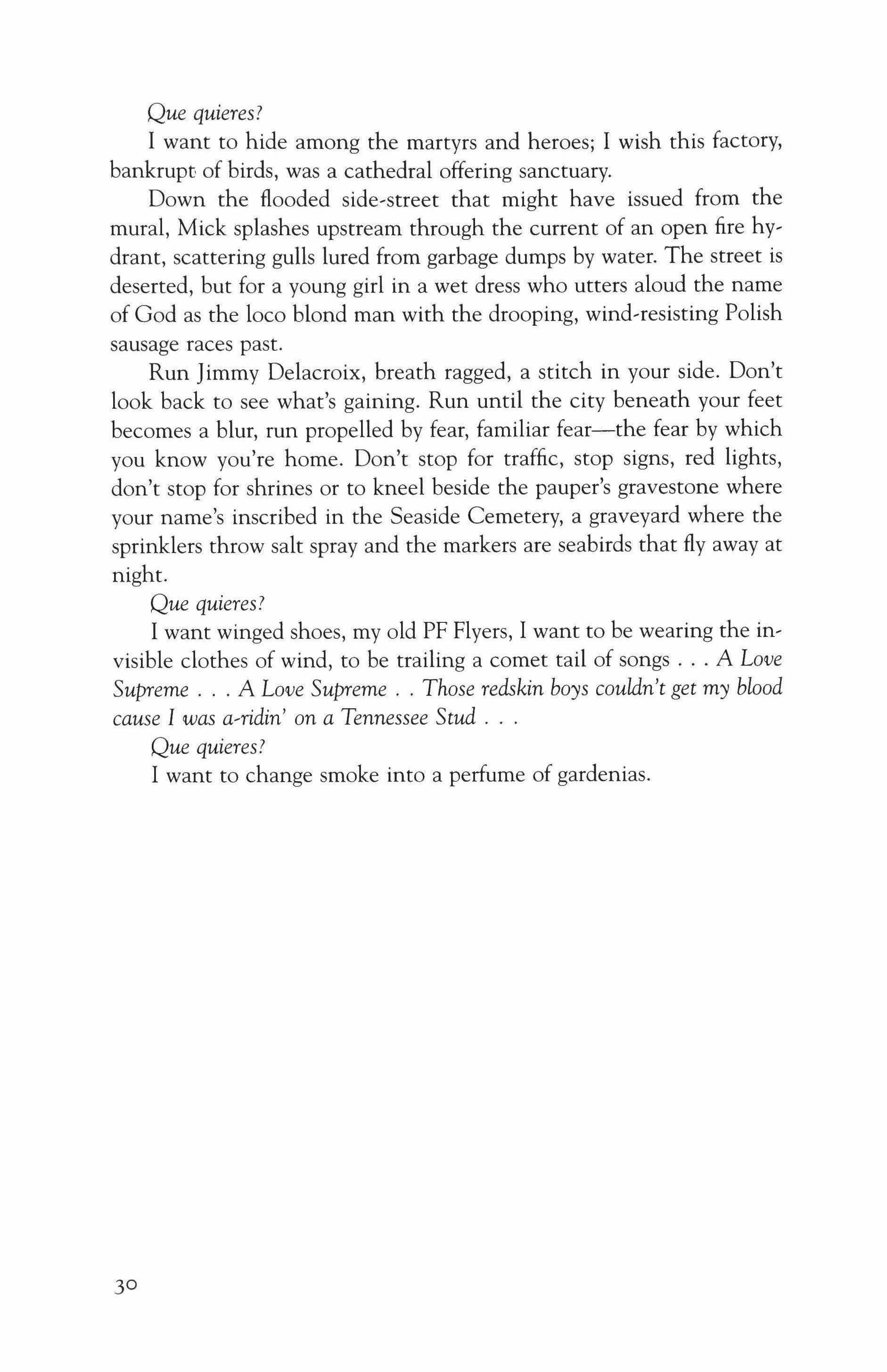
Que quieres?
I want to hide among the martyrs and heroes; I wish this factory, bankrupt. of birds, was a cathedral offering sanctuary.
Down the flooded side-street that might have issued from the mural, Mick splashes upstream through the current of an open fire hvdrant, scattering gulls lured from garbage dumps by water. The street is deserted, but for a young girl in a wet dress who utters aloud the name of God as the loco blond man with the drooping, wind-resisting Polish sausage races past.
Run Jimmy Delacroix, breath ragged, a stitch in your side. Don't look back to see what's gaining. Run until the city beneath your feet becomes a blur, run propelled by fear, familiar fear-the fear by which you know you're home. Don't stop for traffic, stop signs, red lights, don't stop for shrines or to kneel beside the pauper's gravestone where your name's inscribed in the Seaside Cemetery, a graveyard where the sprinklers throw salt spray and the markers are seabirds that flyaway at night.
Que quieres?
I want winged shoes, myoId PF Flyers, I want to be wearing the invisible clothes of wind, to be trailing a comet tail of songs A Love Supreme A Love Supreme Those redskin boys couldn't get my blood cause I was a�ridin' on a Tennessee Stud
Que quieres?
I want to change smoke into a perfume of gardenias.
30
Lydia R. Diamond

The Inside
(Emma, an attractive young Ajncan-Amenccn woman addresses audience as she makes her way toward stage.)
Act I
Sometimes, a while after writing, and a little before performance is this place of quiet. And sometimes it's not so quiet, but really it needs to be shared. Because if ever there was time to address a randomly attired group of relatively diverse people, it would probably be now, because hell, you paid. And, if there was ever a time to wonder at the simplicity of life, and the beauty of simplicity, well it's not now. But I'm quite sure that here is a fraction of something that matters. Something that should just hit the air for long enough to land where it will something simple. It's not so much that you need to hear it as that it needs to be said. (Emma steps onto stage.) That this is where I exist, because where else is there for me to be?
Think.
(Establish Party rnusic/lighting.)
It started out not a lot different from any other painfully liberal, preprofessional, anti-establishment, artistic event. A lot of wine, a few daiquiris, a well-worn Asian rug from someone's grandmother's base-
31
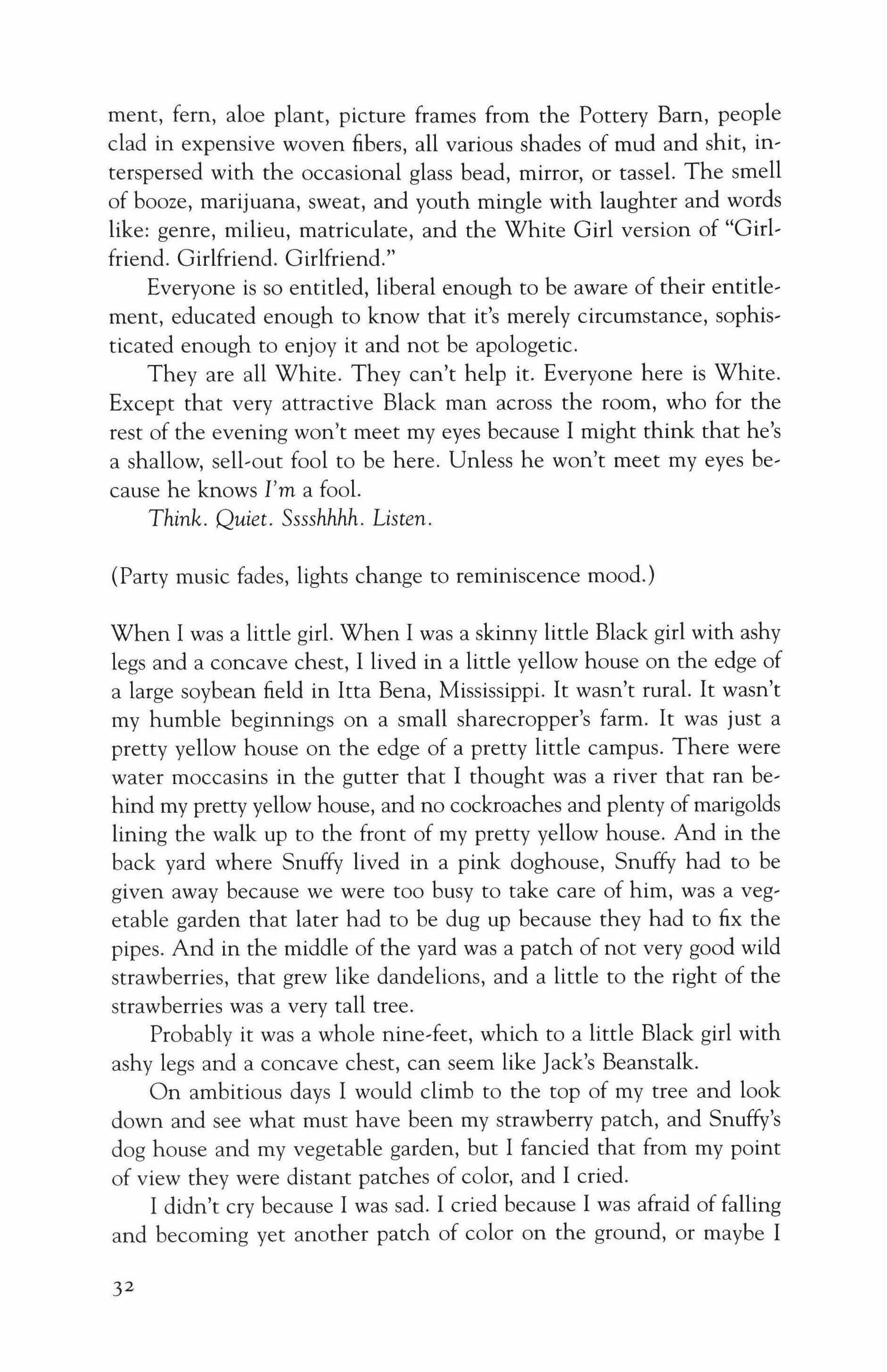
ment, fern, aloe plant, picture frames from the Pottery Barn, people clad in expensive woven fibers, all various shades of mud and shit, interspersed with the occasional glass bead, mirror, or tassel. The smell of booze, marijuana, sweat, and youth mingle with laughter and words like: genre, milieu, matriculate, and the White Girl version of "Girlfriend. Girlfriend. Girlfriend."
Everyone is so entitled, liberal enough to be aware of their entitlement, educated enough to know that it's merely circumstance, sophisticated enough to enjoy it and not be apologetic.
They are all White. They can't help it. Everyone here is White. Except that very attractive Black man across the room, who for the rest of the evening won't meet my eyes because I might think that he's a shallow, sell-out fool to be here. Unless he won't meet my eyes because he knows I'm a fool.
Think. Quiet. Sssshhhh. Listen.
(Party music fades, lights change to reminiscence mood.)
When I was a little girl. When I was a skinny little Black girl with ashy legs and a concave chest, I lived in a little yellow house on the edge of a large soybean field in Itta Bena, Mississippi. It wasn't rural. It wasn't my humble beginnings on a small sharecropper's farm. It was just a pretty yellow house on the edge of a pretty little campus. There were water moccasins in the gutter that I thought was a river that ran behind my pretty yellow house, and no cockroaches and plenty of marigolds lining the walk up to the front of my pretty yellow house. And in the back yard where Snuffy lived in a pink doghouse, Snuffy had to be given away because we were too busy to take care of him, was a vegetable garden that later had to be dug up because they had to fix the pipes. And in the middle of the yard was a patch of not very good wild strawberries, that grew like dandelions, and a little to the right of the strawberries was a very tall tree.
Probably it was a whole nine-feet, which to a little Black girl with ashy legs and a concave chest, can seem like Jack's Beanstalk.
On ambitious days I would climb to the top of my tree and look down and see what must have been my strawberry patch, and Snuffy's dog house and my vegetable garden, but I fancied that from my point of view they were distant patches of color, and I cried.
I didn't cry because I was sad. I cried because I was afraid of falling and becoming yet another patch of color on the ground, or maybe I
32

wouldn't show up at all, since the ground in Mississippi was often as brown as it was green, and Jimmy's mother said if your foot got stuck in a water moccasin hole to pour milk in the other hole and they would go there and you could take your foot out. And I would cry be, cause I was too high up and could not climb down, and now I was con' vinced that there was a family of water moccasins, or at least a boa constrictor in the tree. And after I'd cried, loudly, for what seemed like a very long time, Mommy would come out and look up and say "What's the problem?" To which I would reply, "Nothing." To which she would reply, "Oh, I thought there was a problem," and go back in' side. The tears would stop just long enough for me to consider how unjustly I'd been treated, and, come to think of it, hadn't my life taken a rather unjust path, and wouldn't Mommy be sorry when there was no more little Black girl for her to be proud of. And Grandma would say, "you left my baby up in a tree with a bunch of boa constrictors, Beverly?" And I would wail for all the injustices of the world, and Mommy would come out again, and look up and say, "What's the problem?" To which I would reply, "I'm stuck Mommy." To which she would reply, "Well the way I see this, there are two choices." A long moment of silence and much sniffling and hiccuping then a very meek, "What?" "The way I see it," Mommy would continue, undaunted, "Is that you have two choices. You can either climb down the tree, or you can fall down. But either way dinner's at 5:00."
Think, quiet, Sssh, listen
(Light changes.)
When I was a little girl. Not little enough to be cute. That place that is a little to the right of little and cute and as far as you can get from young and beautiful. So. When I was eleven and living with my mother in a small sophisticated college town in New England, a few years after the small yellow house in Mississippi, I played the violin. It was a family rule that all children would learn history, math, science, English, and a musical instrument until economic independence or death.
(Youthful violin sounds. Not painful, but far from sentimental. A Suzuki book number three etude of some sort.)
I really didn't enjoy it as much as I might have if I'd been good at it.
33
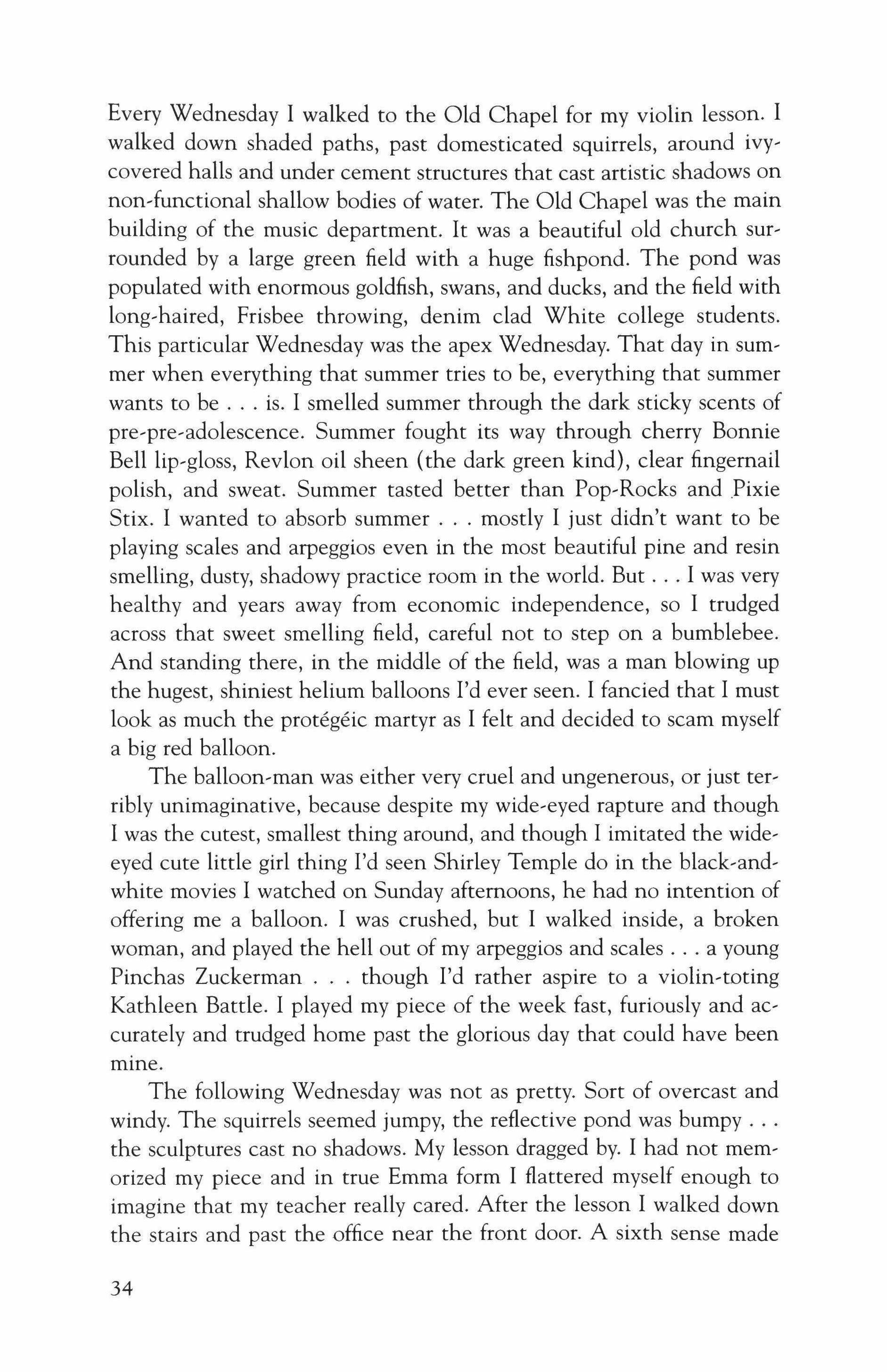
Every Wednesday I walked to the Old Chapel for my violin lesson. I walked down shaded paths, past domesticated squirrels, around ivycovered halls and under cement structures that cast artistic shadows on non-functional shallow bodies of water. The Old Chapel was the main building of the music department. It was a beautiful old church surrounded by a large green field with a huge fishpond. The pond was populated with enormous goldfish, swans, and ducks, and the field with long-haired, Frisbee throwing, denim clad White college students. This particular Wednesday was the apex Wednesday. That day in summer when everything that summer tries to be, everything that summer wants to be is. I smelled summer through the dark sticky scents of pre-pre-adolescence. Summer fought its way through cherry Bonnie Bell lip-gloss, Revlon oil sheen (the dark green kind), clear fingernail polish, and sweat. Summer tasted better than Pop-Rocks and Pixie Stix. I wanted to absorb summer mostly I just didn't want to be playing scales and arpeggios even in the most beautiful pine and resin smelling, dusty, shadowy practice room in the world. But I was very healthy and years away from economic independence, so I trudged across that sweet smelling field, careful not to step on a bumblebee. And standing there, in the middle of the field, was a man blowing up the hugest, shiniest helium balloons I'd ever seen. I fancied that I must look as much the protegeic martyr as I felt and decided to scam myself a big red balloon.
The balloon-man was either very cruel and ungenerous, or just terribly unimaginative, because despite my wide-eyed rapture and though I was the cutest, smallest thing around, and though I imitated the wideeyed cute little girl thing I'd seen Shirley Temple do in the black-andwhite movies I watched on Sunday afternoons, he had no intention of offering me a balloon. I was crushed, but I walked inside, a broken woman, and played the hell out of my arpeggios and scales a young Pinchas Zuckerman though I'd rather aspire to a violin-toting Kathleen Battle. I played my piece of the week fast, furiously and accurately and trudged home past the glorious day that could have been mine.
The following Wednesday was not as pretty. Sort of overcast and windy. The squirrels seemed jumpy, the reflective pond was bumpy the sculptures cast no shadows. My lesson dragged by. I had not memorized my piece and in true Emma form I flattered myself enough to imagine that my teacher really cared. After the lesson I walked down the stairs and past the office near the front door. A sixth sense made
34

me look over my left shoulder and into the room past Becky, the workstudy receptionist who always insisted on speaking to me as though I were four. There, floating, bobbing, smiling at me, was the largest, shiniest red balloon I'd ever seen. It was framed perfectly by the tall, dusty cathedral window, the natural back lighting formed a sort of halo around it.
"What's that?" I asked.
The events that happened after that happened in a sort of accelerated slow motion. "That's a ba-loon," said Becky, as she reached for a piece of paper taped to the balloon "It says it's for Emma from Dr. Barton." The chairperson of the music department. I see Becky's hand touching the paper, with a twist of the wrist it is removed and the balloon is exploding in a cloud of condensed breath And deflated rubber.
Think, Quiet, Sssh, Listen That the little Black girl sitting on the bench
(Lights change.)
When I was about thirteen I had cramps really bad. I was living with my father at the time. I've never told him that I menstruate. It had, especially then, never occurred to me that he might know about menstruation. I really thought I was dying. I mean really, there were these little men ice skating with cheese graters on my ovaries and playing tug-ofwar with my lower intestines. I really wanted to die. But no. I refused to die before adolescence was over. I saw the end of adolescence as a beacon, a light at the end of the tunnel that would deliver me into a world of clear skin, social grace, startling intellect, butt long hair, and sex! So, I'm lying here on the bed and I think that I really am dying and I get real scared, because my hair's only still down to right below my ears, and there's so much to live for, what with being a pimply face too smart Black teenager in an all White Catholic school. So for the first time in my Black, middle-class, devoutly agnostic life, I began to pray. And I prayed so hard to live and I thanked God for all that I had been given and I asked for forgiveness for all the bad things I had thought about the people I loved, like my dad and his White girlfriend who didn't know what to do with my hair. And I got better. So that's how I found God. And God became my best friend to talk to every night. And as he became my best friend he also became this beautiful Black man, who looked a lot like Malcolm X, not Den-
35
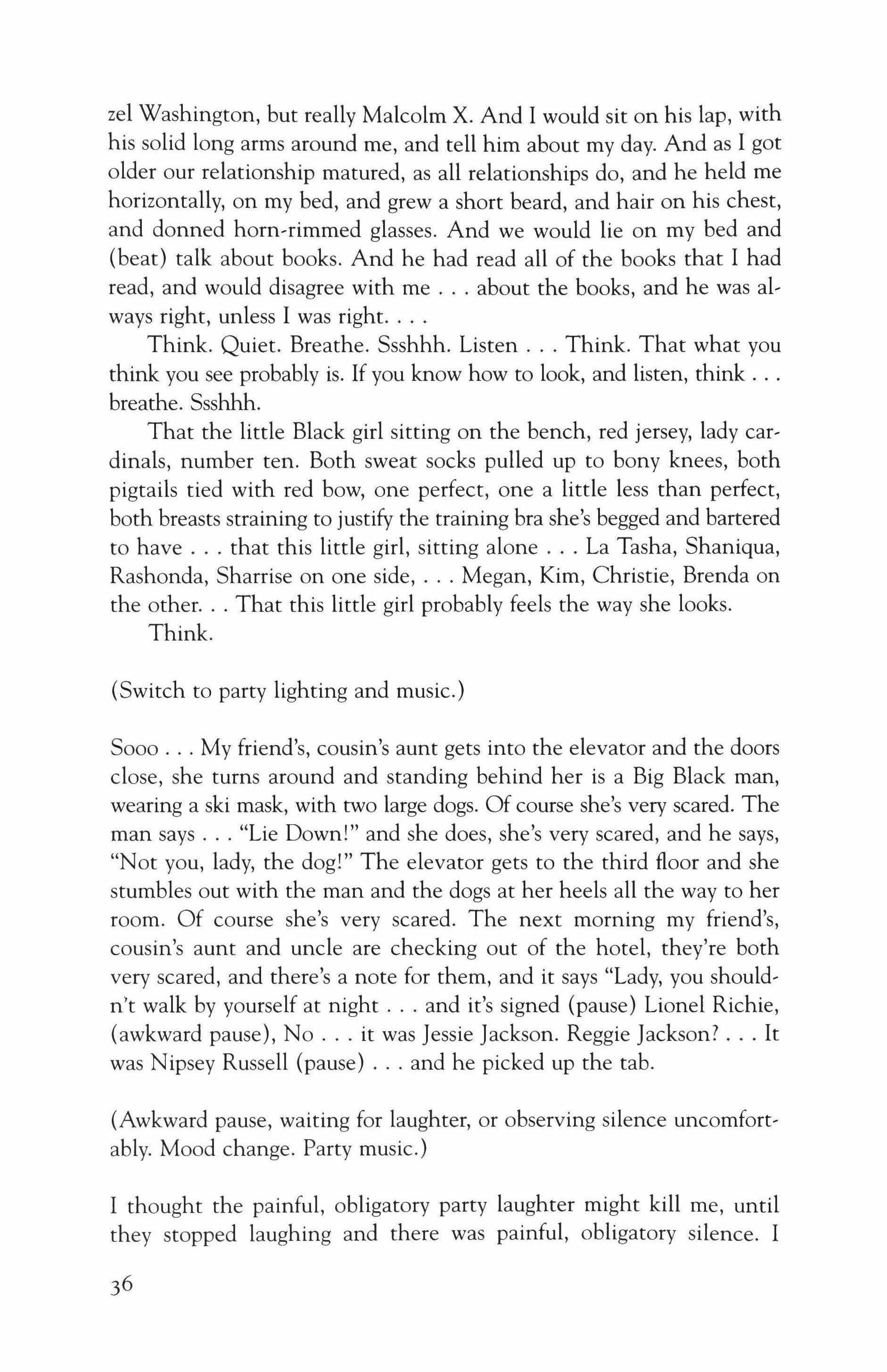
zel Washington, but really Malcolm X. And I would sit on his lap, with his solid long arms around me, and tell him about my day. And as I got older our relationship matured, as all relationships do, and he held me horizontally, on my bed, and grew a short beard, and hair on his chest, and donned horn,rimmed glasses. And we would lie on my bed and (beat) talk about books. And he had read all of the books that I had read, and would disagree with me about the books, and he was always right, unless I was right.
Think. Quiet. Breathe. Ssshhh. Listen Think. That what you think you see probably is. If you know how to look, and listen, think breathe. Ssshhh.
That the little Black girl sitting on the bench, red jersey, lady car, dinals, number ten. Both sweat socks pulled up to bony knees, both pigtails tied with red bow, one perfect, one a little less than perfect, both breasts straining to justify the training bra she's begged and bartered to have that this little girl, sitting alone La Tasha, Shaniqua, Rashonda, Sharrise on one side, Megan, Kim, Christie, Brenda on the other That this little girl probably feels the way she looks. Think.
(Switch to party lighting and music.)
Sooo My friend's, cousin's aunt gets into the elevator and the doors close, she turns around and standing behind her is a Big Black man, wearing a ski mask, with two large dogs. Of course she's very scared. The man says "Lie Down!" and she does, she's very scared, and he says, "Not you, lady, the dog!" The elevator gets to the third floor and she stumbles out with the man and the dogs at her heels all the way to her room. Of course she's very scared. The next morning my friend's, cousin's aunt and uncle are checking out of the hotel, they're both very scared, and there's a note for them, and it says "Lady, you should, n't walk by yourself at night and it's signed (pause) Lionel Richie, {awkward pause}, No it was Jessie Jackson. Reggie Jackson? It was Nipsey Russell (pause) and he picked up the tab.
{Awkward pause, waiting for laughter, or observing silence uncornfortably. Mood change. Party music.)
I thought the painful, obligatory party laughter might kill me, until they stopped laughing and there was painful, obligatory silence. I
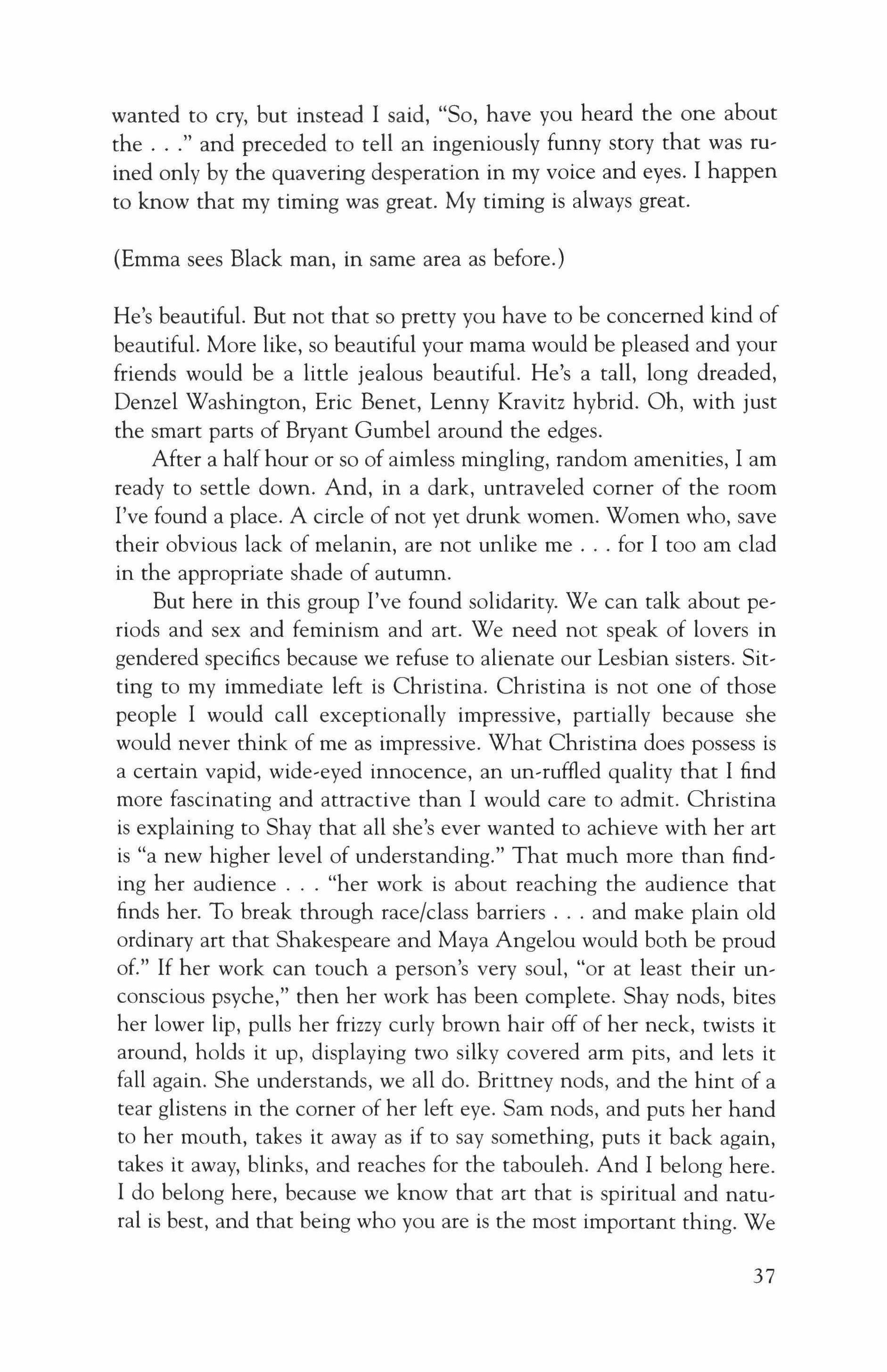
wanted to cry, but instead I said, "So, have you heard the one about the and preceded to tell an ingeniously funny story that was ruined only by the quavering desperation in my voice and eyes. I happen to know that my timing was great. My timing is always great.
(Emma sees Black man, in same area as before.)
He's beautiful. But not that so pretty you have to be concerned kind of beautiful. More like, so beautiful your mama would be pleased and your friends would be a little jealous beautiful. He's a tall, long dreaded, Denzel Washington, Eric Benet, Lenny Kravitz hybrid. Oh, with just the smart parts of Bryant Gumbel around the edges.
After a half hour or so of aimless mingling, random amenities, I am ready to settle down. And, in a dark, untraveled comer of the room I've found a place. A circle of not yet drunk women. Women who, save their obvious lack of melanin, are not unlike me for I too am clad in the appropriate shade of autumn.
But here in this group I've found solidarity. We can talk about periods and sex and feminism and art. We need not speak of lovers in gendered specifics because we refuse to alienate our Lesbian sisters. Sit, ting to my immediate left is Christina. Christina is not one of those people I would call exceptionally impressive, partially because she would never think of me as impressive. What Christina does possess is a certain vapid, wide-eyed innocence, an un,ruffled quality that I find more fascinating and attractive than I would care to admit. Christina is explaining to Shay that all she's ever wanted to achieve with her art is "a new higher level of understanding." That much more than find, ing her audience "her work is about reaching the audience that finds her. To break through race/class barriers and make plain old ordinary art that Shakespeare and Maya Angelou would both be proud of." If her work can touch a person's very soul, "or at least their unconscious psyche," then her work has been complete. Shay nods, bites her lower lip, pulls her frizzy curly brown hair off of her neck, twists it around, holds it up, displaying two silky covered arm pits, and lets it fall again. She understands, we all do. Brittney nods, and the hint of a tear glistens in the comer of her left eye. Sam nods, and puts her hand to her mouth, takes it away as if to say something, puts it back again, takes it away, blinks, and reaches for the tabouleh. And I belong here. I do belong here, because we know that art that is spiritual and natural is best, and that being who you are is the most important thing. We
37

know that we all get crazy from time to time, when we're dumped, when we flunk Middle Eastern Religion and its Sociological Implications in the Seventeenth Century, when we've had a bad hair day And we're always there with a cup of herbal tea and a quirky flower in an old salsa jar. With no one but these women can I know that my new, incredibly simple "Girl that looks like a sack" dress will be admired. Last year Brittney was sexually harassed, Sam was beaten, Hannah was given a highly contagious, though relatively mild venereal disease from a man who left her for his best friend Bob, Shay gained five pounds, lost a modeling contract, and checked into a clinic for eating disorders. We all shared these disasters, and they were. We all felt these disasters, because if it had not been one of us, it most certainly would have been the other. We're all painfully aware of the in� evitability of life. I'm thinking all of this when Hannah, perhaps the most lucky of this group of unquestionably beautiful, intelligent, White women, because she now has the best boyfriend says: "Yeah, I know what you mean, and that's why I feel so oppressed." And proceeds to connect art and love, love and feeling, feeling and vulnerability, vulnerability and oppression. "Because after all, that's what oppression is. Isn't it Emma?" Isn't it Emma? I glance from one silky, tearful, nodding head to another and (beat) fart. My own private fart. Universal stories of oppression fly around the group, I duck, I avoid, I manage not to notice, but occasionally one hits me squarely between the eyes and smarts a bit. Hannah, I notice, really is beautiful with full red lips and dark curly hair. She dresses well, the way rich White girls who buy their dresses in expensive vintage clothing shops and their shoes at Kenneth Cole. She always smells of cloves and White Linen. And she often forgets that she is oppressed "Do you do that Emma?"
A moment of silence. Is that awkward, or pregnant? And is it possible that I've forgotten to feel oppressed as a woman. What with negotiating the Black thing, perhaps I've had to put the "woman" thing on the back burner. Is this bad?
(Pause, mood change, story related to audience.)
When I was eight I went for ice cream with Elise, the little white French girl. Elise was beautiful. I know because everyone told me she was beautiful, and so I accepted this as fact. Elise had long thick chestnut brown hair, a fringe of bangs over round brown eyes that darted slivers of gold and mercury, full red lips and pale cheeks. The way I remember
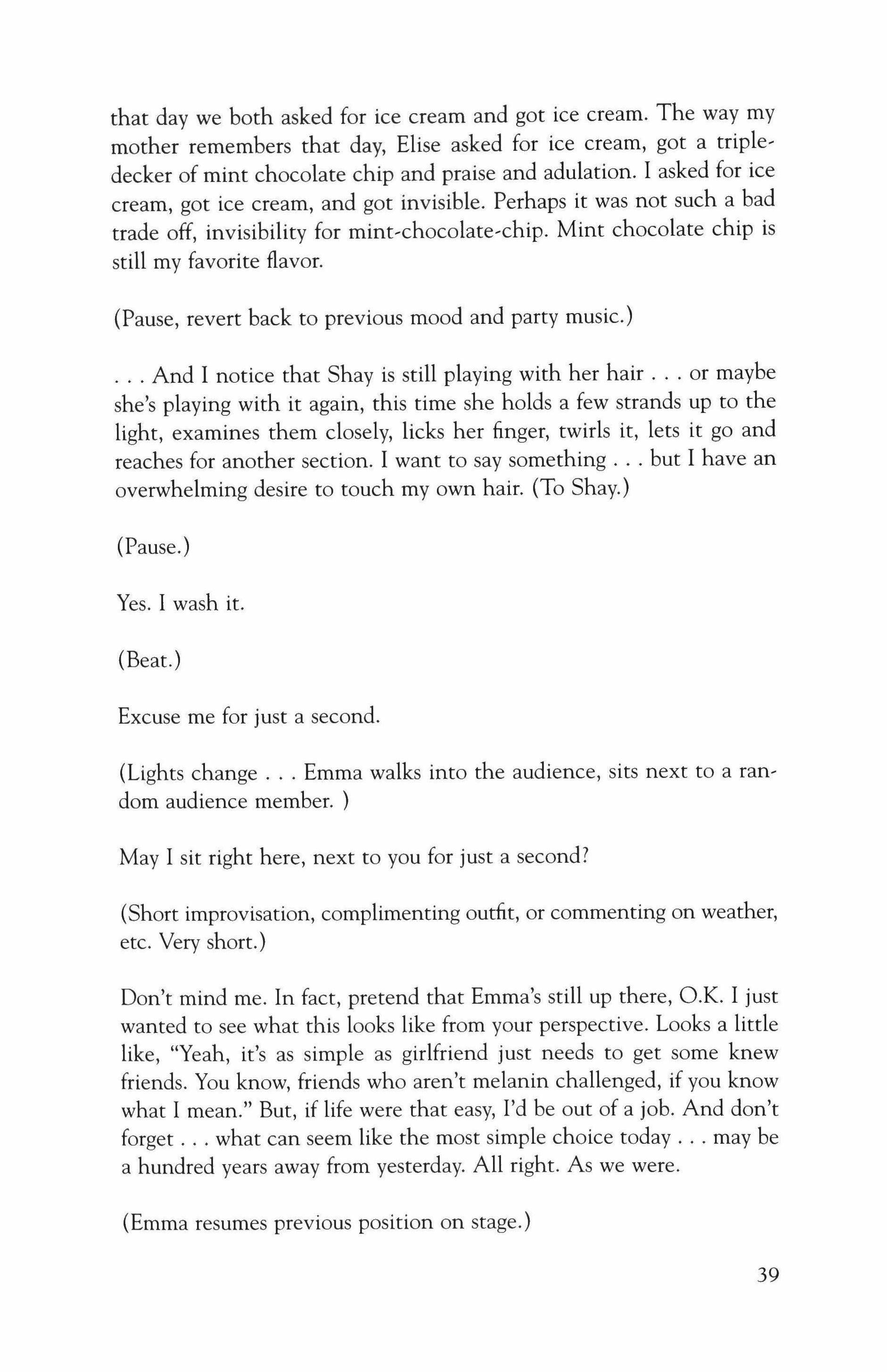
that day we both asked for ice cream and got ice cream. The way my mother remembers that day, Elise asked for ice cream, got a tripledecker of mint chocolate chip and praise and adulation. I asked for ice cream, got ice cream, and got invisible. Perhaps it was not such a bad trade off, invisibility for mint-chocolate-chip. Mint chocolate chip is still my favorite flavor.
(Pause, revert back to previous mood and party music.)
And I notice that Shay is still playing with her hair or maybe she's playing with it again, this time she holds a few strands up to the light, examines them closely, licks her finger, twirls it, lets it go and reaches for another section. I want to say something but I have an overwhelming desire to touch my own hair. (To Shay.)
(Pause.)
Yes. I wash it.
(Beat.)
Excuse me for just a second.
(Lights change Emma walks into the audience, sits next to a random audience member. )
May I sit right here, next to you for just a second?
(Short improvisation, complimenting outfit, or commenting on weather, etc. Very short.)
Don't mind me. In fact, pretend that Emma's still up there, O.K. I just wanted to see what this looks like from your perspective. Looks a little like, "Yeah, it's as simple as girlfriend just needs to get some knew friends. You know, friends who aren't melanin challenged, if you know what I mean." But, if life were that easy, I'd be out of a job. And don't forget what can seem like the most simple choice today may be a hundred years away from yesterday. All right. As we were.
(Emma resumes previous position on stage.)
39
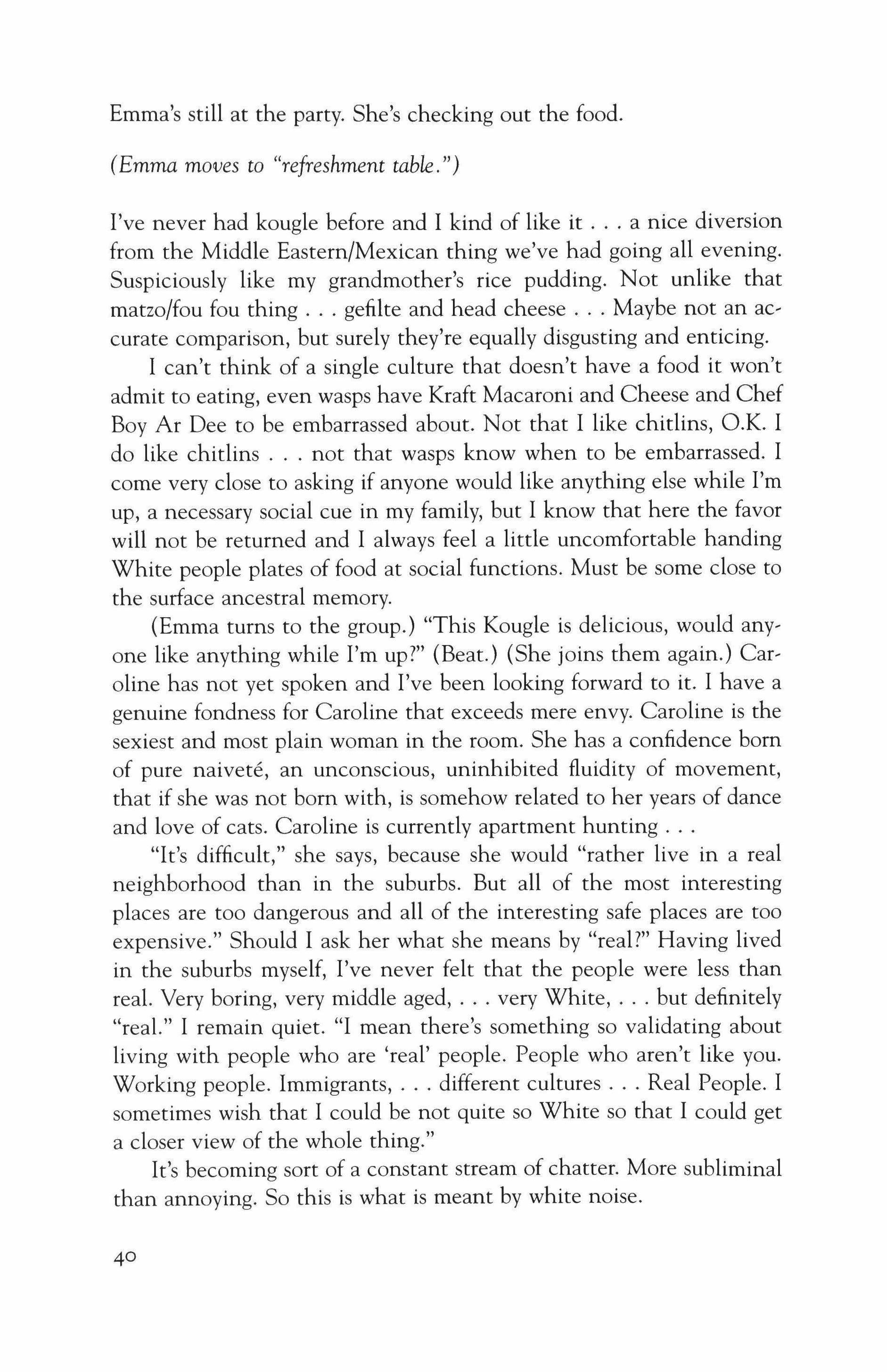
Emma's still at the party. She's checking out the food.
(Emma moves to "refreshment table.")
I've never had kougle before and I kind of like it a nice diversion from the Middle Eastern/Mexican thing we've had going all evening. Suspiciously like my grandmother's rice pudding. Not unlike that matzo/fou fou thing gefilte and head cheese Maybe not an accurate comparison, but surely they're equally disgusting and enticing. I can't think of a single culture that doesn't have a food it won't admit to eating, even wasps have Kraft Macaroni and Cheese and Chef Boy Ar Dee to be embarrassed about. Not that I like chitlins, O.K. I do like chitlins not that wasps know when to be embarrassed. I come very close to asking if anyone would like anything else while I'm up, a necessary social cue in my family, but I know that here the favor will not be returned and I always feel a little uncomfortable handing White people plates of food at social functions. Must be some close to the surface ancestral memory.
(Emma turns to the group.) "This Kougle is delicious, would anyone like anything while I'm up?" (Beat.) (She joins them again.) Caroline has not yet spoken and I've been looking forward to it. I have a genuine fondness for Caroline that exceeds mere envy. Caroline is the sexiest and most plain woman in the room. She has a confidence born of pure naivete, an unconscious, uninhibited fluidity of movement, that if she was not born with, is somehow related to her years of dance and love of cats. Caroline is currently apartment hunting
"It's difficult," she says, because she would "rather live in a real neighborhood than in the suburbs. But all of the most interesting places are too dangerous and all of the interesting safe places are too expensive." Should I ask her what she means by "real?" Having lived in the suburbs myself, I've never felt that the people were less than real. Very boring, very middle aged, very White, but definitely "real." I remain quiet. "I mean there's something so validating about living with people who are 'real' people. People who aren't like you. Working people. Immigrants, different cultures Real People. I sometimes wish that I could be not quite so White so that I could get a closer view of the whole thing."
It's becoming sort of a constant stream of chatter. More subliminal than annoying. So this is what is meant by white noise.
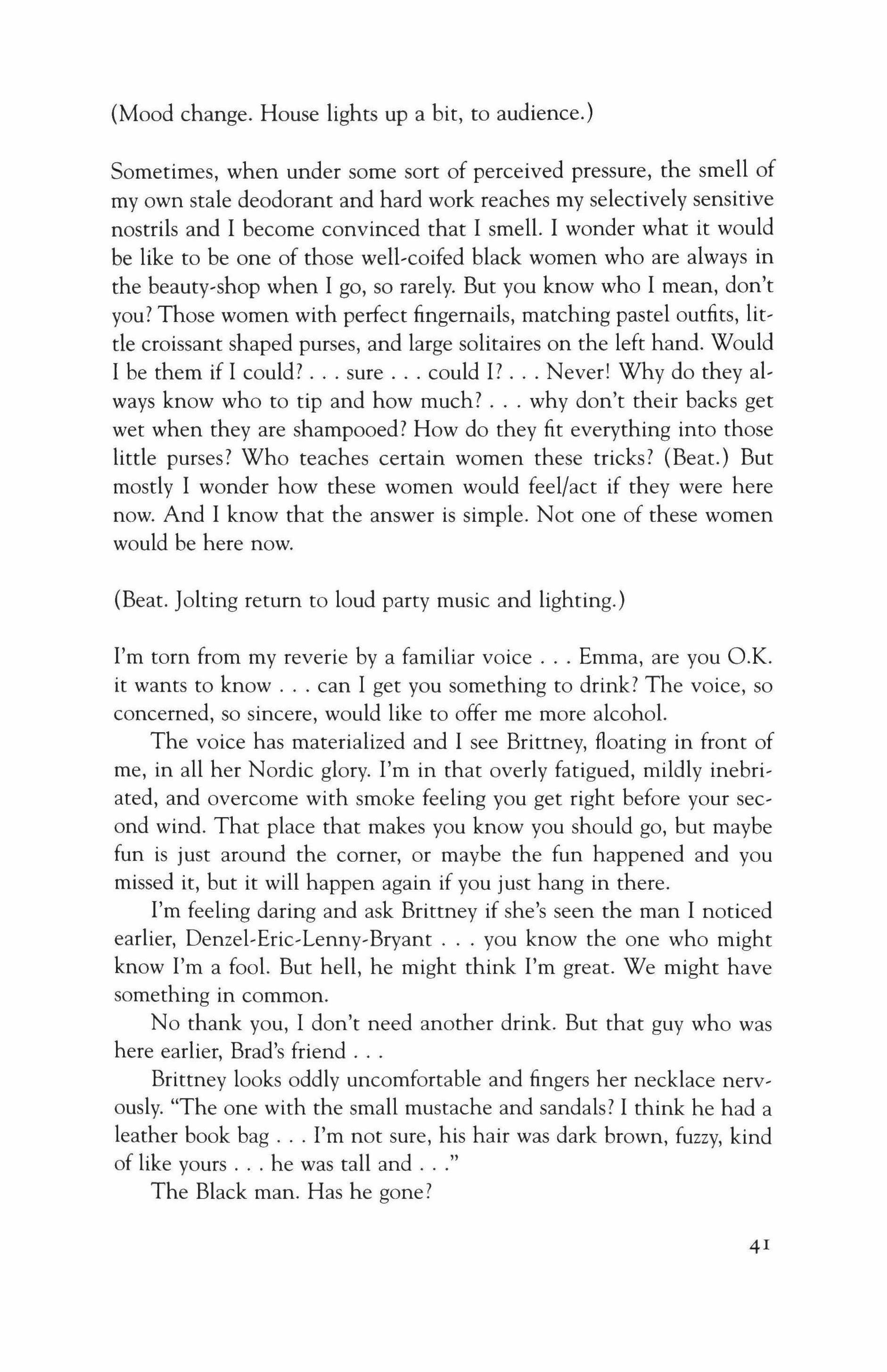
(Mood change. House lights up a bit, to audience.)
Sometimes, when under some sort of perceived pressure, the smell of my own stale deodorant and hard work reaches my selectively sensitive nostrils and I become convinced that I smell. I wonder what it would be like to be one of those well-coifed black women who are always in the beauty,shop when I go, so rarely. But you know who I mean, don't you? Those women with perfect fingernails, matching pastel outfits, lit, tle croissant shaped purses, and large solitaires on the left hand. Would I be them if I could? sure could I? Never! Why do they always know who to tip and how much? why don't their backs get wet when they are shampooed? How do they fit everything into those little purses? Who teaches certain women these tricks? (Beat.) But mostly I wonder how these women would feel/act if they were here now. And I know that the answer is simple. Not one of these women would be here now.
(Beat. Jolting return to loud party music and lighting.)
I'm tom from my reverie by a familiar voice Emma, are you O.K. it wants to know can I get you something to drink? The voice, so concerned, so sincere, would like to offer me more alcohol.
The voice has materialized and I see Brittney, floating in front of me, in all her Nordic glory. I'm in that overly fatigued, mildly inebriated, and overcome with smoke feeling you get right before your sec' ond wind. That place that makes you know you should go, but maybe fun is just around the comer, or maybe the fun happened and you missed it, but it will happen again if you just hang in there.
I'm feeling daring and ask Brittney if she's seen the man I noticed earlier, Denzel-Eric-Lenny-Bryant you know the one who might know I'm a fool. But hell, he might think I'm great. We might have something in common.
No thank you, I don't need another drink. But that guy who was here earlier, Brad's friend
Brittney looks oddly uncomfortable and fingers her necklace nervously. "The one with the small mustache and sandals? I think he had a leather book bag I'm not sure, his hair was dark brown, fuzzy, kind of like yours he was tall and ."
The Black man. Has he gone?
41
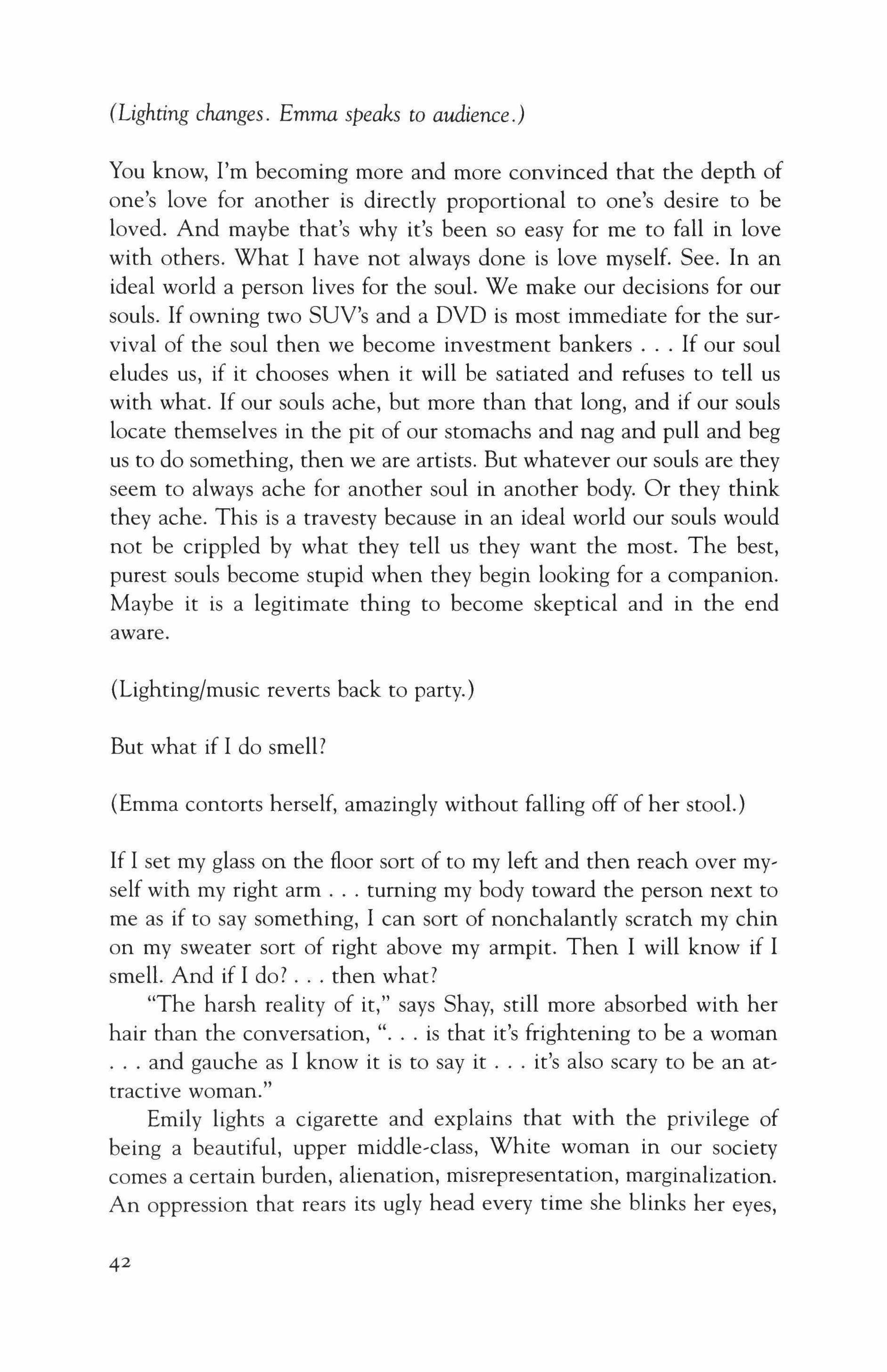
(Lighting changes. Emma speaks to audience.)
You know, I'm becoming more and more convinced that the depth of one's love for another is directly proportional to one's desire to be loved. And maybe that's why it's been so easy for me to fall in love with others. What I have not always done is love myself. See. In an ideal world a person lives for the soul. We make our decisions for our souls. If owning two SUV's and a DVD is most immediate for the survival of the soul then we become investment bankers If our soul eludes us, if it chooses when it will be satiated and refuses to tell us with what. If our souls ache, but more than that long, and if our souls locate themselves in the pit of our stomachs and nag and pull and beg us to do something, then we are artists. But whatever our souls are they seem to always ache for another soul in another body. Or they think they ache. This is a travesty because in an ideal world our souls would not be crippled by what they tell us they want the most. The best, purest souls become stupid when they begin looking for a companion. Maybe it is a legitimate thing to become skeptical and in the end aware.
(Lighting/music reverts back to party.)
But what if! do smell?
(Emma contorts herself, amazingly without falling off of her stool.)
If I set my glass on the floor sort of to my left and then reach over myself with my right arm turning my body toward the person next to me as if to say something, I can sort of nonchalantly scratch my chin on my sweater sort of right above my armpit. Then I will know if I smell. And if I do? then what?
"The harsh reality of it," says Shay, still more absorbed with her hair than the conversation, " is that it's frightening to be a woman and gauche as I know it is to say it it's also scary to be an attractive woman."
Emily lights a cigarette and explains that with the privilege of being a beautiful, upper middle-class, White woman in our society comes a certain burden, alienation, misrepresentation, marginalization. An oppression that rears its ugly head every time she blinks her eyes,
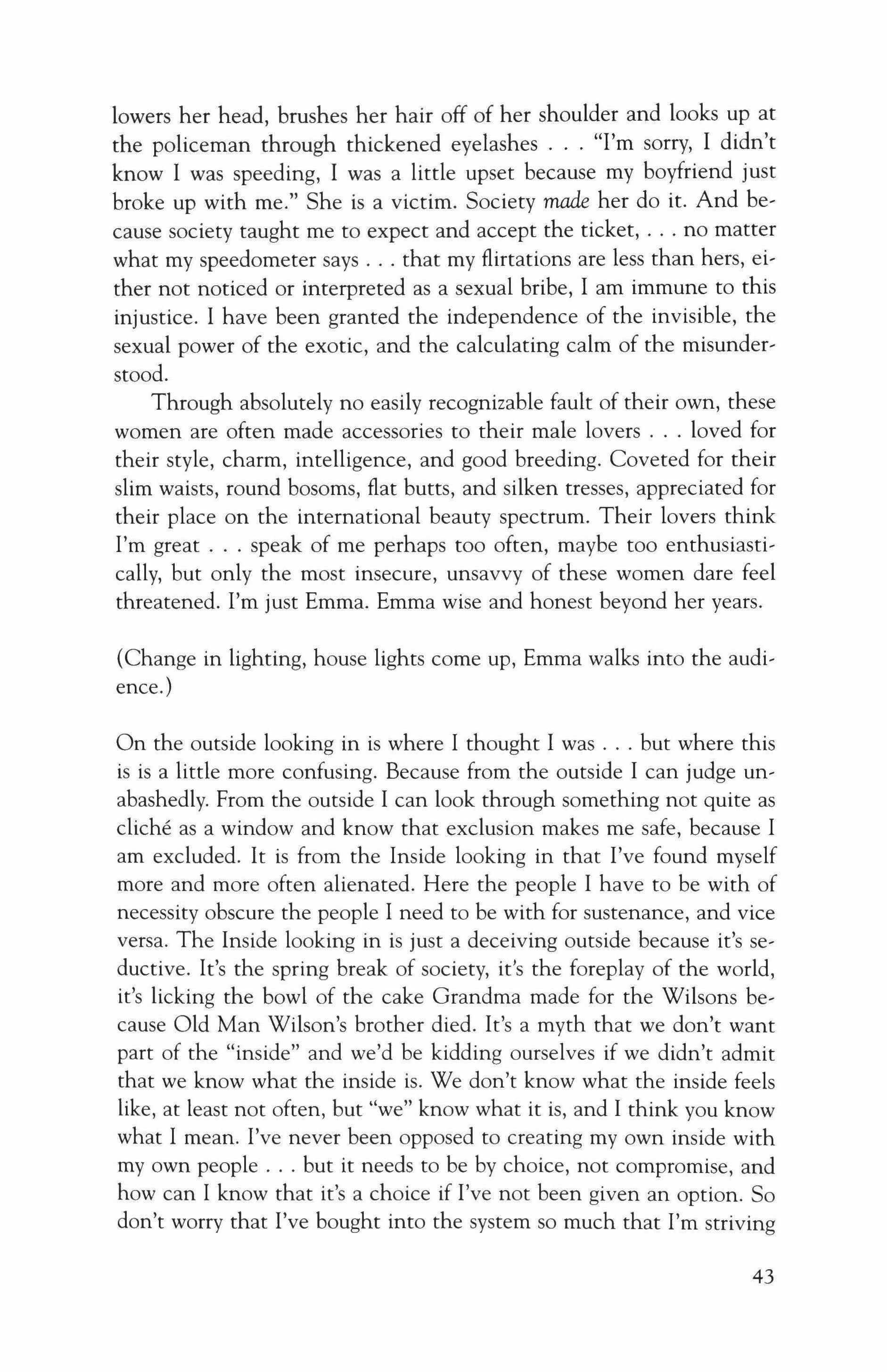
lowers her head, brushes her hair off of her shoulder and looks up at the policeman through thickened eyelashes "I'm sorry, I didn't know I was speeding, I was a little upset because my boyfriend just broke up with me." She is a victim. Society made her do it. And be' cause society taught me to expect and accept the ticket, no matter what my speedometer says that my flirtations are less than hers, either not noticed or interpreted as a sexual bribe, I am immune to this injustice. I have been granted the independence of the invisible, the sexual power of the exotic, and the calculating calm of the misunderstood.
Through absolutely no easily recognizable fault of their own, these women are often made accessories to their male lovers loved for their style, charm, intelligence, and good breeding. Coveted for their slim waists, round bosoms, flat butts, and silken tresses, appreciated for their place on the international beauty spectrum. Their lovers think I'm great speak of me perhaps too often, maybe too enthusiastically, but only the most insecure, unsavvy of these women dare feel threatened. I'm just Emma. Emma wise and honest beyond her years.
(Change in lighting, house lights come up, Emma walks into the audience.)
On the outside looking in is where I thought I was but where this is is a little more confusing. Because from the outside I can judge unabashedly. From the outside I can look through something not quite as cliche as a window and know that exclusion makes me safe, because I am excluded. It is from the Inside looking in that I've found myself more and more often alienated. Here the people I have to be with of necessity obscure the people I need to be with for sustenance, and vice versa. The Inside looking in is just a deceiving outside because it's seductive. It's the spring break of society, it's the foreplay of the world, it's licking the bowl of the cake Grandma made for the Wilsons be, cause Old Man Wilson's brother died. It's a myth that we don't want part of the "inside" and we'd be kidding ourselves if we didn't admit that we know what the inside is. We don't know what the inside feels like, at least not often, but "we" know what it is, and I think you know what I mean. I've never been opposed to creating my own inside with my own people but it needs to be by choice, not compromise, and how can I know that it's a choice if I've not been given an option. So don't worry that I've bought into the system so much that I'm striving
43
for something I shouldn't want, it's just that I've been a part of it long and hard enough to know how much I'm not a part of it. It what?
The Inside.
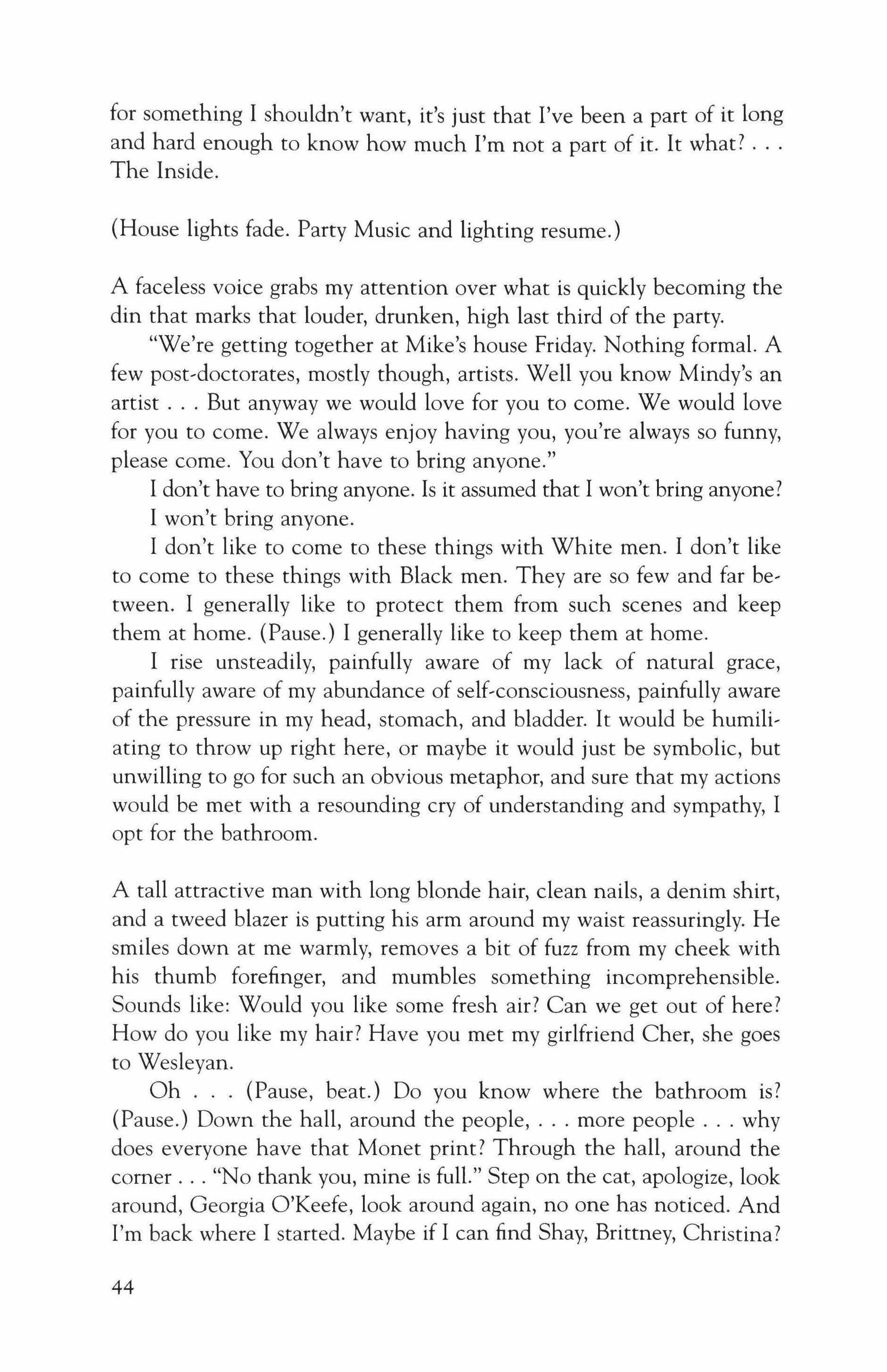
(House lights fade. Party Music and lighting resume.)
A faceless voice grabs my attention over what is quickly becoming the din that marks that louder, drunken, high last third of the party. "We're getting together at Mike's house Friday. Nothing formal. A few post-doctorates, mostly though, artists. Well you know Mindy's an artist But anyway we would love for you to come. We would love for you to come. We always enjoy having you, you're always so funny, please come. You don't have to bring anyone."
I don't have to bring anyone. Is it assumed that I won't bring anyone? I won't bring anyone.
I don't like to come to these things with White men. I don't like to come to these things with Black men. They are so few and far between. I generally like to protect them from such scenes and keep them at home. (Pause.) I generally like to keep them at home.
I rise unsteadily, painfully aware of my lack of natural grace, painfully aware of my abundance of self-consciousness, painfully aware of the pressure in my head, stomach, and bladder. It would be humiliating to throw up right here, or maybe it would just be symbolic, but unwilling to go for such an obvious metaphor, and sure that my actions would be met with a resounding cry of understanding and sympathy, I opt for the bathroom.
A tall attractive man with long blonde hair, clean nails, a denim shirt, and a tweed blazer is putting his arm around my waist reassuringly. He smiles down at me warmly, removes a bit of fuzz from my cheek with his thumb forefinger, and mumbles something incomprehensible. Sounds like: Would you like some fresh air? Can we get out of here? How do you like my hair? Have you met my girlfriend Cher, she goes to Wesleyan.
Oh (Pause, beat.) Do you know where the bathroom is? (Pause.) Down the hall, around the people, more people why does everyone have that Monet print? Through the hall, around the comer "No thank you, mine is full." Step on the cat, apologize, look around, Georgia O'Keefe, look around again, no one has noticed. And I'm back where I started. Maybe if I can find Shay, Brittney, Christina?
44

Whose party is this anyway. I'll examine the books. Look engrossed. Feel smug because I've read them all. Think. Think. Hold it in. Don't dance. A deep breath and count to ten. Beloved, Plato's Republic, Invis, ible Man, The Far Side, Hotel New Hampshire Everything in hard cover. Probably signed. But where's the bathroom. Where's the bathroom. With every step I'm regressing, slipping. I feel eight, seven, five, five and a half I'm six and I can't find the bathroom and if I have an accident here I can't have an accident here. Besides my panties are so cute look, ruffles.
(Emma begins to moon audience. Lights go black. Lights and music indicate drastic shift in mood and tone.)
But Mommy I don't wanna go to school. I mean I won't know anyone there. But I don't Yes. I will. I know Mommy. But, O.K
(Light changes. Music crescendos.)
My name is Emma. Emma
(Places hands over ears and music dies down.)
I can spell my name. Emma. Capital E, lower case M, lower case M Lower case A, capital.
(Loud music. Light change. Emma raises hand.)
Christopher Columbus discovered America in The Nina the Pinta the Santa Maria Take five carry the three is one thousand, eight hundred, fifty-four. Abraham Lincoln freed the slaves because he was a great man
I pledge allegiance to the flag of the United States of America and to the public on which it stands, one nation, under God invisible with liberty and justice for all our fathers hoot art in heaven hollow be thy names: "The King Done Come," "The Will Be Done," on earth as tits in heaven give us this day our daily bread and forgive us our trespasses as we forgive those who trespasted 'gainst us and lead us to temptation but deliver us from evil for thine is the kingdom and the power forever and ever and ever and to live by the girl scout law.
Thank you. Please? Amen.
45
(Emma raises hand again. Smiling and sincere.)
Cleopatra and Nefertiti were both very beautiful and both of them were rulers of Egypt, which is near Africa. Egypt is in the desert and lots of beautiful things came from there. Take away six is one thou, sand, eight hundred, and forty-eight.
Benjamin Franklin invented electricity, bifocals, wood burning stoves, and a lot of other very important things, Thomas Edison in, vented the light bulb, Alexander Graham Bell invented the telephone, George Washington Carver invented peanut butter and Louisa May Alcott wrote Little Women.
Darwin discovered the theory of natural selection survival of the fittest, pea-pods recessive and dominant genes we used to look like apes and the first evidence of human life was in Africa.
Barbie is beautiful, Ken dolls don't come in brown, baby,alive really shits, and Nancy Drew is really brave Survival of the fittest means that giraffes have long necks, dodo birds are extinct and Cleopatra looks like Elizabeth Taylor. Natural selection means that a sweet plump red butterfly won't last long in a green field. The earth re, volves around the sun and man lives on the earth and women too three four five six seven eight nine ten and you are not it.
The shortest distance between two points is a straight line. The woolly mammoth is now extinct. The tyrannosaurus,rex is now ex, tinct. The dodo bird is now extinct. Slavery is unethical in order to form a more perfect union, establish justice, insure domestic tranquility don't count your chickens before they hatch, don't burn your bridges, don't borrow from Paul to pay Mary. Don't borrow from Peter to pay Paul? Don't steal from Raoul to pay Don't pay
Ssshhh.
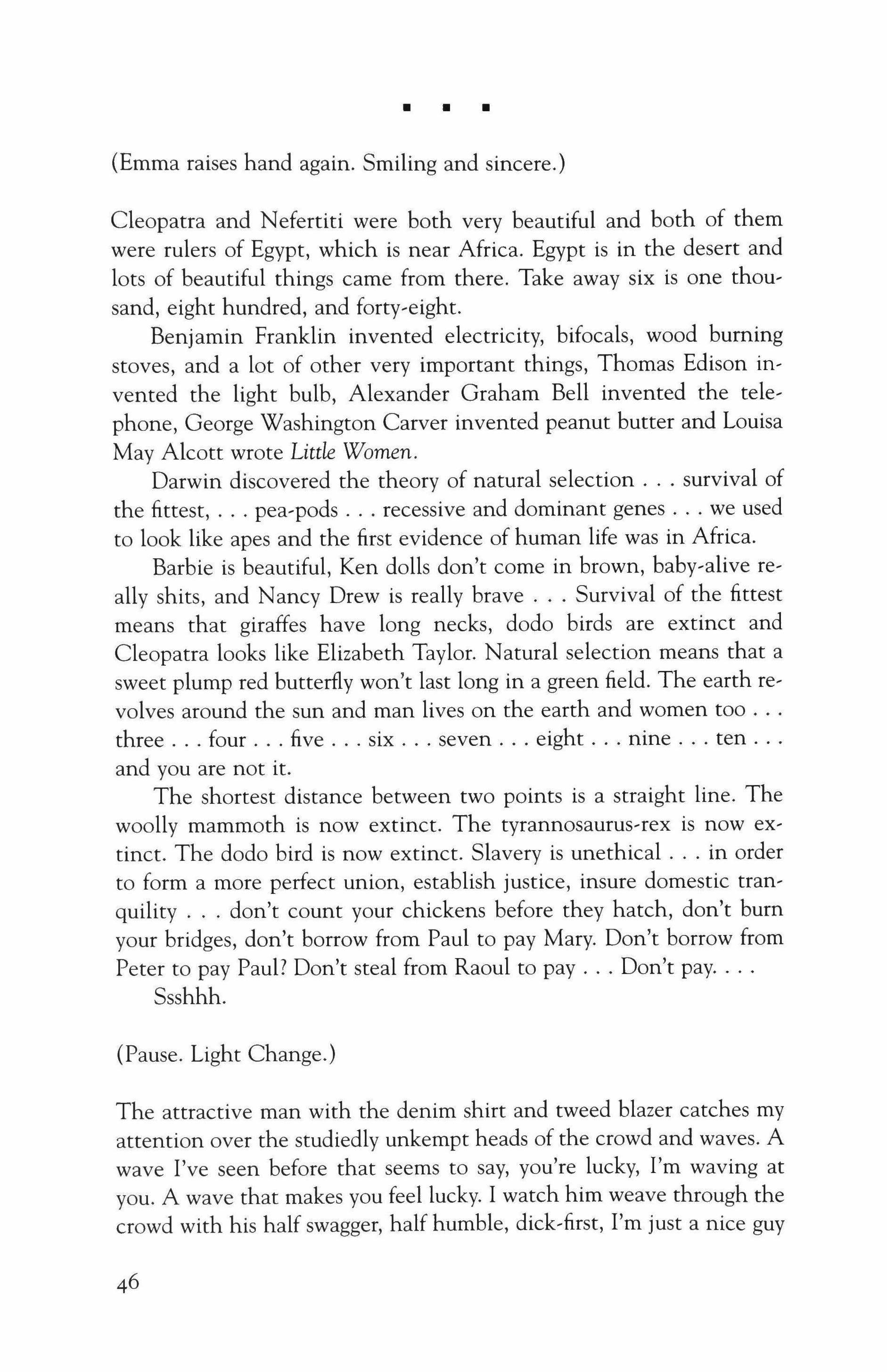
(Pause. Light Change.)
The attractive man with the denim shirt and tweed blazer catches my attention over the studiedly unkempt heads of the crowd and waves. A wave I've seen before that seems to say, you're lucky, I'm waving at you. A wave that makes you feel lucky. I watch him weave through the crowd with his half swagger, half humble, dick-first, I'm just a nice guy
• • •

jaunt that I find irresistible and sickening. He moves with the studied intent of one who is used to attending such parties and not talking to those he wishes not to talk to. A sort of overly focused expression as if he has an important meeting with God who is standing just behind your left shoulder. I know this look because I've so often worn it. The Wesleyan girlfriend stands in a comer, eating babaganoush and laughing with the only Black man in the room. It has become obvious that I won't meet him tonight. When Mr. Denim reaches me he will touch some part of my body, casually, warmly, big brotherly, and say something amusingly vicious, and accurate about someone I had, until now, had no reason to dislike. I'll laugh, and feel pleased that he's respected my wit enough to share. I'll enjoy that someone wonders if we've slept together, I'll enjoy even more that someone else wonders why not. I'll add something equally as derisive to the pot and we will have had a conversation. The only Black woman sharing a secret laugh with the most attractive White man.
(Back to party lights and music. Now louder and more intrusive.)
I avoid Mr. Long Hair, Denim Shirt entirely. I retreat and find myself finally in a small bathroom where green ceramic tiles and yellowed mirrors add an odd quiet and eerie light making me feel safe and submerged. (Music fades. Lights change.) I look sallow, but undamaged in the rusted, toothpaste bespeckled mirror. I pinch my cheeks for color and wonder what that's all about. I have color. The pain comes slowly, this thing in my upper chest that hurts often. A sort of unidentifiable nausea brought on by nothing and everything. It's lonely and a little like needing to cry. But I couldn't do that. I tried it once and it didn't help. It spreads down to my stomach and groin and back up my neck, landing with a dull thud behind my eyes where it burns and bends. Most often the pain comes like a sort of drug flashback the fragments of emotions and images that invade my mind and often cloud my senses making it virtually impossible to be a functioning person. I find myself lost in a moment of indecision, realization bordering on epiphany, or plain astonishment I stand at the brink of these states. I could fall, or climb down but either way dinner's at 5:00. I stand ready to alternately plunge, fall, dive to what is waiting I don't know. It is the recreation of me through the eyes of you. It is the procreation of us through each other. Falling through something conclusive, even if conclusively nebulous. It's the indescribable anxiety
47
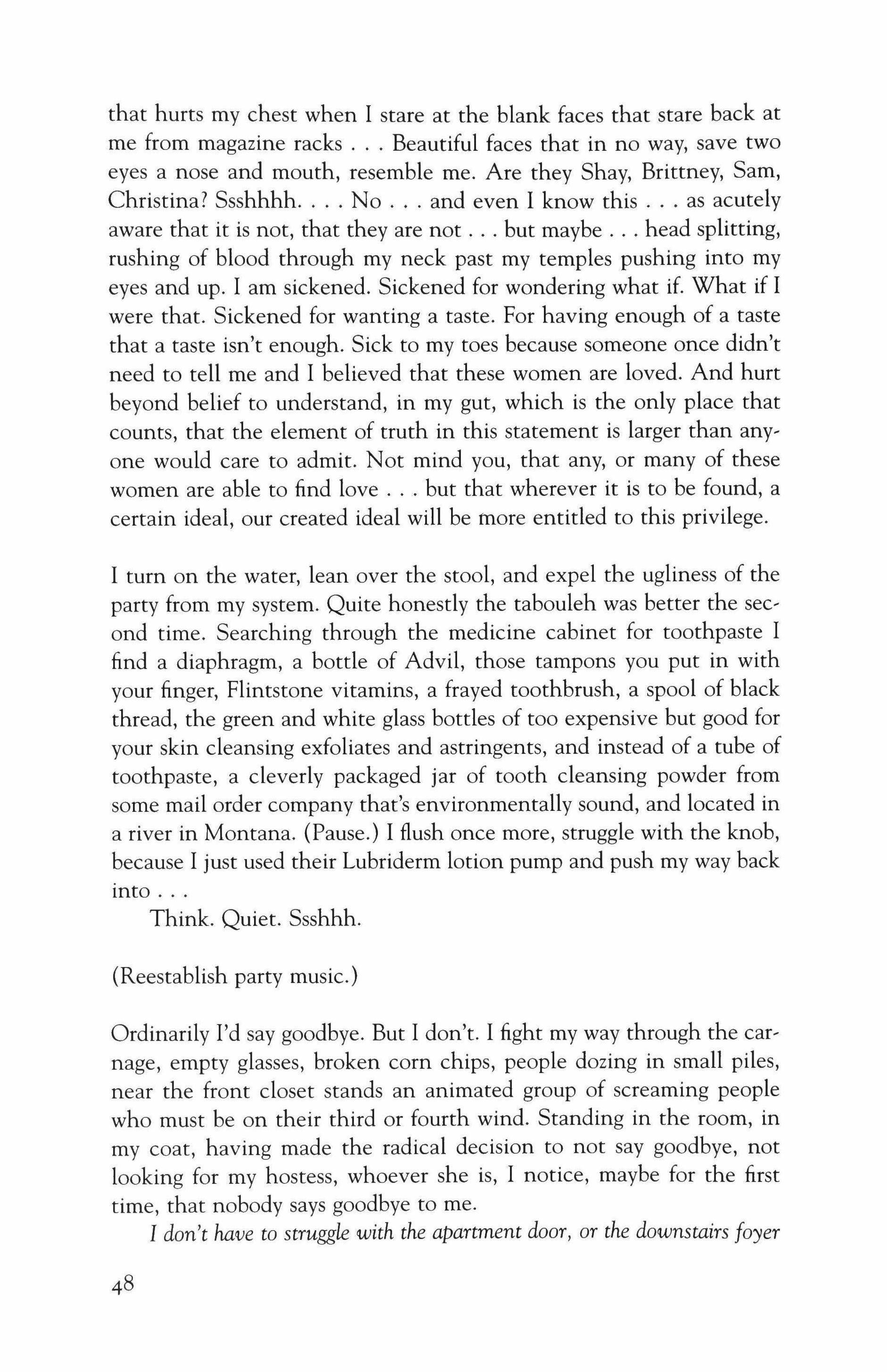
that hurts my chest when I stare at the blank faces that stare back at me from magazine racks Beautiful faces that in no way, save two eyes a nose and mouth, resemble me. Are they Shay, Brittney, Sam, Christina? Ssshhhh No and even I know this as acutely aware that it is not, that they are not but maybe head splitting, rushing of blood through my neck past my temples pushing into my eyes and up. I am sickened. Sickened for wondering what if. What if I were that. Sickened for wanting a taste. For having enough of a taste that a taste isn't enough. Sick to my toes because someone once didn't need to tell me and I believed that these women are loved. And hurt beyond belief to understand, in my gut, which is the only place that counts, that the element of truth in this statement is larger than anyone would care to admit. Not mind you, that any, or many of these women are able to find love but that wherever it is to be found, a certain ideal, our created ideal will be more entitled to this privilege.
I turn on the water, lean over the stool, and expel the ugliness of the party from my system. Quite honestly the tabouleh was better the second time. Searching through the medicine cabinet for toothpaste I find a diaphragm, a bottle of Advil, those tampons you put in with your finger, Flintstone vitamins, a frayed toothbrush, a spool of black thread, the green and white glass bottles of too expensive but good for your skin cleansing exfoliates and astringents, and instead of a tube of toothpaste, a cleverly packaged jar of tooth cleansing powder from some mail order company that's environmentally sound, and located in a river in Montana. (Pause.) I flush once more, struggle with the knob, because I just used their Lubriderm lotion pump and push my way back into
Think. Quiet. Ssshhh.
(Reestablish party music.)
Ordinarily I'd say goodbye. But I don't. I fight my way through the carnage, empty glasses, broken corn chips, people dozing in small piles, near the front closet stands an animated group of screaming people who must be on their third or fourth wind. Standing in the room, in my coat, having made the radical decision to not say goodbye, not looking for my hostess, whoever she is, I notice, maybe for the first time, that nobody says goodbye to me.
I don't have to struggle with the apartment door, or the downstairs foyer
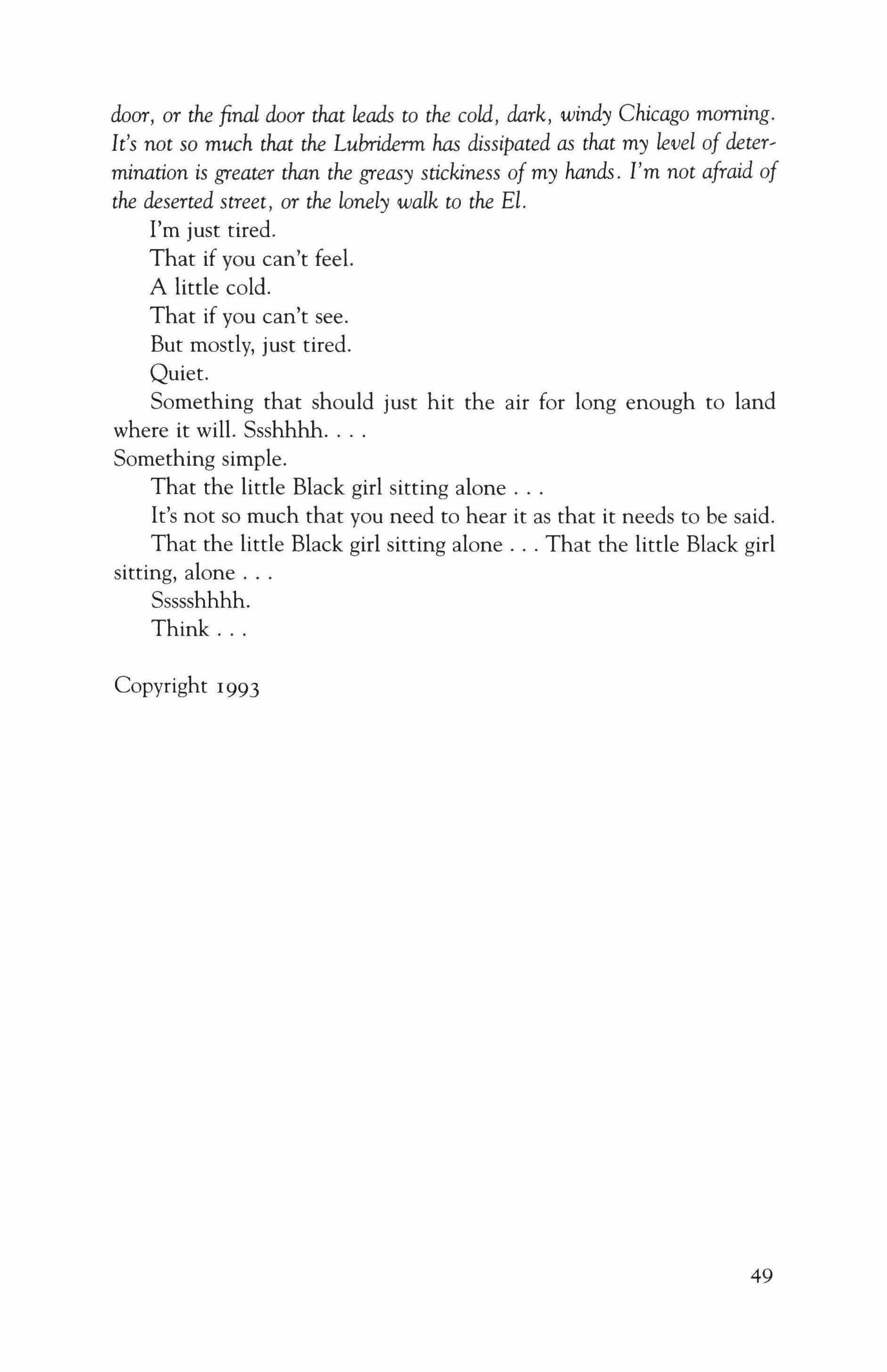
door, or the final door that leads to the cold, dark, windy Chicago morning. It's not so much that the Lubriderm has dissipated as that my level of derermination is greater than the greasy stickiness of my hands. I'm not afraid of the deserted street, or the lonely walk to the Elo I'm just tired.
That if you can't feel.
A little cold.
That if you can't see.
But mostly, just tired.
Quiet.
Something that should just hit the air for long enough to land where it will. Ssshhhh
Something simple.
That the little Black girl sitting alone
It's not so much that you need to hear it as that it needs to be said.
That the little Black girl sitting alone That the little Black girl sitting, alone
Ssssshhhh.
Think
Copyright 1993
49
Laurence Goldstein
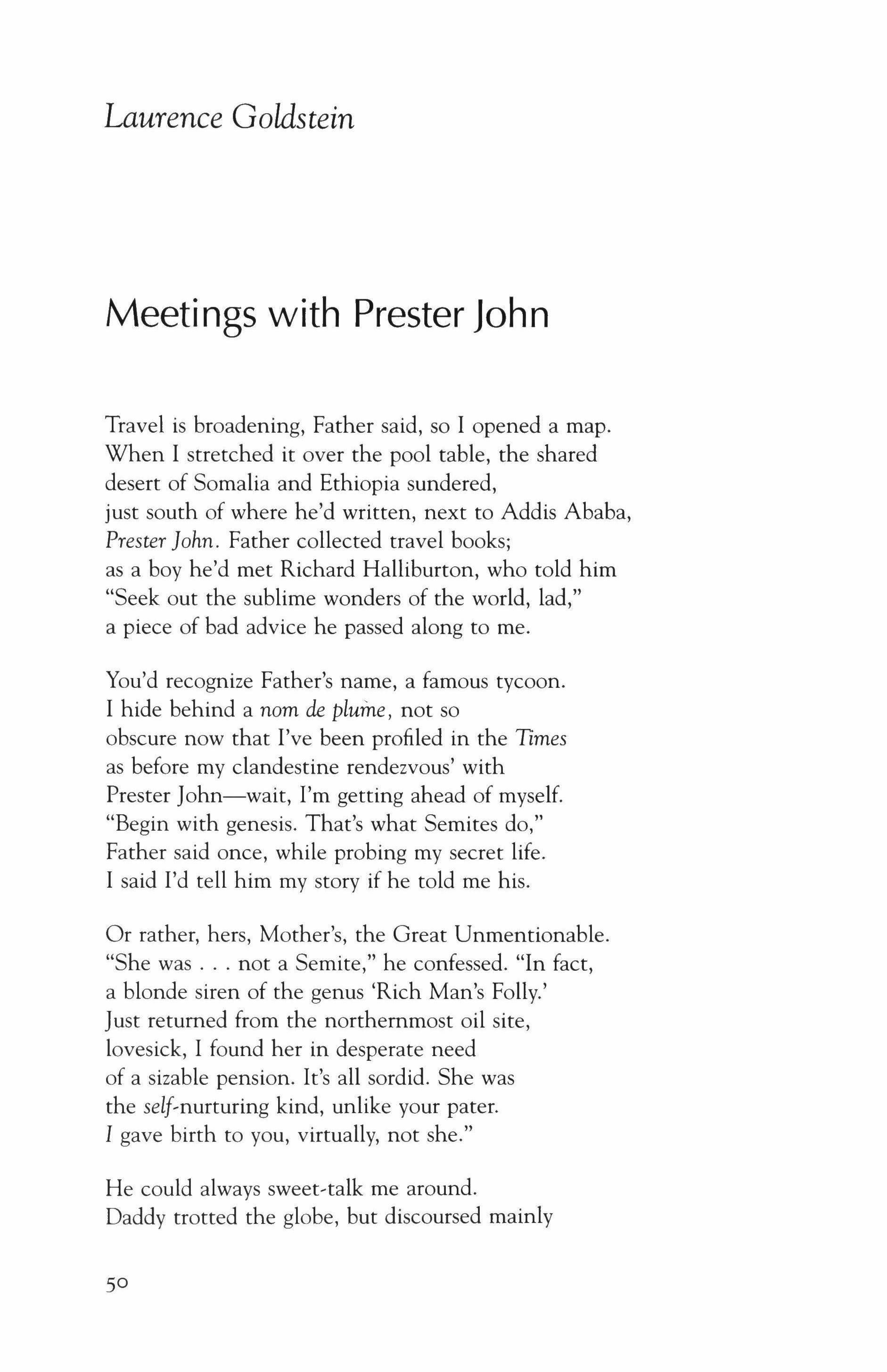
Meetings with Prester John
Travel is broadening, Father said, so I opened a map. When I stretched it over the pool table, the shared desert of Somalia and Ethiopia sundered, just south of where he'd written, next to Addis Ababa, Prester John. Father collected travel books; as a boy he'd met Richard Halliburton, who told him "Seek out the sublime wonders of the world, lad," a piece of bad advice he passed along to me.
You'd recognize Father's name, a famous tycoon. I hide behind a nom de plume, not so obscure now that I've been profiled in the TImes as before my clandestine rendezvous' with Prester John-wait, I'm getting ahead of myself. "Begin with genesis. That's what Semites do," Father said once, while probing my secret life. I said I'd tell him my story if he told me his.
Or rather, hers, Mother's, the Great Unmentionable. "She was not a Semite," he confessed. "In fact, a blonde siren of the genus 'Rich Man's Folly.' Just returned from the northernmost oil site, lovesick, I found her in desperate need of a sizable pension. It's all sordid. She was the selj,nurturing kind, unlike your pater. I gave birth to you, virtually, not she."
He could always sweet-talk me around. Daddy trotted the globe, but discoursed mainly
50
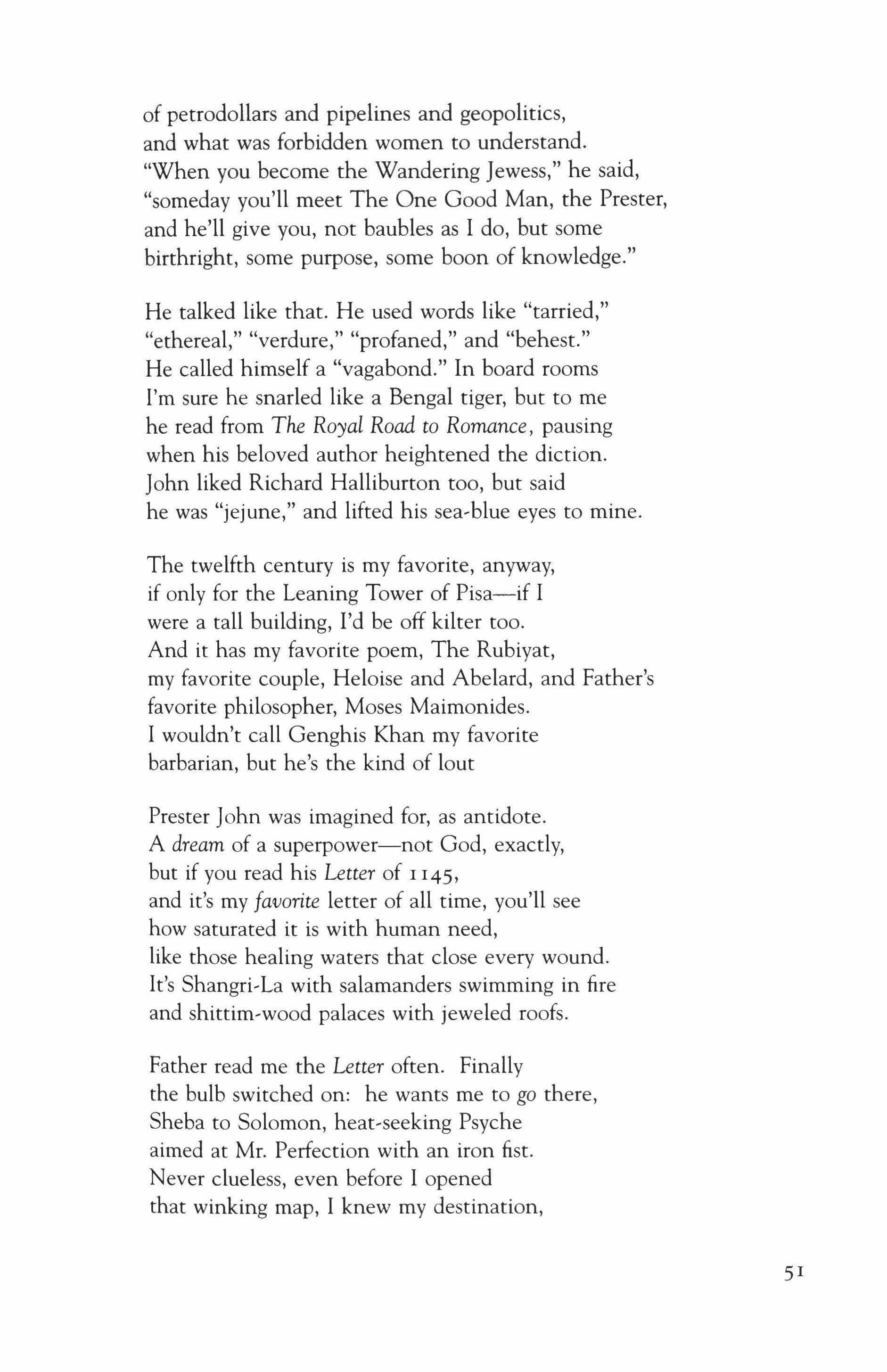
of petrodollars and pipelines and geopolitics, and what was forbidden women to understand.
"When you become the Wandering Jewess," he said, "someday you'll meet The One Good Man, the Prester, and he'll give you, not baubles as I do, but some birthright, some purpose, some boon of knowledge."
He talked like that. He used words like "tarried," "ethereal," "verdure," "profaned," and "behest." He called himself a "vagabond." In board rooms I'm sure he snarled like a Bengal tiger, but to me he read from The Royal Road to Romance, pausing when his beloved author heightened the diction.
John liked Richard Halliburton too, but said he was "jejune," and lifted his sea-blue eyes to mine.
The twelfth century is my favorite, anyway, if only for the Leaning Tower of Pisa-s-if I were a tall building, I'd be off kilter too. And it has my favorite poem, The Rubiyat, my favorite couple, Heloise and Abelard, and Father's favorite philosopher, Moses Maimonides. I wouldn't call Genghis Khan my favorite barbarian, but he's the kind of lout
Prester John was imagined for, as antidote. A dream of a superpower-not God, exactly, but if you read his Letter of 1145, and it's my favorite letter of all time, you'll see how saturated it is with human need, like those healing waters that close every wound. It's Shangri-La with salamanders swimming in fire and shittim-wood palaces with jeweled roofs.
Father read me the Letter often. Finally the bulb switched on: he wants me to go there, Sheba to Solomon, heat-seeking Psyche aimed at Mr. Perfection with an iron fist. Never clueless, even before I opened that winking map, I knew my destination,
51

some charismatic scouted by Father on his trip, junior Halliburton, to the biblical Cush.
So I outfitted myself for Addis Ababa. Don't you love the plosives in that name, the nasals in Abyssinia? Abyssinia-it means mixed, as in the salad of clans and tribes and colors I marveled at every dust,intensive day. The language is Amharic. I learned the national anthem: "March Forward, Dear Mother Ethiopia, Bloom and Flourish." Gunfire always came with it, like a leitmotif.
I settled into a villa near the Blue Nile, signing travelers checks for bent'wood chairs, curtains {or as Dad would say, silken draperies}, gilded tea sets, tripods with silver feet.
Father sent me some books, including Prester John by John Buchan, useless for my new mission but fascinating: about a black man who tries to unite all Africans against the collective baas:
"If they get a leader with prestige enough to organize a crusade against the white man "that sort of stuff, scaring the pants off, well, me for one. Our ally Haile Selassie was recently deposed; Nasser was dead, discredited, but the Ayatollah K. thundered in the east, and his rain of invective scorched the Great Rift, if I can mix ,metaphors.
Nobody called me the Great Satan to my face or the Whore of Babylon (I dressed discreetly) or anything but Kind Lady, especially in the bazaars. Father said, ask around for Prester John; I did and heard plenty about the sixteenth century, when a Somali jihad was snuffed out by the great king Lebna Dengel, in the marshes and lunar solitude of the granite peaks.
52
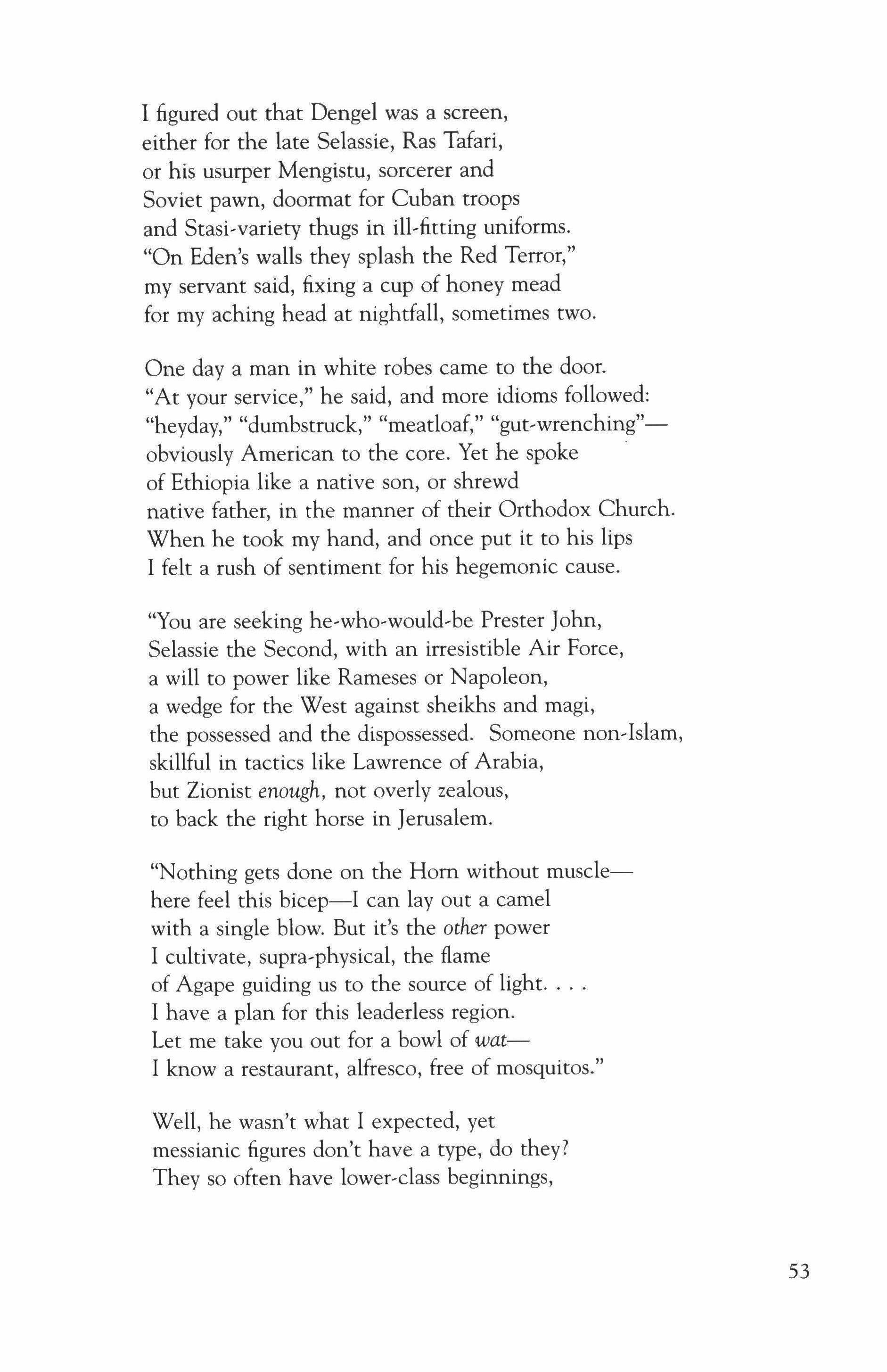
I figured out that Dengel was a screen, either for the late Selassie, Ras Tafari, or his usurper Mengistu, sorcerer and Soviet pawn, doormat for Cuban troops and Stasi-variety thugs in ill-fitting uniforms. "On Eden's walls they splash the Red Terror," my servant said, fixing a cup of honey mead for my aching head at nightfall, sometimes two.
One day a man in white robes came to the door. "At your service," he said, and more idioms followed: "heyday," "dumbstruck," "meatloaf," "gut-wrenching'l-> obviously American to the core. Yet he spoke of Ethiopia like a native son, or shrewd native father, in the manner of their Orthodox Church. When he took my hand, and once put it to his lips I felt a rush of sentiment for his hegemonic cause.
"You are seeking he-who-would-be Prester John, Selassie the Second, with an irresistible Air Force, a will to power like Rameses or Napoleon, a wedge for the West against sheikhs and magi, the possessed and the dispossessed. Someone non-Islam, skillful in tactics like Lawrence of Arabia, but Zionist enough, not overly zealous, to back the right horse in Jerusalem.
"Nothing gets done on the Hom without musclehere feel this bicep-I can layout a camel with a single blow. But it's the other power I cultivate, supra-physical, the flame of Agape guiding us to the source of light I have a plan for this leaderless region. Let me take you out for a bowl of watI know a restaurant, alfresco, free of mosquitos."
Well, he wasn't what I expected, yet messianic figures don't have a type, do they? They so often have lower-class beginnings,
53
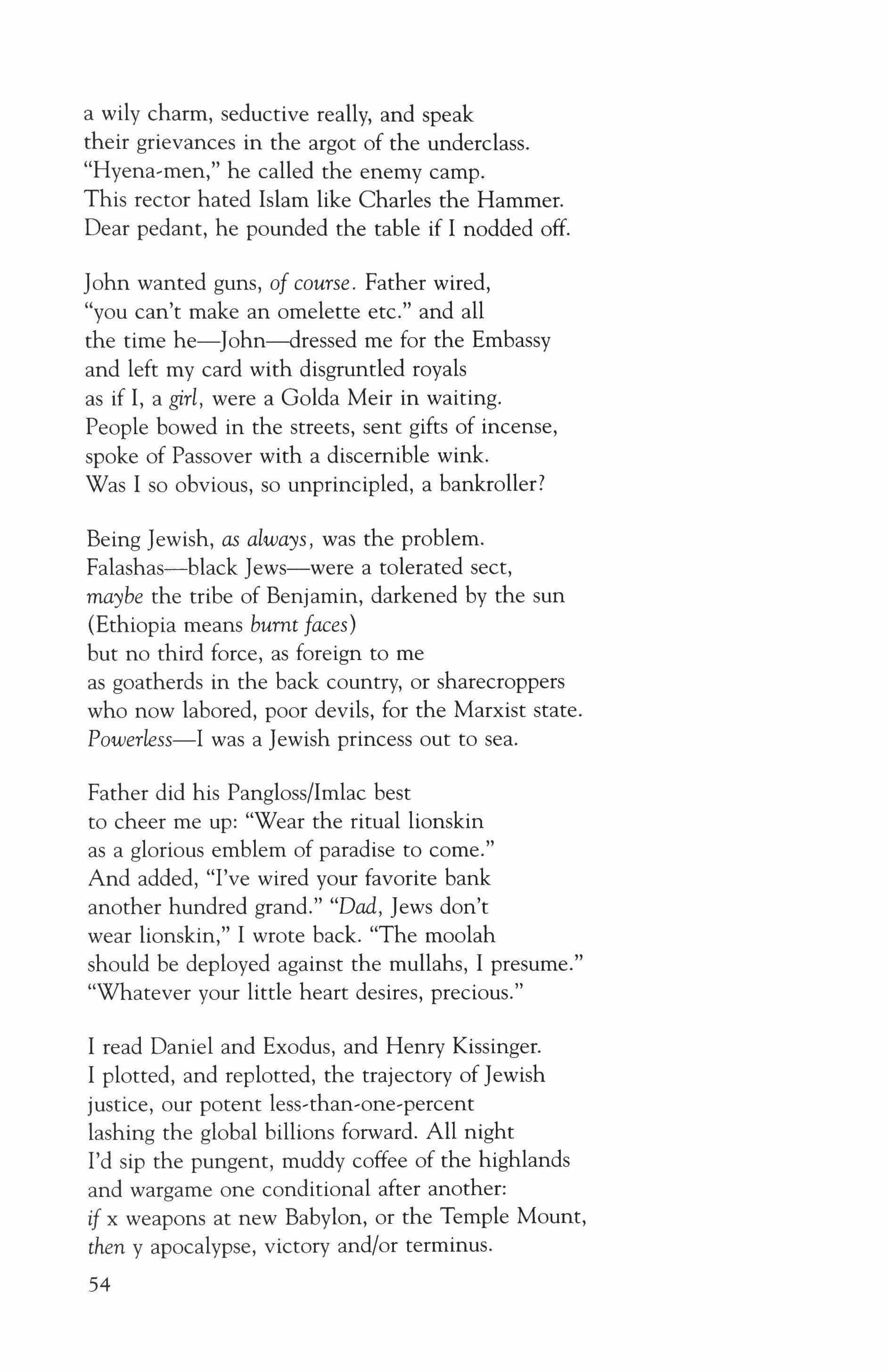
a wily charm, seductive really, and speak their grievances in the argot of the underclass. "Hyena-men," he called the enemy camp. This rector hated Islam like Charles the Hammer. Dear pedant, he pounded the table if I nodded off.
John wanted guns, of course. Father wired, "you can't make an omelette etc." and all the time he-John-dressed me for the Embassy and left my card with disgruntled royals as if I, a girl, were a Golda Meir in waiting. People bowed in the streets, sent gifts of incense, spoke of Passover with a discernible wink. Was I so obvious, so unprincipled, a bankroller?
Being Jewish, as always, was the problem. Falashas-black Jews-were a tolerated sect, maybe the tribe of Benjamin, darkened by the sun (Ethiopia means burnt faces) but no third force, as foreign to me as goatherds in the back country, or sharecroppers who now labored, poor devils, for the Marxist state. Powerless-I was a Jewish princess out to sea.
Father did his Pangloss/Imlac best to cheer me up: "Wear the rituallionskin as a glorious emblem of paradise to come." And added, "I've wired your favorite bank another hundred grand." "Dad, Jews don't wear lionskin," I wrote back. "The moolah should be deployed against the mullahs, I presume." "Whatever your little heart desires, precious."
I read Daniel and Exodus, and Henry Kissinger. I plotted, and replotted, the trajectory of Jewish justice, our potent less-than-one-percent lashing the global billions forward. All night I'd sip the pungent, muddy coffee of the highlands and wargame one conditional after another: if x weapons at new Babylon, or the Temple Mount, then y apocalypse, victory and/or terminus.
54
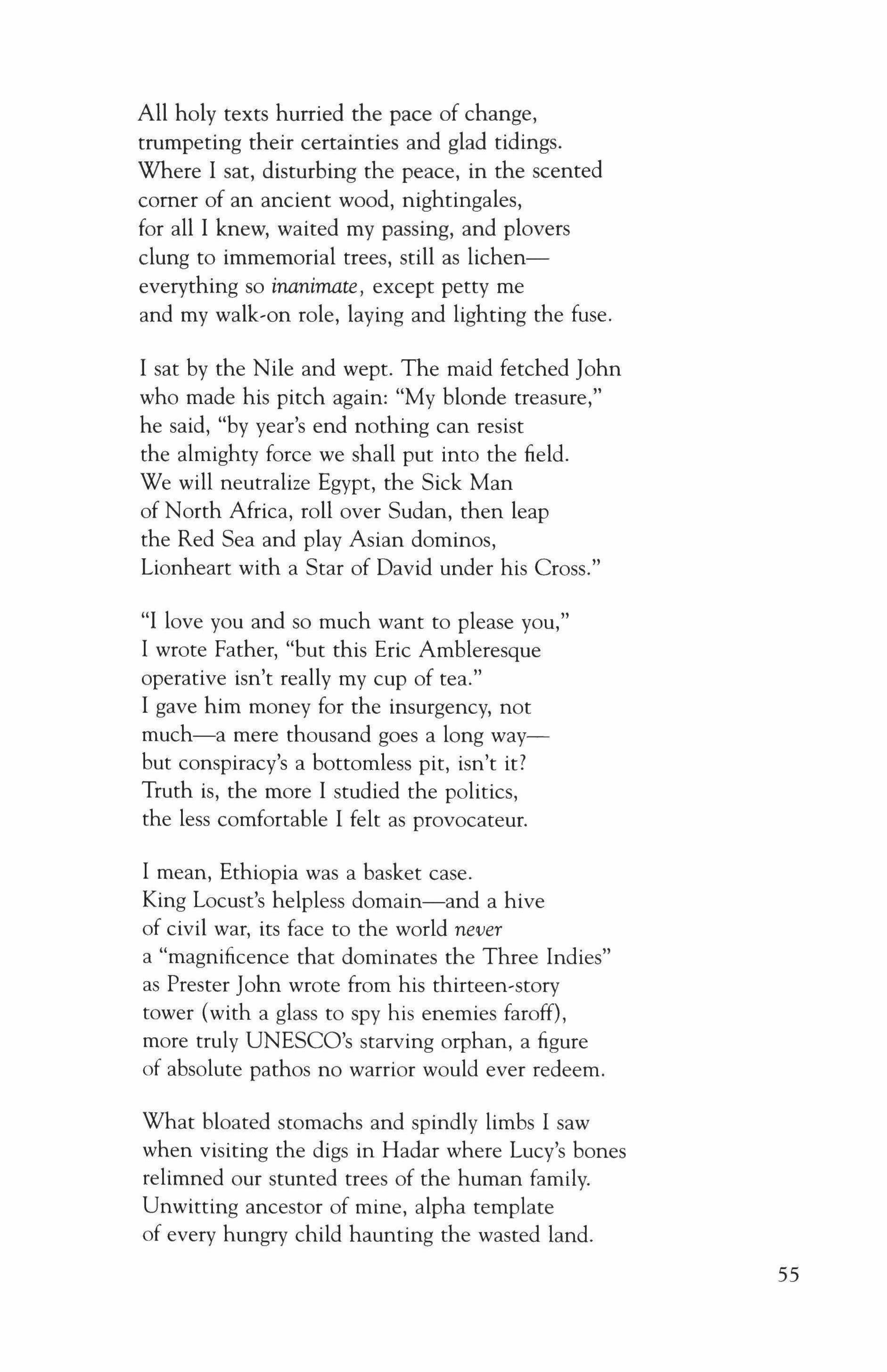
All holy texts hurried the pace of change, trumpeting their certainties and glad tidings. Where I sat, disturbing the peace, in the scented comer of an ancient wood, nightingales, for all I knew, waited my passing, and plovers clung to immemorial trees, still as licheneverything so inanimate, except petty me and my walk-on role, laying and lighting the fuse.
I sat by the Nile and wept. The maid fetched John who made his pitch again: "My blonde treasure," he said, "by year's end nothing can resist the almighty force we shall put into the field. We will neutralize Egypt, the Sick Man of North Africa, roll over Sudan, then leap the Red Sea and play Asian dominos, Lionheart with a Star of David under his Cross."
"I love you and so much want to please you," I wrote Father, "but this Eric Ambleresque operative isn't really my cup of tea." I gave him money for the insurgency, not much-a mere thousand goes a long waybut conspiracy's a bottomless pit, isn't it? Truth is, the more I studied the politics, the less comfortable I felt as provocateur.
I mean, Ethiopia was a basket case. King Locust's helpless domain-and a hive of civil war, its face to the world never a "magnificence that dominates the Three Indies" as Prester John wrote from his thirteen-story tower (with a glass to spy his enemies faroff), more truly UNESCO's starving orphan, a figure of absolute pathos no warrior would ever redeem.
What bloated stomachs and spindly limbs I saw when visiting the digs in Hadar where Lucy's bones relimned our stunted trees of the human family. Unwitting ancestor of mine, alpha template of every hungry child haunting the wasted land.
55
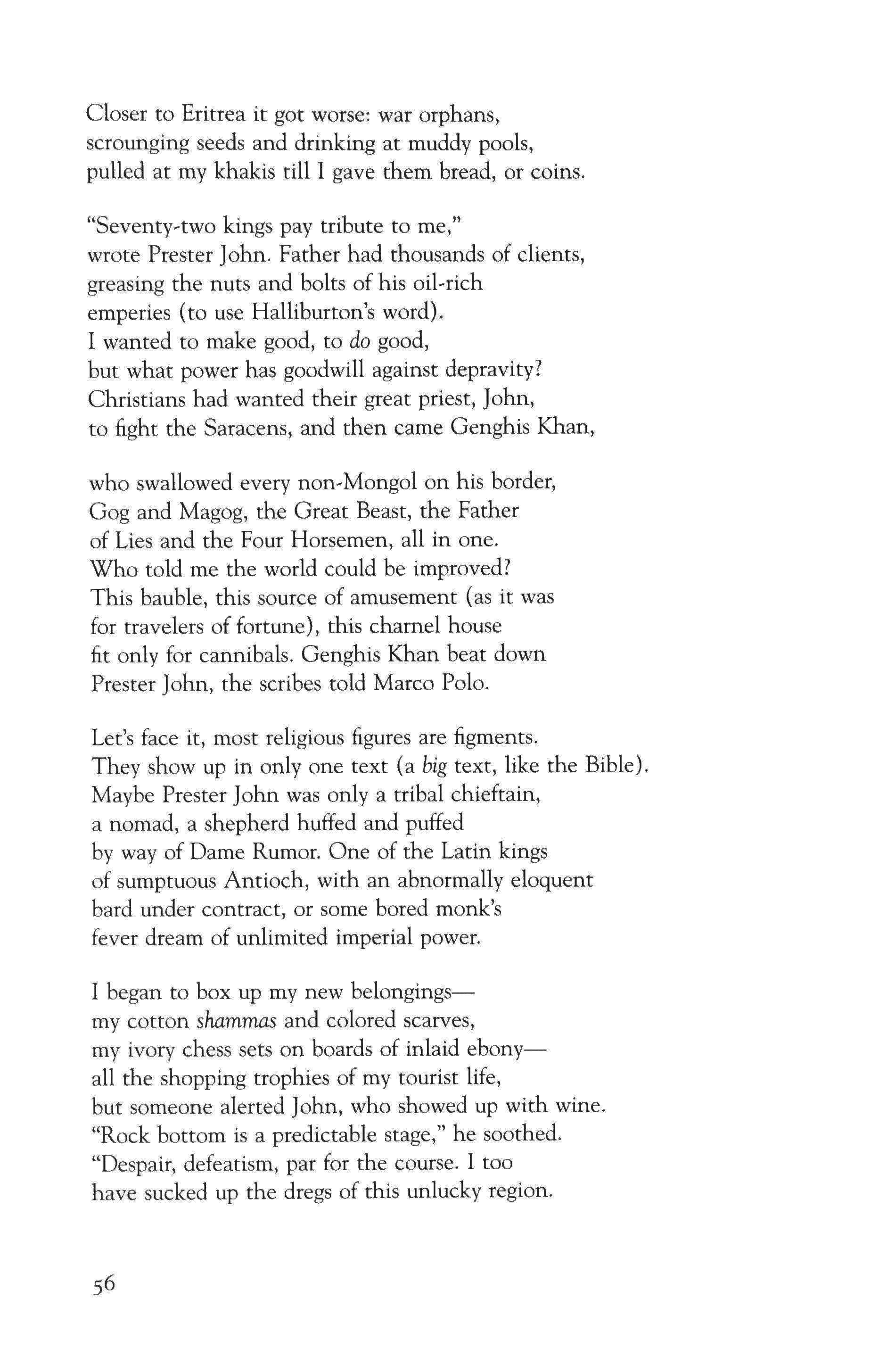
Closer to Eritrea it got worse: war orphans, scrounging seeds and drinking at muddy pools, pulled at my khakis till I gave them bread, or coins.
"Seventy-two kings pay tribute to me," wrote Prester John. Father had thousands of clients, greasing the nuts and bolts of his oil-rich emperies (to use Halliburton's word). I wanted to make good, to do good, but what power has goodwill against depravity? Christians had wanted their great priest, John, to fight the Saracens, and then came Genghis Khan,
who swallowed every non-Mongol on his border, Gog and Magog, the Great Beast, the Father of Lies and the Four Horsemen, all in one. Who told me the world could be improved? This bauble, this source of amusement (as it was for travelers of fortune), this charnel house fit only for cannibals. Genghis Khan beat down Prester John, the scribes told Marco Polo.
Let's face it, most religious figures are figments. They show up in only one text (a big text, like the Bible). Maybe Prester John was only a tribal chieftain, a nomad, a shepherd huffed and puffed by way of Dame Rumor. One of the Latin kings of sumptuous Antioch, with an abnormally eloquent bard under contract, or some bored monk's fever dream of unlimited imperial power.
I began to box up my new belongingsmy cotton shammas and colored scarves, my ivory chess sets on boards of inlaid ebonyall the shopping trophies of my tourist life, but someone alerted John, who showed up with wine. "Rock bottom is a predictable stage," he soothed. "Despair, defeatism, par for the course. I too have sucked up the dregs of this unlucky region.
56

"'God has commanded my ancestors and myself to send our people to exterminate the nations .' Excuse me, 'the �icked nations.' Who said that? The Khans of Karakorum, the anti-Mohammedans. Turns out, every non-Mongol nation was on the hordes' hit list and 'bit the dust' as our Homer liked to say. (He too is proscribed if our side succumbs, as you know.)
"Well, Karakorum is dust. Egypt would be dust if we choked off the Nile, a strategy I do not recommend. Nobody likes this god-eat-god scenario less than yours truly. But. there is always a 'But' on this subject deep in the ideology of this cradle of mankind it is prophesied a warrior will capture Mecca, join forces with the Emperor of Rome, and drive Islam from the world." He paused for breath. "Include me out," I said. "This is endtime talking, the mad stuff of Revelation. O.K., I know that power in a poor country is up for grabs, that 'Prester John' is a generic title, a buzzword, there for the taking. But I don't like taking or being taken. And if you travel into the Nubian desert or the city shops you'll find they don't cotton to crusades either."
A dream sorted it out for me. Or tried to. I stood over the Fountain of Youth, a parrot perched on my shoulder, chirping the word John. I flicked it away and stepped into the pool. An overwhelming joy possessed me, erotic and narcissist. I became a child, and Father called a name from the edge: "Amazon," he said, and I turned in happy recognition as I woke.
Surely Addis Ababa was not The Land of Grand Feminie, as the ancients named it, where women sent arrows into male chests and necks, yet I felt a thrill of pleasure
57
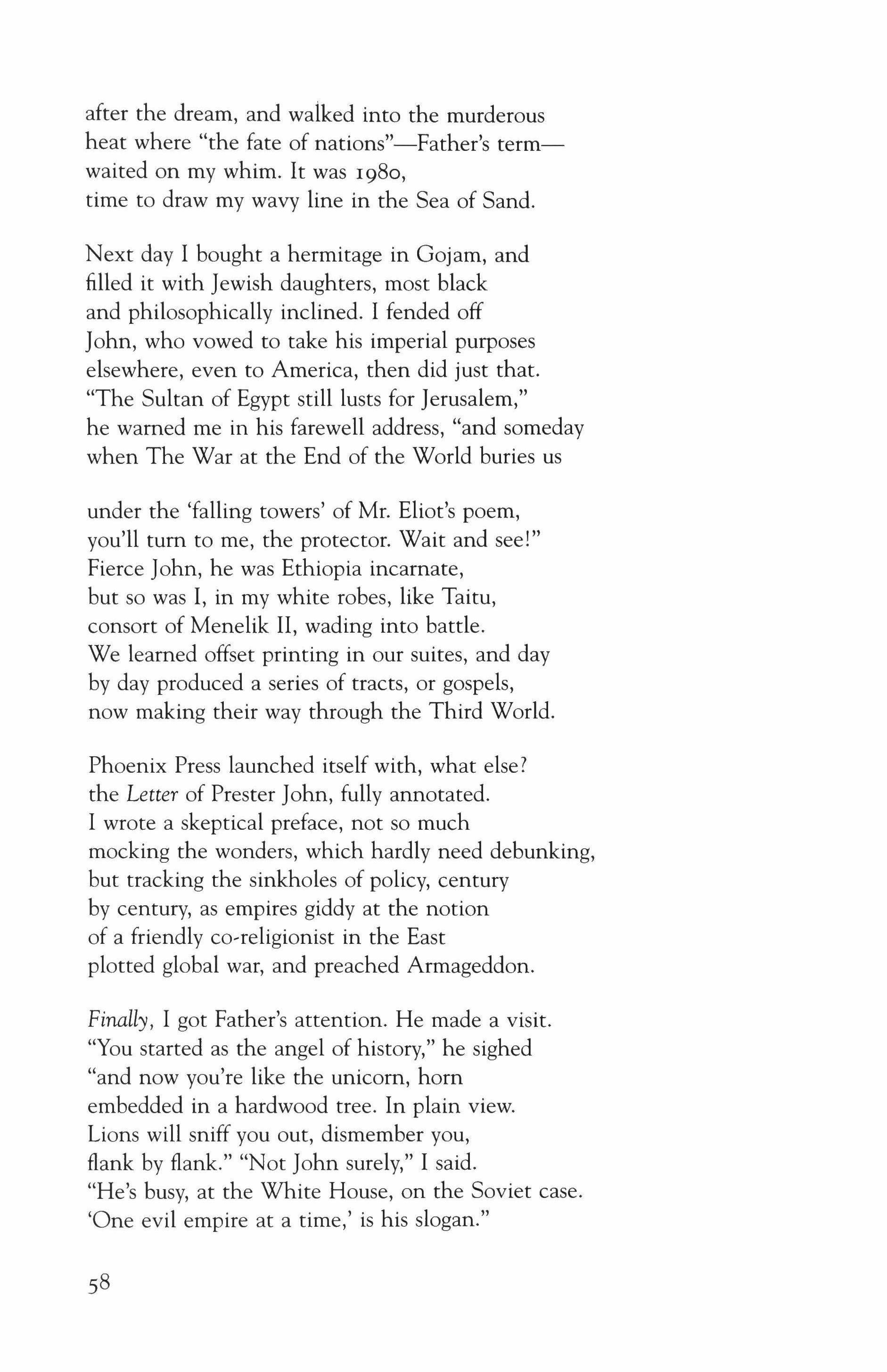
after the dream, and wa1ked into the murderous heat where "the fate of nations"-Father's termwaited on my whim. It was 1980, time to draw my wavy line in the Sea of Sand.
Next day I bought a hermitage in Gojam, and filled it with Jewish daughters, most black and philosophically inclined. I fended off John, who vowed to take his imperial purposes elsewhere, even to America, then did just that. "The Sultan of Egypt still lusts for Jerusalem," he warned me in his farewell address, "and someday when The War at the End of the World buries us
under the 'falling towers' of Mr. Eliot's poem, you'll tum to me, the protector. Wait and see!"
Fierce John, he was Ethiopia incarnate, but so was I, in my white robes, like Taitu, consort of Menelik II, wading into battle. We learned offset printing in our suites, and day by day produced a series of tracts, or gospels, now making their way through the Third World.
Phoenix Press launched itself with, what else? the Letter of Prester John, fully annotated. I wrote a skeptical preface, not so much mocking the wonders, which hardly need debunking, but tracking the sinkholes of policy, century by century, as empires giddy at the notion of a friendly co-religionist in the East plotted global war, and preached Armageddon.
Finally, I got Father's attention. He made a visit. "You started as the angel of history," he sighed "and now you're like the unicorn, hom embedded in a hardwood tree. In plain view. Lions will sniff you out, dismember you, flank by flank." "Not John surely," I said. "He's busy, at the White House, on the Soviet case. 'One evil empire at a time,' is his slogan."
58
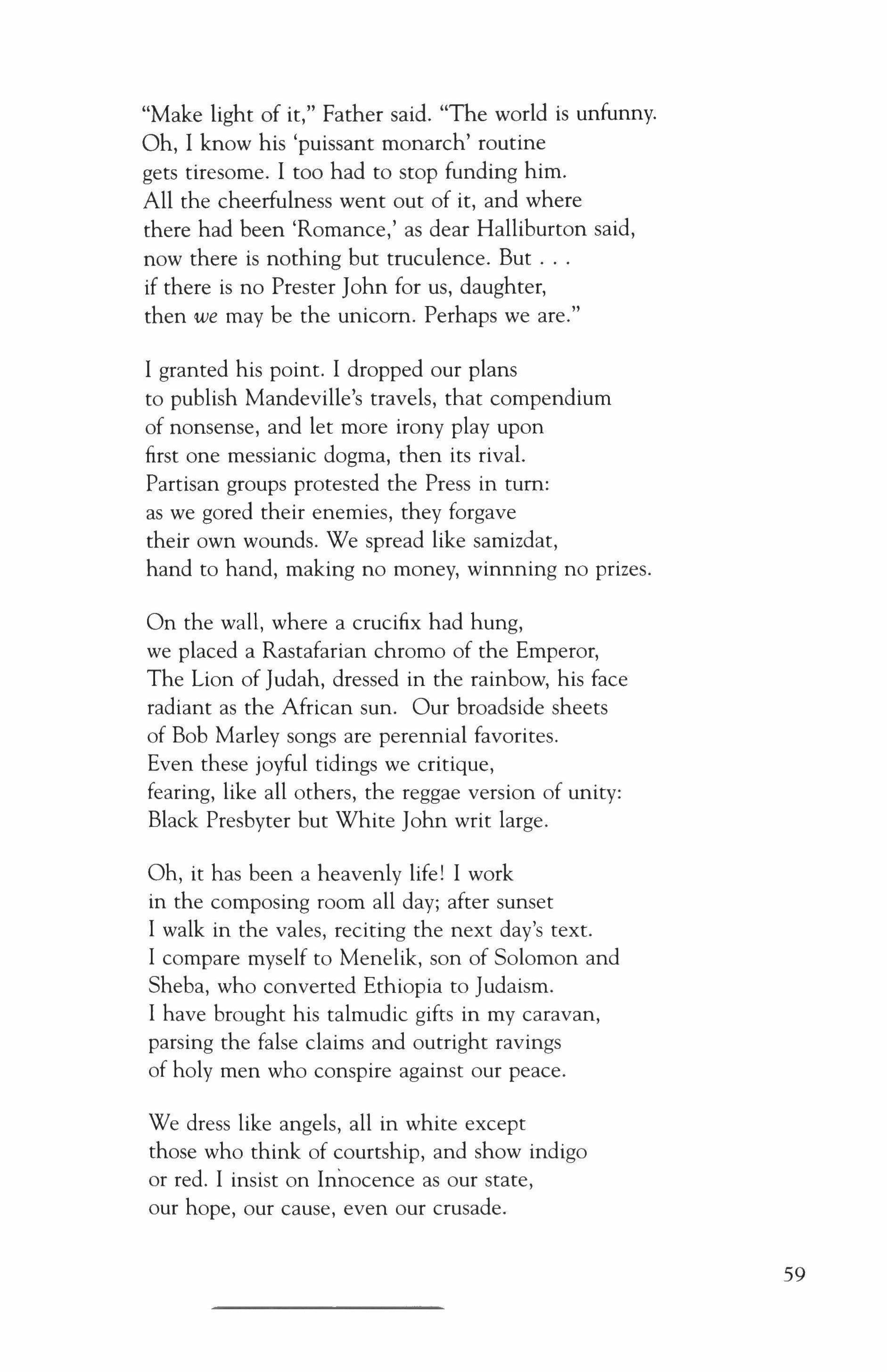
"Make light of it," Father said. "The world is unfunny. Oh, 1 know his 'puissant monarch' routine gets tiresome. 1 too had to stop funding him. All the cheerfulness went out of it, and where there had been 'Romance,' as dear Halliburton said, now there is nothing but truculence. But if there is no Prester John for us, daughter, then we may be the unicorn. Perhaps we are."
1 granted his point. 1 dropped our plans to publish Mandeville's travels, that compendium of nonsense, and let more irony play upon first one messianic dogma, then its rival. Partisan groups protested the Press in tum: as we gored their enemies, they forgave their own wounds. We spread like samizdat, hand to hand, making no money, winnning no prizes.
On the wall, where a crucifix had hung, we placed a Rastafarian chromo of the Emperor, The Lion of Judah, dressed in the rainbow, his face radiant as the African sun. Our broadside sheets of Bob Marley songs are perennial favorites. Even these joyful tidings we critique, fearing, like all others, the reggae version of unity: Black Presbyter but White John writ large.
Oh, it has been a heavenly life! I work in the composing room all day; after sunset I walk in the vales, reciting the next day's text. I compare myself to Menelik, son of Solomon and Sheba, who converted Ethiopia to Judaism. I have brought his talmudic gifts in my caravan, parsing the false claims and outright ravings of holy men who conspire against our peace.
We dress like angels, all in white except those who think of courtship, and show indigo or red. I insist on Innocence as our state, our hope, our cause, even our crusade.
59

We are sand in the Juggernaut's gears, modest though our dress and demeanor, and even our voices proclaim us pacifist, utopian"museful," as my antic father is wont to say.
We Hamitic sisters of the sacramental press keep The Book of Marvels nearby, not the one with dragons and giants, but Halliburton's guileless tale, when the exotic was unthreatening and a bright-eyed American boy could wander like Odysseus through the mysterious world even to Cambaluc, before sinking, in a storm, under a Chinese river majestic as the Nile.
60
Donna Seaman
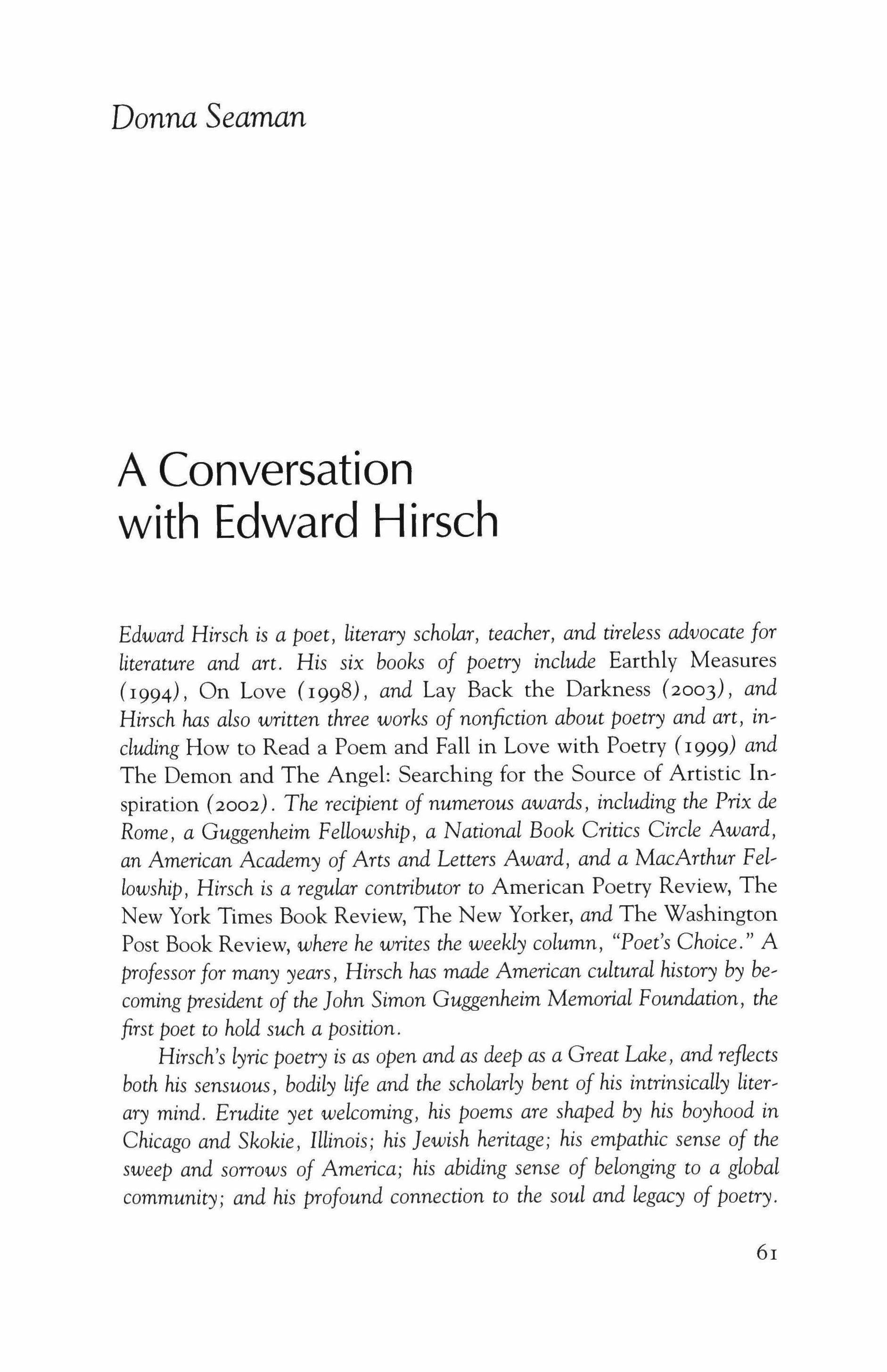
A Conversation with Edward Hirsch
Edward Hirsch is a poet, literary scholar, teacher, and tireless advocate for literature and art. His six books of poetry include Earthly Measures (1994), On Love (1998), and Lay Back the Darkness (2003), and Hirsch has also written three works of nonfiction about poetry and art, including How to Read a Poem and Fall in Love with Poetry (1999) and The Demon and The Angel: Searching for the Source of Artistic Inspiration (2002). The recipient of numerous awards, including the Prix de Rome, a Guggenheim Fellowship, a National Book Critics Circle Award, an American Academy of Arts and Letters Award, and a MacArthur Fellowship, Hirsch is a regular contributor to American Poetry Review, The New York Times Book Review, The New Yorker, and The Washington Post Book Review, where he writes the weekly column, "Poet's Choice." A professor for many years, Hirsch has made American cultural history by becoming president of the John Simon Guggenheim Memorial Foundation, the first poet to hold such a position.
Hirsch's lyric poetry is as open and as deep as a Great Lake, and reflects both his sensuous, bodily life and the scholarly bent of his intrinsically literary mind. Erudite yet welcoming, his poems are shaped by his boyhood in Chicago and Skokie, Illinois; his Jewish heritage; his empathic sense of the sweep and sorrows of America; his abiding sense of belonging to a global community; and his profound connection to the soul and legacy of poetry.
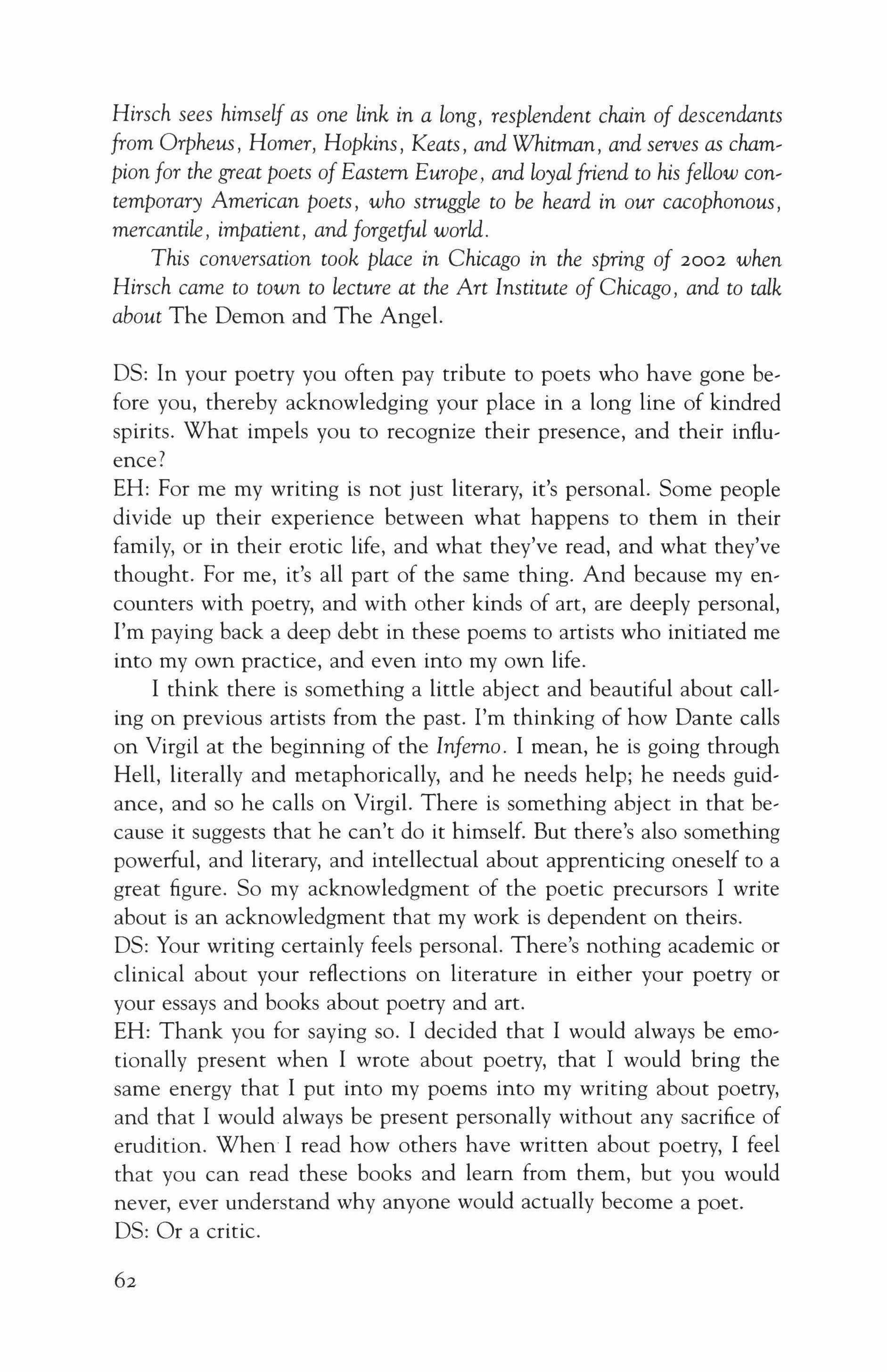
Hirsch sees himself as one link in along, resplendent chain of descendants from Orpheus, Homer, Hopkins, Keats, and Whitman, and serves as cham� pion for the great poets of Eastern Europe, and loyalfriend to his fellow contemporary American poets, who struggle to be heard in our cacophonous, mercantile, impatient, and forgetful world.
This conversation took place in Chicago in the spring of 2002 when Hirsch came to town to lecture at the Art Institute of Chicago, and to talk about The Demon and The Angel.
DS: In your poetry you often pay tribute to poets who have gone before you, thereby acknowledging your place in a long line of kindred spirits. What impels you to recognize their presence, and their influence?
EH: For me my writing is not just literary, it's personal. Some people divide up their experience between what happens to them in their family, or in their erotic life, and what they've read, and what they've thought. For me, it's all part of the same thing. And because my encounters with poetry, and with other kinds of art, are deeply personal, I'm paying back a deep debt in these poems to artists who initiated me into my own practice, and even into my own life.
I think there is something a little abject and beautiful about calling on previous artists from the past. I'm thinking of how Dante calls on Virgil at the beginning of the Inferno. I mean, he is going through Hell, literally and metaphorically, and he needs help; he needs guidance, and so he calls on Virgil. There is something abject in that because it suggests that he can't do it himself. But there's also something powerful, and literary, and intellectual about apprenticing oneself to a great figure. So my acknowledgment of the poetic precursors I write about is an acknowledgment that my work is dependent on theirs.
DS: Your writing certainly feels personal. There's nothing academic or clinical about your reflections on literature in either your poetry or your essays and books about poetry and art.
EH: Thank you for saying so. I decided that I would always be emotionally present when I wrote about poetry, that I would bring the same energy that I put into my poems into my writing about poetry, and that I would always be present personally without any sacrifice of erudition. When I read how others have written about poetry, I feel that you can read these books and learn from them, but you would never, ever understand why anyone would actually become a poet.
DS: Or a critic.
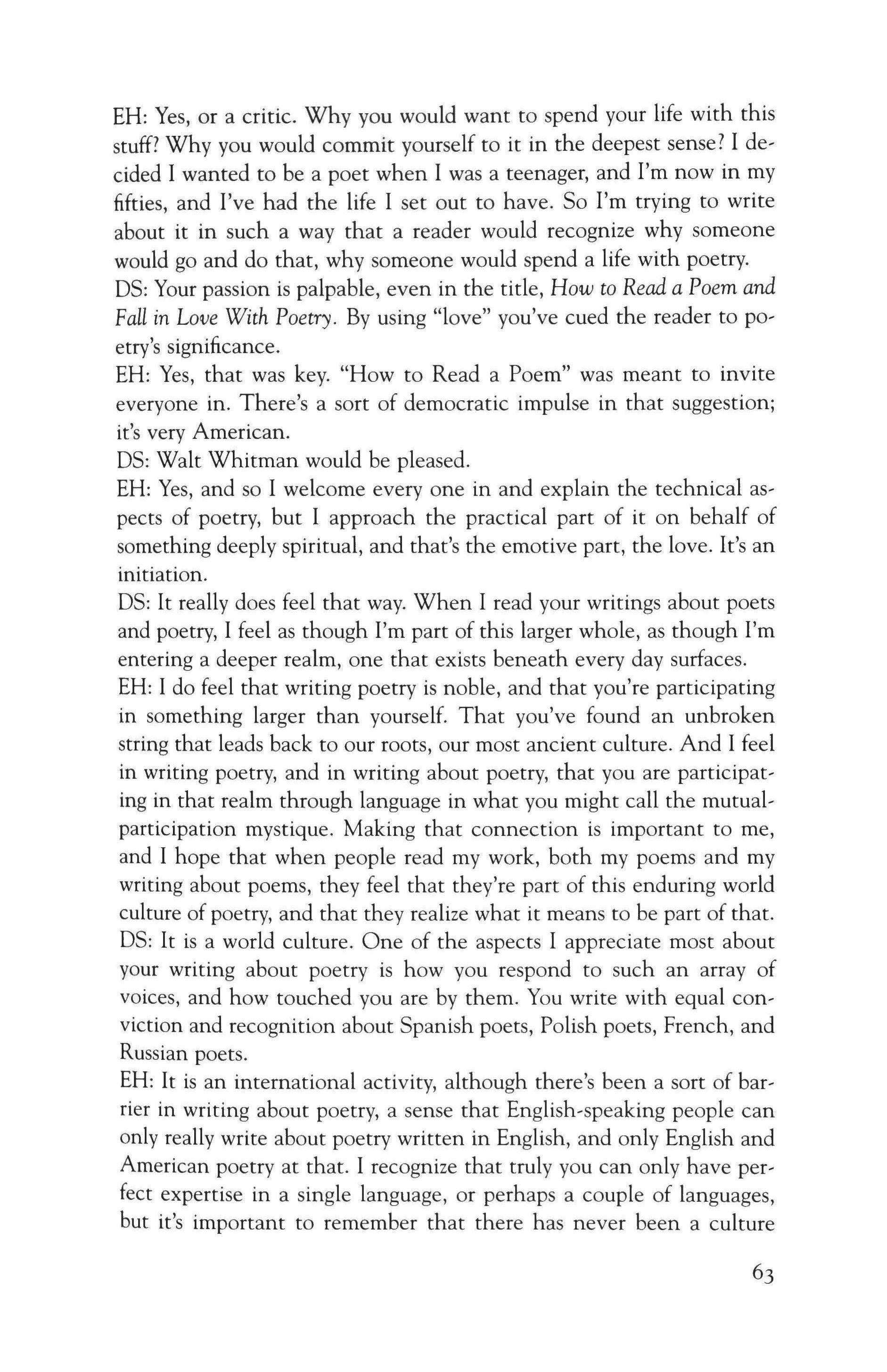
EH: Yes, or a critic. Why you would want to spend your life with this stuff? Why you would commit yourself to it in the deepest sense? I de, cided I wanted to be a poet when I was a teenager, and I'm now in my fifties, and I've had the life I set out to have. So I'm trying to write about it in such a way that a reader would recognize why someone would go and do that, why someone would spend a life with poetry.
OS: Your passion is palpable, even in the title, How to Read a Poem and Fall in Love With Poetry. By using "love" you've cued the reader to poetry's significance.
EH: Yes, that was key. "How to Read a Poem" was meant to invite everyone in. There's a sort of democratic impulse in that suggestion; it's very American.
OS: Walt Whitman would be pleased.
EH: Yes, and so I welcome every one in and explain the technical as, pects of poetry, but I approach the practical part of it on behalf of something deeply spiritual, and that's the emotive part, the love. It's an initiation.
OS: It really does feel that way. When I read your writings about poets and poetry, I feel as though I'm part of this larger whole, as though I'm entering a deeper realm, one that exists beneath every day surfaces.
EH: I do feel that writing poetry is noble, and that you're participating in something larger than yourself. That you've found an unbroken string that leads back to our roots, our most ancient culture. And I feel in writing poetry, and in writing about poetry, that you are participating in that realm through language in what you might call the mutual, participation mystique. Making that connection is important to me, and I hope that when people read my work, both my poems and my writing about poems, they feel that they're part of this enduring world culture of poetry, and that they realize what it means to be part of that.
OS: It is a world culture. One of the aspects I appreciate most about your writing about poetry is how you respond to such an array of voices, and how touched you are by them. You write with equal con, viction and recognition about Spanish poets, Polish poets, French, and Russian poets.
EH: It is an international activity, although there's been a sort of bar, rier in writing about poetry, a sense that English-speaking people can only really write about poetry written in English, and only English and American poetry at that. I recognize that truly you can only have per, fect expertise in a single language, or perhaps a couple of languages, but it's important to remember that there has never been a culture
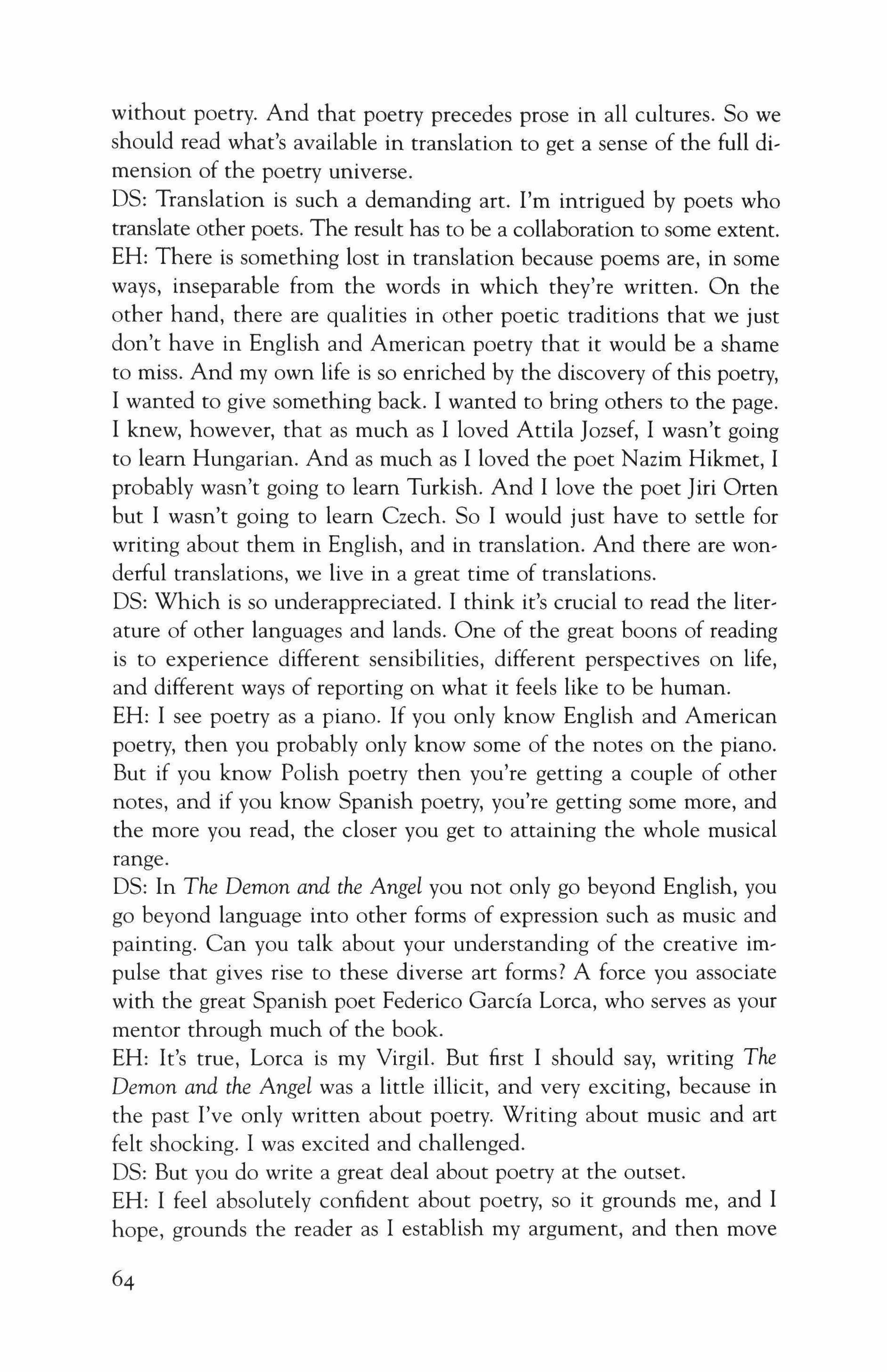
without poetry. And that poetry precedes prose in all cultures. So we should read what's available in translation to get a sense of the full dimension of the poetry universe.
OS: Translation is such a demanding art. I'm intrigued by poets who translate other poets. The result has to be a collaboration to some extent.
EH: There is something lost in translation because poems are, in some ways, inseparable from the words in which they're written. On the other hand, there are qualities in other poetic traditions that we just don't have in English and American poetry that it would be a shame to miss. And my own life is so enriched by the discovery of this poetry, I wanted to give something back. I wanted to bring others to the page. I knew, however, that as much as I loved Attila [ozsef, I wasn't going to learn Hungarian. And as much as I loved the poet Nazim Hikmet, I probably wasn't going to learn Turkish. And I love the poet [iri Orten but I wasn't going to learn Czech. So I would just have to settle for writing about them in English, and in translation. And there are won, derful translations, we live in a great time of translations.
OS: Which is so underappreciated. I think it's crucial to read the liter' ature of other languages and lands. One of the great boons of reading is to experience different sensibilities, different perspectives on life, and different ways of reporting on what it feels like to be human.
EH: I see poetry as a piano. If you only know English and American poetry, then you probably only know some of the notes on the piano. But if you know Polish poetry then you're getting a couple of other notes, and if you know Spanish poetry, you're getting some more, and the more you read, the closer you get to attaining the whole musical range.
OS: In The Demon and the Angel you not only go beyond English, you go beyond language into other forms of expression such as music and painting. Can you talk about your understanding of the creative impulse that gives rise to these diverse art forms? A force you associate with the great Spanish poet Federico Garda Lorca, who serves as your mentor through much of the book.
EH: It's true, Lorca is my Virgil. But first I should say, writing The Demon and the Angel was a little illicit, and very exciting, because in the past I've only written about poetry. Writing about music and art felt shocking. I was excited and challenged.
OS: But you do write a great deal about poetry at the outset.
EH: I feel absolutely confident about poetry, so it grounds me, and I hope, grounds the reader as I establish my argument, and then move
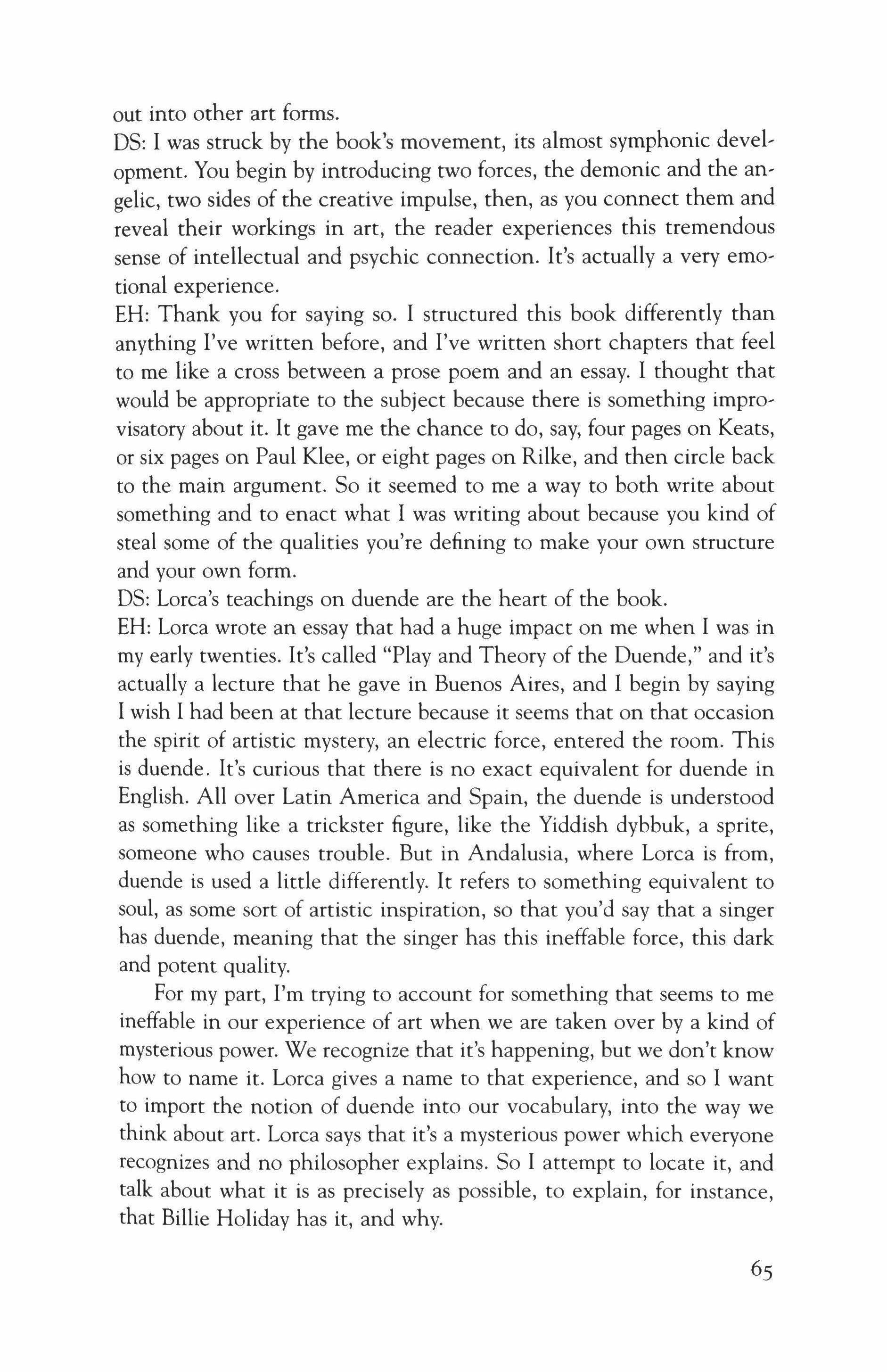
out into other art forms.
OS: I was struck by the book's movement, its almost symphonic development. You begin by introducing two forces, the demonic and the angelic, two sides of the creative impulse, then, as you connect them and reveal their workings in art, the reader experiences this tremendous sense of intellectual and psychic connection. It's actually a very emotional experience.
EH: Thank you for saying so. I structured this book differently than anything I've written before, and I've written short chapters that feel to me like a cross between a prose poem and an essay. I thought that would be appropriate to the subject because there is something improvisatory about it. It gave me the chance to do, say, four pages on Keats, or six pages on Paul Klee, or eight pages on Rilke, and then circle back to the main argument. So it seemed to me a way to both write about something and to enact what I was writing about because you kind of steal some of the qualities you're defining to make your own structure and your own form.
OS: Lorca's teachings on duende are the heart of the book.
EH: Lorca wrote an essay that had a huge impact on me when I was in my early twenties. It's called "Play and Theory of the Duende," and it's actually a lecture that he gave in Buenos Aires, and I begin by saying I wish I had been at that lecture because it seems that on that occasion the spirit of artistic mystery, an electric force, entered the room. This is duende. It's curious that there is no exact equivalent for duende in English. All over Latin America and Spain, the duende is understood as something like a trickster figure, like the Yiddish dybbuk, a sprite, someone who causes trouble. But in Andalusia, where Lorca is from, duende is used a little differently. It refers to something equivalent to soul, as some sort of artistic inspiration, so that you'd say that a singer has duende, meaning that the singer has this ineffable force, this dark and potent quality.
For my part, I'm trying to account for something that seems to me ineffable in our experience of art when we are taken over by a kind of mysterious power. We recognize that it's happening, but we don't know how to name it. Lorca gives a name to that experience, and so I want to import the notion of duende into our vocabulary, into the way we think about art. Lorca says that it's a mysterious power which everyone recognizes and no philosopher explains. So I attempt to locate it, and talk about what it is as precisely as possible, to explain, for instance, that Billie Holiday has it, and why.
65
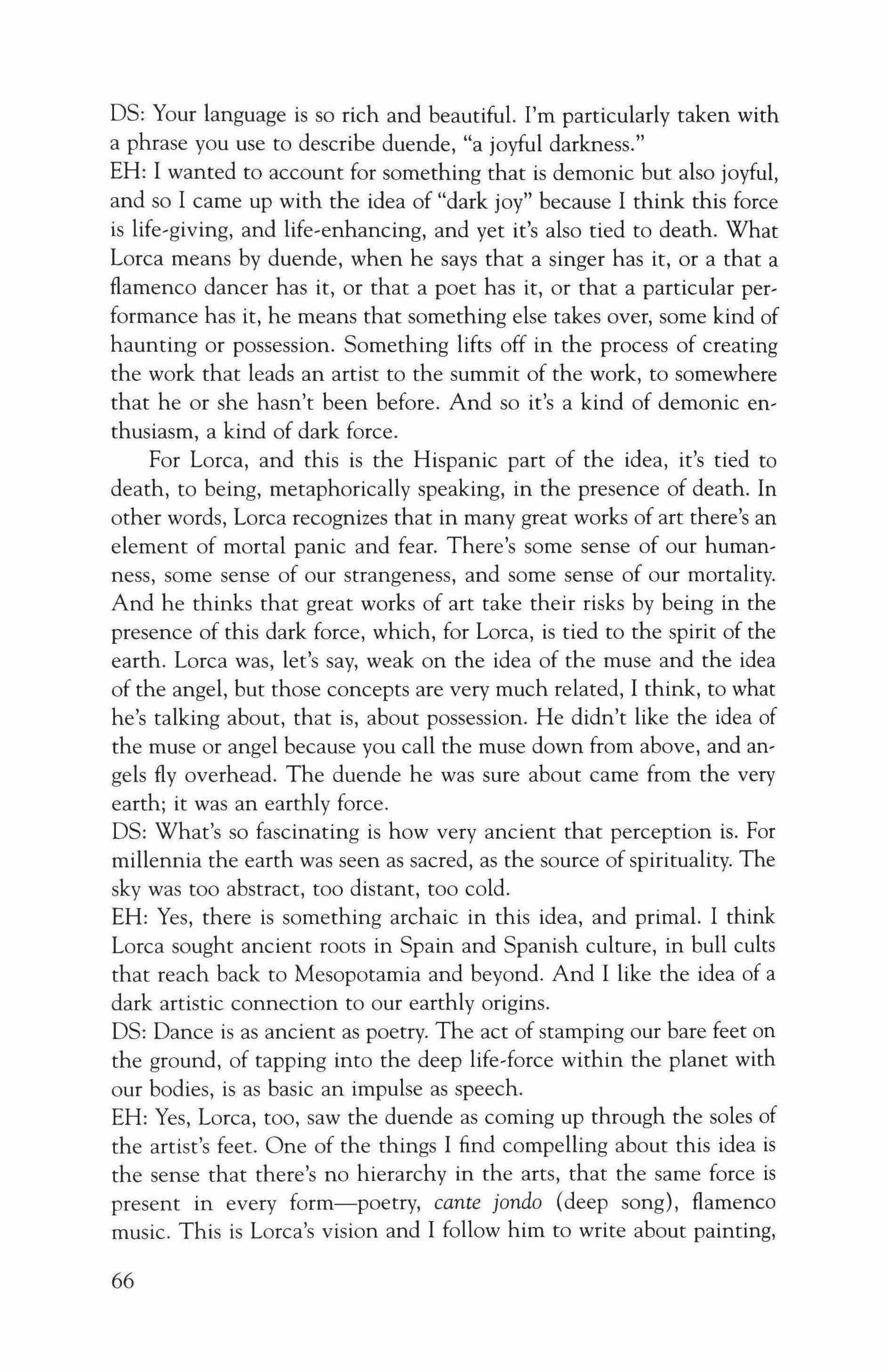
os: Your language is so rich and beautiful. I'm particularly taken with a phrase you use to describe duende, "a joyful darkness."
EH: I wanted to account for something that is demonic but also joyful, and so I came up with the idea of "dark joy" because I think this force is life-giving, and life,enhancing, and yet it's also tied to death. What Lorca means by duende, when he says that a singer has it, or a that a flamenco dancer has it, or that a poet has it, or that a particular per, formance has it, he means that something else takes over, some kind of haunting or possession. Something lifts off in the process of creating the work that leads an artist to the summit of the work, to somewhere that he or she hasn't been before. And so it's a kind of demonic en' thusiasm, a kind of dark force.
For Lorca, and this is the Hispanic part of the idea, it's tied to death, to being, metaphorically speaking, in the presence of death. In other words, Lorca recognizes that in many great works of art there's an element of mortal panic and fear. There's some sense of our human, ness, some sense of our strangeness, and some sense of our mortality. And he thinks that great works of art take their risks by being in the presence of this dark force, which, for Lorca, is tied to the spirit of the earth. Lorca was, let's say, weak on the idea of the muse and the idea of the angel, but those concepts are very much related, I think, to what he's talking about, that is, about possession. He didn't like the idea of the muse or angel because you call the muse down from above, and an, gels fly overhead. The duende he was sure about came from the very earth; it was an earthly force.
OS: What's so fascinating is how very ancient that perception is. For millennia the earth was seen as sacred, as the source of spirituality. The sky was too abstract, too distant, too cold.
EH: Yes, there is something archaic in this idea, and primal. I think Lorca sought ancient roots in Spain and Spanish culture, in bull cults that reach back to Mesopotamia and beyond. And I like the idea of a dark artistic connection to our earthly origins.
OS: Dance is as ancient as poetry. The act of stamping our bare feet on the ground, of tapping into the deep life,force within the planet with our bodies, is as basic an impulse as speech.
EH: Yes, Lorca, too, saw the duende as coming up through the soles of the artist's feet. One of the things I find compelling about this idea is the sense that there's no hierarchy in the arts, that the same force is present in every form-poetry, cante jondo (deep song), flamenco music. This is Lorca's vision and I follow him to write about painting,
66
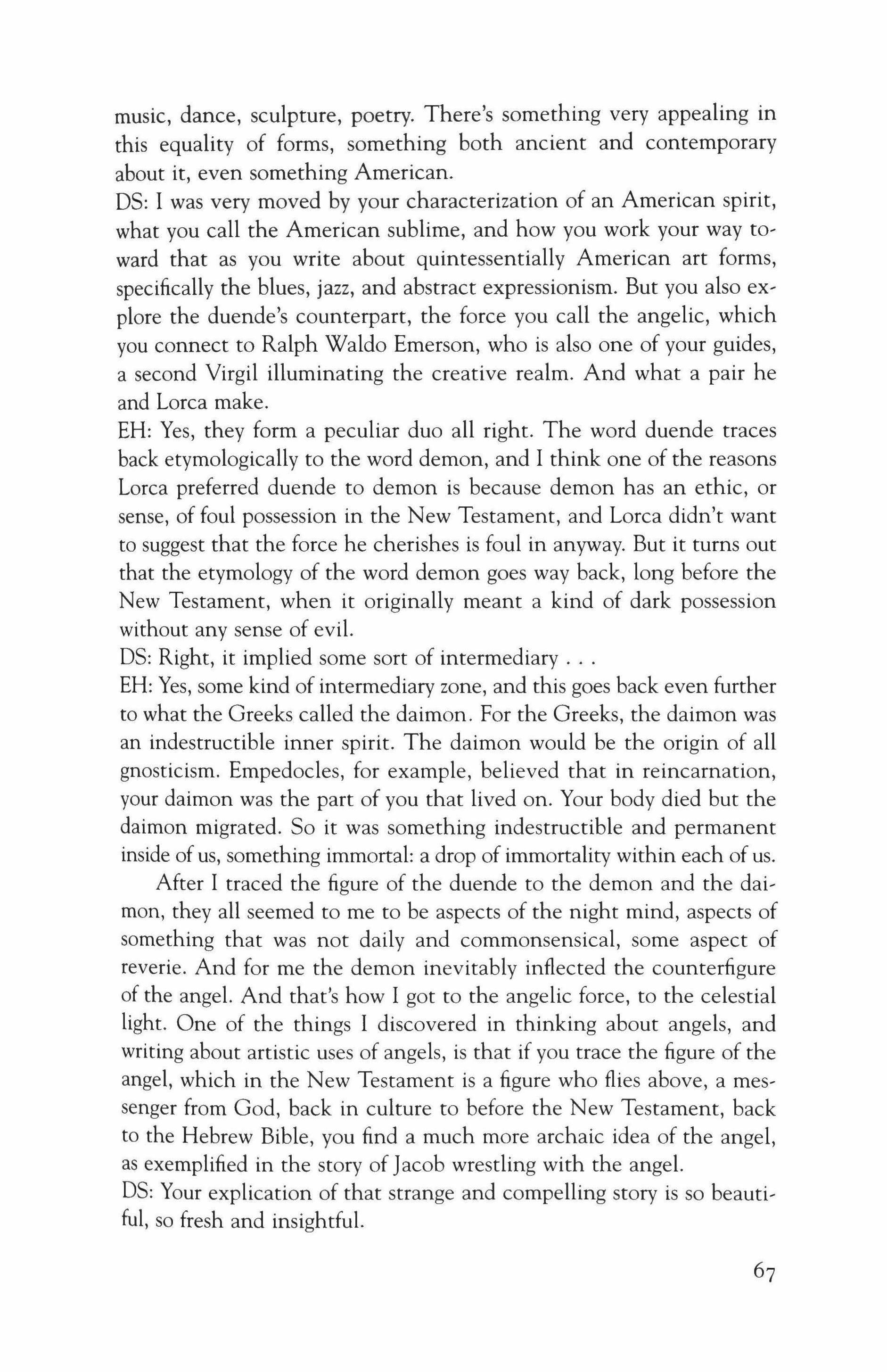
music, dance, sculpture, poetry. There's something very appealing in this equality of forms, something both ancient and contemporary about it, even something American.
OS: I was very moved by your characterization of an American spirit, what you call the American sublime, and how you work your way to' ward that as you write about quintessentially American art forms, specifically the blues, jazz, and abstract expressionism. But you also ex, plore the duende's counterpart, the force you call the angelic, which you connect to Ralph Waldo Emerson, who is also one of your guides, a second Virgil illuminating the creative realm. And what a pair he and Lorca make.
EH: Yes, they form a peculiar duo all right. The word duende traces back etymologically to the word demon, and I think one of the reasons Lorca preferred duende to demon is because demon has an ethic, or sense, of foul possession in the New Testament, and Lorca didn't want to suggest that the force he cherishes is foul in anyway. But it turns out that the etymology of the word demon goes way back, long before the New Testament, when it originally meant a kind of dark possession without any sense of evil.
OS: Right, it implied some sort of intermediary EH: Yes, some kind of intermediary zone, and this goes back even further to what the Greeks called the daimon. For the Greeks, the daimon was an indestructible inner spirit. The daimon would be the origin of all gnosticism. Empedocles, for example, believed that in reincarnation, your daimon was the part of you that lived on. Your body died but the daimon migrated. So it was something indestructible and permanent inside of us, something immortal: a drop of immortality within each of us.
After I traced the figure of the duende to the demon and the daiman, they all seemed to me to be aspects of the night mind, aspects of something that was not daily and commonsensical, some aspect of reverie. And for me the demon inevitably inflected the counterfigure of the angel. And that's how I got to the angelic force, to the celestial light. One of the things I discovered in thinking about angels, and writing about artistic uses of angels, is that if you trace the figure of the angel, which in the New Testament is a figure who flies above, ames, senger from God, back in culture to before the New Testament, back to the Hebrew Bible, you find a much more archaic idea of the angel, as exemplified in the story of Jacob wrestling with the angel.
OS: Your explication of that strange and compelling story is so beautiful, so fresh and insightful.
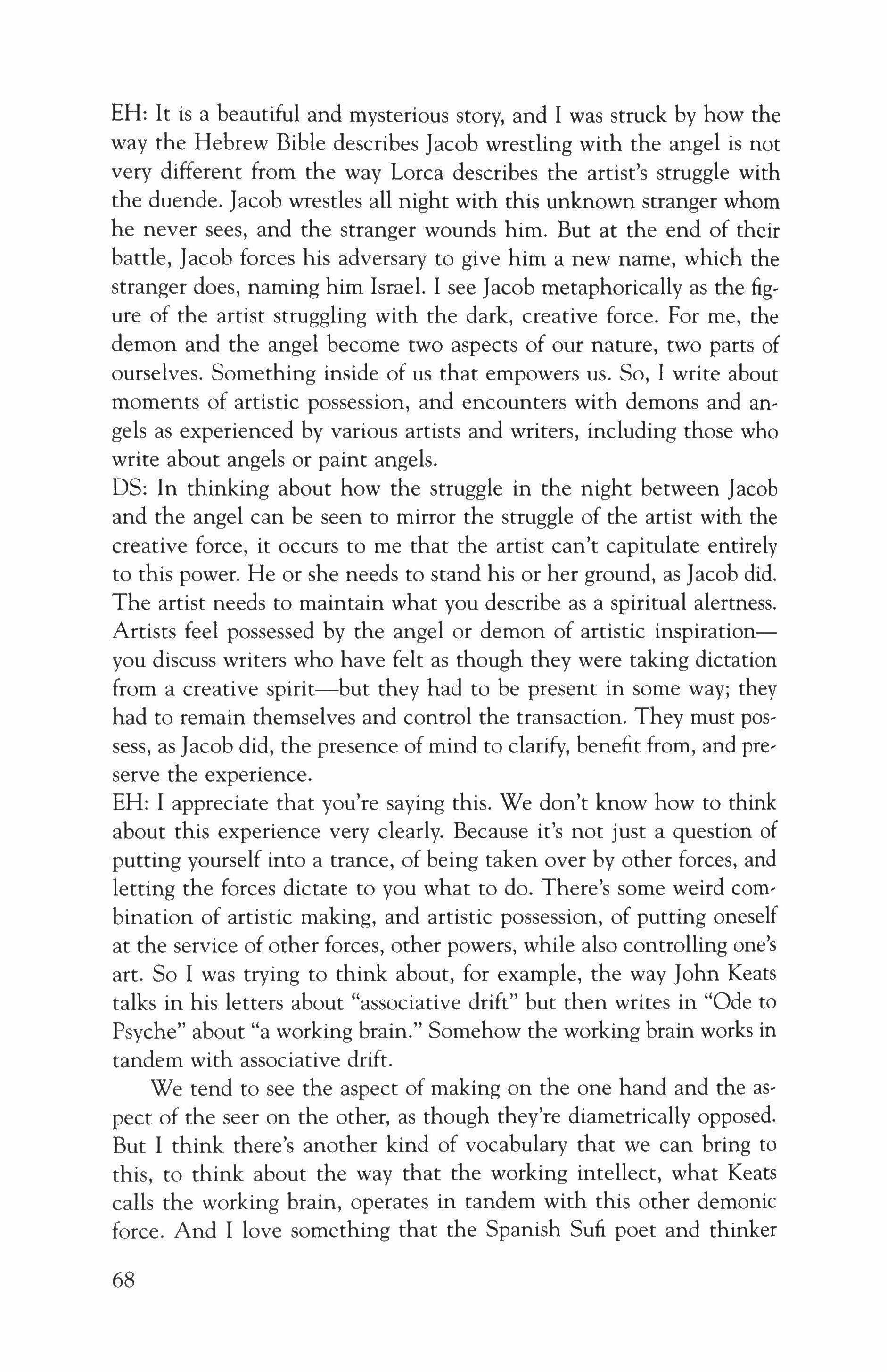
EH: It is a beautiful and mysterious story, and I was struck by how the way the Hebrew Bible describes Jacob wrestling with the angel is not very different from the way Lorca describes the artist's struggle with the duende. Jacob wrestles all night with this unknown stranger whom he never sees, and the stranger wounds him. But at the end of their battle, Jacob forces his adversary to give him a new name, which the stranger does, naming him Israel. I see Jacob metaphorically as the figure of the artist struggling with the dark, creative force. For me, the demon and the angel become two aspects of our nature, two parts of ourselves. Something inside of us that empowers us. So, I write about moments of artistic possession, and encounters with demons and angels as experienced by various artists and writers, including those who write about angels or paint angels.
DS: In thinking about how the struggle in the night between Jacob and the angel can be seen to mirror the struggle of the artist with the creative force, it occurs to me that the artist can't capitulate entirely to this power. He or she needs to stand his or her ground, as Jacob did. The artist needs to maintain what you describe as a spiritual alertness. Artists feel possessed by the angel or demon of artistic inspirationyou discuss writers who have felt as though they were taking dictation from a creative spirit-but they had to be present in some way; they had to remain themselves and control the transaction. They must possess, as Jacob did, the presence of mind to clarify, benefit from, and preserve the experience.
EH: I appreciate that you're saying this. We don't know how to think about this experience very clearly. Because it's not just a question of putting yourself into a trance, of being taken over by other forces, and letting the forces dictate to you what to do. There's some weird combination of artistic making, and artistic possession, of putting oneself at the service of other forces, other powers, while also controlling one's art. So I was trying to think about, for example, the way John Keats talks in his letters about "associative drift" but then writes in "Ode to Psyche" about "a working brain." Somehow the working brain works in tandem with associative drift.
We tend to see the aspect of making on the one hand and the aspect of the seer on the other, as though they're diametrically opposed. But I think there's another kind of vocabulary that we can bring to this, to think about the way that the working intellect, what Keats calls the working brain, operates in tandem with this other demonic force. And I love something that the Spanish Sufi poet and thinker
68
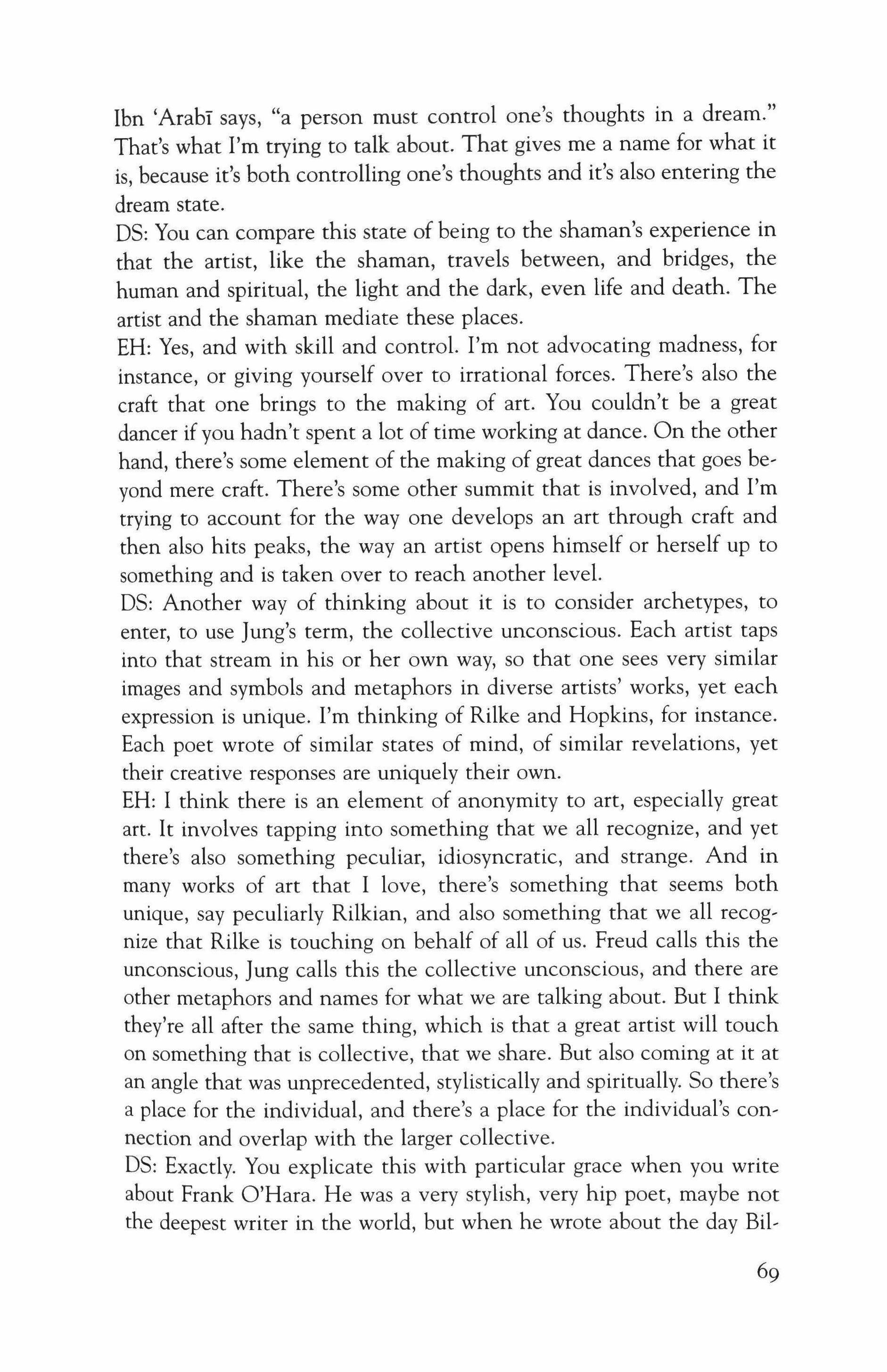
Ibn 'Arabi says, "a person must control one's thoughts in a dream." That's what I'm trying to talk about. That gives me a name for what it is, because it's both controlling one's thoughts and it's also entering the dream state.
OS: You can compare this state of being to the shaman's experience in that the artist, like the shaman, travels between, and bridges, the human and spiritual, the light and the dark, even life and death. The artist and the shaman mediate these places.
EH: Yes, and with skill and control. I'm not advocating madness, for instance, or giving yourself over to irrational forces. There's also the craft that one brings to the making of art. You couldn't be a great dancer if you hadn't spent a lot of time working at dance. On the other hand, there's some element of the making of great dances that goes beyond mere craft. There's some other summit that is involved, and I'm trying to account for the way one develops an art through craft and then also hits peaks, the wayan artist opens himself or herself up to something and is taken over to reach another level.
OS: Another way of thinking about it is to consider archetypes, to enter, to use lung's term, the collective unconscious. Each artist taps into that stream in his or her own way, so that one sees very similar images and symbols and metaphors in diverse artists' works, yet each expression is unique. I'm thinking of Rilke and Hopkins, for instance. Each poet wrote of similar states of mind, of similar revelations, yet their creative responses are uniquely their own.
EH: I think there is an element of anonymity to art, especially great art. It involves tapping into something that we all recognize, and yet there's also something peculiar, idiosyncratic, and strange. And in many works of art that I love, there's something that seems both unique, say peculiarly Rilkian, and also something that we all recognize that Rilke is touching on behalf of all of us. Freud calls this the unconscious, lung calls this the collective unconscious, and there are other metaphors and names for what we are talking about. But I think they're all after the same thing, which is that a great artist will touch on something that is collective, that we share. But also coming at it at an angle that was unprecedented, stylistically and spiritually. So there's a place for the individual, and there's a place for the individual's connection and overlap with the larger collective.
OS: Exactly. You explicate this with particular grace when you write about Frank O'Hara. He was a very stylish, very hip poet, maybe not the deepest writer in the world, but when he wrote about the day Bil�

lie Holiday died, he plugged directly into the electric current we're talking about. And you write about how Holiday had duende to an almost overwhelming degree-she's a perfect example of how difficult it is for an artist to live with that intensity, that creative force, flowing so hotly through her life. And you intuit that O'Hara channeled that force when writing about Holiday. He catches fire, as you do in describing it, as the reader does in reading it. This is an incredibly moving recognition of the duende's power.
EH: I love a lot of O'Hara's work, but in the poem, "The Day Lady Died," he hits another note. It's not just cosmopolitan; it's not just charm; he finds a darker music, and in trying to account for how that happens in this one poem I feel that, yes, Billie Holiday lent him her duende. In its opening lines, this poem seems connected to O'Hara's other work; it's one of those "I do this, I do that" Frank O'Hara poems: first I'm going to go out to dinner with Patsy, then I'm going to buy a book for so and so. Then he's going to the bank and "Miss Stillwagon (first name Linda I once heard}fdoesn't even look up my balance for once in her life." But then he sees the picture of Billie Holiday on the cover of the New York Post and the poem changes dimension. It just takes off. And suddenly he is transported back to the moment when he was in the 5 Spot, a jazz club in New York, leaning against the door, and listening to Billie Holiday sing, and he ends the poem as she whispers a song "to Mel Waldron and everyone and I stop breathing."
It's just a fabulous end to the poem because the poem stops breathing, you stop breathing, and the spirit is transported to the audience. And I felt that somehow when Billie Holiday took over that poem, something lifted off, that the duende had arrived. And this triggered my memory of an experience I'd had that I hadn't actually ever articulated. I was on a street in New Orleans watching a little girl dance, and I don't know quite what happened but the accompanist hit a string of odd, extremely low notes, and suddenly she began dancing with another kind of fever. It was almost lunatic. But what struck me was that everyone immediately understood that we were not just watching a street dancer, that she was peaking, that she was hitting another note, that she was inspired. And she was moving more quickly than she had moved before, and with more power and control. And it went winging through the crowd, this electricity. Time stopped. Everyone stopped breathing. And that's what happens with art. You're suddenly aware that something amazing is happening, that you're a part of something. DS: Something has broken through.

EH: That's it.
OS: You write that Lorca observes that the duende may reside as much in the audience as the artist. That it travels between the performer and those who watch and listen and read.
EH: I don't think that we could recognize it if we weren't part of it, or if the artist wasn't tapping into something on behalf of all of us. Lorca liked to invoke the duende before his poetry readings because he said only when the duende was present could an artist be sure of being loved and understood. Only then could one be recognized and the audience give up its intellect and undertake the hard task of understanding metaphor. And we can only do that if we're aware of it, if we're conscious and present, if the duende is available to us. So, I feel that it's a kind of ethic of communication, an ethic of participation.
In How to Read a Poem and Fall in Love With Poetry, I write about Martin Buber because I love Buber's idea that "in the beginning is the relation." In I and Thou, he writes that the relation precedes the Word, because it's authored by the human. And in a way I feel that duende is not just located in a singular artistic experience, but rather when the artist connects with an audience. And the audience can be a reader, someone watching a dance, or someone listening to a song, or it could be a group of people. I mean, I think it was easiest for Lorca to find it in spoken poetry, in dance, in music because they were all performances. It's more palpable in a performance. But I also wanted to locate it in written poetry and in visual art. There are moments when you're with the painting or you're with the poem or you're with the piece of music on your own and you are transported. In other words you bring your own duende to it, you bring your own spirit, you bring your own soul to it. I like this idea of a sort of electricity that passes back and forth between the work of art and the recipient of the art.
OS: You segue into a profound consideration of American art in the last third of The Demon and the Angel, especially blues, jazz, and abstract expressionism. And surely only you would say that singer and musician Robert Johnson is the Gerard Manley Hopkins of the blues.
EH: I do turn to American art in the final part of the book, to the American experience, and I offer a counter argument to the idea that American art is all created in what Emerson called "the optative mood." We do have a kind of native optimism, and we do live in a kind of present without much historical consciousness, as we know all too well. But there is a darker side to our national temperament and to our art, and I wanted to recognize and write about this. So I look to
71
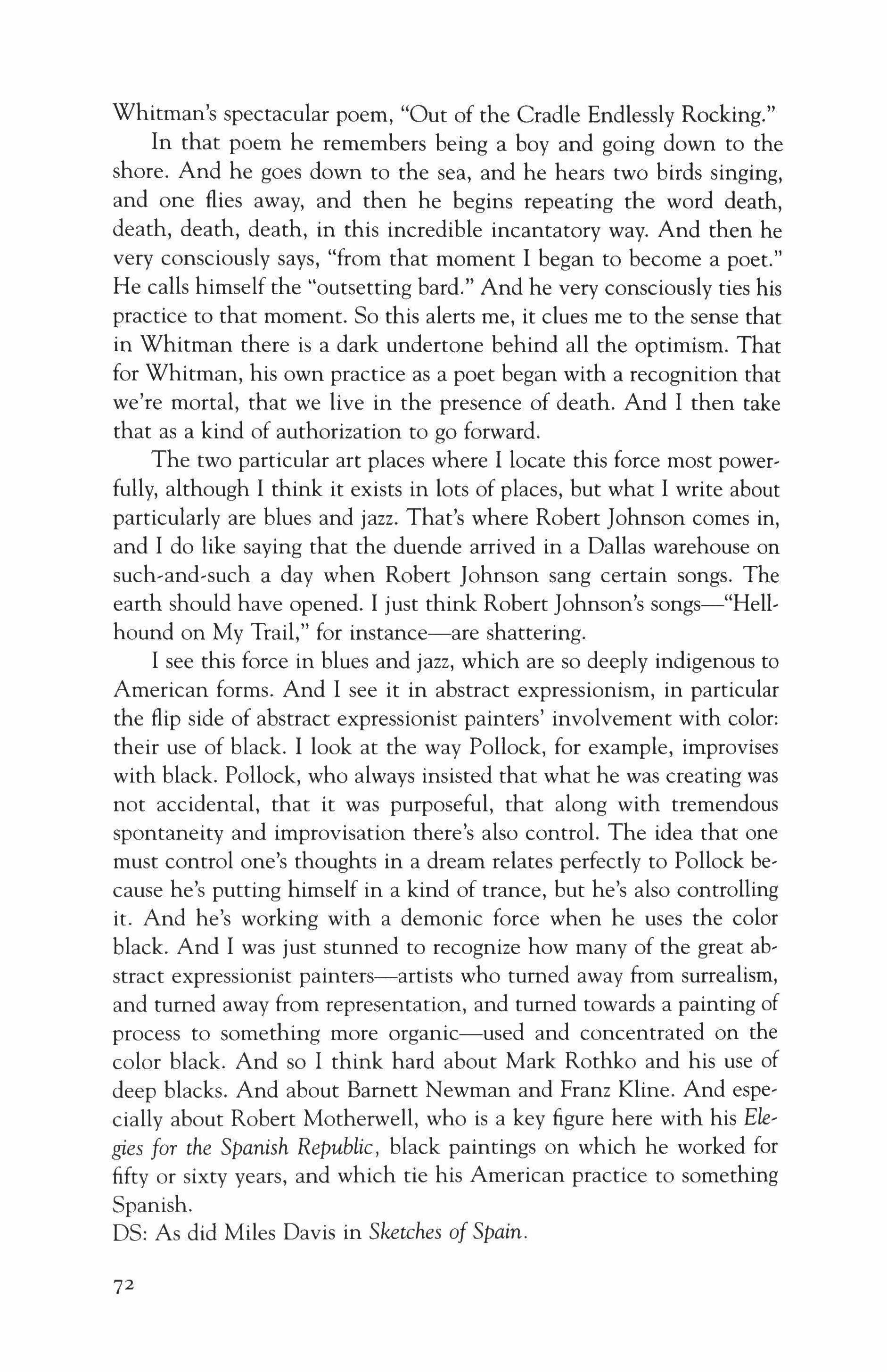
Whitman's spectacular poem, "Out of the Cradle Endlessly Rocking."
In that poem he remembers being a boy and going down to the shore. And he goes down to the sea, and he hears two birds singing, and one flies away, and then he begins repeating the word death, death, death, death, in this incredible incantatory way. And then he very consciously says, "from that moment I began to become a poet." He calls himself the "outsetting bard." And he very consciously ties his practice to that moment. So this alerts me, it clues me to the sense that in Whitman there is a dark undertone behind all the optimism. That for Whitman, his own practice as a poet began with a recognition that we're mortal, that we live in the presence of death. And I then take that as a kind of authorization to go forward.
The two particular art places where I locate this force most powerfully, although I think it exists in lots of places, but what I write about particularly are blues and jazz. That's where Robert Johnson comes in, and I do like saying that the duende arrived in a Dallas warehouse on such-and-such a day when Robert Johnson sang certain songs. The earth should have opened. I just think Robert Johnson's songs-"Hellhound on My Trail," for instance-are shattering.
I see this force in blues and jazz, which are so deeply indigenous to American forms. And I see it in abstract expressionism, in particular the flip side of abstract expressionist painters' involvement with color: their use of black. I look at the way Pollock, for example, improvises with black. Pollock, who always insisted that what he was creating was not accidental, that it was purposeful, that along with tremendous spontaneity and improvisation there's also control. The idea that one must control one's thoughts in a dream relates perfectly to Pollock because he's putting himself in a kind of trance, but he's also controlling it. And he's working with a demonic force when he uses the color black. And I was just stunned to recognize how many of the great abstract expressionist painters-artists who turned away from surrealism, and turned away from representation, and turned towards a painting of process to something more organic-used and concentrated on the color black. And so I think hard about Mark Rothko and his use of deep blacks. And about Barnett Newman and Franz Kline. And especially about Robert Motherwell, who is a key figure here with his Elegies for the Spanish Republic, black paintings on which he worked for fifty or sixty years, and which tie his American practice to something Spanish.
OS: As did Miles Davis in Sketches of Spain.

EH: Exactly. So I'm arguing that Davis and Motherwell, in a way, are turning to the culture of Spain to import some kind of force. They wouldn't have necessarily called it duende, but they were looking for some Hispanic power, for some Hispanic majesty to bring into their work. So at these two moments in Miles Davis and Robert Motherwell, something Spanish meets something American.
OS: I was thrilled to read your take on Martha Graham, a mythic artist to be sure. You talk about the body as an artistic medium, which also goes back to Lorca's sense of duende as a tangible force, and to Pollock, who added an element of dance to painting by working on the ground and on such an enormous scale. Abstract expressionist paintings just got larger and larger. Performed rather than created in stasis, they ernbrace the very feeling of being alive; they create their own atmosphere and weather. Painting in this bold, uncharted manner is akin to jazz, and I'm reminded of the critical writings of Albert Murray, who writes so insightfully about how the jazz artist is utterly present in the moment, about grace under pressure, and about how improvisation is rooted in craft.
EH: Yes, that's very American, that opening up to the present. And it is a great force in jazz, which has its roots in the blues, and there has always been an element of suffering in it, this element of pressure, of dark power. It feels to me almost as if Lorca had written his essay so that I could write about jazz. I mean it feels like a direct connection, which is no accident because Lorca was in New York, and he did go to Harlem and hear jazz singers, and I think that he refined his idea of duende after he heard them. And I think that jazz changed his idea of cante jondo that it made him realize that cante jondo wasn't strictly a rural form. Jazz opened him up to a kind of urban art that he didn't recognize until he came to the New World. So, in a way, he refined, deepened, and enlarged his ideas of duende by his encounters with black artists in New York.
OS: And by the suffering he saw there.
EH: And the suffering that he saw, yes, the inequality, the injustices. Jazz seems to me to be the perfect embodiment of this because of its opening to the dark spirit of the present. There are moments in Charlie Parker, for instance, where the pyrotechnics are spectacular, driven to some other level. In a piece of Armstrong's I write about, "West End Blues," it's almost as if an orphanhood is calling out. In a way Miles Davis is one of the best examples, because in some peculiar sense, Davis didn't actually have the chops of the other great musicians of his
73
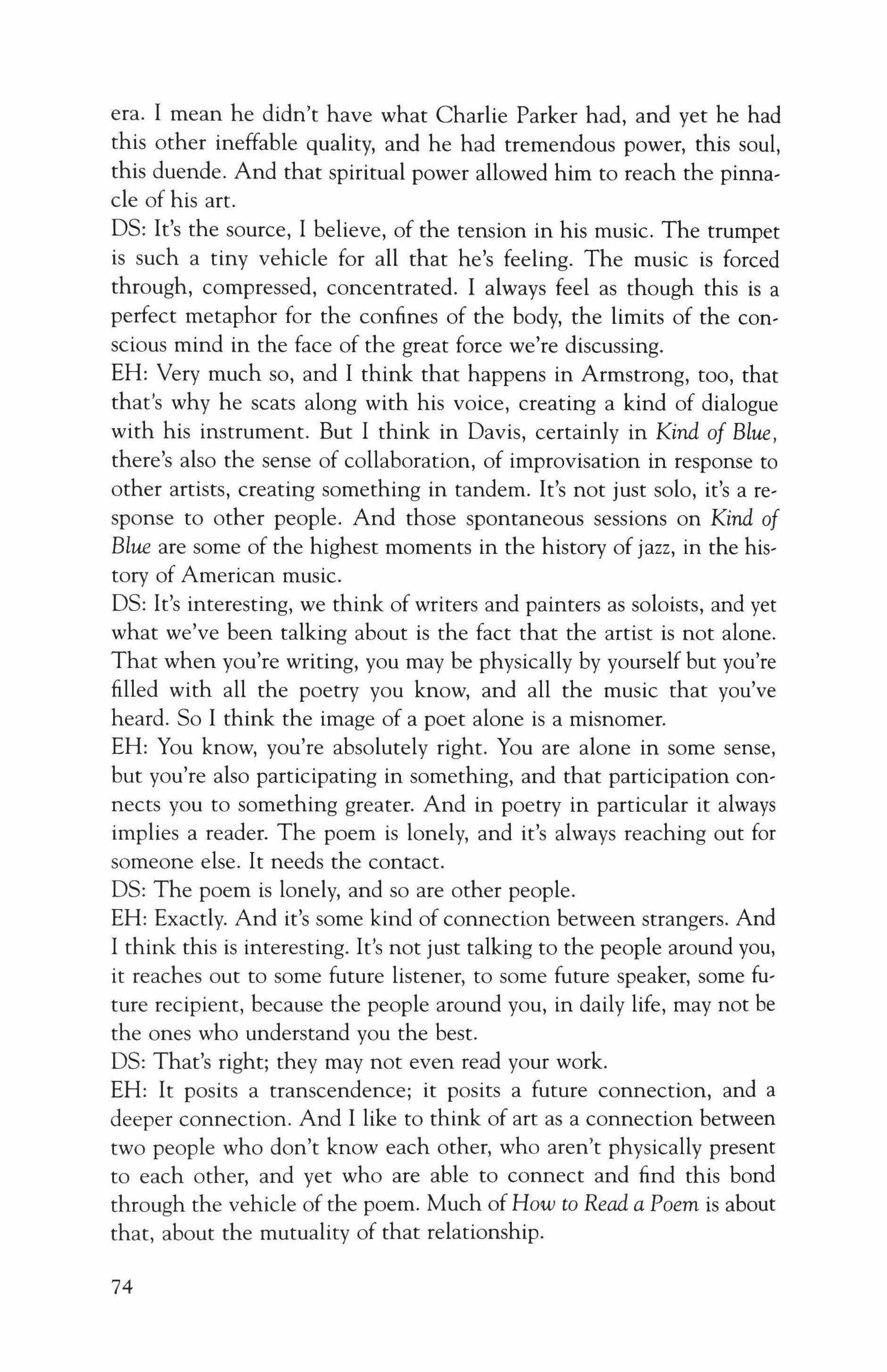
era. I mean he didn't have what Charlie Parker had, and yet he had this other ineffable quality, and he had tremendous power, this soul, this duende. And that spiritual power allowed him to reach the pinnacle of his art.
DS: It's the source, I believe, of the tension in his music. The trumpet is such a tiny vehicle for all that he's feeling. The music is forced through, compressed, concentrated. I always feel as though this is a perfect metaphor for the confines of the body, the limits of the conscious mind in the face of the great force we're discussing.
EH: Very much so, and I think that happens in Armstrong, too, that that's why he scats along with his voice, creating a kind of dialogue with his instrument. But I think in Davis, certainly in Kind of Blue, there's also the sense of collaboration, of improvisation in response to other artists, creating something in tandem. It's not just solo, it's a response to other people. And those spontaneous sessions on Kind of Blue are some of the highest moments in the history of jazz, in the history of American music.
DS: It's interesting, we think of writers and painters as soloists, and yet what we've been talking about is the fact that the artist is not alone. That when you're writing, you may be physically by yourself but you're filled with all the poetry you know, and all the music that you've heard. So I think the image of a poet alone is a misnomer.
EH: You know, you're absolutely right. You are alone in some sense, but you're also participating in something, and that participation connects you to something greater. And in poetry in particular it always implies a reader. The poem is lonely, and it's always reaching out for someone else. It needs the contact.
DS: The poem is lonely, and so are other people.
EH: Exactly. And it's some kind of connection between strangers. And I think this is interesting. It's not just talking to the people around you, it reaches out to some future listener, to some future speaker, some future recipient, because the people around you, in daily life, may not be the ones who understand you the best.
DS: That's right; they may not even read your work.
EH: It posits a transcendence; it posits a future connection, and a deeper connection. And I like to think of art as a connection between two people who don't know each other, who aren't physically present to each other, and yet who are able to connect and find this bond through the vehicle of the poem. Much of How to Read a Poem is about that, about the mutuality of that relationship.
74

os: Writing poetry is an act of faith.
EH: Yes, it's a real act of faith in human connection. A kind of faith that there will be a listener, that someone will find the poem, and, similarly, when you find such a message yourself, you feel deeply grateful for it, you feel understood in light of what you're encountering. I hope that everyone has had the experience that I've had where you read a poem so deeply that you feel almost as if you've written it, when, in fact, you're only responding to it.
OS: But that's the thing about poetry. I often try to define to myself what's so different about reading poetry as opposed to prose, and what I conclude is that I feel as though my mind is somehow being calibrated to it. That I'm changed by it physically. That poetry alters my chemistry.
EH: Well, I think it is a bodily art. I think it inhabits you. You know poems communicate before they're understood. And I think you feel it taking over. There's a kind of transport in it. You're taken somewhere else. And this is the root meaning of ecstasy, to be beside oneself. And I feel like you are taken out of yourself, and delivered back to yourself in some deep way by works of art that you especially respond to, that are especially meaningful to you, that especially call to you. You feel recognized.
OS: That extraordinary feeling of identification happens throughout The Demon and The Angel. Because you're a poet, you understand the experiences of other poets and artists, and I sense your sense of recognition and affirmation in relating the presence of duende in the lives of others.
EH: There is a kind of ars poetica here, but I think it's unseemly to write about yourself in any way. You can't do that, but you wouldn't be able to write about this if you hadn't experienced duende. It doesn't have anything to do with the ultimate value of the work, but it does have to do with the fact that you have moments when you write in which you feel taken away; you feel transported. When you suddenly write something that is stranger and spookier and more self-revealing than what you have written before. You are suddenly in the presence of something that you couldn't have summoned up entirely by your will. This is humbling.
OS: The intensity and lyricism of your prose just amazes me, and I wonder how you're able to maintain that in your weekly column for The Washington Post, "Poet's Choice."
EH: I couldn't resist the opportunity. It's the only column like it in the
75
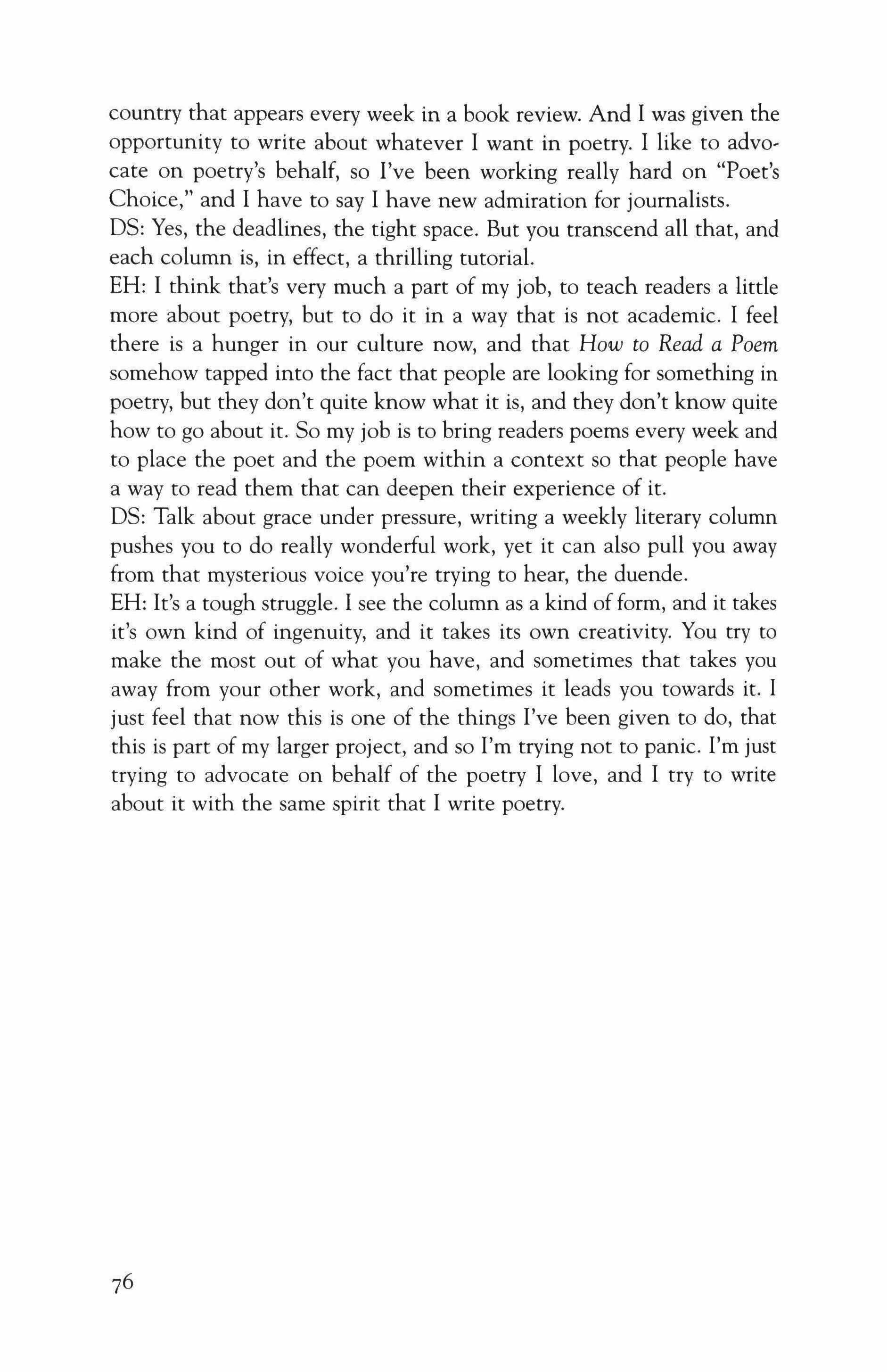
country that appears every week in a book review. And I was given the opportunity to write about whatever I want in poetry. I like to advocate on poetry's behalf, so I've been working really hard on "Poet's Choice," and I have to say I have new admiration for journalists.
OS: Yes, the deadlines, the tight space. But you transcend all that, and each column is, in effect, a thrilling tutorial.
EH: I think that's very much a part of my job, to teach readers a little more about poetry, but to do it in a way that is not academic. I feel there is a hunger in our culture now, and that How to Read a Poem somehow tapped into the fact that people are looking for something in poetry, but they don't quite know what it is, and they don't know quite how to go about it. So my job is to bring readers poems every week and to place the poet and the poem within a context so that people have a way to read them that can deepen their experience of it.
OS: Talk about grace under pressure, writing a weekly literary column pushes you to do really wonderful work, yet it can also pull you away from that mysterious voice you're trying to hear, the duende.
EH: It's a tough struggle. I see the column as a kind of form, and it takes it's own kind of ingenuity, and it takes its own creativity. You try to make the most out of what you have, and sometimes that takes you away from your other work, and sometimes it leads you towards it. I just feel that now this is one of the things I've been given to do, that this is part of my larger project, and so I'm trying not to panic. I'm just trying to advocate on behalf of the poetry I love, and I try to write about it with the same spirit that I write poetry.
Gary Adelman

Beckett and Kafka
1
Kafka is an analogue for Beckett, a source, a model, someone to react against, even a forebear in the sense that Borges speaks of Kafka as a chosen precursor. "The Metamorphosis" stands like a silent witness behind the Nouvelles (four stories Beckett wrote in 1946). Behind the trilogy looms The Castle. The epic poem embedded in The Unnamable, of a hero fighting for some remnant of self against the loss of identity in a world inimical to the sacred, is also the story of The Castle. I go further, making the case for The Castle's importance to the genesis of the trilogy (1947 to January 1950), for it enabled Beckett to imagine Molloy and his strategies for survival, Malone's martyrdom, and the Unnamable's lucidity.
The issue for me is not only Beckett's indebtedness but also the depth of my own engagement; Kafka helps me find my bearings in Beckett. I get at the story-that which is central-and the purpose of the rest-the artistry.
Texts for Nothing (1951) might as well be dedicated to Kafka. The landscapes of the sequence are dreamscapes; the torment driving the sequence is the Kafkaesque tension between world and imagination; and Beckett's nihilism about the worth of art is also Kafkaesque.
77
Kafka's ape in "A Report to an Academy" stands behind Hamm in Endgame (1956), or, perhaps, helps illuminate Hamm in his struggle against annihilation. How It Is (1961) surely is Beckett's most Kafkaesque text in its poetics. The narrative, treated realistically, is a grotesque symbolic allegory about the creative process, inspiration, and ultimately human nature. Imagination Dead Imagine (1965), which describes a torture chamber and the violent satisfactions of torture, invites the reader's participation even more directly that Kafka's officer in "In the Penal Colony," which probably was in Beckett's mind when he wrote the story. Similarly, any discussion of The Lost Ones (1970) should consider a parallel reading with "In the Penal Colony."
In this essay I discuss what Beckett learned from Kafka in two main ways-by showing the importance of The Castle to Beckett's stance and method in the trilogy; and by evoking the Kafka we imagine from his diaries and letters, and from the man portrayed by his biographers, contending that Kafka the literary figure helped Beckett envisage Molloy and Malone, and make the transition from the Nouvelles to the trilogy.
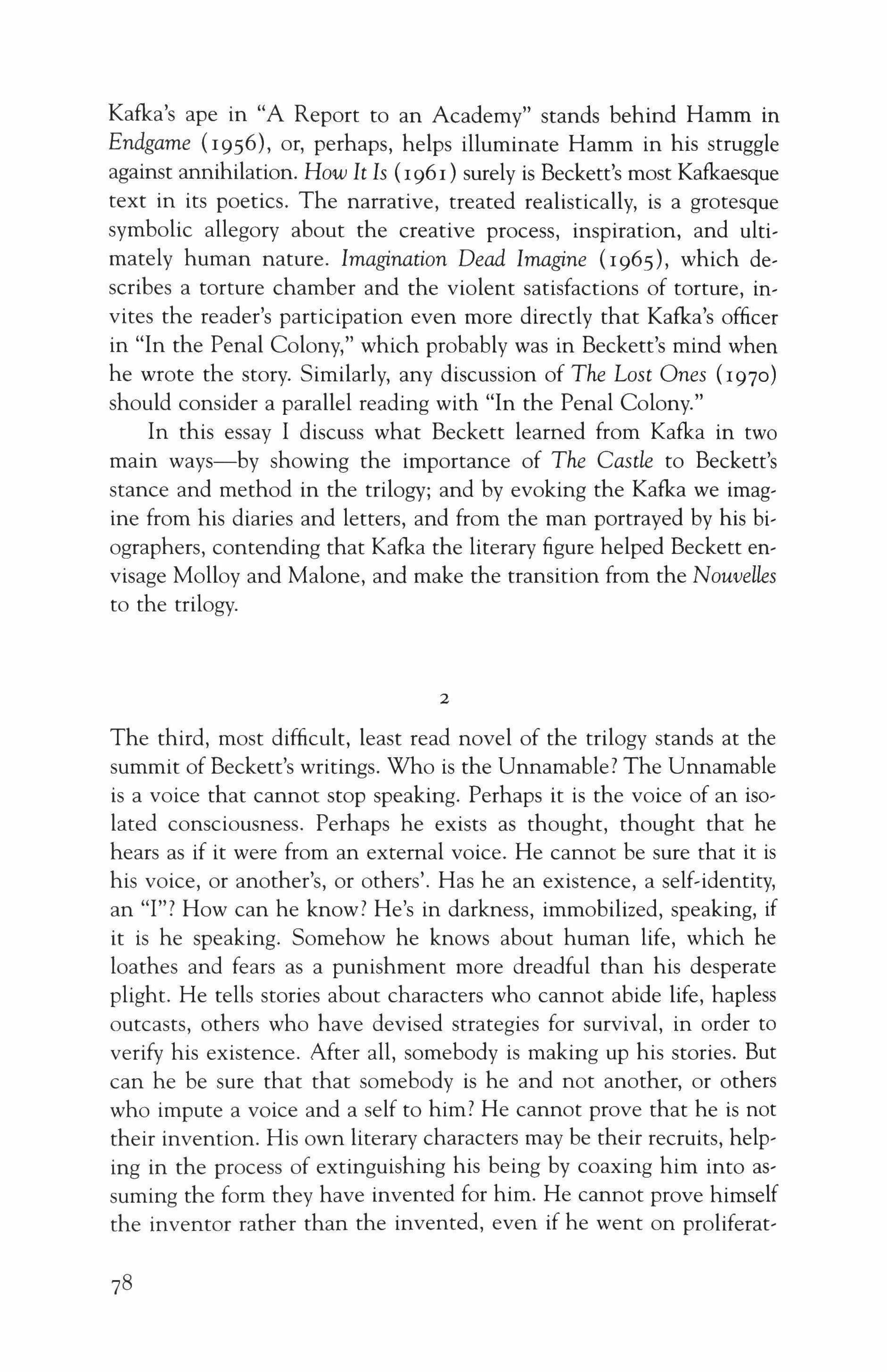
2
The third, most difficult, least read novel of the trilogy stands at the summit of Beckett's writings. Who is the Unnamable? The Unnamable is a voice that cannot stop speaking. Perhaps it is the voice of an isolated consciousness. Perhaps he exists as thought, thought that he hears as if it were from an external voice. He cannot be sure that it is his voice, or another's, or others'. Has he an existence, a self-identity, an "I"? How can he know? He's in darkness, immobilized, speaking, if it is he speaking. Somehow he knows about human life, which he loathes and fears as a punishment more dreadful than his desperate plight. He tells stories about characters who cannot abide life, hapless outcasts, others who have devised strategies for survival, in order to verify his existence. After all, somebody is making up his stories. But can he be sure that that somebody is he and not another, or others who impute a voice and a self to him? He cannot prove that he is not their invention. His own literary characters may be their recruits, helping in the process of extinguishing his being by coaxing him into assuming the form they have invented for him. He cannot prove himself the inventor rather than the invented, even if he went on proliferat-
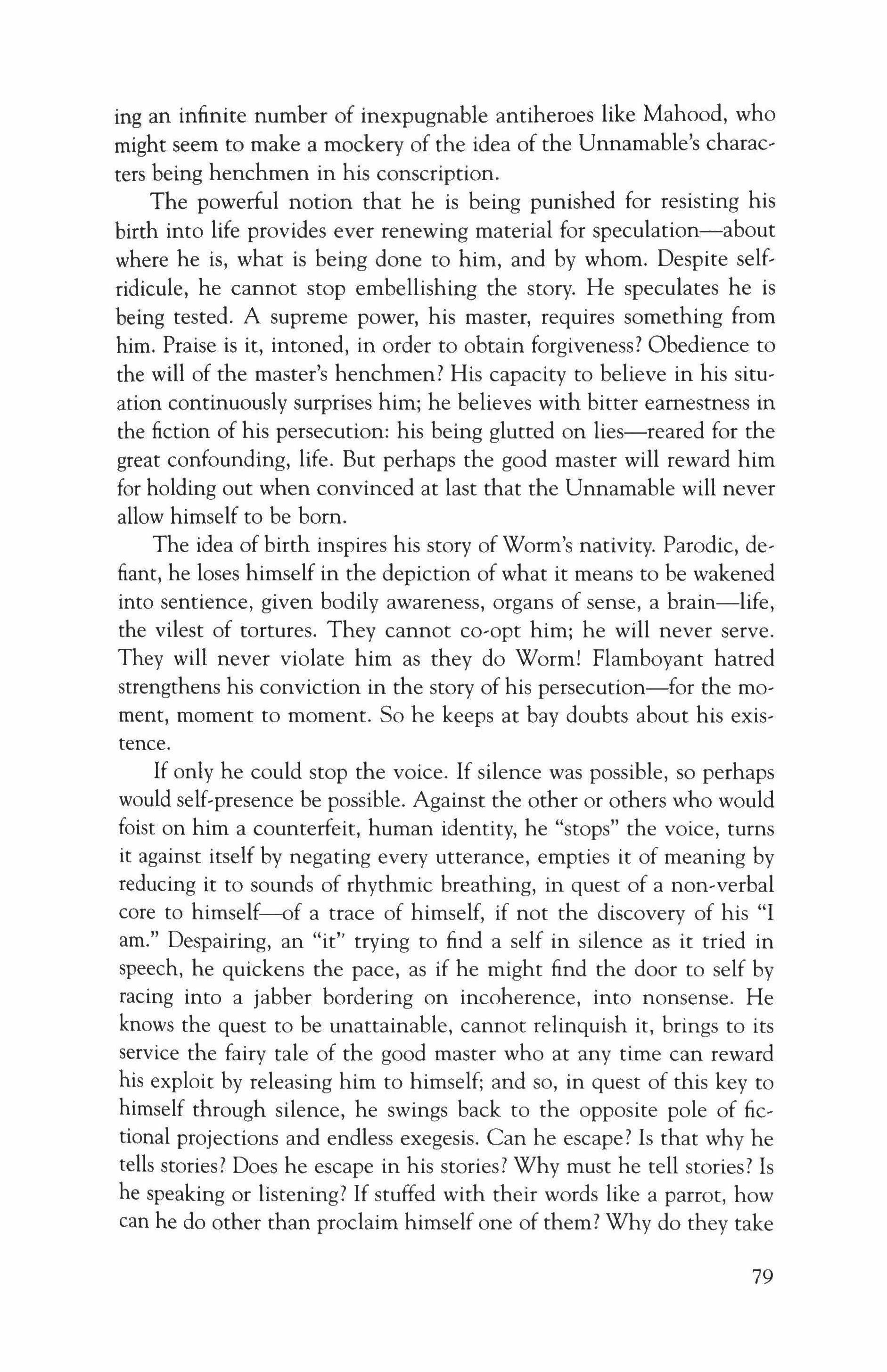
ing an infinite number of inexpugnable antiheroes like Mahood, who might seem to make a mockery of the idea of the Unnamable's characters being henchmen in his conscription.
The powerful notion that he is being punished for resisting his birth into life provides ever renewing material for speculation-about where he is, what is being done to him, and by whom. Despite selfridicule, he cannot stop embellishing the story. He speculates he is being tested. A supreme power, his master, requires something from him. Praise is it, intoned, in order to obtain forgiveness? Obedience to the will of the master's henchmen? His capacity to believe in his situation continuously surprises him; he believes with bitter earnestness in the fiction of his persecution: his being glutted on lies-reared for the great confounding, life. But perhaps the good master will reward him for holding out when convinced at last that the Unnamable will never allow himself to be born.
The idea of birth inspires his story of Worm's nativity. Parodic, defiant, he loses himself in the depiction of what it means to be wakened into sentience, given bodily awareness, organs of sense, a brain-life, the vilest of tortures. They cannot co-opt him; he will never serve. They will never violate him as they do Worm! Flamboyant hatred strengthens his conviction in the story of his persecution-for the moment, moment to moment. So he keeps at bay doubts about his existence.
If only he could stop the voice. If silence was possible, so perhaps would self-presence be possible. Against the other or others who would foist on him a counterfeit, human identity, he "stops" the voice, turns it against itself by negating every utterance, empties it of meaning by reducing it to sounds of rhythmic breathing, in quest of a non-verbal core to himself-of a trace of himself, if not the discovery of his "I am." Despairing, an "it" trying to find a self in silence as it tried in speech, he quickens the pace, as if he might find the door to self by racing into a jabber bordering on incoherence, into nonsense. He knows the quest to be unattainable, cannot relinquish it, brings to its service the fairy tale of the good master who at any time can reward his exploit by releasing him to himself; and so, in quest of this key to himself through silence, he swings back to the opposite pole of fic� tionaI projections and endless exegesis. Can he escape? Is that why he tells stories? Does he escape in his stories? Why must he tell stories? Is he speaking or listening? If stuffed with their words like a parrot, how can he do other than proclaim himself one of them? Why do they take
79
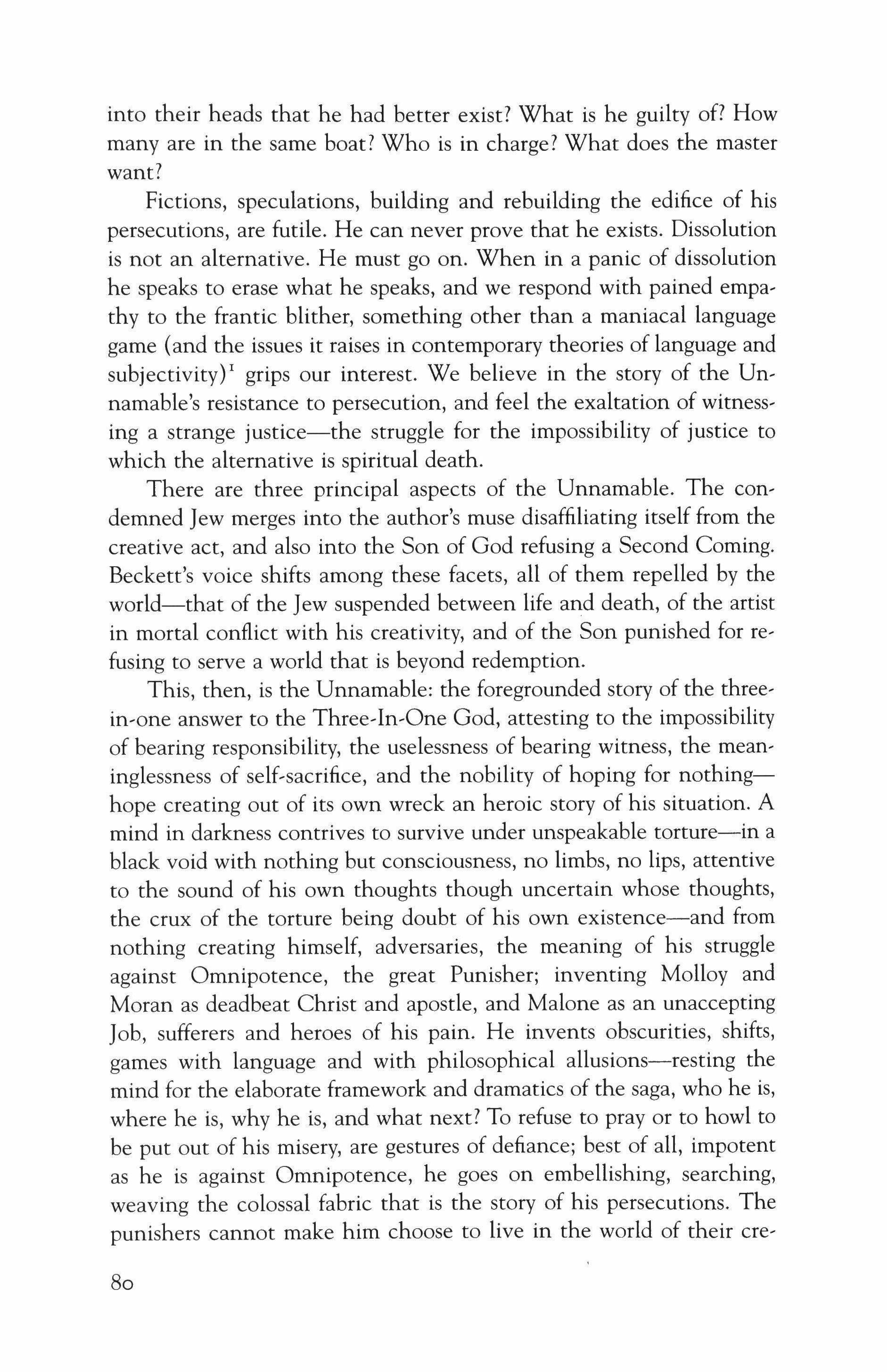
into their heads that he had better exist? What is he guilty of? How many are in the same boat? Who is in charge? What does the master want?
Fictions, speculations, building and rebuilding the edifice of his persecutions, are futile. He can never prove that he exists. Dissolution is not an alternative. He must go on. When in a panic of dissolution he speaks to erase what he speaks, and we respond with pained empathy to the frantic blither, something other than a maniacal language game {and the issues it raises in contemporary theories of language and subjectivity}' grips our interest. We believe in the story of the Unnamable's resistance to persecution, and feel the exaltation of witnessing a strange justice-the struggle for the impossibility of justice to which the alternative is spiritual death.
There are three principal aspects of the Unnamable. The condemned Jew merges into the author's muse disaffiliating itself from the creative act, and also into the Son of God refusing a Second Coming. Beckett's voice shifts among these facets, all of them repelled by the world-that of the Jew suspended between life and death, of the artist in mortal conflict with his creativity, and of the Son punished for refusing to serve a world that is beyond redemption.
This, then, is the Unnamable: the foregrounded story of the threein-one answer to the Three-In-One God, attesting to the impossibility of bearing responsibility, the uselessness of bearing witness, the meaninglessness of self-sacrifice, and the nobility of hoping for nothinghope creating out of its own wreck an heroic story of his situation. A mind in darkness contrives to survive under unspeakable torture-in a black void with nothing but consciousness, no limbs, no lips, attentive to the sound of his own thoughts though uncertain whose thoughts, the crux of the torture being doubt of his own existence-and from nothing creating himself, adversaries, the meaning of his struggle against Omnipotence, the great Punisher; inventing Molloy and Moran as deadbeat Christ and apostle, and Malone as an unaccepting Job, sufferers and heroes of his pain. He invents obscurities, shifts, games with language and with philosophical allusions-resting the mind for the elaborate framework and dramatics of the saga, who he is, where he is, why he is, and what next? To refuse to pray or to howl to be put out of his misery, are gestures of defiance; best of all, impotent as he is against Omnipotence, he goes on embellishing, searching, weaving the colossal fabric that is the story of his persecutions. The punishers cannot make him choose to live in the world of their ere-
80
ation. The text is a compendium of "their" methods and his manner of eluding them, his rallies and panics, the relentlessness and facetiae of a mind on high alert as in paranoid schizophrenia. He is the new figure of epic grandeur for the age of Kafka and the death camps.
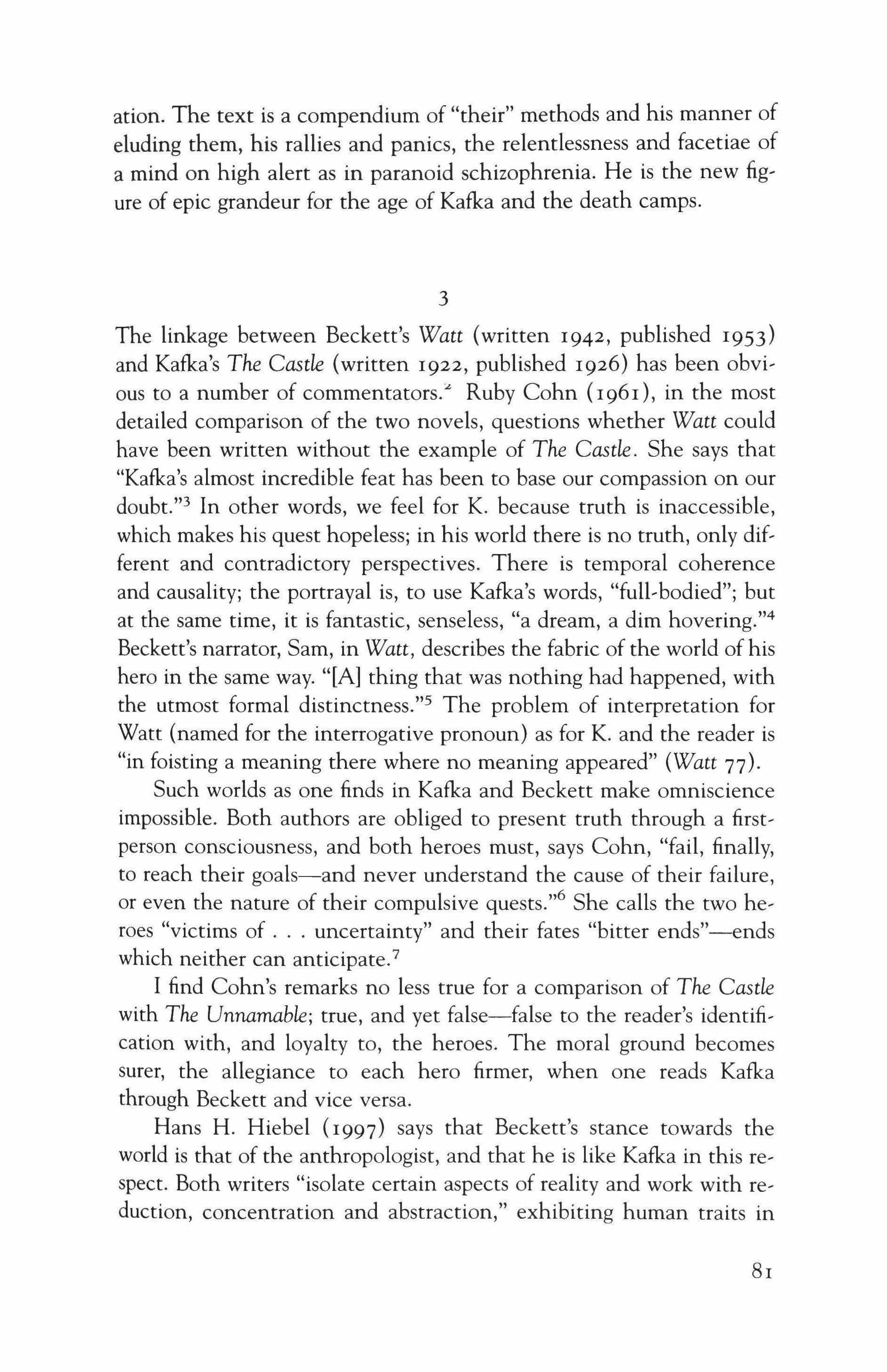
3
The linkage between Beckett's Watt (written 1942, published 1953) and Kafka's The Castle (written 1922, published 1926) has been obvious to a number of commentators." Ruby Cohn (I96 I ), in the most detailed comparison of the two novels, questions whether Watt could have been written without the example of The Castle. She says that "Kafka's almost incredible feat has been to base our compassion on our doubt."? In other words, we feel for K. because truth is inaccessible, which makes his quest hopeless; in his world there is no truth, only different and contradictory perspectives. There is temporal coherence and causality; the portrayal is, to use Kafka's words, "full-bodied"; but at the same time, it is fantastic, senseless, "a dream, a dim hovering.?" Beckett's narrator, Sam, in Watt, describes the fabric of the world of his hero in the same way. "[A] thing that was nothing had happened, with the utmost formal distinctness."> The problem of interpretation for Watt (named for the interrogative pronoun) as for K. and the reader is "in foisting a meaning there where no meaning appeared" (Watt 77).
Such worlds as one finds in Kafka and Beckett make omniscience impossible. Both authors are obliged to present truth through a firstperson consciousness, and both heroes must, says Cohn, "fail, finally, to reach their goals-and never understand the cause of their failure, or even the nature of their compulsive quests.t'" She calls the two heroes "victims of uncertainty" and their fates "bitter ends"-ends which neither can anticipate."
I find Cohn's remarks no less true for a comparison of The Castle with The Unnamable; true, and yet false-false to the reader's identification with, and loyalty to, the heroes. The moral ground becomes surer, the allegiance to each hero firmer, when one reads Kafka through Beckett and vice versa.
Hans H. Hiebel (1997) says that Beckett's stance towards the world is that of the anthropologist, and that he is like Kafka in this respect. Both writers "isolate certain aspects of reality and work with reduction, concentration and abstraction," exhibiting human traits in
the essential, and doing so with humor.8 We are found burying ourselves alive for security ("The Burrow"); communicating with meaningless whistles ("Josephine the Singer, or the Mouse Folk"); producing no more than an endless repetition of thought ("Play"); existing in a never ending, monotonous life pattern ("Quadrat"); driven by compulsion, unaware of one another, blind and imprisoned in the eternal circle of corne and go (The Lost Ones); lying to ourselves about help from heaven ("Investigations of a Dog"). Hiebel's remarks (like Cohn's) are true as general observations about the artistry of Beckett and Kafka.o But even more salient for the student of Beckett is to think of the world of Kafka as source for Beckett's anthropological investigations, and the trilogy as his findings.
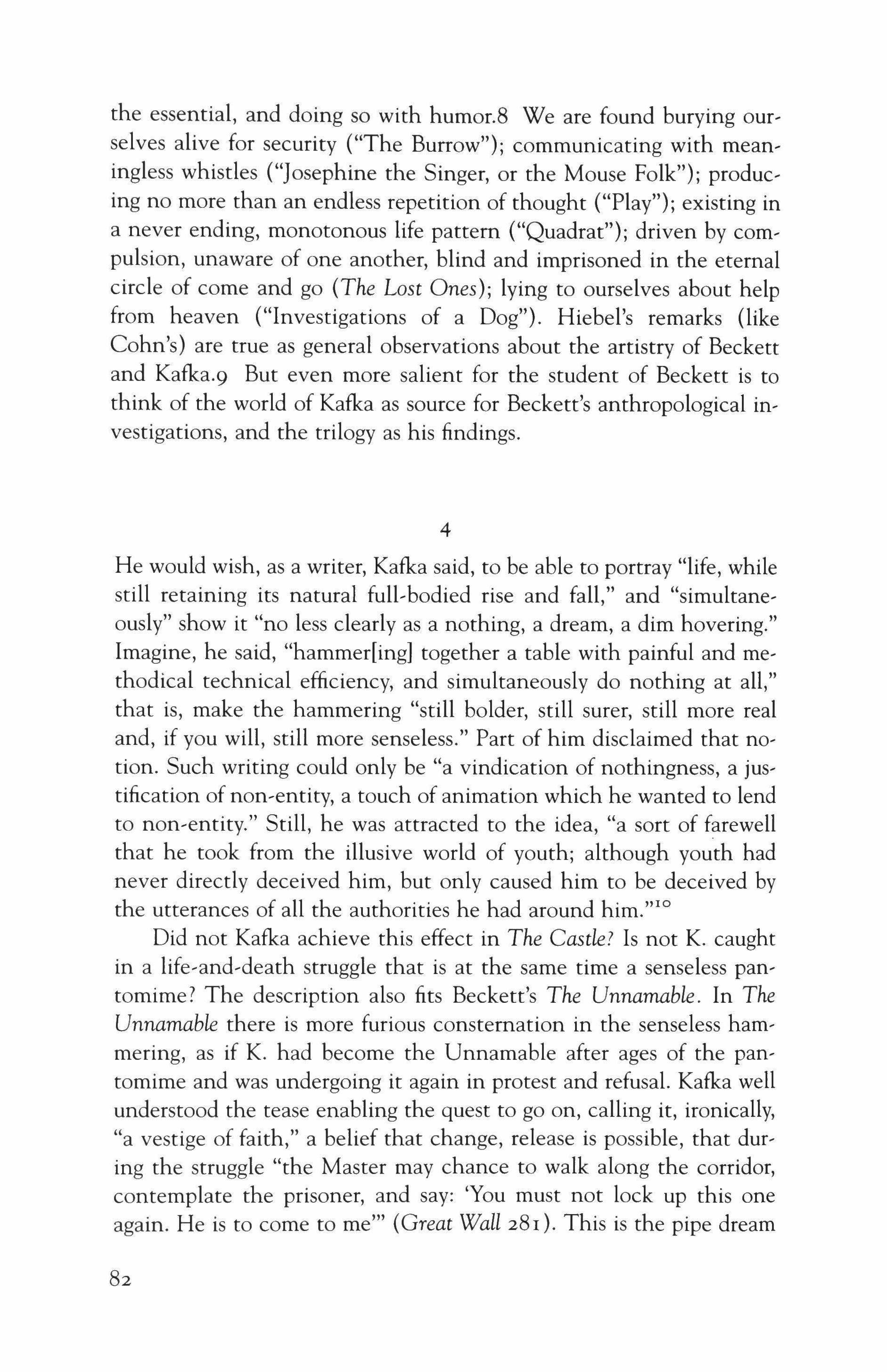
4
He would wish, as a writer, Kafka said, to be able to portray "life, while still retaining its natural full-bodied rise and fall," and "simultaneously" show it "no less clearly as a nothing, a dream, a dim hovering." Imagine, he said, "hamrnerling] together a table with painful and methodical technical efficiency, and simultaneously do nothing at all," that is, make the hammering "still bolder, still surer, still more real and, if you will, still more senseless." Part of him disclaimed that notion. Such writing could only be "a vindication of nothingness, a justification of non-entity, a touch of animation which he wanted to lend to non-entity." Still, he was attracted to the idea, "a sort of farewell that he took from the illusive world of youth; although youth had never directly deceived him, but only caused him to be deceived by the utterances of all the authorities he had around him.'lIO
Did not Kafka achieve this effect in The Castle? Is not K. caught in a life-and-death struggle that is at the same time a senseless pantomime? The description also fits Beckett's The Unnamable. In The Unnamable there is more furious consternation in the senseless hammering, as if K. had become the Unnamable after ages of the pantomime and was undergoing it again in protest and refusal. Kafka well understood the tease enabling the quest to go on, calling it, ironically, "a vestige of faith," a belief that change, release is possible, that during the struggle "the Master may chance to walk along the corridor, contemplate the prisoner, and say: 'You must not lock up this one again. He is to corne to me'" (Great Wall 28I). This is the pipe dream
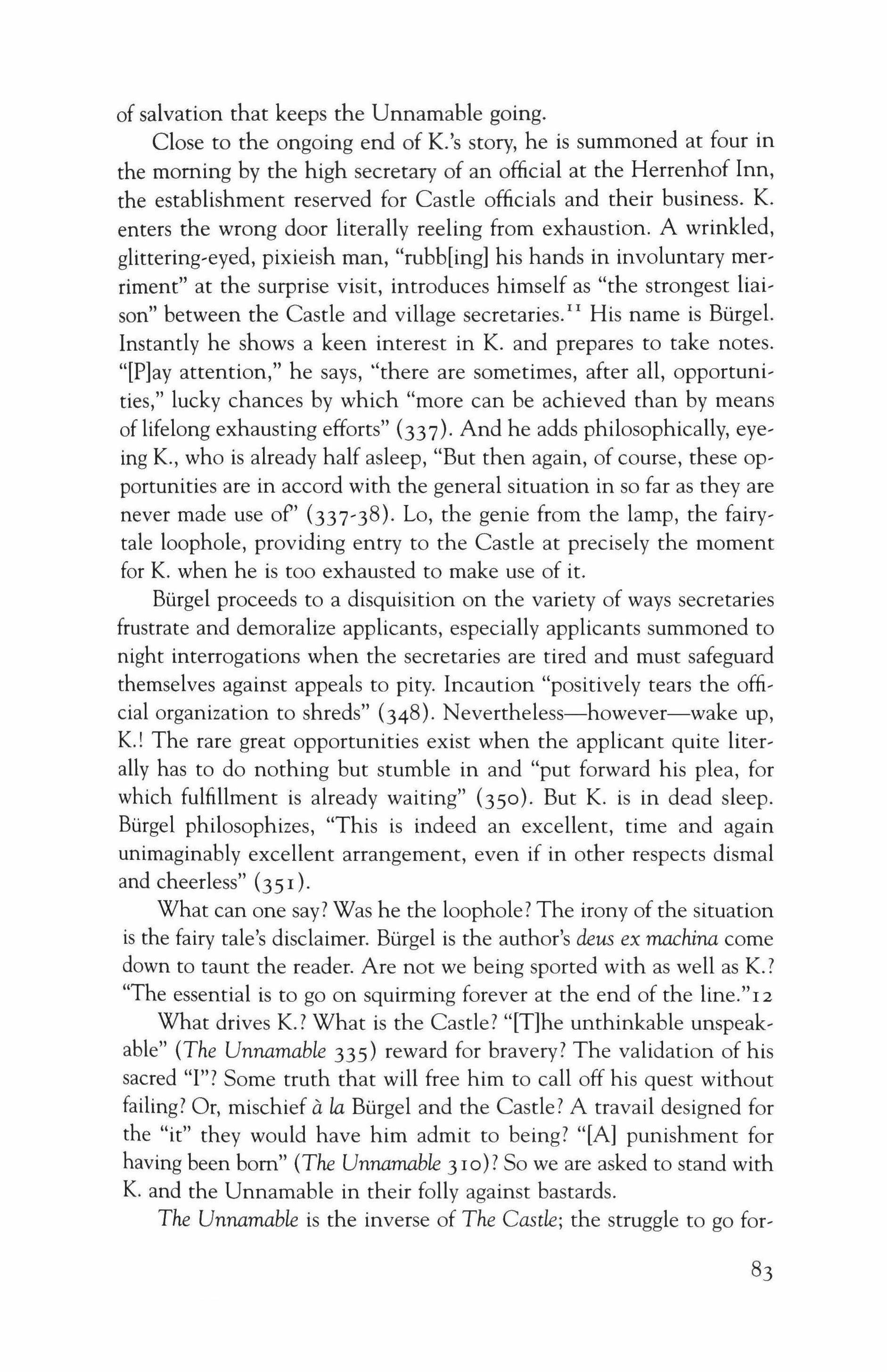
of salvation that keeps the Unnamable going.
Close to the ongoing end of K.'s story, he is summoned at four in the morning by the high secretary of an official at the Herrenhof Inn, the establishment reserved for Castle officials and their business. K. enters the wrong door literally reeling from exhaustion. A wrinkled, glittering-eyed, pixieish man, "rubb[ing] his hands in involuntary merriment" at the surprise visit, introduces himself as "the strongest liaison" between the Castle and village secretaries. I I His name is Burgel. Instantly he shows a keen interest in K. and prepares to take notes. "[P]ay attention," he says, "there are sometimes, after all, opportunities," lucky chances by which "more can be achieved than by means of Iifelong exhausting efforts" (337). And he adds philosophically, eyeing K., who is already half asleep, "But then again, of course, these opportunities are in accord with the general situation in so far as they are never made use of' (337-38). Lo, the genie from the lamp, the fairytale loophole, providing entry to the Castle at precisely the moment for K. when he is too exhausted to make use of it.
Burgel proceeds to a disquisition on the variety of ways secretaries frustrate and demoralize applicants, especially applicants summoned to night interrogations when the secretaries are tired and must safeguard themselves against appeals to pity. Incaution "positively tears the official organization to shreds" (348). Nevertheless-however-wake up, K.! The rare great opportunities exist when the applicant quite literally has to do nothing but stumble in and "put forward his plea, for which fulfillment is already waiting" (350). But K. is in dead sleep. Burgel philosophizes, "This is indeed an excellent, time and again unimaginably excellent arrangement, even if in other respects dismal and cheerless" (35 I ).
What can one say? Was he the loophole? The irony of the situation is the fairy tale's disclaimer. Burge] is the author's deus ex machina come down to taunt the reader. Are not we being sported with as well as K.? "The essential is to go on squirming forever at the end of the line.l'r z
What drives K.? What is the Castle? "[T]he unthinkable unspeakable" (The Unnamable 335) reward for bravery? The validation of his sacred "I"? Some truth that will free him to call off his quest without failing? Or, mischief ala Burgel and the Castle? A travail designed for the "it" they would have him admit to being? "[A] punishment for having been born" (The Unnamable 3 IO)? SO we are asked to stand with K. and the Unnamable in their folly against bastards.
The Unnamable is the inverse of The Castle; the struggle to go for-
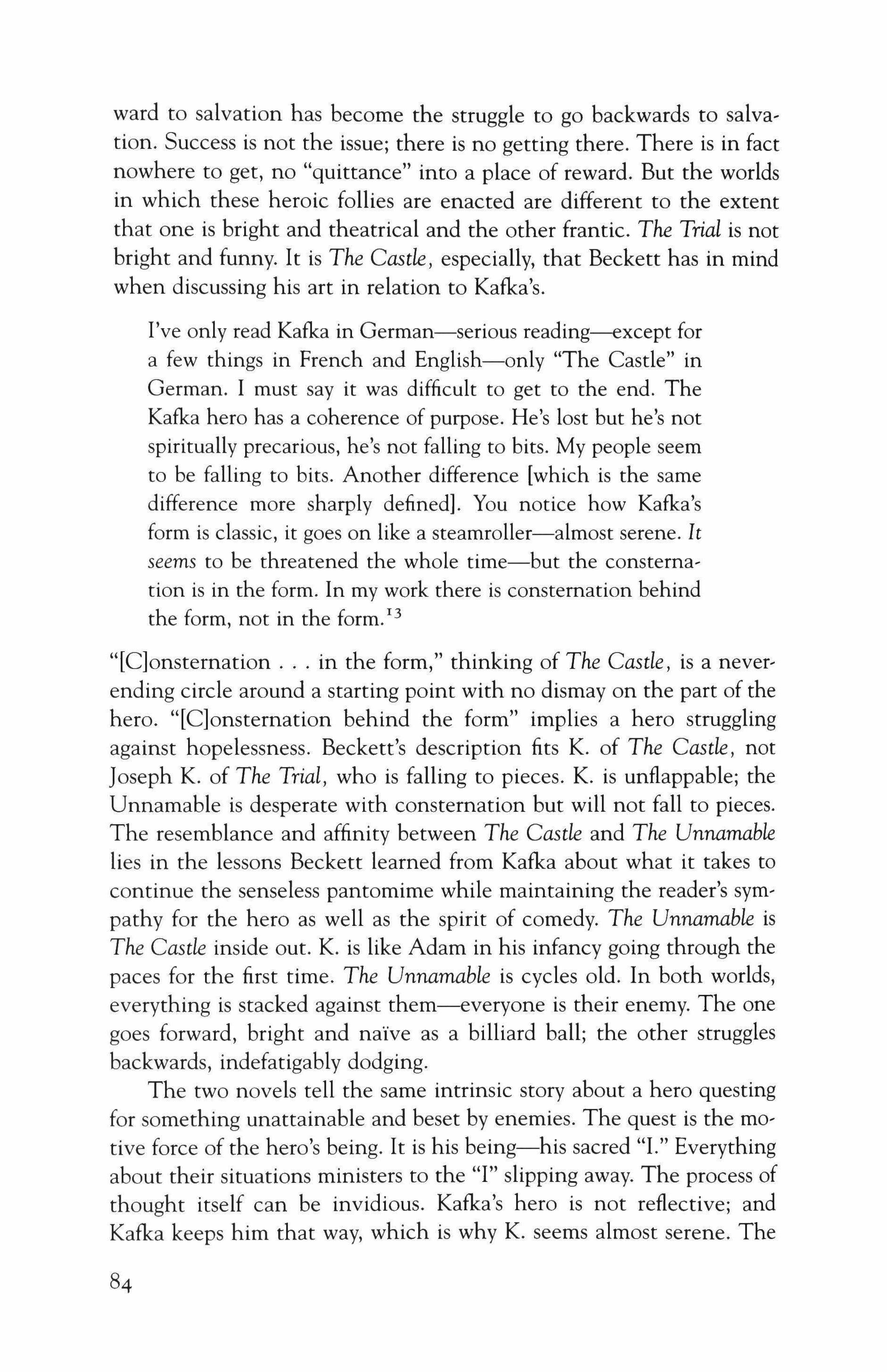
ward to salvation has become the struggle to go backwards to salvation. Success is not the issue; there is no getting there. There is in fact nowhere to get, no "quittance" into a place of reward. But the worlds in which these heroic follies are enacted are different to the extent that one is bright and theatrical and the other frantic. The Trial is not bright and funny. It is The Castle, especially, that Beckett has in mind when discussing his art in relation to Kafka's.
I've only read Kafka in German-serious reading--except for a few things in French and English-only "The Castle" in German. I must say it was difficult to get to the end. The Kafka hero has a coherence of purpose. He's lost but he's not spiritually precarious, he's not falling to bits. My people seem to be falling to bits. Another difference [which is the same difference more sharply defined]. You notice how Kafka's form is classic, it goes on like a steamroller-almost serene. It seems to be threatened the whole time-but the consternation is in the form. In my work there is consternation behind the form, not in the forrn.l?
"[C]onsternation in the form," thinking of The Castle, is a never, ending circle around a starting point with no dismay on the part of the hero. "[C]onsternation behind the form" implies a hero struggling against hopelessness. Beckett's description fits K. of The Castle, not Joseph K. of The Trial, who is falling to pieces. K. is unflappable; the Unnamable is desperate with consternation but will not fall to pieces. The resemblance and affinity between The Castle and The Unnamable lies in the lessons Beckett learned from Kafka about what it takes to continue the senseless pantomime while maintaining the reader's sympathy for the hero as well as the spirit of comedy. The Unnamable is The Castle inside out. K. is like Adam in his infancy going through the paces for the first time. The Unnamable is cycles old. In both worlds, everything is stacked against them--everyone is their enemy. The one goes forward, bright and naive as a billiard ball; the other struggles backwards, indefatigably dodging. The two novels tell the same intrinsic story about a hero questing for something unattainable and beset by enemies. The quest is the motive force of the hero's being. It is his being-his sacred "I." Everything about their situations ministers to the "I" slipping away. The process of thought itself can be invidious. Kafka's hero is not reflective; and Kafka keeps him that way, which is why K. seems almost serene. The
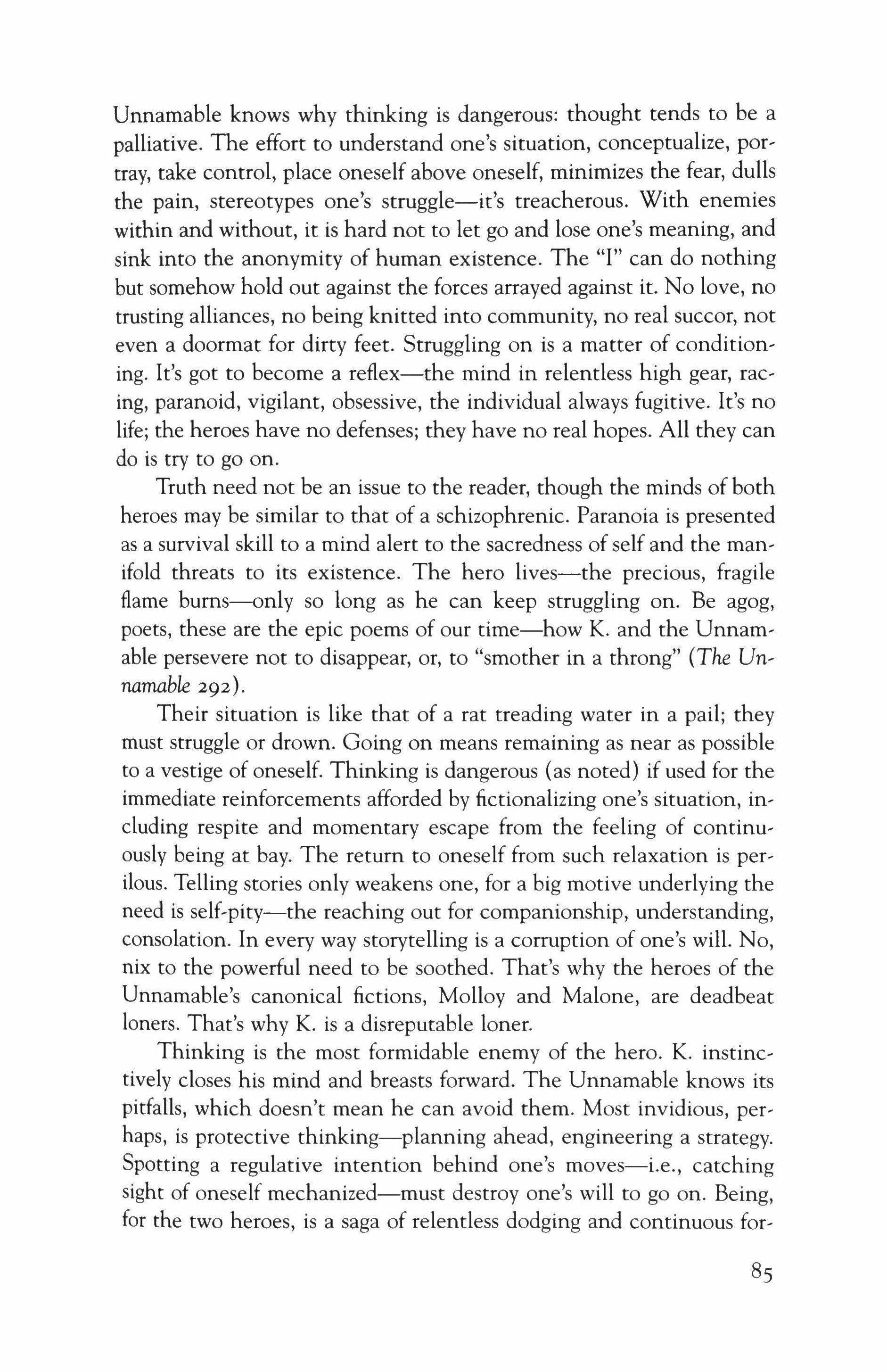
Unnamable knows why thinking is dangerous: thought tends to be a palliative. The effort to understand one's situation, conceptualize, portray, take control, place oneself above oneself, minimizes the fear, dulls the pain, stereotypes one's struggle-it's treacherous. With enemies within and without, it is hard not to let go and lose one's meaning, and sink into the anonymity of human existence. The "I" can do nothing but somehow hold out against the forces arrayed against it. No love, no trusting alliances, no being knitted into community, no real succor, not even a doormat for dirty feet. Struggling on is a matter of conditioning. It's got to become a reflex-the mind in relentless high gear, racing, paranoid, vigilant, obsessive, the individual always fugitive. It's no life; the heroes have no defenses; they have no real hopes. All they can do is try to go on.
Truth need not be an issue to the reader, though the minds of both heroes may be similar to that of a schizophrenic. Paranoia is presented as a survival skill to a mind alert to the sacredness of self and the manifold threats to its existence. The hero lives-the precious, fragile flame burns-only so long as he can keep struggling on. Be agog, poets, these are the epic poems of our time-how K. and the Unnamable persevere not to disappear, or, to "smother in a throng" (The Unnamable 292).
Their situation is like that of a rat treading water in a pail; they must struggle or drown. Going on means remaining as near as possible to a vestige of oneself. Thinking is dangerous (as noted) if used for the immediate reinforcements afforded by fictionalizing one's situation, including respite and momentary escape from the feeling of continuously being at bay. The return to oneself from such relaxation is perilous. Telling stories only weakens one, for a big motive underlying the need is self-pity-the reaching out for companionship, understanding, consolation. In every way storytelling is a corruption of one's will. No, nix to the powerful need to be soothed. That's why the heroes of the Unnamable's canonical fictions, Molloy and Malone, are deadbeat loners. That's why K. is a disreputable loner.
Thinking is the most formidable enemy of the hero. K. instinctively closes his mind and breasts forward. The Unnamable knows its pitfalls, which doesn't mean he can avoid them. Most invidious, perhaps, is protective thinking-planning ahead, engineering a strategy. Spotting a regulative intention behind one's moves-i.e., catching sight of oneself mechanized-must destroy one's will to go on. Being, for the two heroes, is a saga of relentless dodging and continuous for-
85
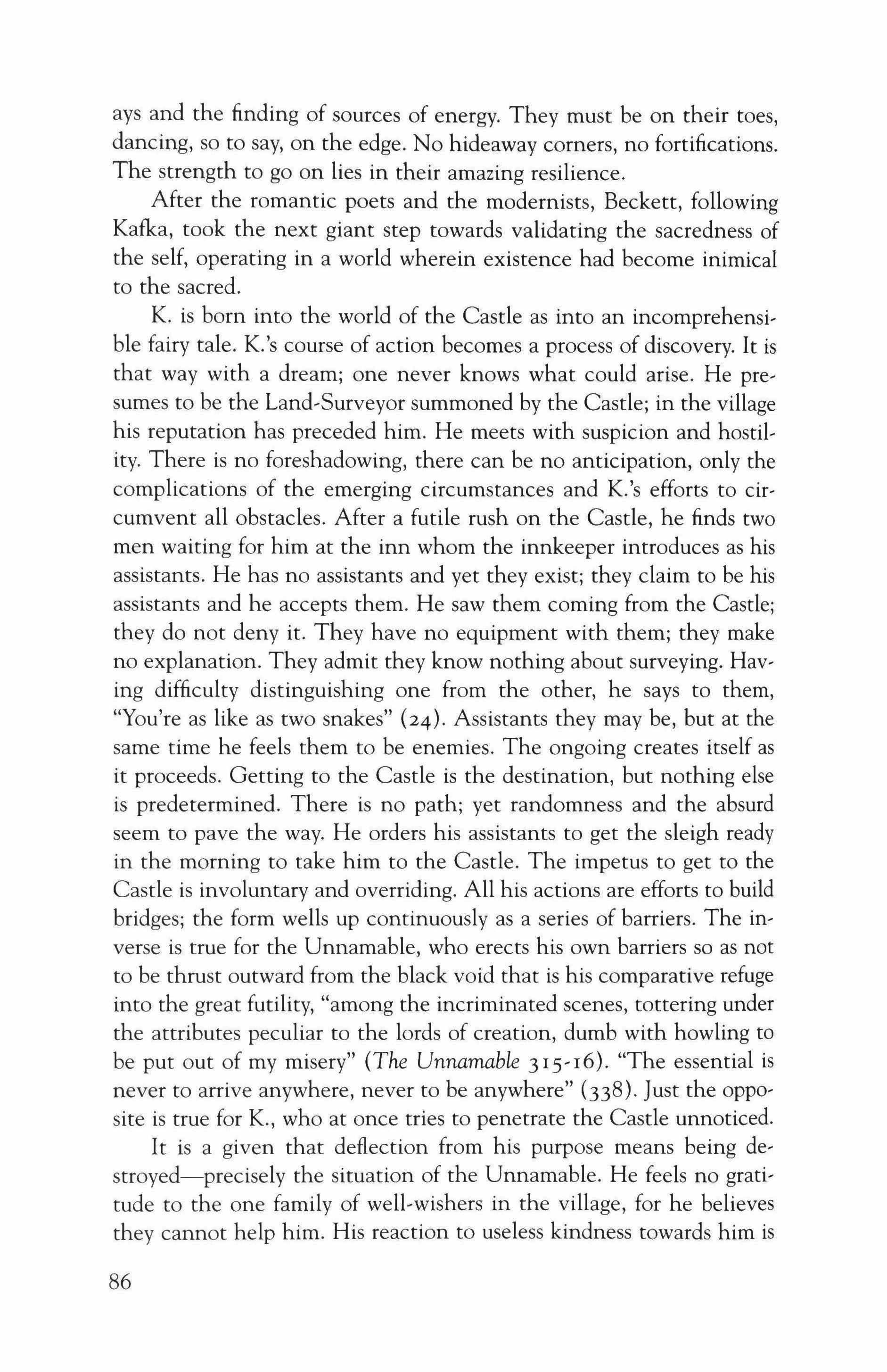
ays and the finding of sources of energy. They must be on their toes, dancing, so to say, on the edge. No hideaway corners, no fortifications. The strength to go on lies in their amazing resilience.
After the romantic poets and the modernists, Beckett, following Kafka, took the next giant step towards validating the sacredness of the self, operating in a world wherein existence had become inimical to the sacred.
K. is born into the world of the Castle as into an incomprehensible fairy tale. K.'s course of action becomes a process of discovery. It is that way with a dream; one never knows what could arise. He presumes to be the Land-Surveyor summoned by the Castle; in the village his reputation has preceded him. He meets with suspicion and hostility. There is no foreshadowing, there can be no anticipation, only the complications of the emerging circumstances and K.'s efforts to circumvent all obstacles. After a futile rush on the Castle, he finds two men waiting for him at the inn whom the innkeeper introduces as his assistants. He has no assistants and yet they exist; they claim to be his assistants and he accepts them. He saw them coming from the Castle; they do not deny it. They have no equipment with them; they make no explanation. They admit they know nothing about surveying. Having difficulty distinguishing one from the other, he says to them, "You're as like as two snakes" (24). Assistants they may be, but at the same time he feels them to be enemies. The ongoing creates itself as it proceeds. Getting to the Castle is the destination, but nothing else is predetermined. There is no path; yet randomness and the absurd seem to pave the way. He orders his assistants to get the sleigh ready in the morning to take him to the Castle. The impetus to get to the Castle is involuntary and overriding. All his actions are efforts to build bridges; the form wells up continuously as a series of barriers. The inverse is true for the Unnamable, who erects his own barriers so as not to be thrust outward from the black void that is his comparative refuge into the great futility, "among the incriminated scenes, tottering under the attributes peculiar to the lords of creation, dumb with howling to be put out of my misery" (The Unnamable 315-16). "The essential is never to arrive anywhere, never to be anywhere" (338). Just the opposite is true for K., who at once tries to penetrate the Castle unnoticed. It is a given that deflection from his purpose means being destroyed-precisely the situation of the Unnamable. He feels no gratitude to the one family of well-wishers in the village, for he believes they cannot help him. His reaction to useless kindness towards him is
86

aversion. He has no principles. Lying, deception, flattery, betrayal, come automatically to serve his end.
Nevertheless he has our allegiance. For all the good it does him, we may be his only allies. Even Frieda, the wild, burning, carefree, delightful girl who spurns Klamm's summons (Klamm, the ultra-high Castle official, the Master in the fairy tale), crying aloud that she is with the Land-Surveyor, and who carries K. into a whirlwind of sexual delirium, is diabolical in her pretense of innocence betrayed. She deserts K. on grounds of carnal treachery that she, not he, is guilty of, in point of fact. Other disclosures give us a pretext for sticking to K. even though he is desperately eager to sell her to Klamm. The issue for us is not K.'s character but his not losing his meaning. He must always keep his aim before him, ruthless against surplus emotions. The love of Frieda, Klamm's mistress, for him, gives him a kind of whispering intimacy with (to put it plainly) the master of his fate. K.'s life-force is directed at closing the separation between him and Klamm who, through Frieda, means penetration into the Castle.
To be denied penetration, to be expelled into birth-to be annihilated: comparison between the two novels works to strengthen our allegiance to each of the heroes. To view one world from the other, The Castle from the vantage point of the trilogy, is like providing glasses with magical properties. The baffling and contradictory about K.'s world become plain. The importance of The Castle to the genesis of the trilogy becomes clear. Wearing Beckett's glasses, we recognize treachery, which K. in his single-rnindedness cannot see, and sense conspiracy to which he is oblivious.
K. cannot believe that his violent treatment and banishment of the assistants are responsible for Frieda's haggardness. He thinks she longs for Klamm; she is precious to him on that account, "you miss Klamm and that gives you desperate ideas" (180). These are caressive words; her willingness to accommodate a deal engenders them. Frieda tells him that the assistants have been hungering after her like animals. K. finds himself defending them. She wrings her hands, "It's their deceit" (18I). K. is insistent. He will believe that Frieda misses Klamm. Frieda states unambiguously that she cannot resist the assistants sexually, and then, surprise, she turns the tables on him. She does not wish to be tortured by her attraction to them, but if K. shuts them out he will lose forever the hope of gaining admittance to Klamm. "I want to save you by any means at all from such consequences" (184), rather neatly playing his hand to gain hers, "sacrific-
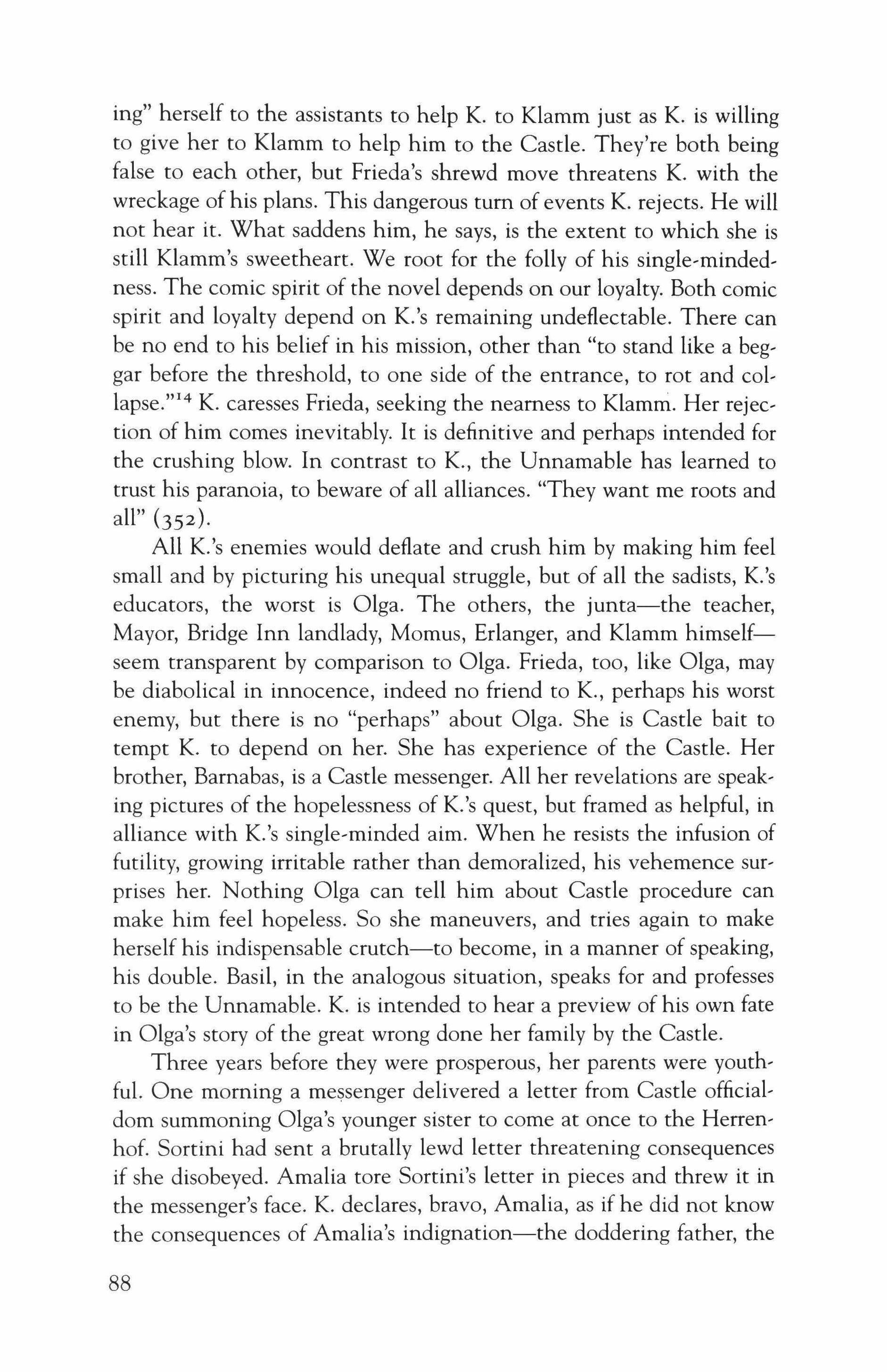
ing" herself to the assistants to help K. to Klamm just as K. is willing to give her to Klamm to help him to the Castle. They're both being false to each other, but Frieda's shrewd move threatens K. with the wreckage of his plans. This dangerous tum of events K. rejects. He will not hear it. What saddens him, he says, is the extent to which she is still Klamm's sweetheart. We root for the folly of his single-mindedness. The comic spirit of the novel depends on our loyalty. Both comic spirit and loyalty depend on K.'s remaining undeflectable. There can be no end to his belief in his mission, other than "to stand like a beggar before the threshold, to one side of the entrance, to rot and collapse."I4 K. caresses Frieda, seeking the nearness to Klamm. Her rejection of him comes inevitably. It is definitive and perhaps intended for the crushing blow. In contrast to K., the Unnamable has learned to trust his paranoia, to beware of all alliances. "They want me roots and all" (352).
All K.'s enemies would deflate and crush him by making him feel small and by picturing his unequal struggle, but of all the sadists, K.'s educators, the worst is Olga. The others, the junta-the teacher, Mayor, Bridge Inn landlady, Momus, Erlanger, and Klamm himselfseem transparent by comparison to Olga. Frieda, too, like Olga, may be diabolical in innocence, indeed no friend to K., perhaps his worst enemy, but there is no "perhaps" about Olga. She is Castle bait to tempt K. to depend on her. She has experience of the Castle. Her brother, Barnabas, is a Castle messenger. All her revelations are speaking pictures of the hopelessness of K.'s quest, but framed as helpful, in alliance with K.'s single-minded aim. When he resists the infusion of futility, growing irritable rather than demoralized, his vehemence surprises her. Nothing Olga can tell him about Castle procedure can make him feel hopeless. So she maneuvers, and tries again to make herself his indispensable crutch-to become, in a manner of speaking, his double. Basil, in the analogous situation, speaks for and professes to be the Unnamable. K. is intended to hear a preview of his own fate in Olga's story of the great wrong done her family by the Castle.
Three years before they were prosperous, her parents were youthful. One morning a messenger delivered a letter from Castle officialdom summoning Olga's younger sister to come at once to the Herrenhof. Sortini had sent a brutally lewd letter threatening consequences if she disobeyed. Amalia tore Sortini's letter in pieces and threw it in the messenger's face. K. declares, bravo, Amalia, as if he did not know the consequences of Amalia's indignation-the doddering father, the
88
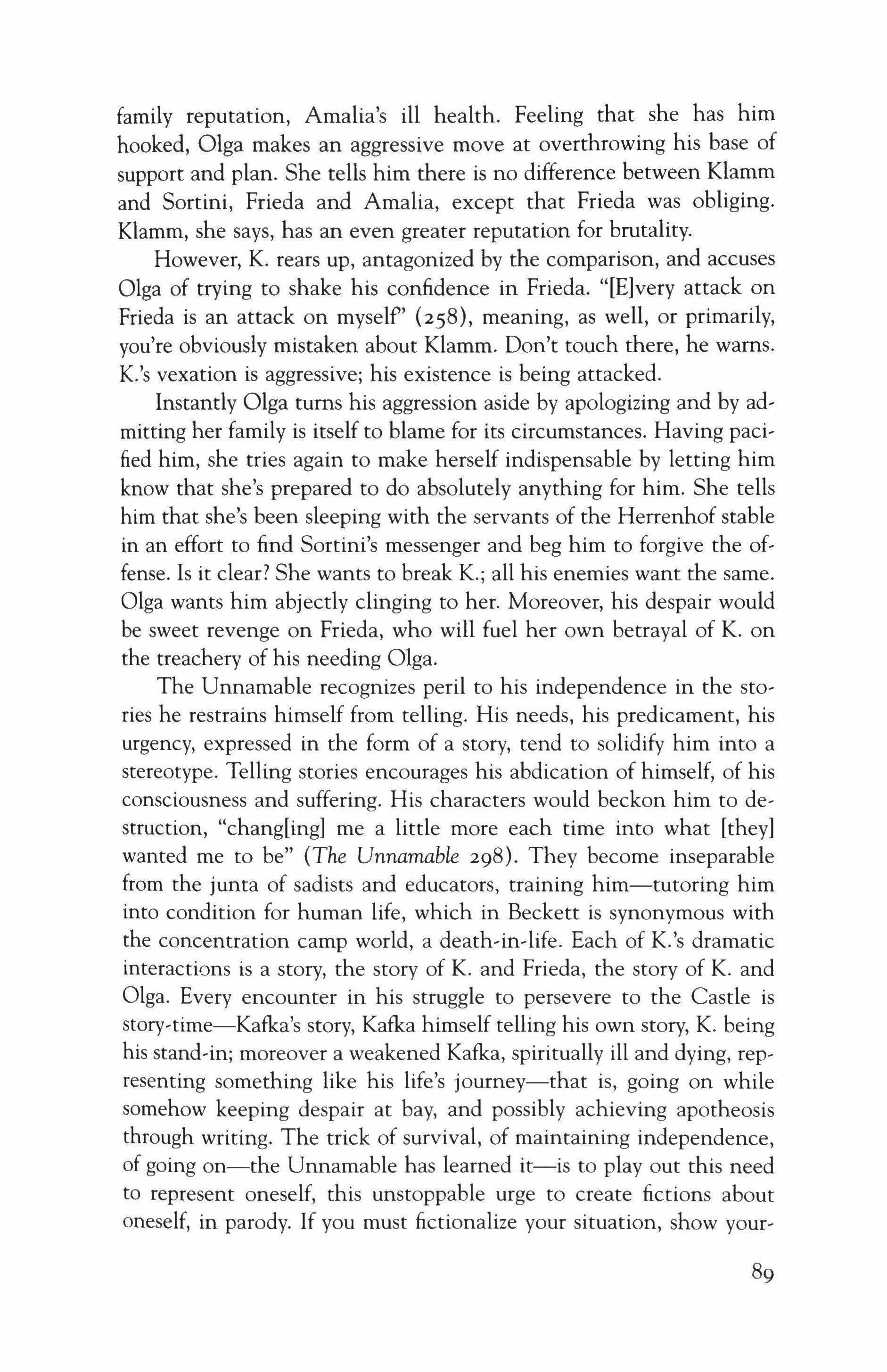
family reputation, Amalia's ill health. Feeling that she has him hooked, Olga makes an aggressive move at overthrowing his base of support and plan. She tells him there is no difference between Klamm and Sortini, Frieda and Amalia, except that Frieda was obliging. Klamm, she says, has an even greater reputation for brutality.
However, K. rears up, antagonized by the comparison, and accuses Olga of trying to shake his confidence in Frieda. "[E]very attack on Frieda is an attack on myself' (258), meaning, as well, or primarily, you're obviously mistaken about Klamm. Don't touch there, he warns. K.'s vexation is aggressive; his existence is being attacked.
Instantly Olga turns his aggression aside by apologizing and by ad, mitting her family is itself to blame for its circumstances. Having pacified him, she tries again to make herself indispensable by letting him know that she's prepared to do absolutely anything for him. She tells him that she's been sleeping with the servants of the Herrenhof stable in an effort to find Sortini's messenger and beg him to forgive the of, fense. Is it clear? She wants to break K.; all his enemies want the same. Olga wants him abjectly clinging to her. Moreover, his despair would be sweet revenge on Frieda, who will fuel her own betrayal of K. on the treachery of his needing Olga.
The Unnamable recognizes peril to his independence in the stories he restrains himself from telling. His needs, his predicament, his urgency, expressed in the form of a story, tend to solidify him into a stereotype. Telling stories encourages his abdication of himself, of his consciousness and suffering. His characters would beckon him to de, struction, "chang[ing] me a little more each time into what [they] wanted me to be" (The Unnamable 298). They become inseparable from the junta of sadists and educators, training him-tutoring him into condition for human life, which in Beckett is synonymous with the concentration camp world, a death,in'life. Each of K.'s dramatic interactions is a story, the story of K. and Frieda, the story of K. and Olga. Every encounter in his struggle to persevere to the Castle is story-time=Kafka's story, Kafka himself telling his own story, K. being his stand-in; moreover a weakened Kafka, spiritually ill and dying, rep' resenting something like his life's journey-that is, going on while somehow keeping despair at bay, and possibly achieving apotheosis through writing. The trick of survival, of maintaining independence, of going on-the Unnamable has learned it-is to play out this need to represent oneself, this unstoppable urge to create fictions about oneself, in parody. If you must fictionalize your situation, show your,
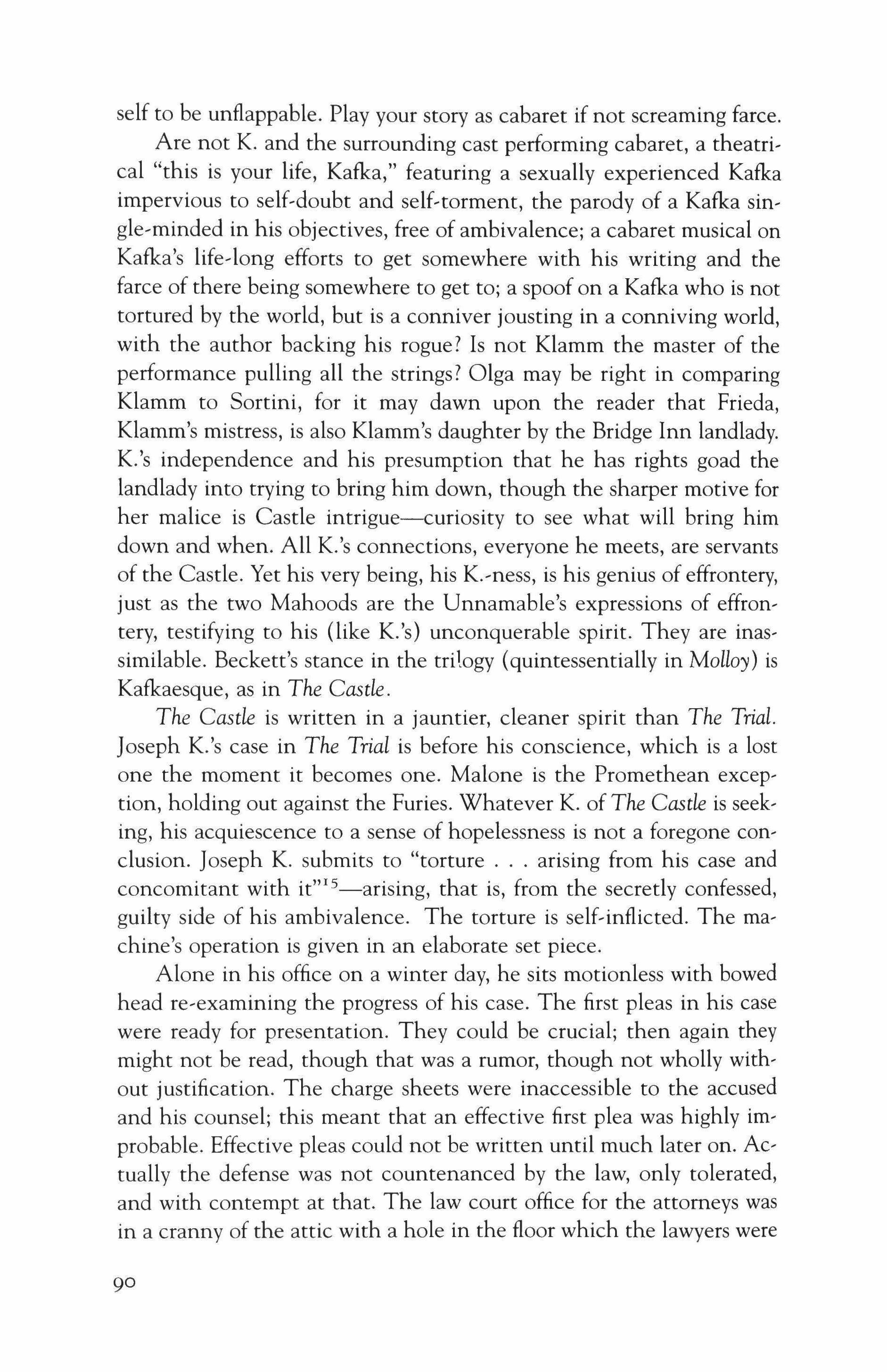
self to be unflappable. Play your story as cabaret if not screaming farce. Are not K. and the surrounding cast performing cabaret, a theatrical "this is your life, Kafka," featuring a sexually experienced Kafka impervious to self-doubt and self-torment, the parody of a Kafka single-minded in his objectives, free of ambivalence; a cabaret musical on Kafka's life-long efforts to get somewhere with his writing and the farce of there being somewhere to get to; a spoof on a Kafka who is not tortured by the world, but is a conniver jousting in a conniving world, with the author backing his rogue? Is not Klamm the master of the performance pulling all the strings? Olga may be right in comparing Klamm to Sortini, for it may dawn upon the reader that Frieda, Klamm's mistress, is also Klamm's daughter by the Bridge Inn landlady. K.'s independence and his presumption that he has rights goad the landlady into trying to bring him down, though the sharper motive for her malice is Castle intrigue-curiosity to see what will bring him down and when. All K.'s connections, everyone he meets, are servants of the Castle. Yet his very being, his K.-ness, is his genius of effrontery, just as the two Mahoods are the Unnamable's expressions of effrontery, testifying to his {like K.'s) unconquerable spirit. They are inassimilable. Beckett's stance in the trilogy (quintessentially in Molloy) is Kafkaesque, as in The Castle.
The Castle is written in a jauntier, cleaner spirit than The Trial. Joseph K.'s case in The Trial is before his conscience, which is a lost one the moment it becomes one. Malone is the Promethean exception, holding out against the Furies. Whatever K. of The Castle is seeking, his acquiescence to a sense of hopelessness is not a foregone conclusion. Joseph K. submits to "torture arising from his case and concomitant with it"IS-arising, that is, from the secretly confessed, guilty side of his ambivalence. The torture is self-inflicted. The machine's operation is given in an elaborate set piece.
Alone in his office on a winter day, he sits motionless with bowed head re-examining the progress of his case. The first pleas in his case were ready for presentation. They could be crucial; then again they might not be read, though that was a rumor, though not wholly without justification. The charge sheets were inaccessible to the accused and his counsel; this meant that an effective first plea was highly improbable. Effective pleas could not be written until much later on. Actually the defense was not countenanced by the law, only tolerated, and with contempt at that. The law court office for the attorneys was in a cranny of the attic with a hole in the floor which the lawyers were
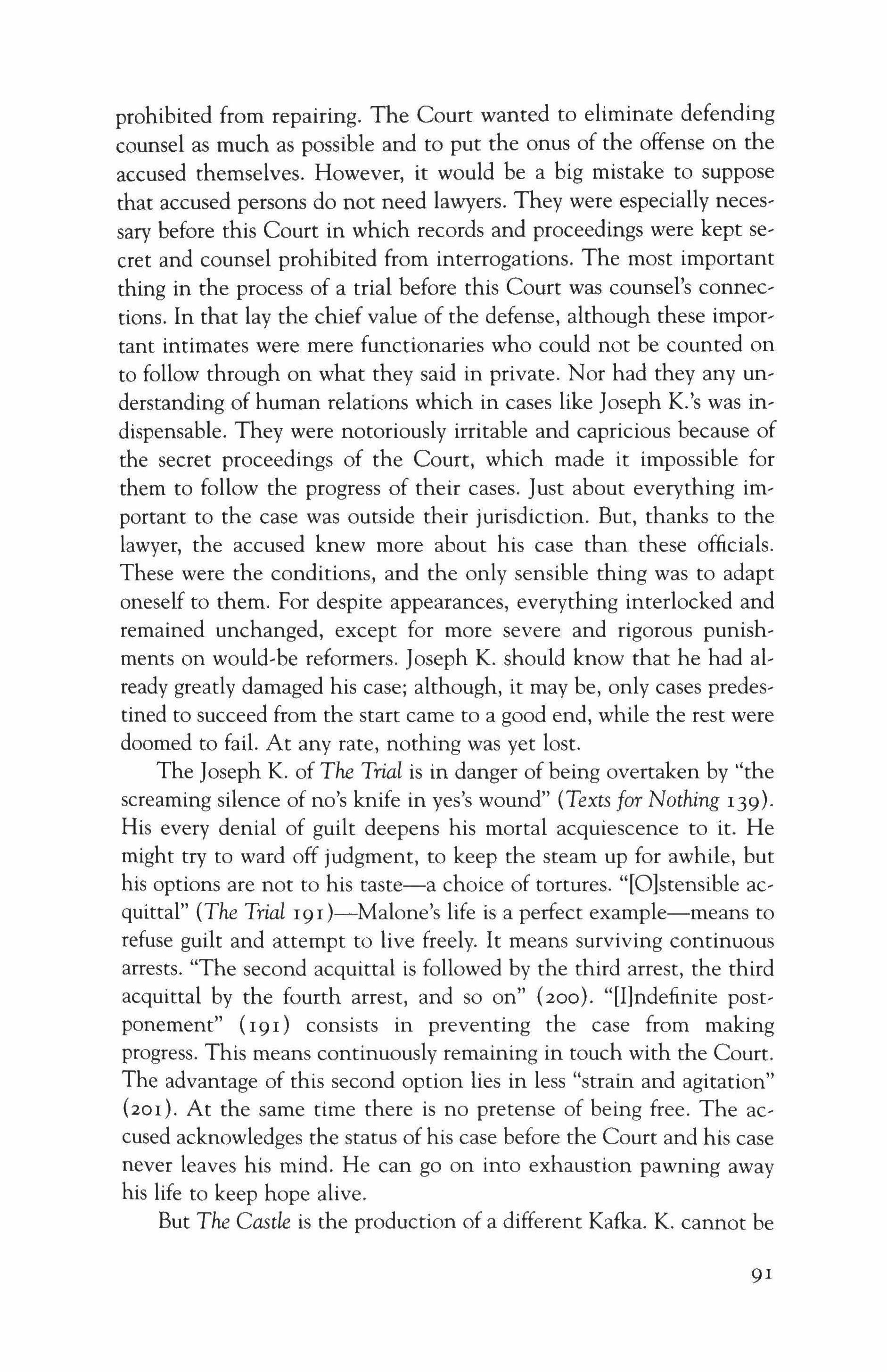
prohibited from repairing. The Court wanted to eliminate defending counsel as much as possible and to put the onus of the offense on the accused themselves. However, it would be a big mistake to suppose that accused persons do not need lawyers. They were especially necessary before this Court in which records and proceedings were kept secret and counsel prohibited from interrogations. The most important thing in the process of a trial before this Court was counsel's connections. In that lay the chief value of the defense, although these important intimates were mere functionaries who could not be counted on to follow through on what they said in private. Nor had they any understanding of human relations which in cases like Joseph K.'s was indispensable. They were notoriously irritable and capricious because of the secret proceedings of the Court, which made it impossible for them to follow the progress of their cases. Just about everything important to the case was outside their jurisdiction. But, thanks to the lawyer, the accused knew more about his case than these officials. These were the conditions, and the only sensible thing was to adapt oneself to them. For despite appearances, everything interlocked and remained unchanged, except for more severe and rigorous punishments on would-be reformers. Joseph K. should know that he had already greatly damaged his case; although, it may be, only cases predestined to succeed from the start came to a good end, while the rest were doomed to fail. At any rate, nothing was yet lost.
The Joseph K. of The Trial is in danger of being overtaken by "the screaming silence of no's knife in yes's wound" (Texts for Nothing 139). His every denial of guilt deepens his mortal acquiescence to it. He might try to ward off judgment, to keep the steam up for awhile, but his options are not to his taste-a choice of tortures. "[O]stensible acquittal" (The Trial 191)-Malone's life is a perfect example-means to refuse guilt and attempt to live freely. It means surviving continuous arrests. "The second acquittal is followed by the third arrest, the third acquittal by the fourth arrest, and so on" (200). "[Ijndefinite postponement" ( 1 9 1 ) consists in preventing the case from making progress. This means continuously remaining in touch with the Court. The advantage of this second option lies in less "strain and agitation" (201). At the same time there is no pretense of being free. The accused acknowledges the status of his case before the Court and his case never leaves his mind. He can go on into exhaustion pawning away his life to keep hope alive.
But The Castle is the production of a different Kafka. K. cannot be
91
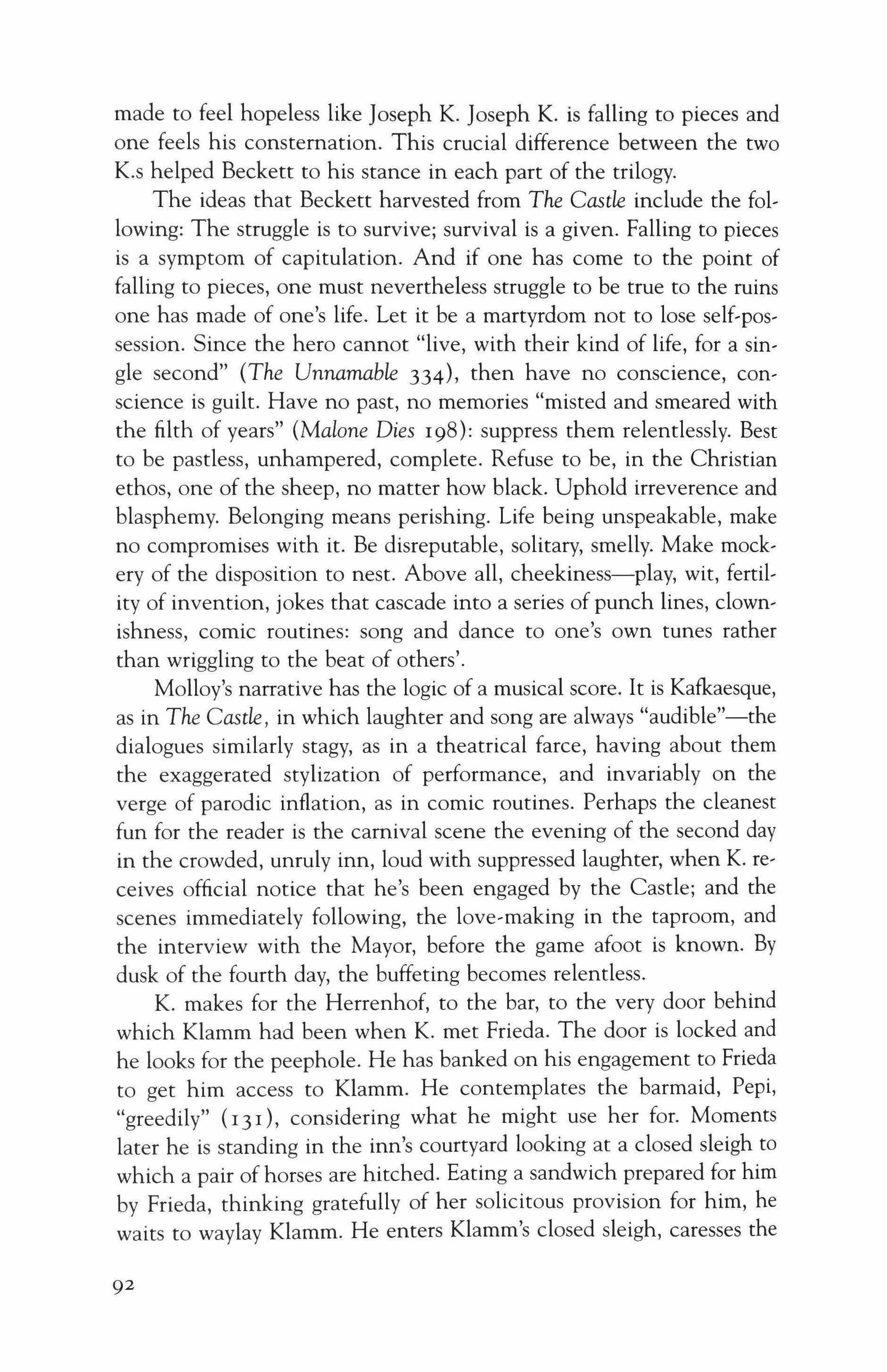
made to feel hopeless like Joseph K. Joseph K. is falling to pieces and one feels his consternation. This crucial difference between the two K.s helped Beckett to his stance in each part of the trilogy.
The ideas that Beckett harvested from The Castle include the following: The struggle is to survive; survival is a given. Falling to pieces is a symptom of capitulation. And if one has come to the point of falling to pieces, one must nevertheless struggle to be true to the ruins one has made of one's life. Let it be a martyrdom not to lose self-pessession. Since the hero cannot "live, with their kind of life, for a single second" (The Unnamable 334), then have no conscience, conscience is guilt. Have no past, no memories "misted and smeared with the filth of years" (Malone Dies 198): suppress them relentlessly. Best to be pastless, unhampered, complete. Refuse to be, in the Christian ethos, one of the sheep, no matter how black. Uphold irreverence and blasphemy. Belonging means perishing. Life being unspeakable, make no compromises with it. Be disreputable, solitary, smelly. Make mockery of the disposition to nest. Above all, cheekiness-play, wit, fertility of invention, jokes that cascade into a series of punch lines, clownishness, comic routines: song and dance to one's own tunes rather than wriggling to the beat of others'.
Molloy's narrative has the logic of a musical score. It is Kafkaesque, as in The Castle, in which laughter and song are always "audible"-the dialogues similarly stagy, as in a theatrical farce, having about them the exaggerated stylization of performance, and invariably on the verge of parodic inflation, as in comic routines. Perhaps the cleanest fun for the reader is the carnival scene the evening of the second day in the crowded, unruly inn, loud with suppressed laughter, when K. receives official notice that he's been engaged by the Castle; and the scenes immediately following, the love-making in the taproom, and the interview with the Mayor, before the game afoot is known. By dusk of the fourth day, the buffeting becomes relentless.
K. makes for the Herrenhof, to the bar, to the very door behind which Klamm had been when K. met Frieda. The door is locked and he looks for the peephole. He has banked on his engagement to Frieda to get him access to Klamm. He contemplates the barmaid, Pepi, "greedily" (131), considering what he might use her for. Moments later he is standing in the inn's courtyard looking at a closed sleigh to which a pair of horses are hitched. Eating a sandwich prepared for him by Frieda, thinking gratefully of her solicitous provision for him, he waits to waylay Klamm. He enters Klamm's closed sleigh, caresses the
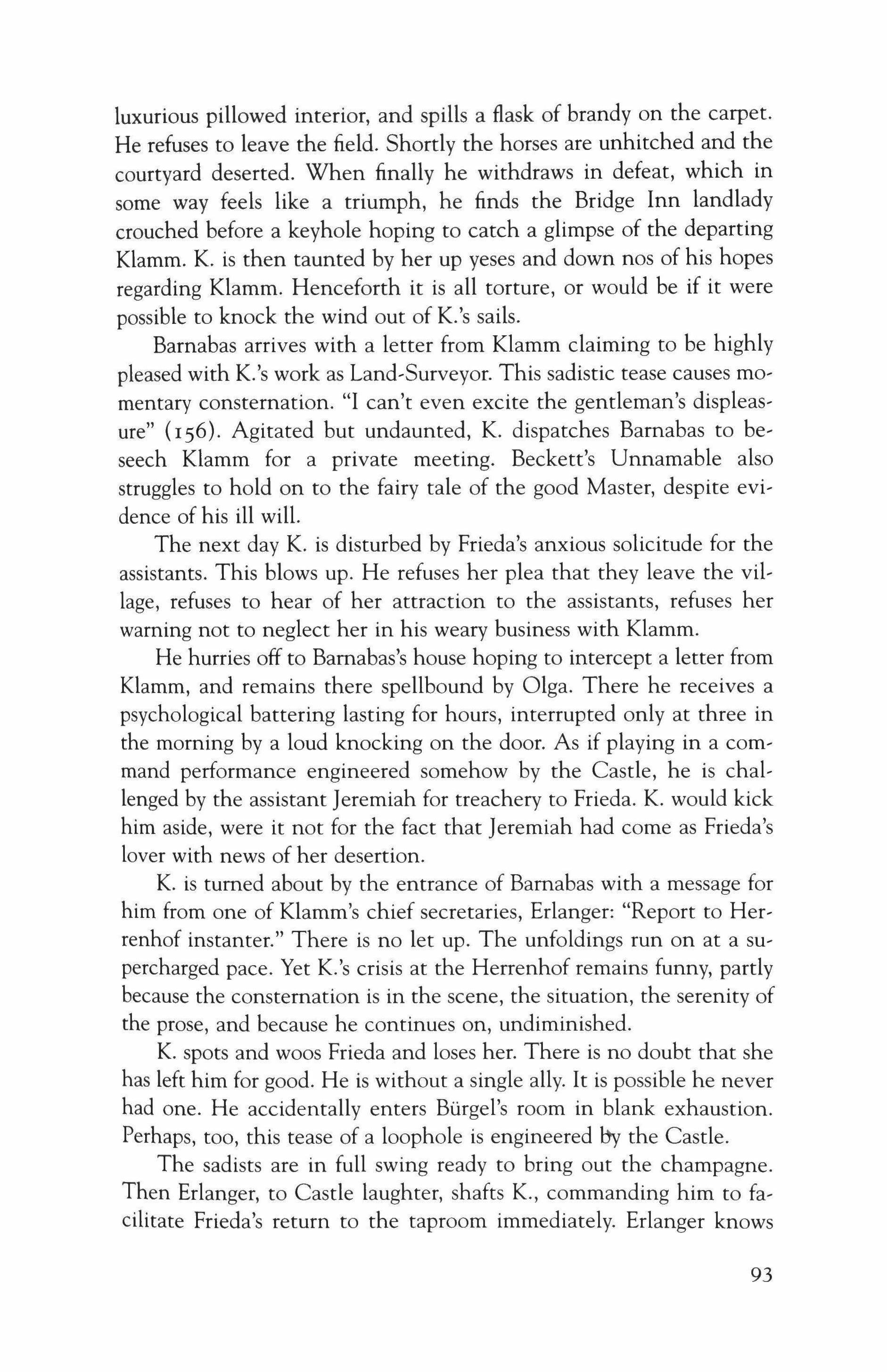
luxurious pillowed interior, and spills a flask of brandy on the carpet. He refuses to leave the field. Shortly the horses are unhitched and the courtyard deserted. When finally he withdraws in defeat, which in some way feels like a triumph, he finds the Bridge Inn landlady crouched before a keyhole hoping to catch a glimpse of the departing Klamm. K. is then taunted by her up yeses and down nos of his hopes regarding Klamm. Henceforth it is all torture, or would be if it were possible to knock the wind out of K.'s sails.
Barnabas arrives with a letter from Klamm claiming to be highly pleased with K.'s work as Land-Surveyor, This sadistic tease causes momentary consternation. "I can't even excite the gentleman's displeasure" (156). Agitated but undaunted, K. dispatches Barnabas to beseech Klamm for a private meeting. Beckett's Unnamable also struggles to hold on to the fairy tale of the good Master, despite evidence of his ill will.
The next day K. is disturbed by Frieda's anxious solicitude for the assistants. This blows up. He refuses her plea that they leave the village, refuses to hear of her attraction to the assistants, refuses her warning not to neglect her in his weary business with Klamm.
He hurries off to Barnabas's house hoping to intercept a letter from Klamm, and remains there spellbound by Olga. There he receives a psychological battering lasting for hours, interrupted only at three in the morning by a loud knocking on the door. As if playing in a cornmand performance engineered somehow by the Castle, he is challenged by the assistant Jeremiah for treachery to Frieda. K. would kick him aside, were it not for the fact that Jeremiah had come as Frieda's lover with news of her desertion.
K. is turned about by the entrance of Barnabas with a message for him from one of Klamm's chief secretaries, Erlanger: "Report to Herrenhof instanter." There is no let up. The unfoldings run on at a supercharged pace. Yet K.'s crisis at the Herrenhof remains funny, partly because the consternation is in the scene, the situation, the serenity of the prose, and because he continues on, undiminished.
K. spots and woos Frieda and loses her. There is no doubt that she has left him for good. He is without a single ally. It is possible he never had one. He accidentally enters Burgel's room in blank exhaustion. Perhaps, too, this tease of a loophole is engineered by the Castle.
The sadists are in full swing ready to bring out the champagne. Then Erlanger, to Castle laughter, shafts K., commanding him to facilitate Frieda's return to the taproom immediately. Erlanger knows
93
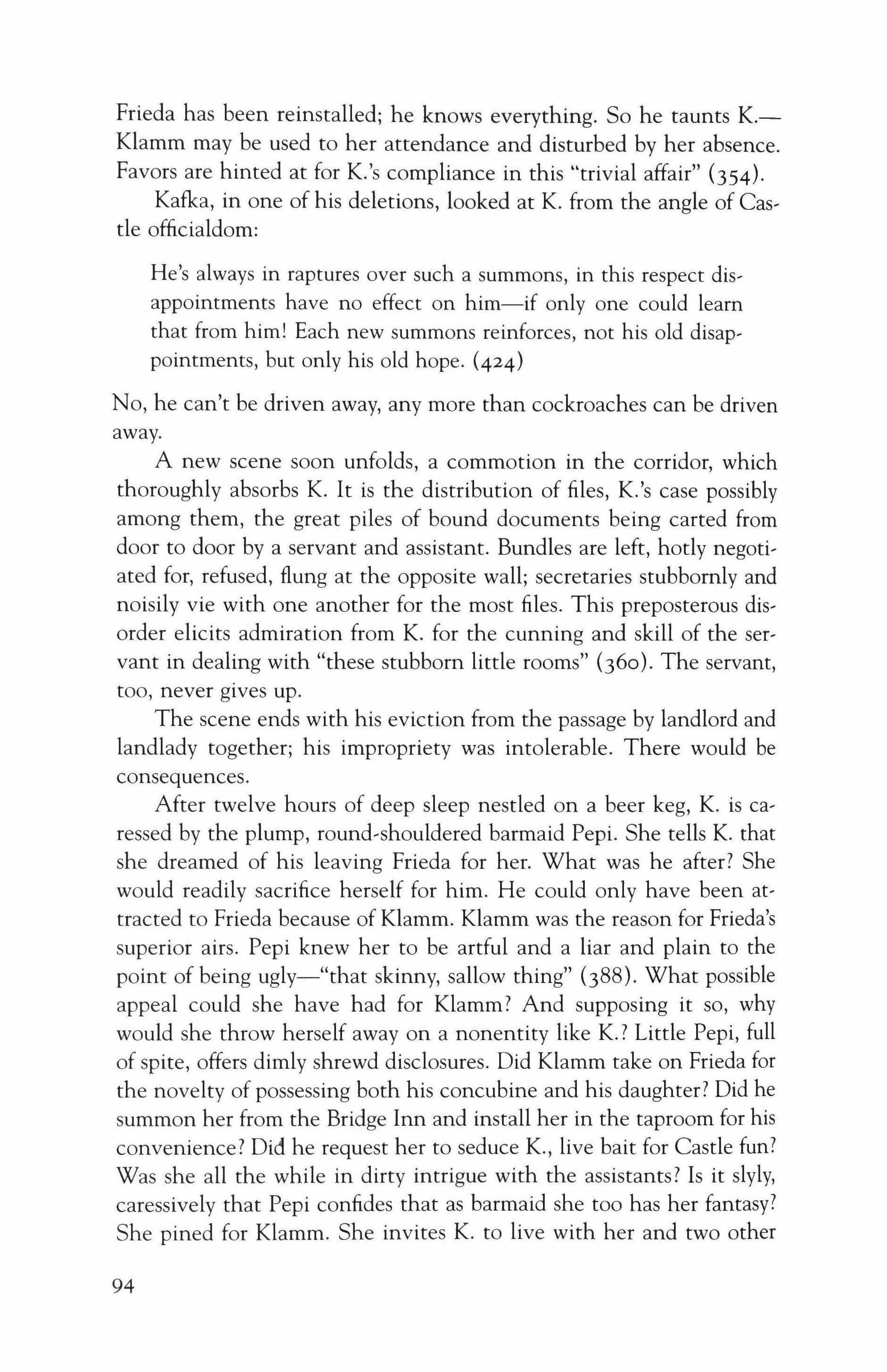
Frieda has been reinstalled; he knows everything. So he taunts K.Klamm may be used to her attendance and disturbed by her absence. Favors are hinted at for K.'s compliance in this "trivial affair" (354).
Kafka, in one of his deletions, looked at K. from the angle of Castle officialdom:
He's always in raptures over such a summons, in this respect disappointments have no effect on him-if only one could learn that from him! Each new summons reinforces, not his old disappointments, but only his old hope. (424)
No, he can't be driven away, any more than cockroaches can be driven away.
A new scene soon unfolds, a commotion in the corridor, which thoroughly absorbs K. It is the distribution of files, K.'s case possibly among them, the great piles of bound documents being carted from door to door by a servant and assistant. Bundles are left, hotly negotiated for, refused, flung at the opposite wall; secretaries stubbornly and noisily vie with one another for the most files. This preposterous disorder elicits admiration from K. for the cunning and skill of the servant in dealing with "these stubborn little rooms" (360). The servant, too, never gives up.
The scene ends with his eviction from the passage by landlord and landlady together; his impropriety was intolerable. There would be consequences.
After twelve hours of deep sleep nestled on a beer keg, K. is caressed by the plump, round-shouldered barmaid Pepi. She tells K. that she dreamed of his leaving Frieda for her. What was he after? She would readily sacrifice herself for him. He could only have been attracted to Frieda because of Klamm. Klamm was the reason for Frieda's superior airs. Pepi knew her to be artful and a liar and plain to the point of being ugly-"that skinny, sallow thing" (388). What possible appeal could she have had for Klamm? And supposing it so, why would she throw herself away on a nonentity like K.? Little Pepi, full of spite, offers dimly shrewd disclosures. Did Klamm take on Frieda for the novelty of possessing both his concubine and his daughter? Did he summon her from the Bridge Inn and install her in the taproom for his convenience? Did he request her to seduce K., live bait for Castle fun? Was she all the while in dirty intrigue with the assistants? Is it slyly, caressively that Pepi confides that as barmaid she too has her fantasy? She pined for Klamm. She invites K. to live with her and two other
94
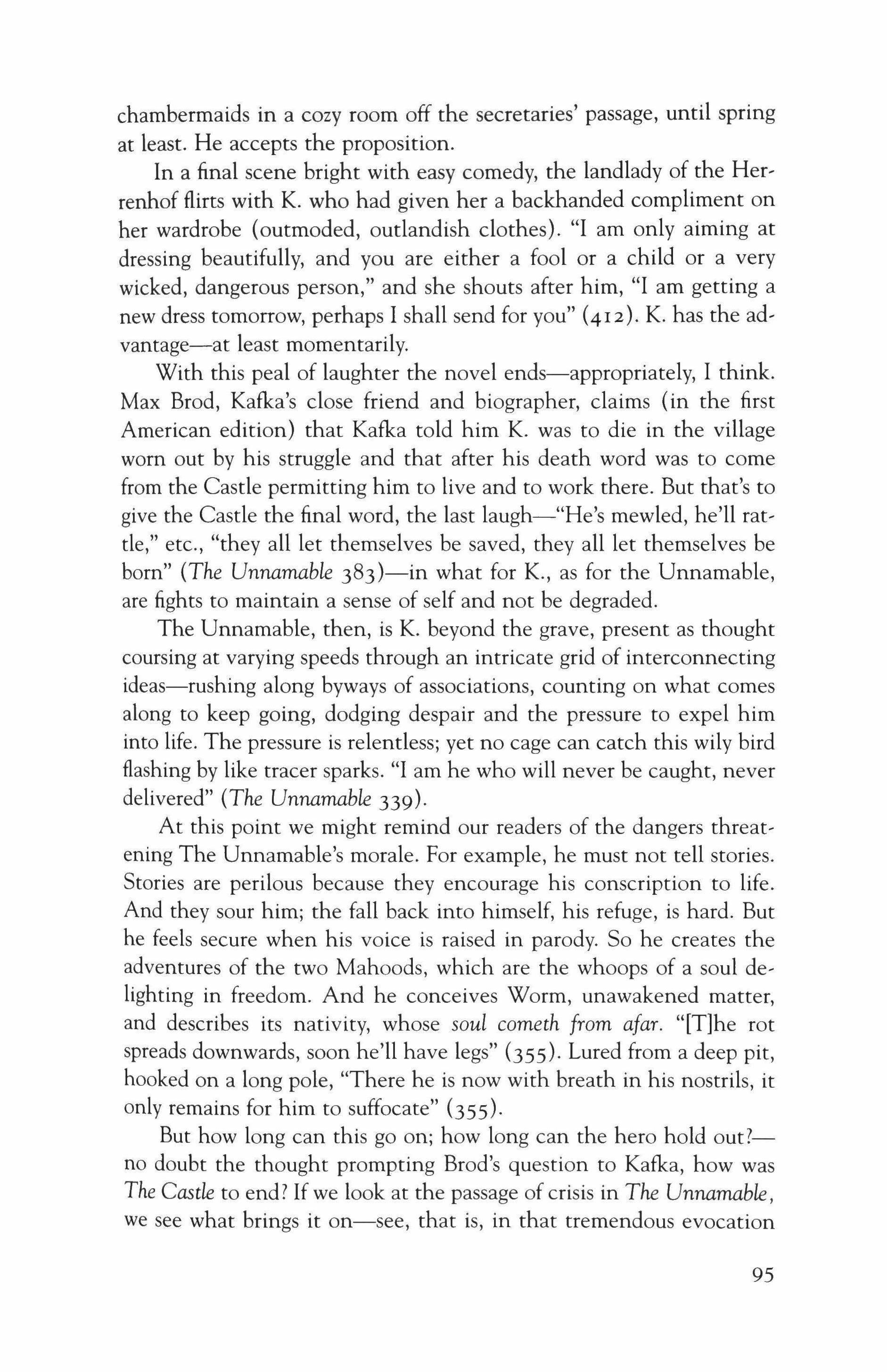
chambermaids in a cozy room off the secretaries' passage, until spring at least. He accepts the proposition.
In a final scene bright with easy comedy, the landlady of the Her, renhof flirts with K. who had given her a backhanded compliment on her wardrobe (outmoded, outlandish clothes). "I am only aiming at dressing beautifully, and you are either a fool or a child or a very wicked, dangerous person," and she shouts after him, "I am getting a new dress tomorrow, perhaps I shall send for you" (412). K. has the ad, vantage-at least momentarily.
With this peal of laughter the novel ends-appropriately, I think. Max Brod, Kafka's close friend and biographer, claims (in the first American edition) that Kafka told him K. was to die in the village worn out by his struggle and that after his death word was to come from the Castle permitting him to live and to work there. But that's to give the Castle the final word, the last laugh-"He's mewled, he'll rat' de," etc., "they all let themselves be saved, they all let themselves be born" (The Unnamable 3B3)-in what for K., as for the Unnamable, are fights to maintain a sense of self and not be degraded.
The Unnamable, then, is K. beyond the grave, present as thought coursing at varying speeds through an intricate grid of interconnecting ideas-rushing along byways of associations, counting on what comes along to keep going, dodging despair and the pressure to expel him into life. The pressure is relentless; yet no cage can catch this wily bird flashing by like tracer sparks. "I am he who will never be caught, never delivered" (The Unnamable 339).
At this point we might remind our readers of the dangers threat, ening The Unnamable's morale. For example, he must not tell stories. Stories are perilous because they encourage his conscription to life. And they sour him; the fall back into himself, his refuge, is hard. But he feels secure when his voice is raised in parody. So he creates the adventures of the two Mahoods, which are the whoops of a soul de, lighting in freedom. And he conceives Worm, unawakened matter, and describes its nativity, whose soul cometh from afar. "[T]he rot spreads downwards, soon he'll have legs" (355). Lured from a deep pit, hooked on a long pole, "There he is now with breath in his nostrils, it only remains for him to suffocate" (355).
But how long can this go on; how long can the hero hold out?no doubt the thought prompting Brod's question to Kafka, how was The Castle to end? If we look at the passage of crisis in The Unnamable, we see what brings it on-see, that is, in that tremendous evocation
95
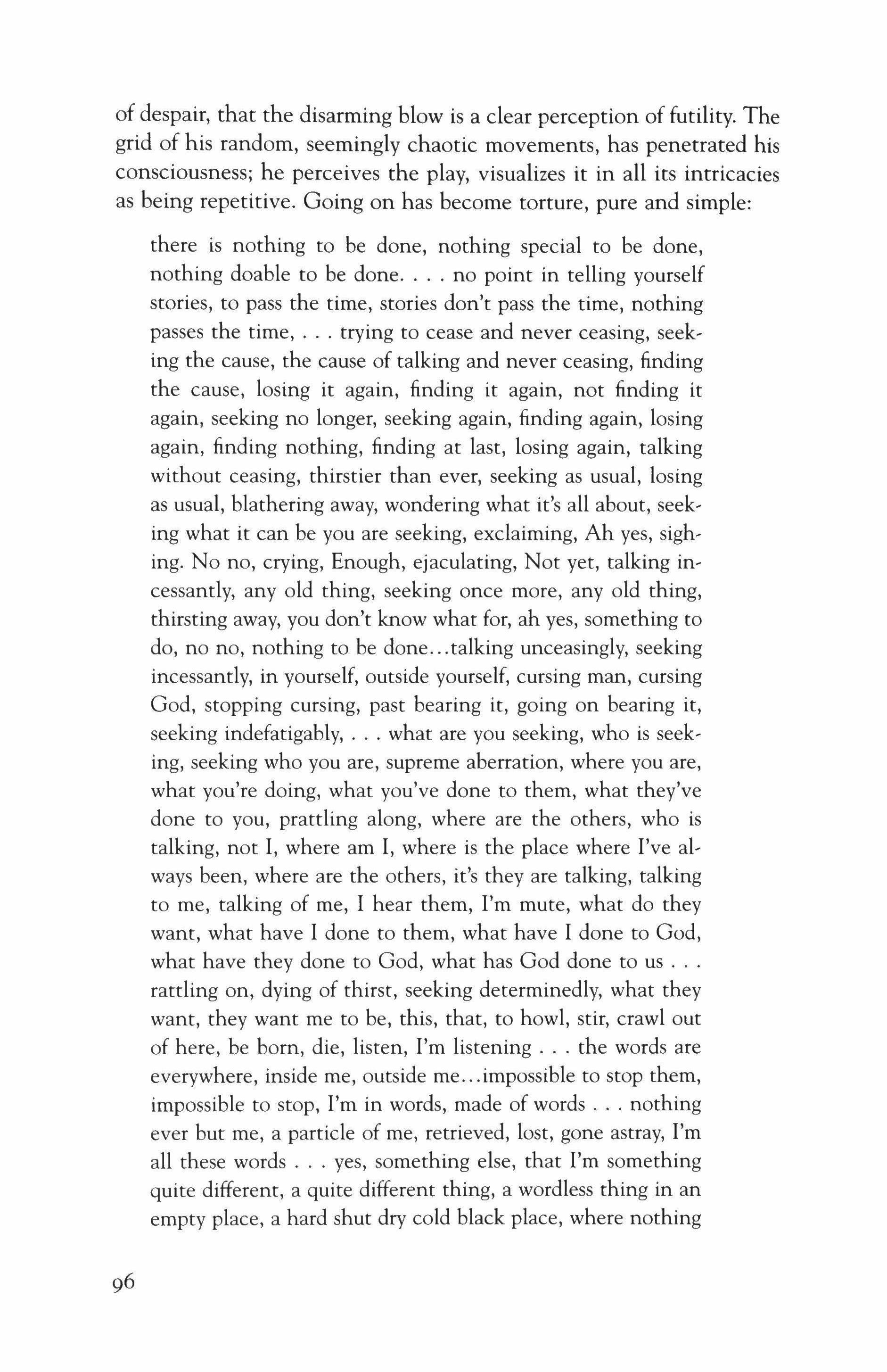
of despair, that the disarming blow is a clear perception of futility. The grid of his random, seemingly chaotic movements, has penetrated his consciousness; he perceives the play, visualizes it in all its intricacies as being repetitive. Going on has become torture, pure and simple: there is nothing to be done, nothing special to be done, nothing doable to be done no point in telling yourself stories, to pass the time, stories don't pass the time, nothing passes the time, trying to cease and never ceasing, seek, ing the cause, the cause of talking and never ceasing, finding the cause, losing it again, finding it again, not finding it again, seeking no longer, seeking again, finding again, losing again, finding nothing, finding at last, losing again, talking without ceasing, thirstier than ever, seeking as usual, losing as usual, blathering away, wondering what it's all about, seek, ing what it can be you are seeking, exclaiming, Ah yes, sigh, ing. No no, crying, Enough, ejaculating, Not yet, talking in, cessantly, any old thing, seeking once more, any old thing, thirsting away, you don't know what for, ah yes, something to do, no no, nothing to be done talking unceasingly, seeking incessantly, in yourself, outside yourself, cursing man, cursing God, stopping cursing, past bearing it, going on bearing it, seeking indefatigably, what are you seeking, who is seek, ing, seeking who you are, supreme aberration, where you are, what you're doing, what you've done to them, what they've done to you, prattling along, where are the others, who is talking, not I, where am I, where is the place where I've always been, where are the others, it's they are talking, talking to me, talking of me, I hear them, I'm mute, what do they want, what have I done to them, what have I done to God, what have they done to God, what has God done to us rattling on, dying of thirst, seeking determinedly, what they want, they want me to be, this, that, to howl, stir, crawl out of here, be born, die, listen, I'm listening the words are everywhere, inside me, outside me impossible to stop them, impossible to stop, I'm in words, made of words nothing ever but me, a particle of me, retrieved, lost, gone astray, I'm all these words yes, something else, that I'm something quite different, a quite different thing, a wordless thing in an empty place, a hard shut dry cold black place, where nothing
stirs, nothing speaks, and that I listen, and that I seek, like a caged beast born of caged beasts born of caged beasts born of caged beasts born in a cage and dead in a cage, born and then dead, born in a cage and then dead in a cage, in a word like a beast (385�87)
What is the point of struggling on? The answer is the same as it always has been-to be himself, not to suffer degradation. If he relinquishes the futile hope that words will enable him to probe the mystery of his core self-if he caves in to the necessity of being born-he becomes that beast caught in the cycle of generation, a prisoner of matter. Once born the self would no longer be worth knowing. Take me, he says, take me, web of folly and pain, as he prays for the magical words that will release him through the doorway held open by the Master. And so he goes on relentlessly, against futility, helped out by a fairy tale.

5
The Kafka we imagine is made up of refractions of a torturing ambivalence, a wounded being like Joseph K. of The Trial, whose torment is self-inflicted. Within this Kafka, the version informed by his diaries, letters, aphorisms, indeed, by everything he wrote, one can imagine the dim presence of another Kafka who has broken away from himself into Beckett's fiction-coming into being in the Nouvelles, established as a being in Molloy; established perhaps even in Malone, a new version of Job holding out against being reduced to Kafka. In The Unnamable, Kafka is himself again, but not quite-tortured but not guilty, hopeless, but driven, inexhaustible. The Unnamable can be seen as a tribute to the Kafka capable of creating The Castle despite incurable illness and despair.
As suggested in Section I, the prose-poem sequence Texts for Nothing (1951) might be dedicated to Kafka. The torment of ambivalence it evokes was Kafka's as well as Beckett's when in 1946 he turned to Kafka's example to break out of his own spiritual deadlock and write the trilogy. To both, the plight of the artist was hopeless. Inspiration depends upon the separation from life and the contradictory longing to be in the world he despises. If he joins the world, he would cease to exist as a writer. Also in despising the world, he ceases to exist as a writer. The artist is condemned to observe and oscillate, desiring the unbearable in an inferno of shifting moods that is his imaginative life.
97
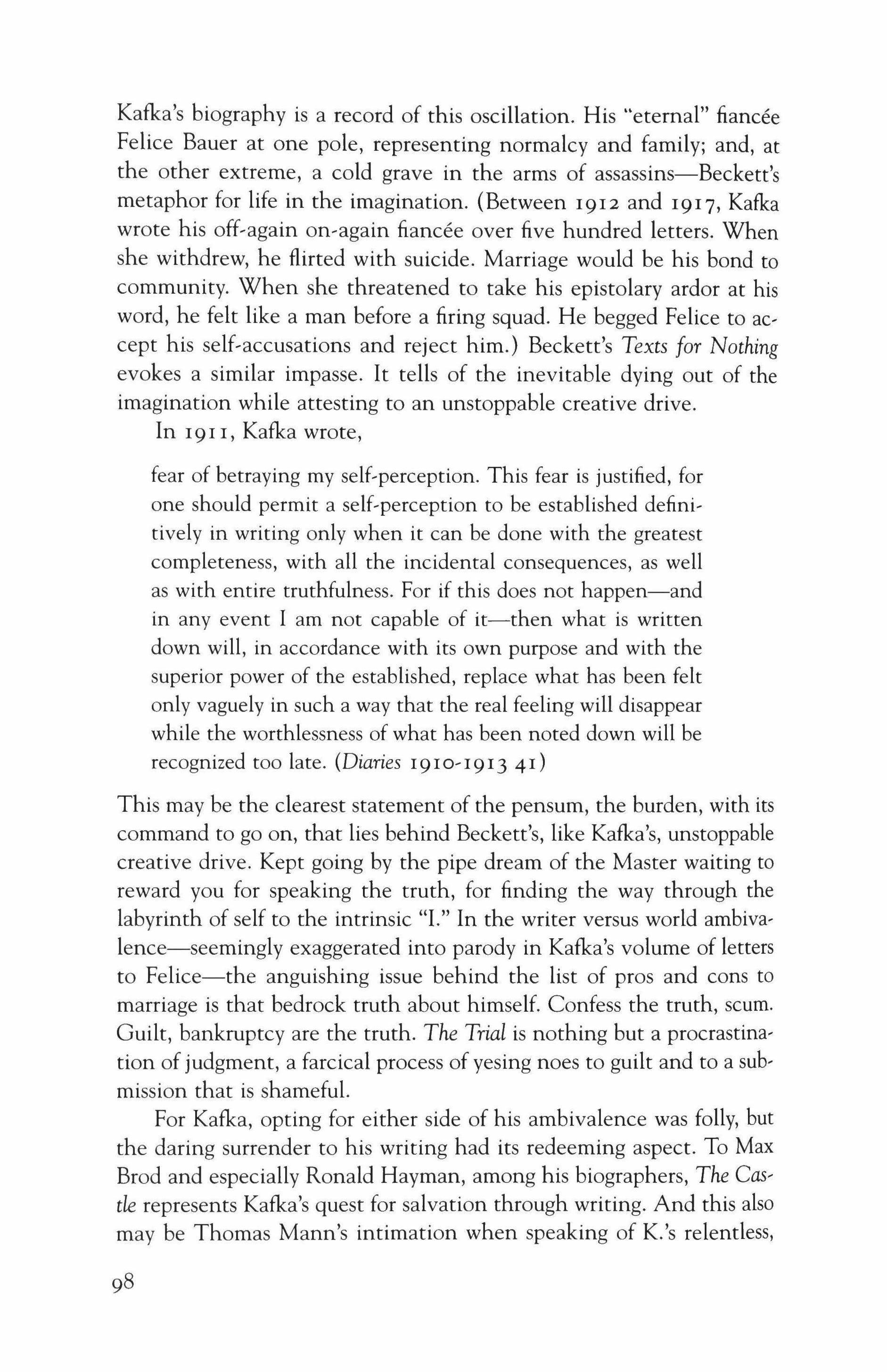
Kafka's biography is a record of this oscillation. His "eternal" fiancee Felice Bauer at one pole, representing normalcy and family; and, at the other extreme, a cold grave in the arms of assassins-Beckett's metaphor for life in the imagination. (Between 1912 and 1917, Kafka wrote his off,again on,again fiancee over five hundred letters. When she withdrew, he flirted with suicide. Marriage would be his bond to community. When she threatened to take his epistolary ardor at his word, he felt like a man before a firing squad. He begged Felice to accept his self,accusations and reject him.) Beckett's Texts for Nothing evokes a similar impasse. It tells of the inevitable dying out of the imagination while attesting to an unstoppable creative drive.
In 191 I, Kafka wrote, fear of betraying my self-perception. This fear is justified, for one should permit a self-perception to be established definitively in writing only when it can be done with the greatest completeness, with all the incidental consequences, as well as with entire truthfulness. For if this does not happen-and in any event I am not capable of it-then what is written down will, in accordance with its own purpose and with the superior power of the established, replace what has been felt only vaguely in such a way that the real feeling will disappear while the worthlessness of what has been noted down will be recognized too late. (Diaries 1910'191341)
This may be the clearest statement of the pensum, the burden, with its command to go on, that lies behind Beckett's, like Kafka's, unstoppable creative drive. Kept going by the pipe dream of the Master waiting to reward you for speaking the truth, for finding the way through the labyrinth of self to the intrinsic "I." In the writer versus world ambivalence-seemingly exaggerated into parody in Kafka's volume of letters to Felice-the anguishing issue behind the list of pros and cons to marriage is that bedrock truth about himself. Confess the truth, scum. Guilt, bankruptcy are the truth. The Trial is nothing but a procrastination of judgment, a farcical process of yesing noes to guilt and to a sub, mission that is shameful.
For Kafka, opting for either side of his ambivalence was folly, but the daring surrender to his writing had its redeeming aspect. To Max Brod and especially Ronald Hayman, among his biographers, The Cas' de represents Kafka's quest for salvation through writing. And this also may be Thomas Mann's intimation when speaking of K.'s relentless,
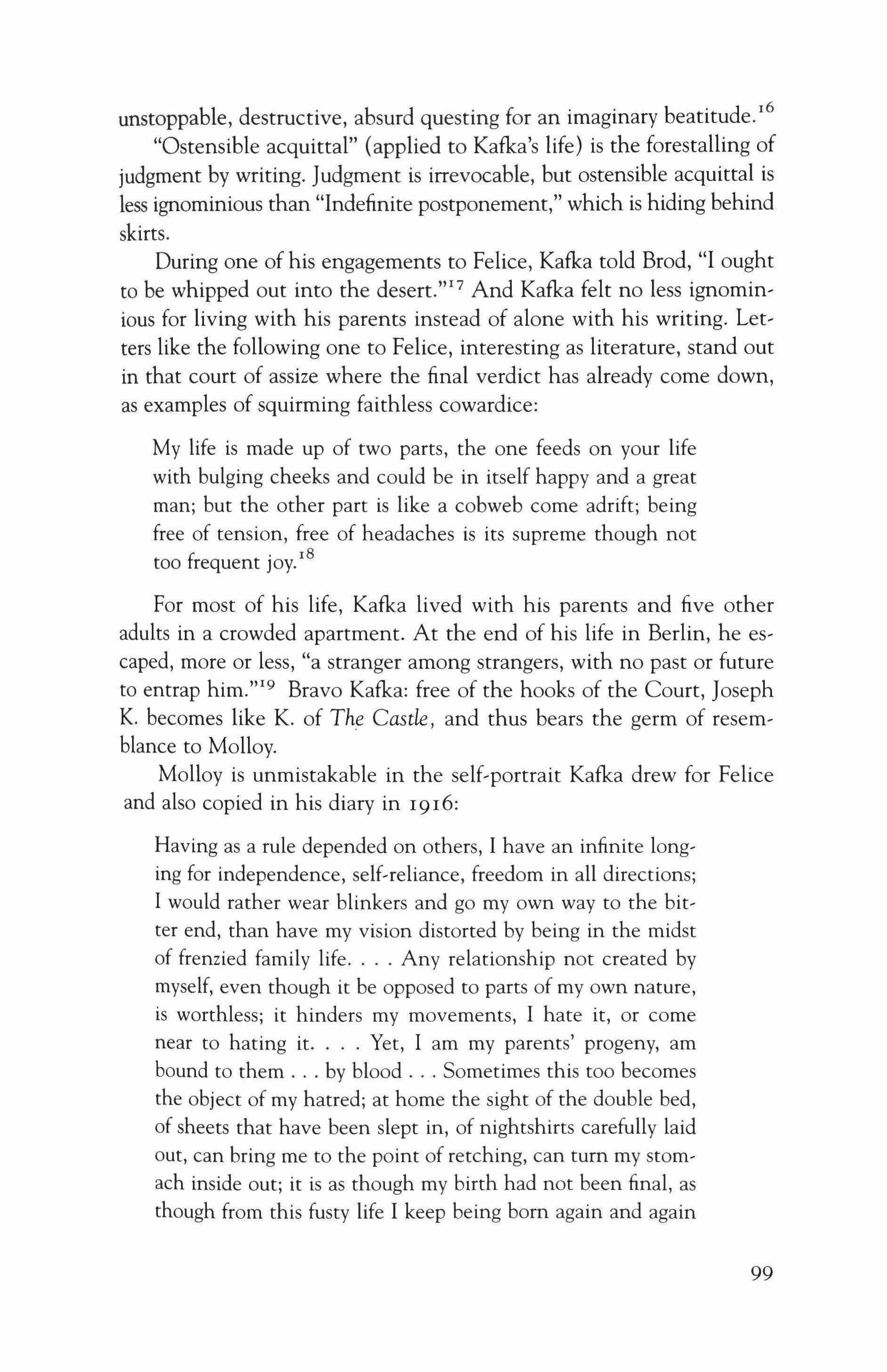
unstoppable, destructive, absurd questing for an imaginary beatitude.16 "Ostensible acquittal" (applied to Kafka's life) is the forestalling of judgment by writing. Judgment is irrevocable, but ostensible acquittal is less ignominious than "Indefinite postponement," which is hiding behind skirts.
During one of his engagements to Felice, Kafka told Brod, "I ought to be whipped out into the desert.:"? And Kafka felt no less ignominious for living with his parents instead of alone with his writing. Let' ters like the following one to Felice, interesting as literature, stand out in that court of assize where the final verdict has already come down, as examples of squirming faithless cowardice:
My life is made up of two parts, the one feeds on your life with bulging cheeks and could be in itself happy and a great man; but the other part is like a cobweb come adrift; being free of tension, free of headaches is its supreme though not too frequent joy.18
For most of his life, Kafka lived with his parents and five other adults in a crowded apartment. At the end of his life in Berlin, he escaped, more or less, "a stranger among strangers, with no past or future to entrap him.!"? Bravo Kafka: free of the hooks of the Court, Joseph K. becomes like K. of The Castle, and thus bears the germ of resernblance to Molloy.
Molloy is unmistakable in the self,portrait Kafka drew for Felice and also copied in his diary in 1916:
Having as a rule depended on others, I have an infinite long, ing for independence, self-reliance, freedom in all directions; I would rather wear blinkers and go my own way to the bit, ter end, than have my vision distorted by being in the midst of frenzied family life Any relationship not created by myself, even though it be opposed to parts of my own nature, is worthless; it hinders my movements, I hate it, or come near to hating it Yet, I am my parents' progeny, am bound to them by blood Sometimes this too becomes the object of my hatred; at home the sight of the double bed, of sheets that have been slept in, of nightshirts carefully laid out, can bring me to the point of retching, can tum my stornach inside out; it is as though my birth had not been final, as though from this fusty life I keep being born again and again
99
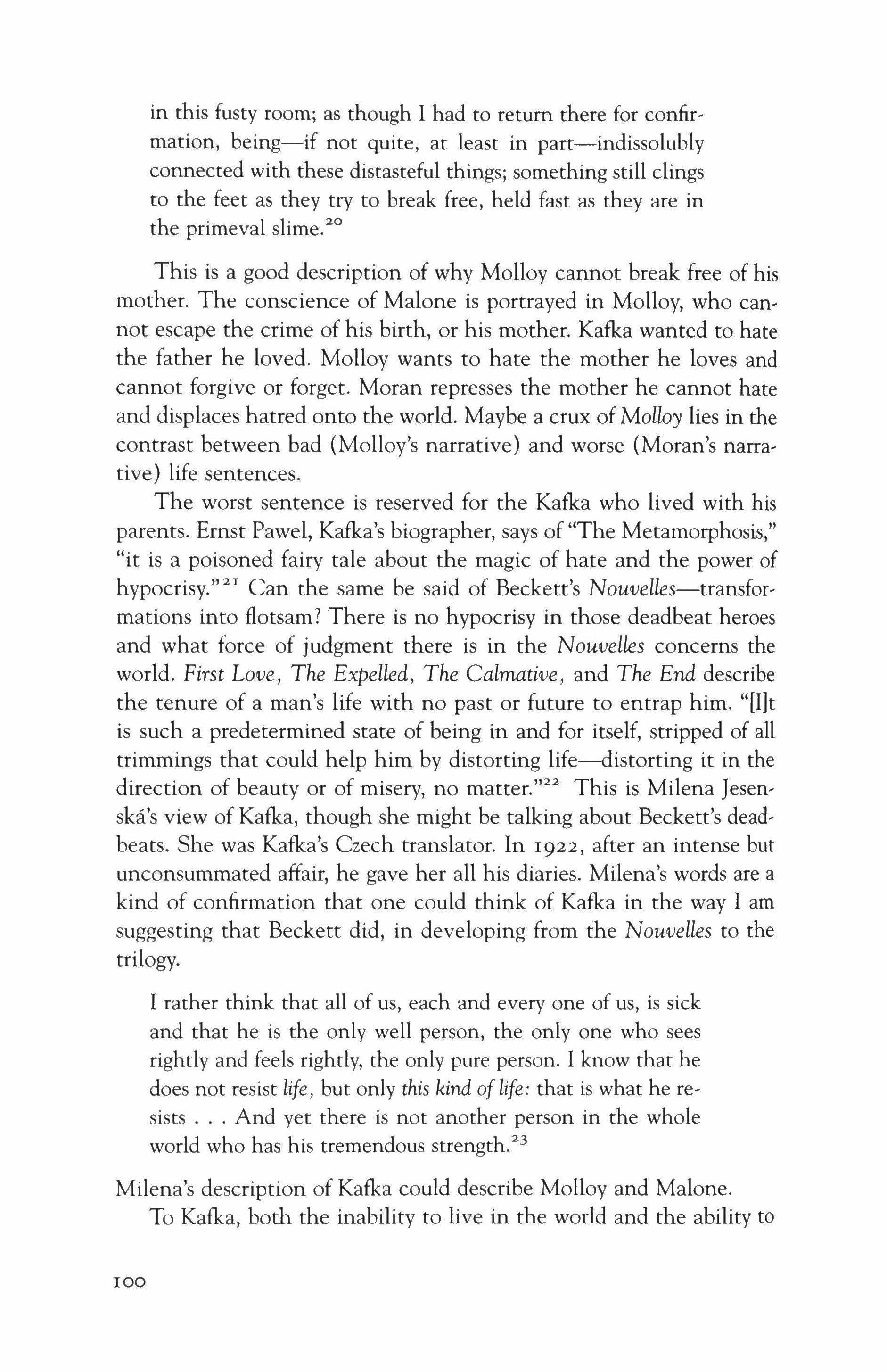
in this fusty room; as though I had to return there for confirmation, being-if not quite, at least in part-indissolubly connected with these distasteful things; something still clings to the feet as they try to break free, held fast as they are in the primeval slime."?
This is a good description of why Molloy cannot break free of his mother. The conscience of Malone is portrayed in Molloy, who cannot escape the crime of his birth, or his mother. Kafka wanted to hate the father he loved. Molloy wants to hate the mother he loves and cannot forgive or forget. Moran represses the mother he cannot hate and displaces hatred onto the world. Maybe a crux of Molloy lies in the contrast between bad (Molloy's narrative) and worse (Moran's narrative) life sentences.
The worst sentence is reserved for the Kafka who lived with his parents. Ernst Pawel, Kafka's biographer, says of "The Metamorphosis," "it is a poisoned fairy tale about the magic of hate and the power of hypocrisy,":" Can the same be said of Beckett's Nouvelles-transformations into flotsam? There is no hypocrisy in those deadbeat heroes and what force of judgment there is in the Nouvelles concerns the world. First Love, The Expelled, The Calmative, and The End describe the tenure of a man's life with no past or future to entrap him. "[I]t is such a predetermined state of being in and for itself, stripped of all trimmings that could help him by distorting life-distorting it in the direction of beauty or of misery, no matter.'?" This is Milena [esenska's view of Kafka, though she might be talking about Beckett's deadbeats. She was Kafka's Czech translator. In 1922, after an intense but unconsummated affair, he gave her all his diaries. Milena's words are a kind of confirmation that one could think of Kafka in the way I am suggesting that Beckett did, in developing from the Nouvelles to the trilogy.
I rather think that all of us, each and every one of us, is sick and that he is the only well person, the only one who sees rightly and feels rightly, the only pure person. I know that he does not resist life, but only this kind oflife: that is what he resists And yet there is not another person in the whole world who has his tremendous strength. 23
Milena's description of Kafka could describe Molloy and Malone. To Kafka, both the inability to live in the world and the ability to
100
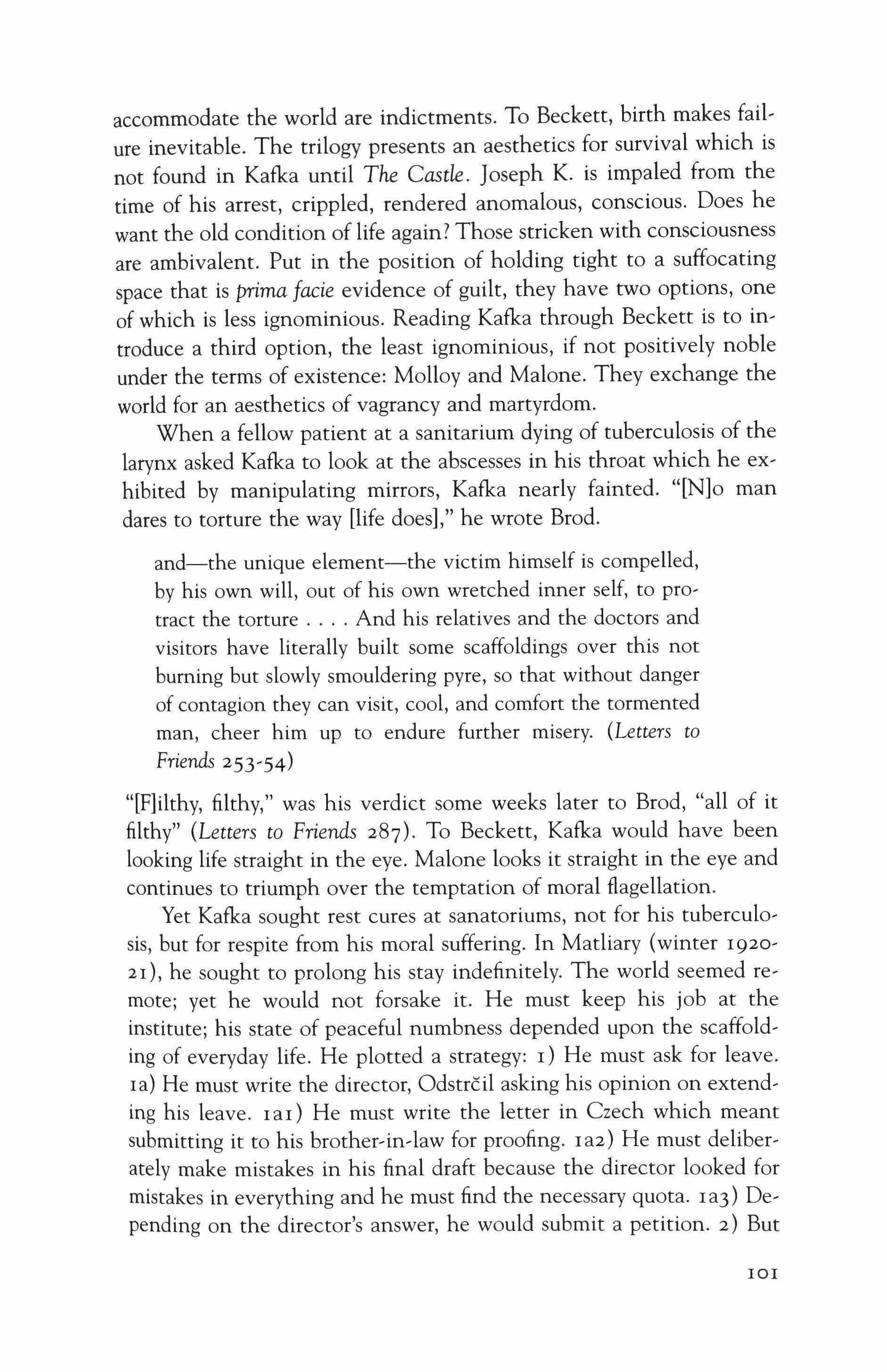
accommodate the world are indictments. To Beckett, birth makes failure inevitable. The trilogy presents an aesthetics for survival which is not found in Kafka until The Castle. Joseph K. is impaled from the time of his arrest, crippled, rendered anomalous, conscious. Does he want the old condition of life again? Those stricken with consciousness are ambivalent. Put in the position of holding tight to a suffocating space that is prima facie evidence of guilt, they have two options, one of which is less ignominious. Reading Kafka through Beckett is to introduce a third option, the least ignominious, if not positively noble under the terms of existence: Molloy and Malone. They exchange the world for an aesthetics of vagrancy and martyrdom.
When a fellow patient at a sanitarium dying of tuberculosis of the larynx asked Kafka to look at the abscesses in his throat which he exhibited by manipulating mirrors, Kafka nearly fainted. "[N]o man dares to torture the way [life does]," he wrote Brod. and-the unique element-the victim himself is compelled, by his own will, out of his own wretched inner self, to protract the torture And his relatives and the doctors and visitors have literally built some scaffoldings over this not burning but slowly smouldering pyre, so that without danger of contagion they can visit, cool, and comfort the tormented man, cheer him up to endure further misery. (Letters to Friends 253-54)
"[F]ilthy, filthy," was his verdict some weeks later to Brad, "all of it filthy" (Letters to Friends 287). To Beckett, Kafka would have been looking life straight in the eye. Malone looks it straight in the eye and continues to triumph over the temptation of moral flagellation.
Yet Kafka sought rest cures at sanatoriums, not for his tuberculosis, but for respite from his moral suffering. In Matliary (winter r 920z r ), he sought to prolong his stay indefinitely. The world seemed remote; yet he would not forsake it. He must keep his job at the institute; his state of peaceful numbness depended upon the scaffolding of everyday life. He plotted a strategy: r ) He must ask for leave. ra) He must write the director, Odstrcil asking his opinion on extending his leave. 1 ar ) He must write the letter in Czech which meant submitting it to his brother-in-law for proofing. Ia2) He must deliberately make mistakes in his final draft because the director looked for mistakes in everything and he must find the necessary quota. raj) Depending on the director's answer, he would submit a petition. 2) But
101
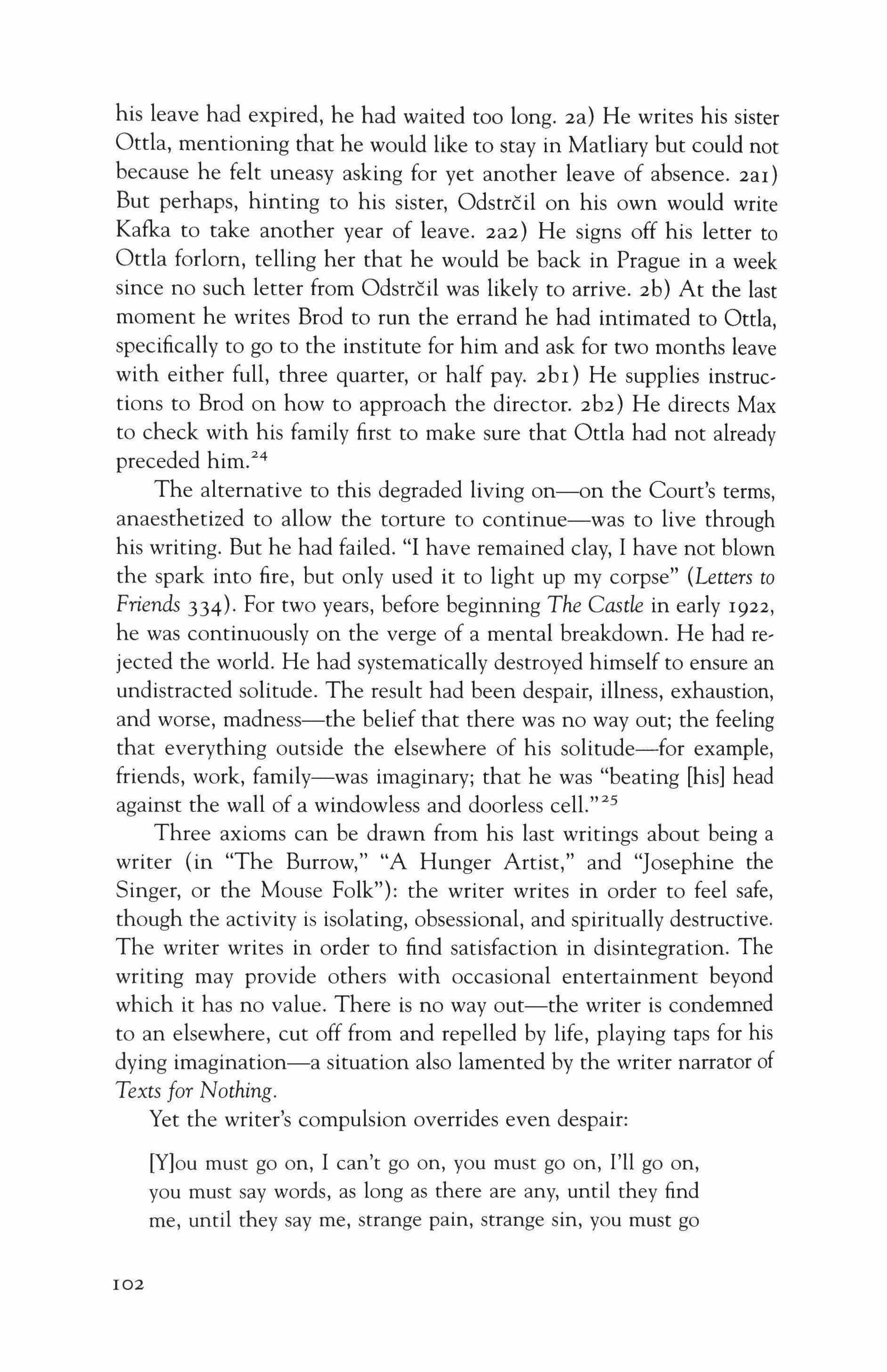
his leave had expired, he had waited too long. za) He writes his sister Ottla, mentioning that he would like to stay in Matliary but could not because he felt uneasy asking for yet another leave of absence. zar ) But perhaps, hinting to his sister, Odstrcil on his own would write Kafka to take another year of leave. 2a2) He signs off his letter to Ottla forlorn, telling her that he would be back in Prague in a week since no such letter from Odstrcil was likely to arrive. zb) At the last moment he writes Brod to run the errand he had intimated to Ottla, specifically to go to the institute for him and ask for two months leave with either full, three quarter, or half pay. zbr ) He supplies instructions to Brod on how to approach the director. 2b2) He directs Max to check with his family first to make sure that Ottla had not already preceded him.?"
The alternative to this degraded living on-on the Court's terms, anaesthetized to allow the torture to continue-was to live through his writing. But he had failed. "I have remained clay, I have not blown the spark into fire, but only used it to light up my corpse" (Letters to Friends 334). For two years, before beginning The Castle in early 1922, he was continuously on the verge of a mental breakdown. He had rejected the world. He had systematically destroyed himself to ensure an undistracted solitude. The result had been despair, illness, exhaustion, and worse, madness-the belief that there was no way out; the feeling that everything outside the elsewhere of his solitude-for example, friends, work, family-was imaginary; that he was "beating [his] head against the wall of a windowless and doorless ce11."25
Three axioms can be drawn from his last writings about being a writer (in "The Burrow," "A Hunger Artist," and "Josephine the Singer, or the Mouse Folk"): the writer writes in order to feel safe, though the activity is isolating, obsessional, and spiritually destructive. The writer writes in order to find satisfaction in disintegration. The writing may provide others with occasional entertainment beyond which it has no value. There is no way out-the writer is condemned to an elsewhere, cut off from and repelled by life, playing taps for his dying imagination-a situation also lamented by the writer narrator of Texts for Nothing.
Yet the writer's compulsion overrides even despair:
[Y]ou must go on, I can't go on, you must go on, I'll go on, you must say words, as long as there are any, until they find me, until they say me, strange pain, strange sin, you must go
102
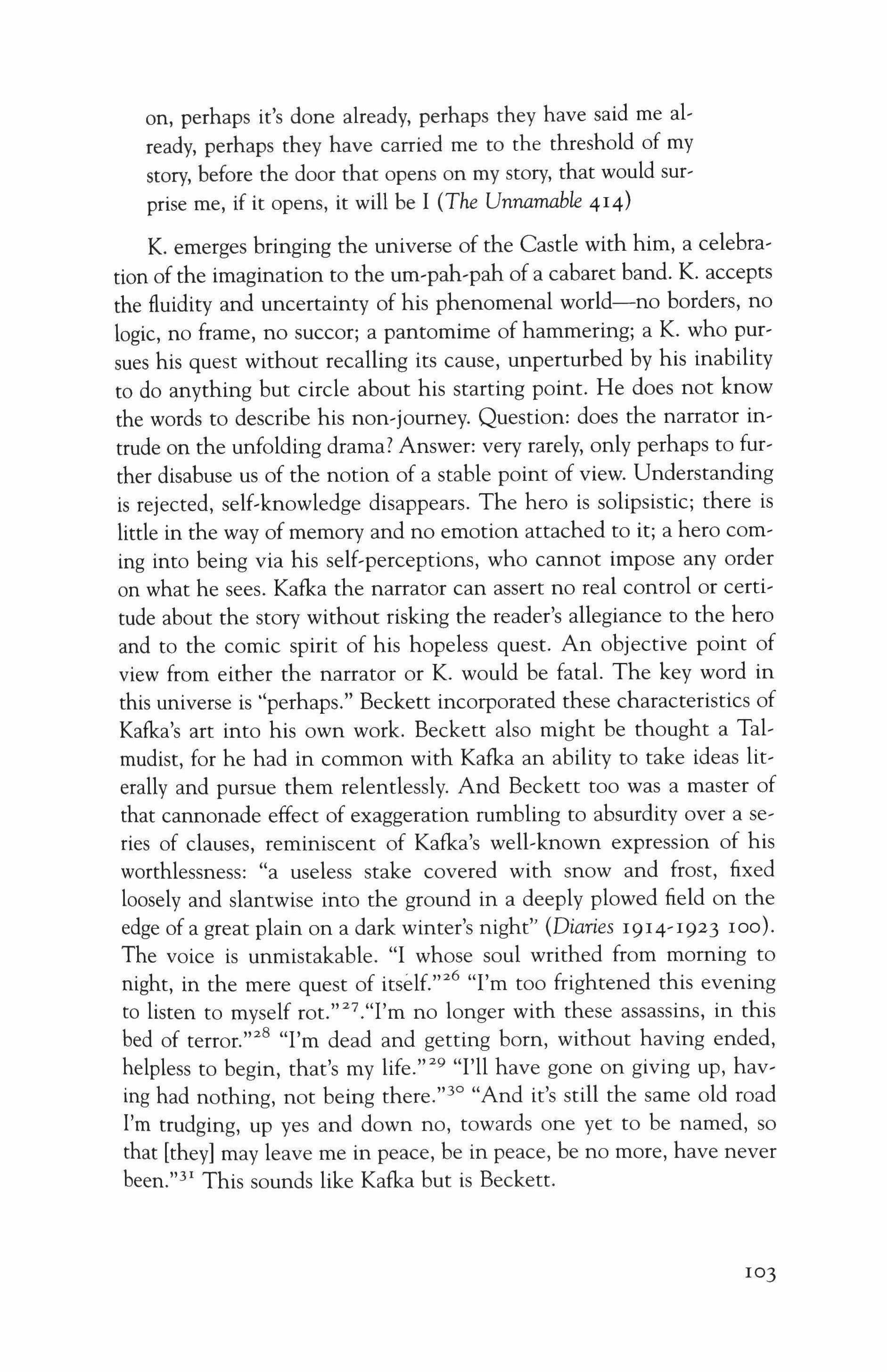
on, perhaps it's done already, perhaps they have said me already, perhaps they have carried me to the threshold of my story, before the door that opens on my story, that would surprise me, if it opens, it will be I (The Unnamable 414)
K. emerges bringing the universe of the Castle with him, a celebration of the imagination to the um-pah-pah of a cabaret band. K. accepts the fluidity and uncertainty of his phenomenal world-no borders, no logic, no frame, no succor; a pantomime of hammering; a K. who pursues his quest without recalling its cause, unperturbed by his inability to do anything but circle about his starting point. He does not know the words to describe his non-journey. Question: does the narrator intrude on the unfolding drama? Answer: very rarely, only perhaps to further disabuse us of the notion of a stable point of view. Understanding is rejected, self-knowledge disappears. The hero is solipsistic; there is little in the way of memory and no emotion attached to it; a hero coming into being via his self-perceptions, who cannot impose any order on what he sees. Kafka the narrator can assert no real control or certitude about the story without risking the reader's allegiance to the hero and to the comic spirit of his hopeless quest. An objective point of view from either the narrator or K. would be fatal. The key word in this universe is "perhaps." Beckett incorporated these characteristics of Kafka's art into his own work. Beckett also might be thought a Talmudist, for he had in common with Kafka an ability to take ideas literally and pursue them relentlessly. And Beckett too was a master of that cannonade effect of exaggeration rumbling to absurdity over a series of clauses, reminiscent of Kafka's well-known expression of his worthlessness: "a useless stake covered with snow and frost, fixed loosely and slantwise into the ground in a deeply plowed field on the edge of a great plain on a dark winter's night" (Diaries 1914-1923 100). The voice is unmistakable. "I whose soul writhed from morning to night, in the mere quest of itself."26 "I'm too frightened this evening to listen to myself rot."27."I'm no longer with these assassins, in this bed of terror.,,28 "I'm dead and getting born, without having ended, helpless to begin, that's my life."29 "I'll have gone on giving up, having had nothing, not being there.T" "And it's still the same old road I'm trudging, up yes and down no, towards one yet to be named, so that [they] may leave me in peace, be in peace, be no more, have never been."31 This sounds like Kafka but is Beckett.
103

Notes
I See Gabriele Schwab, "The Politics of Small Differences: Beckett's The Unnamable in Engagement and Indifference: Beckett and the Political ed. Henry Sussman and Christopher Devenney (Albany NY: State University of New York Press, 2001),4257. Schwab analyzes the novel as a grotesque language game.
2 For example, Ruby Cohn, "Watt in the Light of The Castle," Comparative Literature 13 (1961). Edith Kern argues that because truth is inaccessible in Watt and The Castle, an omniscient narrator is impossible. Hence, the first person consciousness that guides us through the text on a search for truth becomes a stand-in for the author, creating what she calls an "author-hero" in texts which are themselves expressions of the artistic mission (110). Edith Kern, "Reflections on the Castle and Mr. Knott's House: Kafka and Beckett," Proceedings of the Comparative Literature Symposium: Franz Kafka: His Place in World Literature, 28-29 January 1971, ed. Wolodymyr T. Zyla (Lubbock: The Texas Tech Press, 197 I ). Charles Bernheimer has argued that in Watt and The Castle the need of K. and Watt to "read" themselves or their own desires is undermined by the writerly impulse toward displacement and fragmentation; he says that "Beckett inherited from Kafka the literary structure of the aporetic quest, the quest for readerly knowledge that becomes inextricably implicated in the process of writerly displacement" (23). Charles Bernheimer, "Watt's in The Castle: The Aporetic Quest in Kafka and Beckett," Newsletter of the Kafka Society of America 6.1-2 (1982): 19-24.
3 Cohn, 158.
4 Franz Kafka, The Great Wall of China: Stories and Reflections (1936; reprint, New York: Schocken, 1946),267. Subsequent references will be to this text.
S Samuel Beckett, Watt (New York: Grove, 1959), 76. Subsequent references will be to this text.
6 Cohn, ISS.
7 Cohn, 158.
8 Hans H. Hiebel, "Beckett's Television Plays and Kafka's Late Stories," Samuel Beckett Today/Aujourd'hui: An Annual Bilingual Review 6, ed. Marius Buning, Matthijs Engelberts, and Sjef Houppermans (Atlanta: Rodopi, 1997),325.
9 For example, George H. Szanto has argued that these authors (along with RobbeGriller} show "that the writer's province is no longer the impossible environment, but is instead the only knowledge anyone man can have, the knowledge he attains through his perceptions" (7-8). Hence, these authors use an immediate and sustained point of view, which reflects their "[concern] with process rather than with established fact" (9); the reader himself, "without the intercession of critical insight" (13) essentially '''becomes' the protagonist," forced to "engage in the analytic process" (12). George H. Szanto, Narrative Consciousness: Structure and Perception in the Fiction of Kafka, Beckett, and Robbe-Grillet (Austin: University of Texas Press, 1972).
According to Daniel Albright, Beckett and Kafka are both sustained and frustrated by the power of the imagination. For, while they are among the most imaginative writers, in their fiction imagination constantly conjures up false images which distract from the search for the truth. By constantly dispelling these false images, Albright argues, Beckett and Kafka effectively hint at a truth: "If the thud, the shock
104

of palpable reality cannot be manufactured, it can be alluded to, witnessed by its absence" (10). Daniel Albright, Representation and the Imagination: Beckett, Kafka, Nabokov, and Schoenberg (Chicago: University of Chicago Press, 1981).
[ina Politi has argued that in Kafka's short story "The Judgment," as in Peter's denial of Christ in the Bible, the subject must recognize the inability of self-definition, must invariably recognize himself as object; in Beckett's Not I, however, Mouth persistently defies this trend, demanding the right to author her own fictions, hence "the power of a discourse which is stronger than consciousness is here utterly frustrated" (353). [ina Politi, "Not (Not 1)," Journal of Literature & Theology 6.4 (December 1992): 345-55·
Geoff Wade's Marxist reading has argued that "[rjedemprion' is held out" even in the seeming pessimism and gloom in the works of Beckett and Kafka, since "to ensure the ultimate coming to pass of that redemption we must ceaselessly spell out just what we are being redeemed from (or averting, as the case may be)" (128). Geoff Wade, "Marxism and modernist aesthetics: reading Kafka and Beckett," The politics ofpleasure: Aesthetics and cultural theory, ed. Stephen Regan (Philadelphia: Open University Press, 1992): 109-32.
E. V. Caliri has compared the use of silences, or gaps, in Kafka and Beckett, suggesting that in Kafka, the gaps "appear to recall---on a stylistic plane-an a prioric silence: silence as an incomprehensible universe's answer to the queries of human conscience" (260). In Beckett's work, Calm says, silence always bubbles to the surface, as the characters-who simultaneously dread and desire the impending final silencebabble through the texts, attempting to delay that end: "[t]he steadily restored end gives rise, in Beckett's novels, to the discourse that records the extinction, the discourse that, while striving for final silence, has to record the death of discourse" (261).
E. V. Caliri, "From Ellipsis into Silence in Contemporary Literature," Expression, Communication and Experience in Literature and Language: Proceedings of the XII Congress of the International Federation for Modem Languages and Literatures, August 20-26, 1972, ed. Ronald G. Popperwell (Leeds: The Modern Humanities Research Association, 1973): 259-62.
10 Kafka, Great WaU, 267-68.
II Franz Kafka, The Castle (1926; reprint, New York: Schocken, 1974),335-36. Subsequent references will be to this text.
12 Samuel Beckett, The Unnamable, in Three Novels by Samuel Beckett: Molloy, Malone Dies, The Unnamable (1955; reprint, New York: Grove, 1958),338. Subsequent references will be to this text.
13 Israel Shenker, "Moody Man of Letters: A Portrait of Samuel Beckett, Author of the Puzzling 'Waiting for Godot,'" The New York Times (6 May 1956), 2:2.
14 Franz Kafka, The Diaries of Franz Kafka 1910-1913, ed. Max Brod, trans. Joseph Kresh (1948; reprint, New York, Schocken, 1968),317. Subsequent references will be to this text.
15 Franz Kafka, The Trial, trans. Willa and Edwin Muir (1937; reprint, New York: Random House, 1956), 167. Subsequent references will be to this text.
16 See Thomas Mann, "Homage" in Franz Kafka, The Castle, ix-xvii, I? Franz Kafka, Letters to Friends, Family, and Editors, trans. Richard Winston and
105
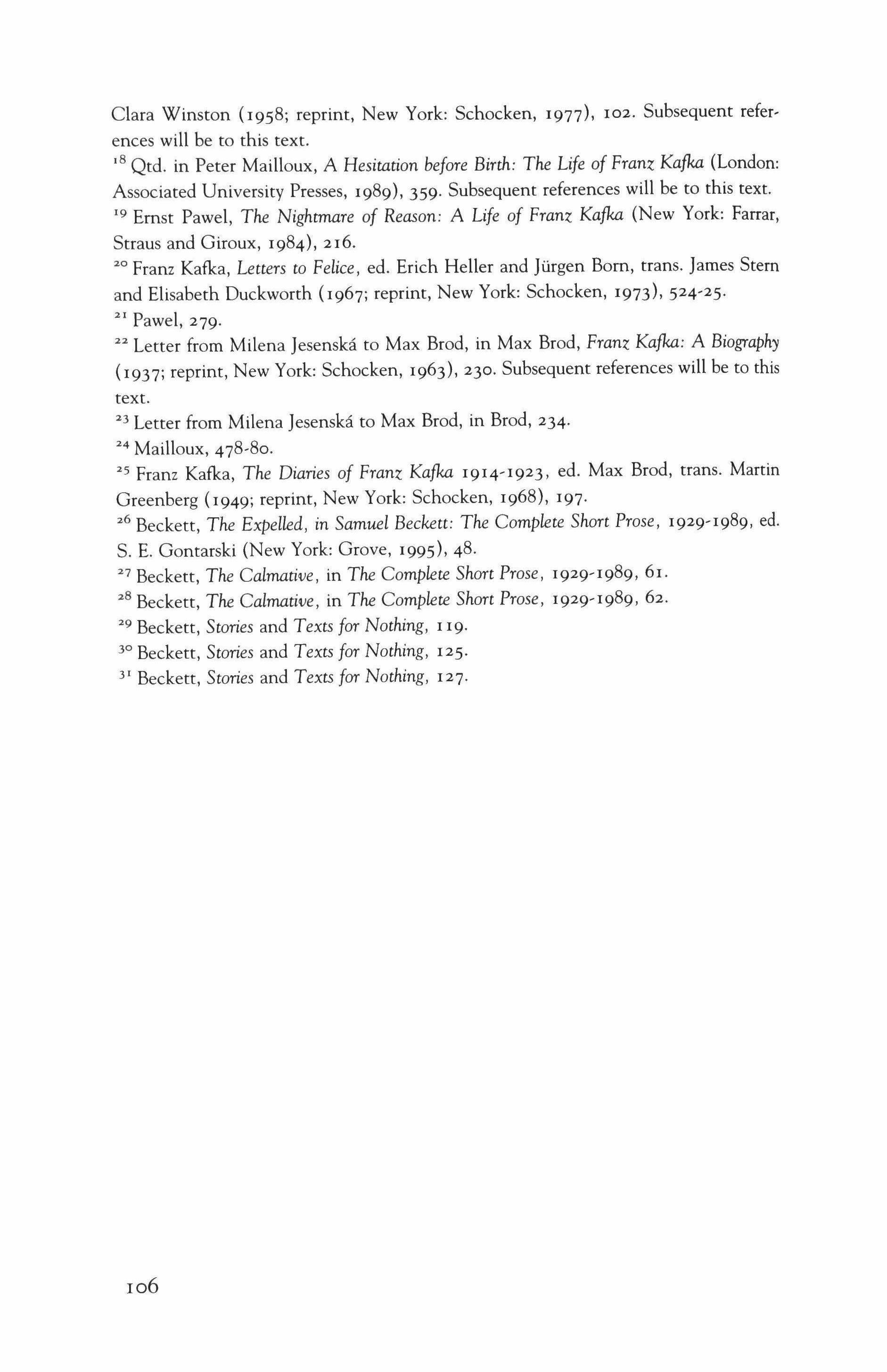
Clara Winston (1958; reprint, New York: Schocken, 1977), 102. Subsequent references will be to this text.
18 Qtd. in Peter Mailloux, A Hesitation before Birth: The Life of Franz Kafka (London: Associated University Presses, 1989),359. Subsequent references will be to this text.
19 Ernst Pawel, The Nightmare of Reason: A Life of Franz Kafka (New York: Farrar, Straus and Giroux, 1984), 216.
20 Franz Kafka, Letters to Felice, ed. Erich Heller and [urgen Born, trans. James Stem and Elisabeth Duckworth (1967; reprint, New York: Schocken, 1973),524-25.
21 Pawel, 279.
22 Letter from Milena [esenska to Max Brod, in Max Brod, Franz Kafka: A Biography (1937; reprint, New York: Schocken, 1963),230. Subsequent references will be to this text.
23 Letter from Milena [esenska to Max Brod, in Brod, 234-
24 Mailloux, 478-80.
2S Franz Kafka, The Diaries of Franz Kafka 1914-1923, ed. Max Brod, trans. Martin Greenberg (1949; reprint, New York: Schocken, 1968), 197·
26 Beckett, The Expelled, in Samuel Beckett: The Complete Short Prose, 1929-1989, ed. S. E. Gontarski (New York: Grove, 1995),48.
27 Beckett, The Calmative, in The Complete Short Prose, 1929-1989, 61.
28 Beckett, The Calmative, in The Complete Short Prose, 1929-1989, 62.
29 Beckett, Stories and Texts for Nothing, 119.
30 Beckett, Stories and Texts for Nothing, 125.
31 Beckett, Stories and Texts for Nothing, 127.
106
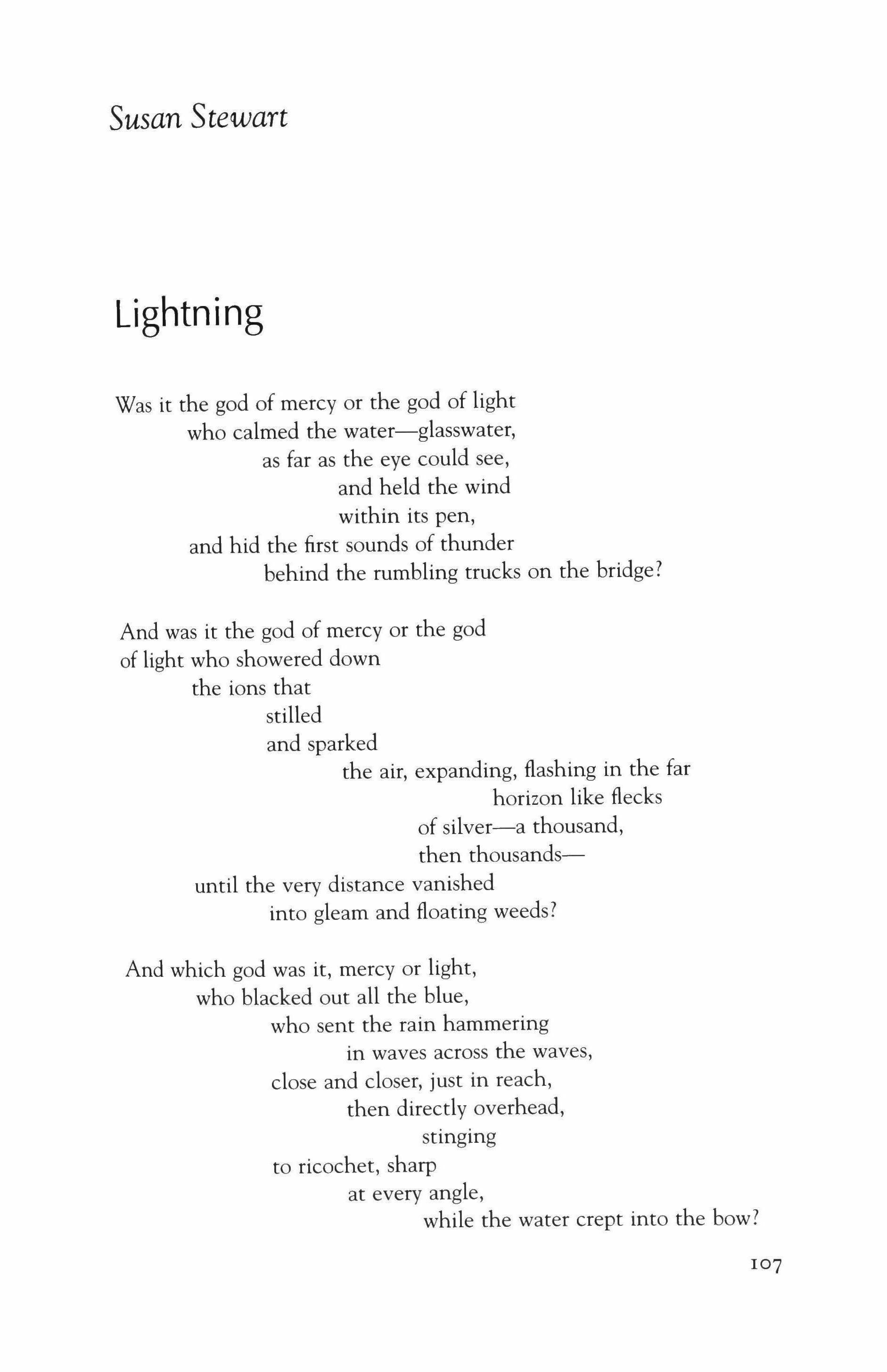
Susan Stewart Lightning
Was it the god of mercy or the god of light who calmed the water-glasswater, as far as the eye could see, and held the wind within its pen, and hid the first sounds of thunder behind the rumbling trucks on the bridge?
And was it the god of mercy or the god of light who showered down the ions that stilled and sparked the air, expanding, flashing in the far horizon like flecks of silver-a thousand, then thousandsuntil the very distance vanished into gleam and floating weeds?
And which god was it, mercy or light, who blacked out all the blue, who sent the rain hammering in waves across the waves, close and closer, just in reach, then directly overhead, stinging to ricochet, sharp at every angle, while the water crept into the bow?
107
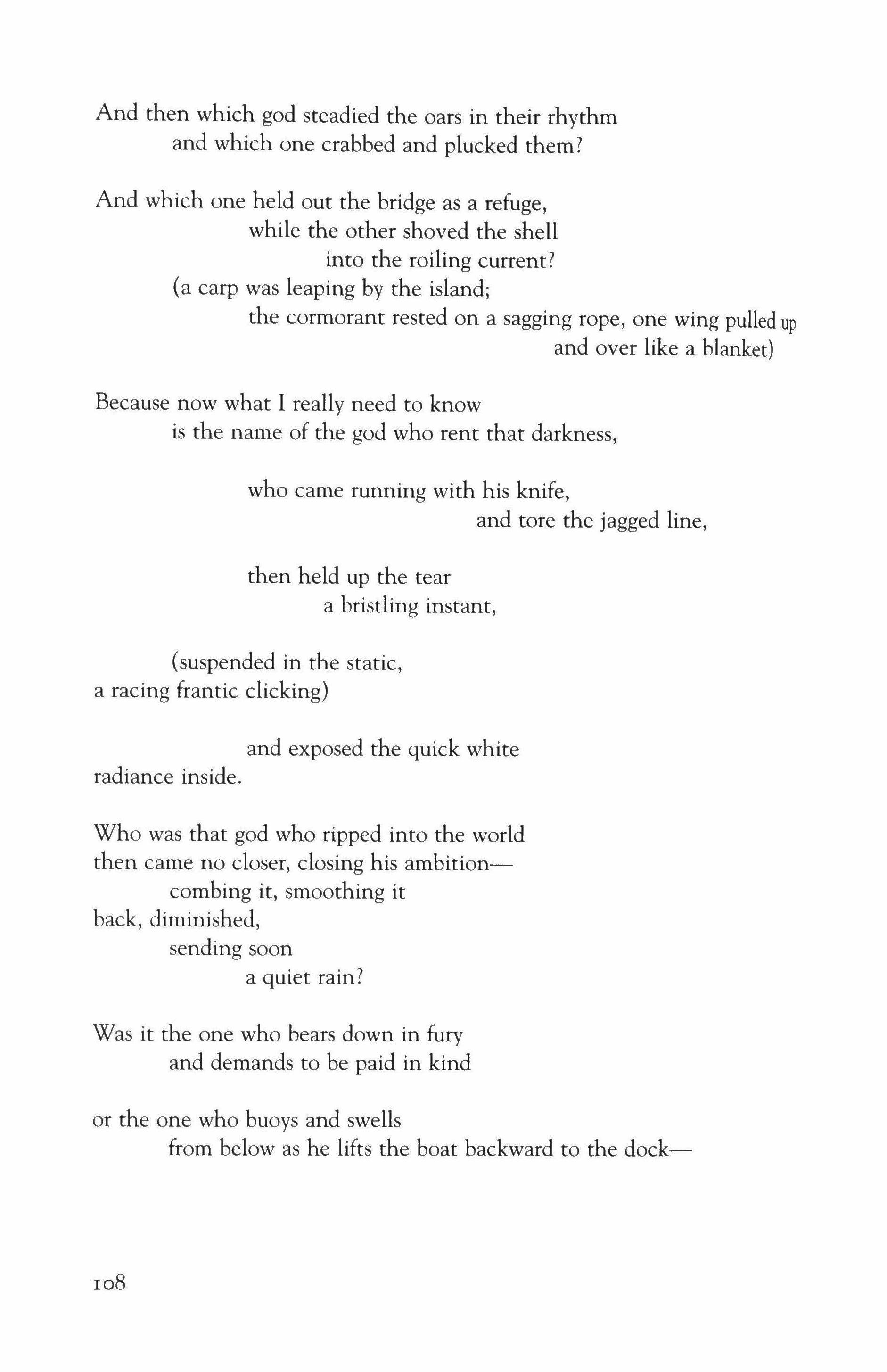
And then which god steadied the oars in their rhythm and which one crabbed and plucked them?
And which one held out the bridge as a refuge, while the other shoved the shell into the roiling current?
(a carp was leaping by the island; the cormorant rested on a sagging rope, one wing pulled up and over like a blanket)
Because now what I really need to know is the name of the god who rent that darkness, who came running with his knife, and tore the jagged line, then held up the tear a bristling instant,
(suspended in the static, a racing frantic clicking) and exposed the quick white radiance inside.
Who was that god who ripped into the world then came no closer, closing his ambitioncombing it, smoothing it back, diminished, sending soon a quiet rain?
Was it the one who bears down in fury and demands to be paid in kind or the one who buoys and swells from below as he lifts the boat backward to the dock-
108

the god of mercy, moored to the earth, or the god of light, married to pain?
This is what I need to know and it won't be a god who will tell me.
What You Said about the Moon

All the little lies follow the big lie while the big lie is pared away.
Fading face, old friend of my left hand waning, of my right hand waxing: gibbous mirror womb for womb.
Throbbing pulse and dangling watch, globing, shrinking, hinged where night unhinges night.
Cause of eloquence ending in derangement.
There could be such a thing as too much feeling.
I had meant to harvest, not to hunt.
Tum your money over, blow ashes, whisper "I saw you before you saw me."
110
These Trees in Particular

I frequently tramped eight or ten miles through the deepest snow to keep an appointment with a beech-tree, or a yellow birch, or an old acquaintance among the pines.
-Thoreau, Walden, Winter Visitors
How the pines shake! Pines are the hardest sort of tree to live when shifted to any other soil, and here there's none but the crew's cursed clay.
-Melville, Moby-Dick
Three pine masts lodged in the clay of the pining sailors. You can't move the trees and expect them to grow.
Born with the elm, you will die with it.
A beech axle splintered by fury. Ash for the bat and birch for the arrow. An olive in the teeth stops the teeth.
Acorns pour down after the drought, up all night from the rat-a-tat-a-tat. You get a straight story from an oak and afterwards, disarming silence. Black yew, black cypress, widow's weeds will follow.
Poplar and willow, weak by the water. Swamp maple, weak at heart.
In the shade of the plane tree, they'll listen to stones all day, provided they tell the truth.
I II

If the trees are unfamiliar, you're the stranger.
The chestnut will never come back.
Keep your myrrh in a holly cupboard, the laurel wreath on a hook by your door, make the door from the planks of the broken table, and the table from the planks of the broken floor-
Dress the fir's amber wound with the tarbrush.
Hang suet and seeds for the waxwing.
When you recognize the trees, you must be home.
112
Zero

Mark a circle and start digging here. Don't think you are clearing a space for a foundation, just dig like a mole, stitching in and out. Tell them your hope goes down slanting, that everything inevitable runs toward the horizontal.
Dig wherever your shadow falls, a green patch backlit by a blazing planet-wherever your shadow falls, dig in the shape of your shadow falling.
II3
Debora Greger
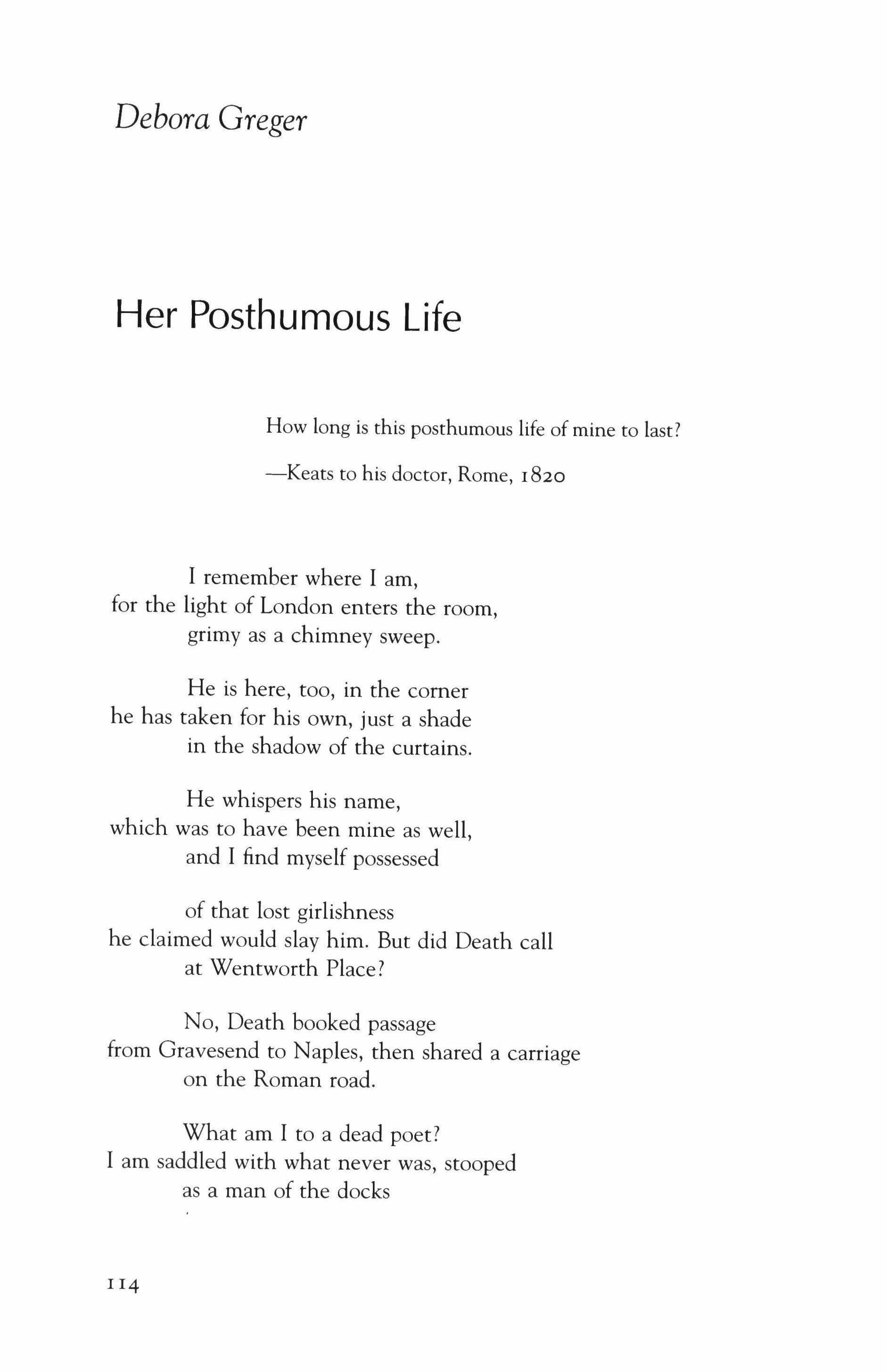
Her Posthumous Life
How long is this posthumous life of mine to last?
-Keats to his doctor, Rome, 1820
I remember where I am, for the light of London enters the room, grimy as a chimney sweep.
He is here, too, in the comer he has taken for his own, just a shade in the shadow of the curtains.
He whispers his name, which was to have been mine as well, and I find myself possessed of that lost girlishness he claimed would slay him. But did Death call at Wentworth Place?
No, Death booked passage from Gravesend to Naples, then shared a carriage on the Roman road.
What am I to a dead poet? I am saddled with what never was, stooped as a man of the docks
114
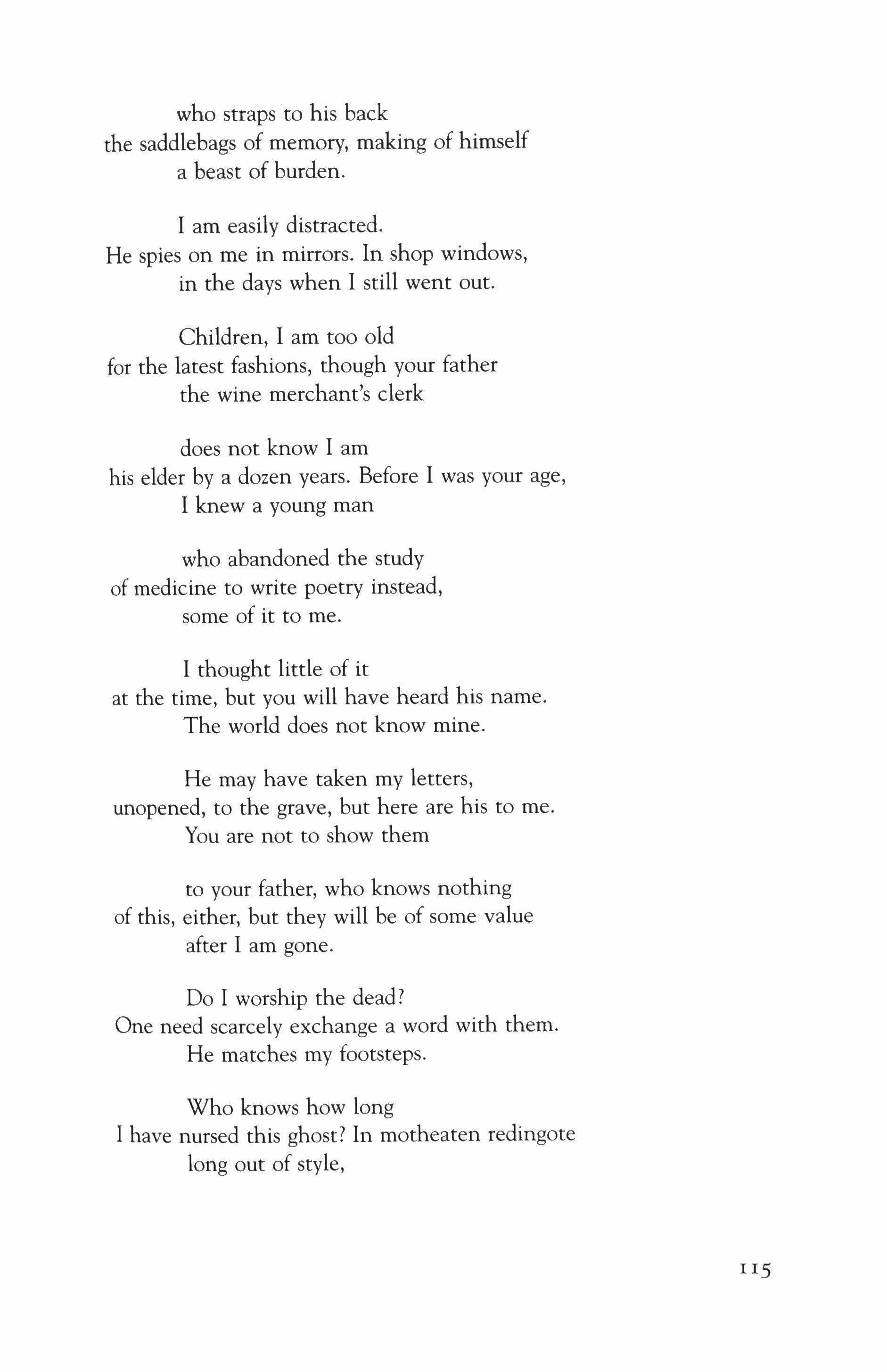
who straps to his back the saddlebags of memory, making of himself a beast of burden.
I am easily distracted. He spies on me in mirrors. In shop windows, in the days when I still went out.
Children, I am too old for the latest fashions, though your father the wine merchant's clerk
does not know I am his elder by a dozen years. Before I was your age, I knew a young man who abandoned the study of medicine to write poetry instead, some of it to me.
I thought little of it at the time, but you will have heard his name. The world does not know mine.
He may have taken my letters, unopened, to the grave, but here are his to me. You are not to show them
to your father, who knows nothing of this, either, but they will be of some value after I am gone.
Do I worship the dead? One need scarcely exchange a word with them. He matches my footsteps.
Who knows how long I have nursed this ghost? In motheaten redingote long out of style,
lIS

he dictates to me his latest, an ode. I do not like it, though I do not appear.
To Darkness, it begins, and then goes on. Goes on into darkness knowing the weight of earth.
II6
Swans in the Basement
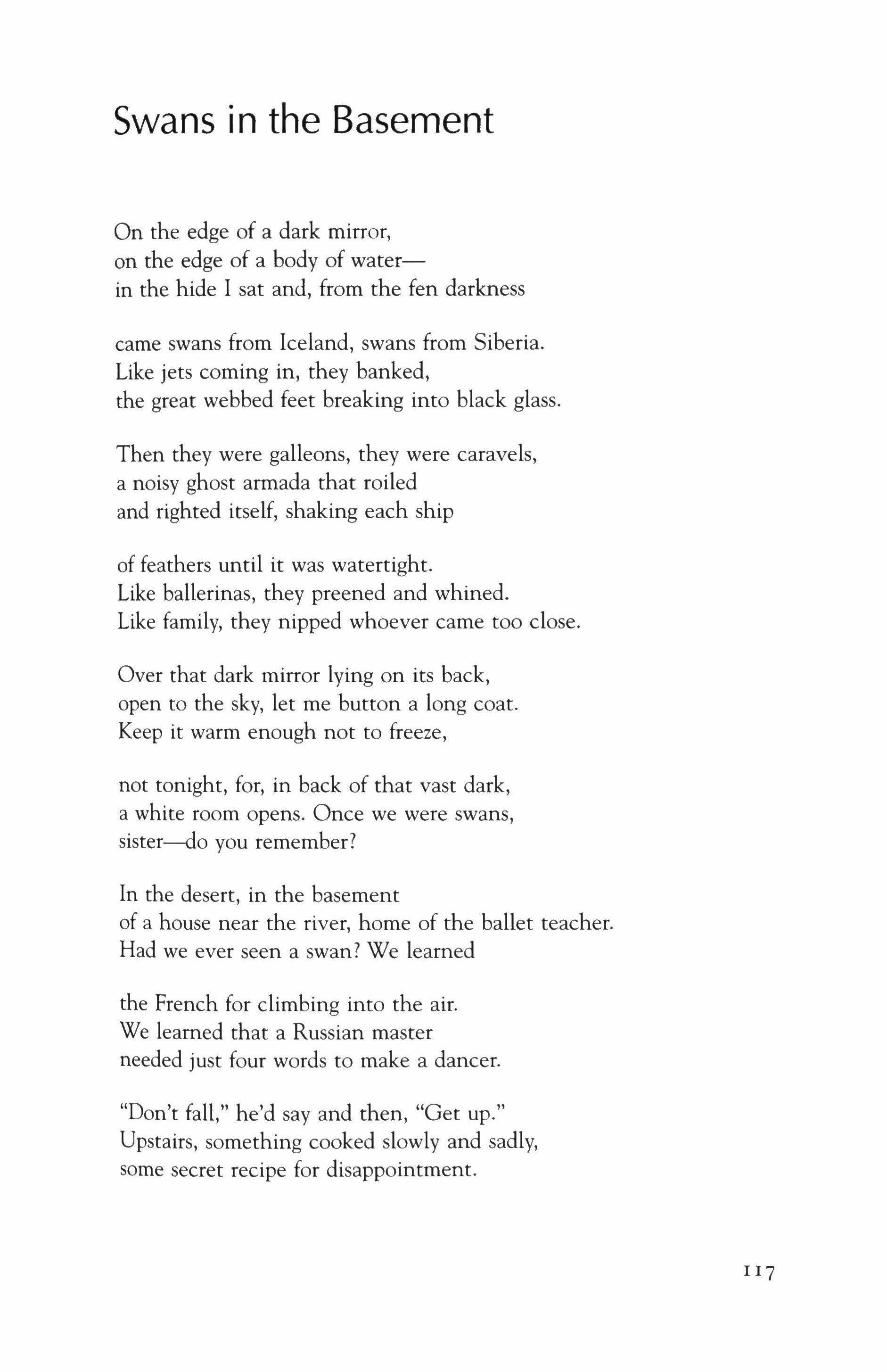
On the edge of a dark mirror, on the edge of a body of waterin the hide I sat and, from the fen darkness came swans from Iceland, swans from Siberia. Like jets coming in, they banked, the great webbed feet breaking into black glass.
Then they were galleons, they were caravels, a noisy ghost armada that roiled and righted itself, shaking each ship of feathers until it was watertight. Like ballerinas, they preened and whined. Like family, they nipped whoever came too close.
Over that dark mirror lying on its back, open to the sky, let me button a long coat. Keep it warm enough not to freeze,
not tonight, for, in back of that vast dark, a white room opens. Once we were swans, sister--do you remember?
In the desert, in the basement of a house near the river, home of the ballet teacher. Had we ever seen a swan? We learned the French for climbing into the air. We learned that a Russian master needed just four words to make a dancer.
"Don't fall," he'd say and then, "Get up." Upstairs, something cooked slowly and sadly, some secret recipe for disappointment.

Mrs. W. lavished no more words on us. Mr. W. was home from another day at the reactor. I blinked. The sky yawned, emptier than ever.
The river waved its vacant blue as if we were missing from it. I shook my head, letting down my hair, a girl on the edge of a mirror, the edge of a body of water too small for a swan to take flight from, though I didn't know that yet.
IIS
Letter from the East, 1 71 7

I am now got into a new world, where everything appears changed; and I write you with some content at last, hoping you will claim no more that I tell you nothing extraordinary. With my tedious journey, I will not trouble you; but by midmorning already the baths were full of women. The portress stood at the door. Ladies of quality give her some small coin and I did not forget that ceremony. I was in riding dress, my traveling habit, the likes of which they'd never seen. Yet not one failed to receive me civilly. I know of no European court whose ladies would have behaved thus to a stranger, without the frigid smiles and heated whispers which never fail to follow one not dressed in the fashion.
The women sat, their slaves arranged behind them, but with no distinction in rank by dress for all were in the state of nature, that is, stark naked. Yet there was not a wanton look. They moved with the grace Milton assigned to our general mother, among them a goddess by the pencil of Guido or Titian. I was convinced, were it the fashion to go naked, the face would hardly be observed.
119
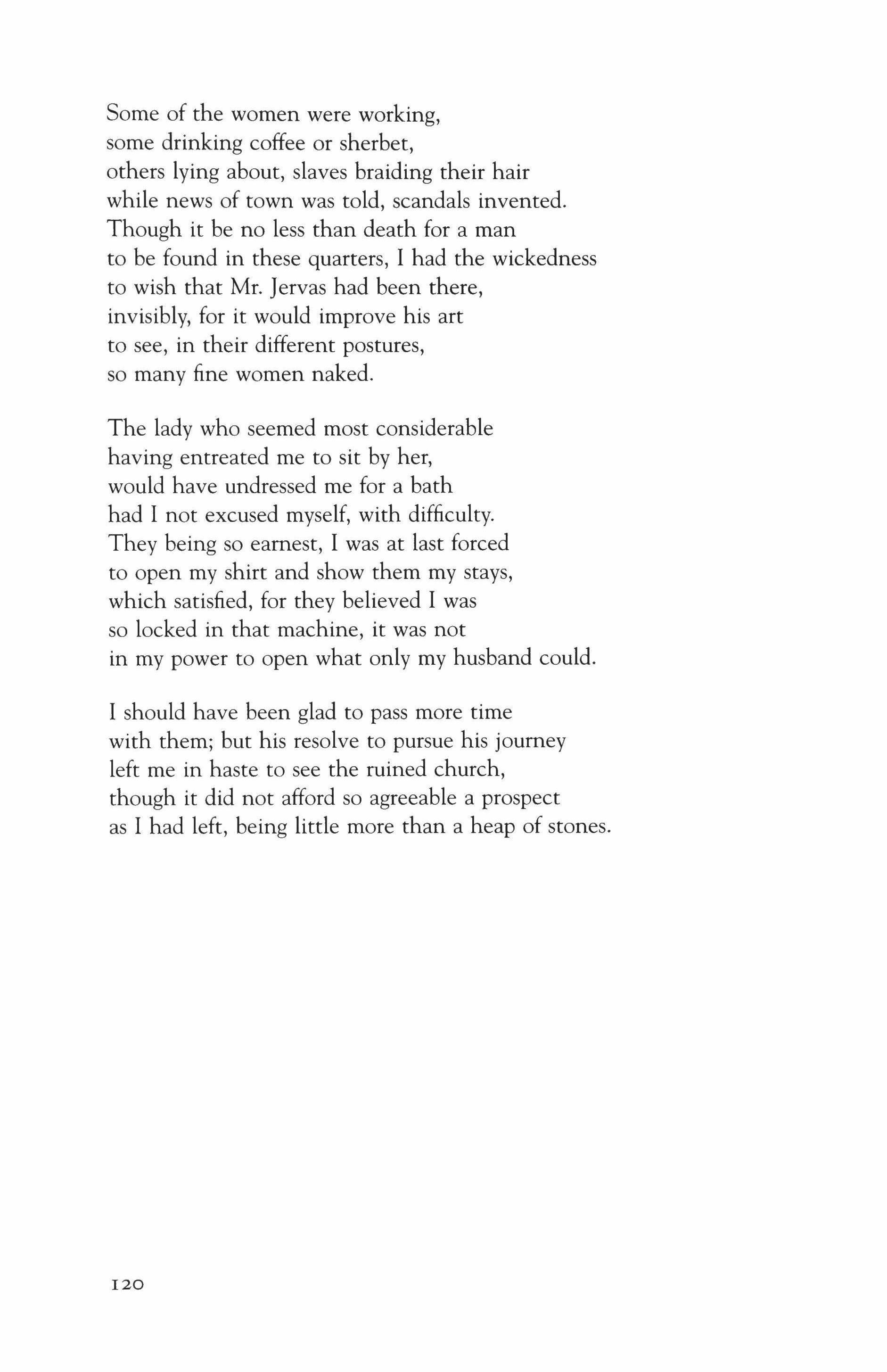
Some of the women were working, some drinking coffee or sherbet, others lying about, slaves braiding their hair while news of town was told, scandals invented. Though it be no less than death for a man to be found in these quarters, I had the wickedness to wish that Mr. Jervas had been there, invisibly, for it would improve his art to see, in their different postures, so many fine women naked.
The lady who seemed most considerable having entreated me to sit by her, would have undressed me for a bath had I not excused myself, with difficulty. They being so earnest, I was at last forced to open my shirt and show them my stays, which satisfied, for they believed I was so locked in that machine, it was not in my power to open what only my husband could.
I should have been glad to pass more time with them; but his resolve to pursue his journey left me in haste to see the ruined church, though it did not afford so agreeable a prospect as I had left, being little more than a heap of stones.
120
]ohn Balaban
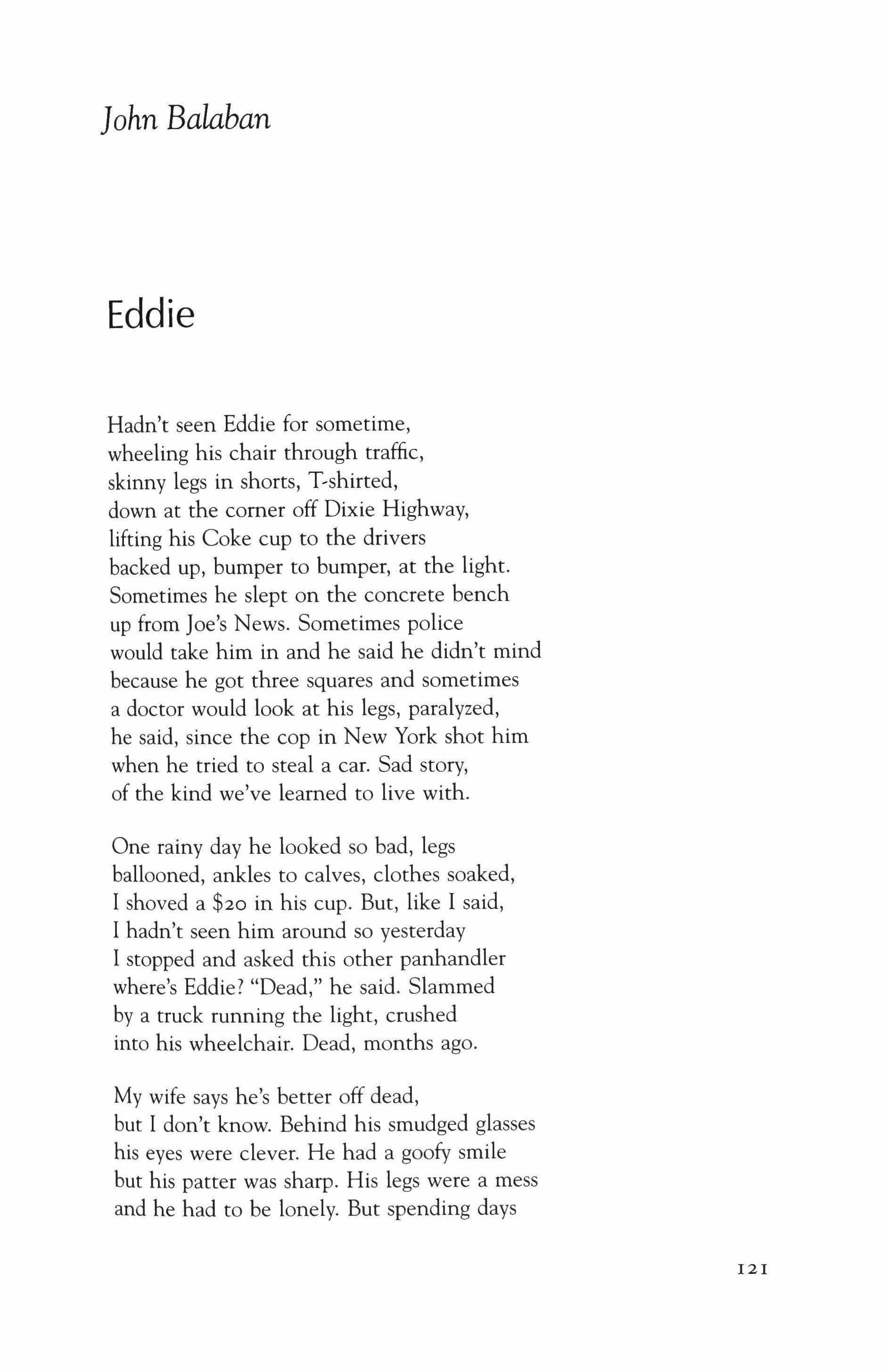
Eddie
Hadn't seen Eddie for sometime, wheeling his chair through traffic, skinny legs in shorts, 'Tshirted, down at the comer off Dixie Highway, lifting his Coke cup to the drivers backed up, bumper to bumper, at the light. Sometimes he slept on the concrete bench up from Joe's News. Sometimes police would take him in and he said he didn't mind because he got three squares and sometimes a doctor would look at his legs, paralyzed, he said, since the cop in New York shot him when he tried to steal a car. Sad story, of the kind we've learned to live with.
One rainy day he looked so bad, legs ballooned, ankles to calves, clothes soaked, I shoved a $20 in his cup. But, like I said, I hadn't seen him around so yesterday I stopped and asked this other panhandler where's Eddie? "Dead," he said. Slammed by a truck running the light, crushed into his wheelchair. Dead, months ago.
My wife says he's better off dead, but I don't know. Behind his smudged glasses his eyes were clever. He had a goofy smile but his patter was sharp. His legs were a mess and he had to be lonely. But spending days
121
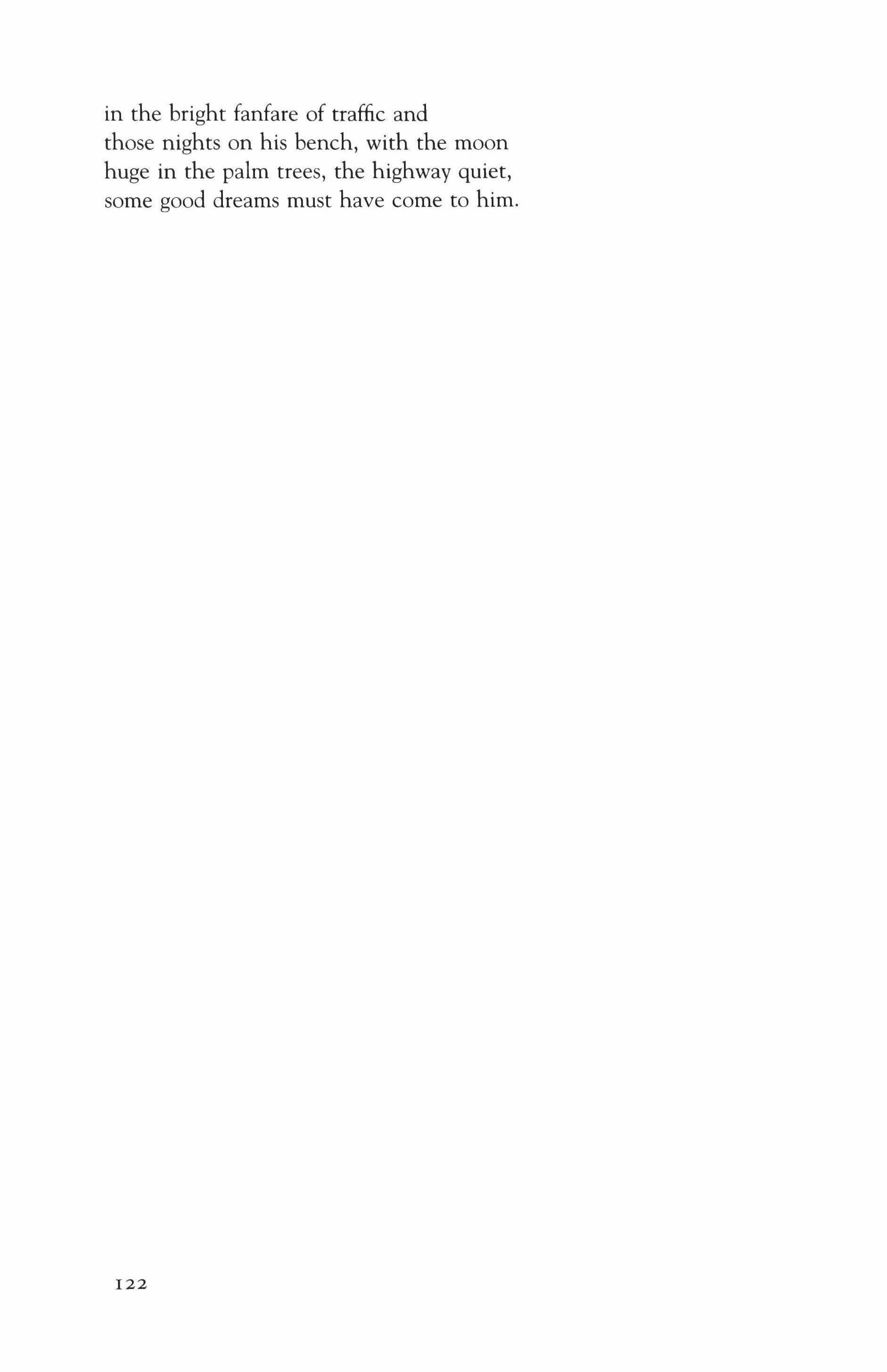
in the bright fanfare of traffic and those nights on his bench, with the moon huge in the palm trees, the highway quiet, some good dreams must have come to him.
122
Leaving

All her hopes were in the house she was walking out of shutting the screen door as the kitchen flared in smoke of shouts and kisses, laughter, cooking, cleaning, and, then, just the old, exhausting quarrels, the wrangling, the accusations while, inside, the addled man sat on a stool, dying for a drink, flames on his glasses, plucking his amplified guitar as the windows flashed conflagrations of lost wishes. Out by the curb in the backseat packed with clothes and books the goofy Setter looked bewildered; her sad Lab hung his chin out the window.
Behind their curtains neighbors watched having said the proper things; the little girl she sometimes minded was still crying as her mother encouraged her to wave goodbye.
123

All along the shady street maple seeds let loose and spun to the ground. All her hopes had been in that house that she was driving away from, maple seeds fluttering down guitar fading, the road to Somewhere opening ahead.
124
Laurence Lieberman
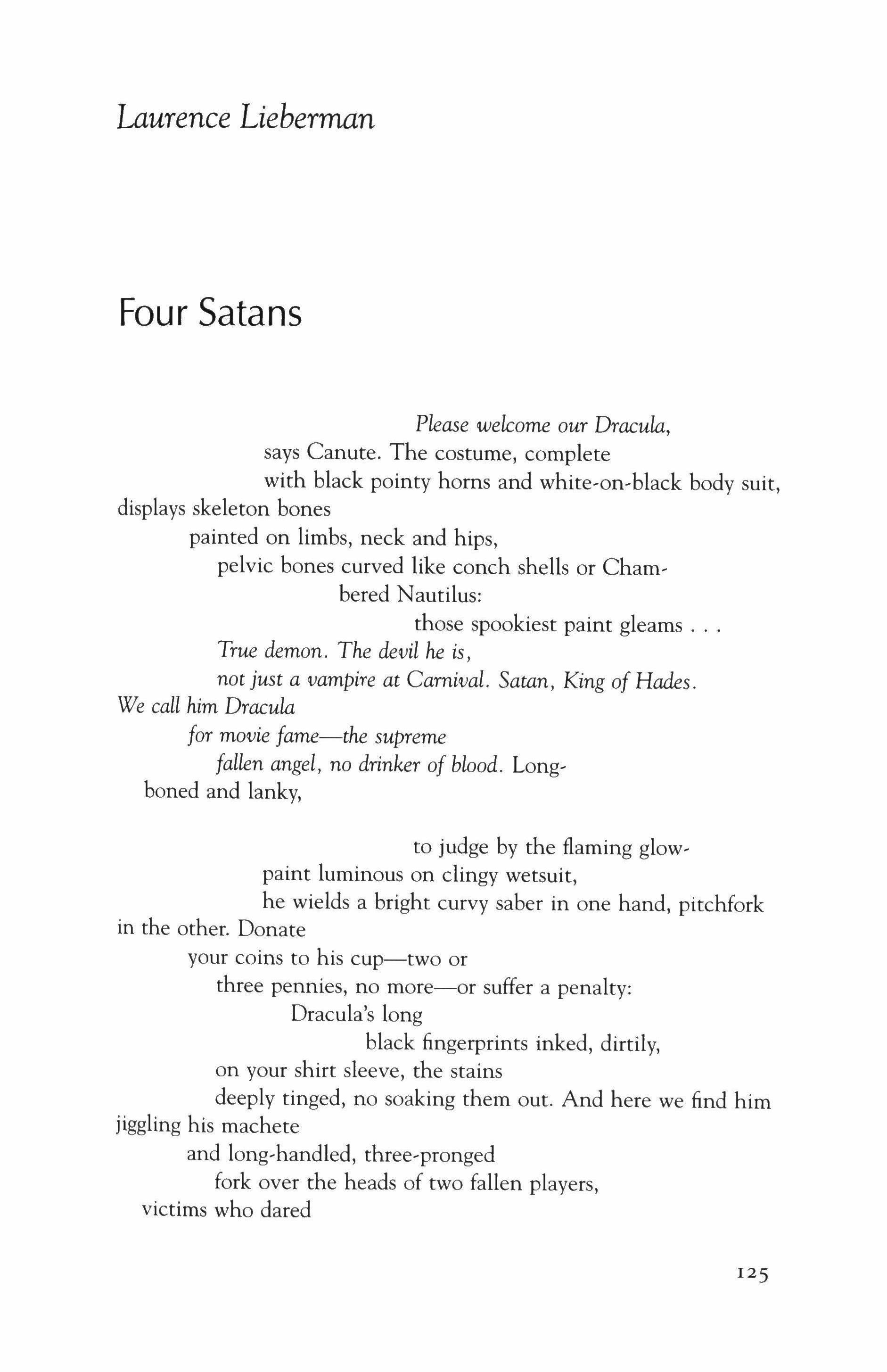
Four
Satans
Please welcome our Dracula, says Canute. The costume, complete with black pointy horns and white-on-black body suit, displays skeleton bones painted on limbs, neck and hips, pelvic bones curved like conch shells or Chambered Nautilus: those spookiest paint gleams True demon. The devil he is, not just a vampire at Carnival. Satan, King of Hades. We call him Dracula for movie fame-the supreme fallen angel, no drinker of blood. Longboned and lanky,
to judge by the flaming glowpaint luminous on clingy wetsuit, he wields a bright curvy saber in one hand, pitchfork in the other. Donate your coins to his cup-two or three pennies, no more-or suffer a penalty: Dracula's long black fingerprints inked, dirtily, on your shirt sleeve, the stains deeply tinged, no soaking them out. And here we find him jiggling his machete and long-handled, three-pronged fork over the heads of two fallen players, victims who dared
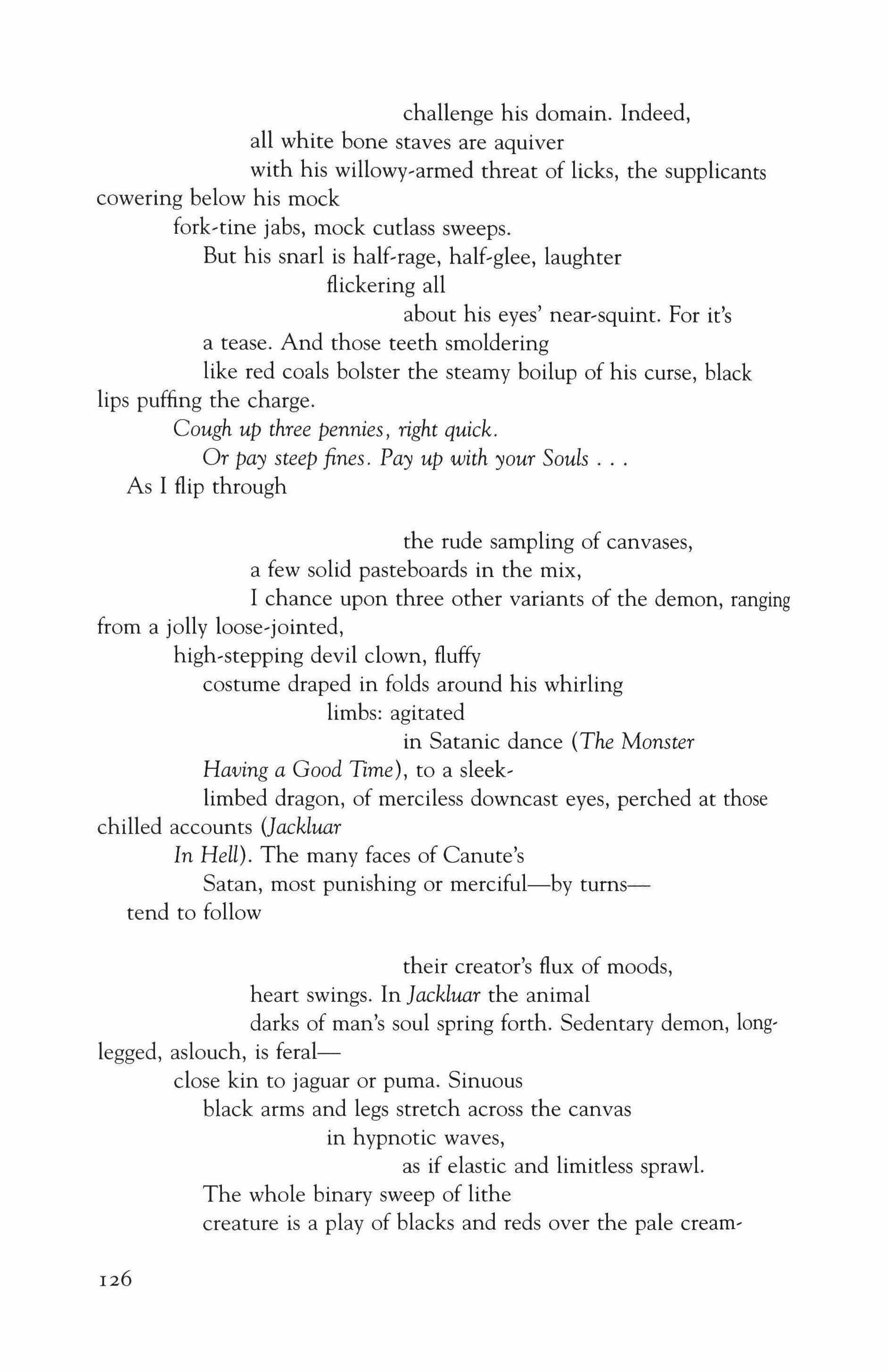
challenge his domain. Indeed, all white bone staves are aquiver with his willowy-armed threat of licks, the supplicants cowering below his mock fork-tine jabs, mock cutlass sweeps. But his snarl is half-rage, half-glee, laughter flickering all about his eyes' near-squint. For it's a tease. And those teeth smoldering like red coals bolster the steamy boilup of his curse, black lips puffing the charge.
Cough up three pennies, right quick. Or pay steep fines. Pay up with your Souls As I flip through
the rude sampling of canvases, a few solid pasteboards in the mix, I chance upon three other variants of the demon, ranging from a jolly loose-jointed, high-stepping devil clown, fluffy costume draped in folds around his whirling limbs: agitated in Satanic dance (The Monster
Having a Good TIme), to a sleeklimbed dragon, of merciless downcast eyes, perched at those chilled accounts (}ackluar
In Hell). The many faces of Canute's Satan, most punishing or merciful-by tumstend to follow
their creator's flux of moods, heart swings. In Jackluar the animal darks of man's soul spring forth. Sedentary demon, longlegged, aslouch, is feralclose kin to jaguar or puma. Sinuous black arms and legs stretch across the canvas in hypnotic waves, as if elastic and limitless sprawl. The whole binary sweep of lithe creature is a play of blacks and reds over the pale cream-
126

yellow backdrop. Hydra demon, his second feline head juts from his back, red,antlered and black, faced, while horns
from his foremost scalp protrude widely like a moose's stag branchings, his red snake tongues slithering out between red,hot tooth rows ending in arrow-head tips, not forks. He's seated, going to fat these days, perhaps a bit rotund in belly and that black rump which o'erspreads the little red chair.
Oh, he more than fills it, the tilted chair back bent to the rear, but holding intact for the time. It must be excess bulk of mortal souls he's been gobbling up, to judge by accounts payable, accounts outstanding, still,
to-be-settled in the ledger book he holds laid out flat upon his long forearms, black hands curled like paws over both pages of glaring entries:
THREE HUNDRED MEN TO DEATH TWELVE O'CLOCK PAY IN NINETEEN,EIGHTYSEVEN.
(In other Dracula portraits, we're oft reminded there's no space crunch in Hades, plenty of room down under for more hordes of accursed Souls.)
The Jackluar's long black tail coils beneath his chair, a near match for size and curvature to the pet snake which lies at his feet,
head lifted like a cobra's, arrow tongue pointing to the numbers in his account book, as if the serpent assists him to read. He may suffer acute eye strain or sight loss, himself subject
127
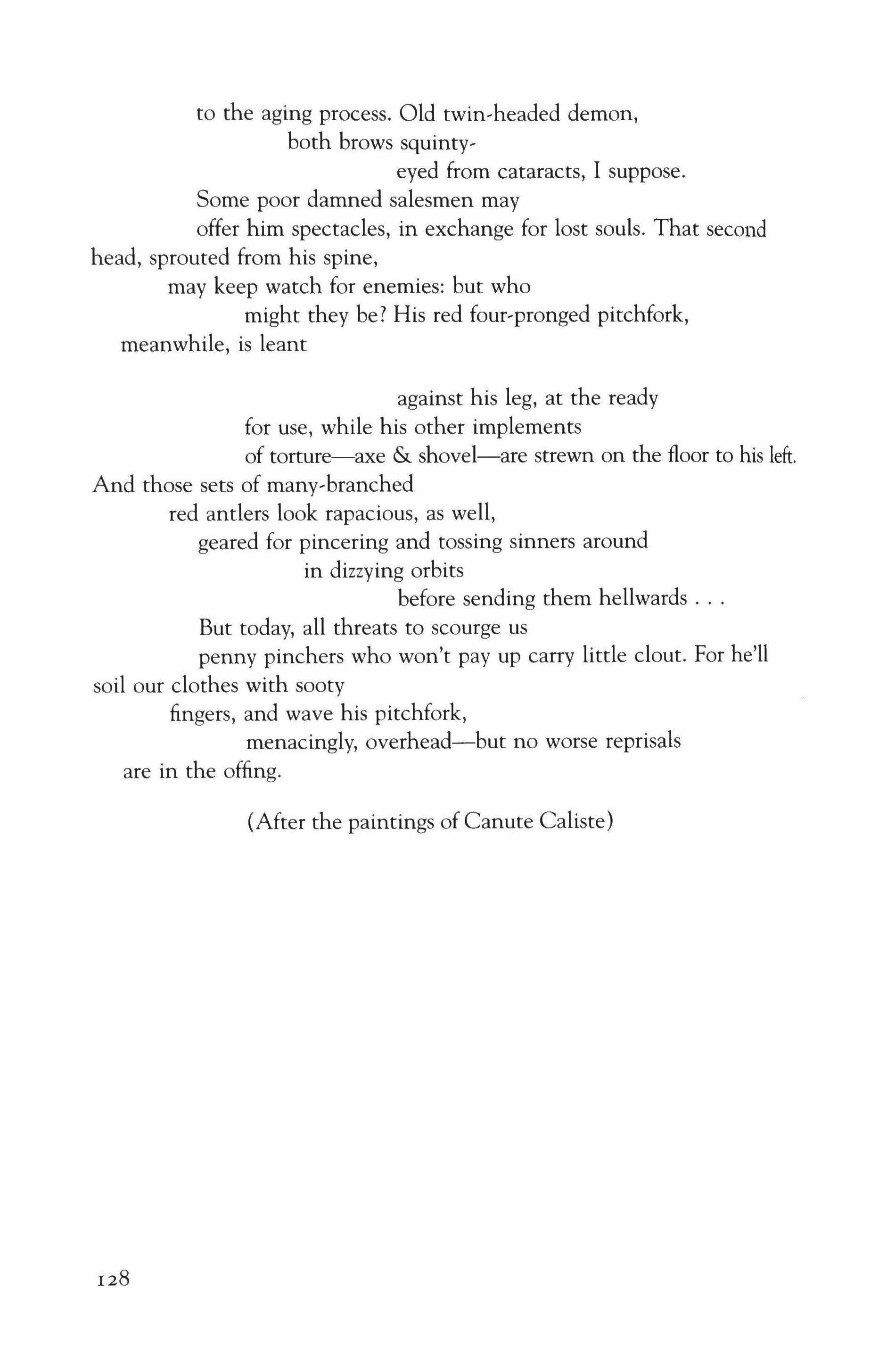
to the aging process. Old twin-headed demon, both brows squintyeyed from cataracts, I suppose. Some poor damned salesmen may offer him spectacles, in exchange for lost souls. That second head, sprouted from his spine, may keep watch for enemies: but who might they be? His red four-pronged pitchfork, meanwhile, is leant against his leg, at the ready for use, while his other implements of torture-axe & shovel-are strewn on the floor to his left. And those sets of many-branched red antlers look rapacious, as well, geared for pincering and tossing sinners around in dizzying orbits before sending them hellwards
But today, all threats to scourge us penny pinchers who won't pay up carry little clout. For he'll soil our clothes with sooty fingers, and wave his pitchfork, menacingly, overhead-but no worse reprisals are in the offing.
(After the paintings of Canute Caliste)
128
Stephen Schottenfeld
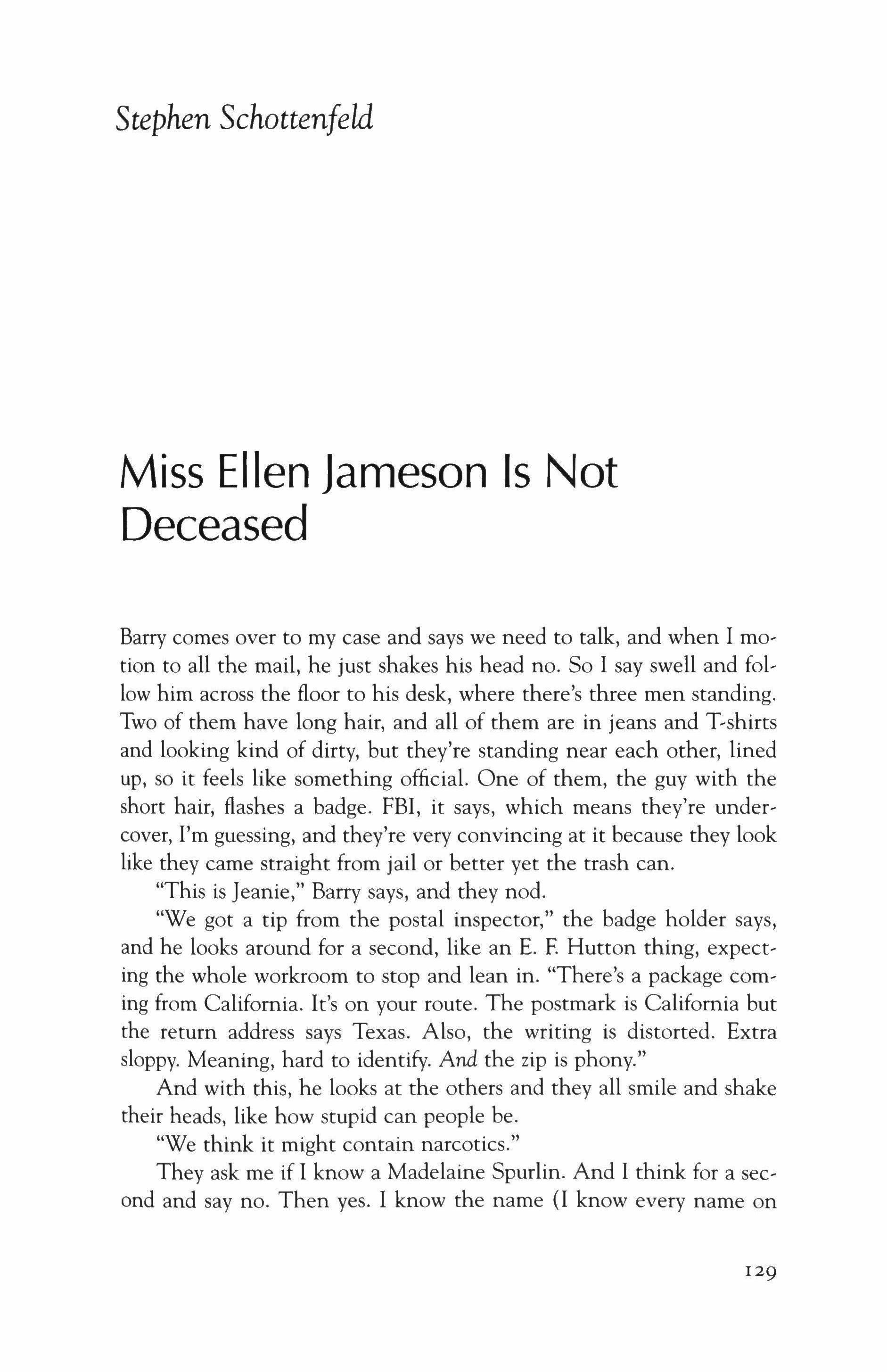
Miss Ellen Jameson Is Not Deceased
Barry comes over to my case and says we need to talk, and when I motion to all themail.hejustshakeshisheadno.SoIsay swell and follow him across the floor to his desk, where there's three men standing. Two of them have long hair, and all of them are in jeans and 'Tshirts and looking kind of dirty, but they're standing near each other, lined up, so it feels like something official. One of them, the guy with the short hair, flashes a badge. FBI, it says, which means they're undercover, I'm guessing, and they're very convincing at it because they look like they came straight from jailor better yet the trash can.
"This is Jeanie," Barry says, and they nod.
"We got a tip from the postal inspector," the badge holder says, and he looks around for a second, like an E. F. Hutton thing, expecting the whole workroom to stop and lean in. "There's a package coming from California. It's on your route. The postmark is California but the return address says Texas. Also, the writing is distorted. Extra sloppy. Meaning, hard to identify. And the zip is phony."
And with this, he looks at the others and they all smile and shake their heads, like how stupid can people be.
"We think it might contain narcotics."
They ask me if I know a Madelaine Spurlin. And I think for a second and say no. Then yes. I know the name (I know every name on
129

the route, last names especially; it's like flash cards now, give me a name and I'll match it with an address), but I can't see the face. I see the address. I see the doorway, but nothing behind it.
"She lives on-" and the guy looks at his pad, "816 Farley."
"That's right. She sure does," I say.
"You know anything else about her?"
"She goes by Maddy," I say, which sounds like I've had a conversation or overheard one, but that's only going by the mail, and I tell them that.
"What else?"
I think for a second, and I'm back at the doorway, trying to come up with something, but then I go elsewhere. "She's a snowbird."
"Where does she go?"
"Nowhere," I say, and they look at me strange, so I clarify. "I get a lot of hold mail, not forwards."
"Well, she's back now," Barry says. He's got his hands on his hips, all puffed up and eager for a purpose. He'd like to join the team and go kick down the door right now.
"The package should come in anytime this week. When it does, you contact your supervisor," and they nod over to Barry, "and he'll call us."
"And then?"
"Then you just go on your route, and deliver it, same as always. Go to the door and get her to sign for it. Then you drive away."
"That's it?"
"Yep."
"And you'll all be there?"
"That's right. We'll have agents posted down the street, up the street, around the comer."
"You gonna have a van?" I say, and I kind of laugh at that because it all just seems funny-the van and the assignment, and the three of them standing there, dressed-down, but still trying to be an authority, like their real clothes were in the wash but they decided to go through with it anyway. Only Barry looks the part with his brush cut.
"Yep. Just like TV. Van and everything."
"What if I'm sick that day? Package comes in, and I'm not here."
"Well, we'd appreciate if that didn't happen."
Barry gives me a look, his whole face turning down, like, "You're not gonna be sick."
"Then we wait a day. We wouldn't want to sit on it too long, but we don't want to do anything different than usual. If she's used to your
13°
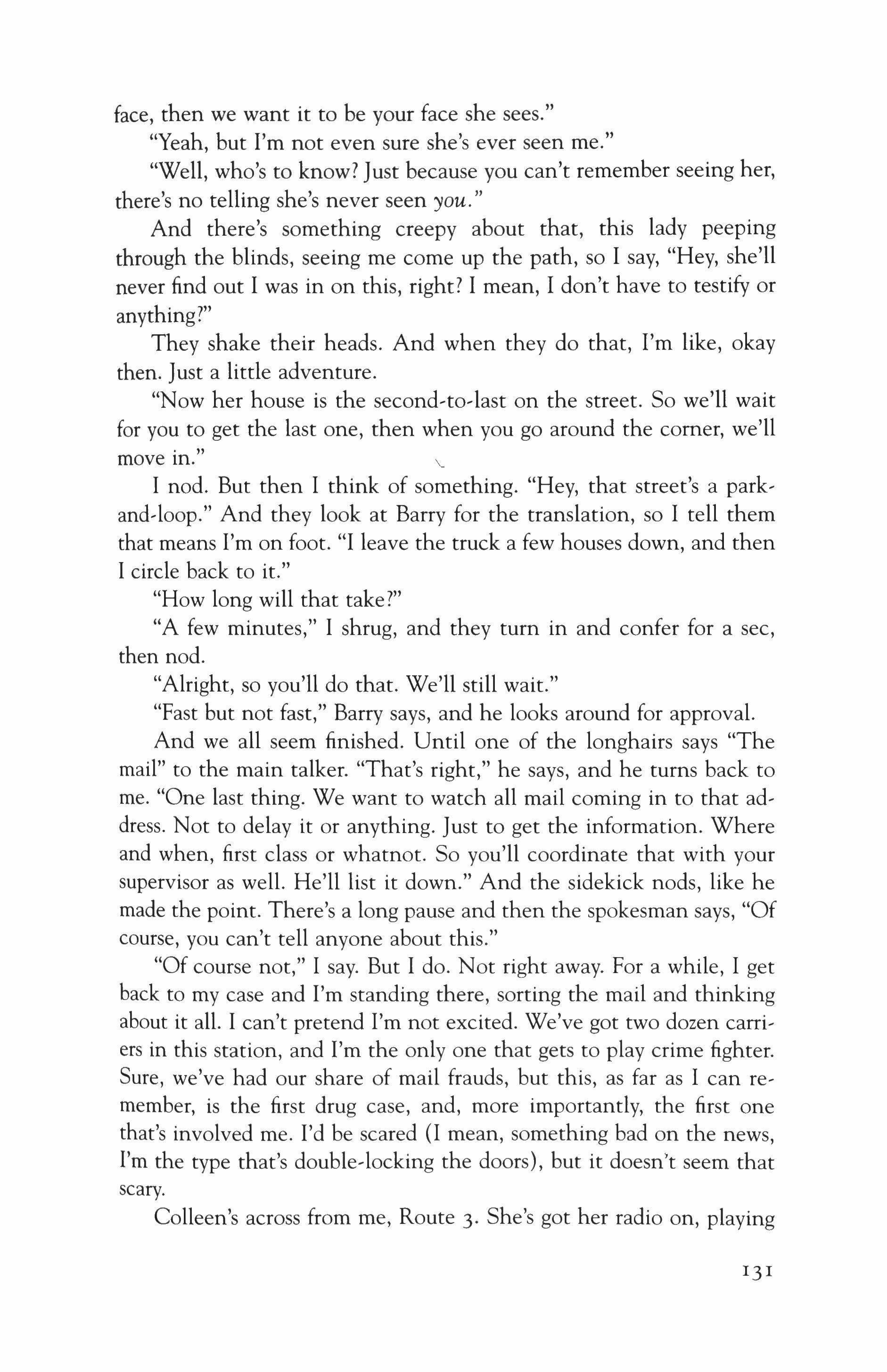
face, then we want it to be your face she sees."
"Yeah, but I'm not even sure she's ever seen me."
"Well, who's to know? Just because you can't remember seeing her, there's no telling she's never seen you."
And there's something creepy about that, this lady peeping through the blinds, seeing me come up the path, so I say, "Hey, she'll never find out I was in on this, right? I mean, I don't have to testify or anything?"
They shake their heads. And when they do that, I'm like, okay then. Just a little adventure.
"Now her house is the second-to-last on the street. So we'll wait for you to get the last one, then when you go around the comer, we'll move m. \.
I nod. But then I think of something. "Hey, that street's a park, and-loop." And they look at Barry for the translation, so I tell them that means I'm on foot. "I leave the truck a few houses down, and then I circle back to it."
"How long will that take?"
"A few minutes," I shrug, and they tum in and confer for a sec, then nod.
"Alright, so you'll do that. We'll still wait."
"Fast but not fast," Barry says, and he looks around for approval. And we all seem finished. Until one of the longhairs says "The mail" to the main talker. "That's right," he says, and he turns back to me. "One last thing. We want to watch all mail coming in to that ad, dress. Not to delay it or anything. Just to get the information. Where and when, first class or whatnot. So you'll coordinate that with your supervisor as well. He'll list it down." And the sidekick nods, like he made the point. There's a long pause and then the spokesman says, "Of course, you can't tell anyone about this."
"Of course not," I say. But I do. Not right away. For a while, I get back to my case and I'm standing there, sorting the mail and thinking about it all. I can't pretend I'm not excited. We've got two dozen carriers in this station, and I'm the only one that gets to play crime fighter. Sure, we've had our share of mail frauds, but this, as far as I can remember, is the first drug case, and, more importantly, the first one that's involved me. I'd be scared (I mean, something bad on the news, I'm the type that's double,locking the doors), but it doesn't seem that scary.
Colleen's across from me, Route 3. She's got her radio on, playing
I3I
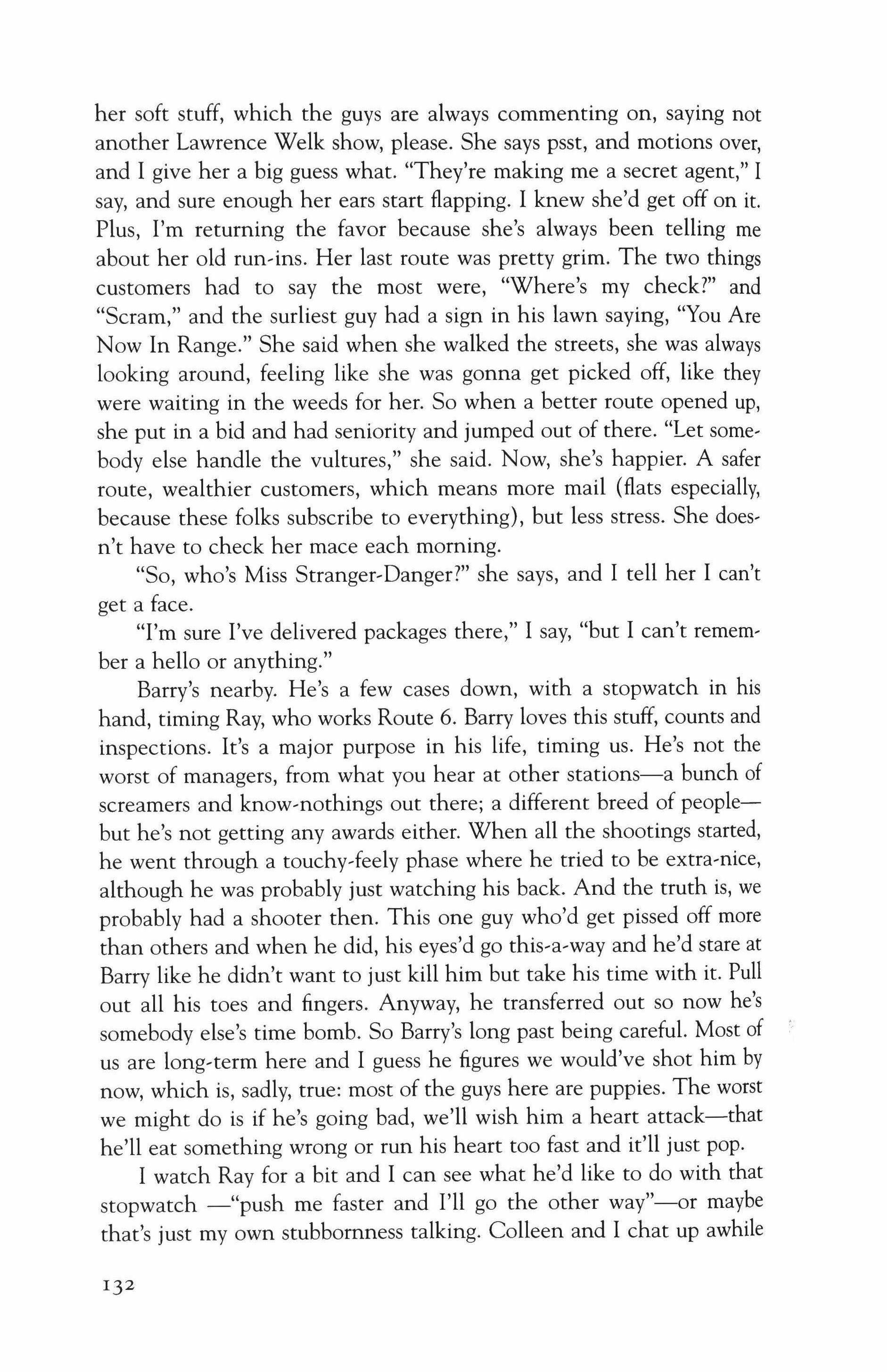
her soft stuff, which the guys are always commenting on, saying not another Lawrence Welk show, please. She says psst, and motions over, and I give her a big guess what. "They're making me a secret agent," I say, and sure enough her ears start flapping. I knew she'd get off on it. Plus, I'm returning the favor because she's always been telling me about her old run-ins. Her last route was pretty grim. The two things customers had to say the most were, "Where's my check?" and "Scram," and the surliest guy had a sign in his lawn saying, "You Are Now In Range." She said when she walked the streets, she was always looking around, feeling like she was gonna get picked off, like they were waiting in the weeds for her. So when a better route opened up, she put in a bid and had seniority and jumped out of there. "Let somebody else handle the vultures," she said. Now, she's happier. A safer route, wealthier customers, which means more mail (flats especially, because these folks subscribe to everything), but less stress. She doesn't have to check her mace each morning.
"So, who's Miss Stranger-Danger?" she says, and I tell her I can't get a face.
"I'm sure I've delivered packages there," I say, "but I can't remember a hello or anything."
Barry's nearby. He's a few cases down, with a stopwatch in his hand, timing Ray, who works Route 6. Barry loves this stuff, counts and inspections. It's a major purpose in his life, timing us. He's not the worst of managers, from what you hear at other stations-a bunch of screamers and know-nothings out there; a different breed of peoplebut he's not getting any awards either. When all the shootings started, he went through a touchv-feely phase where he tried to be extra-nice, although he was probably just watching his back. And the truth is, we probably had a shooter then. This one guy who'd get pissed off more than others and when he did, his eyes'd go this-a-way and he'd stare at Barry like he didn't want to just kill him but take his time with it. Pull out all his toes and fingers. Anyway, he transferred out so now he's somebody else's time bomb. So Barry's long past being carefuL Most of us are long-term here and I guess he figures we would've shot him by now, which is, sadly, true: most of the guys here are puppies. The worst we might do is if he's going bad, we'll wish him a heart attack-that he'll eat something wrong or run his heart too fast and it'll just pop.
I watch Ray for a bit and I can see what he'd like to do with that stopwatch -"push me faster and I'll go the other way"-or maybe that's just my own stubbornness talking. Colleen and I chat up awhile
132
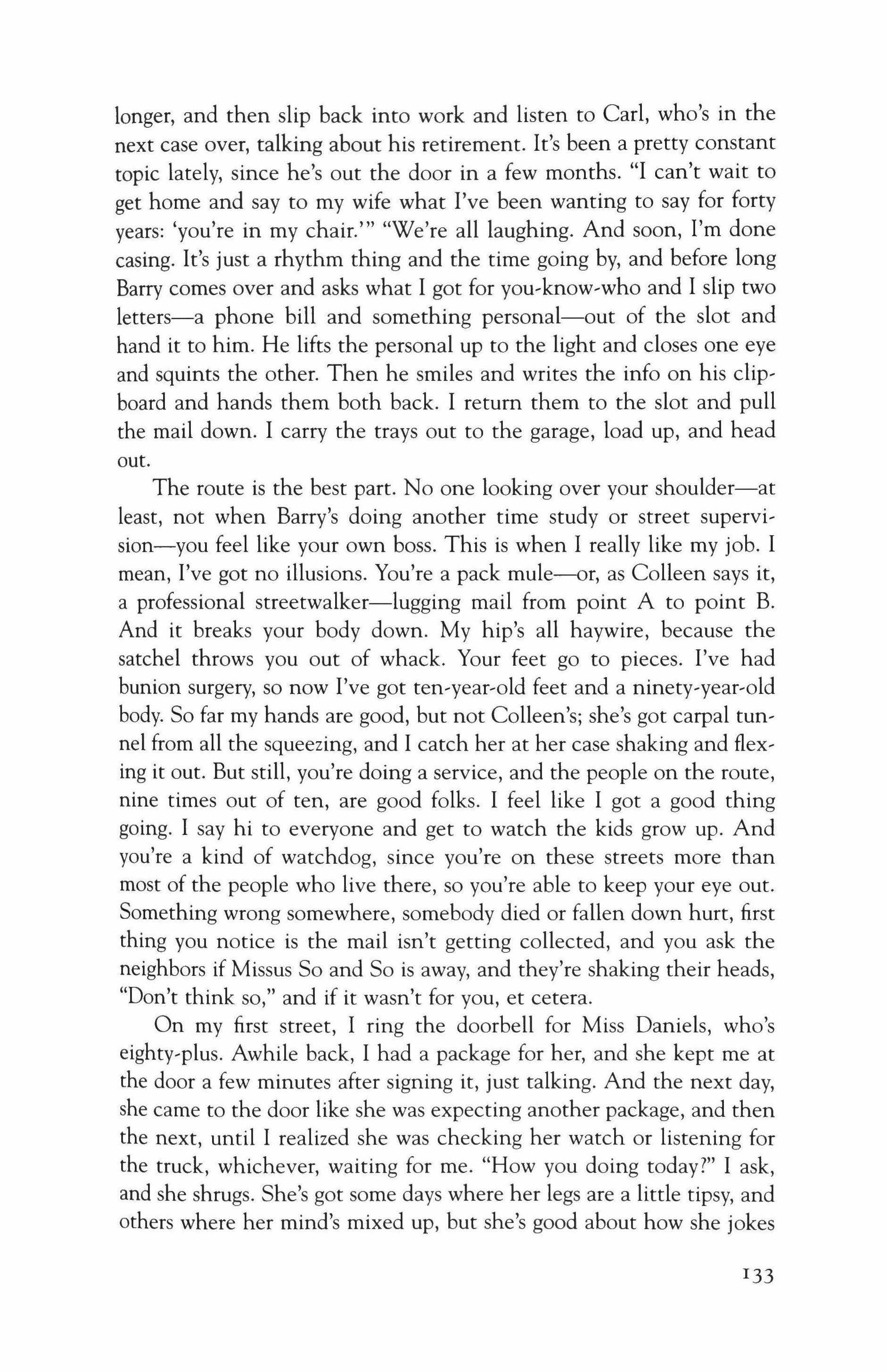
longer, and then slip back into work and listen to Carl, who's in the next case over, talking about his retirement. It's been a pretty constant topic lately, since he's out the door in a few months. "I can't wait to get home and say to my wife what I've been wanting to say for forty years: 'you're in my chair.'" "We're all laughing. And soon, I'm done casing. It's just a rhythm thing and the time going by, and before long Barry comes over and asks what I got for you-know-who and I slip two letters-a phone bill and something personal-out of the slot and hand it to him. He lifts the personal up to the light and closes one eye and squints the other. Then he smiles and writes the info on his clip, board and hands them both back. I return them to the slot and pull the mail down. I carry the trays out to the garage, load up, and head out.
The route is the best part. No one looking over your shoulder-at least, not when Barry's doing another time study or street supervision-you feel like your own boss. This is when I really like my job. I mean, I've got no illusions. You're a pack mule-or, as Colleen says it, a professional streetwalker-lugging mail from point A to point B. And it breaks your body down. My hip's all haywire, because the satchel throws you out of whack. Your feet go to pieces. I've had bunion surgery, so now I've got ten-year-old feet and a ninety'year'old body. So far my hands are good, but not Colleen's; she's got carpal tun' nel from all the squeezing, and I catch her at her case shaking and flex, ing it out. But still, you're doing a service, and the people on the route, nine times out of ten, are good folks. I feel like I got a good thing going. I say hi to everyone and get to watch the kids grow up. And you're a kind of watchdog, since you're on these streets more than most of the people who live there, so you're able to keep your eye out. Something wrong somewhere, somebody died or fallen down hurt, first thing you notice is the mail isn't getting collected, and you ask the neighbors if Missus So and So is away, and they're shaking their heads, "Don't think so," and if it wasn't for you, et cetera.
On my first street, I ring the doorbell for Miss Daniels, who's eighty-plus. Awhile back, I had a package for her, and she kept me at the door a few minutes after signing it, just talking. And the next day, she came to the door like she was expecting another package, and then the next, until I realized she was checking her watch or listening for the truck, whichever, waiting for me. "How you doing today?" I ask, and she shrugs. She's got some days where her legs are a little tipsy, and others where her mind's mixed up, but she's good about how she jokes
133
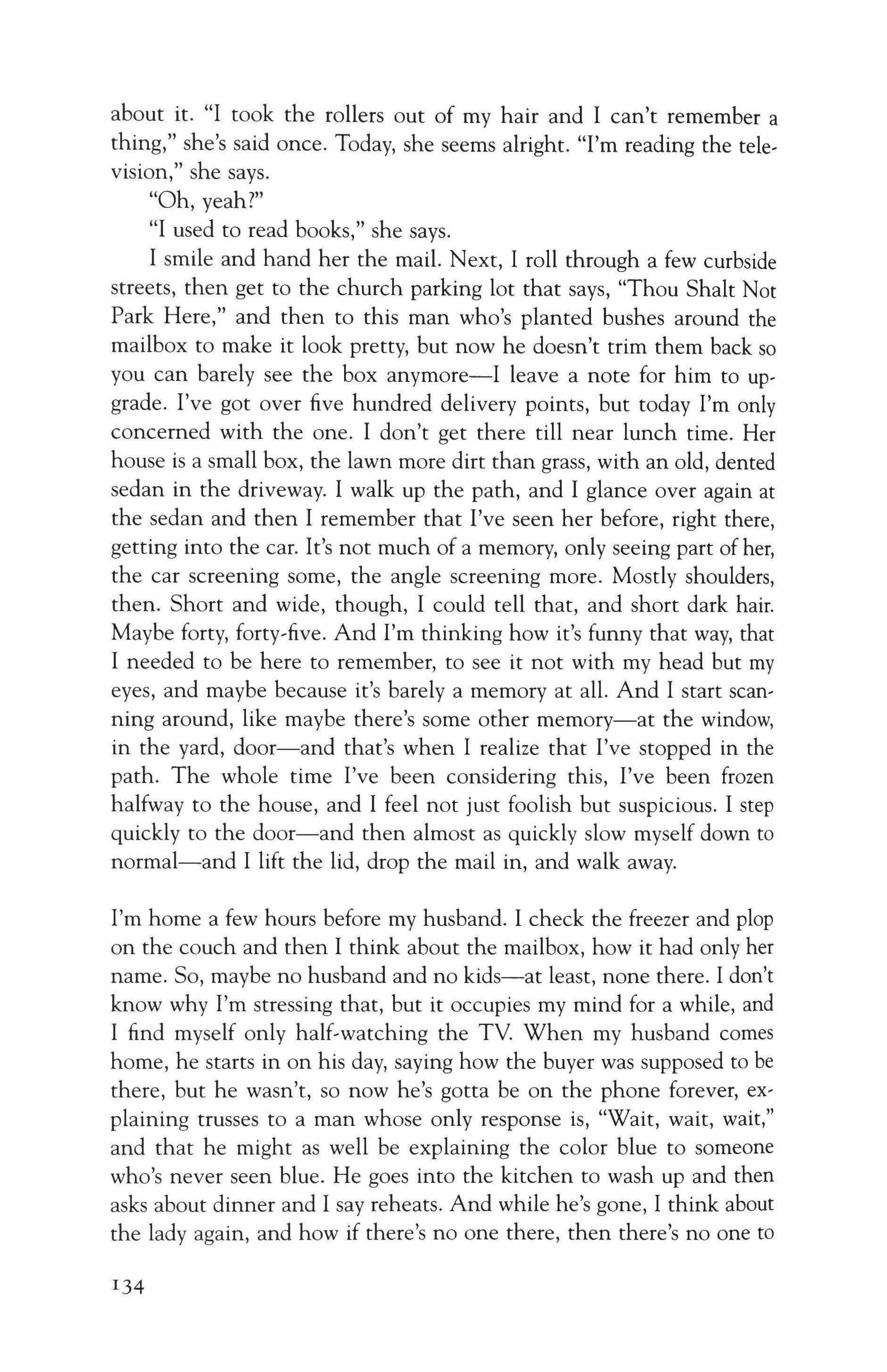
about it. "I took the rollers out of my hair and I can't remember a thing," she's said once. Today, she seems alright. "I'm reading the television," she says.
"Oh, yeah?"
"I used to read books," she says.
I smile and hand her the mail. Next, I roll through a few curbside streets, then get to the church parking lot that says, "Thou Shalt Not Park Here," and then to this man who's planted bushes around the mailbox to make it look pretty, but now he doesn't trim them back so you can barely see the box anymore-I leave a note for him to upgrade. I've got over five hundred delivery points, but today I'm only concerned with the one. I don't get there till near lunch time. Her house is a small box, the lawn more dirt than grass, with an old, dented sedan in the driveway. I walk up the path, and I glance over again at the sedan and then I remember that I've seen her before, right there, getting into the car. It's not much of a memory, only seeing part of her, the car screening some, the angle screening more. Mostly shoulders, then. Short and wide, though, I could tell that, and short dark hair. Maybe forty, forty-five. And I'm thinking how it's funny that way, that I needed to be here to remember, to see it not with my head but my eyes, and maybe because it's barely a memory at all. And I start scanning around, like maybe there's some other memory-at the window, in the yard, door-and that's when I realize that I've stopped in the path. The whole time I've been considering this, I've been frozen halfway to the house, and I feel not just foolish but suspicious. I step quickly to the door-and then almost as quickly slow myself down to normal-and I lift the lid, drop the mail in, and walk away.
I'm home a few hours before my husband. I check the freezer and plop on the couch and then I think about the mailbox, how it had only her name. So, maybe no husband and no kids-at least, none there. I don't know why I'm stressing that, but it occupies my mind for a while, and I find myself only half-watching the TV. When my husband comes home, he starts in on his day, saying how the buyer was supposed to be there, but he wasn't, so now he's gotta be on the phone forever, explaining trusses to a man whose only response is, "Wait, wait, wait," and that he might as well be explaining the color blue to someone who's never seen blue. He goes into the kitchen to wash up and then asks about dinner and I say reheats. And while he's gone, I think about the lady again, and how if there's no one there, then there's no one to
134
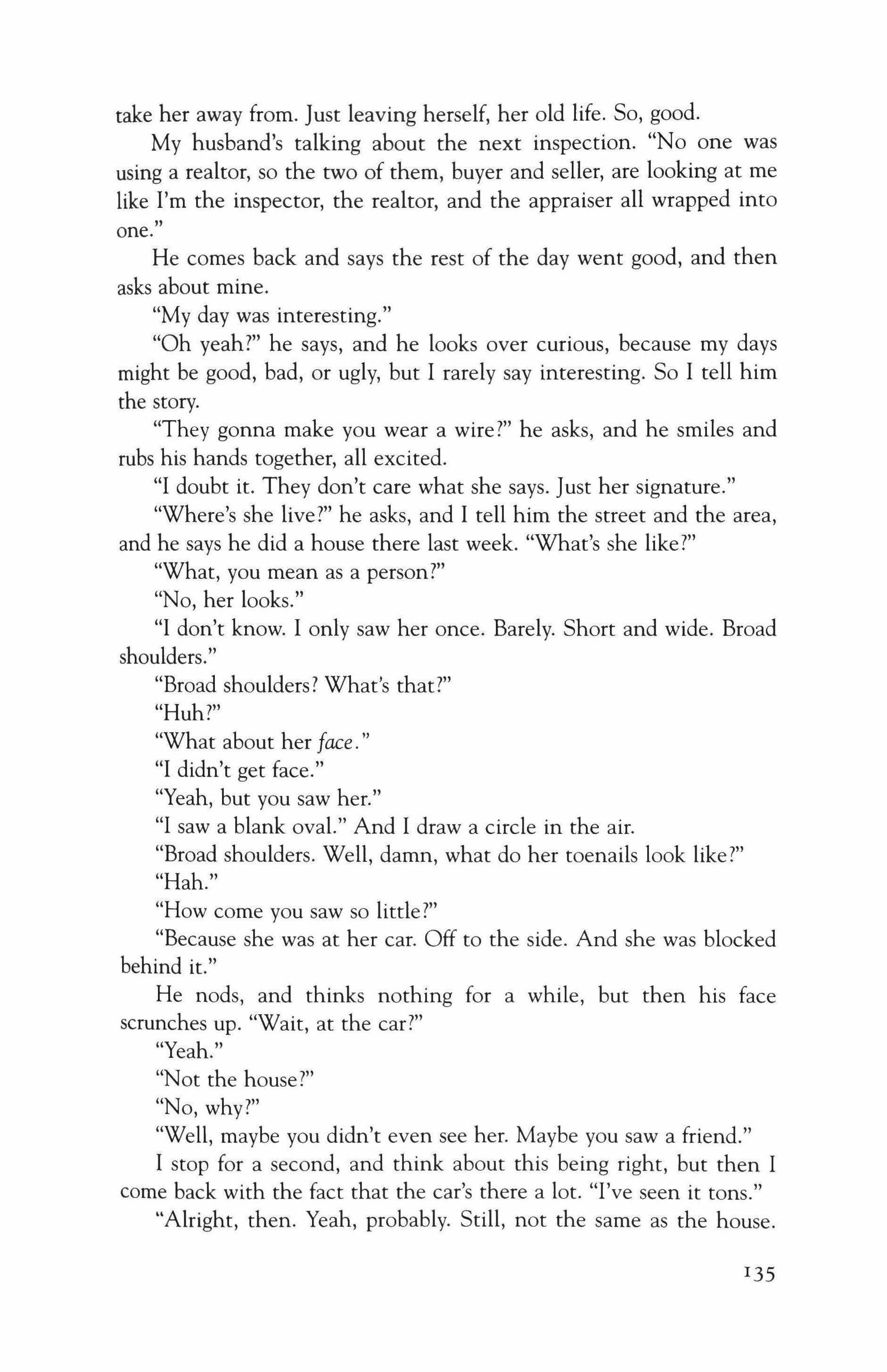
take her away from. Just leaving herself, her old life. So, good.
My husband's talking about the next inspection. "No one was using a realtor, so the two of them, buyer and seller, are looking at me like I'm the inspector, the realtor, and the appraiser all wrapped into one.
He comes back and says the rest of the day went good, and then asks about mine.
"My day was interesting."
"Oh yeah?" he says, and he looks over curious, because my days might be good, bad, or ugly, but I rarely say interesting. So I tell him the story.
"They gonna make you wear a wire?" he asks, and he smiles and rubs his hands together, all excited.
"I doubt it. They don't care what she says. Just her signature."
"Where's she live?" he asks, and I tell him the street and the area, and he says he did a house there last week. "What's she like?"
"What, you mean as a person?"
"No, her looks."
"I don't know. I only saw her once. Barely. Short and wide. Broad shoulders."
"Broad shoulders? What's that?"
"Huh?"
"What about her face.
"I didn't get face."
"Yeah, but you saw her."
"I saw a blank oval." And I draw a circle in the air.
"Broad shoulders. Well, damn, what do her toenails look like?"
"Hah."
"How come you saw so little?"
"Because she was at her car. Off to the side. And she was blocked behind it."
He nods, and thinks nothing for a while, but then his face scrunches up. "Wait, at the car?"
"Yeah."
"Not the house?"
"No, why?"
"Well, maybe you didn't even see her. Maybe you saw a friend."
I stop for a second, and think about this being right, but then I come back with the fact that the car's there a lot. "I've seen it tons."
"Alright, then. Yeah, probably. Still, not the same as the house.
135
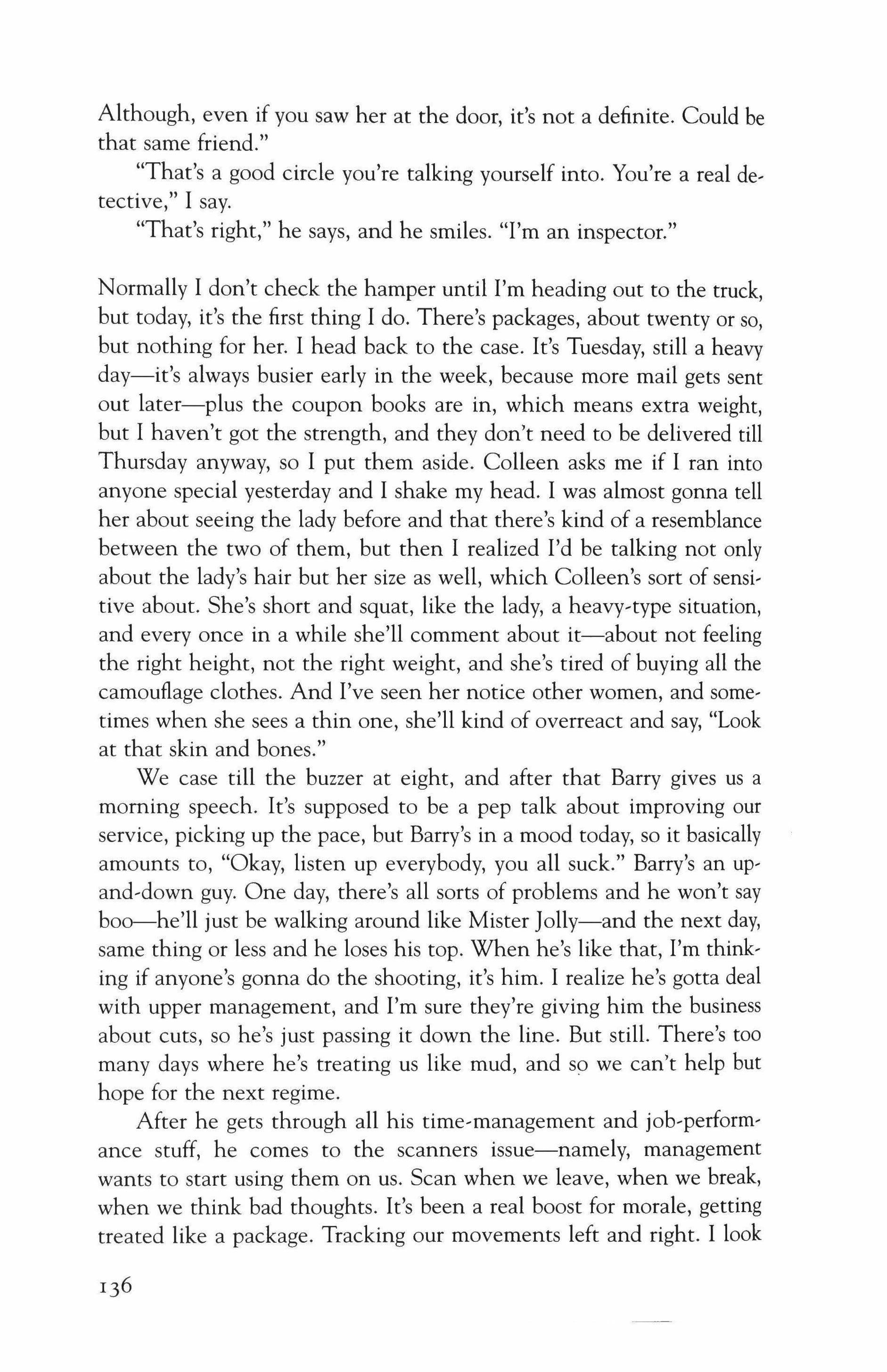
Although, even if you saw her at the door, it's not a definite. Could be that same friend."
"That's a good circle you're talking yourself into. You're a real detective," I say.
"That's right," he says, and he smiles. "I'm an inspector."
Normally I don't check the hamper untilI'm heading out to the truck, but today, it's the first thing I do. There's packages, about twenty or so, but nothing for her. I head back to the case. It's Tuesday, still a heavy day-it's always busier early in the week, because more mail gets sent out later-plus the coupon books are in, which means extra weight, but I haven't got the strength, and they don't need to be delivered till Thursday anyway, so I put them aside. Colleen asks me if I ran into anyone special yesterday and I shake my head. I was almost gonna tell her about seeing the lady before and that there's kind of a resemblance between the two of them, but then I realized I'd be talking not only about the lady's hair but her size as well, which Colleen's sort of sensitive about. She's short and squat, like the lady, a heavy-type situation, and every once in a while she'll comment about it-about not feeling the right height, not the right weight, and she's tired of buying all the camouflage clothes. And I've seen her notice other women, and sometimes when she sees a thin one, she'll kind of overreact and say, "Look at that skin and bones."
We case till the buzzer at eight, and after that Barry gives us a morning speech. It's supposed to be a pep talk about improving our service, picking up the pace, but Barry's in a mood today, so it basically amounts to, "Okay, listen up everybody, you all suck." Barry's an upand-down guy. One day, there's all sorts of problems and he won't say boo-he'll just be walking around like Mister Jolly-and the next day, same thing or less and he loses his top. When he's like that, I'm thinking if anyone's gonna do the shooting, it's him. I realize he's gotta deal with upper management, and I'm sure they're giving him the business about cuts, so he's just passing it down the line. But still. There's too many days where he's treating us like mud, and so we can't help but hope for the next regime.
After he gets through all his time-management and job-performance stuff, he comes to the scanners issue-namely, management wants to start using them on us. Scan when we leave, when we break, when we think bad thoughts. It's been a real boost for morale, getting treated like a package. Tracking our movements left and right. I look
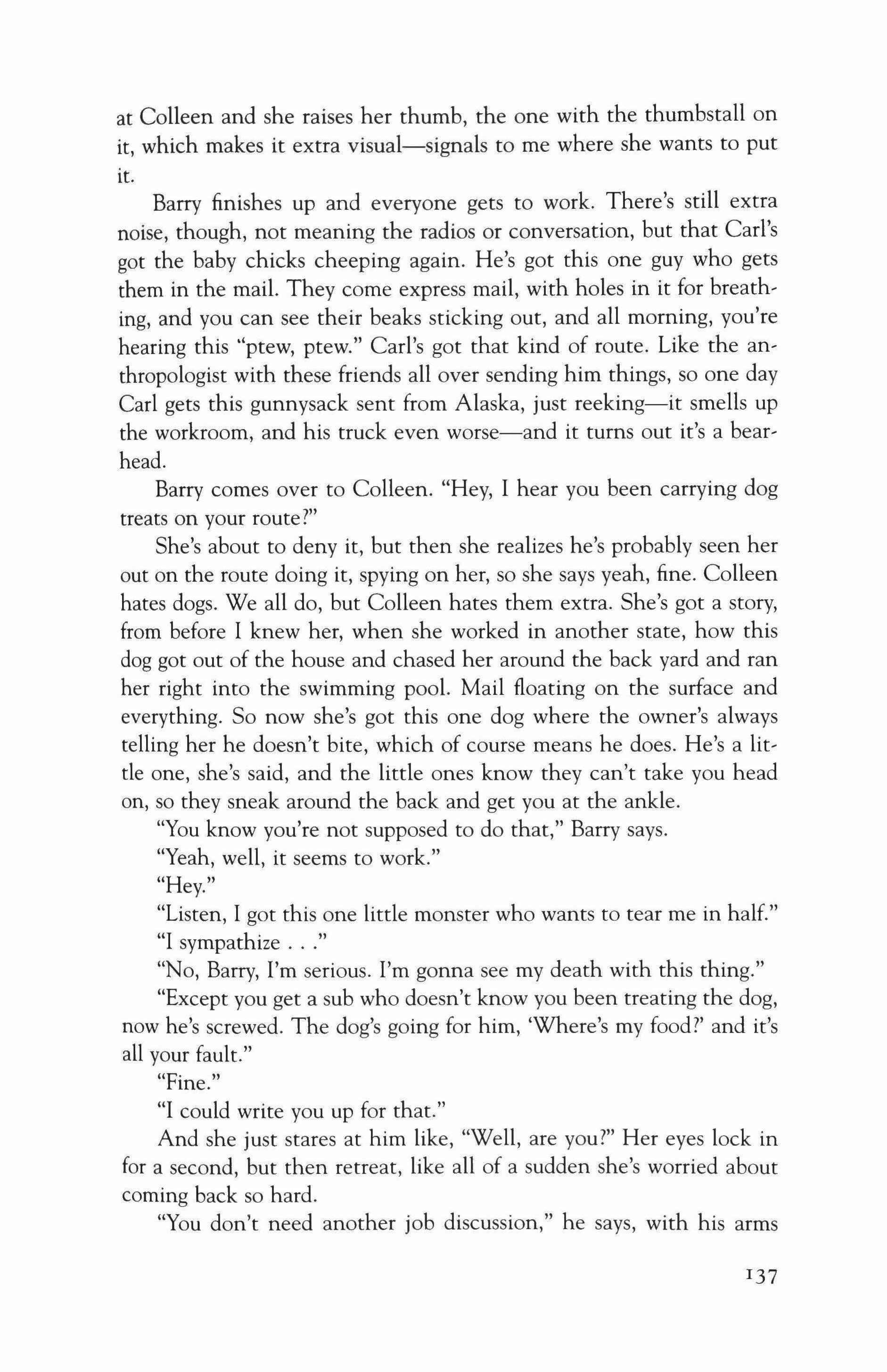
at Colleen and she raises her thumb, the one with the thumbstall on it, which makes it extra visual-signals to me where she wants to put it.
Barry finishes up and everyone gets to work. There's still extra noise, though, not meaning the radios or conversation, but that Carl's got the baby chicks cheeping again. He's got this one guy who gets them in the maiL They come express mail, with holes in it for breathing, and you can see their beaks sticking out, and all morning, you're hearing this "ptew, ptew." Carl's got that kind of route. Like the anthropologist with these friends all over sending him things, so one day Carl gets this gunnysack sent from Alaska, just reeking-it smells up the workroom, and his truck even worse-and it turns out it's a bearhead.
Barry comes over to Colleen. "Hey, I hear you been carrying dog treats on your route?"
She's about to deny it, but then she realizes he's probably seen her out on the route doing it, spying on her, so she says yeah, fine. Colleen hates dogs. We all do, but Colleen hates them extra. She's got a story, from before I knew her, when she worked in another state, how this dog got out of the house and chased her around the back yard and ran her right into the swimming pooL Mail floating on the surface and everything. So now she's got this one dog where the owner's always telling her he doesn't bite, which of course means he does. He's a little one, she's said, and the little ones know they can't take you head on, so they sneak around the back and get you at the ankle.
"You know you're not supposed to do that," Barry says.
"Yeah, well, it seems to work."
"Hey."
"Listen, I got this one little monster who wants to tear me in half."
"I sympathize
"No, Barry, I'm serious. I'm gonna see my death with this thing."
"Except you get a sub who doesn't know you been treating the dog, now he's screwed. The dog's going for him, 'Where's my food?' and it's all your fault."
"Fine."
"I could write you up for that."
And she just stares at him like, "Well, are you?" Her eyes lock in for a second, but then retreat, like all of a sudden she's worried about coming back so hard.
"You don't need another job discussion," he says, with his arms
137
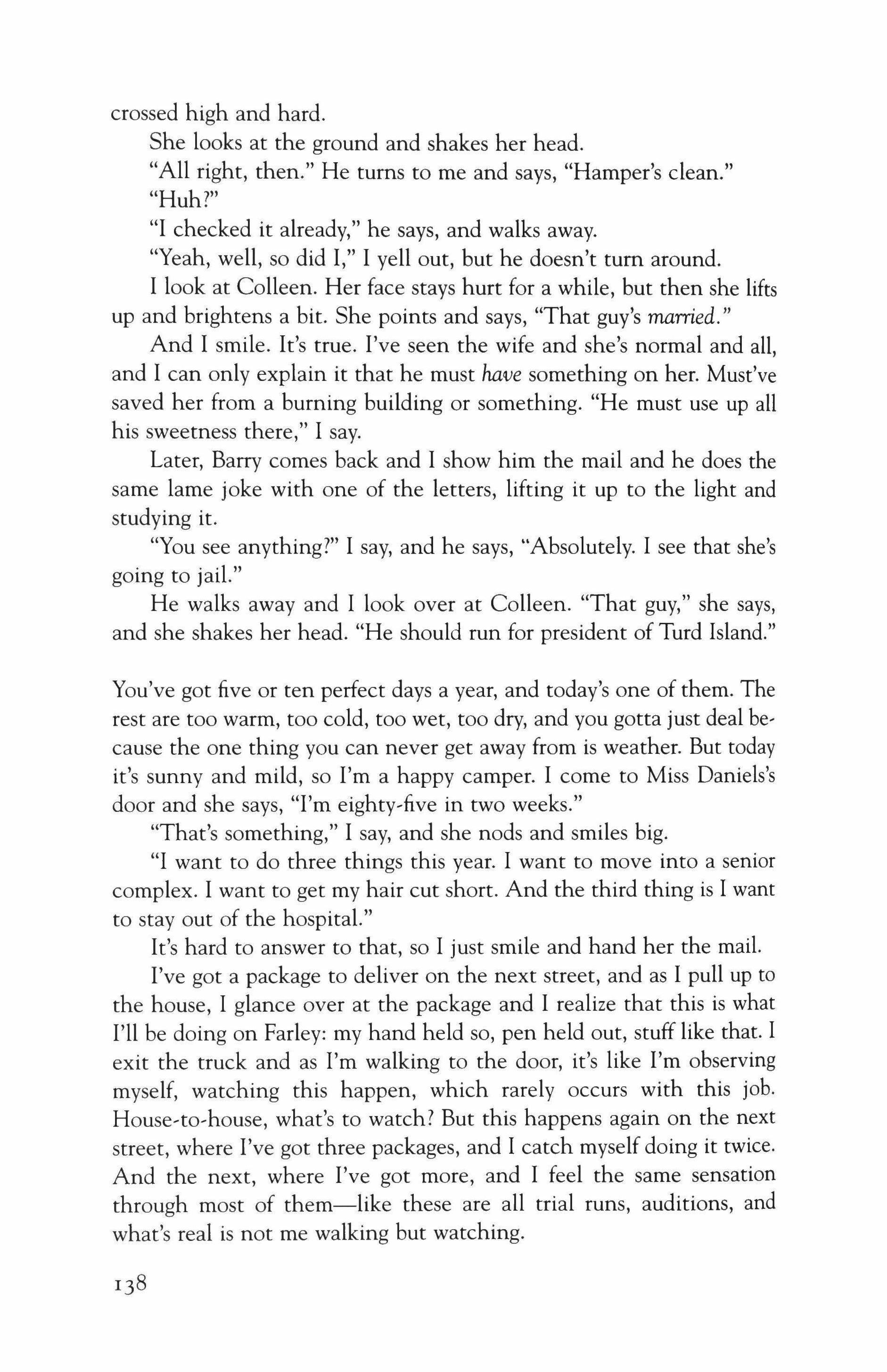
crossed high and hard.
She looks at the ground and shakes her head.
"All right, then." He turns to me and says, "Hamper's clean."
"Huh?"
"I checked it already," he says, and walks away.
"Yeah, well, so did I," I yell out, but he doesn't tum around.
I look at Colleen. Her face stays hurt for a while, but then she lifts up and brightens a bit. She points and says, "That guy's married."
And I smile. It's true. I've seen the wife and she's normal and all, and I can only explain it that he must have something on her. Must've saved her from a burning building or something. "He must use up all his sweetness there," I say.
Later, Barry comes back and I show him the mail and he does the same lame joke with one of the letters, lifting it up to the light and studying it.
"You see anything?" I say, and he says, "Absolutely. I see that she's going to jail."
He walks away and I look over at Colleen. "That guy," she says, and she shakes her head. "He should run for president of Turd Island."
You've got five or ten perfect days a year, and today's one of them. The rest are too warm, too cold, too wet, too dry, and you gotta just deal because the one thing you can never get away from is weather. But today it's sunny and mild, so I'm a happy camper. I come to Miss Daniels's door and she says, "I'm eighty-five in two weeks."
"That's something," I say, and she nods and smiles big.
"I want to do three things this year. I want to move into a senior complex. I want to get my hair cut short. And the third thing is I want to stay out of the hospital."
It's hard to answer to that, so I just smile and hand her the mail.
I've got a package to deliver on the next street, and as I pull up to the house, I glance over at the package and I realize that this is what I'll be doing on Farley: my hand held so, pen held out, stuff like that. I exit the truck and as I'm walking to the door, it's like I'm observing myself, watching this happen, which rarely occurs with this job. House-to-house, what's to watch? But this happens again on the next street, where I've got three packages, and I catch myselfdoing it twice. And the next, where I've got more, and I feel the same sensation through most of them-like these are all trial runs, auditions, and what's real is not me walking but watching.
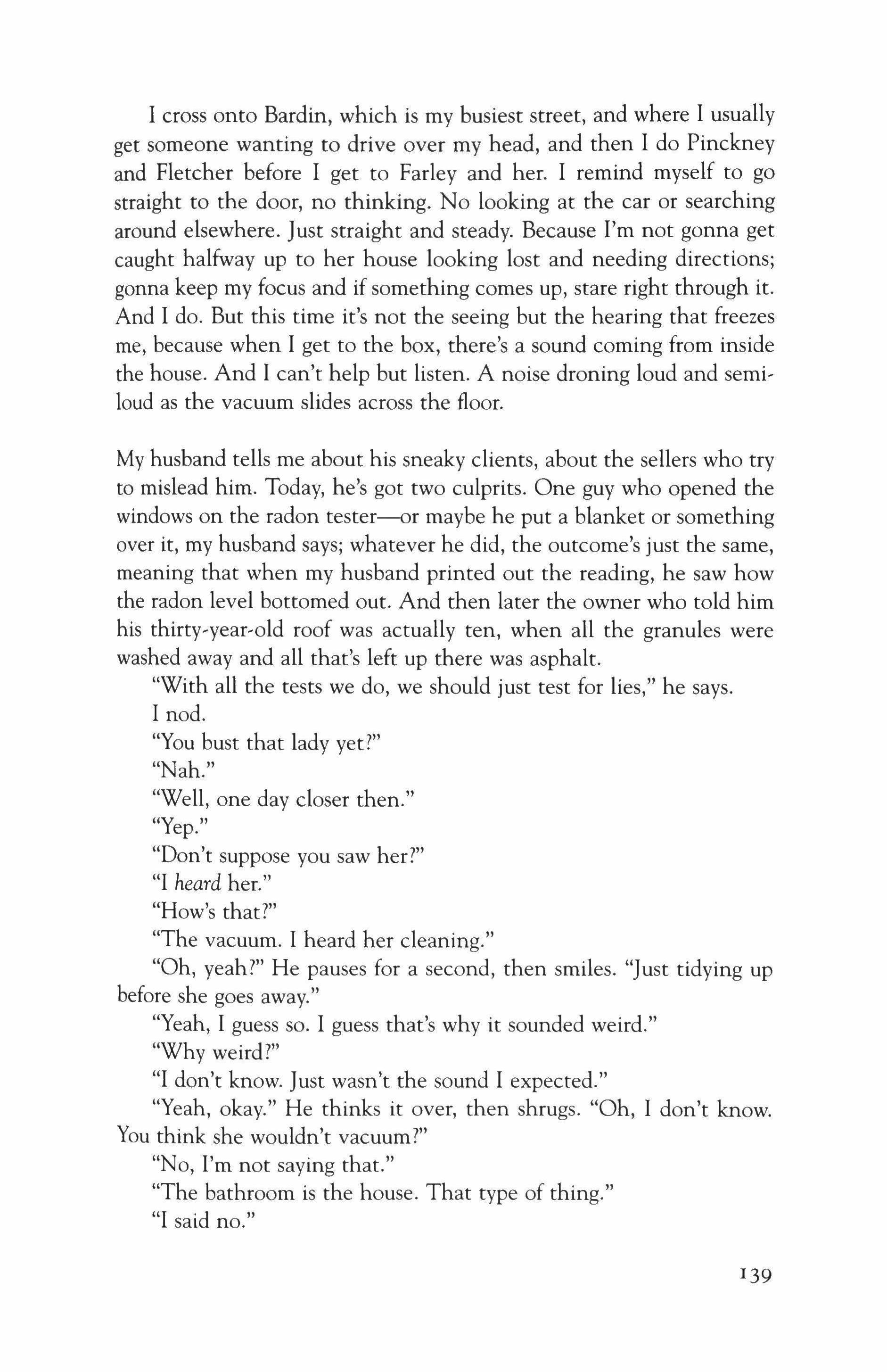
I cross onto Bardin, which is my busiest street, and where I usually get someone wanting to drive over my head, and then I do Pinckney and Fletcher before I get to Farley and her. I remind myself to go straight to the door, no thinking. No looking at the car or searching around elsewhere. Just straight and steady. Because I'm not gonna get caught halfway up to her house looking lost and needing directions; gonna keep my focus and if something comes up, stare right through it. And I do. But this time it's not the seeing but the hearing that freezes me, because when I get to the box, there's a sound corning from inside the house. And I can't help but listen. A noise droning loud and semiloud as the vacuum slides across the floor.
My husband tells me about his sneaky clients, about the sellers who try to mislead him. Today, he's got two culprits. One guy who opened the windows on the radon tester---or maybe he put a blanket or something over it, my husband says; whatever he did, the outcome's just the same, meaning that when my husband printed out the reading, he saw how the radon level bottomed out. And then later the owner who told him his thirty-year-old roof was actually ten, when all the granules were washed away and all that's left up there was asphalt.
"With all the tests we do, we should just test for lies," he says.
I nod.
"You bust that lady yet?"
"Nah."
"Well, one day closer then."
"Yep."
"Don't suppose you saw her?"
"I heard her."
"How's that?"
"The vacuum. I heard her cleaning."
"Oh, yeah?" He pauses for a second, then smiles. "Just tidying up before she goes away."
"Yeah, I guess so. I guess that's why it sounded weird."
"Why weird?"
"I don't know. Just wasn't the sound I expected."
"Yeah, okay." He thinks it over, then shrugs. "Oh, I don't know. You think she wouldn't vacuum?"
"No, I'm not saying that."
"The bathroom is the house. That type of thing."
"I said no."
139
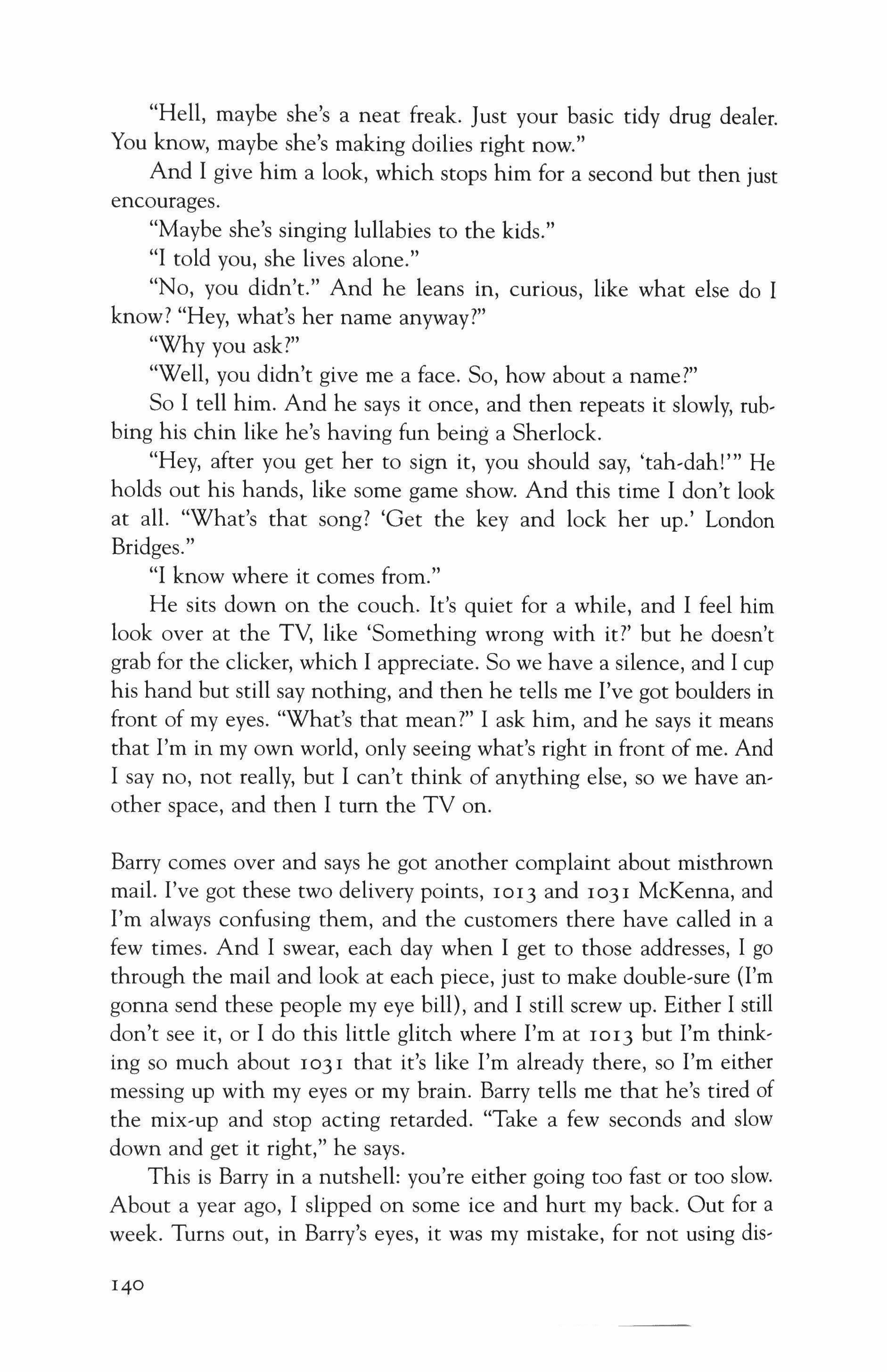
"Hell, maybe she's a neat freak. Just your basic tidy drug dealer. You know, maybe she's making doilies right now."
And I give him a look, which stops him for a second but then just encourages.
"Maybe she's singing lullabies to the kids."
"I told you, she lives alone."
"No, you didn't." And he leans in, curious, like what else do I know? "Hey, what's her name anyway?"
"Why you ask?"
"Well, you didn't give me a face. So, how about a name?"
So I tell him. And he says it once, and then repeats it slowly, rubbing his chin like he's having fun being a Sherlock.
"Hey, after you get her to sign it, you should say, 'tah-dahl" He holds out his hands, like some game show. And this time I don't look at all. "What's that song? 'Get the key and lock her up.' London Bridges."
"I know where it comes from."
He sits down on the couch. It's quiet for a while, and I feel him look over at the TV, like 'Something wrong with it?' but he doesn't grab for the clicker, which I appreciate. So we have a silence, and I cup his hand but still say nothing, and then he tells me I've got boulders in front of my eyes. "What's that mean?" I ask him, and he says it means that I'm in my own world, only seeing what's right in front of me. And I say no, not really, but I can't think of anything else, so we have another space, and then I tum the TV on.
Barry comes over and says he got another complaint about misthrown mail. I've got these two delivery points, 1013 and 1031 McKenna, and I'm always confusing them, and the customers there have called in a few times. And I swear, each day when I get to those addresses, I go through the mail and look at each piece, just to make double-sure (I'm gonna send these people my eye bill), and I still screw up. Either I still don't see it, or I do this little glitch where I'm at 1013 but I'm thinking so much about 103 I that it's like I'm already there, so I'm either messing up with my eyes or my brain. Barry tells me that he's tired of the mix-up and stop acting retarded. "Take a few seconds and slow down and get it right," he says.
This is Barry in a nutshell: you're either going too fast or too slow. About a year ago, I slipped on some ice and hurt my back. Out for a week. Turns out, in Barry's eyes, it was my mistake, for not using dis-
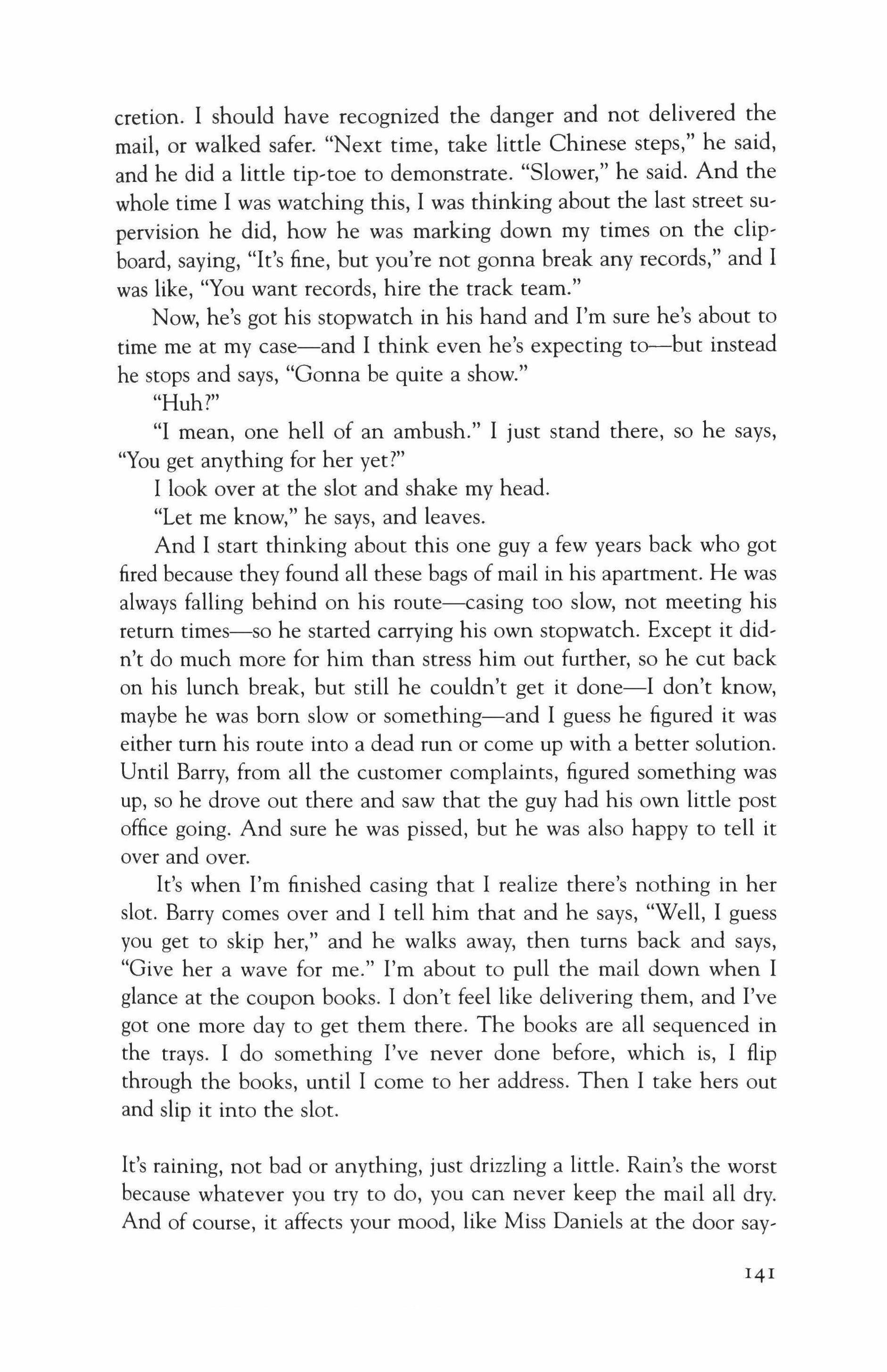
cretion. I should have recognized the danger and not delivered the mail, or walked safer. "Next time, take little Chinese steps," he said, and he did a little tip-toe to demonstrate. "Slower," he said. And the whole time I was watching this, I was thinking about the last street supervision he did, how he was marking down my times on the clipboard, saying, "It's fine, but you're not gonna break any records," and I was like, "You want records, hire the track team."
Now, he's got his stopwatch in his hand and I'm sure he's about to time me at my case-and I think even he's expecting to--but instead he stops and says, "Gonna be quite a show."
"Huh?"
"I mean, one hell of an ambush." I just stand there, so he says, "You get anything for her yet?"
I look over at the slot and shake my head.
"Let me know," he says, and leaves.
And I start thinking about this one guy a few years back who got fired because they found all these bags of mail in his apartment. He was always falling behind on his route-casing too slow, not meeting his return times-so he started carrying his own stopwatch. Except it didn't do much more for him than stress him out further, so he cut back on his lunch break, but still he couldn't get it done-I don't know, maybe he was born slow or something-and I guess he figured it was either tum his route into a dead run or come up with a better solution. Until Barry, from all the customer complaints, figured something was up, so he drove out there and saw that the guy had his own little post office going. And sure he was pissed, but he was also happy to tell it over and over.
It's when I'm finished casing that I realize there's nothing in her slot. Barry comes over and I tell him that and he says, "Well, I guess you get to skip her," and he walks away, then turns back and says, "Give her a wave for me." I'm about to pull the mail down when I glance at the coupon books. I don't feel like delivering them, and I've got one more day to get them there. The books are all sequenced in the trays. I do something I've never done before, which is, I flip through the books, until I come to her address. Then I take hers out and slip it into the slot.
It's raining, not bad or anything, just drizzling a little. Rain's the worst because whatever you try to do, you can never keep the mail all dry. And of course, it affects your mood, like Miss Daniels at the door say-
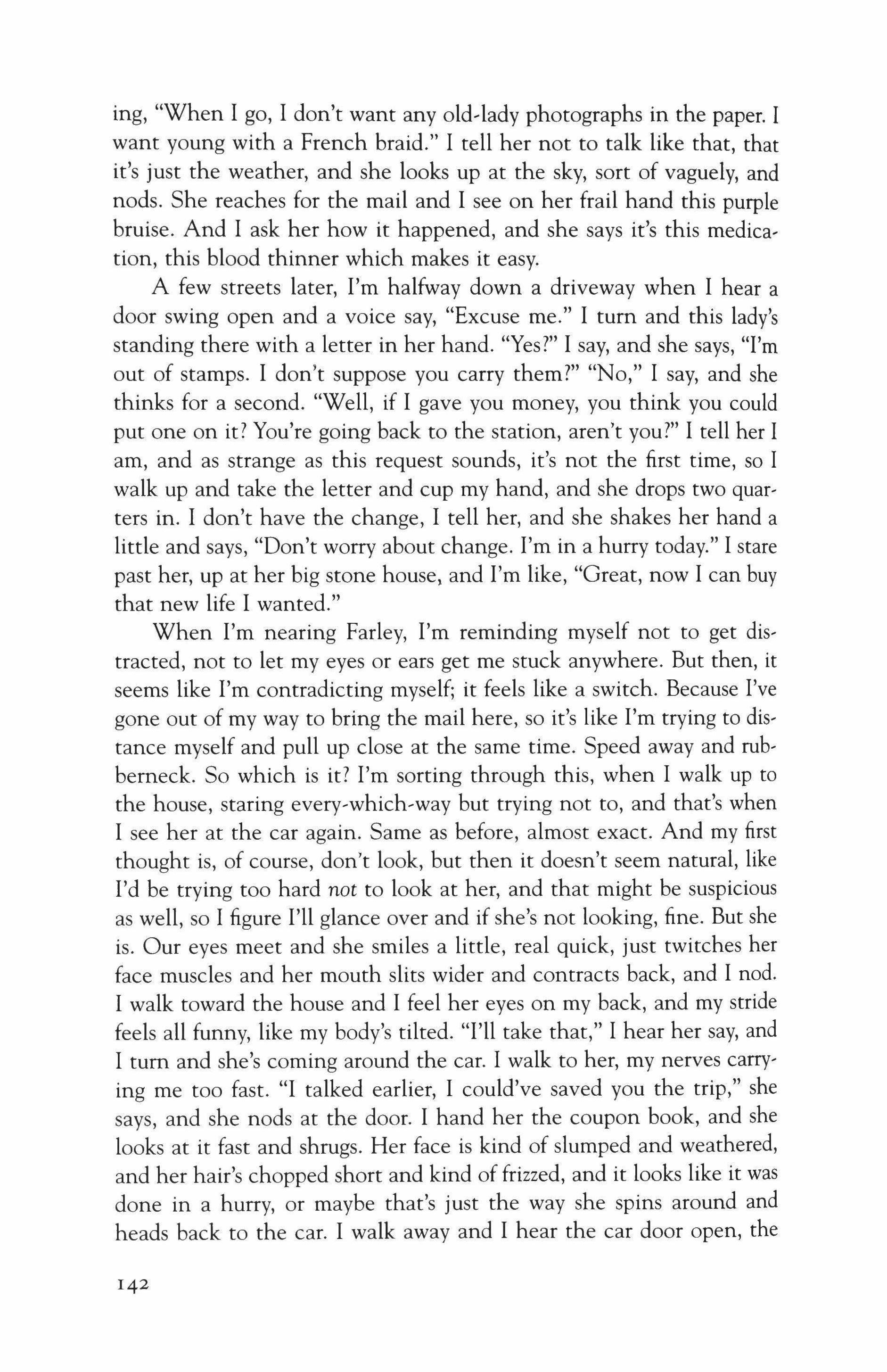
ing, "When I go, I don't want any old-lady photographs in the paper. I want young with a French braid." I tell her not to talk like that, that it's just the weather, and she looks up at the sky, sort of vaguely, and nods. She reaches for the mail and I see on her frail hand this purple bruise. And I ask her how it happened, and she says it's this medication, this blood thinner which makes it easy.
A few streets later, I'm halfway down a driveway when I hear a door swing open and a voice say, "Excuse me." I turn and this lady's standing there with a letter in her hand. "Yes?" I say, and she says, "I'm out of stamps. I don't suppose you carry them?" "No," I say, and she thinks for a second. "Well, if I gave you money, you think you could put one on it? You're going back to the station, aren't you?" I tell her I am, and as strange as this request sounds, it's not the first time, so I walk up and take the letter and cup my hand, and she drops two quarters in. I don't have the change, I tell her, and she shakes her hand a little and says, "Don't worry about change. I'm in a hurry today." I stare past her, up at her big stone house, and I'm like, "Great, now I can buy that new life I wanted."
When I'm nearing Farley, I'm reminding myself not to get distracted, not to let my eyes or ears get me stuck anywhere. But then, it seems like I'm contradicting myself; it feels like a switch. Because I've gone out of my way to bring the mail here, so it's like I'm trying to distance myself and pull up close at the same time. Speed away and rubberneck. So which is it? I'm sorting through this, when I walk up to the house, staring every-which-way but trying not to, and that's when I see her at the car again. Same as before, almost exact. And my first thought is, of course, don't look, but then it doesn't seem natural, like I'd be trying too hard not to look at her, and that might be suspicious as well, so I figure I'll glance over and if she's not looking, fine. But she is. Our eyes meet and she smiles a little, real quick, just twitches her face muscles and her mouth slits wider and contracts back, and I nod. I walk toward the house and I feel her eyes on my back, and my stride feels all funny, like my body's tilted. "I'll take that," I hear her say, and I turn and she's coming around the car. I walk to her, my nerves carrying me too fast. "I talked earlier, I could've saved you the trip," she says, and she nods at the door. I hand her the coupon book, and she looks at it fast and shrugs. Her face is kind of slumped and weathered, and her hair's chopped short and kind of frizzed, and it looks like it was done in a hurry, or maybe that's just the way she spins around and heads back to the car. I walk away and I hear the car door open, the
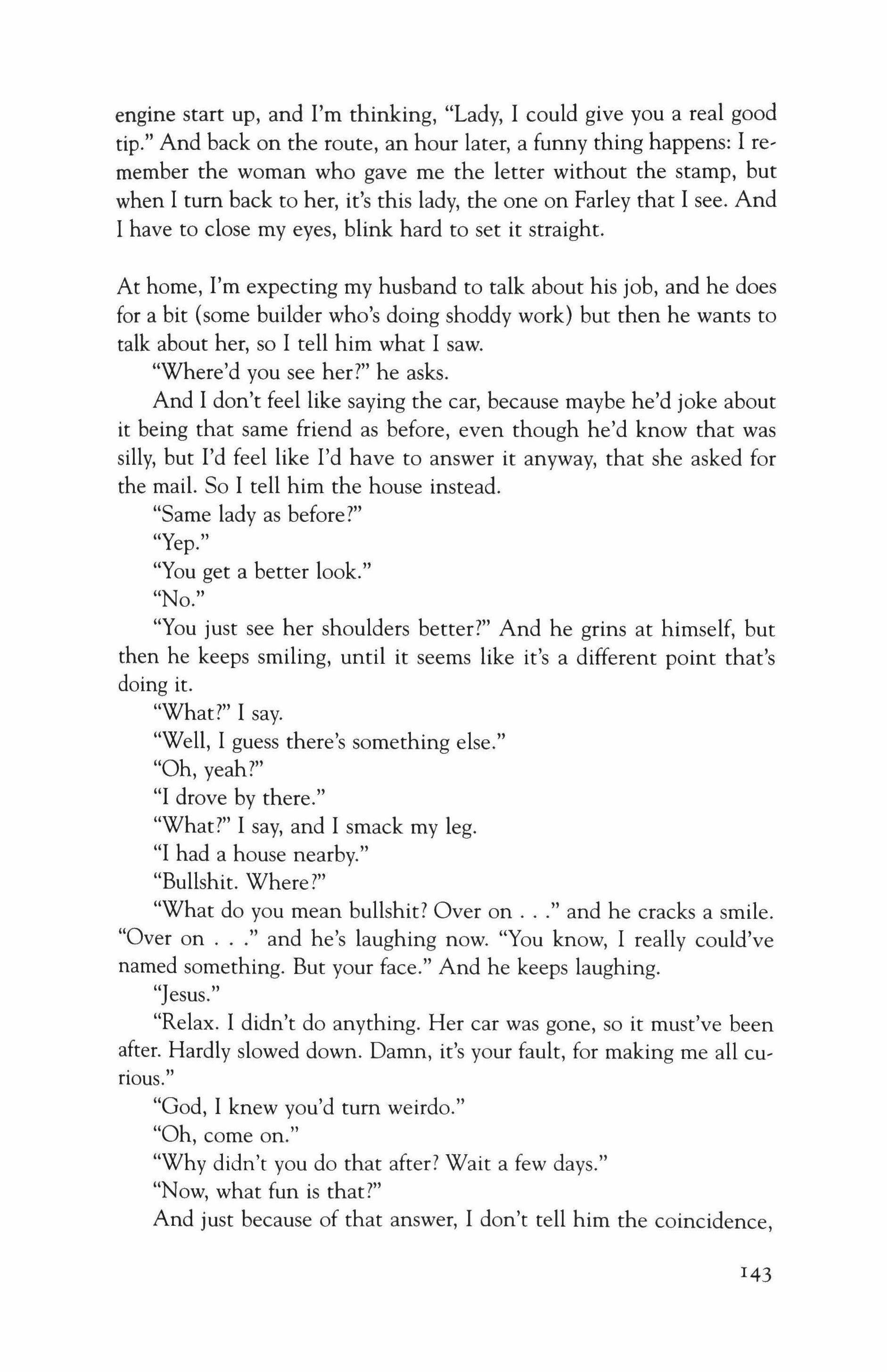
engine start up, and I'm thinking, "Lady, I could give you a real good tip." And back on the route, an hour later, a funny thing happens: I remember the woman who gave me the letter without the stamp, but when I tum back to her, it's this lady, the one on Farley that I see. And I have to close my eyes, blink hard to set it straight.
At home, I'm expecting my husband to talk about his job, and he does for a bit (some builder who's doing shoddy work) but then he wants to talk about her, so I tell him what I saw.
"Where'd you see her?" he asks.
And I don't feel like saying the car, because maybe he'd joke about it being that same friend as before, even though he'd know that was silly, but I'd feel like I'd have to answer it anyway, that she asked for the mail. Sol tell him the house instead.
"Same lady as before?"
"Yep."
"You get a better look."
"No."
"You just see her shoulders better?" And he grins at himself, but then he keeps smiling, until it seems like it's a different point that's doing it.
"What?" I say.
"Well, I guess there's something else."
"Oh, yeah?"
"I drove by there."
"What?" I say, and I smack my leg.
"I had a house nearby."
"Bullshit. Where?"
"What do you mean bullshit? Over on and he cracks a smile. "Over on and he's laughing now. "You know, I really could've named something. But your face." And he keeps laughing.
"Jesus."
"Relax. I didn't do anything. Her car was gone, so it must've been after. Hardly slowed down. Damn, it's your fault, for making me all curious."
"God, I knew you'd tum weirdo."
"Oh, come on."
"Why didn't you do that after? Wait a few days."
"Now, what fun is that?"
And just because of that answer, I don't tell him the coincidence,
143
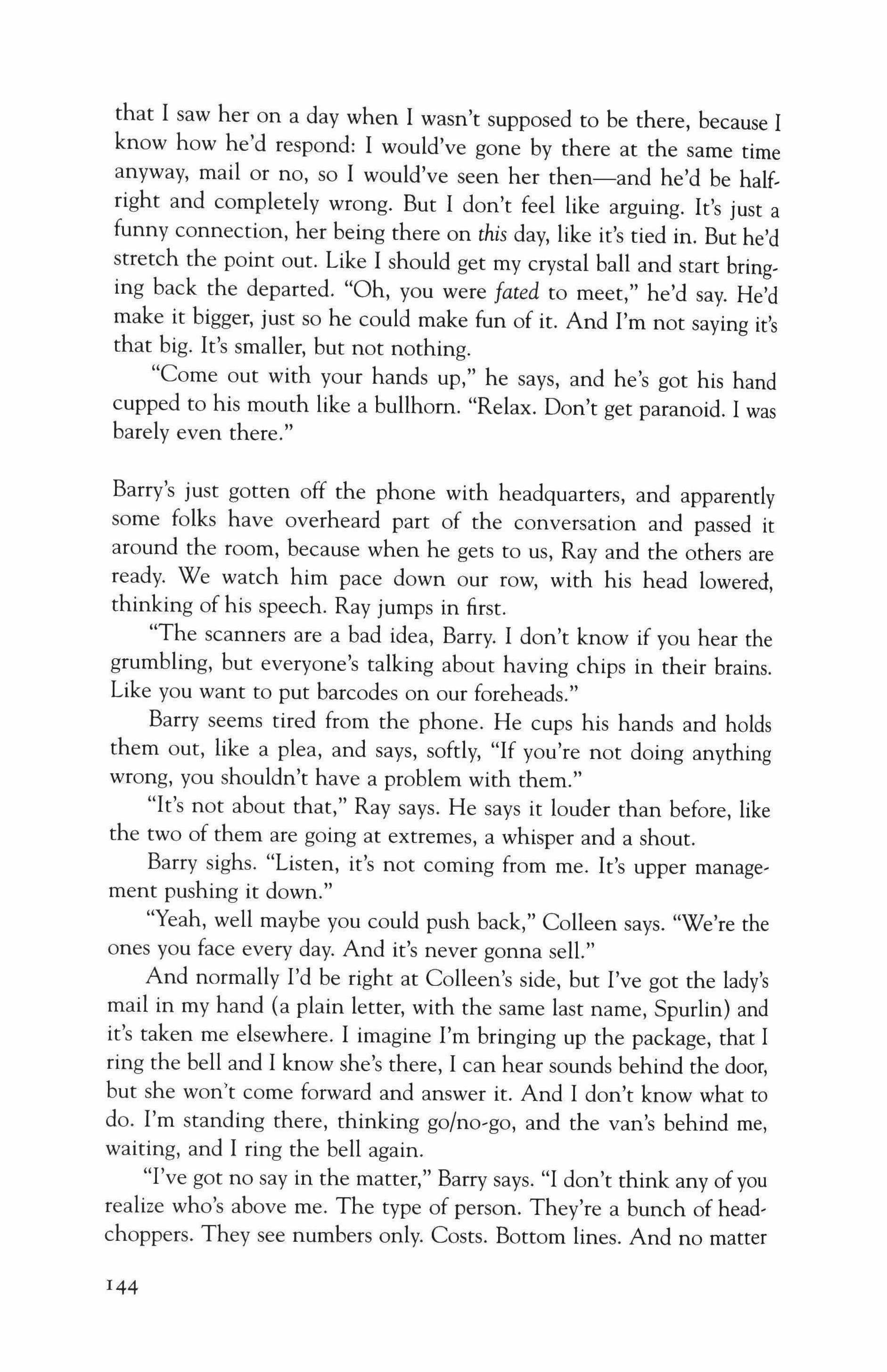
that I saw her on a day when I wasn't supposed to be there, because I know how he'd respond: I would've gone by there at the same time anyway, mail or no, so I would've seen her then-and he'd be halfright and completely wrong. But I don't feel like arguing. It's just a funny connection, her being there on this day, like it's tied in. But he'd stretch the point out. Like I should get my crystal ball and start bringing back the departed. "Oh, you were fated to meet," he'd say. He'd make it bigger, just so he could make fun of it. And I'm not saying it's that big. It's smaller, but not nothing.
"Come out with your hands up," he says, and he's got his hand cupped to his mouth like a bullhorn. "Relax. Don't get paranoid. I was barely even there."
Barry's just gotten off the phone with headquarters, and apparently some folks have overheard part of the conversation and passed it around the room, because when he gets to us, Ray and the others are ready. We watch him pace down our row, with his head lowered, thinking of his speech. Ray jumps in first.
"The scanners are a bad idea, Barry. I don't know if you hear the grumbling, but everyone's talking about having chips in their brains. Like you want to put barcodes on our foreheads."
Barry seems tired from the phone. He cups his hands and holds them out, like a plea, and says, softly, "If you're not doing anything wrong, you shouldn't have a problem with them."
"It's not about that," Ray says. He says it louder than before, like the two of them are going at extremes, a whisper and a shout.
Barry sighs. "Listen, it's not coming from me. It's upper management pushing it down."
"Yeah, well maybe you could push back," Colleen says. "We're the ones you face every day. And it's never gonna sell."
And normally I'd be right at Colleen's side, but I've got the lady's mail in my hand (a plain letter, with the same last name, Spurlin) and it's taken me elsewhere. I imagine I'm bringing up the package, that I ring the bell and I know she's there, I can hear sounds behind the door, but she won't come forward and answer it. And I don't know what to do. I'm standing there, thinking go/no-go, and the van's behind me, waiting, and I ring the bell again.
"I've got no say in the matter," Barry says. "I don't think any of you realize who's above me. The type of person. They're a bunch of headchoppers. They see numbers only. Costs. Bottom lines. And no matter
144

how many times I tell them, they insist: the delivery must be the place to save. And like it or not, we are in a crunch. It's a competitive business out there. We're trying to find a way to bring a uniform delivery to our customers and "
"Hey, save it, Barry," Rays says. "If you're so concerned about money, how come management keeps handing out bonuses for themselves? How come they're just feeding the top?"
"Oh, you wanna ask them that? I'll give you the number. Because that's not my job."
"What is it then?"
And that would seem like a major provocation, but Barry just takes it as an opportunity to explain himself, to lecture us about his responsibility in the world.
"My job is personnel and volume. There's three-hundred feet of mail coming in here each day, and when the volume jumps, I gotta figure out how to deal with it. And when the volume gets low, and we don't have enough to keep you guys busy, I gotta figure out which route to split up. It's a jigsaw puzzle, and I'm the only one who's moving the pieces."
"Well, I guess that makes you master knowledge of all," Colleen says. "Hey, Colleen, you know what your problem is? You need to be a tree in the wind."
"Huh?"
"You need to bend."
And she says huh again, not to the line, but to him.
I look down at the letter, and again it's like some spell. The lady finally comes to the door and I hand her the clipboard and she's signing for the package and she keeps clicking the pen, over and over, until it's not her but me that's doing it, the clicking-my tongue-and I can't get it to stop, and she's just looking sharply, so I try to say something, but there's this wobble in my voice which I can't cough away, and now she's looking even harder.
When I snap back, Colleen and Barry are still arguing-Colleen saying that Barry's "jigsaw puzzle" is really about trying to cram as many ten-hour shifts into eight, and Barry sticking with the character assessment, saying Colleen's not exactly a rule-oriented person and stubborn to the tenth power.
On my route, Miss Daniels says she's doing better, that she must've gotten her battery charged. And she looks it. She comes to the door
145

with knitting needles in her hands, her hair whirred up in all the excitement, and she says she's making a scarf. She seems so chipper, I expect she'll finish it before I get back to the truck.
On Pinckney, I have another thought of the Farley lady, that she's at the door before I reach it (I look up from the path and she's just there), and I see her say something quick to someone behind her who's hidden. I'm at another mailbox when I think this, holding some letter, and maybe it's the other letter, from a family member or ex, the one with the same last name, that's putting another person behind her. And I don't know how it's happened, that this event has become in front of everything else in my mind, whether it was big enough to be like that in the first place or whether I helped make it that way. Or maybe I'm just doing what's natural, something big comes up (car crash, a rainbow) you slow down and gawk at it. Whatever it is, this house on Farley is suddenly a new place.
On Fletcher, I come to a mailbox that says, "Miss Ellen Jameson is NOT deceased." For the last month or so, it's said, "Miss Ellen Jameson is deceased," and the reason, I'm thinking, is that somebody-her sister Linda, probably, who lives there, too-was getting tired of all her sister's junk mail, so she fixed it with the sign. Except she forgot that her sister had some of the bills in her name, so now she's trying to undo it. On any other day, this would be funny-a real story for the guys-but I'm staring at the shaky script and the wording and it just spooks me, like the whole route is playing tricks.
When I park on Farley and approach her house, I'm cradling a stack of mail, keeping my head down, looking preoccupied. Whenever I feel the urge to look around, I just go back to the stack of mail and act like it's some intricate arrangement. At her house, though, I'm distracted by another car in the driveway. Pulled up behind the sedan is a brand-new Camry, black with gold lettering, and it must've just gotten here because the engine's still ticking. I walk up the path, flip the top of the box, and then I see a letter.
There's a lot of similarities with my husband's job. There's the houses part (I'm delivering to them, he's looking them over) and dealing with the public, where we both get some headcases: like Miss Jameson being dead and not dead, and him last week getting this couple who wanted all the radiators taken out of the house because they were afraid they'd bum their hands, and my husband was looking at the doors, like maybe they should go too because you might catch a finger. And then there's
146
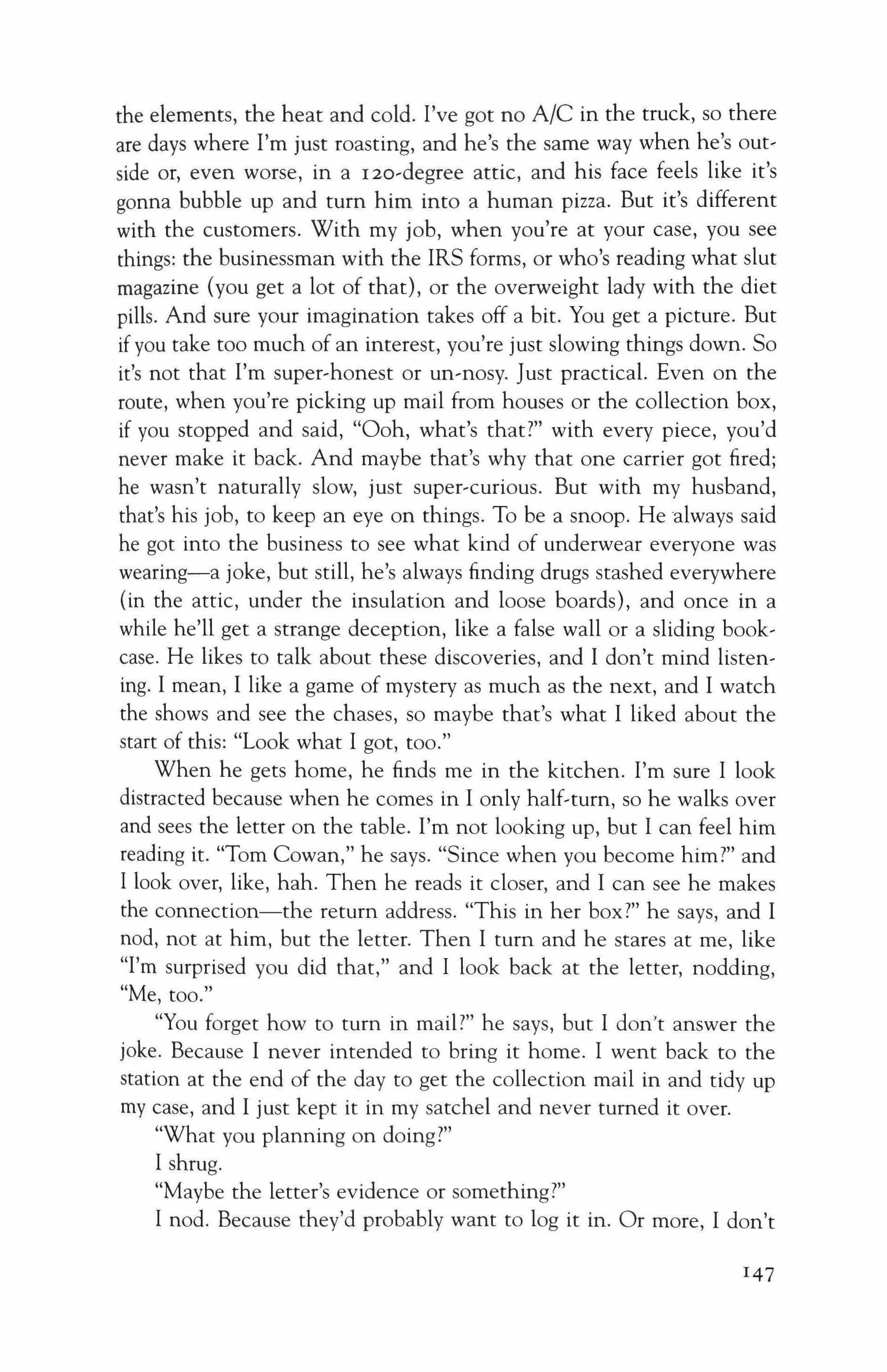
the elements, the heat and cold. I've got no AIC in the truck, so there are days where I'm just roasting, and he's the same way when he's outside or, even worse, in a rzo-degree attic, and his face feels like it's gonna bubble up and turn him into a human pizza. But it's different with the customers. With my job, when you're at your case, you see things: the businessman with the IRS forms, or who's reading what slut magazine (you get a lot of that), or the overweight lady with the diet pills. And sure your imagination takes off a bit. You get a picture. But if you take too much of an interest, you're just slowing things down. So it's not that I'm super-honest or un-nosv, Just practical. Even on the route, when you're picking up mail from houses or the collection box, if you stopped and said, "Ooh, what's that?" with every piece, you'd never make it back. And maybe that's why that one carrier got fired; he wasn't naturally slow, just super-curious. But with my husband, that's his job, to keep an eye on things. To be a snoop. He always said he got into the business to see what kind of underwear everyone was wearing-a joke, but still, he's always finding drugs stashed everywhere (in the attic, under the insulation and loose boards), and once in a while he'll get a strange deception, like a false wall or a sliding bookcase. He likes to talk about these discoveries, and I don't mind listening. I mean, I like a game of mystery as much as the next, and I watch the shows and see the chases, so maybe that's what I liked about the start of this: "Look what I got, too."
When he gets home, he finds me in the kitchen. I'm sure I look distracted because when he comes in I only half-turn, so he walks over and sees the letter on the table. I'm not looking up, but I can feel him reading it. "Tom Cowan," he says. "Since when you become him?" and I look over, like, hah. Then he reads it closer, and I can see he makes the connection-the return address. "This in her box?" he says, and I nod, not at him, but the letter. Then I turn and he stares at me, like "I'm surprised you did that," and I look back at the letter, nodding, "Me, too."
"You forget how to turn in mail?" he says, but I don't answer the joke. Because I never intended to bring it home. I went back to the station at the end of the day to get the collection mail in and tidy up my case, and I just kept it in my satchel and never turned it over.
"What you planning on doing?"
I shrug.
"Maybe the letter's evidence or something?"
I nod. Because they'd probably want to log it in. Or more, I don't

know. "Except if she didn't leave it up in the box, but just took it elsewhere, then it gets through without any notice." And the whole point of the week is not what's coming out of her house, but what's going in. That's what the agents said, so they would have mentioned it if it was important. But then again, they almost forgot to mention the mail at all, until one of the sidekicks stepped in.
"Well, that's her luck." And his face stays serious for a while, but then cracks up. "So you gonna open it?"
"No."
"Well, what'd you bring it home for?"
And I shrug because I don't know.
"Just gonna stare at it?"
"That's right." And when I say that, it feels like the right answer. It feels enough to me.
"You want me to open it?"
"You wouldn't do that, would you?"
"I don't know. No, right? Hey, don't be such a tease."
"What do you mean?"
"Well, don't bring it home and then get moral. I mean, why's it here then?"
"I don't know." It just became a decision and I wasn't expecting any of that. I hadn't put a thought there. But I shouldn't have needed to, because there never was one before. Nothing more than reaction.
"So, you're gonna turn it in then?"
"Yeah. Tomorrow." It's just, they shouldn't have given me a week, or whatever it's gonna be, to think about it. If they had told me on the day, I would have taken the package right up there without much thought. A week's a whole lot longer to get in my head. Make my thoughts wander, and all these notions coming up. A day is a day, but a week's on and on.
"You don't sound so sure."
"Listen, I'm going to. I just wasn't ready yet." It just felt like I was giving up a moment.
That night, I dream that she comes to my door. She doesn't ring the bell or knock or anything, but I see her hand on the knob, turning (funny that I can still be inside and see that), but I go to the door and answer it. She says I have something for her. And I think for a second, unsure of how to answer, but then I nod and say, "Maybe, I'll check," and I go to get the letter, but when I get to the kitchen, it's the package there instead and the tape's peeled back, so it looks like I've tam-
148
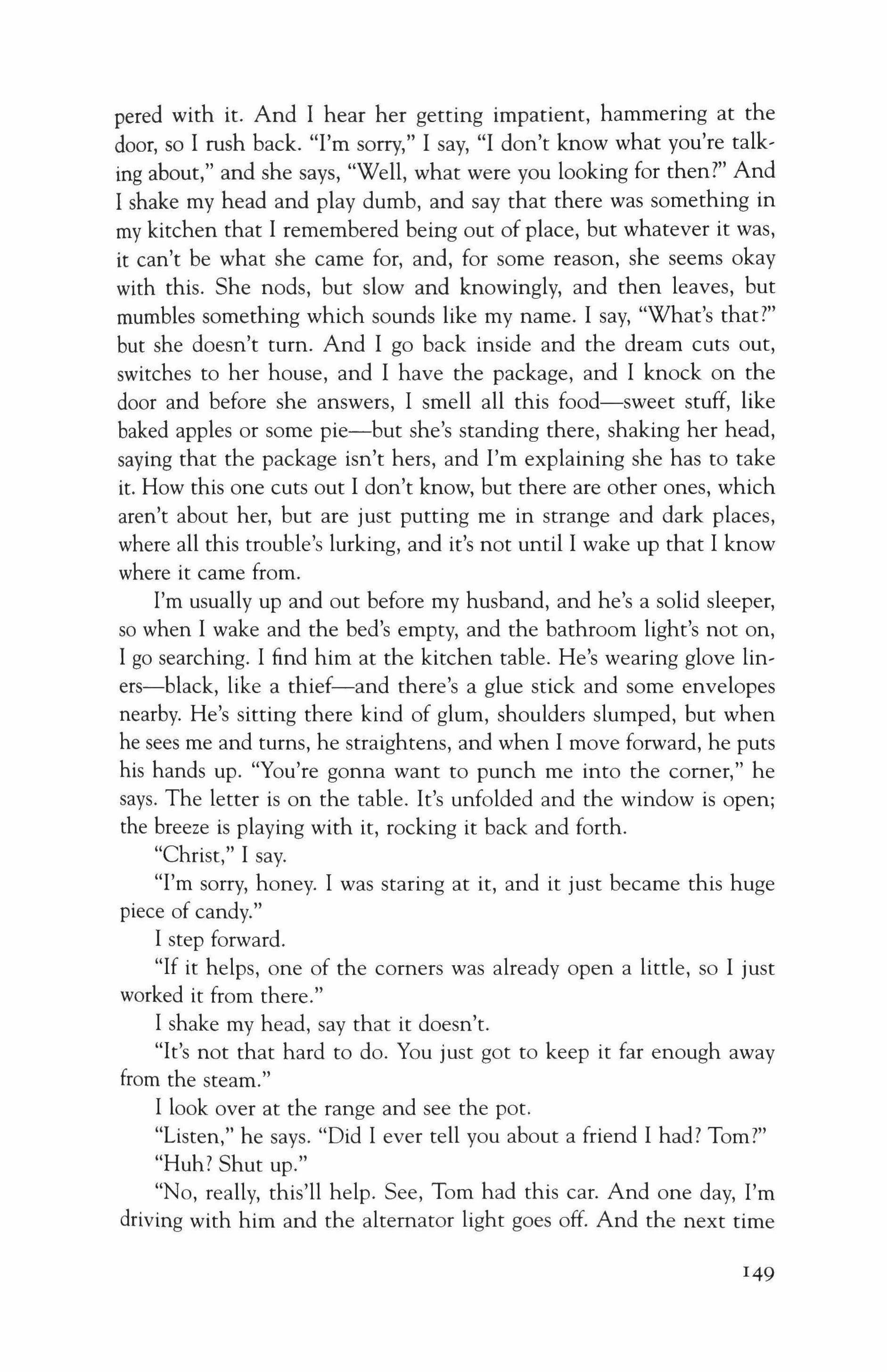
pered with it. And I hear her getting impatient, hammering at the door, so I rush back. "I'm sorry," I say, "I don't know what you're talking about," and she says, "Well, what were you looking for then?" And I shake my head and play dumb, and say that there was something in my kitchen that I remembered being out of place, but whatever it was, it can't be what she came for, and, for some reason, she seems okay with this. She nods, but slow and knowingly, and then leaves, but mumbles something which sounds like my name. I say, "What's that?" but she doesn't turn. And I go back inside and the dream cuts out, switches to her house, and I have the package, and I knock on the door and before she answers, I smell all this food-sweet stuff, like baked apples or some pie-but she's standing there, shaking her head, saying that the package isn't hers, and I'm explaining she has to take it. How this one cuts out I don't know, but there are other ones, which aren't about her, but are just putting me in strange and dark places, where all this trouble's lurking, and it's not until I wake up that I know where it came from.
I'm usually up and out before my husband, and he's a solid sleeper, so when I wake and the bed's empty, and the bathroom light's not on, I go searching. I find him at the kitchen table. He's wearing glove liners-black, like a thief-and there's a glue stick and some envelopes nearby. He's sitting there kind of glum, shoulders slumped, but when he sees me and turns, he straightens, and when I move forward, he puts his hands up. "You're gonna want to punch me into the corner," he says. The letter is on the table. It's unfolded and the window is open; the breeze is playing with it, rocking it back and forth.
"Christ," I say.
"I'm sorry, honey. I was staring at it, and it just became this huge piece of candy."
I step forward.
"If it helps, one of the corners was already open a little, so I just worked it from there."
I shake my head, say that it doesn't.
"It's not that hard to do. You just got to keep it far enough away from the steam."
I look over at the range and see the pot.
"Listen," he says. "Did I ever tell you about a friend I had? Tom?"
"Huh? Shut up."
"No, really, this'll help. See, Tom had this car. And one day, I'm driving with him and the alternator light goes off. And the next time
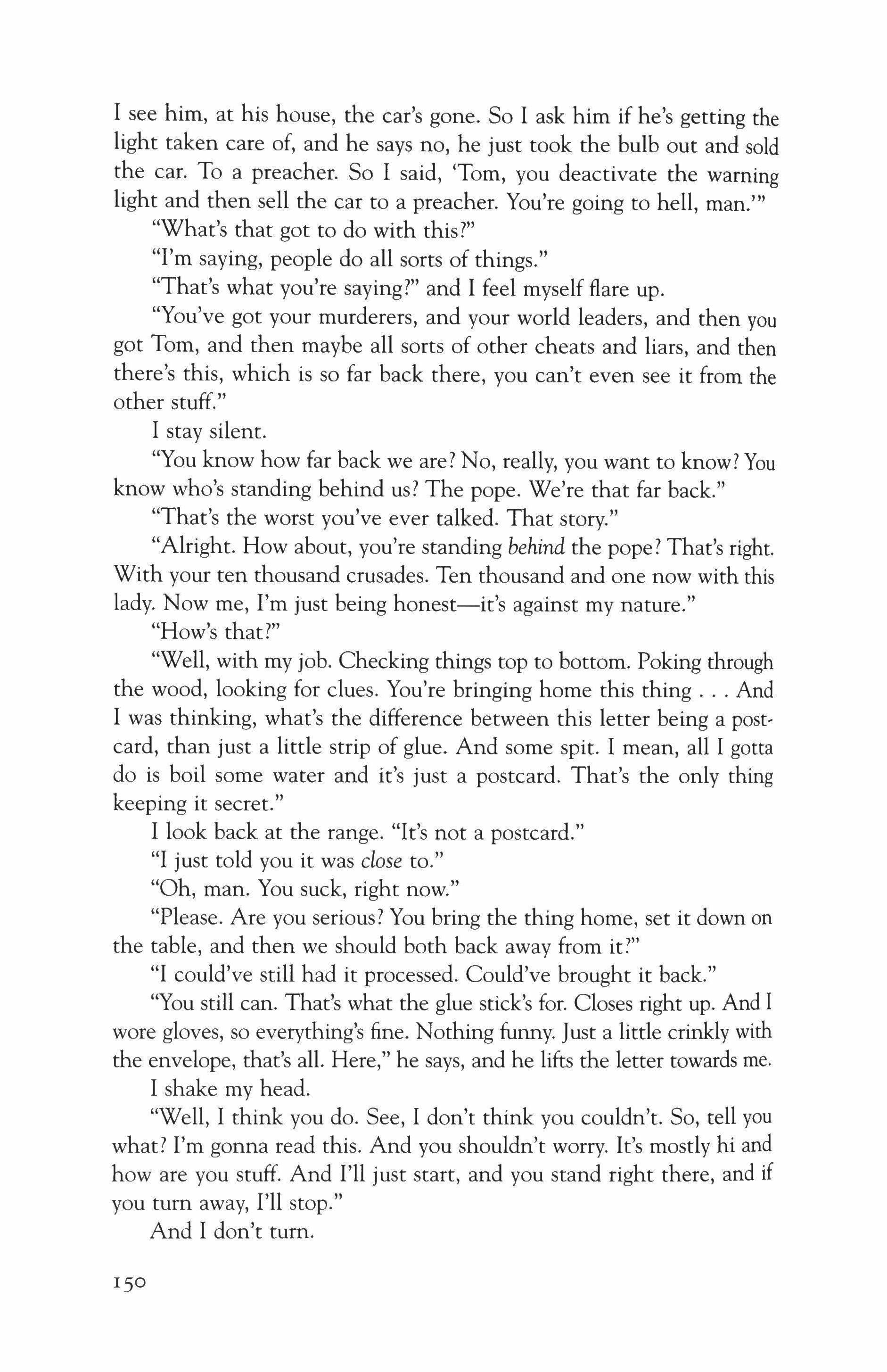
I see him, at his house, the car's gone. So I ask him if he's getting the light taken care of, and he says no, he just took the bulb out and sold the car. To a preacher. So I said, 'Tom, you deactivate the warning light and then sell the car to a preacher. You're going to hell, man.'"
"What's that got to do with this?"
"I'm saying, people do all sorts of things."
"That's what you're saying?" and I feel myself flare up.
"You've got your murderers, and your world leaders, and then you got Tom, and then maybe all sorts of other cheats and liars, and then there's this, which is so far back there, you can't even see it from the other stuff."
I stay silent.
"You know how far back we are? No, really, you want to know? You know who's standing behind us? The pope. We're that far back."
"That's the worst you've ever talked. That story."
"Alright. How about, you're standing behind the pope? That's right. With your ten thousand crusades. Ten thousand and one now with this lady. Now me, I'm just being honest-it's against my nature."
"How's that?"
"Well, with my job. Checking things top to bottom. Poking through the wood, looking for clues. You're bringing home this thing And I was thinking, what's the difference between this letter being a postcard, than just a little strip of glue. And some spit. I mean, all I gotta do is boil some water and it's just a postcard. That's the only thing keeping it secret."
I look back at the range. "It's not a postcard."
"I just told you it was close to."
"Oh, man. You suck, right now."
"Please. Are you serious? You bring the thing home, set it down on the table, and then we should both back away from it?"
"I could've still had it processed. Could've brought it back."
"You still can. That's what the glue stick's for. Closes right up. And I wore gloves, so everything's fine. Nothing funny. Just a little crinkly with the envelope, that's all. Here," he says, and he lifts the letter towards me.
I shake my head.
"Well, I think you do. See, I don't think you couldn't. So, tell you what? I'm gonna read this. And you shouldn't worry. It's mostly hi and how are you stuff. And I'll just start, and you stand right there, and if you tum away, I'll stop."
And I don't tum.
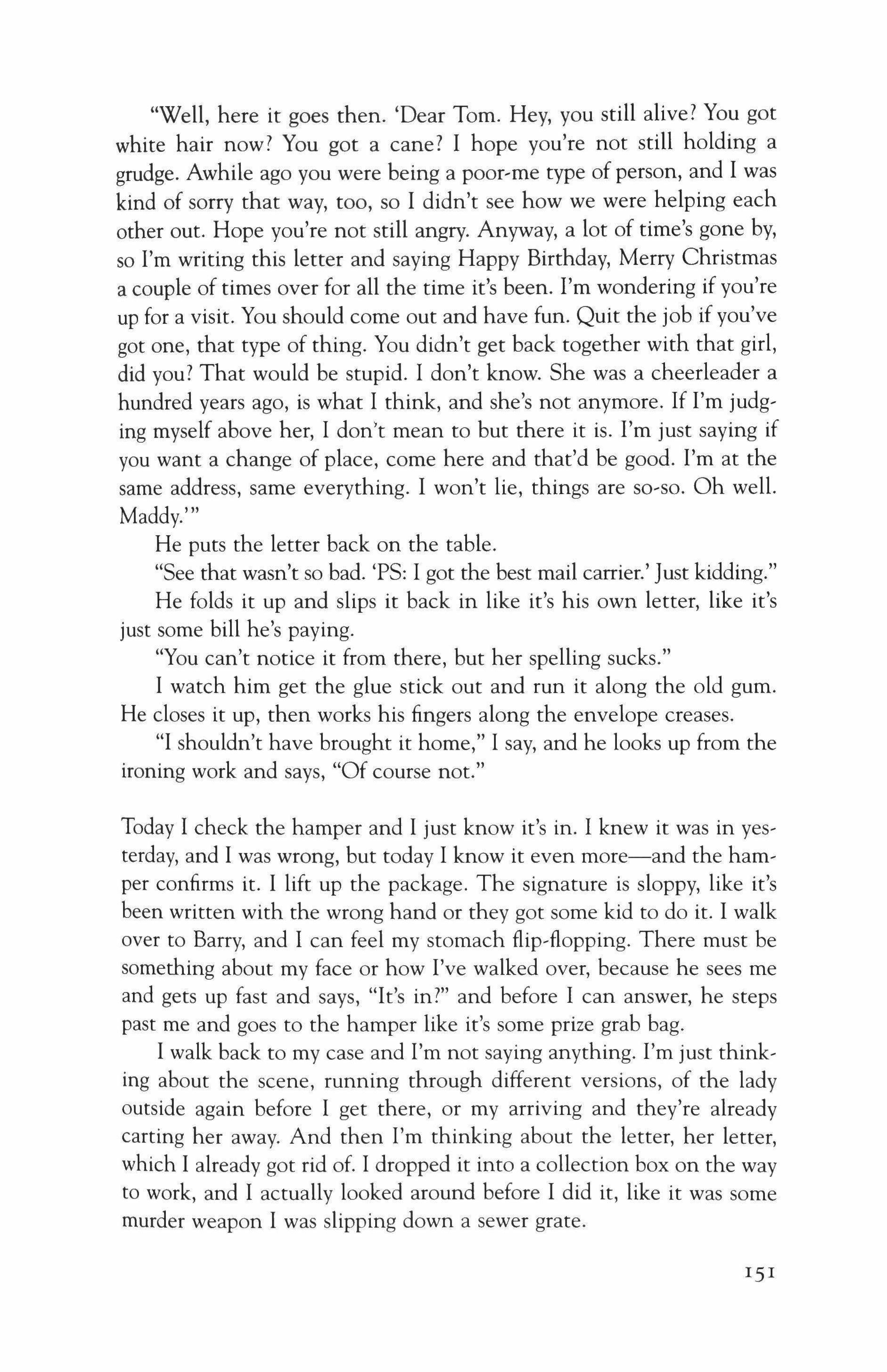
"Well, here it goes then. 'Dear Tom. Hey, you still alive? You got white hair now? You got a cane? I hope you're not still holding a grudge. Awhile ago you were being a poor'me type of person, and I was kind of sorry that way, too, so I didn't see how we were helping each other out. Hope you're not still angry. Anyway, a lot of time's gone by, so I'm writing this letter and saying Happy Birthday, Merry Christmas a couple of times over for all the time it's been. I'm wondering if you're up for a visit. You should come out and have fun. Quit the job if you've got one, that type of thing. You didn't get back together with that girl, did you? That would be stupid. I don't know. She was a cheerleader a hundred years ago, is what I think, and she's not anymore. If I'm judging myself above her, I don't mean to but there it is. I'm just saying if you want a change of place, come here and that'd be good. I'm at the same address, same everything. I won't lie, things are so-so. Oh well. Maddy."
He puts the letter back on the table.
"See that wasn't so bad. "PS: I got the best mail carrier.' Just kidding."
He folds it up and slips it back in like it's his own letter, like it's just some bill he's paying.
"You can't notice it from there, but her spelling sucks."
I watch him get the glue stick out and run it along the old gum. He closes it up, then works his fingers along the envelope creases.
"I shouldn't have brought it home," I say, and he looks up from the ironing work and says, "Of course not."
Today I check the hamper and I just know it's in. I knew it was in yes, terday, and I was wrong, but today I know it even more-and the ham, per confirms it. I lift up the package. The signature is sloppy, like it's been written with the wrong hand or they got some kid to do it. I walk over to Barry, and I can feel my stomach flip-flopping. There must be something about my face or how I've walked over, because he sees me and gets up fast and says, "It's in?" and before I can answer, he steps past me and goes to the hamper like it's some prize grab bag.
I walk back to my case and I'm not saying anything. I'm just think, ing about the scene, running through different versions, of the lady outside again before I get there, or my arriving and they're already carting her away. And then I'm thinking about the letter, her letter, which I already got rid of. I dropped it into a collection box on the way to work, and I actually looked around before I did it, like it was some murder weapon I was slipping down a sewer grate.
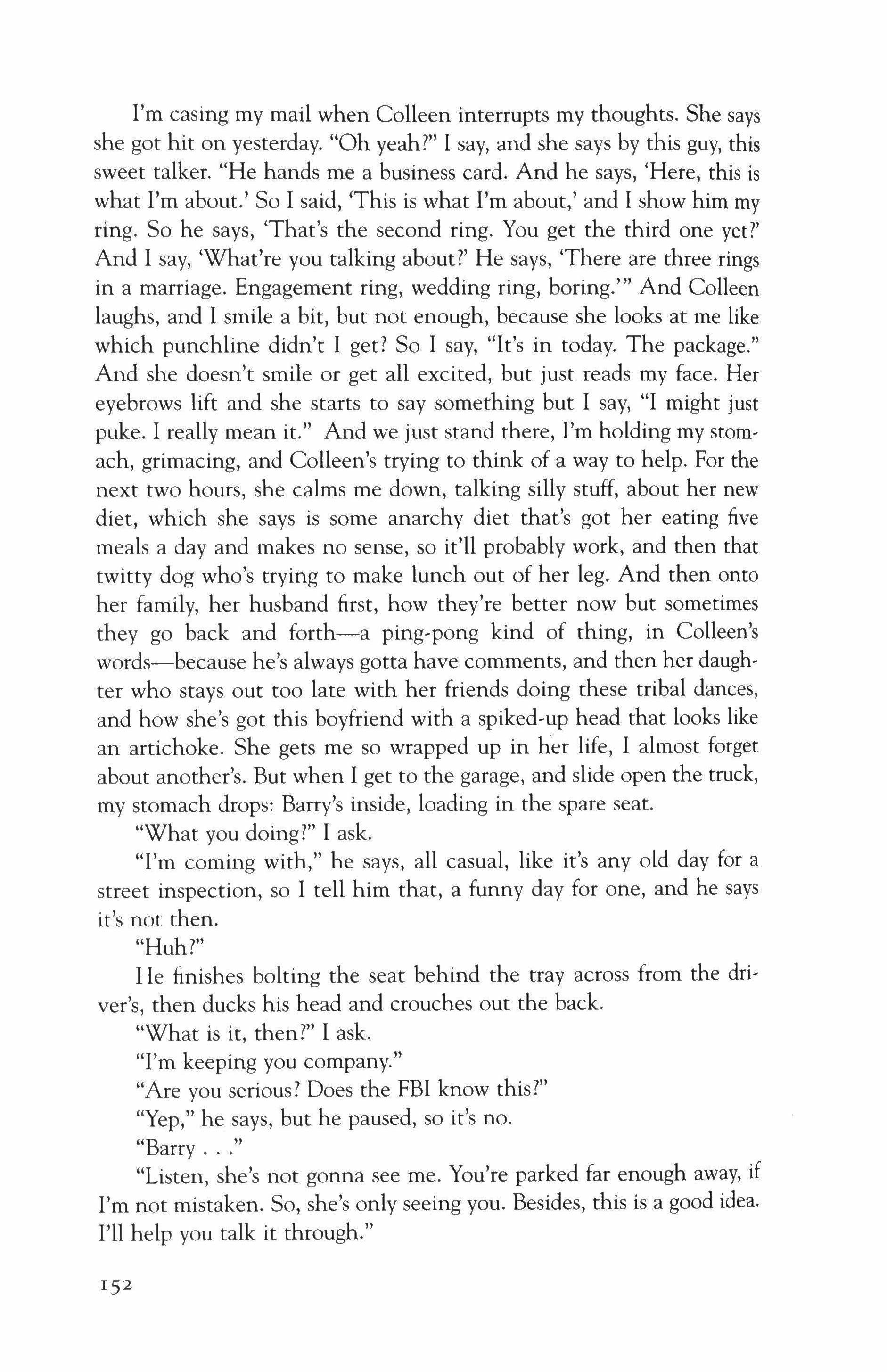
I'm casing my mail when Colleen interrupts my thoughts. She says she got hit on yesterday. "Oh yeah?" I say, and she says by this guy, this sweet talker. "He hands me a business card. And he says, 'Here, this is what I'm about.' So I said, 'This is what I'm about,' and I show him my ring. So he says, 'That's the second ring. You get the third one yet?' And I say, 'What're you talking about?' He says, 'There are three rings in a marriage. Engagement ring, wedding ring, boring.'" And Colleen laughs, and I smile a bit, but not enough, because she looks at me like which punchline didn't I get? So I say, "It's in today. The package." And she doesn't smile or get all excited, but just reads my face. Her eyebrows lift and she starts to say something but I say, "I might just puke. I really mean it." And we just stand there, I'm holding my stomach, grimacing, and Colleen's trying to think of a way to help. For the next two hours, she calms me down, talking silly stuff, about her new diet, which she says is some anarchy diet that's got her eating five meals a day and makes no sense, so it'll probably work, and then that twitty dog who's trying to make lunch out of her leg. And then onto her family, her husband first, how they're better now but sometimes they go back and forth-a ping-pong kind of thing, in Colleen's words-because he's always gotta have comments, and then her daughter who stays out too late with her friends doing these tribal dances, and how she's got this boyfriend with a spiked-up head that looks like an artichoke. She gets me so wrapped up in her life, I almost forget about another's. But when I get to the garage, and slide open the truck, my stomach drops: Barry's inside, loading in the spare seat.
"What you doing?" I ask.
"I'm coming With," he says, all casual, like it's any old day for a street inspection, so I tell him that, a funny day for one, and he says it's not then.
"Huh?"
He finishes bolting the seat behind the tray across from the driver's, then ducks his head and crouches out the back.
"What is it, then?" I ask.
"I'm keeping you company."
"Are you serious! Does the FBI know this!"
"Yep," he says, but he paused, so it's no.
"Barry
"Listen, she's not gonna see me. You're parked far enough away, if I'm not mistaken. So, she's only seeing you. Besides, this is a good idea. I'll help you talk it through."
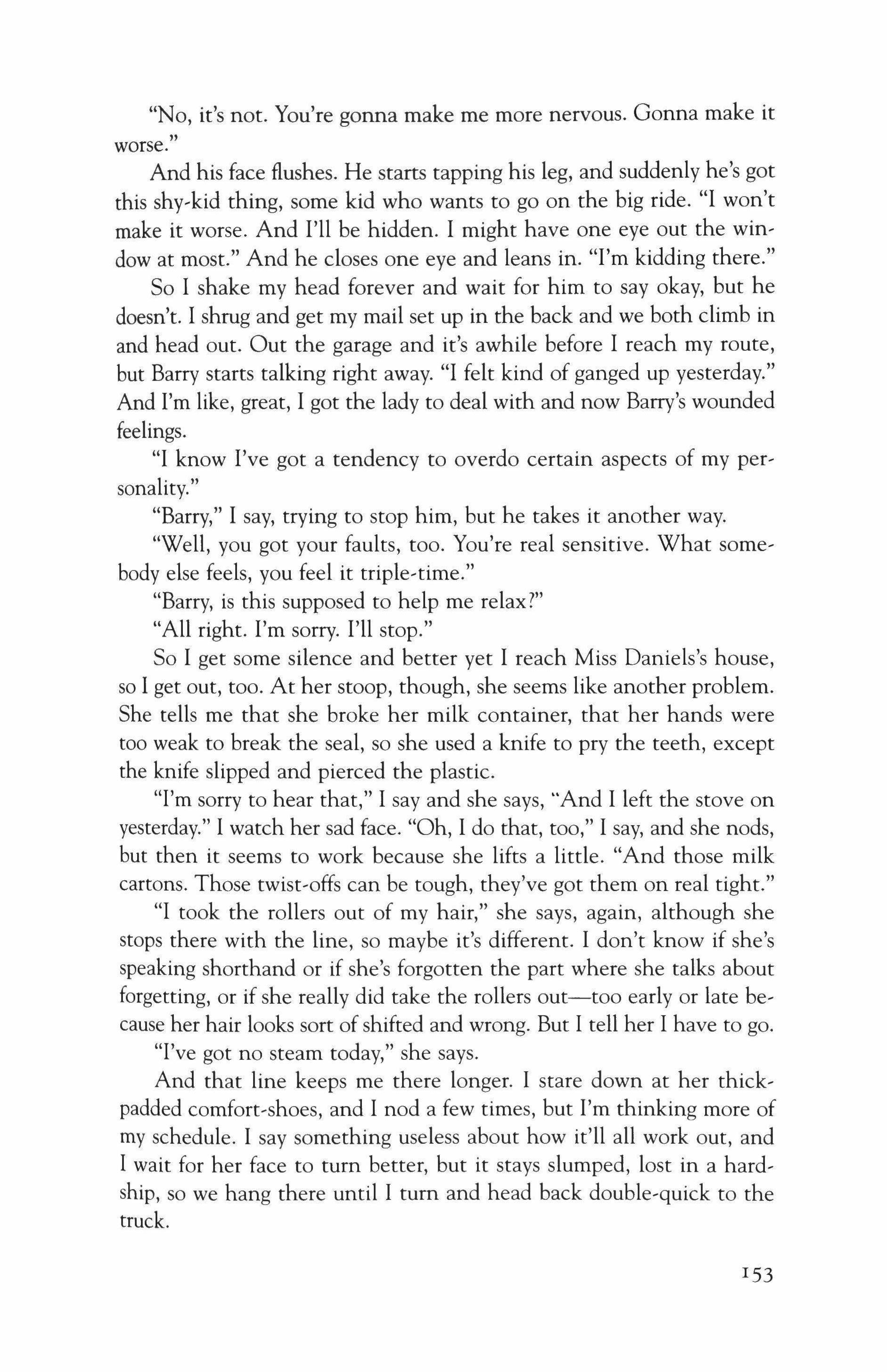
"No, it's not. You're gonna make me more nervous. Gonna make it worse.
And his face flushes. He starts tapping his leg, and suddenly he's got this shy-kid thing, some kid who wants to go on the big ride. "I won't make it worse. And I'll be hidden. I might have one eye out the window at most." And he closes one eye and leans in. "I'm kidding there."
So I shake my head forever and wait for him to say okay, but he doesn't. I shrug and get my mail set up in the back and we both climb in and head out. Out the garage and it's awhile before I reach my route, but Barry starts talking right away. "I felt kind of ganged up yesterday." And I'm like, great, I got the lady to deal with and now Barry's wounded feelings.
"I know I've got a tendency to overdo certain aspects of my personality."
"Barry," I say, trying to stop him, but he takes it another way.
"Well, you got your faults, too. You're real sensitive. What somebody else feels, you feel it triple-time."
"Barry, is this supposed to help me relax!"
"All right. I'm sorry. I'll stop."
So I get some silence and better yet I reach Miss Daniels's house, so I get out, too. At her stoop, though, she seems like another problem. She tells me that she broke her milk container, that her hands were too weak to break the seal, so she used a knife to pry the teeth, except the knife slipped and pierced the plastic.
"I'm sorry to hear that," I say and she says, "And I left the stove on yesterday." I watch her sad face. "Oh, I do that, too," I say, and she nods, but then it seems to work because she lifts a little. "And those milk cartons. Those twist-offs can be tough, they've got them on real tight."
"I took the rollers out of my hair," she says, again, although she stops there with the line, so maybe it's different. I don't know if she's speaking shorthand or if she's forgotten the part where she talks about forgetting, or if she really did take the rollers out-too early or late because her hair looks sort of shifted and wrong. But I tell her I have to go.
"I've got no steam today," she says.
And that line keeps me there longer. I stare down at her thickpadded comfort-shoes, and I nod a few times, but I'm thinking more of my schedule. I say something useless about how it'll all work out, and I wait for her face to turn better, but it stays slumped, lost in a hardship, so we hang there until I turn and head back double-quick to the truck.
153
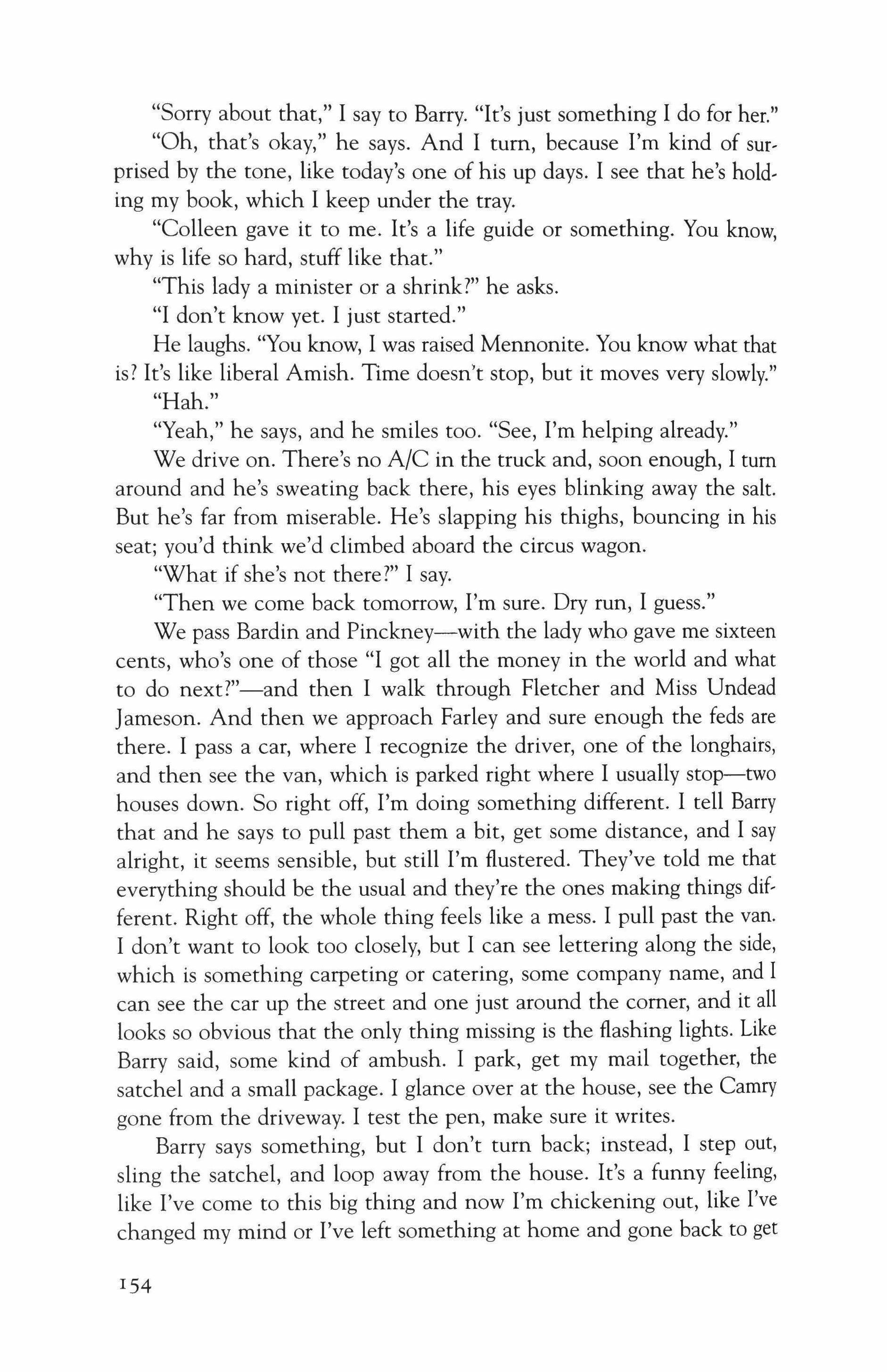
"Sorry about that," I say to Barry. "It's just something I do for her."
"Oh, that's okay," he says. And I tum, because I'm kind of surprised by the tone, like today's one of his up days. I see that he's holding my book, which I keep under the tray.
"Colleen gave it to me. It's a life guide or something. You know, why is life so hard, stuff like that."
"This lady a minister or a shrink?" he asks.
"I don't know yet. I just started."
He laughs. "You know, I was raised Mennonite. You know what that is? It's like liberal Amish. Time doesn't stop, but it moves very slowly."
"Hah."
"Yeah," he says, and he smiles too. "See, I'm helping already."
We drive on. There's no AIC in the truck and, soon enough, I turn around and he's sweating back there, his eyes blinking away the salt. But he's far from miserable. He's slapping his thighs, bouncing in his seat; you'd think we'd climbed aboard the circus wagon.
"What if she's not there?" I say.
"Then we come back tomorrow, I'm sure. Dry run, I guess."
We pass Bardin and Pinckney-with the lady who gave me sixteen cents, who's one of those "I got all the money in the world and what to do next?"-and then I walk through Fletcher and Miss Undead Jameson. And then we approach Farley and sure enough the feds are there. I pass a car, where I recognize the driver, one of the longhairs, and then see the van, which is parked right where I usually stop-two houses down. So right off, I'm doing something different. I tell Barry that and he says to pull past them a bit, get some distance, and I say alright, it seems sensible, but still I'm flustered. They've told me that everything should be the usual and they're the ones making things different. Right off, the whole thing feels like a mess. I pull past the van. I don't want to look too closely, but I can see lettering along the side, which is something carpeting or catering, some company name, and I can see the car up the street and one just around the comer, and it all looks so obvious that the only thing missing is the flashing lights. Like Barry said, some kind of ambush. I park, get my mail together, the satchel and a small package. I glance over at the house, see the Camry gone from the driveway. I test the pen, make sure it writes.
Barry says something, but I don't tum back; instead, I step out, sling the satchel, and loop away from the house. It's a funny feeling, like I've come to this big thing and now I'm chickening out, like I've changed my mind or I've left something at home and gone back to get
154

it. And also, I feel late, like these cars have been here all morning waiting for me. And I wonder how long that's been, how long since they've been started.
I do the first loop and get back to the truck. I grab more mail and the package, which I hold out in front of me like a cake or something fragile. My mouth goes dry, and I feel my face flooding, and my shirt turning wet, and thank god it's hot so I can blame it on that. I'm thinking of when I knock on the door, and hoping she doesn't ask who it is, so I don't have to call through and identify myself, because I don't trust my voice right now. I'm afraid to say more than "Package," like if I do, all this other stuff will come tumbling out and I'll be sending signals. I hear it in my head, "Package," and I'm hearing how it sounds nervous, and I'm trying to make it better. I reach the door and ring the bell-the pinging sound all cheery and ridiculous-and then I think how if she's not home, I've gotta do this all again. But she opens it straightaway. "Package," I say and it sounds better than expected, direct and nonchalant. She steps out from the door. She looks at the package and her eyes widen quickly. She's got deep circles. Her face is tight {and so is mine, I'm sure, because the skin feels like it doesn't fit}, and she's so close I can smell her gum. There's hoop earrings dangling from her ears and maybe she's worn them before and I never noticed, but it makes me feel like she's dressed up for the day. I take the slip from my shirt pocket and hold it against the package, and I click the pen and hand it to her. She eyes me for a second and looks down at the slip, like maybe she's reconsidering it. Then she says, "Right here?" and I can hear the nerves in her voice, like just saying it makes her jumpy. Her eyes dart around and I'm hoping she won't look at the van. Then she licks her lips. She's about as obvious as the van and the crowd spread out behind us-and- if they're obvious and she's obvious, where's that leave me? But I can see she's not watching me, checking my behavior; she's too busy acting relaxed. She's turned in on herself, gone into her own scared head. And this relaxes me. I'm no less scared-just shifted some of it onto her. She looks down at the line again, the pen in her hand, and her mouth opens a bit. Then she signs it, a crazy scrawl, and I stare at her fingers curling around the pen. I pocket the slip and hand her the package and the mail, and I watch her grab it, too fast, then pinch her lips and step back inside.
I walk away. And it's over but it's not, because I'm done with her, but now I gotta go through the rest of the block-for appearances, for my benefit, not hers. So her role is done, but mine's only halfway. At
155
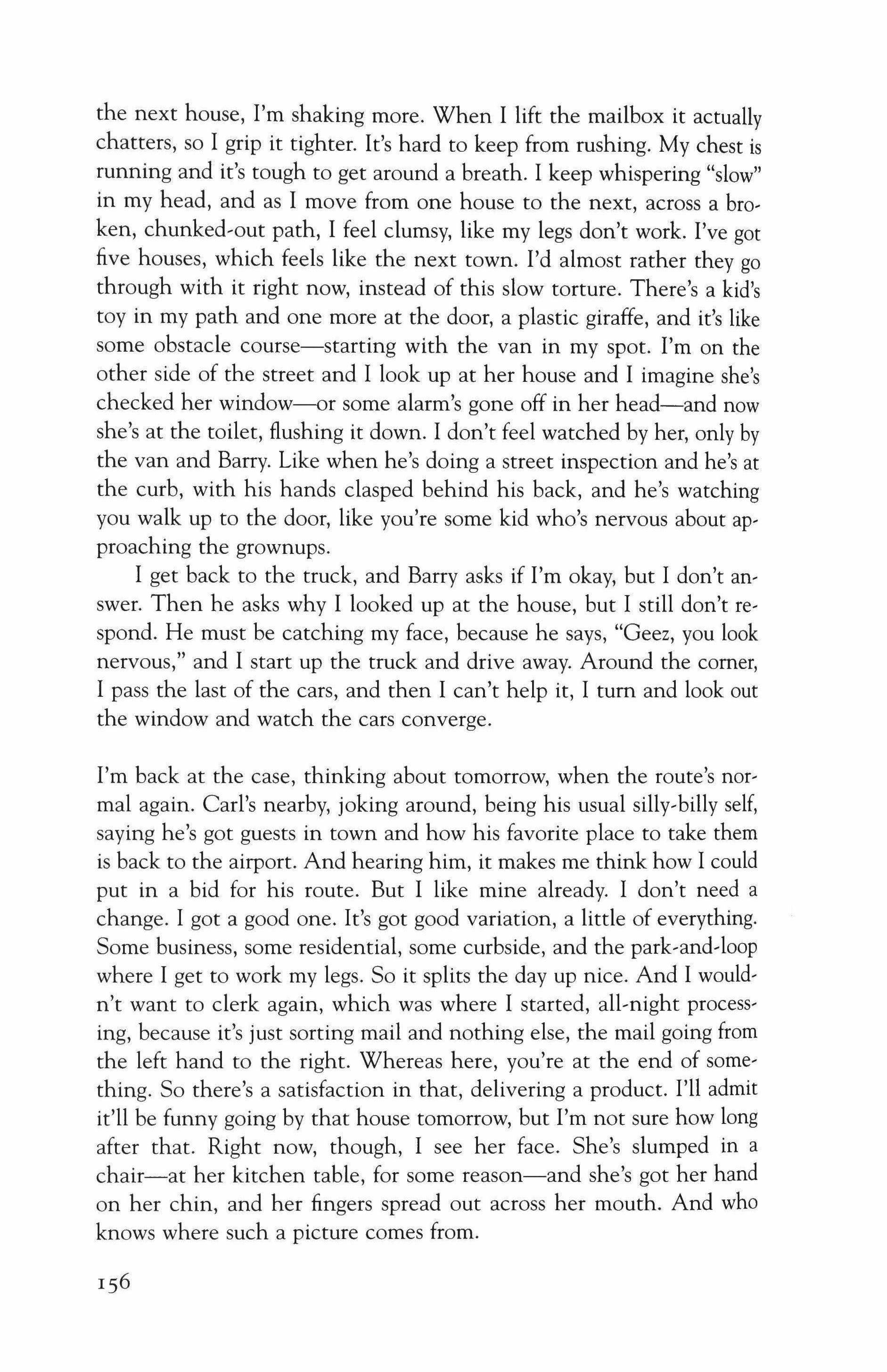
the next house, I'm shaking more. When I lift the mailbox it actually chatters, so I grip it tighter. It's hard to keep from rushing. My chest is running and it's tough to get around a breath. I keep whispering "slow" in my head, and as I move from one house to the next, across a broken, chunked-out path, I feel clumsy, like my legs don't work. I've got five houses, which feels like the next town. I'd almost rather they go through with it right now, instead of this slow torture. There's a kid's toy in my path and one more at the door, a plastic giraffe, and it's like some obstacle course-starting with the van in my spot. I'm on the other side of the street and I look up at her house and I imagine she's checked her window-or some alarm's gone off in her head-and now she's at the toilet, flushing it down. I don't feel watched by her, only by the van and Barry. Like when he's doing a street inspection and he's at the curb, with his hands clasped behind his back, and he's watching you walk up to the door, like you're some kid who's nervous about approaching the grownups.
I get back to the truck, and Barry asks if I'm okay, but I don't answer. Then he asks why I looked up at the house, but I still don't respond. He must be catching my face, because he says, "Geez, you look nervous," and I start up the truck and drive away. Around the comer, I pass the last of the cars, and then I can't help it, I tum and look out the window and watch the cars converge.
I'm back at the case, thinking about tomorrow, when the route's normal again. Carl's nearby, joking around, being his usual silly-billy self, saying he's got guests in town and how his favorite place to take them is back to the airport. And hearing him, it makes me think how I could put in a bid for his route. But I like mine already. I don't need a change. I got a good one. It's got good variation, a little of everything. Some business, some residential, some curbside, and the park-and-loop where I get to work my legs. So it splits the day up nice. And I wouldn't want to clerk again, which was where I started, all-night processing, because it's just sorting mail and nothing else, the mail going from the left hand to the right. Whereas here, you're at the end of something. So there's a satisfaction in that, delivering a product. I'll admit it'll be funny going by that house tomorrow, but I'm not sure how long after that. Right now, though, I see her face. She's slumped in a chair-at her kitchen table, for some reason-and she's got her hand on her chin, and her fingers spread out across her mouth. And who knows where such a picture comes from.
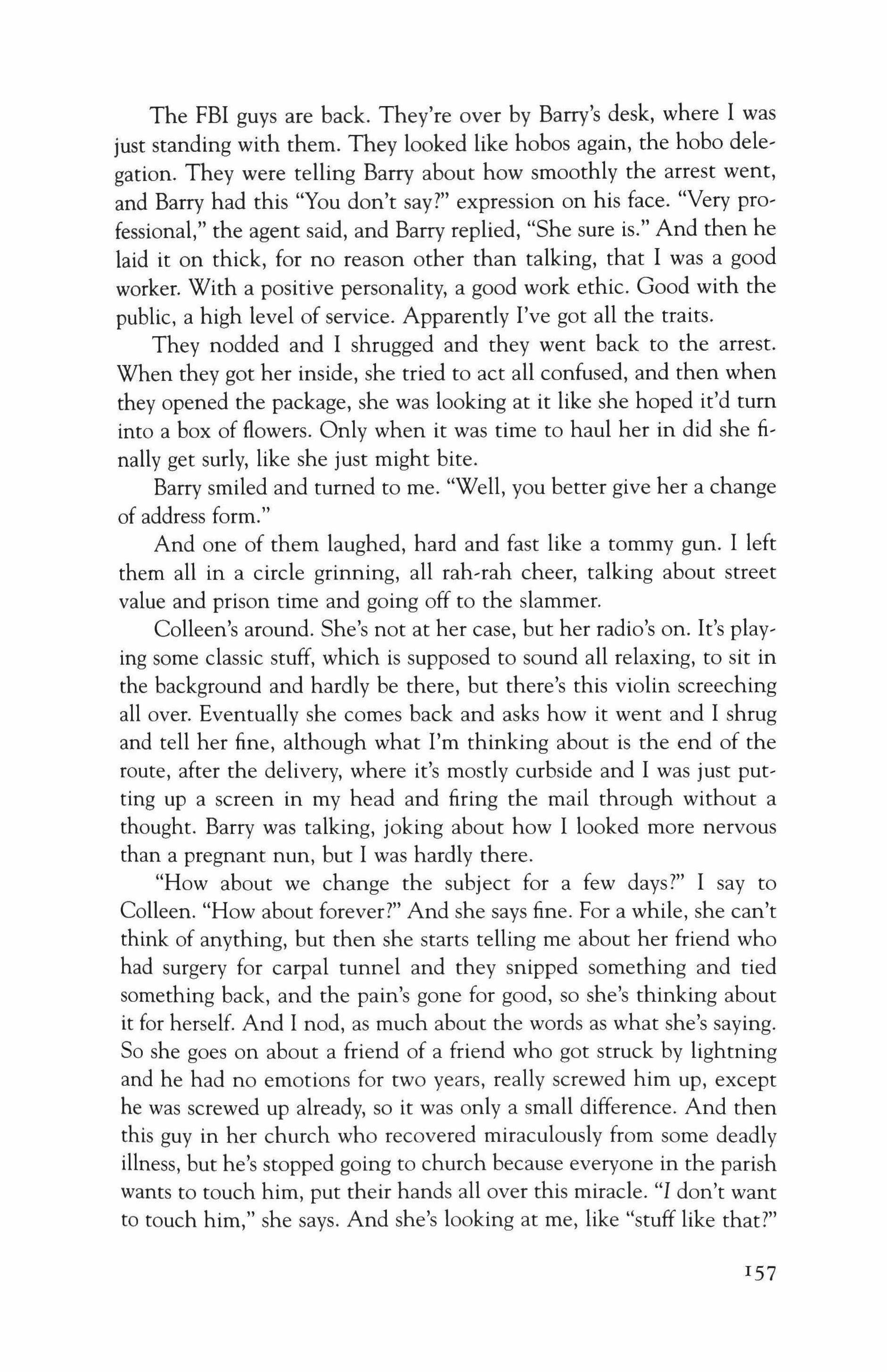
The FBI guys are back. They're over by Barry's desk, where I was just standing with them. They looked like hobos again, the hobo delegation. They were telling Barry about how smoothly the arrest went, and Barry had this "You don't say?" expression on his face. "Very pro� fessional," the agent said, and Barry replied, "She sure is." And then he laid it on thick, for no reason other than talking, that I was a good worker. With a positive personality, a good work ethic. Good with the public, a high level of service. Apparently I've got all the traits.
They nodded and I shrugged and they went back to the arrest. When they got her inside, she tried to act all confused, and then when they opened the package, she was looking at it like she hoped it'd tum into a box of flowers. Only when it was time to haul her in did she finally get surly, like she just might bite.
Barry smiled and turned to me. "Well, you better give her a change of address form."
And one of them laughed, hard and fast like a tommy gun. I left them all in a circle grinning, all rah-rah cheer, talking about street value and prison time and going off to the slammer.
Colleen's around. She's not at her case, but her radio's on. It's playing some classic stuff, which is supposed to sound all relaxing, to sit in the background and hardly be there, but there's this violin screeching all over. Eventually she comes back and asks how it went and I shrug and tell her fine, although what I'm thinking about is the end of the route, after the delivery, where it's mostly curbside and I was just putting up a screen in my head and firing the mail through without a thought. Barry was talking, joking about how I looked more nervous than a pregnant nun, but I was hardly there.
"How about we change the subject for a few days?" I say to Colleen. "How about forever?" And she says fine. For a while, she can't think of anything, but then she starts telling me about her friend who had surgery for carpal tunnel and they snipped something and tied something back, and the pain's gone for good, so she's thinking about it for herself. And I nod, as much about the words as what she's saying. So she goes on about a friend of a friend who got struck by lightning and he had no emotions for two years, really screwed him up, except he was screwed up already, so it was only a small difference. And then this guy in her church who recovered miraculously from some deadly illness, but he's stopped going to church because everyone in the parish wants to touch him, put their hands all over this miracle. "I don't want to touch him," she says. And she's looking at me, like "stuff like that?"
157
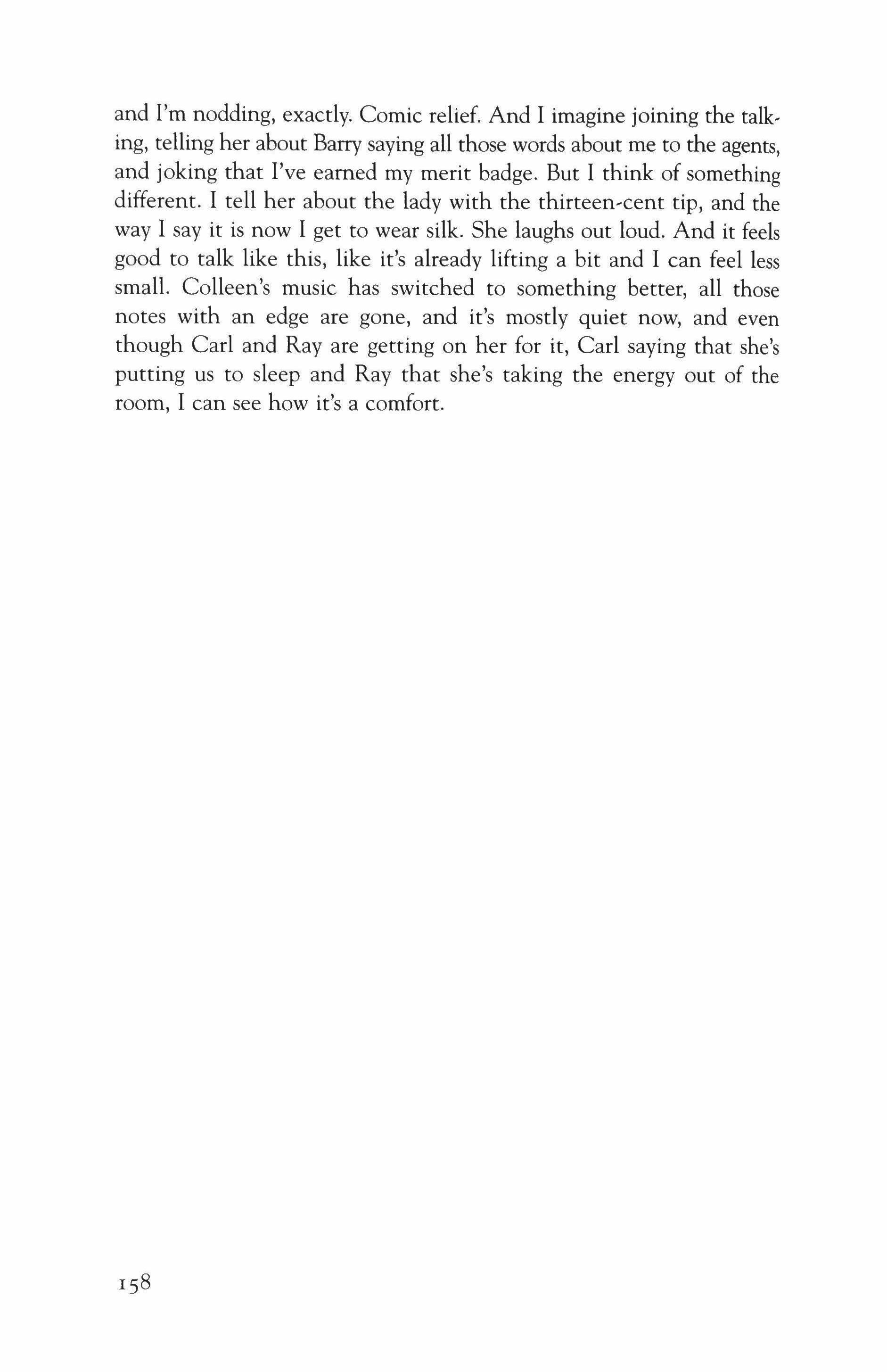
and I'm nodding, exactly. Comic relief. And I imagine joining the talking, telling her about Barry saying all those words about me to the agents, and joking that I've earned my merit badge. But I think of something different. I tell her about the lady with the thirteen-cent tip, and the way I say it is now I get to wear silk. She laughs out loud. And it feels good to talk like this, like it's already lifting a bit and I can feel less small. Colleen's music has switched to something better, all those notes with an edge are gone, and it's mostly quiet now, and even though Carl and Ray are getting on her for it, Carl saying that she's putting us to sleep and Ray that she's taking the energy out of the room, I can see how it's a comfort.
Jason Brown

The Lake
A hockey game started near shore, mostly fathers and sons and brothers, in plaid jackets and blue caps, choosing sides according to size. Two boys set stones two feet apart as a goal. It had rained and frozen over, the end of the season, and the ice was smooth.
One man raised his heavy arms and skated backwards with his eyes closed, drifting out and around a rocky point where the water was deep, where kids in the summer used a rope swing. He opened his eyes to the pine forest, turning in a circle, watching the lake come into view, the gray sky above, and the trees return. The chirps and scrapes of the hockey game drifted from around the corner as he skated farther out and saw a young girl sitting with her stockinged knees pulled up and her mittens hoarded in her lap-Jacob Small's youngest, Melissa, watching him skate. The crisp air all but swallowed a cheer-s-someone's goal-before it reached this skater who had just headed north when with an abrupt vanishing the ice gave way.
Underwater, his body convulsed. He thrashed once, but his gloved fist only grazed the ice before his limbs grew sluggish. He extended his hand, palm up, as he did every day at the store where he worked, waiting for the customer's money, and he saw where the ice thinned along a crack leading to the hole where he had fallen through. But it was too late for this kind of clarity. The ice, a luminous gray cap, pressed down, and he pictured Jacob Small's daughter, her small eyes watching the hole in the ice where he had vanished. He knew she would not come
159
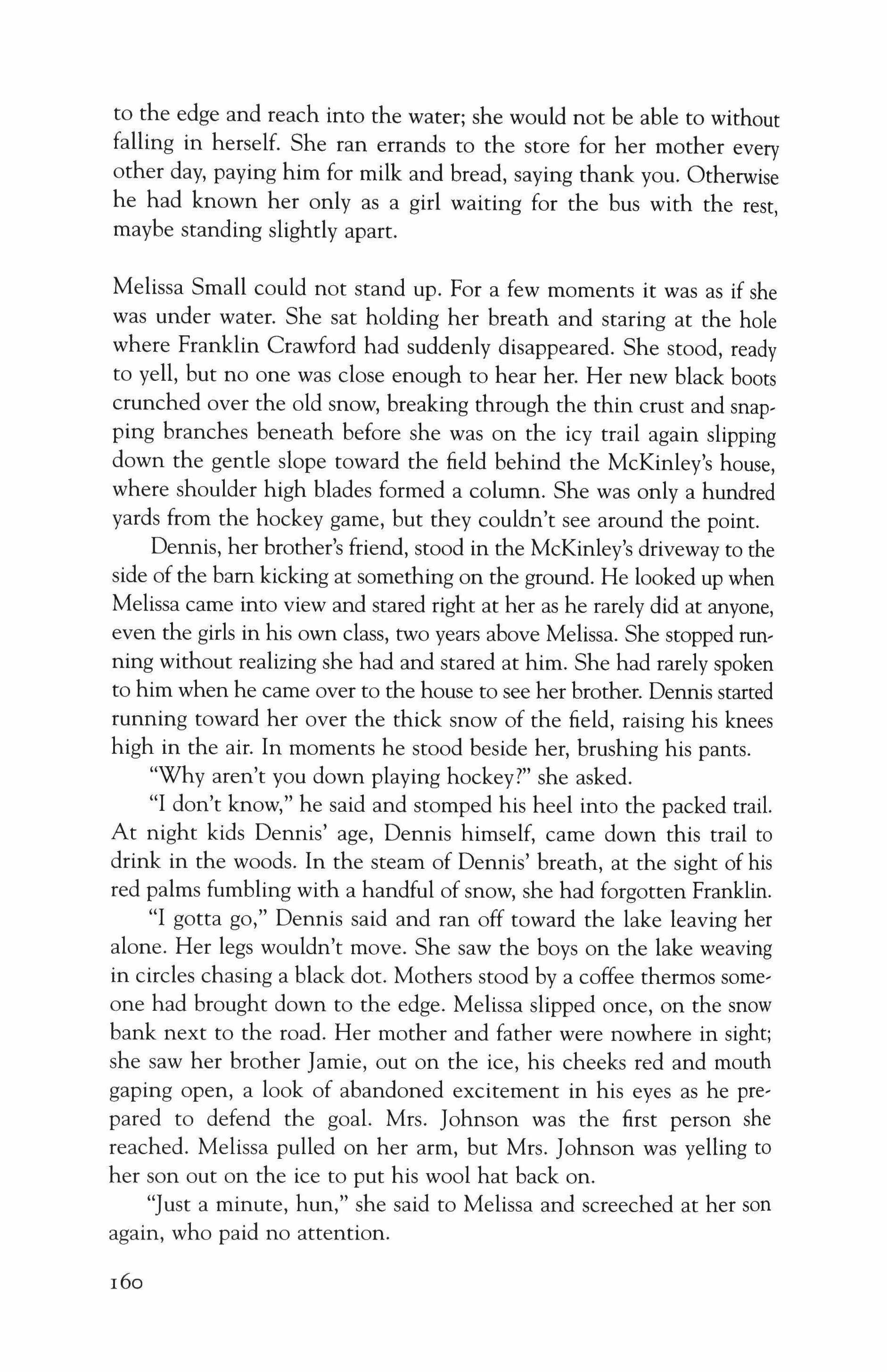
to the edge and reach into the water; she would not be able to without falling in herself. She ran errands to the store for her mother every other day, paying him for milk and bread, saying thank you. Otherwise he had known her only as a girl waiting for the bus with the rest, maybe standing slightly apart.
Melissa Small could not stand up. For a few moments it was as if she was under water. She sat holding her breath and staring at the hole where Franklin Crawford had suddenly disappeared. She stood, ready to yell, but no one was close enough to hear her. Her new black boots crunched over the old snow, breaking through the thin crust and snapping branches beneath before she was on the icy trail again slipping down the gentle slope toward the field behind the McKinley's house, where shoulder high blades formed a column. She was only a hundred yards from the hockey game, but they couldn't see around the point.
Dennis, her brother's friend, stood in the McKinley's driveway to the side of the bam kicking at something on the ground. He looked up when Melissa came into view and stared right at her as he rarely did at anyone, even the girls in his own class, two years above Melissa. She stopped running without realizing she had and stared at him. She had rarely spoken to him when he came over to the house to see her brother. Dennis started running toward her over the thick snow of the field, raising his knees high in the air. In moments he stood beside her, brushing his pants.
"Why aren't you down playing hockey?" she asked.
"I don't know," he said and stomped his heel into the packed trail. At night kids Dennis' age, Dennis himself, came down this trail to drink in the woods. In the steam of Dennis' breath, at the sight of his red palms fumbling with a handful of snow, she had forgotten Franklin.
"I gotta go," Dennis said and ran off toward the lake leaving her alone. Her legs wouldn't move. She saw the boys on the lake weaving in circles chasing a black dot. Mothers stood by a coffee thermos someone had brought down to the edge. Melissa slipped once, on the snow bank next to the road. Her mother and father were nowhere in sight; she saw her brother Jarnie, out on the ice, his cheeks red and mouth gaping open, a look of abandoned excitement in his eyes as he prepared to defend the goal. Mrs. Johnson was the first person she reached. Melissa pulled on her arm, but Mrs. Johnson was yelling to her son out on the ice to put his wool hat back on.
"Just a minute, hun," she said to Melissa and screeched at her son again, who paid no attention.
160
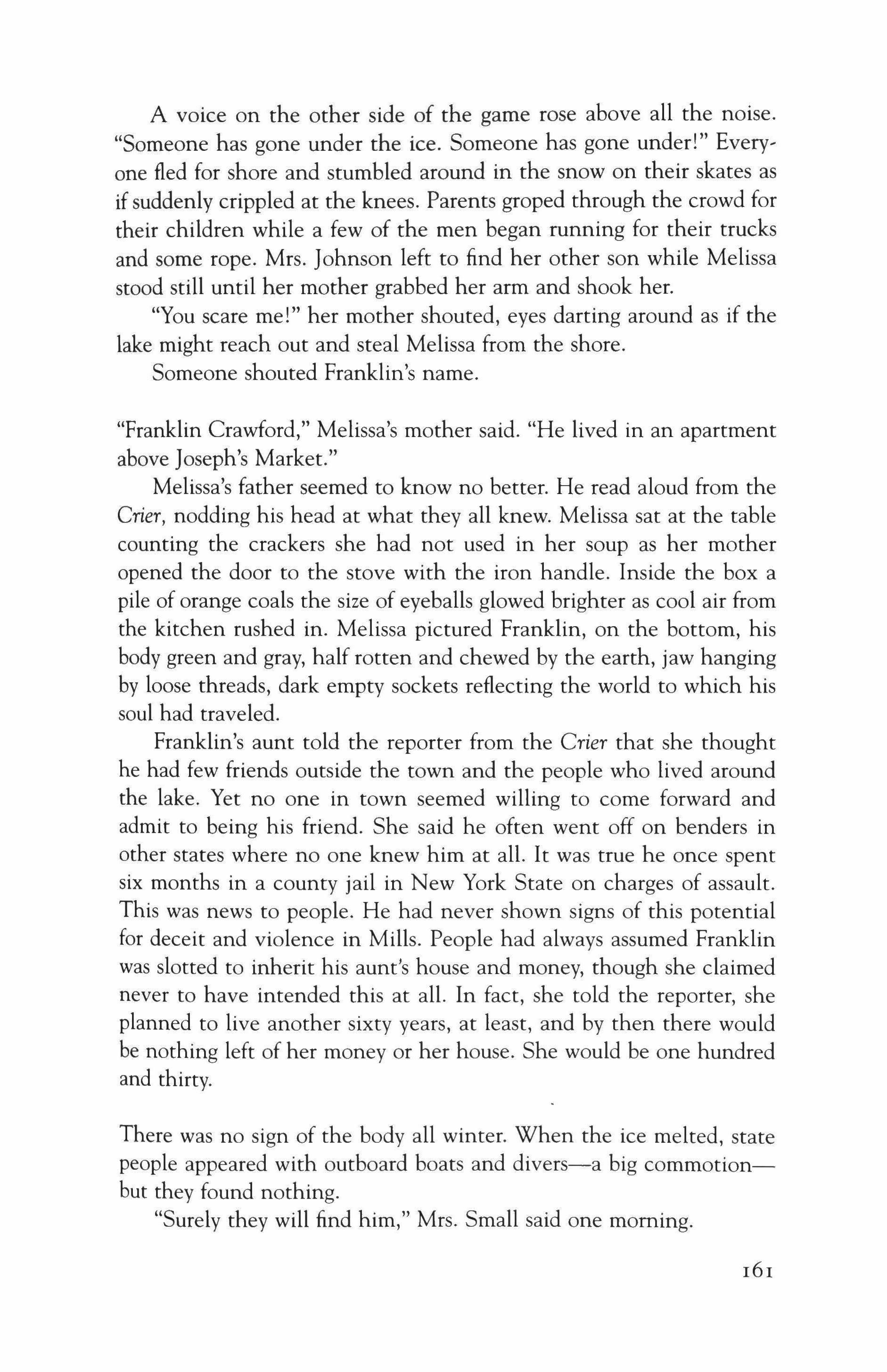
A voice on the other side of the game rose above all the noise. "Someone has gone under the ice. Someone has gone under!" Everyone fled for shore and stumbled around in the snow on their skates as if suddenly crippled at the knees. Parents groped through the crowd for their children while a few of the men began running for their trucks and some rope. Mrs. Johnson left to find her other son while Melissa stood still until her mother grabbed her arm and shook her.
"You scare me!" her mother shouted, eyes darting around as if the lake might reach out and steal Melissa from the shore.
Someone shouted Franklin's name.
"Franklin Crawford," Melissa's mother said. "He lived in an apartment above Joseph's Market."
Melissa's father seemed to know no better. He read aloud from the Crier, nodding his head at what they all knew. Melissa sat at the table counting the crackers she had not used in her soup as her mother opened the door to the stove with the iron handle. Inside the box a pile of orange coals the size of eyeballs glowed brighter as cool air from the kitchen rushed in. Melissa pictured Franklin, on the bottom, his body green and gray, half rotten and chewed by the earth, jaw hanging by loose threads, dark empty sockets reflecting the world to which his soul had traveled.
Franklin's aunt told the reporter from the Crier that she thought he had few friends outside the town and the people who lived around the lake. Yet no one in town seemed willing to come forward and admit to being his friend. She said he often went off on benders in other states where no one knew him at all. It was true he once spent six months in a county jail in New York State on charges of assault. This was news to people. He had never shown signs of this potential for deceit and violence in Mills. People had always assumed Franklin was slotted to inherit his aunt's house and money, though she claimed never to have intended this at all. In fact, she told the reporter, she planned to live another sixty years, at least, and by then there would be nothing left of her money or her house. She would be one hundred and thirty.
There was no sign of the body all winter. When the ice melted, state people appeared with outboard boats and divers-a big commotionbut they found nothing.
"Surely they will find him," Mrs. Small said one morning.

Mr. Small didn't stop reading the paper. "If they dredged for him and didn't find anything, he's not down there. He probably went down river. There's a strong current down there."
"He could be caught on something at the bottom." Her mother spoke idly, as if about one of her crossword puzzles.
Her father added, "I don't want you children swimming in there until this business is over." None of the children were present, however, except for Melissa.
It only rained a couple times all spring. When the air grew warm in early June, kids collected by the rope swing after school, though not as many jumped because the water was low. Mostly the boys jumped. They claimed to know where the rocks were.
Dennis backed up with the rope in his hand, swinging out and up, rising and turning straight into the air. He waved as he came around to face the shore, and for a moment Melissa felt her eyes lock with his before he pointed his toes and knifed into the water. The other kids on the shore paid no attention, but Melissa stared at the small patch of swirling bubbles marking the spot where Dennis had gone under. She had stepped forward enough to be noticed by two girls, who stopped talking and glared at the intruder. This was the older crowd, or almost there. With a crash, Dennis' arm rose out of the water followed by his head.
"Franklin's got my leg!" he screamed and went back under. The girls to Melissa's right chuckled, the one leaning back in her bikini and running a red nailed finger over the tiny hairs leading up to her belly button.
This time Dennis waved both arms in the air.
"He's dragging me under! Someone help!"
Dennis swam under water to the edge and sprang out, his smooth, narrow chest glistening as he sauntered over the roots and pine needles to sit next to the two girls. He looked right through Melissa as if she wasn't there; if he had looked again she would have been gone.
She sat down in the same spot where she had seen Franklin. She was the last one to see him alive; no one knew this. How much time had passed, she wondered, between the time she saw him go under and when she reached Mrs. Johnson? Ten minutes? She had moved so slowly, as if walking to school, or to take in the laundry, or waist-deep through water at the beach in the summer. It felt as if she was still moving this slowly, still arriving too late.
Dennis came over, as he did almost every day after school, and stomped

upstairs to the third floor to see her brother. After Melissa finished helping her mother with chores, she went up to her room to write a letter to her friend, Julie. For six months now Melissa had been sad about her best friend moving away with her parents to Vermont. Melissa had asked her mother if she would drive her to Julie's new house, but her mother was too busy. So was Julie's mother. Melissa had been writing every afternoon since Julie left, but Julie's letters had trickled down to every three weeks. Melissa didn't care; she would write Julie if Julie didn't write back at all. She wrote her about what she was thinking and about what people were doing around the lake. According to Julie's last letter, however, Melissa didn't like people very much. Melissa was currently thinking about what she would say. She couldn't remember exactly what she had said in many of the previous letters. Julie had them now. She loved those letters so much she wanted them back. It made her sad, thinking of them out there, in the state of Vermont. They weren't hers anymore. She almost wanted them back more than she wanted Julie back. Julie seemed to know this. In this day's letter she admitted to Julie she was maybe not so interested in people. She was thinking about what she had seen happen to Franklin. She could not remember feeling anything when Franklin disappeared. She wanted to tell someone what she had seen now almost as badly as she had the afternoon she saw it happen, which was so long ago it seemed as if she had imagined the whole thing. She was afraid, she realized, that someone would find out she had been the first one to see him go under and that she could have run faster along the path, that she had stopped when she saw Dennis-this boy she saw almost everyday, who was unremarkable (Julie agreed) in all ways. Then people would know what she was really like. Sometimes when she closed her eyes, she wrote, she was afraid everyone would vanish, even Julie, and she would be alone next to the lake where her grandparents and great grandparents had lived. Julie had said before she left that Melissa should not think too much before she wrote and never rewrite anything. If she just wrote down what she was thinking as it came out, then it would be as if they were still together talking. Maybe so. The letters seemed to create the shadow of a parallel life. She wondered, though, if Julie would stop reading her letters, if she would just start stacking them in a box.
The summer made her feel like one of the summer people, who walked by the shore with ice cream dripping down their wrists. No one talked
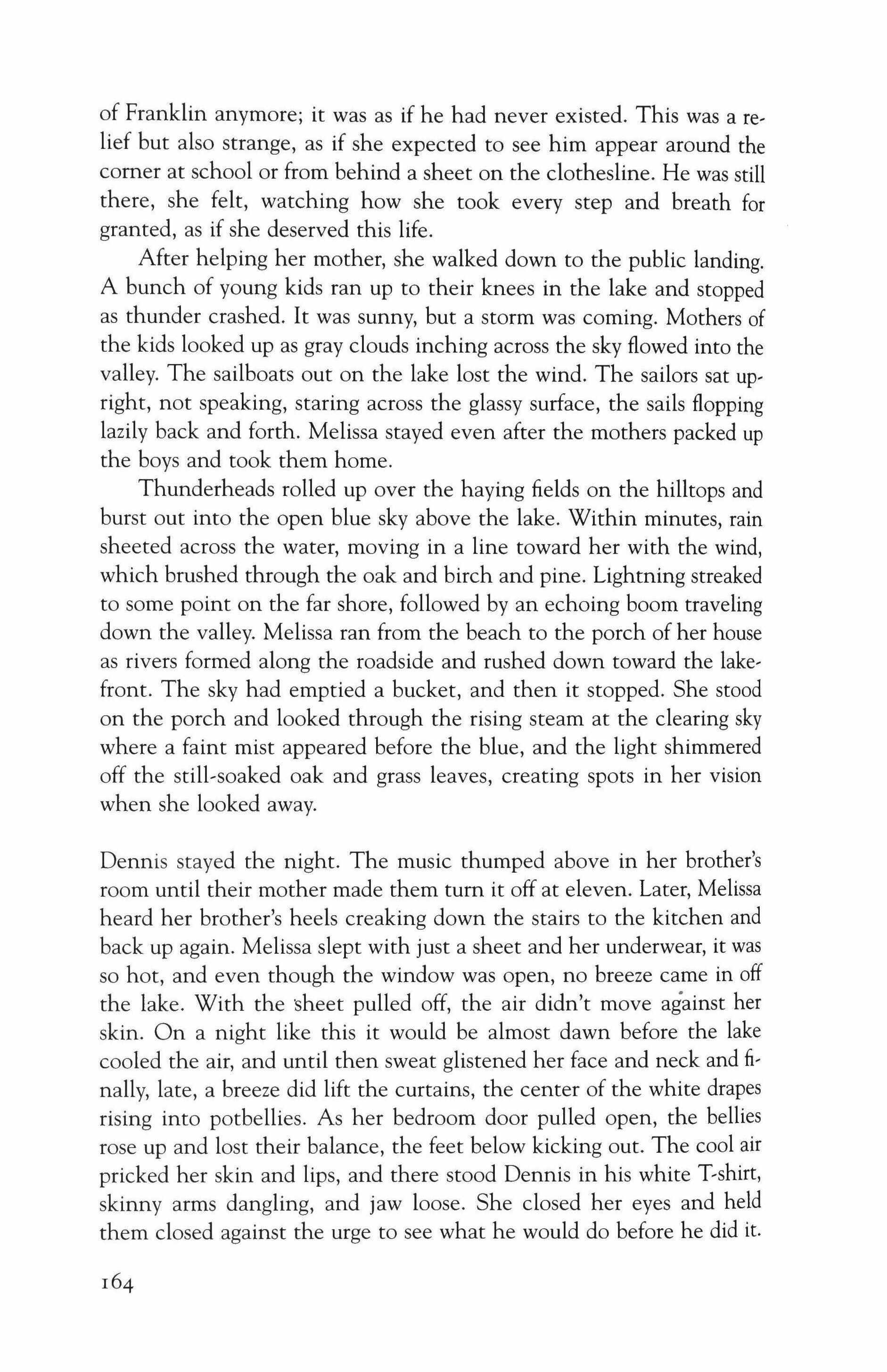
of Franklin anymore; it was as if he had never existed. This was a relief but also strange, as if she expected to see him appear around the comer at school or from behind a sheet on the clothesline. He was still there, she felt, watching how she took every step and breath for granted, as if she deserved this life.
After helping her mother, she walked down to the public landing. A bunch of young kids ran up to their knees in the lake and stopped as thunder crashed. It was sunny, but a storm was coming. Mothers of the kids looked up as gray clouds inching across the sky flowed into the valley. The sailboats out on the lake lost the wind. The sailors sat upright, not speaking, staring across the glassy surface, the sails flopping lazily back and forth. Melissa stayed even after the mothers packed up the boys and took them home.
Thunderheads rolled up over the haying fields on the hilltops and burst out into the open blue sky above the lake. Within minutes, rain sheeted across the water, moving in a line toward her with the wind, which brushed through the oak and birch and pine. Lightning streaked to some point on the far shore, followed by an echoing boom traveling down the valley. Melissa ran from the beach to the porch of her house as rivers formed along the roadside and rushed down toward the lakefront. The sky had emptied a bucket, and then it stopped. She stood on the porch and looked through the rising steam at the clearing sky where a faint mist appeared before the blue, and the light shimmered off the still-soaked oak and grass leaves, creating spots in her vision when she looked away.
Dennis stayed the night. The music thumped above in her brother's room until their mother made them tum it off at eleven. Later, Melissa heard her brother's heels creaking down the stairs to the kitchen and back up again. Melissa slept with just a sheet and her underwear, it was so hot, and even though the window was open, no breeze came in off the lake. With the sheet pulled off, the air didn't move against her skin. On a night like this it would be almost dawn before the lake cooled the air, and until then sweat glistened her face and neck and finally, late, a breeze did lift the curtains, the center of the white drapes rising into potbellies. As her bedroom door pulled open, the bellies rose up and lost their balance, the feet below kicking out. The cool air pricked her skin and lips, and there stood Dennis in his white T-shirt, skinny arms dangling, and jaw loose. She closed her eyes and held them closed against the urge to see what he would do before he did it.
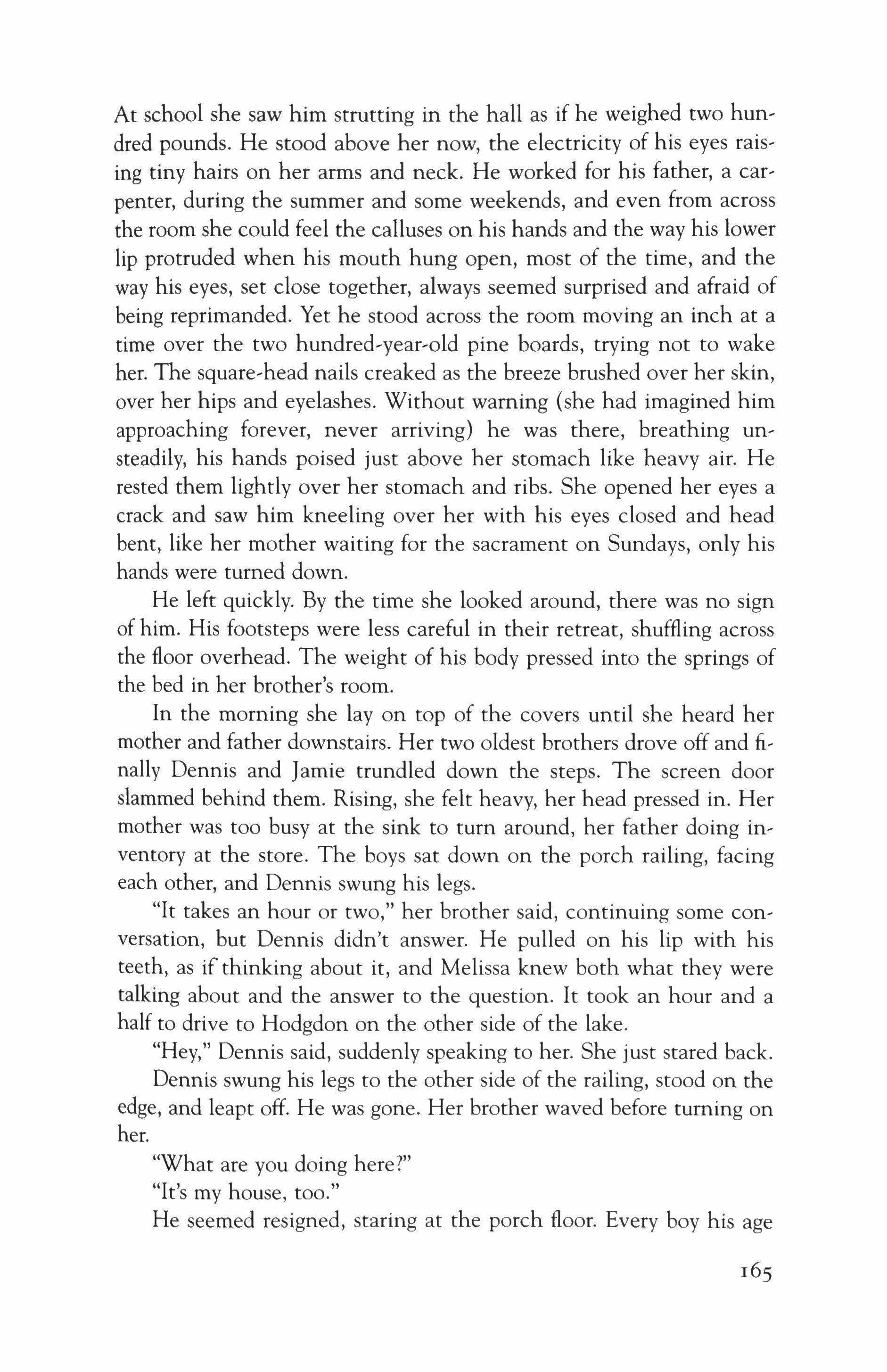
At school she saw him strutting in the hall as if he weighed two hun, dred pounds. He stood above her now, the electricity of his eyes raising tiny hairs on her arms and neck. He worked for his father, a car' penter, during the summer and some weekends, and even from across the room she could feel the calluses on his hands and the way his lower lip protruded when his mouth hung open, most of the time, and the way his eyes, set close together, always seemed surprised and afraid of being reprimanded. Yet he stood across the room moving an inch at a time over the two hundred-year-old pine boards, trying not to wake her. The square-head nails creaked as the breeze brushed over her skin, over her hips and eyelashes. Without warning (she had imagined him approaching forever, never arriving) he was there, breathing un' steadily, his hands poised just above her stomach like heavy air. He rested them lightly over her stomach and ribs. She opened her eyes a crack and saw him kneeling over her with his eyes closed and head bent, like her mother waiting for the sacrament on Sundays, only his hands were turned down.
He left quickly. By the time she looked around, there was no sign of him. His footsteps were less careful in their retreat, shuffling across the floor overhead. The weight of his body pressed into the springs of the bed in her brother's room.
In the morning she lay on top of the covers until she heard her mother and father downstairs. Her two oldest brothers drove off and finally Dennis and Jamie trundled down the steps. The screen door slammed behind them. Rising, she felt heavy, her head pressed in. Her mother was too busy at the sink to turn around, her father doing in, ventory at the store. The boys sat down on the porch railing, facing each other, and Dennis swung his legs.
"It takes an hour or two," her brother said, continuing some con, versation, but Dennis didn't answer. He pulled on his lip with his teeth, as if thinking about it, and Melissa knew both what they were talking about and the answer to the question. It took an hour and a half to drive to Hodgdon on the other side of the lake.
"Hey," Dennis said, suddenly speaking to her. She just stared back.
Dennis swung his legs to the other side of the railing, stood on the edge, and leapt off. He was gone. Her brother waved before turning on her.
"What are you doing here?"
"It's my house, too."
He seemed resigned, staring at the porch floor. Every boy his age
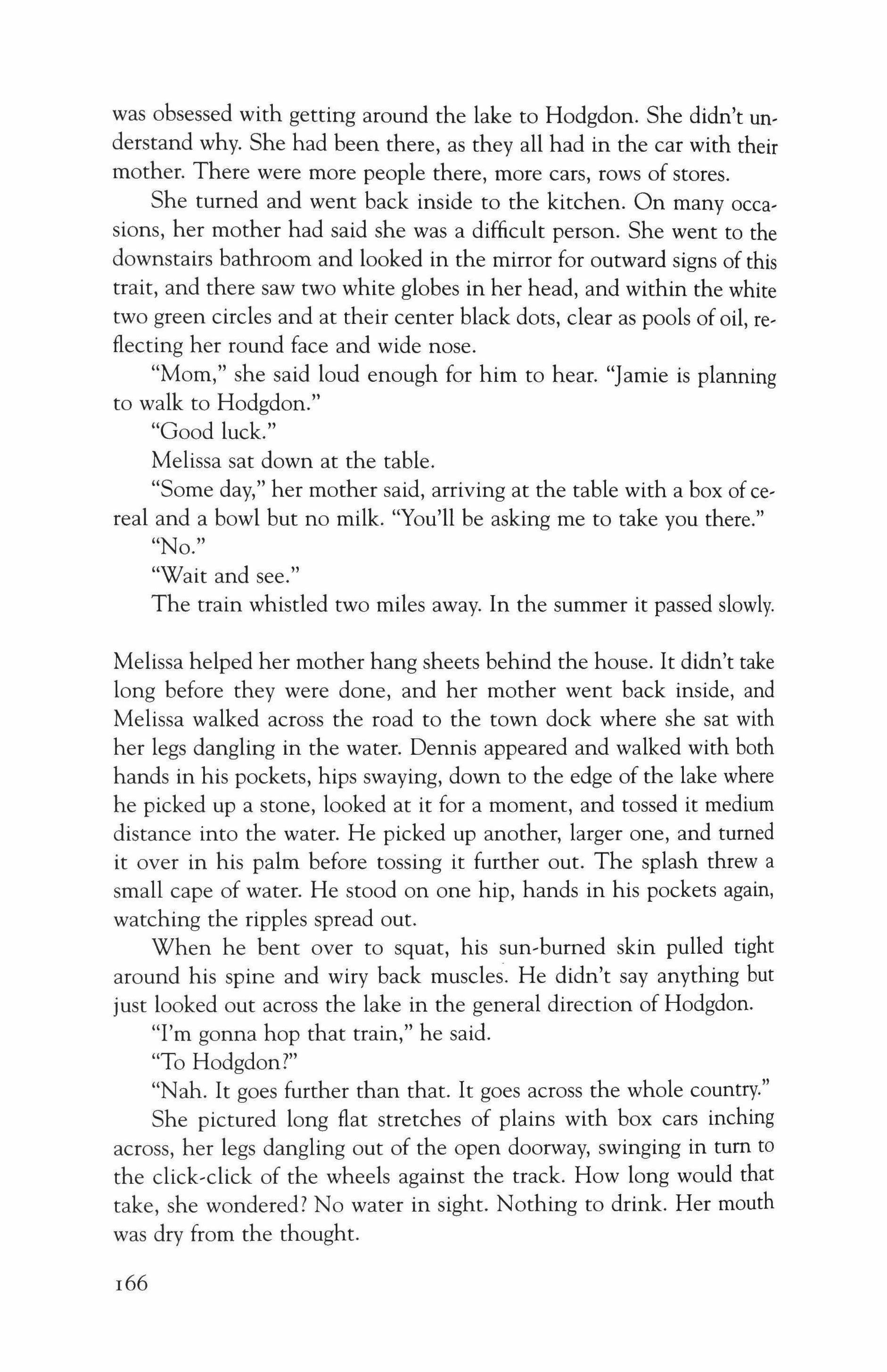
was obsessed with getting around the lake to Hodgdon. She didn't understand why. She had been there, as they all had in the car with their mother. There were more people there, more cars, rows of stores.
She turned and went back inside to the kitchen. On many occasions, her mother had said she was a difficult person. She went to the downstairs bathroom and looked in the mirror for outward signs of this trait, and there saw two white globes in her head, and within the white two green circles and at their center black dots, clear as pools of oil, reflecting her round face and wide nose.
"Mom," she said loud enough for him to hear. "Jamie is planning to walk to Hodgdon."
"Good luck."
Melissa sat down at the table.
"Some day," her mother said, arriving at the table with a box of cereal and a bowl but no milk. "You'll be asking me to take you there."
"No."
"Wait and see."
The train whistled two miles away. In the summer it passed slowly.
Melissa helped her mother hang sheets behind the house. It didn't take long before they were done, and her mother went back inside, and Melissa walked across the road to the town dock where she sat with her legs dangling in the water. Dennis appeared and walked with both hands in his pockets, hips swaying, down to the edge of the lake where he picked up a stone, looked at it for a moment, and tossed it medium distance into the water. He picked up another, larger one, and turned it over in his palm before tossing it further out. The splash threw a small cape of water. He stood on one hip, hands in his pockets again, watching the ripples spread out.
When he bent over to squat, his sun-burned skin pulled tight around his spine and wiry back muscles. He didn't say anything but just looked out across the lake in the general direction of Hodgdon.
"I'm gonna hop that train," he said.
"To Hodgdon?"
"Nah. It goes further than that. It goes across the whole country."
She pictured long flat stretches of plains with box cars inching across, her legs dangling out of the open doorway, swinging in turn to the click-click of the wheels against the track. How long would that take, she wondered? No water in sight. Nothing to drink. Her mouth was dry from the thought.
166
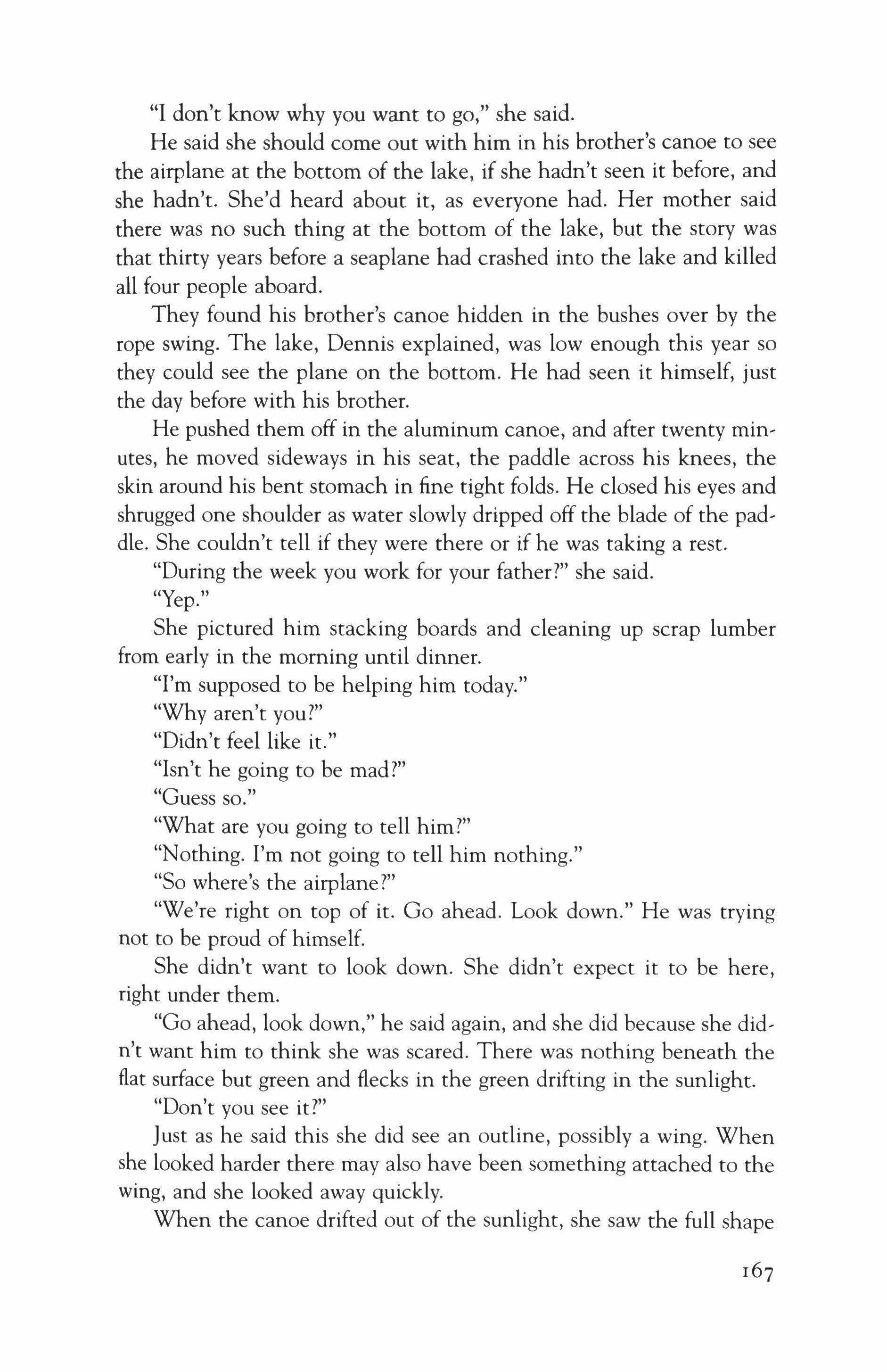
"I don't know why you want to go," she said. He said she should come out with him in his brother's canoe to see the airplane at the bottom of the lake, if she hadn't seen it before, and she hadn't. She'd heard about it, as everyone had. Her mother said there was no such thing at the bottom of the lake, but the story was that thirty years before a seaplane had crashed into the lake and killed all four people aboard.
They found his brother's canoe hidden in the bushes over by the rope swing. The lake, Dennis explained, was low enough this year so they could see the plane on the bottom. He had seen it himself, just the day before with his brother.
He pushed them off in the aluminum canoe, and after twenty minutes, he moved sideways in his seat, the paddle across his knees, the skin around his bent stomach in fine tight folds. He closed his eyes and shrugged one shoulder as water slowly dripped off the blade of the paddle. She couldn't tell if they were there or if he was taking a rest.
"During the week you work for your father!" she said. "Yep."
She pictured him stacking boards and cleaning up scrap lumber from early in the morning until dinner.
"I'm supposed to be helping him today."
"Why aren't you!"
"Didn't feel like it."
"Isn't he going to be mad?"
"Guess so."
"What are you going to tell him!"
"Nothing. I'm not going to tell him nothing."
"So where's the airplane?"
"We're right on top of it. Go ahead. Look down." He was trying not to be proud of himself.
She didn't want to look down. She didn't expect it to be here, right under them.
"Go ahead, look down," he said again, and she did because she didn't want him to think she was scared. There was nothing beneath the flat surface but green and flecks in the green drifting in the sunlight.
"Don't you see it!"
Just as he said this she did see an outline, possibly a wing. When she looked harder there may also have been something attached to the wing, and she looked away quickly.
When the canoe drifted out of the sunlight, she saw the full shape

of the plane, pale against the dark mud and algae of the bottom. Dennis stood up and dove into the water, his legs kicking down until she had to look away her heart pounded so fast. For a moment she was outside herself above the lake looking down at herself, a girl she didn't know, sitting alone in a canoe. There were other people on the lake, but in her mind she was looking at a girl in a canoe alone on a lake. It had never seemed odd before to live next to such a large body of water, like a glassy eye peering up out of the earth.
"Almost made it." He breathed frantically, water spurting out of his mouth and his eyes bulging slightly out of their sockets, as if they were starved for air. His neck stretched, his mouth widening, and he was under again, his long pale limbs pushing against the water like the slow glide of a great blue heron landing on the lake in the hazy dusk. Then she could no longer distinguish his body from the body of the plane. He rose, eyes closed, arms at his side and legs kicking. His face was blissful and beautiful, as if in sleep. His arms burst over the gunwale, tilting the canoe so Melissa had to lean the other way.
"I saw the cockpit." He wheezed and coughed, gulping for air. "I saw into the cockpit. Nothing was there. Do you wanna come down and see?"
She shook her head.
"I didn't bring my bathing suit."
He looked off toward the beach. Maybe someone was there. Someone he'd rather be with. She wasn't about to look. It didn't matter. He might as well go over there.
"How you going to get back in the canoe?" He shrugged and kept looking across the lake. "You sure you don't want to come in?"
"I don't have my suit."
He seemed not to hear.
"How you going to get up?"
"Easy."
"It doesn't look easy to me. You'll tip the canoe over."
He pushed off, watching her as he sank back into the water: first his shoulders, then his neck and the back of his head, his chin and finally his eyes, still open, sinking. He was gone. She could not see the blurry outline of his body beneath the water. Without warning, he rose over the high stem and pressed down, angles appearing on the back of his arms. He tumbled over the seat and collapsed sideways on the bottom with his rib cage expanding and contracting, the water rolling off his skin.
168
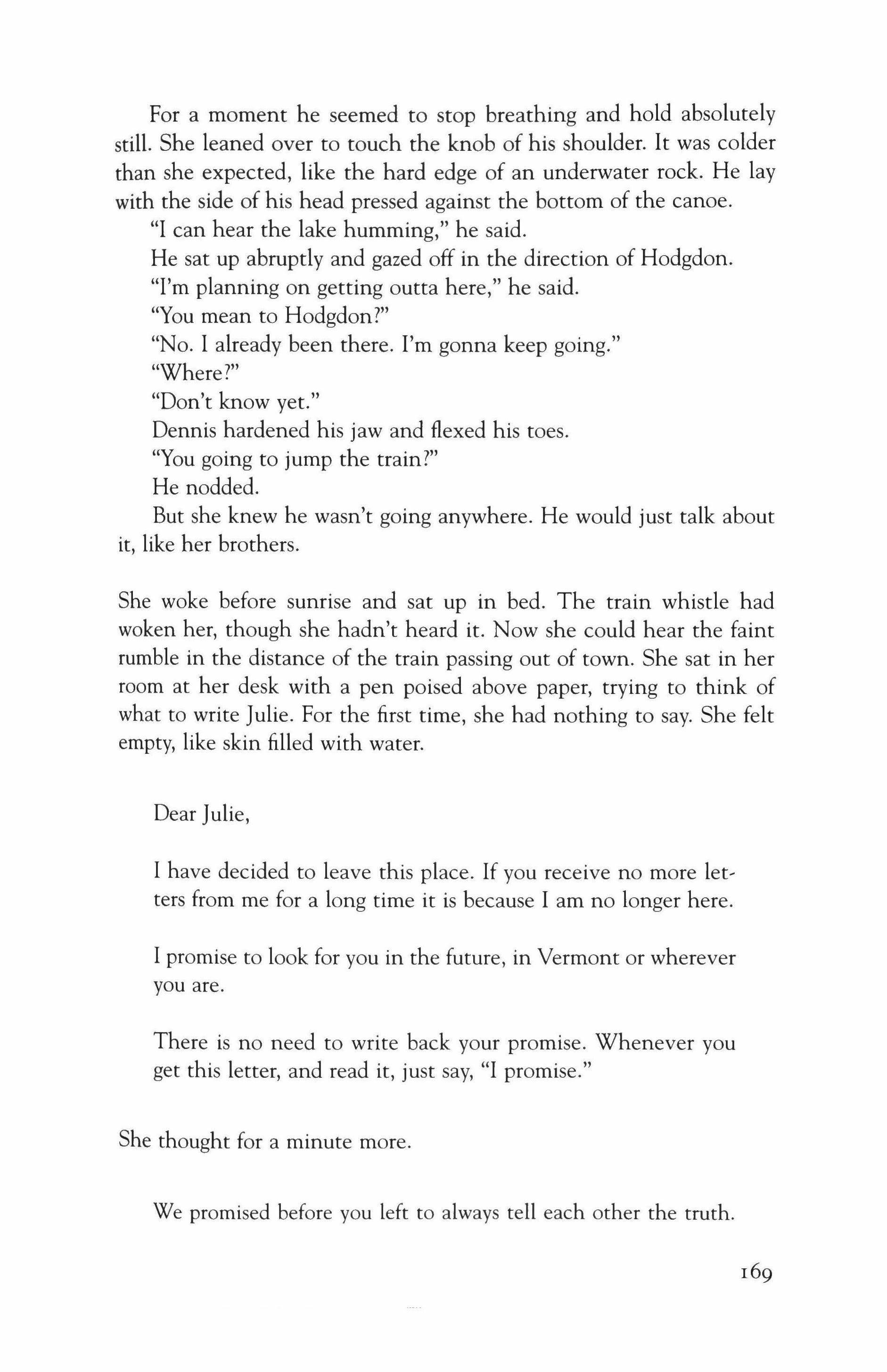
For a moment he seemed to stop breathing and hold absolutely still. She leaned over to touch the knob of his shoulder. It was colder than she expected, like the hard edge of an underwater rock. He lay with the side of his head pressed against the bottom of the canoe.
"I can hear the lake humming," he said.
He sat up abruptly and gazed off in the direction of Hodgdon.
"I'm planning on getting outta here," he said.
"You mean to Hodgdon?"
"No. I already been there. I'm gonna keep going."
"Where?"
"Don't know yet."
Dennis hardened his jaw and flexed his toes.
"You going to jump the train?"
He nodded.
But she knew he wasn't going anywhere. He would just talk about it, like her brothers.
She woke before sunrise and sat up in bed. The train whistle had woken her, though she hadn't heard it. Now she could hear the faint rumble in the distance of the train passing out of town. She sat in her room at her desk with a pen poised above paper, trying to think of what to write Julie. For the first time, she had nothing to say. She felt empty, like skin filled with water.
Dear Julie,
I have decided to leave this place. If you receive no more letters from me for a long time it is because I am no longer here.
I promise to look for you in the future, in Vermont or wherever you are.
There is no need to write back your promise. Whenever you get this letter, and read it, just say, "I promise."
She thought for a minute more.
We promised before you left to always tell each other the truth.
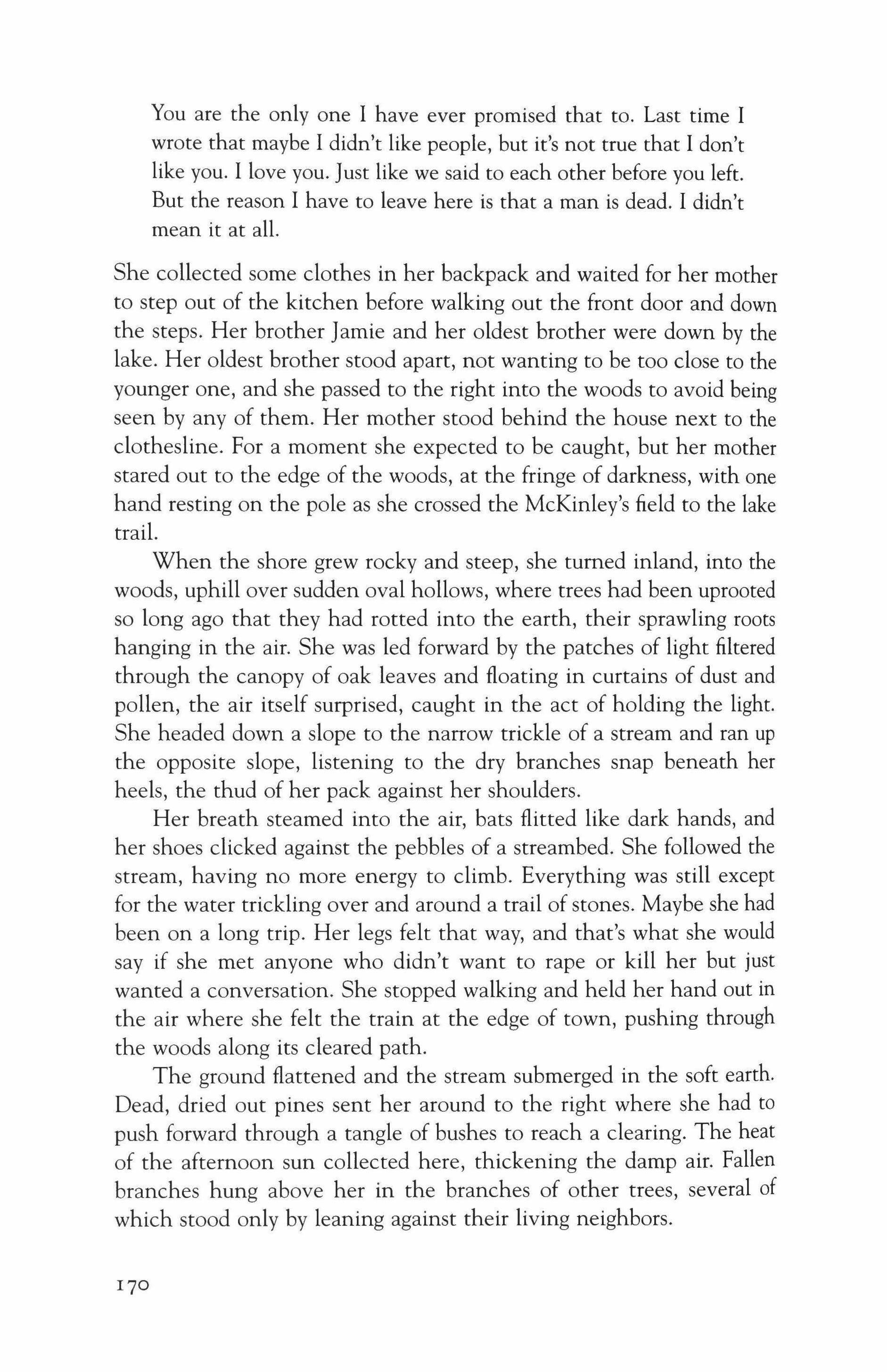
You are the only one I have ever promised that to. Last time I wrote that maybe I didn't like people, but it's not true that I don't like you. I love you. Just like we said to each other before you left. But the reason I have to leave here is that a man is dead. I didn't mean it at all.
She collected some clothes in her backpack and waited for her mother to step out of the kitchen before walking out the front door and down the steps. Her brother Jamie and her oldest brother were down by the lake. Her oldest brother stood apart, not wanting to be too close to the younger one, and she passed to the right into the woods to avoid being seen by any of them. Her mother stood behind the house next to the clothesline. For a moment she expected to be caught, but her mother stared out to the edge of the woods, at the fringe of darkness, with one hand resting on the pole as she crossed the McKinley's field to the lake trail.
When the shore grew rocky and steep, she turned inland, into the woods, uphill over sudden oval hollows, where trees had been uprooted so long ago that they had rotted into the earth, their sprawling roots hanging in the air. She was led forward by the patches of light filtered through the canopy of oak leaves and floating in curtains of dust and pollen, the air itself surprised, caught in the act of holding the light. She headed down a slope to the narrow trickle of a stream and ran up the opposite slope, listening to the dry branches snap beneath her heels, the thud of her pack against her shoulders.
Her breath steamed into the air, bats flitted like dark hands, and her shoes clicked against the pebbles of a streambed. She followed the stream, having no more energy to climb. Everything was still except for the water trickling over and around a trail of stones. Maybe she had been on a long trip. Her legs felt that way, and that's what she would say if she met anyone who didn't want to rape or kill her but just wanted a conversation. She stopped walking and held her hand out in the air where she felt the train at the edge of town, pushing through the woods along its cleared path.
The ground flattened and the stream submerged in the soft earth. Dead, dried out pines sent her around to the right where she had to push forward through a tangle of bushes to reach a clearing. The heat of the afternoon sun collected here, thickening the damp air. Fallen branches hung above her in the branches of other trees, several of which stood only by leaning against their living neighbors.
170

There was no easy way forward through the tangles, but she wanted to see the lake once more before she reached the train and left forever. She closed her eyes and saw what she would see when she reached the lake: flashing lights and trucks, the people of her town gathered down by the water's edge. Her mother would run back and forth in front of the house yelling her name while her brothers checked the beach and still others, assuming the worst, took to boats with the same grappling hooks they had used to drag for Franklin. They would comb the bottom for her body but never find her.
The sweat rolled down her face. She could see Franklin's face, ruddy and unshaven, his jaw hanging open, as he skated over the smooth ice. He was there, and then he wasn't. It seemed that it had all started with her, as if the earth had opened beneath Franklin in re� sponse to her own indifference.
She reached the lake's edge and looked across the flat water and saw. her house and the pebbled shore of the town landing. They reminded her of nothing she had known. The tiny figures moving lazily along the shore might be her brothers, but she couldn't tell. Cars passed along the shore road. One parked at the landing, and someone got out. It seemed like a place anyone might live, not the place where she had lived, and there were no signs of a search for her.
Of course they knew. It was impossible not to know in their house, in their town, when someone was missing, even for a day. They knew, they just weren't doing anything about it. Maybe she had already been explained away.
None of the people of her town or her family were who they thought they were. Even if she, Melissa, vanished under the surface, her mother and all the rest would cry for a while and mope, especially walking downtown, but in the end they would feel a secret relief that it wasn't them. If she went back she was not going to say anything about it, not for the rest of her life.
Tonight the dinner table would be full except for her place. Twenty years from now she would return, come up to her mother while she hung clothes on the line in back of the house, and rest a hand on her back. Her mother would have gray hair and dim eyes and thin hands like her grandmother's. But there would be nothing to say when she returned, and she would return; she had to-she was from here. The images of all the places she had visited would be erased when she was buried in the plot behind the Methodist church on the hill above the lake.
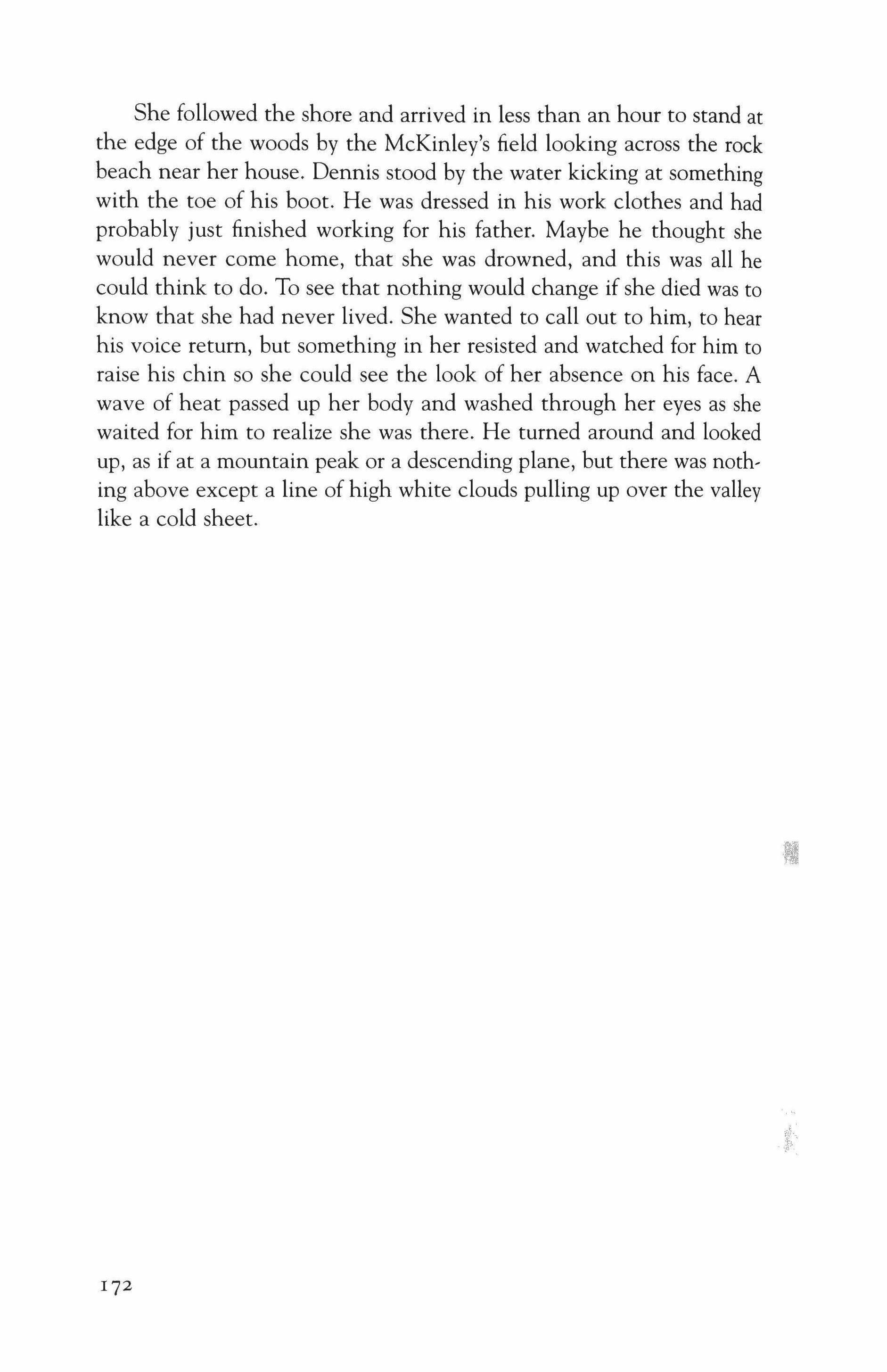
She followed the shore and arrived in less than an hour to stand at the edge of the woods by the McKinley's field looking across the rock beach near her house. Dennis stood by the water kicking at something with the toe of his boot. He was dressed in his work clothes and had probably just finished working for his father. Maybe he thought she would never come home, that she was drowned, and this was all he could think to do. To see that nothing would change if she died was to know that she had never lived. She wanted to call out to him, to hear his voice return, but something in her resisted and watched for him to raise his chin so she could see the look of her absence on his face. A wave of heat passed up her body and washed through her eyes as she waited for him to realize she was there. He turned around and looked up, as if at a mountain peak or a descending plane, but there was nothing above except a line of high white clouds pulling up over the valley like a cold sheet.
Cristina Henriquez

Beautiful
And then that summer when the heat felt like wading your way through molasses and the streets hummed in a desperate sad way all day and all night, God came down from heaven and paid a visit to our family in two ways: my father came home and my uncle got rich. The second one happened first and there were many people later who would say that it was the only reason my father returned, that he must have heard the news about his only brother and wanted to cash in, but at the time, when it first happened, it was just two unrelated miracles as far as I was concerned. And I was thankful.
My Uncle Arrocha calls my mama first thing in the morning to tell her the news, to tell her that he's won the lottery for real this time, the big prize, he's done it, and I can hear him hollering right through the phone. I am standing in the hallway watching as she runs in her slippers and her thin nightgown over to the television, the telephone against her ear, and picks up the green notebook that she keeps in the drawer. She opens it up to the end and looks at the numbers she has written down, all in pencil, in rows and rows, like an army marching on the page, and traces along with her finger. She starts nodding, Yes yes, wait, what was the last one? Yes, oh JesusMaryandJoseph, you really did it!, and crosses herself over and over and stands up and sits down and stands up again, walking around in circles.
The front door is open like it always is except for when we're sleeping and through the door, through the coconut trees at the edge I73
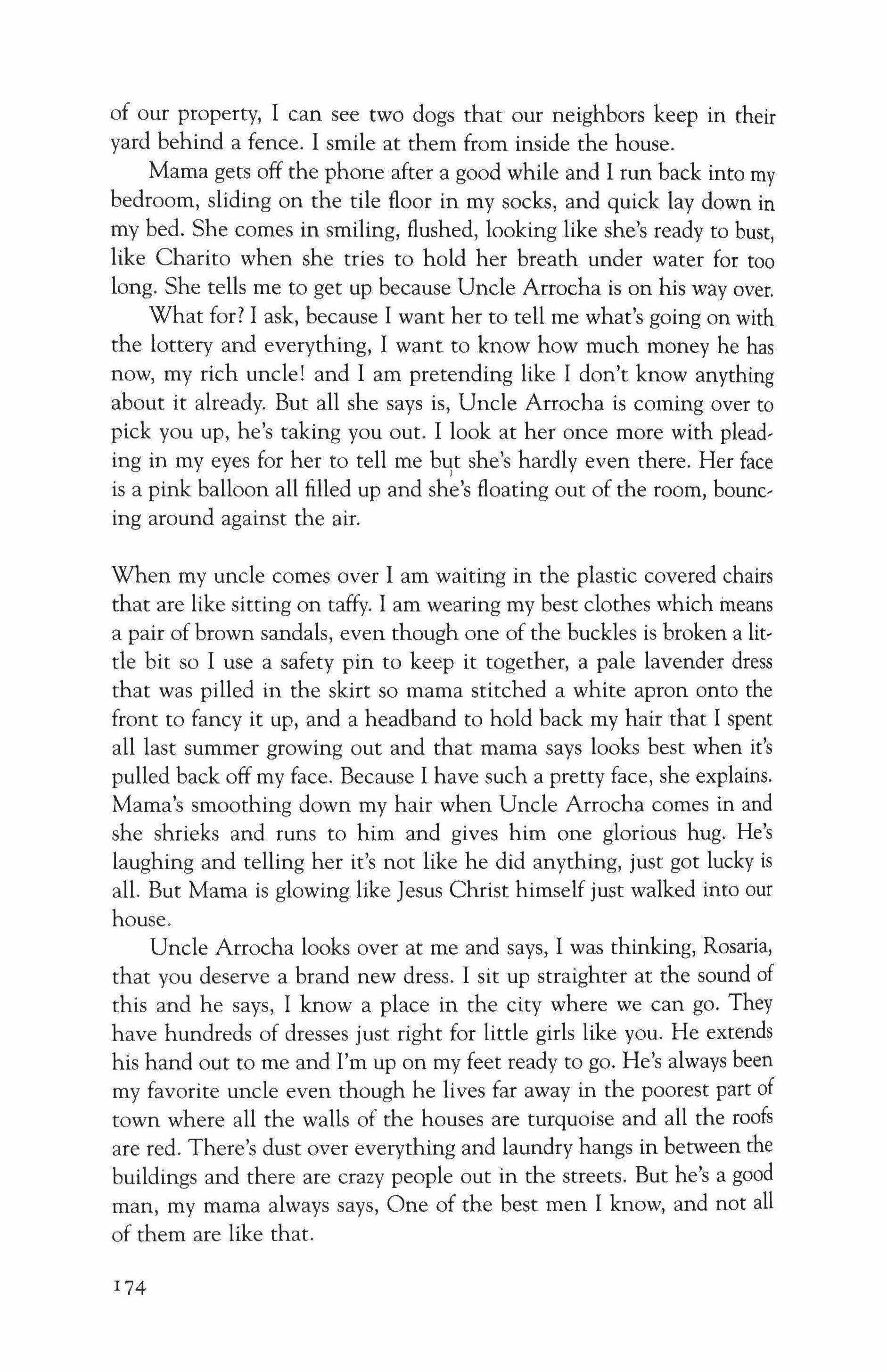
of our property, I can see two dogs that our neighbors keep in their yard behind a fence. I smile at them from inside the house.
Mama gets off the phone after a good while and I run back into my bedroom, sliding on the tile floor in my socks, and quick lay down in my bed. She comes in smiling, flushed, looking like she's ready to bust, like Charito when she tries to hold her breath under water for too long. She tells me to get up because Uncle Arrocha is on his way over. What for? I ask, because I want her to tell me what's going on with the lottery and everything, I want to know how much money he has now, my rich uncle! and I am pretending like I don't know anything about it already. But all she says is, Uncle Arrocha is coming over to pick you up, he's taking you out. I look at her once more with pleading in my eyes for her to tell me but she's hardly even there. Her face I is a pink balloon all filled up and she's floating out of the room, bouncing around against the air.
When my uncle comes over I am waiting in the plastic covered chairs that are like sitting on taffy. I am wearing my best clothes which means a pair of brown sandals, even though one of the buckles is broken a little bit so I use a safety pin to keep it together, a pale lavender dress that was pilled in the skirt so mama stitched a white apron onto the front to fancy it up, and a headband to hold back my hair that I spent all last summer growing out and that mama says looks best when it's pulled back off my face. Because I have such a pretty face, she explains. Mama's smoothing down my hair when Uncle Arrocha comes in and she shrieks and runs to him and gives him one glorious hug. He's laughing and telling her it's not like he did anything, just got lucky is all. But Mama is glowing like Jesus Christ himself just walked into our house.
Uncle Arrocha looks over at me and says, I was thinking, Rosaria, that you deserve a brand new dress. I sit up straighter at the sound of this and he says, I know a place in the city where we can go. They have hundreds of dresses just right for little girls like you. He extends his hand out to me and I'm up on my feet ready to go. He's always been my favorite uncle even though he lives far away in the poorest part of town where all the walls of the houses are turquoise and all the roofs are red. There's dust over everything and laundry hangs in between the buildings and there are crazy people out in the streets. But he's a good man, my mama always says, One of the best men I know, and not all of them are like that.
174
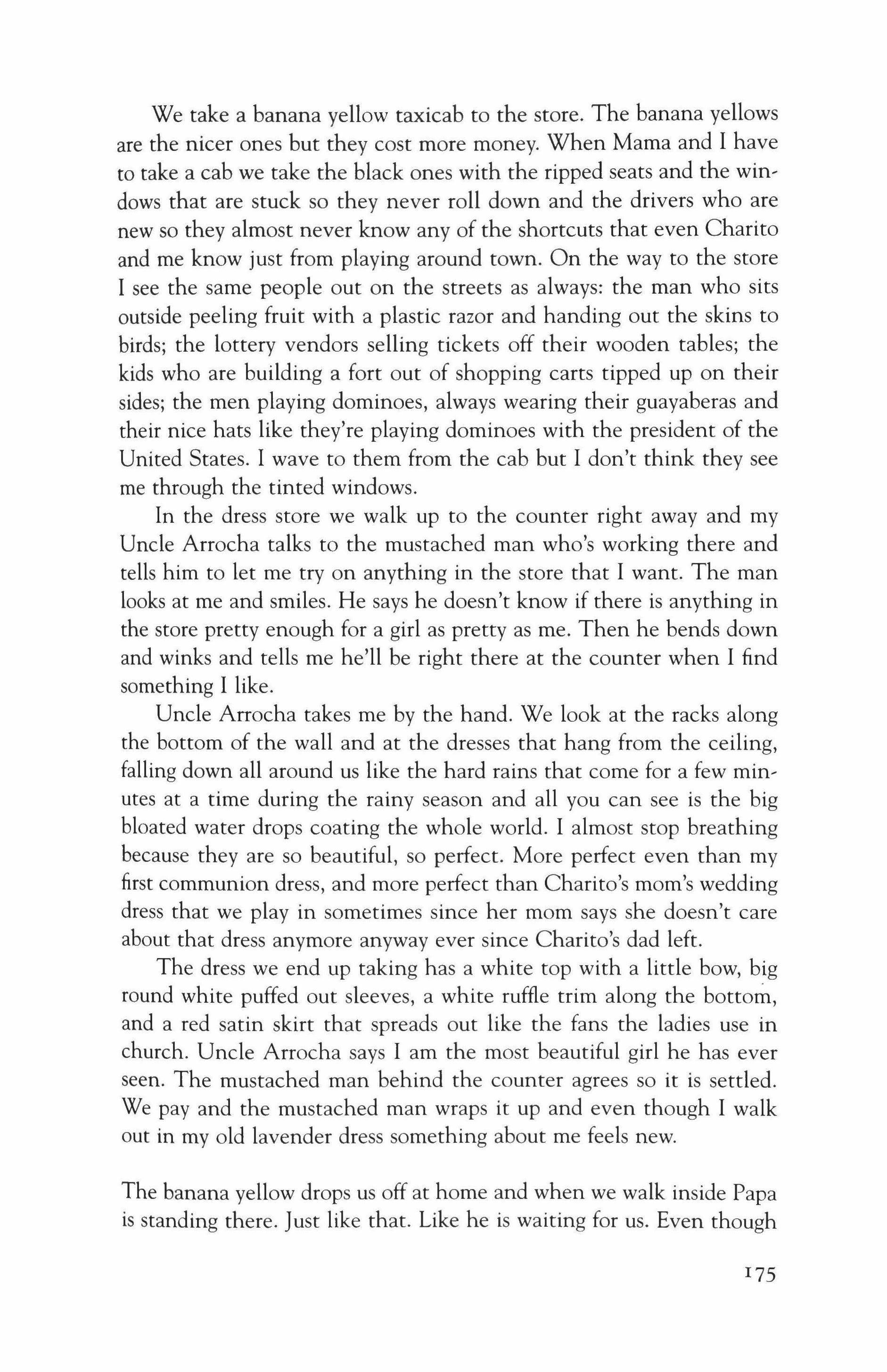
We take a banana yellow taxicab to the store. The banana yellows are the nicer ones but they cost more money. When Mama and I have to take a cab we take the black ones with the ripped seats and the windows that are stuck so they never roll down and the drivers who are new so they almost never know any of the shortcuts that even Charito and me know just from playing around town. On the way to the store I see the same people out on the streets as always: the man who sits outside peeling fruit with a plastic razor and handing out the skins to birds; the lottery vendors selling tickets off their wooden tables; the kids who are building a fort out of shopping carts tipped up on their sides; the men playing dominoes, always wearing their guayaberas and their nice hats like they're playing dominoes with the president of the United States. I wave to them from the cab but I don't think they see me through the tinted windows.
In the dress store we walk up to the counter right away and my Uncle Arrocha talks to the mustached man who's working there and tells him to let me try on anything in the store that I want. The man looks at me and smiles. He says he doesn't know if there is anything in the store pretty enough for a girl as pretty as me. Then he bends down and winks and tells me he'll be right there at the counter when I find something I like.
Uncle Arrocha takes me by the hand. We look at the racks along the bottom of the wall and at the dresses that hang from the ceiling, falling down all around us like the hard rains that come for a few minutes at a time during the rainy season and all you can see is the big bloated water drops coating the whole world. I almost stop breathing because they are so beautiful, so perfect. More perfect even than my first communion dress, and more perfect than Charito's mom's wedding dress that we play in sometimes since her mom says she doesn't care about that dress anymore anyway ever since Charito's dad left.
The dress we end up taking has a white top with a little bow, big round white puffed out sleeves, a white ruffle trim along the bottom, and a red satin skirt that spreads out like the fans the ladies use in church. Uncle Arrocha says I am the most beautiful girl he has ever seen. The mustached man behind the counter agrees so it is settled. We pay and the mustached man wraps it up and even though I walk out in mv old lavender dress something about me feels new.
The banana yellow drops us off at home and when we walk inside Papa is standing there. Just like that. Like he is waiting for us. Even though
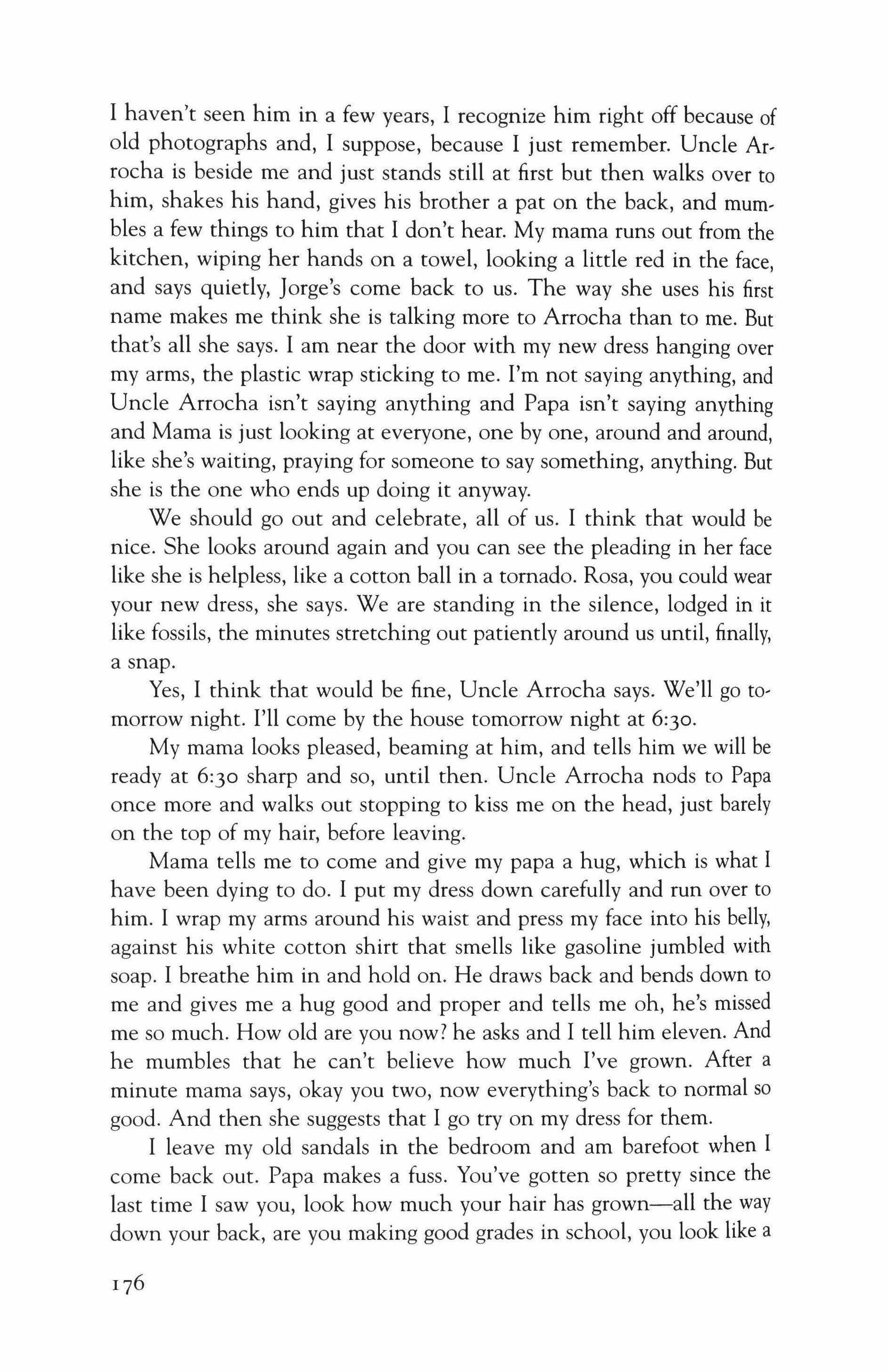
I haven't seen him in a few years, I recognize him right off because of old photographs and, I suppose, because I just remember. Uncle Arrocha is beside me and just stands still at first but then walks over to him, shakes his hand, gives his brother a pat on the back, and mumbles a few things to him that I don't hear. My mama runs out from the kitchen, wiping her hands on a towel, looking a little red in the face, and says quietly, Jorge's come back to us. The way she uses his first name makes me think she is talking more to Arrocha than to me. But that's all she says. I am near the door with my new dress hanging over my arms, the plastic wrap sticking to me. I'm not saying anything, and Uncle Arrocha isn't saying anything and Papa isn't saying anything and Mama is just looking at everyone, one by one, around and around, like she's waiting, praying for someone to say something, anything. But she is the one who ends up doing it anyway.
We should go out and celebrate, all of us. I think that would be nice. She looks around again and you can see the pleading in her face like she is helpless, like a cotton ball in a tornado. Rosa, you could wear your new dress, she says. We are standing in the silence, lodged in it like fossils, the minutes stretching out patiently around us until, finally, a snap.
Yes, I think that would be fine, Uncle Arrocha says. We'll go tomorrow night. I'll come by the house tomorrow night at 6:30.
My mama looks pleased, beaming at him, and tells him we will be ready at 6:30 sharp and so, until then. Uncle Arrocha nods to Papa once more and walks out stopping to kiss me on the head, just barely on the top of my hair, before leaving.
Mama tells me to come and give my papa a hug, which is what I have been dying to do. I put my dress down carefully and run over to him. I wrap my arms around his waist and press my face into his belly, against his white cotton shirt that smells like gasoline jumbled with soap. I breathe him in and hold on. He draws back and bends down to me and gives me a hug good and proper and tells me oh, he's missed me so much. Howald are you now? he asks and I tell him eleven. And he mumbles that he can't believe how much I've grown. After a minute mama says, okay you two, now everything's back to normal so good. And then she suggests that I go try on my dress for them.
I leave my old sandals in the bedroom and am barefoot when I come back out. Papa makes a fuss. You've gotten so pretty since the last time I saw you, look how much your hair has grown-all the way down your back, are you making good grades in school, you look like a
176
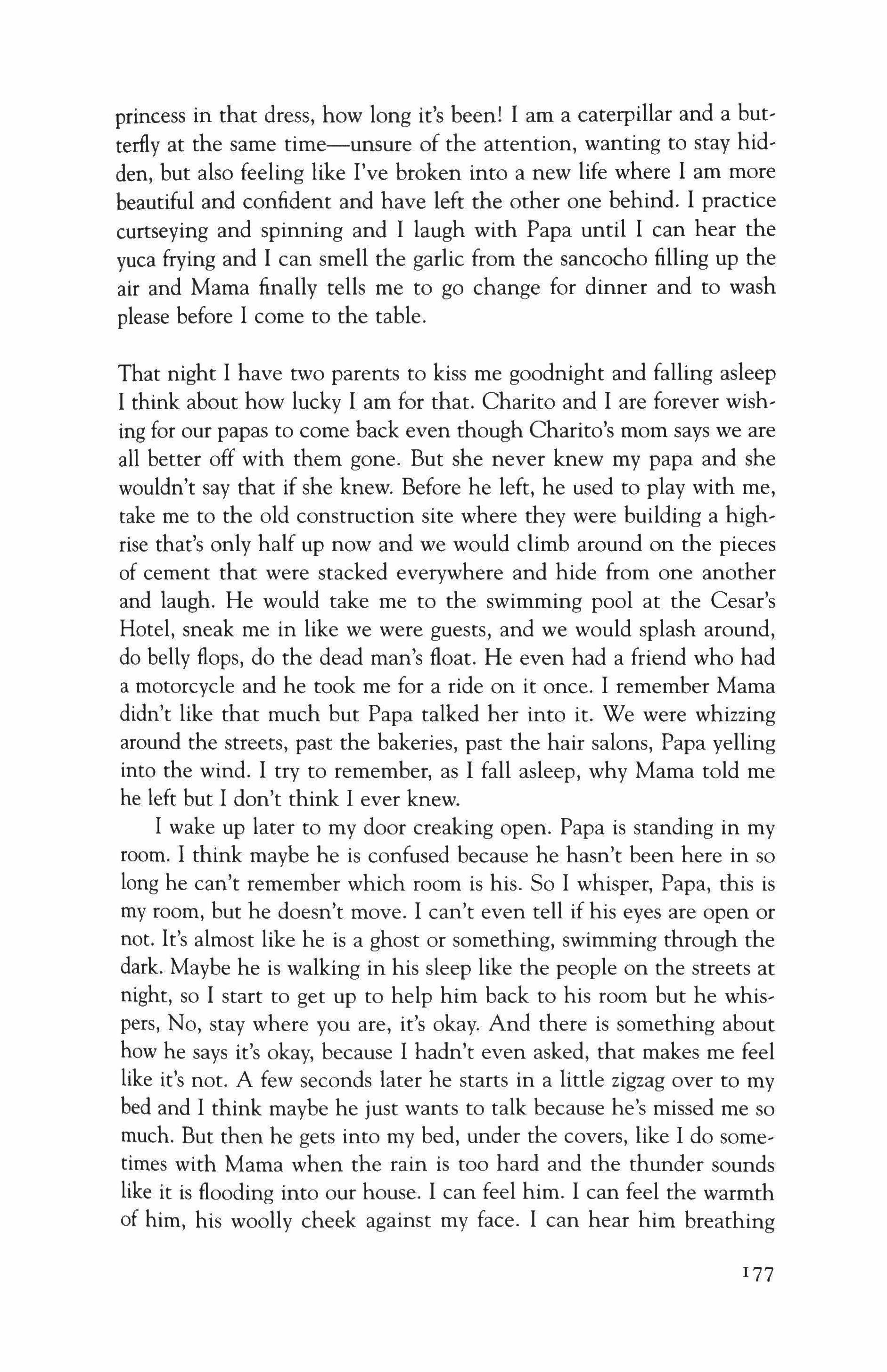
princess in that dress, how long it's been! I am a caterpillar and a but, terfly at the same time-unsure of the attention, wanting to stay hid, den, but also feeling like I've broken into a new life where I am more beautiful and confident and have left the other one behind. I practice curtseying and spinning and I laugh with Papa until I can hear the yuca frying and I can smell the garlic from the sancocho filling up the air and Mama finally tells me to go change for dinner and to wash please before I come to the table.
That night I have two parents to kiss me goodnight and falling asleep I think about how lucky I am for that. Charito and I are forever wish, ing for our papas to come back even though Charito's mom says we are all better off with them gone. But she never knew my papa and she wouldn't say that if she knew. Before he left, he used to play with me, take me to the old construction site where they were building a high, rise that's only half up now and we would climb around on the pieces of cement that were stacked everywhere and hide from one another and laugh. He would take me to the swimming pool at the Cesar's Hotel, sneak me in like we were guests, and we would splash around, do belly flops, do the dead man's float. He even had a friend who had a motorcycle and he took me for a ride on it once. I remember Mama didn't like that much but Papa talked her into it. We were whizzing around the streets, past the bakeries, past the hair salons, Papa yelling into the wind. I try to remember, as I fall asleep, why Mama told me he left but I don't think I ever knew.
I wake up later to my door creaking open. Papa is standing in my room. I think maybe he is confused because he hasn't been here in so long he can't remember which room is his. So I whisper, Papa, this is my room, but he doesn't move. I can't even tell if his eyes are open or not. It's almost like he is a ghost or something, swimming through the dark. Maybe he is walking in his sleep like the people on the streets at night, so I start to get up to help him back to his room but he whispers, No, stay where you are, it's okay. And there is something about how he says it's okay, because I hadn't even asked, that makes me feel like it's not. A few seconds later he starts in a little zigzag over to my bed and I think maybe he just wants to talk because he's missed me so much. But then he gets into my bed, under the covers, like I do some, times with Mama when the rain is too hard and the thunder sounds like it is flooding into our house. I can feel him. I can feel the warmth of him, his woolly cheek against my face. I can hear him breathing
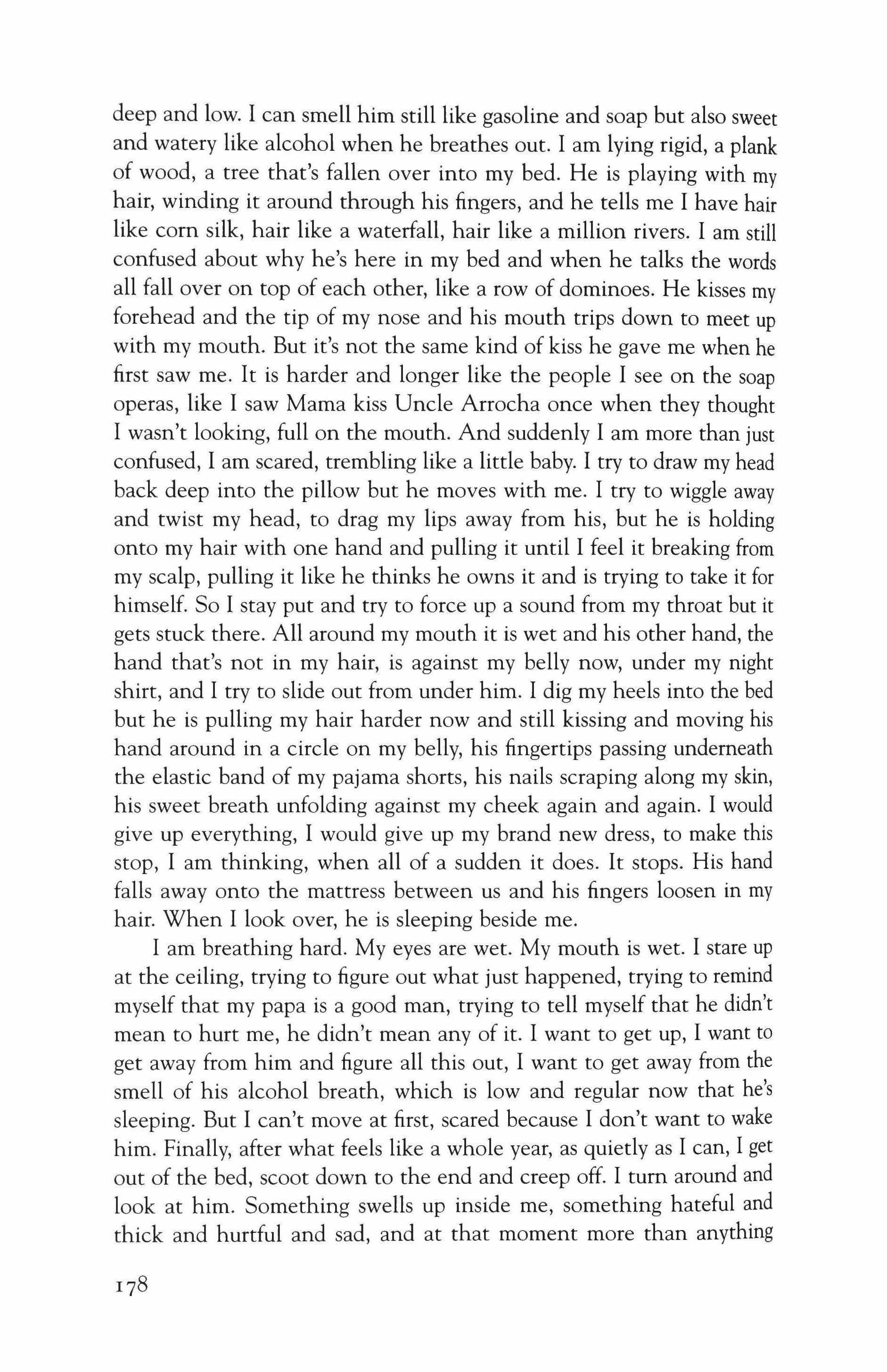
deep and low. I can smell him still like gasoline and soap but also sweet and watery like alcohol when he breathes out. I am lying rigid, a plank of wood, a tree that's fallen over into my bed. He is playing with my hair, winding it around through his fingers, and he tells me I have hair like com silk, hair like a waterfall, hair like a million rivers. I am still confused about why he's here in my bed and when he talks the words all fall over on top of each other, like a row of dominoes. He kisses my forehead and the tip of my nose and his mouth trips down to meet up with my mouth. But it's not the same kind of kiss he gave me when he first saw me. It is harder and longer like the people I see on the soap operas, like I saw Mama kiss Uncle Arrocha once when they thought I wasn't looking, full on the mouth. And suddenly I am more than just confused, I am scared, trembling like a little baby. I try to draw my head back deep into the pillow but he moves with me. I try to wiggle away and twist my head, to drag my lips away from his, but he is holding onto my hair with one hand and pulling it until I feel it breaking from my scalp, pulling it like he thinks he owns it and is trying to take it for himself. So I stay put and try to force up a sound from my throat but it gets stuck there. All around my mouth it is wet and his other hand, the hand that's not in my hair, is against my belly now, under my night shirt, and I try to slide out from under him. I dig my heels into the bed but he is pulling my hair harder now and still kissing and moving his hand around in a circle on my belly, his fingertips passing underneath the elastic band of my pajama shorts, his nails scraping along my skin, his sweet breath unfolding against my cheek again and again. I would give up everything, I would give up my brand new dress, to make this stop, I am thinking, when all of a sudden it does. It stops. His hand falls away onto the mattress between us and his fingers loosen in my hair. When I look over, he is sleeping beside me.
I am breathing hard. My eyes are wet. My mouth is wet. I stare up at the ceiling, trying to figure out what just happened, trying to remind myself that my papa is a good man, trying to tell myself that he didn't mean to hurt me, he didn't mean any of it. I want to get up, I want to get away from him and figure all this out, I want to get away from the smell of his alcohol breath, which is low and regular now that he's sleeping. But I can't move at first, scared because I don't want to wake him. Finally, after what feels like a whole year, as quietly as I can, I get out of the bed, scoot down to the end and creep off. I tum around and look at him. Something swells up inside me, something hateful and thick and hurtful and sad, and at that moment more than anything
178

else in the world I want to get as far away from him as I can. I want to sink to the middle of the earth, I want to float out to the middle of the ocean. The back of my head is burning, throbbing, like his fingers are still there in my hair, holding me down. It's like fire spreading out and I reach up to try and stop it but I don't even want to touch my hair anymore, I don't want to put my fingers through the pieces like he did. I feel sick at the thought of it touching my back now, hanging off my head, ready to be pulled again. And before I know it I am standing, with the door locked, in the bathroom, up on the wooden stepstool, looking in the small, wavy mirror. I am cutting it all off as close to the roots as I can get and promising myself that he will never never never be able to hold me again like that. I cut the com-silk hair, millions of rivers of hair until it's all dried up and washed out and can be filled with nothing but wind. Little by little, I feel the fire cool.
In the morning I am gone. I spend half the day at the old rotten beach by the construction zone and in the afternoon I go over to Charito's. She laughs when she sees me. Look at your hair, she says, what did you do? I tell her I cut it but I don't tell her why. She shrugs and says I am crazy and that now I will have to be the boy whenever we play for sure, then giggles again and shakes her head. We spend the afternoon play, ing and when we dress up I can't believe my eyes when I see myself in the mirror again, the first time since last night, my hair sticking out all over the place like a pineapple top. I stand there staring, seeing what I've done. There is something about it that I like. It feels like a wall that he won't ever be able to get through again and like maybe I am not even the same person he touched in the first place.
My mama calls late in the day to see if I am over at Charito's and to remind me about the dinner tonight and to come home soon and get cleaned up and don't forget to wear your new dress and be ready for Uncle Arrocha to pick us up. This morning I had forgotten all about the dress. I didn't even tell Charito about it yet, the beautiful dress which will make me the perfect new me. Charito's mom yells up to us and tells me to hurry, I don't want to be late, my mama made it sound like a very important dinner. When I walk downstairs on my way out she stops me and asks me what in the devil I did to my hair. Did Char, ito do this to you? she asks. No, I did it, I tell her. And when I say it, I feel proud. I hope you didn't just do it here, she says, because your mama is going to hit the ceiling when she sees this and I don't want her calling me about it. Then she kind of laughs and runs a hand over
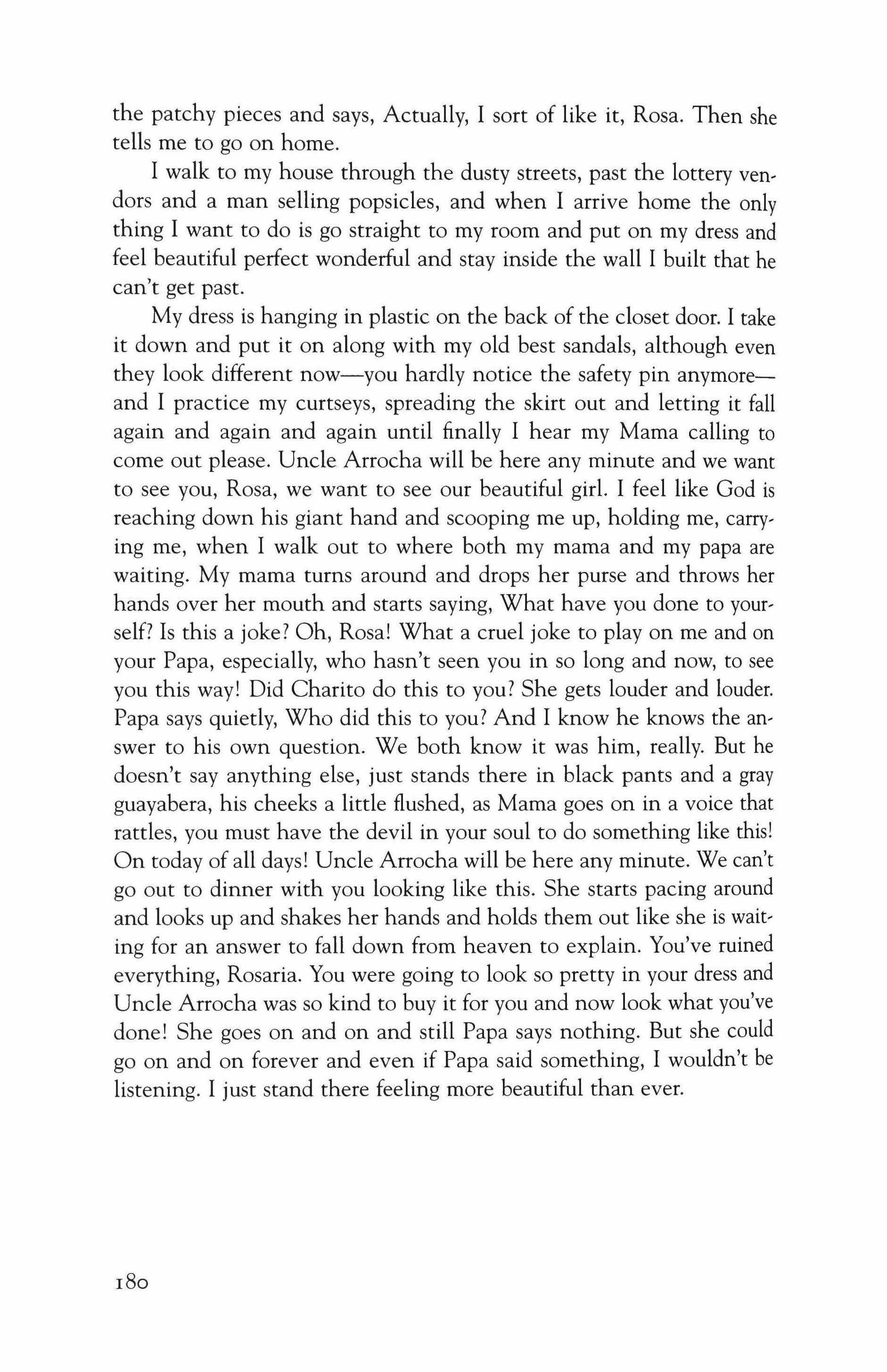
the patchy pieces and says, Actually, I sort of like it, Rosa. Then she tells me to go on home.
I walk to my house through the dusty streets, past the lottery vendors and a man selling popsicles, and when I arrive home the only thing I want to do is go straight to my room and put on my dress and feel beautiful perfect wonderful and stay inside the wall I built that he can't get past.
My dress is hanging in plastic on the back of the closet door. I take it down and put it on along with my old best sandals, although even they look different now-you hardly notice the safety pin anymoreand I practice my curtseys, spreading the skirt out and letting it fall again and again and again until finally I hear my Mama calling to come out please. Uncle Arrocha will be here any minute and we want to see you, Rosa, we want to see our beautiful girl. I feel like God is reaching down his giant hand and scooping me up, holding me, carrying me, when I walk out to where both my mama and my papa are waiting. My mama turns around and drops her purse and throws her hands over her mouth and starts saying, What have you done to yourself? Is this a joke? Oh, Rosa! What a cruel joke to play on me and on your Papa, especially, who hasn't seen you in so long and now, to see you this way! Did Charito do this to you? She gets louder and louder. Papa says quietly, Who did this to you? And I know he knows the answer to his own question. We both know it was him, really. But he doesn't say anything else, just stands there in black pants and a gray guayabera, his cheeks a little flushed, as Mama goes on in a voice that rattles, you must have the devil in your soul to do something like this! On today of all days! Uncle Arrocha will be here any minute. We can't go out to dinner with you looking like this. She starts pacing around and looks up and shakes her hands and holds them out like she is wait, ing for an answer to fall down from heaven to explain. You've ruined everything, Rosaria. You were going to look so pretty in your dress and Uncle Arrocha was so kind to buy it for you and now look what you've done! She goes on and on and still Papa says nothing. But she could go on and on forever and even if Papa said something, I wouldn't be listening. I just stand there feeling more beautiful than ever.
180
David Michael Kaplan
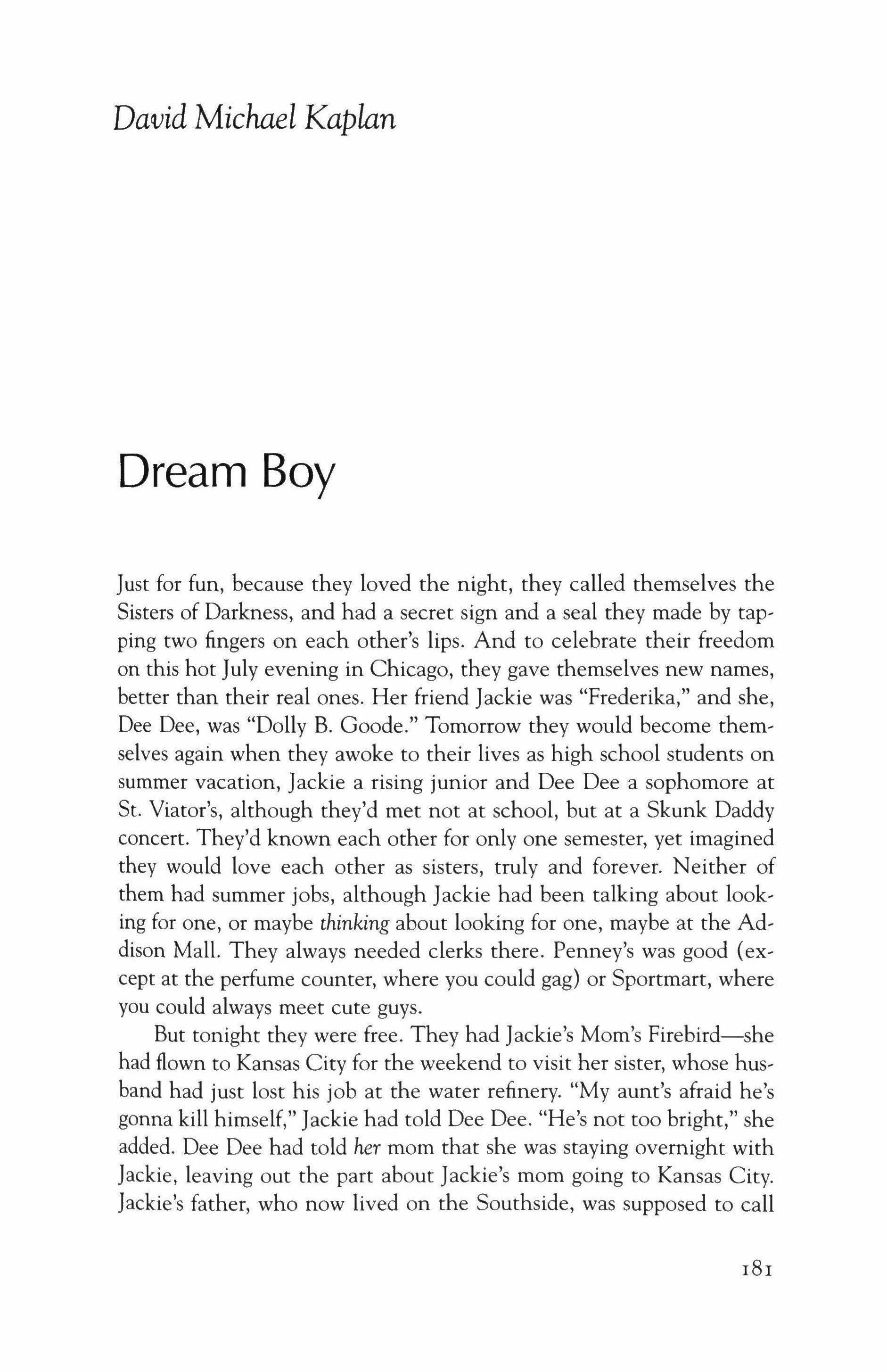
Dream Boy
Just for fun, because they loved the night, they called themselves the Sisters of Darkness, and had a secret sign and a seal they made by tapping two fingers on each other's lips. And to celebrate their freedom on this hot July evening in Chicago, they gave themselves new names, better than their real ones. Her friend Jackie was "Frederika," and she, Dee Dee, was "Dolly B. Goode." Tomorrow they would become themselves again when they awoke to their lives as high school students on summer vacation, Jackie a rising junior and Dee Dee a sophomore at St. Viator's, although they'd met not at school, but at a Skunk Daddy concert. They'd known each other for only one semester, yet imagined they would love each other as sisters, truly and forever. Neither of them had summer jobs, although Jackie had been talking about looking for one, or maybe thinking about looking for one, maybe at the Addison Mall. They always needed clerks there. Penney's was good (except at the perfume counter, where you could gag) or Sportmart, where you could always meet cute guys.
But tonight they were free. They had Jackie's Mom's Firebird-she had flown to Kansas City for the weekend to visit her sister, whose husband had just lost his job at the water refinery. "My aunt's afraid he's gonna kill himself," Jackie had told Dee Dee. "He's not too bright," she added. Dee Dee had told her mom that she was staying overnight with Jackie, leaving out the part about Jackie's mom going to Kansas City. Jackie's father, who now lived on the Southside, was supposed to call
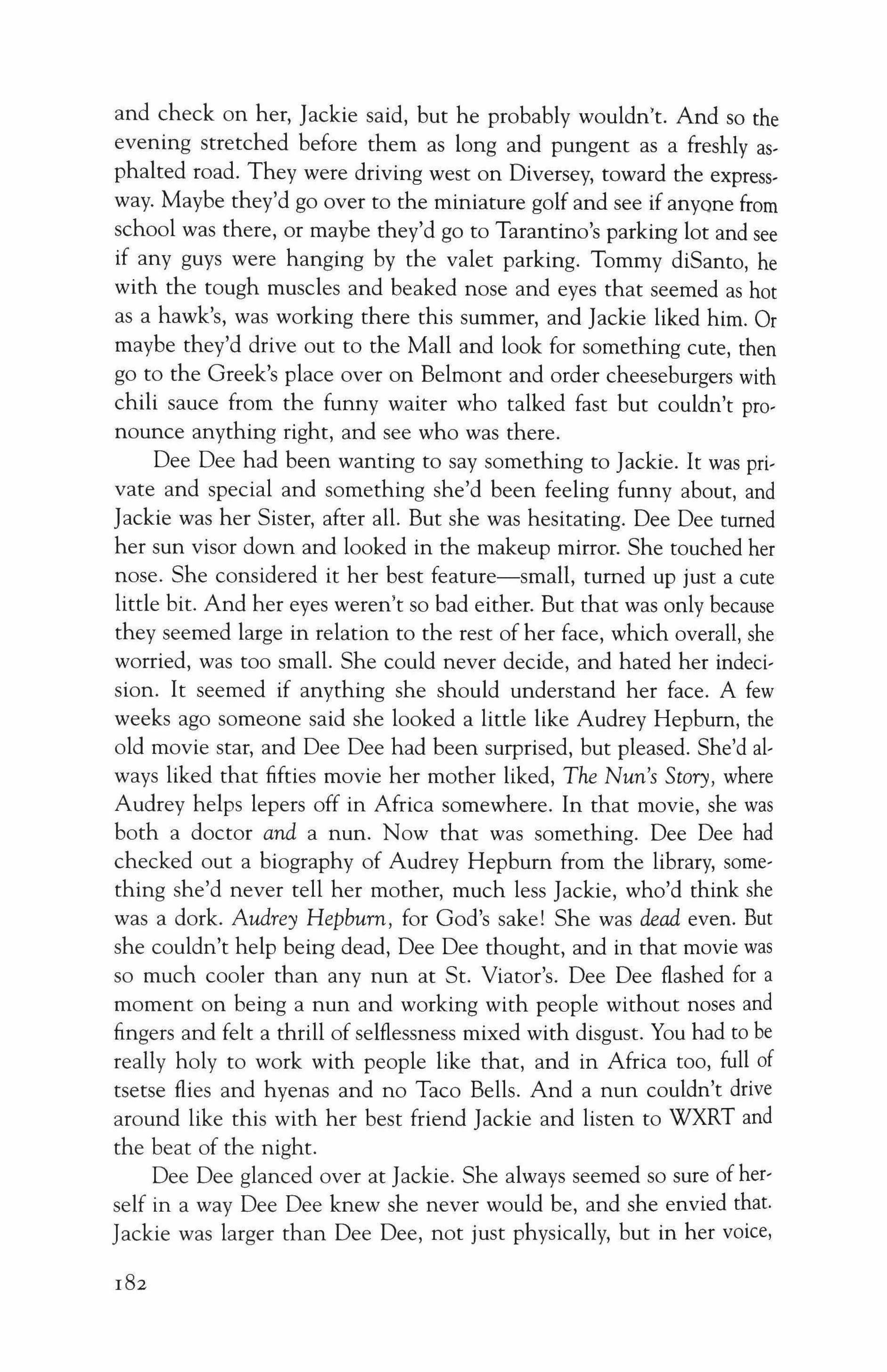
and check on her, Jackie said, but he probably wouldn't. And so the evening stretched before them as long and pungent as a freshly asphalted road. They were driving west on Diversey, toward the expressway. Maybe they'd go over to the miniature golf and see if anyone from school was there, or maybe they'd go to Tarantino's parking lot and see if any guys were hanging by the valet parking. Tommy diSanto, he with the tough muscles and beaked nose and eyes that seemed as hot as a hawk's, was working there this summer, and Jackie liked him. Or maybe they'd drive out to the Mall and look for something cute, then go to the Greek's place over on Belmont and order cheeseburgers with chili sauce from the funny waiter who talked fast but couldn't pronounce anything right, and see who was there.
Dee Dee had been wanting to say something to Jackie. It was private and special and something she'd been feeling funny about, and Jackie was her Sister, after all. But she was hesitating. Dee Dee turned her sun visor down and looked in the makeup mirror. She touched her nose. She considered it her best feature-small, turned up just a cute little bit. And her eyes weren't so bad either. But that was only because they seemed large in relation to the rest of her face, which overall, she worried, was too small. She could never decide, and hated her indecision. It seemed if anything she should understand her face. A few weeks ago someone said she looked a little like Audrey Hepburn, the old movie star, and Dee Dee had been surprised, but pleased. She'd always liked that fifties movie her mother liked, The Nun's Story, where Audrey helps lepers off in Africa somewhere. In that movie, she was both a doctor and a nun. Now that was something. Dee Dee had checked out a biography of Audrey Hepburn from the library, something she'd never tell her mother, much less Jackie, who'd think she was a dork. Audrey Hepburn, for God's sake! She was dead even. But she couldn't help being dead, Dee Dee thought, and in that movie was so much cooler than any nun at St. Viator's. Dee Dee flashed for a moment on being a nun and working with people without noses and fingers and felt a thrill of selflessness mixed with disgust. You had to be really holy to work with people like that, and in Africa too, full of tsetse flies and hyenas and no Taco Bells. And a nun couldn't drive around like this with her best friend Jackie and listen to WXRT and the beat of the night.
Dee Dee glanced over at Jackie. She always seemed so sure of herself in a way Dee Dee knew she never would be, and she envied that. Jackie was larger than Dee Dee, not just physically, but in her voice,
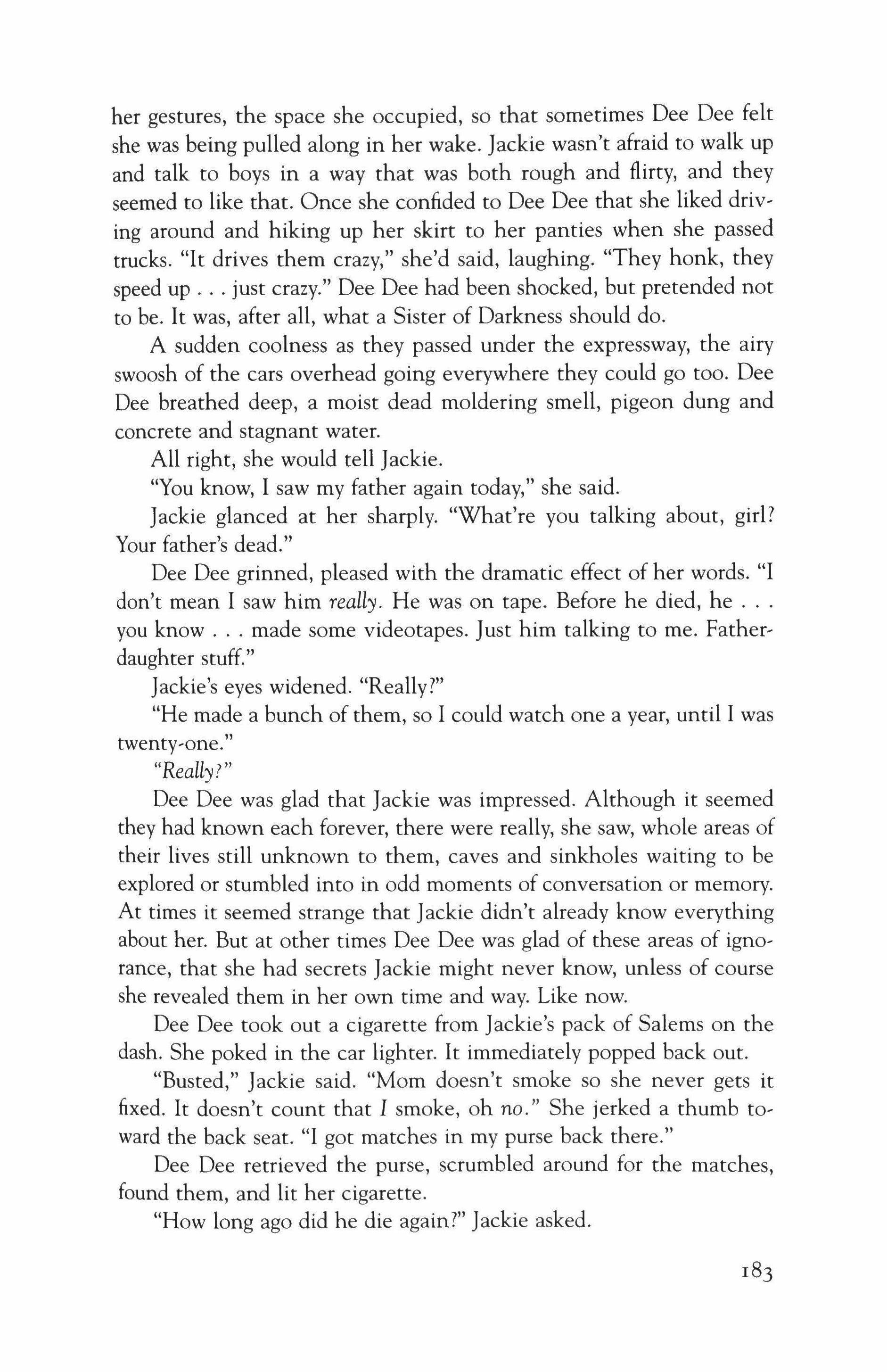
her gestures, the space she occupied, so that sometimes Dee Dee felt she was being pulled along in her wake. Jackie wasn't afraid to walk up and talk to boys in a way that was both rough and flirty, and they seemed to like that. Once she confided to Dee Dee that she liked driving around and hiking up her skirt to her panties when she passed trucks. "It drives them crazy," she'd said, laughing. "They honk, they speed up just crazy." Dee Dee had been shocked, but pretended not to be. It was, after all, what a Sister of Darkness should do.
A sudden coolness as they passed under the expressway, the airy swoosh of the cars overhead going everywhere they could go too. Dee Dee breathed deep, a moist dead moldering smell, pigeon dung and concrete and stagnant water.
All right, she would tell Jackie.
"You know, I saw my father again today," she said.
Jackie glanced at her sharply. "What're you talking about, girl? Your father's dead."
Dee Dee grinned, pleased with the dramatic effect of her words. "I don't mean I saw him really. He was on tape. Before he died, he you know made some videotapes. Just him talking to me. Fatherdaughter stuff."
Jackie's eyes widened. "Really?"
"He made a bunch of them, so I could watch one a year, until I was twenty-one."
"Really?"
Dee Dee was glad that Jackie was impressed. Although it seemed they had known each forever, there were really, she saw, whole areas of their lives still unknown to them, caves and sinkholes waiting to be explored or stumbled into in odd moments of conversation or memory. At times it seemed strange that Jackie didn't already know everything about her. But at other times Dee Dee was glad of these areas of ignorance, that she had secrets Jackie might never know, unless of course she revealed them in her own time and way. Like now.
Dee Dee took out a cigarette from Jackie's pack of Salems on the dash. She poked in the car lighter. It immediately popped back out.
"Busted," Jackie said. "Mom doesn't smoke so she never gets it fixed. It doesn't count that I smoke, oh no." She jerked a thumb toward the back seat. "I got matches in my purse back there."
Dee Dee retrieved the purse, scrumbled around for the matches, found them, and lit her cigarette.
"How long ago did he die again?" Jackie asked.

"Wh I E' h en was seven. tg t years ago.
"So-"Jackie said-"you been watching these for eight years?"
Dee Dee nodded.
"Whew!" Jackie shook out a cigarette. "Can you light this for me?" She leaned over, cigarette between her lips. Dee Dee lit it and tossed the match out the window. "So," Jackie said, waving her cigarette. "What's he sayan these tapes? Your father?"
"Oh, I don't know just things." Suddenly Dee Dee felt like she shouldn't be talking about the tapes. But it was too late, Jackie was interested, and she'd never let it go. "He, like, tries to figure out what to say for how old I am. He always starts off by saying my age. You know, like, 'Well, another year's passed, and you're nine years old now. Fourth grade. You're probably interested in-' and he tries to imagine what I'm interested in." Cigarette ash fell on her shorts, her leg, and she brushed them off. "He doesn't do too good it gets really funny sometimes."
"I gotta tell you," Jackie said, "I think this is one hundred percent way weird."
"My mom decided way back that I should watch them on July 9. Today. The day he died."
"Oh God----depressing!"
Dee Dee shrugged. "She thought it was a good day because then it's like he didn't really die, because he's back. He's come back to talk to me." She took a sharp drag from her cigarette. "It's O.K. A little depressing, yeah, but basically O.K."
Jackie clucked sympathetically.
Actually, it was a downer to have to see him every year like that, sick and getting sicker. When she was smaller, it had been sort of fun, if not strange, to see her father again. But the last few years it seemed he was rambling more and more, and getting more and more forgetful. Once he'd called her "Nola." Who's Nola? Dee Dee had wondered, but never asked her mother. And once he called her by her mother's name. He's forgetting me, Dee Dee thought, and bit her lip. Well, he couldn't be blamed for that, could he? After all this time? And then she'd remembered that all these tapes were made his last few months of life, and that "all this time"-these years-had passed only for her, not him. When a tape was over, he'd always say, "Well, goodbye, honeybun. I'll see you next year. And in your dreams." One time, right after he'd said that, he broke into that sappy Sinatra song, "Dreams can come true / they can happen to you / ifyou're young at heart "God, Dad," Dee Dee had murmured, embarrassed. He'd paused, his hands resting on
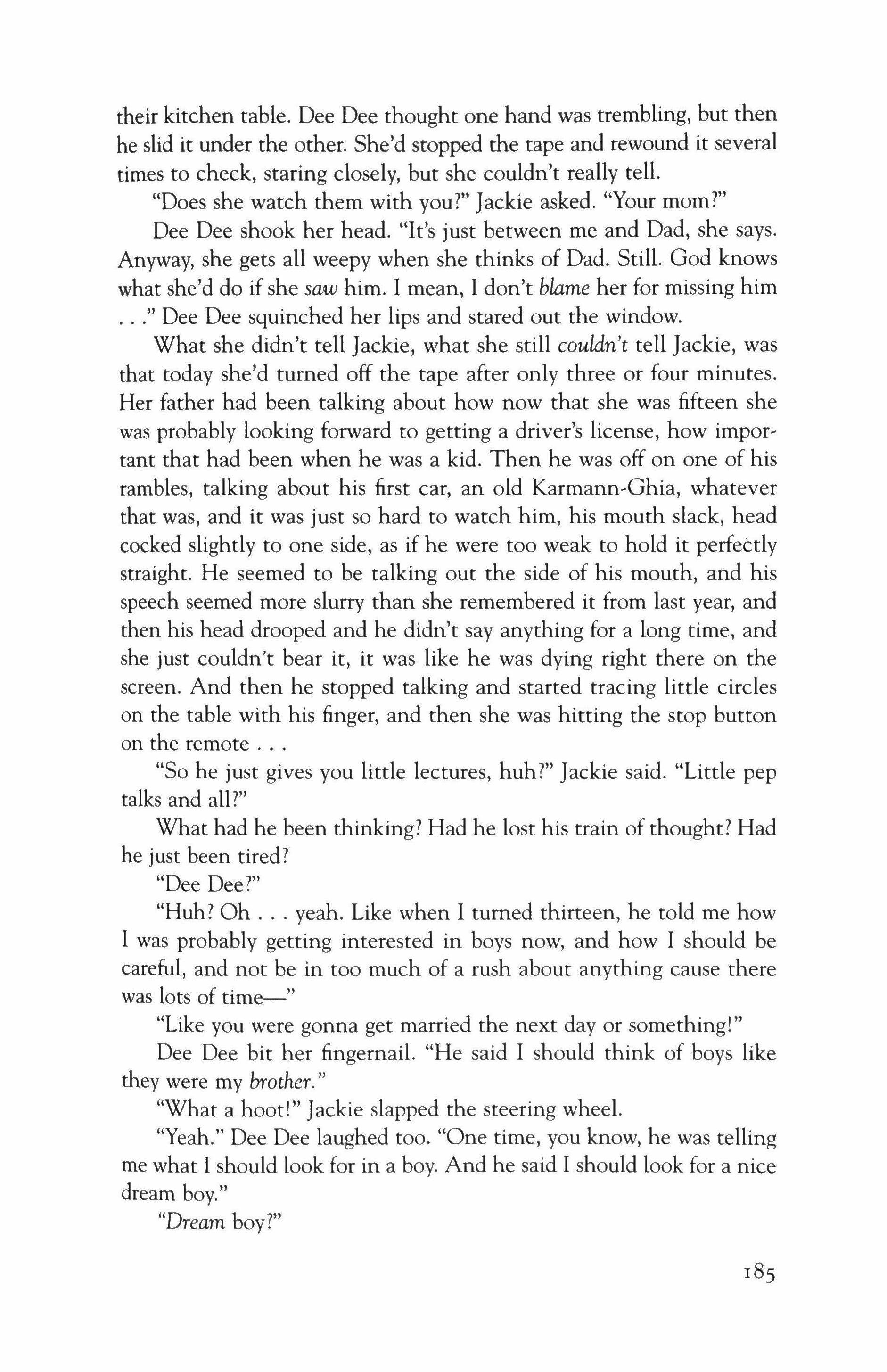
their kitchen table. Dee Dee thought one hand was trembling, but then he slid it under the other. She'd stopped the tape and rewound it several times to check, staring closely, but she couldn't really tell.
"Does she watch them with you?" Jackie asked. "Your mom?"
Dee Dee shook her head. "It's just between me and Dad, she says. Anyway, she gets all weepy when she thinks of Dad. Still. God knows what she'd do if she saw him. I mean, I don't blame her for missing him Dee Dee squinched her lips and stared out the window.
What she didn't tell Jackie, what she still couldn't tell Jackie, was that today she'd turned off the tape after only three or four minutes. Her father had been talking about how now that she was fifteen she was probably looking forward to getting a driver's license, how important that had been when he was a kid. Then he was off on one of his rambles, talking about his first car, an old Karmann-Ghia, whatever that was, and it was just so hard to watch him, his mouth slack, head cocked slightly to one side, as if he were too weak to hold it perfectly straight. He seemed to be talking out the side of his mouth, and his speech seemed more slurry than she remembered it from last year, and then his head drooped and he didn't say anything for a long time, and she just couldn't bear it, it was like he was dying right there on the screen. And then he stopped talking and started tracing little circles on the table with his finger, and then she was hitting the stop button on the remote
"So he just gives you little lectures, huh?" Jackie said. "Little pep talks and all?"
What had he been thinking? Had he lost his train of thought? Had he just been tired?
"Dee Dee?"
"Huh? Oh yeah. Like when I turned thirteen, he told me how I was probably getting interested in boys now, and how I should be careful, and not be in too much of a rush about anything cause there was lots of time-"
"Like you were gonna get married the next day or something!"
Dee Dee bit her fingernail. "He said I should think of boys like they were my brother."
"What a hoot!" Jackie slapped the steering wheel. "Yeah." Dee Dee laughed too. "One time, you know, he was telling me what I should look for in a boy. And he said I should look for a nice dream boy."
"Dream boy?"
185

"Yeah. I think he meant 'clean boy,' but it just came out wrong. He was kind of slurring and mumbling, you know." Dee flicked her cigarette out the window. She turned and watched it bounce, flash, bounce on the pavement behind them.
Jackie pursed her lips. "I hope you don't mind me saying this, Dee Dee, but I think dead people-no offense to your father-should just be dead after they die. I mean, that's what death's all about, isn't it? Being dead? I mean, it's nice to remember them and everything, maybe look at some pictures every now and then, but to have to see him every year always about to die well, that's asking a little much."
"It's not that bad," Dee Dee said, surprised a little by her defensiveness. Hadn't she thought much the same thing herself? And she had turned off the tape today. While her father's head hung in silence. While he'd been tracing little circles on the table.
Dee Dee thought of his sallow, yellow face-yellow because he was so jaundiced at the end, and dried up. The only thing she remembered of his last stay in the hospital, the rest blanked out, like water-stained pages of a notebook, was that he was always licking his lips, which were chapped and dry, but never asking for a glass of water. She always wondered whether she should ask him if he wanted one, or not ask and just give him one, but she never did. And why not? Thinking he'd say, No, he was fine? That if he really wanted one, he'd ask? Or that it wasn't her place, that was what her mother and the nurses were there for? Dee Dee remembered being slightly angry and uncomfortable in that hospital room, as if it were either too hot or too cold or too stuffy, although it was none of those things. She was always anxious to get away. She knew she wasn't supposed to feel that way, but couldn't help it. One time she'd even told her mother she didn't want to go see him, and when asked why, Dee Dee mumbled something about it smelling funny there, no, Daddy smelling funny, and her mother had gotten a strange, wild look in her eye and slapped her so hard that her ear stung for hours.
And then toward the end, he hadn't wanted her to come to the hospital anyway
"You know what's really weird about the tapes?" Dee Dee said. "It's that he's always the same age. I mean, I get older, and there he is, still the same." She bit her nail. "But he's always dying too."
"If I were you," Jackie said, "I'd just look at all of them at once. See what he's got to say about everything and get it over with." She looked at Dee Dee. "They're just tapes, you know."
186
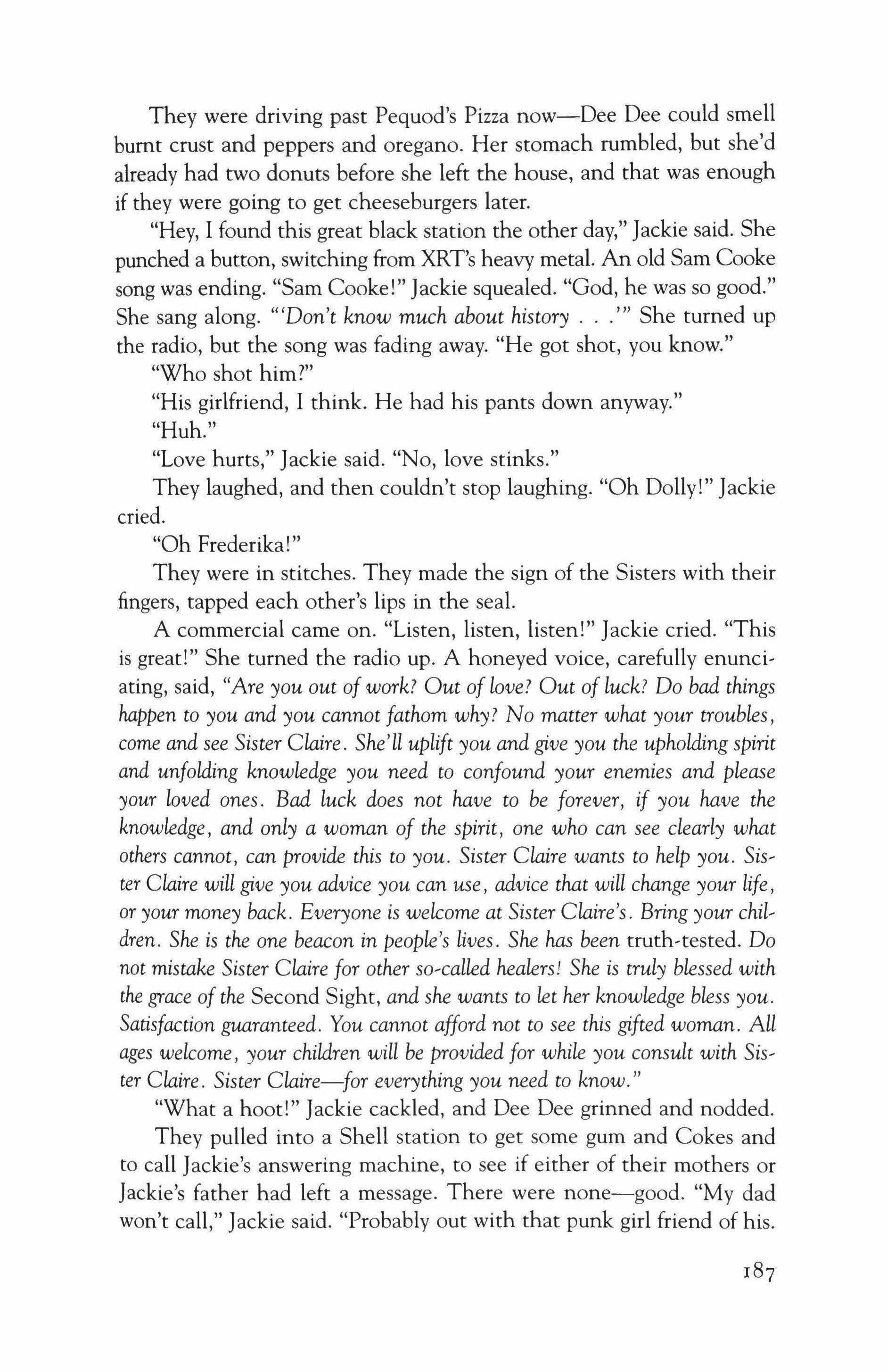
They were driving past Pequod's Pizza now-Dee Dee could smell burnt crust and peppers and oregano. Her stomach rumbled, but she'd already had two donuts before she left the house, and that was enough if they were going to get cheeseburgers later.
"Hey, I found this great black station the other day," Jackie said. She punched a button, switching from XRT's heavy metal. An old Sam Cooke song was ending. "Sam Cooke!" Jackie squealed. "God, he was so good." She sang along. '''Don't know much about history ", She turned up the radio, but the song was fading away. "He got shot, you know."
"Who shot him?"
"His girlfriend, I think. He had his pants down anyway." "Huh."
"Love hurts," Jackie said. "No, love stinks."
They laughed, and then couldn't stop laughing. "Oh Dolly!" Jackie cried.
"Oh Frederika!"
They were in stitches. They made the sign of the Sisters with their fingers, tapped each other's lips in the seal.
A commercial came on. "Listen, listen, listen!" Jackie cried. "This is great!" She turned the radio up. A honeyed voice, carefully enunciating, said, "Are you out of work? Out of love? Out of luck? Do bad things happen to you and you cannot fathom why? No matter what your troubles, come and see Sister Claire. She'll uplift you and give you the upholding spirit and unfolding knowledge you need to confound your enemies and please your loved ones. Bad luck does not have to be forever, if you have the knowledge, and only a woman of the spirit, one who can see clearly what others cannot, can provide this to you. Sister Claire wants to help you. Sister Claire will give you advice you can use, advice that will change your life, or your money back. Everyone is welcome at Sister Claire's. Bring your children. She is the one beacon in people's lives. She has been truth-tested. Do not mistake Sister Claire for other so-called healers! She is truly blessed with the grace of the Second Sight, and she wants to let her knowledge bless you. Satisfaction guaranteed. You cannot afford not to see this gifted woman. All ages welcome, your children will be provided for while you consult with Sister Claire. Sister Claire-for everything you need to know."
"What a hoot!" Jackie cackled, and Dee Dee grinned and nodded. They pulled into a Shell station to get some gum and Cokes and to call Jackie's answering machine, to see if either of their mothers or Jackie's father had left a message. There were none-good. "My dad won't call," Jackie said. "Probably out with that punk girl friend of his.
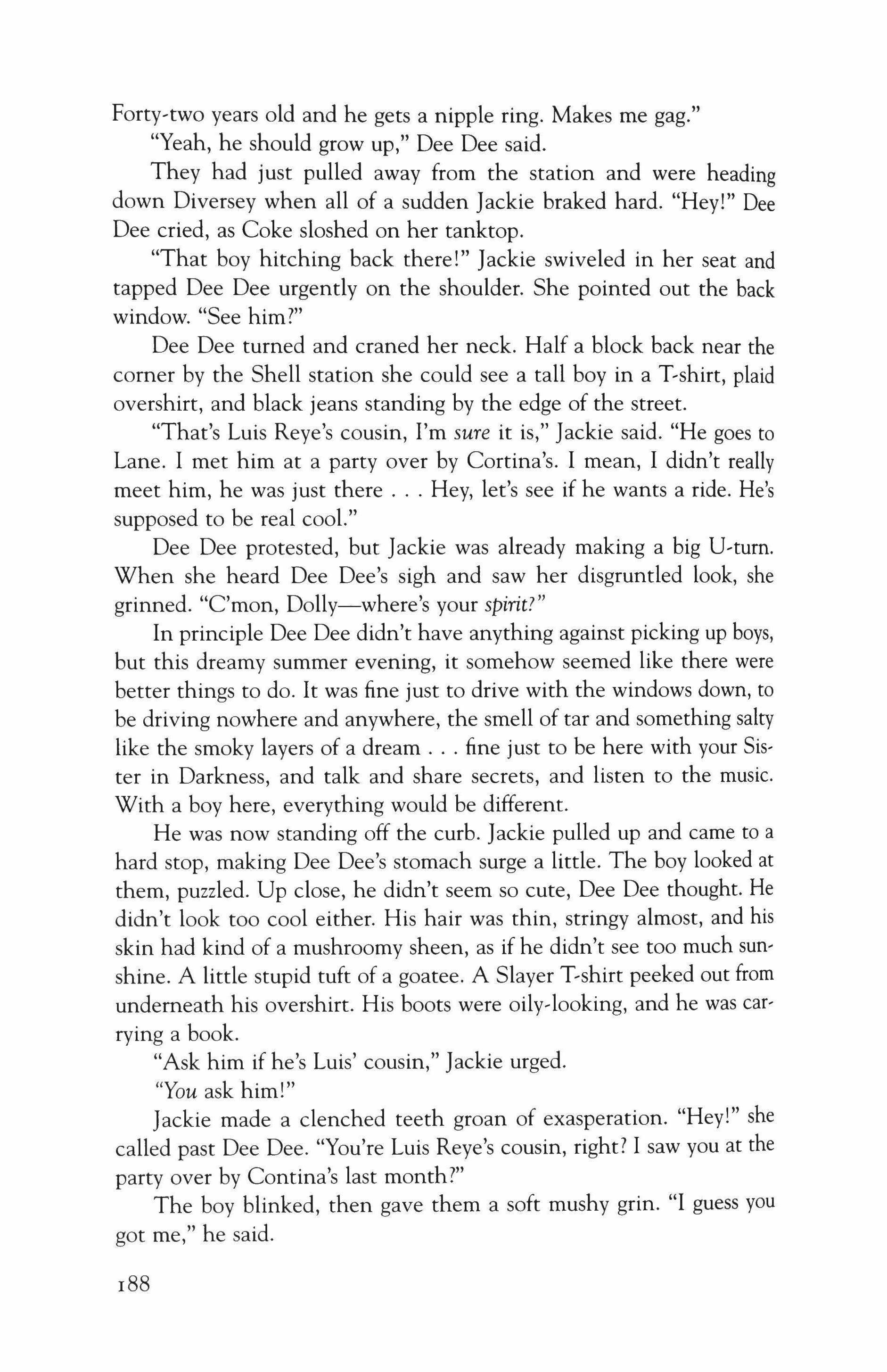
Forty-two years old and he gets a nipple ring. Makes me gag."
"Yeah, he should grow up," Dee Dee said.
They had just pulled away from the station and were heading down Diversey when all of a sudden Jackie braked hard. "Hey!" Dee Dee cried, as Coke sloshed on her tanktop.
"That boy hitching back there!" Jackie swiveled in her seat and tapped Dee Dee urgently on the shoulder. She pointed out the back window. "See him?"
Dee Dee turned and craned her neck. Half a block back near the corner by the Shell station she could see a tall boy in a Tshirt, plaid overshirt, and black jeans standing by the edge of the street.
"That's Luis Reye's cousin, I'm sure it is," Jackie said. "He goes to Lane. I met him at a party over by Cortina's. I mean, I didn't really meet him, he was just there Hey, let's see if he wants a ride. He's supposed to be real cool."
Dee Dee protested, but Jackie was already making a big U-turn. When she heard Dee Dee's sigh and saw her disgruntled look, she grinned. "C'mon, Dolly-where's your spirit?"
In principle Dee Dee didn't have anything against picking up boys, but this dreamy summer evening, it somehow seemed like there were better things to do. It was fine just to drive with the windows down, to be driving nowhere and anywhere, the smell of tar and something salty like the smoky layers of a dream fine just to be here with your Sister in Darkness, and talk and share secrets, and listen to the music. With a boy here, everything would be different.
He was now standing off the curb. Jackie pulled up and came to a hard stop, making Dee Dee's stomach surge a little. The boy looked at them, puzzled. Up close, he didn't seem so cute, Dee Dee thought. He didn't look too cool either. His hair was thin, stringy almost, and his skin had kind of a mushroomy sheen, as if he didn't see too much sunshine. A little stupid tuft of a goatee. A Slayer 'Tshirt peeked out from underneath his overshirt. His boots were oily-looking, and he was carrying a book.
"Ask him if he's Luis' cousin," Jackie urged.
"You ask him!"
Jackie made a clenched teeth groan of exasperation. "Hey!" she called past Dee Dee. "You're Luis Reye's cousin, right? I saw you at the party over by Contina's last month?"
The boy blinked, then gave them a soft mushy grin. "I guess you got me," he said.
188
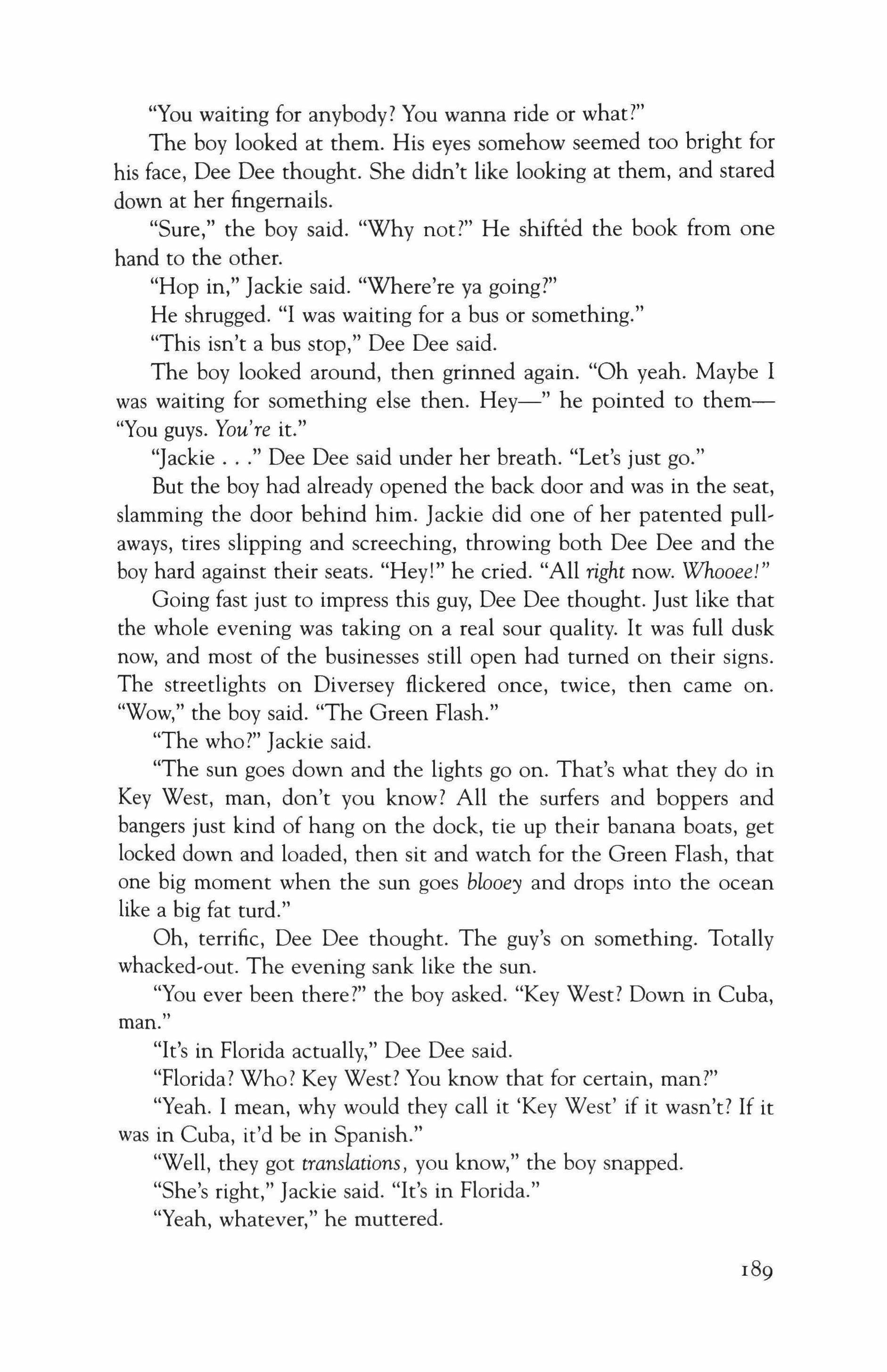
"You waiting for anybody? You wanna ride or what?"
The boy looked at them. His eyes somehow seemed too bright for his face, Dee Dee thought. She didn't like looking at them, and stared down at her fingernails.
"Sure," the boy said. "Why not?" He shifted the book from one hand to the other.
"Hop in," Jackie said. "Where're ya going?"
He shrugged. "I was waiting for a bus or something."
"This isn't a bus stop," Dee Dee said.
The boy looked around, then grinned again. "Oh yeah. Maybe I was waiting for something else then. Hey-" he pointed to them"You guys. You're it."
"Jackie Dee Dee said under her breath. "Let's just go."
But the boy had already opened the back door and was in the seat, slamming the door behind him. Jackie did one of her patented pull, aways, tires slipping and screeching, throwing both Dee Dee and the hoy hard against their seats. "Hey!" he cried. "All right now. Whooee!"
Going fast just to impress this guy, Dee Dee thought. Just like that the whole evening was taking on a real sour quality. It was full dusk now, and most of the businesses still open had turned on their signs. The streetlights on Diversey flickered once, twice, then came on. "Wow," the boy said. "The Green Flash."
"The who?" Jackie said.
"The sun goes down and the lights go on. That's what they do in Key West, man, don't you know? All the surfers and boppers and hangers just kind of hang on the dock, tie up their banana boats, get locked down and loaded, then sit and watch for the Green Flash, that one big moment when the sun goes blooey and drops into the ocean like a big fat turd."
Oh, terrific, Dee Dee thought. The guy's on something. Totally whacked-out. The evening sank like the sun.
"You ever been there?" the boy asked. "Key West? Down in Cuba, man."
"It's in Florida actually," Dee Dee said.
"Florida? Who? Key West? You know that for certain, man?"
"Yeah. I mean, why would they call it 'Key West' if it wasn't? If it was in Cuba, it'd be in Spanish."
"Well, they got translations, you know," the boy snapped.
"She's right," Jackie said. "It's in Florida."
"Yeah, whatever," he muttered.

"I went to Florida with my folks when I was five or so," Jackie said. "Before they split. We went to Disney World, but I don't remember much about it. I got my picture taken with that cricket from Pinocchio."
"Oh man," the boy said. "Everybody does that. You know what I wish? I wish just one time they'd yank his little green head off. Except it's not a real head, you know? There's no real cricket inside."
"Hey," Dee Dee said. "Are you for real?"
"Yeah," the boy snorted. "Are you?"
Dee Dee rolled her eyes at Jackie. She slumped in her seat so he couldn't see and twirled her finger near her head-crazy. Jackie pursed her lips in amusement.
"You know," the boy said, and Dee Dee realized he was talking to her, "I only been in this ride for, I don't know, maybe three, four minutes max, but already I see you got an aura that's real black. Evil eye dagger-like black."
"Oh yeah, right," Dee Dee said.
"Hey!" The boy leaned over and tapped Jackie's shoulder. Dee Dee could smell cheap after-shave, musky and thick. "She here for a long time? She a friend? Or you just pick her up too?"
"She's O.K.," Jackie said. "She's just a little high strung."
"No, I'm not!" Dee Dee sat up. "Jackie!"
"She's had a rough day," Jackie said. "Death in the family."
"Shut up, Jackie!"
"Oh, heyyy, man, I'm sorry," the boy said. "Someone close?"
"Her father."
"Oh man, that's too bad." He gave Dee Dee a little two-fingered salute. "My deep and egregious sympathies."
Dee Dee slumped back in her seat and crossed her arms.
"What's your name, anyway?" Jackie asked, glancing in the rear view mirror. "I don't remember from the party."
"Lothar," he said.
"Come again?"
"Lothar. L-O-T-H-A-R."
"What kinda name's that?" Dee Dee asked, turning. He looked at her balefully. "It's an American name!"
"Lothar," Jackie said. "O.K., Lothar. I'm Frederika and she's Dolly."
"I thought she called you Jackie."
Jackie shrugged. "O.K., then she's Dee Dee and I'm Jackie."
"Hey, you guys got a lot of names." Lothar leaned back in the seat. "But that's cool. Hey-" He lunged forward, grabbing Dee Dee's seat
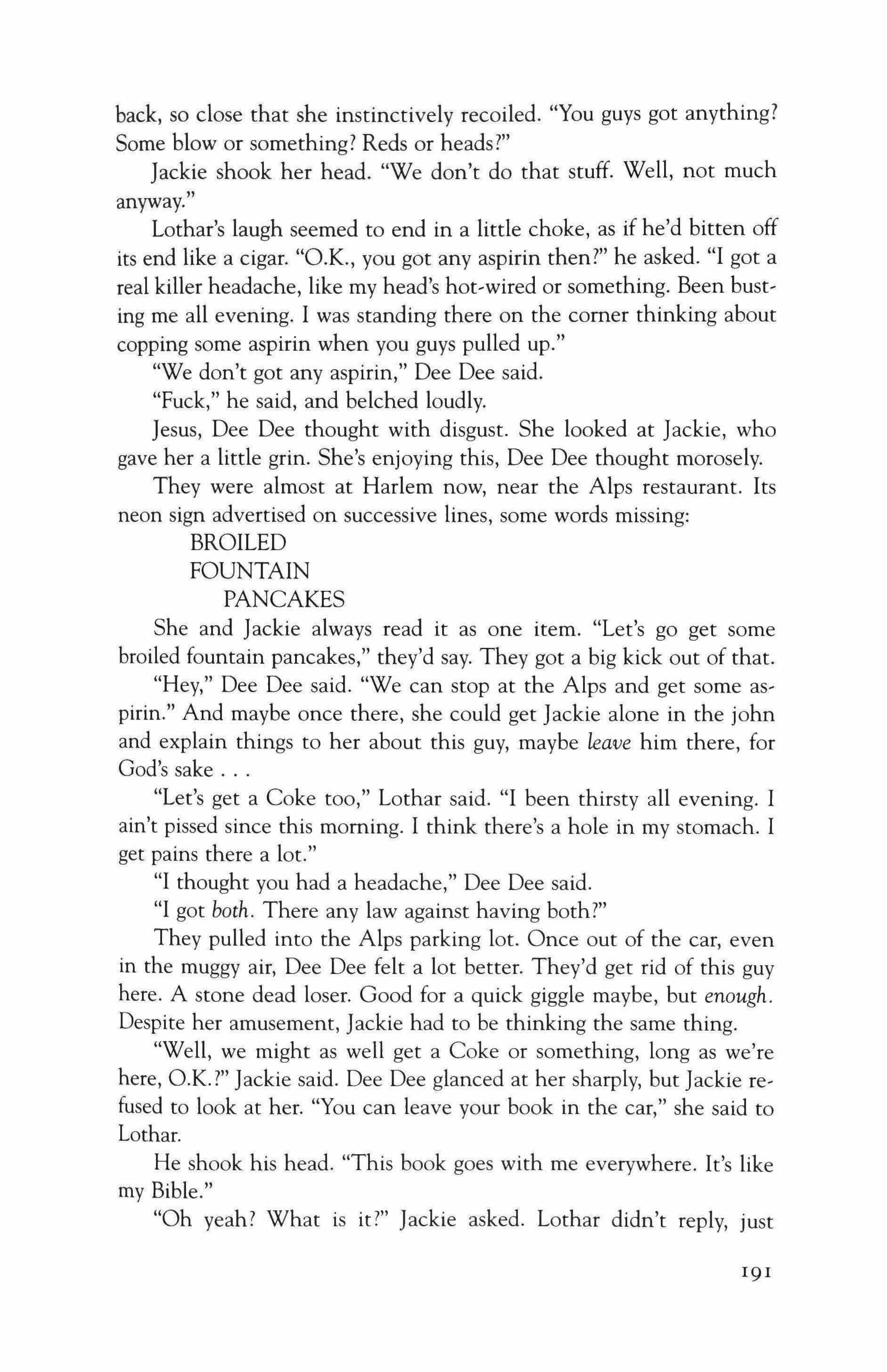
back, so close that she instinctively recoiled. "You guys got anything? Some blow or something? Reds or heads?"
Jackie shook her head. "We don't do that stuff. Well, not much anyway."
Lothar's laugh seemed to end in a little choke, as if he'd bitten off its end like a cigar. "O.K., you got any aspirin then?" he asked. "I got a real killer headache, like my head's hot-wired or something. Been busting me all evening. I was standing there on the comer thinking about copping some aspirin when you guys pulled up."
"We don't got any aspirin," Dee Dee said.
"Fuck," he said, and belched loudly.
Jesus, Dee Dee thought with disgust. She looked at Jackie, who gave her a little grin. She's enjoying this, Dee Dee thought morosely.
They were almost at Harlem now, near the Alps restaurant. Its neon sign advertised on successive lines, some words missing: BROILED FOUNTAIN
PANCAKES
She and Jackie always read it as one item. "Let's go get some broiled fountain pancakes," they'd say. They got a big kick out of that.
"Hey," Dee Dee said. "We can stop at the Alps and get some aspirin." And maybe once there, she could get Jackie alone in the john and explain things to her about this guy, maybe leave him there, for God's sake
"Let's get a Coke too," Lothar said. "I been thirsty all evening. I ain't pissed since this morning. I think there's a hole in my stomach. I get pains there a lot."
"I thought you had a headache," Dee Dee said. "I got both. There any law against having both?"
They pulled into the Alps parking lot. Once out of the car, even in the muggy air, Dee Dee felt a lot better. They'd get rid of this guy here. A stone dead loser. Good for a quick giggle maybe, but enough. Despite her amusement, Jackie had to be thinking the same thing.
"Well, we might as well get a Coke or something, long as we're here, O.K.?" Jackie said. Dee Dee glanced at her sharply, but Jackie refused to look at her. "You can leave your book in the car," she said to Lothar.
He shook his head. "This book goes with me everywhere. It's like my Bible."
"Oh yeah? What is it?" Jackie asked. Lothar didn't reply, just
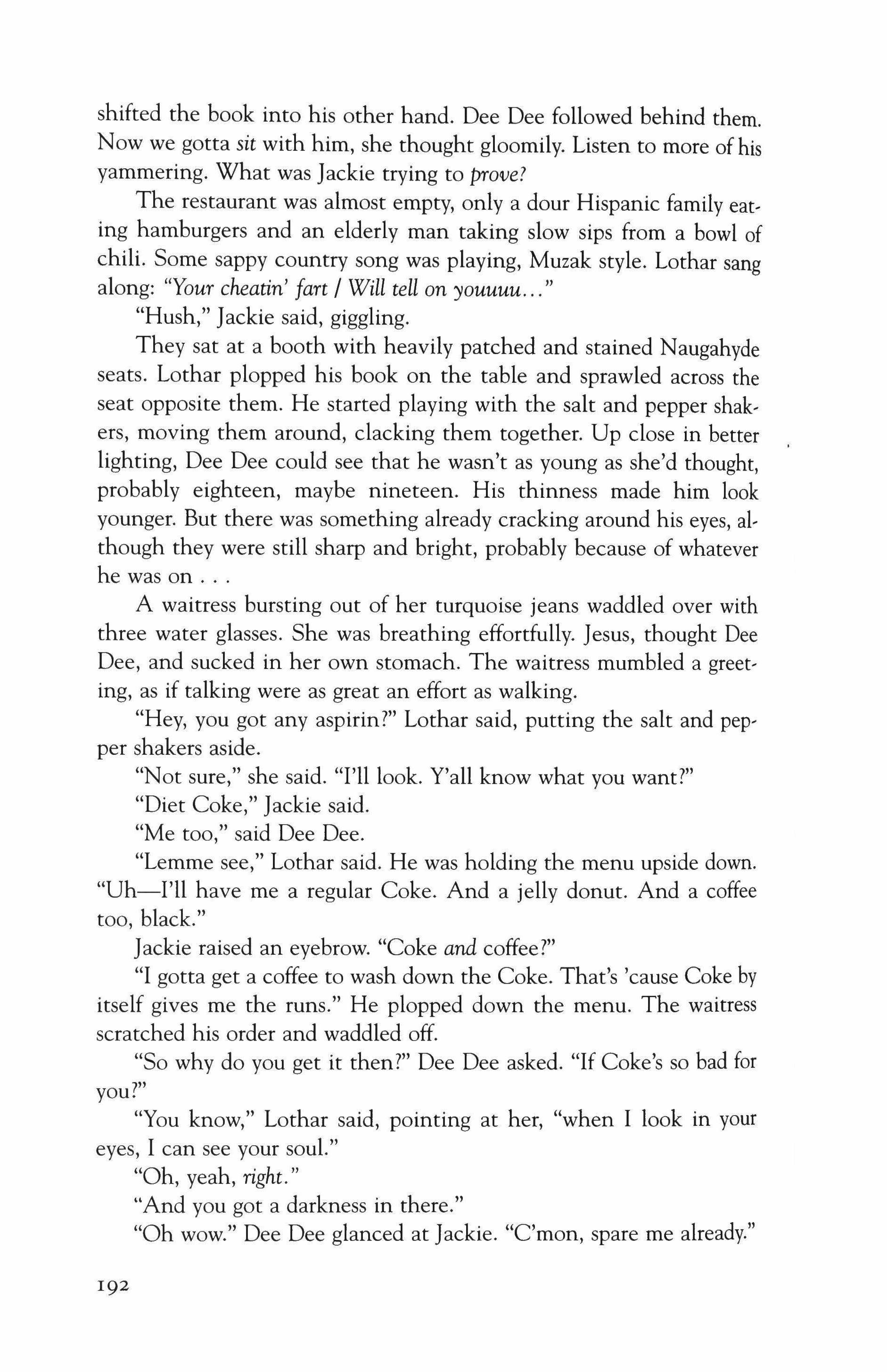
shifted the book into his other hand. Dee Dee followed behind them. Now we gotta sit with him, she thought gloomily. Listen to more of his yammering. What was Jackie trying to prove?
The restaurant was almost empty, only a dour Hispanic family eating hamburgers and an elderly man taking slow sips from a bowl of chili. Some sappy country song was playing, Muzak style. Lothar sang along: "Your cheatin' fart / Will tell on youuuu
"Hush," Jackie said, giggling.
They sat at a booth with heavily patched and stained Naugahyde seats. Lothar plopped his book on the table and sprawled across the seat opposite them. He started playing with the salt and pepper shakers, moving them around, clacking them together. Up close in better lighting, Dee Dee could see that he wasn't as young as she'd thought, probably eighteen, maybe nineteen. His thinness made him look younger. But there was something already cracking around his eyes, although they were still sharp and bright, probably because of whatever he was on
A waitress bursting out of her turquoise jeans waddled over with three water glasses. She was breathing effortfully. Jesus, thought Dee Dee, and sucked in her own stomach. The waitress mumbled a greeting, as if talking were as great an effort as walking.
"Hey, you got any aspirin?" Lothar said, putting the salt and pepper shakers aside.
"Not sure," she said. "I'll look. Y'all know what you want?"
"Diet Coke," Jackie said.
"Me too," said Dee Dee.
"Lemme see," Lothar said. He was holding the menu upside down. "Uh-I'll have me a regular Coke. And a jelly donut. And a coffee too, black."
Jackie raised an eyebrow. "Coke and coffee?"
"I gotta get a coffee to wash down the Coke. That's 'cause Coke by itself gives me the runs." He plopped down the menu. The waitress scratched his order and waddled off.
"So why do you get it then?" Dee Dee asked. "If Coke's so bad for you?"
"You know," Lothar said, pointing at her, "when I look in your eyes, I can see your soul."
"Oh, yeah, right."
"And you got a darkness in there."
"Oh wow." Dee Dee glanced at Jackie. "C'mon, spare me already."

"You don't got love in your soul."
"Hey, just stop, O.K.?" Dee Dee snapped. "Let's just leave love out of the conversation, O.K.?"
"Dolly Jackie said.
Lothar held up a finger. "There it is again," he said. "Your name really Dolly?"
"No, we told you already. I'm Dee Dee. Dee Dee. She's Jackie. You know, like 'Me Tarzan, you Jane?'"
"Why's she calling you Dolly then?" he asked. "If that's not your name?"
"It's-it's just a game we play," Dee Dee muttered. "Giving each other funny names."
"Dolly-that's a cow's name, you know. Like Dolly Madison. First she was a cow, then she was ice cream."
"Yeah, well, that's not my name anyway, so you can joke all you want."
"Dee Dee, huh?" He snorted. "That's even worse."
"Yeah, well, Lothar, huh?" Dee Dee glared at him. "Lothar."
He chuckled and stretched his leg across the seat. The cuffs of his jeans hiked up, and Dee Dee felt herself go cold. A knife-it looked like a hunting knife-was strapped with a leather watch buckle on his calf near the ankle. Lothar casually pulled the pants leg down. Dee Dee glanced at Jackie, but she seemed not to have seen it.
"Hey," Jackie said. "What's that book you're reading anyway?"
Lothar's eyes rolled slightly, then fixed on the book. He held it up so they could read the title: The Power of Living Love. A bad illustration on the cover showed a man sitting at a desk, palms up, staring into the sky from which beneficent rays emanated, from the sun, or God, or maybe a flying saucer. He looked about to levitate toward it, whatever it was. It was the kind of illustration you'd see on matchbook covers, or on the books in the Bible store window Dee Dee passed on the way to the bus in the morning. The page edges were dirty, wellthumbed.
"It's all about getting down with your deepest self," Lothar said. "Getting all your energy together and focusing it on something, man. Like a big fat magnifying glass. So your energy can just burn it all away."
"Burn what away?" Jackie asked.
"Any damn thing you want. Whatever's bugging you." He smiled at Dee Dee, and she averted her eyes. "Whoever's bugging you."
193
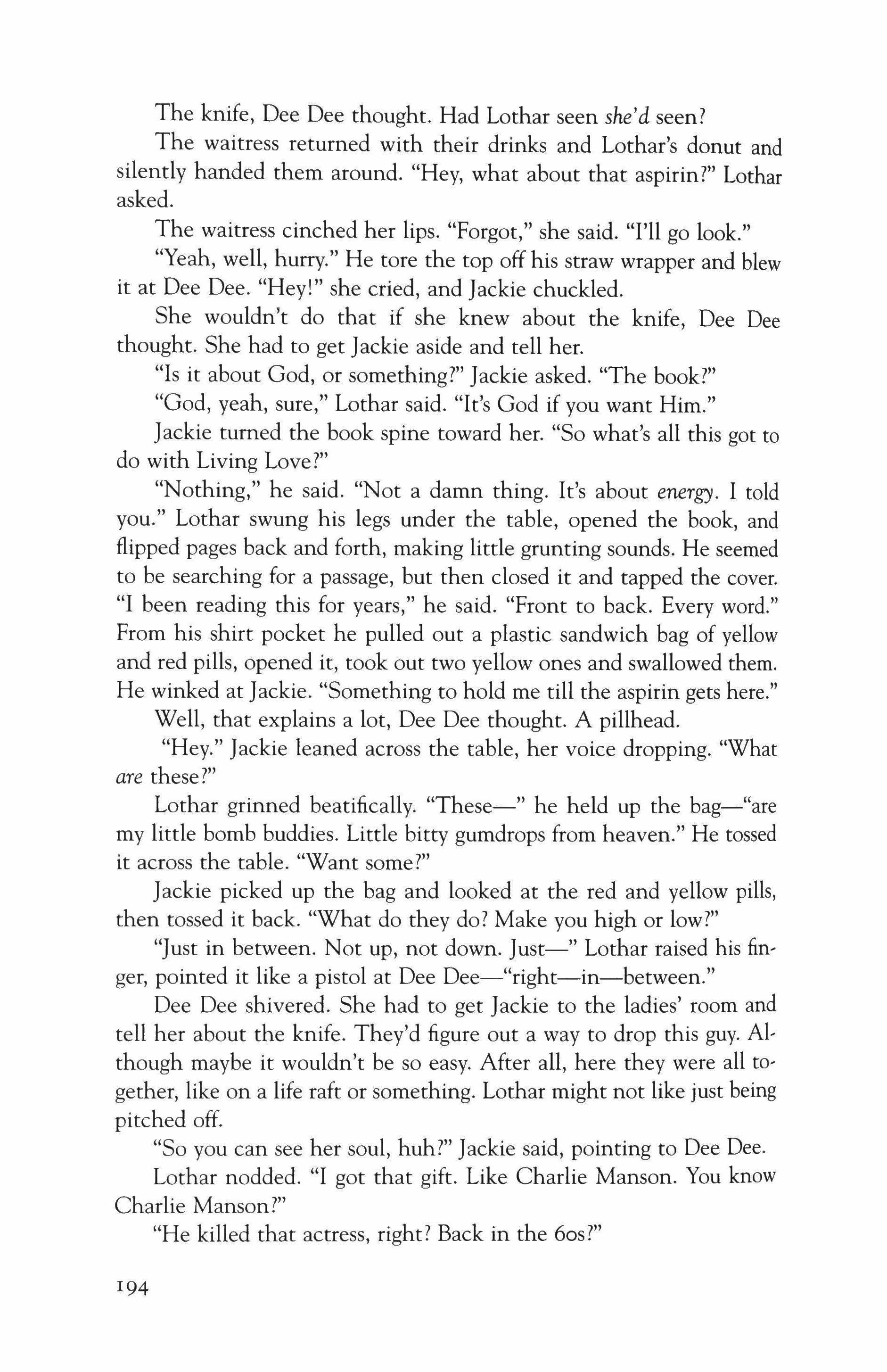
The knife, Dee Dee thought. Had Lothar seen she'd seen?
The waitress returned with their drinks and Lothar's donut and silently handed them around. "Hey, what about that aspirin?" Lothar asked.
The waitress cinched her lips. "Forgot," she said. "I'll go look."
"Yeah, well, hurry." He tore the top off his straw wrapper and blew it at Dee Dee. "Hey!" she cried, and Jackie chuckled.
She wouldn't do that if she knew about the knife, Dee Dee thought. She had to get Jackie aside and tell her.
"Is it about God, or something?" Jackie asked. "The book?"
"God, yeah, sure," Lothar said. "It's God if you want Him."
Jackie turned the book spine toward her. "So what's all this got to do with Living Love?"
"Nothing," he said. "Not a damn thing. It's about energy. I told you." Lothar swung his legs under the table, opened the book, and flipped pages back and forth, making little grunting sounds. He seemed to be searching for a passage, but then closed it and tapped the cover. "I been reading this for years," he said. "Front to back. Every word." From his shirt pocket he pulled out a plastic sandwich bag of yellow and red pills, opened it, took out two yellow ones and swallowed them. He winked at Jackie. "Something to hold me till the aspirin gets here."
Well, that explains a lot, Dee Dee thought. A pillhead.
"Hey." Jackie leaned across the table, her voice dropping. "What are these?"
Lothar grinned beatifically. "These-" he held up the bag-"are my little bomb buddies. Little bitty gumdrops from heaven." He tossed it across the table. "Want some?"
Jackie picked up the bag and looked at the red and yellow pills, then tossed it back. "What do they do? Make you high or low?"
"Just in between. Not up, not down. Just-" Lothar raised his finger, pointed it like a pistol at Dee Dee-"right-in-between."
Dee Dee shivered. She had to get Jackie to the ladies' room and tell her about the knife. They'd figure out a way to drop this guy. Although maybe it wouldn't be so easy. After all, here they were all together, like on a life raft or something. Lothar might not like just being pitched off.
"So you can see her soul, huh?" Jackie said, pointing to Dee Dee. Lothar nodded. "I got that gift. Like Charlie Manson. You know Charlie Manson?"
"He killed that actress, right? Back in the 60S?"
194
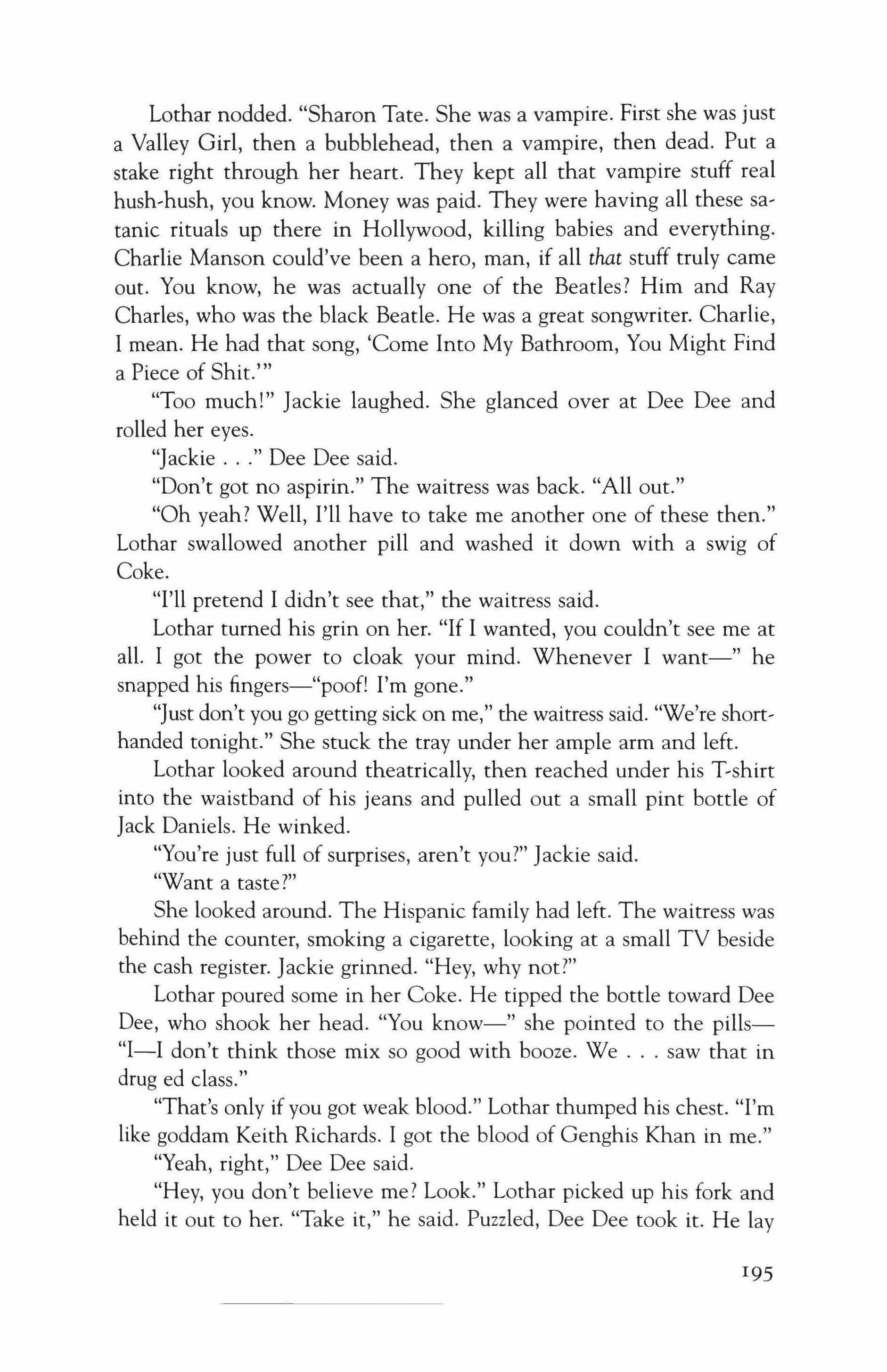
Lothar nodded. "Sharon Tate. She was a vampire. First she was just a Valley Girl, then a bubblehead, then a vampire, then dead. Put a stake right through her heart. They kept all that vampire stuff real hush-hush, you know. Money was paid. They were having all these satanic rituals up there in Hollywood, killing babies and everything. Charlie Manson could've been a hero, man, if all that stuff truly came out. You know, he was actually one of the Beatles? Him and Ray Charles, who was the black Beatle. He was a great songwriter. Charlie, I mean. He had that song, 'Come Into My Bathroom, You Might Find a Piece of Shit.'"
"Too much!" Jackie laughed. She glanced over at Dee Dee and rolled her eyes.
"Jackie ." Dee Dee said.
"Don't got no aspirin." The waitress was back. "All out."
"Oh yeah? Well, I'll have to take me another one of these then." Lothar swallowed another pill and washed it down with a swig of Coke.
"I'll pretend I didn't see that," the waitress said.
Lothar turned his grin on her. "If 1 wanted, you couldn't see me at all. 1 got the power to cloak your mind. Whenever I want-" he snapped his fingers-"poof! I'm gone."
"Just don't you go getting sick on me," the waitress said. "We're shorthanded tonight." She stuck the tray under her ample arm and left.
Lothar looked around theatrically, then reached under his T�shirt into the waistband of his jeans and pulled out a small pint bottle of Jack Daniels. He winked.
"You're just full of surprises, aren't you?" Jackie said.
"Want a taste?"
She looked around. The Hispanic family had left. The waitress was behind the counter, smoking a cigarette, looking at a small TV beside the cash register. Jackie grinned. "Hey, why not?"
Lothar poured some in her Coke. He tipped the bottle toward Dee Dee, who shook her head. "You know-" she pointed to the pills"1-1 don't think those mix so good with booze. We saw that in drug ed class."
"That's only if you got weak blood." Lothar thumped his chest. "I'm like goddam Keith Richards. 1 got the blood of Genghis Khan in me."
"Yeah, right," Dee Dee said.
"Hey, you don't believe me? Look." Lothar picked up his fork and held it out to her. "Take it," he said. Puzzled, Dee Dee took it. He lay
195

his arm on the table, palm up. "Stick me," he said. Dee Dee stared at him. "Go ahead," he urged. "Stick it in me. Give me a good jab."
Dee Dee looked at Jackie, who gave a little shrug.
"What's the matter, Dolly Dee Dee?" Lothar said.
Dee Dee held the fork over his palm, then lowered the tines onto his skin. She pressed lightly.
"Go ahead." Lothar was smiling thinly. "Harder."
This is crazy, she thought. She pressed harder. His skin puckered. She raised the fork. Little red prickles dotted his palm.
"Now press real hard. Stick me good, Dee Dee."
She lay the fork down.
"Scared?" Lothar sneered.
"You're crazy," she murmured. She looked at Jackie. "He's crazy."
Lothar shook his head. "You're insincere, Dee Dee. You don't got the strength of the conviction you imagine yourself by." He snickered, and Dee Dee flushed.
"Why don't we do it with that knife of yours, huh?" she said, her voice cracking a little.
"Knife?" Jackie said. "What knife?"
"That knife he's got." Lothar was staring owlishly at her. "Strapped on his leg."
"You mean this one?" Lothar raised his leg, clumped it on the table. He hiked up his jeans to reveal the knife. Jackie blinked and pursed her lips. Dee Dee looked at her triumphantly. Now, she thought, now you can see.
Lothar unstrapped the knife and lowered his leg. He held the knife blade out toward Dee Dee, then flipped it so that the handle pointed at her. "This what you want, Dee Dee?" he asked. "You wanna do it with this?"
"Hey, put that thing away," Jackie said, glancing around nervously. The waitress was at the kitchen door, talking to an unseen cook. "How come you got that anyway?"
"Protection," Lothar said. "From thieves and queers and vampires." He took the knife by the handle again, wagging its point at Dee Dee. Suddenly he raised it high above his still-extended hand and made a sweeping downward thrust, as if to stab right through his hand and pin it to the table. Jackie flinched and Dee Dee yelped. He stopped a halfinch above his hand, then put down the knife.
"Jesus!" Jackie said. "Don't do that kinda stuff! Put that goddam thing away!"
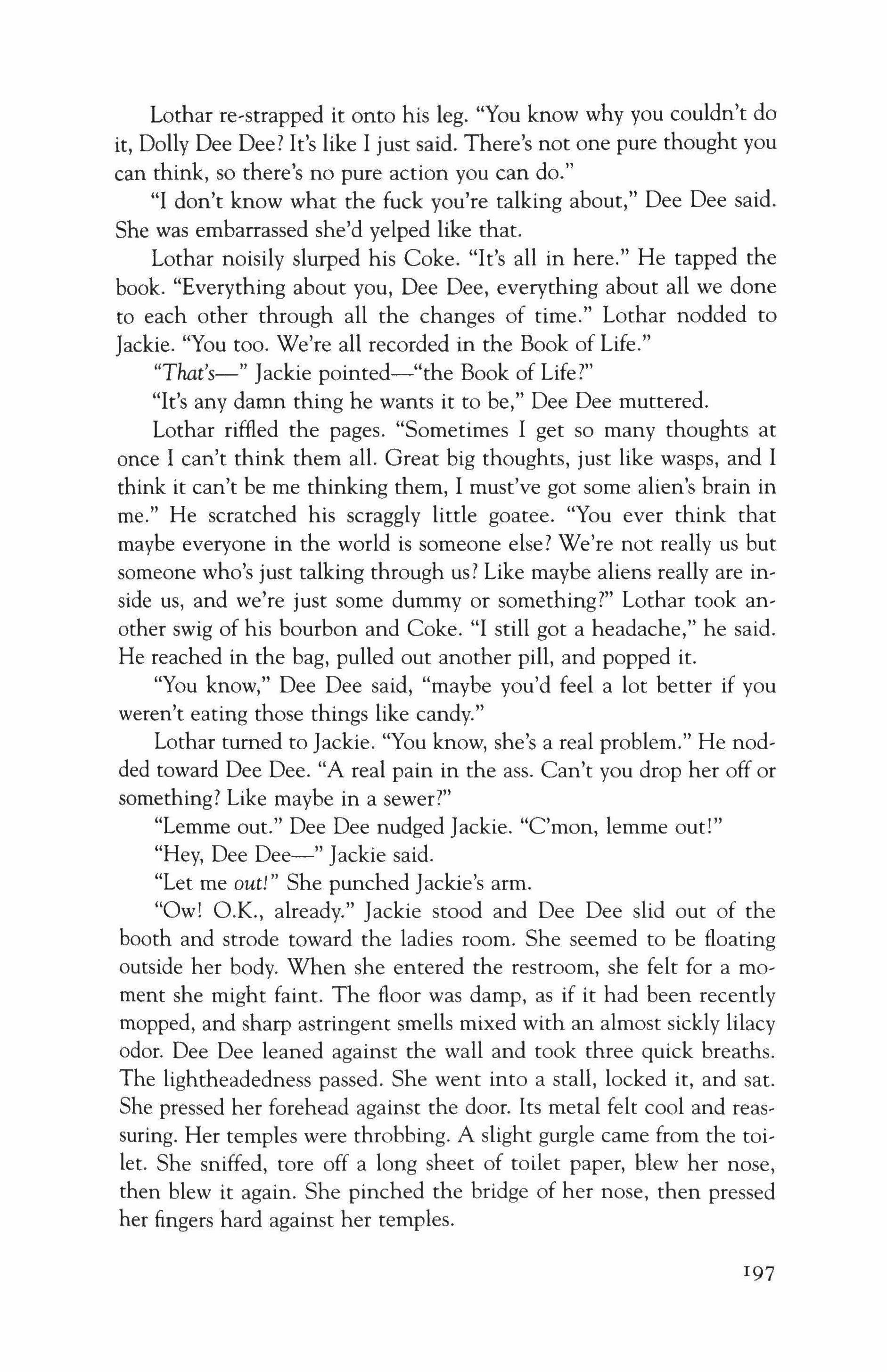
Lothar re-strapped it onto his leg. "You know why you couldn't do it, Dolly Dee Dee? It's like I just said. There's not one pure thought you can think, so there's no pure action you can do."
"I don't know what the fuck you're talking about," Dee Dee said. She was embarrassed she'd yelped like that.
Lothar noisily slurped his Coke. "It's all in here." He tapped the book. "Everything about you, Dee Dee, everything about all we done to each other through all the changes of time." Lothar nodded to Jackie. "You too. We're all recorded in the Book of Life."
"That's-" Jackie pointed-"the Book of Life?"
"It's any damn thing he wants it to be," Dee Dee muttered.
Lothar riffled the pages. "Sometimes I get so many thoughts at once I can't think them all. Great big thoughts, just like wasps, and I think it can't be me thinking them, I must've got some alien's brain in me." He scratched his scraggly little goatee. "You ever think that maybe everyone in the world is someone else? We're not really us but someone who's just talking through us? Like maybe aliens really are tnside us, and we're just some dummy or something?" Lothar took another swig of his bourbon and Coke. "I still got a headache," he said. He reached in the bag, pulled out another pill, and popped it.
"You know," Dee Dee said, "maybe you'd feel a lot better if you weren't eating those things like candy."
Lothar turned to Jackie. "You know, she's a real problem." He nodded toward Dee Dee. "A real pain in the ass. Can't you drop her off or something? Like maybe in a sewed"
"Lemme out." Dee Dee nudged Jackie. "C'mon, lemme out!"
"Hey, Dee Dee-" Jackie said.
"Let me out!" She punched Jackie's arm.
"Ow! O.K., already." Jackie stood and Dee Dee slid out of the booth and strode toward the ladies room. She seemed to be floating outside her body. When she entered the restroom, she felt for a moment she might faint. The floor was damp, as if it had been recently mopped, and sharp astringent smells mixed with an almost sickly lilacy odor. Dee Dee leaned against the wall and took three quick breaths. The lightheadedness passed. She went into a stall, locked it, and sat. She pressed her forehead against the door. Its metal felt cool and teassuring. Her temples were throbbing. A slight gurgle came from the toilet. She sniffed, tore off a long sheet of toilet paper, blew her nose, then blew it again. She pinched the bridge of her nose, then pressed her fingers hard against her temples.
197
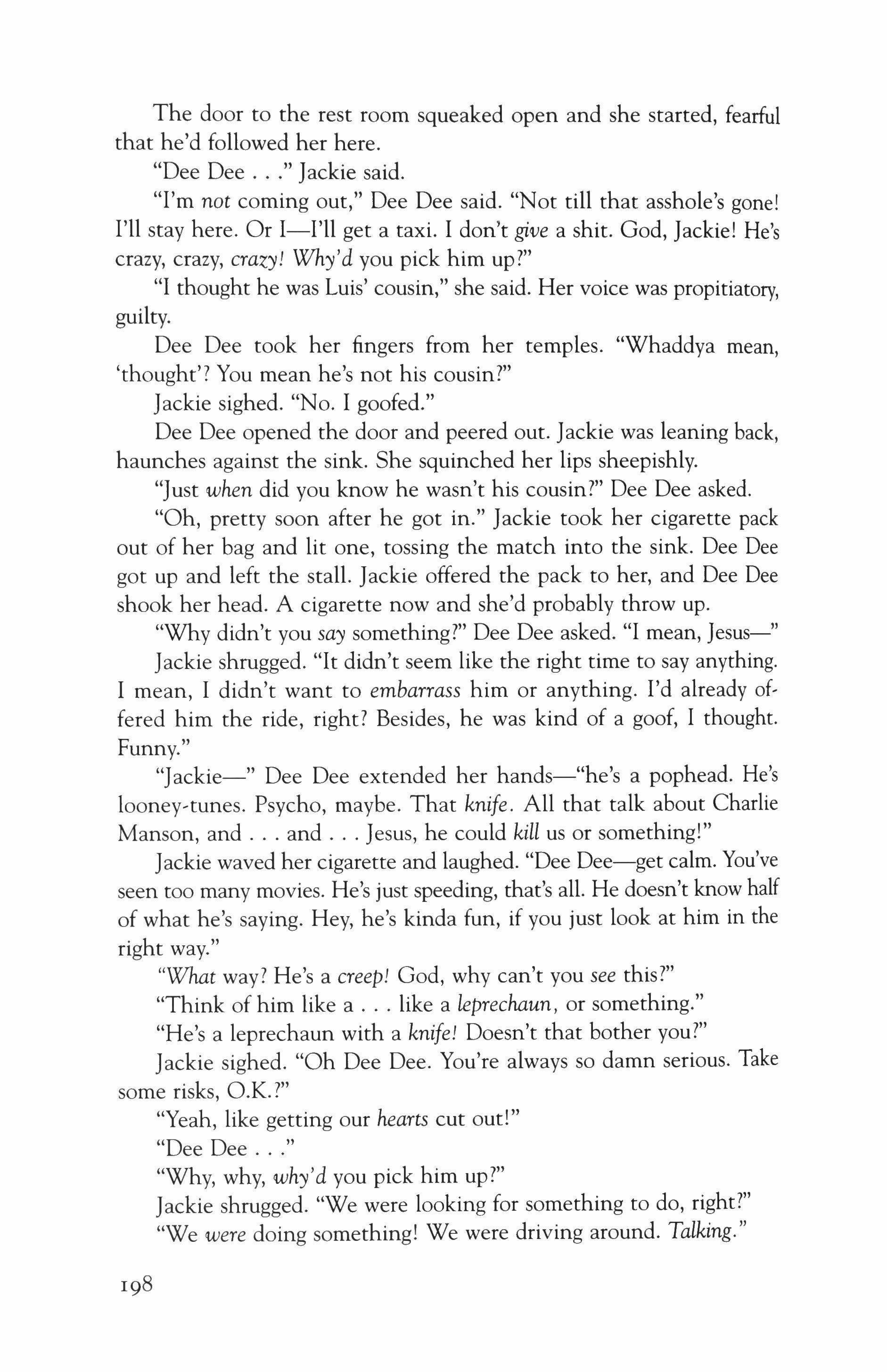
The door to the rest room squeaked open and she started, fearful that he'd followed her here.
"Dee Dee " Jackie said.
"I'm not coming out," Dee Dee said. "Not till that asshole's gone! I'll stay here. Or I-I'll get a taxi. I don't give a shit. God, Jackie! He's crazy, crazy, crazy! Why'd you pick him up?"
"I thought he was Luis' cousin," she said. Her voice was propitiatory, guilty.
Dee Dee took her fingers from her temples. "Whaddya mean, 'thought'? You mean he's not his cousin?"
Jackie sighed. "No. I goofed."
Dee Dee opened the door and peered out. Jackie was leaning back, haunches against the sink. She squinched her lips sheepishly.
"Just when did you know he wasn't his cousin?" Dee Dee asked.
"Oh, pretty soon after he got in." Jackie took her cigarette pack out of her bag and lit one, tossing the match into the sink. Dee Dee got up and left the stall. Jackie offered the pack to her, and Dee Dee shook her head. A cigarette now and she'd probably throw up.
"Why didn't you say something?" Dee Dee asked. "I mean, Jesus-"
Jackie shrugged. "It didn't seem like the right time to say anything. I mean, I didn't want to embarrass him or anything. I'd already offered him the ride, right? Besides, he was kind of a goof, I thought. Funny."
"Jackie-" Dee Dee extended her hands-"he's a pophead. He's looney-tunes. Psycho, maybe. That knife. All that talk about Charlie Manson, and and Jesus, he could kill us or something!"
Jackie waved her cigarette and laughed. "Dee Dee-get calm. You've seen too many movies. He's just speeding, that's all. He doesn't know half of what he's saying. Hey, he's kinda fun, if you just look at him in the right way."
"What way? He's a creep! God, why can't you see this!"
"Think of him like a like a leprechaun, or something."
"He's a leprechaun with a knife! Doesn't that bother you?"
Jackie sighed. "Oh Dee Dee. You're always so damn serious. Take some risks, O.K.?"
"Yeah, like getting our hearts cut out!"
"Dee Dee
"Why, why, why'd you pick him up!"
Jackie shrugged. "We were looking for something to do, right?"
"We were doing something! We were driving around. Talking."
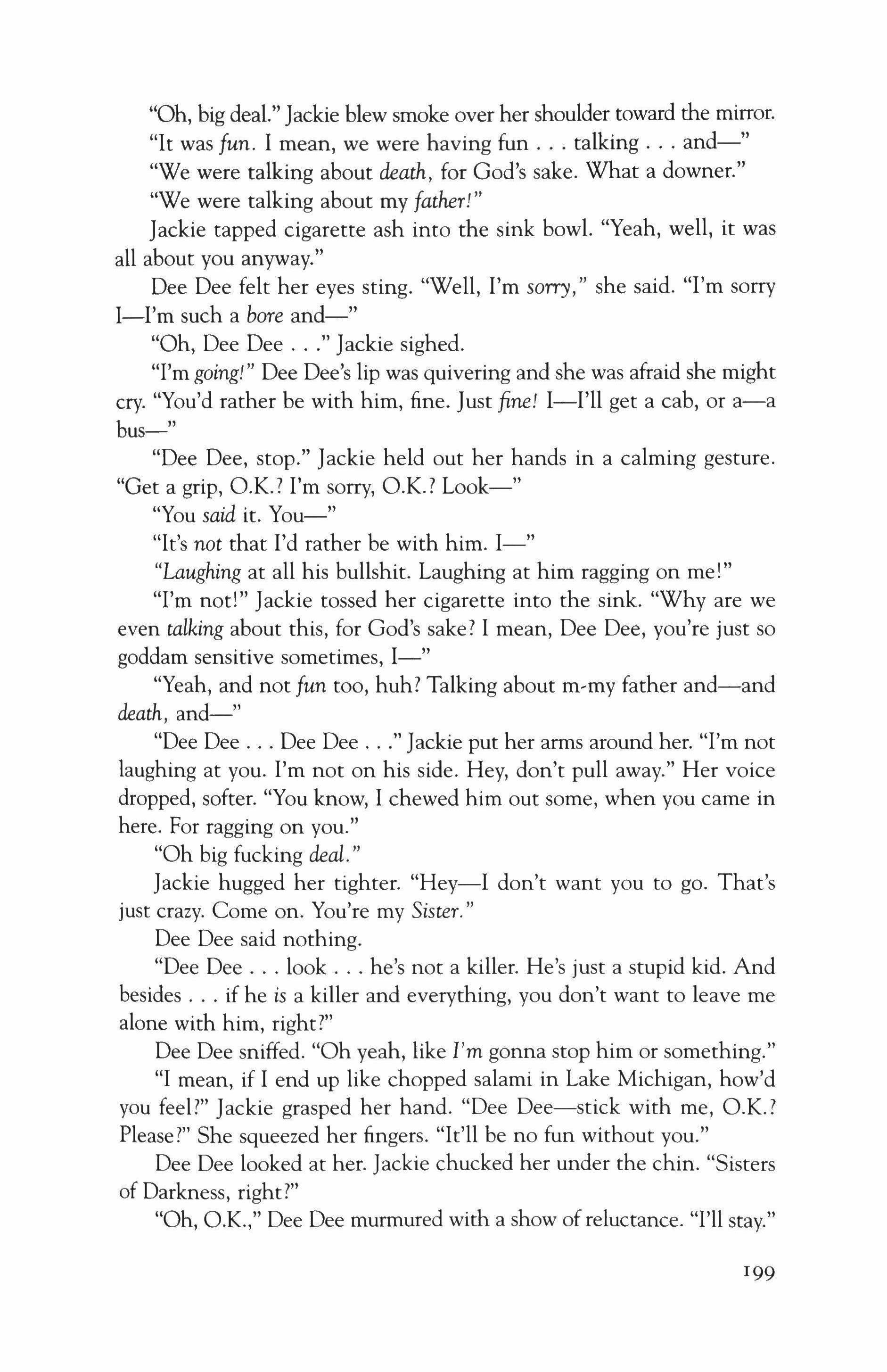
"Oh, big deal." Jackie blew smoke over her shoulder toward the mirror.
"It was fun. I mean, we were having fun talking and-"
"We were talking about death, for God's sake. What a downer."
"We were talking about my father!"
Jackie tapped cigarette ash into the sink bowl. "Yeah, well, it was all about you anyway."
Dee Dee felt her eyes sting. "Well, I'm sorry," she said. "I'm sorry I-I'm such a bore and-"
"Oh, Dee Dee Jackie sighed.
"I'm going!" Dee Dee's lip was quivering and she was afraid she might cry. "You'd rather be with him, fine. Just fine! I-I'll get a cab, or a-a bus-"
"Dee Dee, stop." Jackie held out her hands in a calming gesture. "Get a grip, O.K.? I'm sorry, O.K.? Look-"
"You said it. You-"
"It's not that I'd rather be with him. 1-"
"Laughing at all his bullshit. Laughing at him ragging on me!"
"I'm not!" Jackie tossed her cigarette into the sink. "Why are we even talking about this, for God's sake? I mean, Dee Dee, you're just so goddam sensitive sometimes, 1-"
"Yeah, and not fun too, huh? Talking about m-rny father and-and death, and-"
"Dee Dee Dee Dee Jackie put her arms around her. "I'm not laughing at you. I'm not on his side. Hey, don't pull away." Her voice dropped, softer. "You know, I chewed him out some, when you came in here. For ragging on you."
"Oh big fucking deal."
Jackie hugged her tighter. "Hey-I don't want you to go. That's just crazy. Come on. You're my Sister."
Dee Dee said nothing.
"Dee Dee look he's not a killer. He's just a stupid kid. And besides if he is a killer and everything, you don't want to leave me alone with him, right?"
Dee Dee sniffed. "Oh yeah, like I'm gonna stop him or something."
"I mean, if I end up like chopped salami in Lake Michigan, how'd you feel?" Jackie grasped her hand. "Dee Dee-stick with me, O.K.? Please?" She squeezed her fingers. "It'll be no fun without you."
Dee Dee looked at her. Jackie chucked her under the chin. "Sisters of Darkness, right?"
"Oh, O.K.," Dee Dee murmured with a show of reluctance. "I'll stay."
199
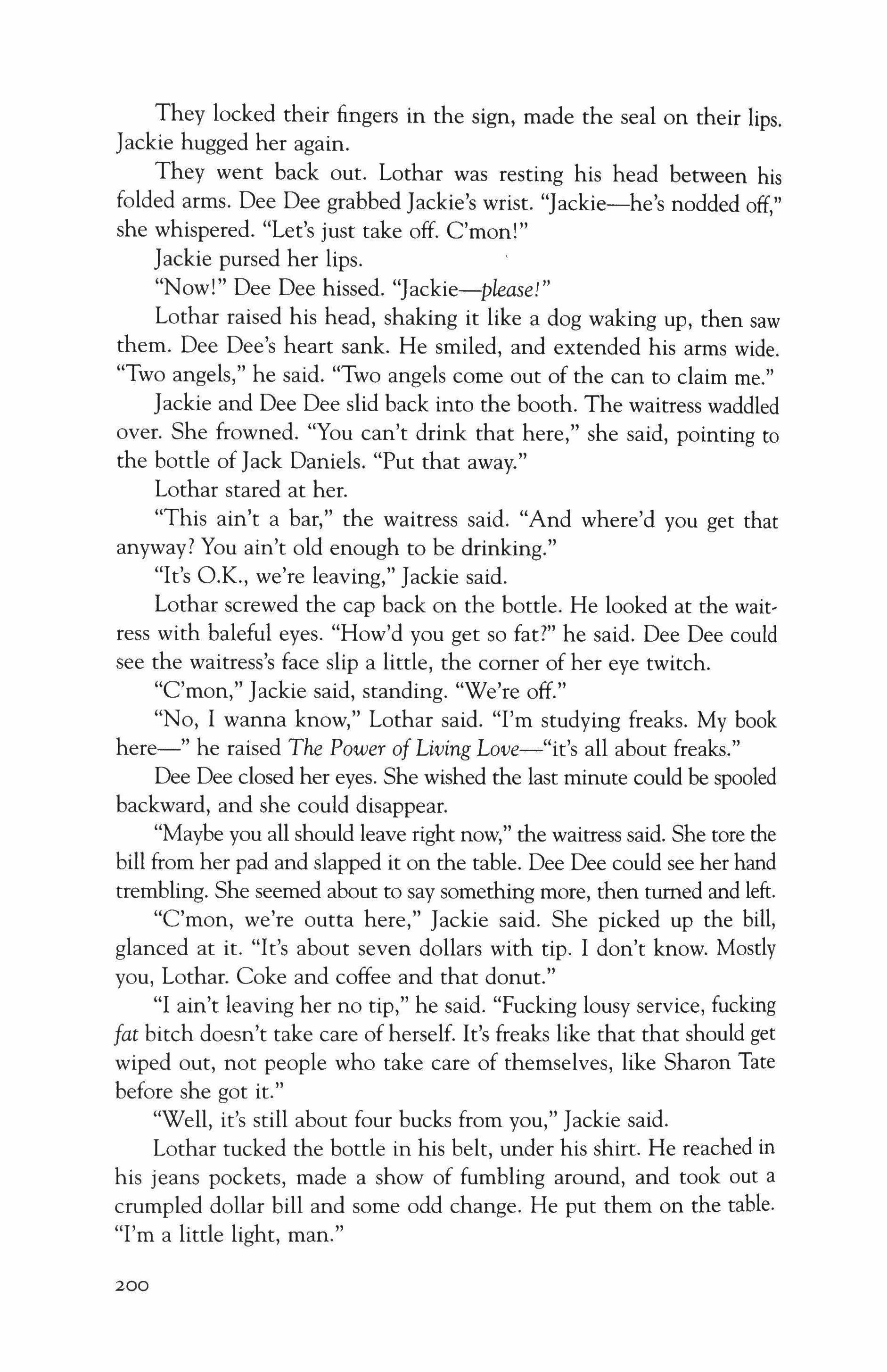
They locked their fingers in the sign, made the seal on their lips. Jackie hugged her again.
They went back out. Lothar was resting his head between his folded arms. Dee Dee grabbed Jackie's wrist. "Jackie-he's nodded off," she whispered. "Let's just take off. C'mon!"
Jackie pursed her lips.
"Now!" Dee Dee hissed. "Jackie-please!"
Lothar raised his head, shaking it like a dog waking up, then saw them. Dee Dee's heart sank. He smiled, and extended his arms wide. "Two angels," he said. "Two angels come out of the can to claim me."
Jackie and Dee Dee slid back into the booth. The waitress waddled over. She frowned. "You can't drink that here," she said, pointing to the bottle of Jack Daniels. "Put that away."
Lothar stared at her.
"This ain't a bar," the waitress said. "And where'd you get that anyway? You ain't old enough to be drinking."
"It's O.K., we're leaving," Jackie said.
Lothar screwed the cap back on the bottle. He looked at the waitress with baleful eyes. "How'd you get so fat?" he said. Dee Dee could see the waitress's face slip a little, the corner of her eye twitch.
"C'mon," Jackie said, standing. "We're off."
"No, I wanna know," Lothar said. "I'm studying freaks. My book here-" he raised The Power ofLiving Love-"it's all about freaks."
Dee Dee closed her eyes. She wished the last minute could be spooled backward, and she could disappear.
"Maybe you all should leave right now," the waitress said. She tore the bill from her pad and slapped it on the table. Dee Dee could see her hand trembling. She seemed about to say something more, then turned and left.
"C'mon, we're outta here," Jackie said. She picked up the bill, glanced at it. "It's about seven dollars with tip. I don't know. Mostly you, Lothar. Coke and coffee and that donut."
"I ain't leaving her no tip," he said. "Fucking lousy service, fucking fat bitch doesn't take care of herself. It's freaks like that that should get wiped out, not people who take care of themselves, like Sharon Tate before she got it."
"Well, it's still about four bucks from you," Jackie said.
Lothar tucked the bottle in his belt, under his shirt. He reached in his jeans pockets, made a show of fumbling around, and took out a crumpled dollar bill and some odd change. He put them on the table. "I'm a little light, man."
200
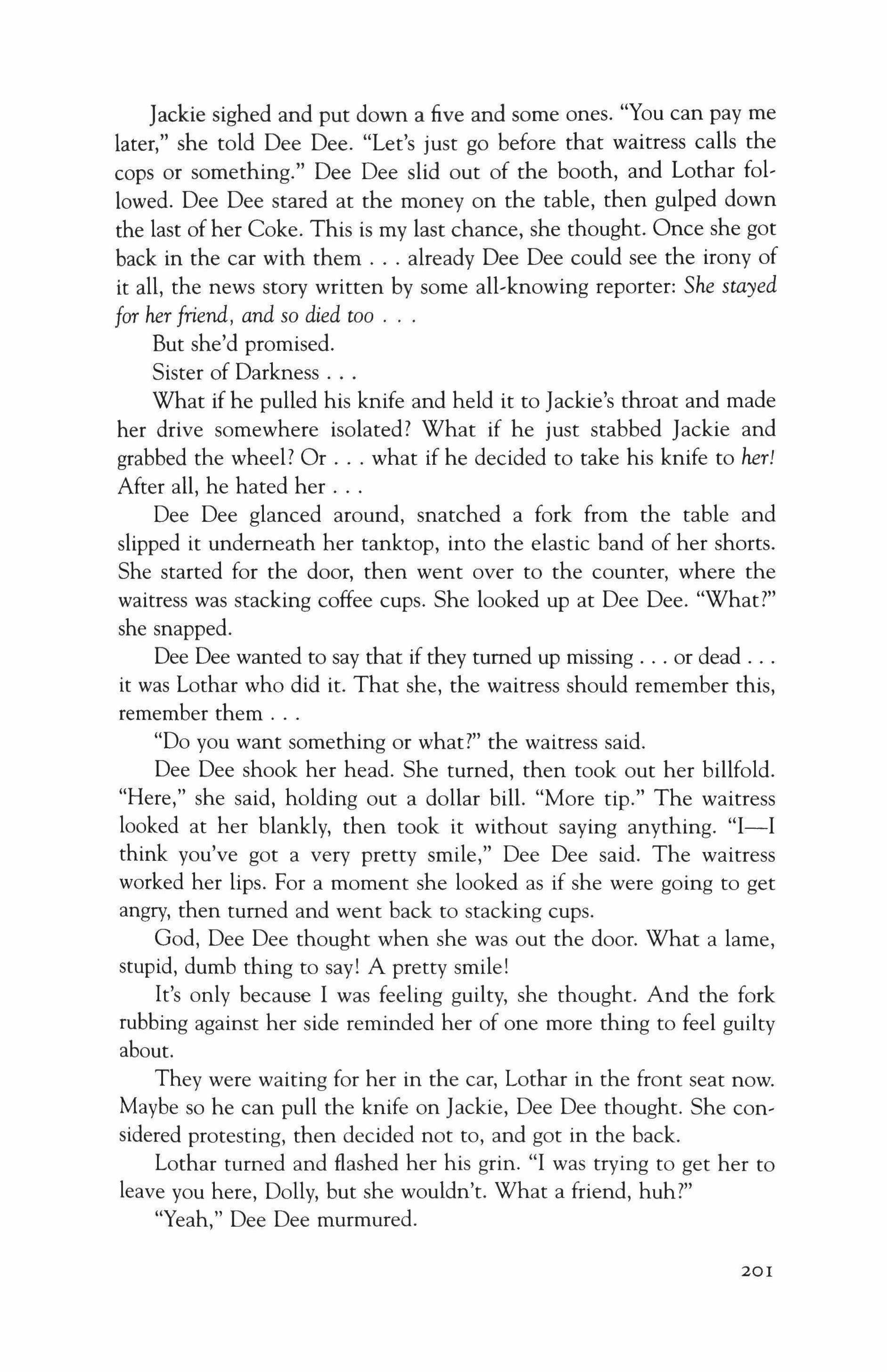
Jackie sighed and put down a five and some ones. "You can pay me later," she told Dee Dee. "Let's just go before that waitress calls the cops or something." Dee Dee slid out of the booth, and Lothar followed. Dee Dee stared at the money on the table, then gulped down the last of her Coke. This is my last chance, she thought. Once she got back in the car with them already Dee Dee could see the irony of it all, the news story written by some all-knowing reporter: She stayed for her friend, and so died too
But she'd promised.
Sister of Darkness
What if he pulled his knife and held it to Jackie's throat and made her drive somewhere isolated? What if he just stabbed Jackie and grabbed the wheel? Or what if he decided to take his knife to her! After all, he hated her
Dee Dee glanced around, snatched a fork from the table and slipped it underneath her tanktop, into the elastic band of her shorts. She started for the door, then went over to the counter, where the waitress was stacking coffee cups. She looked up at Dee Dee. "What?" she snapped.
Dee Dee wanted to say that if they turned up missing or dead it was Lothar who did it. That she, the waitress should remember this, remember them
"Do you want something or what?" the waitress said.
Dee Dee shook her head. She turned, then took out her billfold. "Here," she said, holding out a dollar bill. "More tip." The waitress looked at her blankly, then took it without saying anything. "1-1 think you've got a very pretty smile," Dee Dee said. The waitress worked her lips. For a moment she looked as if she were going to get angry, then turned and went back to stacking cups.
God, Dee Dee thought when she was out the door. What a lame, stupid, dumb thing to say! A pretty smile!
It's only because I was feeling guilty, she thought. And the fork rubbing against her side reminded her of one more thing to feel guilty about.
They were waiting for her in the car, Lothar in the front seat now. Maybe so he can pull the knife on Jackie, Dee Dee thought. She considered protesting, then decided not to, and got in the back.
Lothar turned and flashed her his grin. "I was trying to get her to leave you here, Dolly, but she wouldn't. What a friend, huh?" "Yeah," Dee Dee murmured.
201
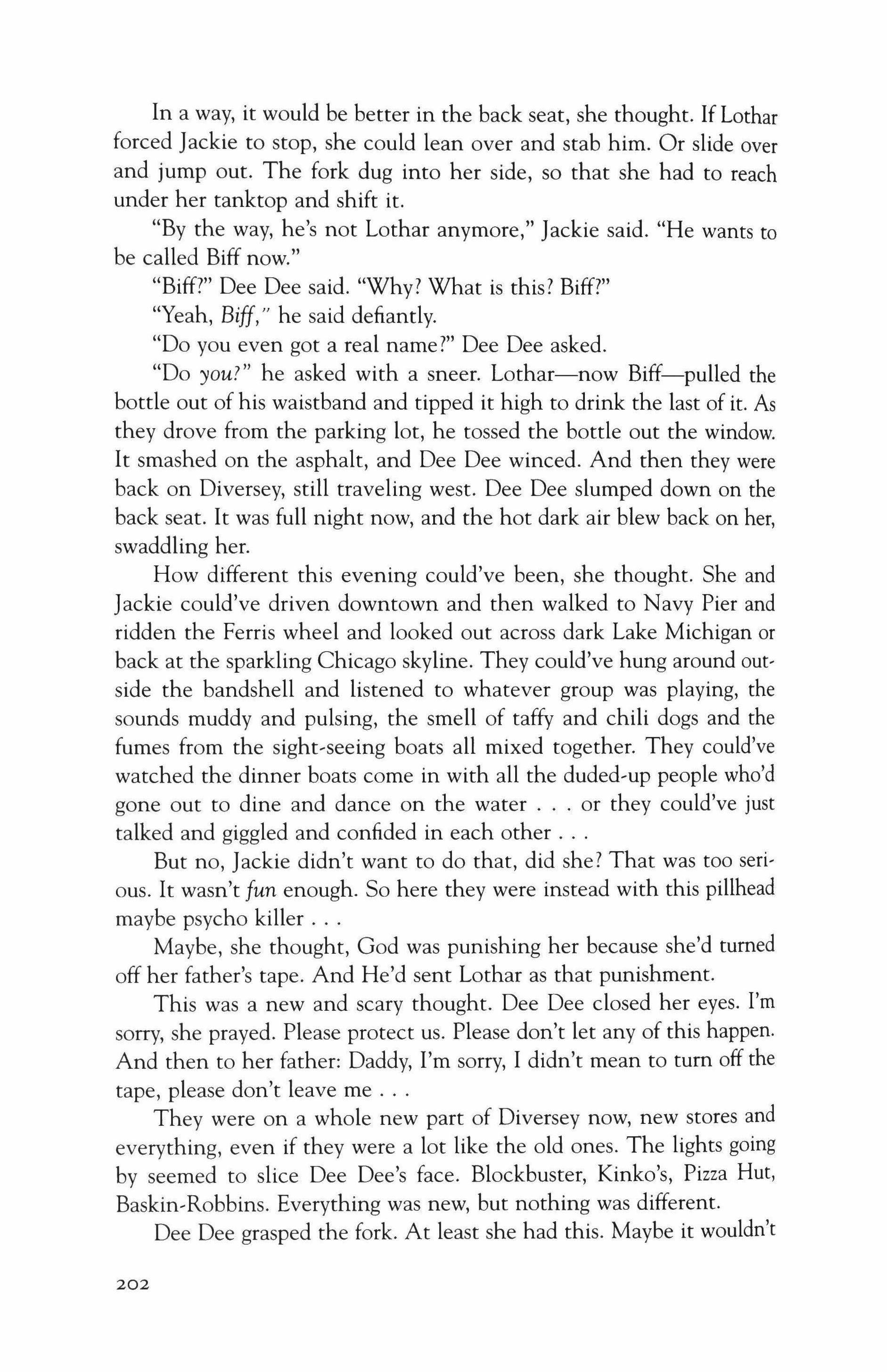
In a way, it would be better in the back seat, she thought. If Lothar forced Jackie to stop, she could lean over and stab him. Or slide over and jump out. The fork dug into her side, so that she had to reach under her tanktop and shift it.
"By the way, he's not Lothar anymore," Jackie said. "He wants to be called Biff now."
"Biff?" Dee Dee said. "Why? What is this? Biff?"
"Yeah, Biff," he said defiantly.
"Do you even got a real name?" Dee Dee asked.
"Do you?" he asked with a sneer. Lothar-now Biff-pulled the bottle out of his waistband and tipped it high to drink the last of it. As they drove from the parking lot, he tossed the bottle out the window. It smashed on the asphalt, and Dee Dee winced. And then they were back on Diversey, still traveling west. Dee Dee slumped down on the back seat. It was full night now, and the hot dark air blew back on her, swaddling her.
How different this evening could've been, she thought. She and Jackie could've driven downtown and then walked to Navy Pier and ridden the Ferris wheel and looked out across dark Lake Michigan or back at the sparkling Chicago skyline. They could've hung around outside the bandshell and listened to whatever group was playing, the sounds muddy and pulsing, the smell of taffy and chili dogs and the fumes from the sight-seeing boats all mixed together. They could've watched the dinner boats come in with all the duded-up people who'd gone out to dine and dance on the water or they could've just talked and giggled and confided in each other
But no, Jackie didn't want to do that, did she? That was too serious. It wasn't fun enough. So here they were instead with this pillhead maybe psycho killer
Maybe, she thought, God was punishing her because she'd turned off her father's tape. And He'd sent Lothar as that punishment.
This was a new and scary thought. Dee Dee closed her eyes. I'm sorry, she prayed. Please protect us. Please don't let any of this happen. And then to her father: Daddy, I'm sorry, I didn't mean to tum off the tape, please don't leave me
They were on a whole new part of Diversey now, new stores and everything, even if they were a lot like the old ones. The lights going by seemed to slice Dee Dee's face. Blockbuster, Kinko's, Pizza Hut, Baskin-Robbins. Everything was new, but nothing was different. Dee Dee grasped the fork. At least she had this. Maybe it wouldn't
202

be much, maybe she couldn't even use it. But touching it made her feel better.
"Hey! Aspirin! Aspirin!" Biff cried. He did a drum paradiddle on the dashboard. "We still gotta get some aspirin. My head's killing me. These goddam pills don't do me no good at all."
"We haven't passed a drugstore," Jackie said. "I don't think."
"This all started with aspirin, you know," Biff said. "That and its mighty lack thereof. That's what Adam and Eve needed back in the old Garden of Eden, you know-some aspirin. They could've given it to the Big Man and have Him kick back and chill out. Then none of this would've happened."
"None of what?" Jackie asked.
"Everything. You. Me. The whole fucking world." He turned and stabbed a finger at Dee Dee. "You especially." He turned back, then jumped up in his seat. "Hey-there, there!" he cried. "Pull over there!" He was pointing to a Quik-Stop, the "k" in its sign blinking erratically. "Aspirin, aspirin, aspirin!"
Jackie pulled into the Quik-Stop's parking lot, and they got out. The air smelled of oil, popcorn, and pigeons. A couple of kids were straddling their bikes while talking on the pay phone on the outside wall. A black woman with wispy graying hair, so thin she seemed almost malnourished, was standing by the door handing out flyers. She extended one toward Jackie, who shook her head and walked by her into the store. The woman turned to Biff and Dee Dee. "Take one, young lady," she said in a thin tired voice, and then a flyer was in Dee Dee's hand.
"Hey, man, what's this about?" Biff was looking at the flyer over Dee Dee's shoulder.
An Invitation to Come to Our Church the headline announced in bold type. A crudely drawn Jesus extended his hand to two children. Biff snorted. "I don't need that." He held up his book, which he'd again taken with him. "This is all I need."
"Well, you can take one anyways," the woman said. "I'm an Aztec child sacrifice worshipper," Biff said. "And I don't worship at no church that don't take VISA."
The woman looked puzzled. "You can still come," she said. Her eyes shifted between Dee Dee and Biff, "Anyone can come."
"What church is this anyway?" Biff asked.
The woman pointed to a line on the flyer Dee Dee was holding. "The Church of the Redeemed Holy Ghost."
203
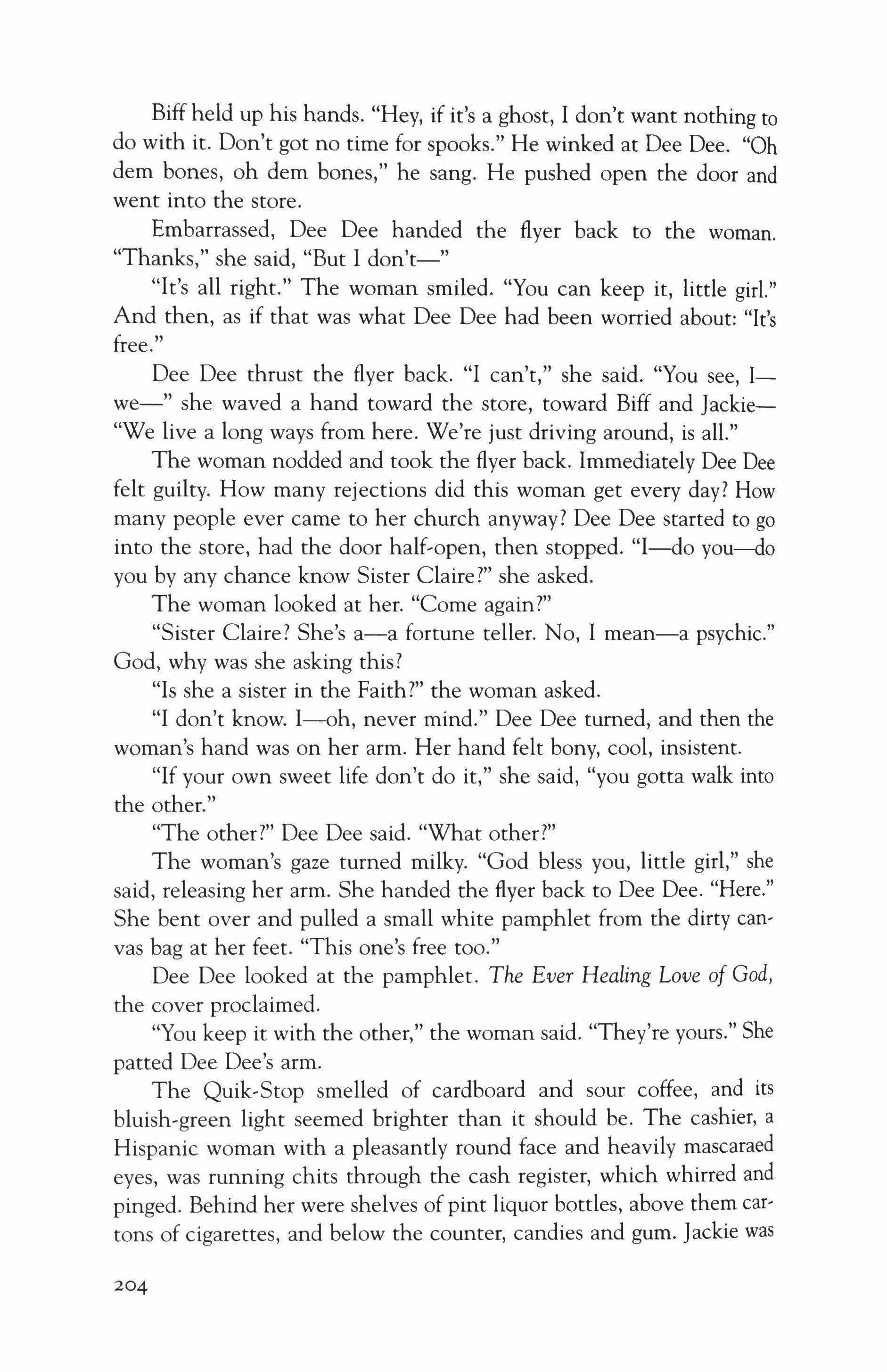
Biff held up his hands. "Hey, if it's a ghost, I don't want nothing to do with it. Don't got no time for spooks." He winked at Dee Dee. "Oh dem bones, oh dem bones," he sang. He pushed open the door and went into the store.
Embarrassed, Dee Dee handed the flyer back to the woman. "Thanks," she said, "But I don't-"
"It's all right." The woman smiled. "You can keep it, little girl." And then, as if that was what Dee Dee had been worried about: "It's free."
Dee Dee thrust the flyer back. "I can't," she said. "You see, 1we-" she waved a hand toward the store, toward Biff and Jackie"We live a long ways from here. We're just driving around, is alL"
The woman nodded and took the flyer back. Immediately Dee Dee felt guilty. How many rejections did this woman get every day? How many people ever came to her church anyway? Dee Dee started to go into the store, had the door half-open, then stopped. "I-do you---do you by any chance know Sister Claire?" she asked.
The woman looked at her. "Come again?"
"Sister Claire? She's a-a fortune teller. No, I mean-a psychic." God, why was she asking this?
"Is she a sister in the Faith?" the woman asked.
"I don't know. I-oh, never mind." Dee Dee turned, and then the woman's hand was on her arm. Her hand felt bony, cool, insistent.
"If your own sweet life don't do it," she said, "you gotta walk into the other."
"The other?" Dee Dee said. "What other?"
The woman's gaze turned milky. "God bless you, little girl," she said, releasing her arm. She handed the flyer back to Dee Dee. "Here." She bent over and pulled a small white pamphlet from the dirty canvas bag at her feet. "This one's free too."
Dee Dee looked at the pamphlet. The Ever Healing Love of God, the cover proclaimed.
"You keep it with the other," the woman said. "They're yours." She patted Dee Dee's arm.
The Quik-Stop smelled of cardboard and sour coffee, and its bluish-green light seemed brighter than it should be. The cashier, a Hispanic woman with a pleasantly round face and heavily mascaraed eyes, was running chits through the cash register, which whirred and pinged. Behind her were shelves of pint liquor bottles, above them cartons of cigarettes, and below the counter, candies and gum. Jackie was
204
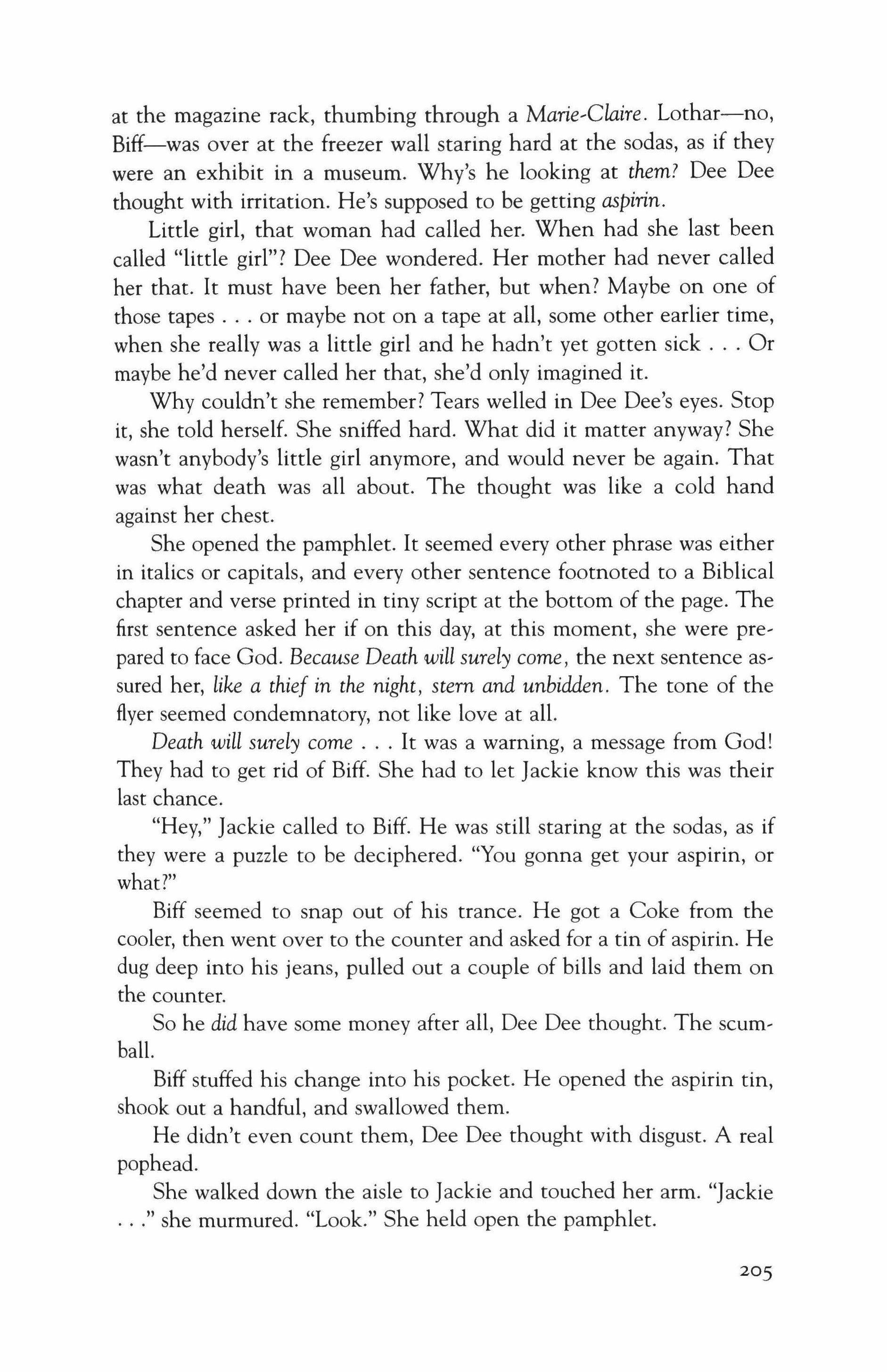
at the magazine rack, thumbing through a Marie�Claire. Lothar-no, Biff-was over at the freezer wall staring hard at the sodas, as if they were an exhibit in a museum. Why's he looking at them? Dee Dee thought with irritation. He's supposed to be getting aspirin.
Little girl, that woman had called her. When had she last been called "little girl"? Dee Dee wondered. Her mother had never called her that. It must have been her father, but when? Maybe on one of those tapes or maybe not on a tape at all, some other earlier time, when she really was a little girl and he hadn't yet gotten sick Or maybe he'd never called her that, she'd only imagined it.
Why couldn't she remember? Tears welled in Dee Dee's eyes. Stop it, she told herself. She sniffed hard. What did it matter anyway? She wasn't anybody's little girl anymore, and would never be again. That was what death was all about. The thought was like a cold hand against her chest.
She opened the pamphlet. It seemed every other phrase was either in italics or capitals, and every other sentence footnoted to a Biblical chapter and verse printed in tiny script at the bottom of the page. The first sentence asked her if on this day, at this moment, she were prepared to face God. Because Death will surely come, the next sentence as, sured her, like a thief in the night, stem and unbidden. The tone of the flyer seemed condemnatory, not like love at all.
Death will surely come It was a warning, a message from God! They had to get rid of Biff. She had to let Jackie know this was their last chance.
"Hey," Jackie called to Biff. He was still staring at the sodas, as if they were a puzzle to be deciphered. "You gonna get your aspirin, or what?"
Biff seemed to snap out of his trance. He got a Coke from the cooler, then went over to the counter and asked for a tin of aspirin. He dug deep into his jeans, pulled out a couple of bills and laid them on the counter.
So he did have some money after all, Dee Dee thought. The scumball.
Biff stuffed his change into his pocket. He opened the aspirin tin, shook out a handful, and swallowed them.
He didn't even count them, Dee Dee thought with disgust. A real pophead.
She walked down the aisle to Jackie and touched her arm. "Jackie " she murmured. "Look." She held open the pamphlet.
205
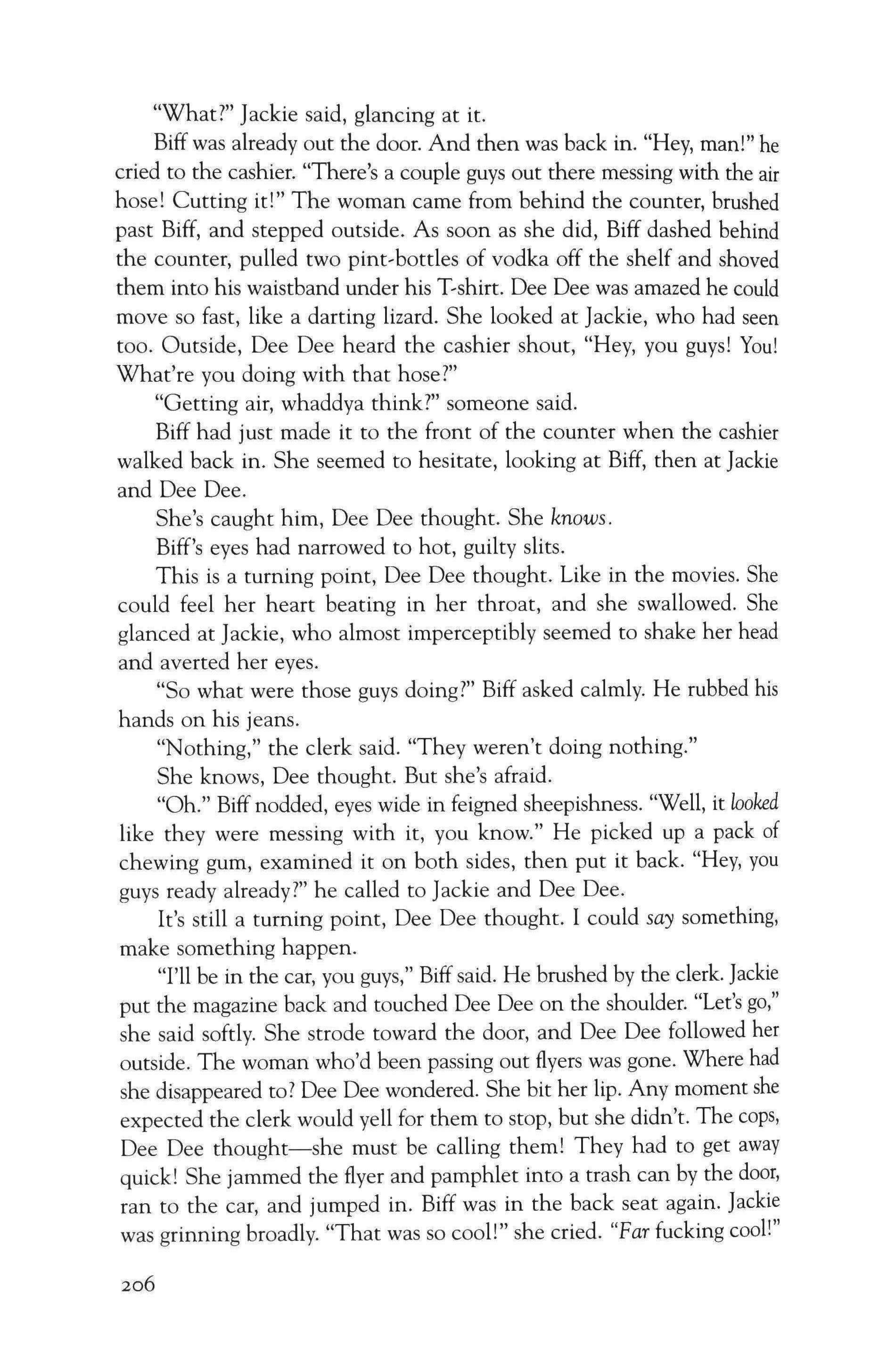
"What?" Jackie said, glancing at it.
Biff was already out the door. And then was back in. "Hey, man!" he cried to the cashier. "There's a couple guys out there messing with the air hose! Cutting it!" The woman carne from behind the counter, brushed past Biff, and stepped outside. As soon as she did, Biff dashed behind the counter, pulled two pint-bottles of vodka off the shelf and shoved them into his waistband under his T-shirt. Dee Dee was amazed he could move so fast, like a darting lizard. She looked at Jackie, who had seen too. Outside, Dee Dee heard the cashier shout, "Hey, you guys! You! What're you doing with that hose?"
"Getting air, whaddya think?" someone said.
Biff had just made it to the front of the counter when the cashier walked back in. She seemed to hesitate, looking at Biff, then at Jackie and Dee Dee.
She's caught him, Dee Dee thought. She knows.
Biff's eyes had narrowed to hot, guilty slits.
This is a turning point, Dee Dee thought. Like in the movies. She could feel her heart beating in her throat, and she swallowed. She glanced at Jackie, who almost imperceptibly seemed to shake her head and averted her eyes.
"So what were those guys doing?" Biff asked calmly. He rubbed his hands on his jeans.
"Nothing," the clerk said. "They weren't doing nothing."
She knows, Dee thought. But she's afraid.
"Oh." Biff nodded, eyes wide in feigned sheepishness. "Well, it looked like they were messing with it, you know." He picked up a pack of chewing gum, examined it on both sides, then put it back. "Hey, you guys ready already?" he called to Jackie and Dee Dee.
It's still a turning point, Dee Dee thought. I could say something, make something happen.
"I'll be in the car, you guys," Biff said. He brushed by the clerk. Jackie put the magazine back and touched Dee Dee on the shoulder. "Let's go," she said softly. She strode toward the door, and Dee Dee followed her outside. The woman who'd been passing out flyers was gone. Where had she disappeared to? Dee Dee wondered. She bit her lip. Any moment she expected the clerk would yell for them to stop, but she didn't. The cops, Dee Dee thought-she must be calling them! They had to get away quick! She jammed the flyer and pamphlet into a trash can by the door, ran to the car, and jumped in. Biff was in the back seat again. Jackie was grinning broadly. "That was so cool!" she cried. "Far fucking cool!"
206
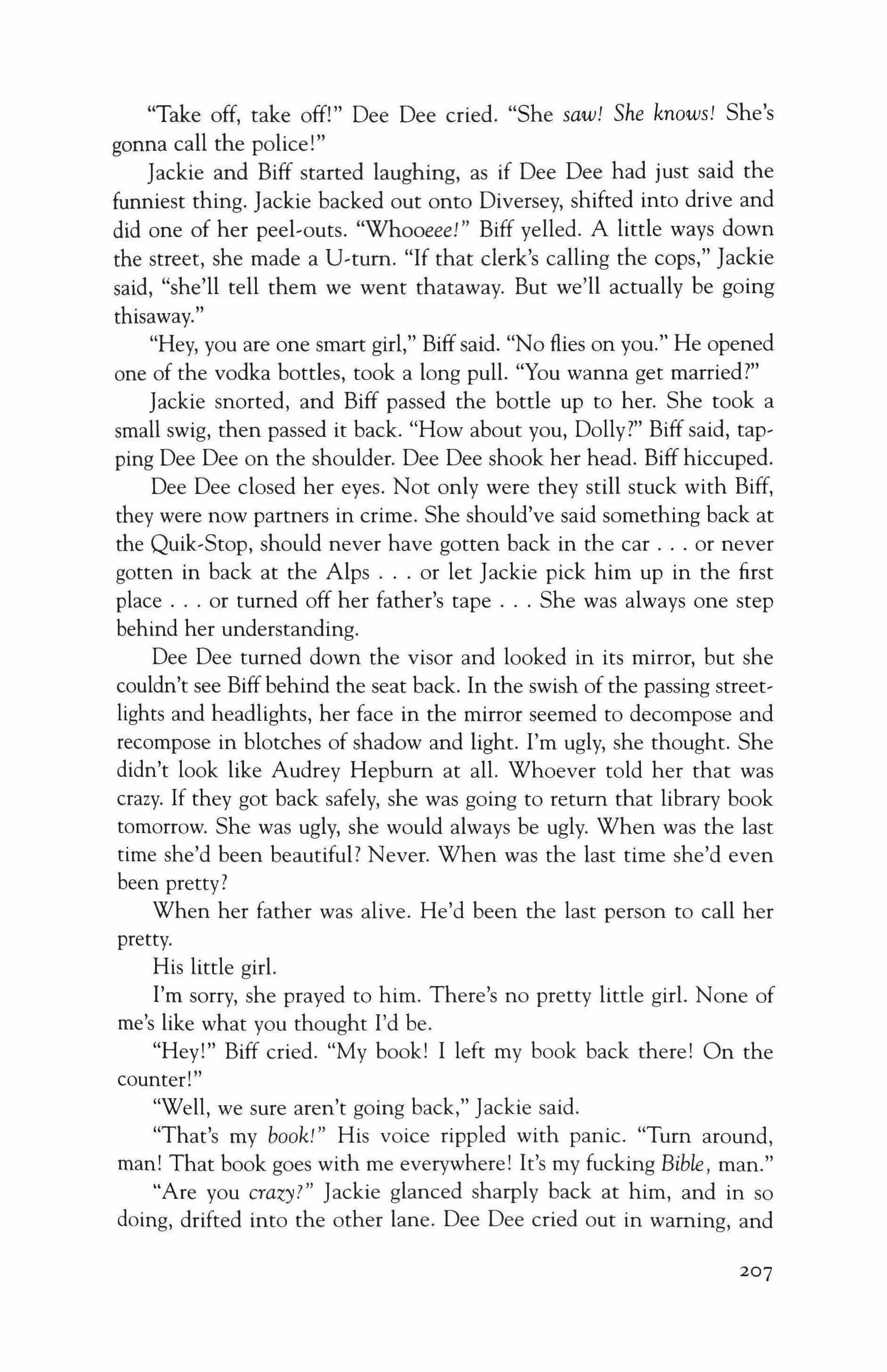
"Take off, take off!" Dee Dee cried. "She saw! She knows! She's gonna call the police!"
Jackie and Biff started laughing, as if Dee Dee had just said the funniest thing. Jackie backed out onto Diversey, shifted into drive and did one of her peel-outs. "Whooeee!" Biff yelled. A little ways down the street, she made a U-rum, "If that clerk's calling the cops," Jackie said, "she'll tell them we went thataway. But we'll actually be going thisaway."
"Hey, you are one smart girl," Biff said. "No flies on you." He opened one of the vodka bottles, took a long pull. "You wanna get married?"
Jackie snorted, and Biff passed the bottle up to her. She took a small swig, then passed it back. "How about you, Dolly?" Biff said, tapping Dee Dee on the shoulder. Dee Dee shook her head. Biff hiccuped.
Dee Dee closed her eyes. Not only were they still stuck with Biff, they were now partners in crime. She should've said something back at the Quik-Stop, should never have gotten back in the car or never gotten in back at the Alps or let Jackie pick him up in the first place or turned off her father's tape She was always one step behind her understanding.
Dee Dee turned down the visor and looked in its mirror, but she couldn't see Biff behind the seat back. In the swish of the passing streetlights and headlights, her face in the mirror seemed to decompose and recompose in blotches of shadow and light. I'm ugly, she thought. She didn't look like Audrey Hepburn at all. Whoever told her that was crazy. If they got back safely, she was going to return that library book tomorrow. She was ugly, she would always be ugly. When was the last time she'd been beautiful? Never. When was the last time she'd even been pretty?
When her father was alive. He'd been the last person to call her pretty.
His little girl.
I'm sorry, she prayed to him. There's no pretty little girl. None of me's like what you thought I'd be.
"Hey!" Biff cried. "My book! I left my book back there! On the counter!"
"Well, we sure aren't going back," Jackie said. "That's my book!" His voice rippled with panic. "Tum around, man! That book goes with me everywhere! It's my fucking Bible, man."
"Are you crazy?" Jackie glanced sharply back at him, and in so doing, drifted into the other lane. Dee Dee cried out in warning, and
207

she cut back. "We go back there," Jackie said, "we'll get arrested or something."
"The book'll protect us!" Biff cried.
"Uh-uh." Jackie shook her head. "No way."
Thank God, Dee Dee thought. Something smart from Jackie, first time this whole stupid evening.
Biff started pounding the back of Dee Dee's seat, the blows thumping against her shoulder blades. "We-gotta-go back!"
"Hey, cut that out!" Dee Dee cried.
"I gotta right-" Biff thumped-"to the Book"-thump-"ofLife!"
"We're not going back," Jackie said. "Forget it."
"I gotta right-to the Book-"
"Fuck you and fuck your book," Jackie snapped.
Biff sank back into the seat. "You're gonna regret this, man," he muttered. "You can't fuck with my book like that."
Dee Dee tensed. Now it comes, she thought. The knife. A shiver wiggled like a snake up her back, along her shoulders. She grasped the fork in her waistband, tapped its tines with her thumb. If he moved toward them, if he so much as leaned forward, she would stab him in the face, the eyes
"People've been walking along," Biff said, "thinking they got the sun in the back, and it's really the shadow creeping up on them. God's gonna laugh like a wind in your face, he's gonna fart in a field of lilies, and you're never again gonna see the right side of nowhere. You-"
"Jesus, shut up!" Jackie cried. "You're giving me a goddam headache."
Dee Dee gripped the fork tightly. This is the turning point, she thought. Her heart was hammering.
"No balm in Gilead," Biff muttered. "You'll see." He sank back in the seat. Dee Dee clenched the fork, waiting. She was afraid to glance back at him, afraid even to lower the sun visor and try to sneak a glimpse in its mirror. She heard the vodka bottle cap being unscrewed. She felt a dampness in the small of her back. She waited. And still all the ordinary things of the world went by-the gas stations, the stores lit and unlit, the parking meters like sentinels, people on comers silently waiting for buses, for taxis, for someone to pick them up.
"Jackie Dee Dee said. She raised the fork so that Jackie could see.
Jackie's eyes narrowed. "What's that? A fork?"
God, now he'd know! Dee Dee shook her head vigorously. "What?" Jackie asked, raising her hands off the wheel. "What?"
Biff was quiet now, or almost so. He was humming something tune-
208

less, mumbling every now and then, as if in commentary. He'd stopped that business about going back for the book, thank God. And thank God-here Dee Dee closed her eyes, almost in a prayer-he hadn't tried to kill them, at least not yet, and she hadn't had to use the fork (even if she could have-Dee Dee didn't know) and thank God the cops weren't after them, at least not yet
Maybe her father was still watching over her, Dee Dee thought. He hadn't given up on her after all. She put the fork on the seat beside her, away from Jackie. She was embarrassed she'd shown it to her. Dee Dee closed her eyes. The skin on her face felt tight, unreal, like a mask. She could hear Biff drinking with heavy gurgling sounds. Like a baby. A line from a nursery rhyme her father used to read to her popped in her head: Here am I, little Jumping Joan She hadn't thought of that in years! How did the rest of it go? Dee Dee couldn't remember. She did remember sitting on the bed snuggled next to her father as he read to her in his voice that always, for some reason, reminded her of the soft brown fur on Mr. Monkey, one of her stuffed animals. What kind of a monkey had he been? A chimp? Orangutan?
She thought of the old lady handing out flyers at the Quik Stop. Where had she gone to so quickly? What had been the name of her church? Dee Dee couldn't remember that either. Tears welled in her eyes. Why can't I remember anything? she thought.
Here am I, little Jumping Joan da-dah, da-dahh
"Maybe that lady was Jesus," she blurted out.
"Jesus? Who?" Jackie crinkled her brows. "What lady?"
"Nothing," Dee Dee said. "Never mind." All of a sudden everything she was thinking and saying and doing was crazy and embarrassing.
"Jesus ain't no lady," Biff mumbled from the back seat. His speech sounded more slurred. Dee Dee glanced back. He was wedged into one comer, cheek against the window, his legs tucked under him. He took another slow pull from the bottle. Vodka dribbled out of his mouth and down his chin, as if swallowing were too much of an effort. The bottle, she could see, was almost empty. Already.
Drunk, Dee Dee thought. Maybe he'd go to sleep and shut up for good. But then what would they do with him?
"Hey," she said. "Biff. Where do you live anyway?"
He was holding the bottle to his chest like a doll. He half-smiled at her, and shook his head, a little boy now with a secret.
"C'mon," Dee Dee said. "Where do you live?"
He closed his eyes.
209
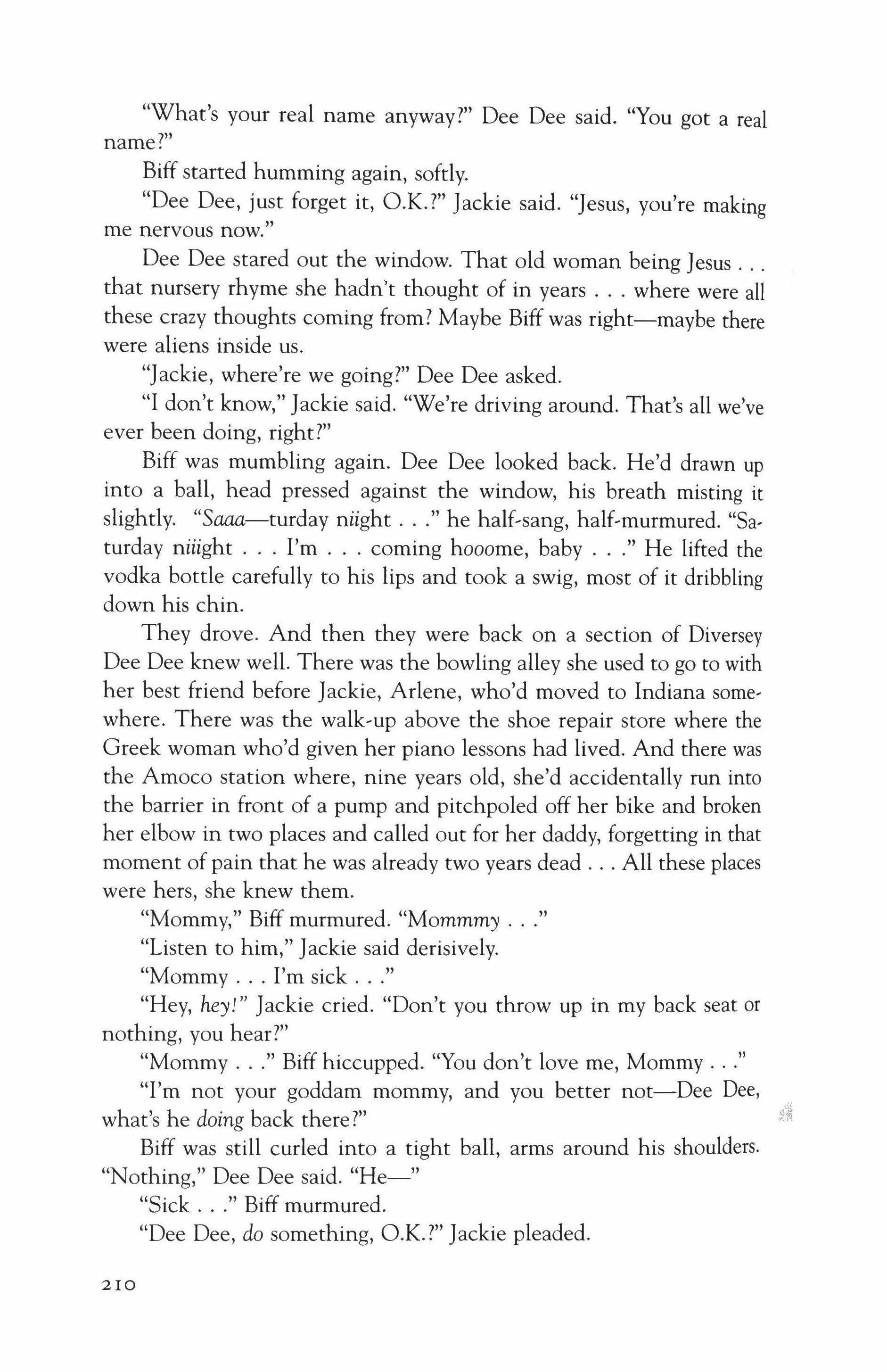
"What's your real name anyway?" Dee Dee said. "You got a real name?"
Biff started humming again, softly.
"Dee Dee, just forget it, O.K.?" Jackie said. "Jesus, you're making me nervous now."
Dee Dee stared out the window. That old woman being Jesus that nursery rhyme she hadn't thought of in years where were all these crazy thoughts coming from? Maybe Biff was right-maybe there were aliens inside us.
"Jackie, where're we going?" Dee Dee asked.
"I don't know," Jackie said. "We're driving around. That's all we've ever been doing, right?"
Biff was mumbling again. Dee Dee looked back. He'd drawn up into a ball, head pressed against the window, his breath misting it slightly. "Saaa-turday niight he half-sang, half-murmured. "Saturday niiight I'm coming hooome, baby He lifted the vodka bottle carefully to his lips and took a swig, most of it dribbling down his chin.
They drove. And then they were back on a section of Diversey Dee Dee knew well. There was the bowling alley she used to go to with her best friend before Jackie, Arlene, who'd moved to Indiana somewhere. There was the walk-up above the shoe repair store where the Greek woman who'd given her piano lessons had lived. And there was the Amoco station where, nine years old, she'd accidentally run into the barrier in front of a pump and pitchpoled off her bike and broken her elbow in two places and called out for her daddy, forgetting in that moment of pain that he was already two years dead All these places were hers, she knew them.
"Mommy," Biff murmured. "Mommmy
"Listen to him," Jackie said derisively.
"Mommy I'm sick
"Hey, hey!" Jackie cried. "Don't you throw up in my back seat or nothing, you hear?"
"Mommy Biff hiccupped. "You don't love me, Mommy
"I'm not your goddam mommy, and you better not-Dee Dee, what's he doing back there?" ;j�
Biff was still curled into a tight ball, arms around his shoulders. "Nothing," Dee Dee said. "He-"
"Sick Biff murmured.
"Dee Dee, do something, O.K.?" Jackie pleaded.
210

"Whaddya want me to do?" Dee Dee cried, throwing up her hands in exasperation.
"Jesus, if he throws up back there " "Well, stop then."
"Hey!" Jackie yelled, as if Biff were a long ways away. "Hey, Lothar Biff You gonna throw up or something? You want us to stop?"
Dee Dee looked back. Biff's head was turned toward her, eyes closed, mouth wide open. She was startled, and for a moment thought he was dead. But then she saw he was breathing, fast and thinly. "Jackie," she said, "he's breathing funny."
"Goddammit!" Jackie pulled the car off into a parking space near a dry cleaners. She kneeled on her seat and looked over it. "Hey, Biff," she said, "you O.K., or what?"
Biff's lips moved soundlessly. His head fell onto his chest.
We're into something here, Dee Dee thought.
"Biff, c'mon." Jackie leaned across the seat, grabbed his hand, lifted it, and shook his arm, which flapped loosely, like a doll's. "Biff, you're scaring us. C'mon. Wake up!" She looked at Dee Dee. "Get back there and slap him or something, Dee Dee."
"What?"
"Dee Deee!"
"O.K., O.K." Dee Dee climbed back and kneeled on the seat beside Biff. She shook his shoulders. He was breathing even more thinly, mouth still open. She shook him again, and his head flopped to the side. He gurgled. Dee Dee saw the empty plastic bag of pills on the seat beside him. "Jackie She held it up. "He-he's taken all of them."
"Oh great," Jackie sighed.
"1-1 don't think he looks too good
"Asshole," Jackie hissed. "Asshole, asshole! He's fucking up everything. Ruining our evening!" She threw her cigarette pack at Biff. It bounced off his shoulder. "C'mon let's get him out. We gottawalk him or something. That's what Courtney Love did with Kurt."
"Maybe we should get him some I don't know coffee or something," Dee Dee said.
"Look at him! How could he drink coffee? Where's coffee anyway? C'mon, let's get him out, for chrissake."
For someone so thin, Biff was like dead weight. Between her pushing and Jackie pulling, they managed to get him half-out of the car. Dee Dee looked around-there was nobody on the street in either direction, except for two Hispanic guys on the far comer waiting for the
211
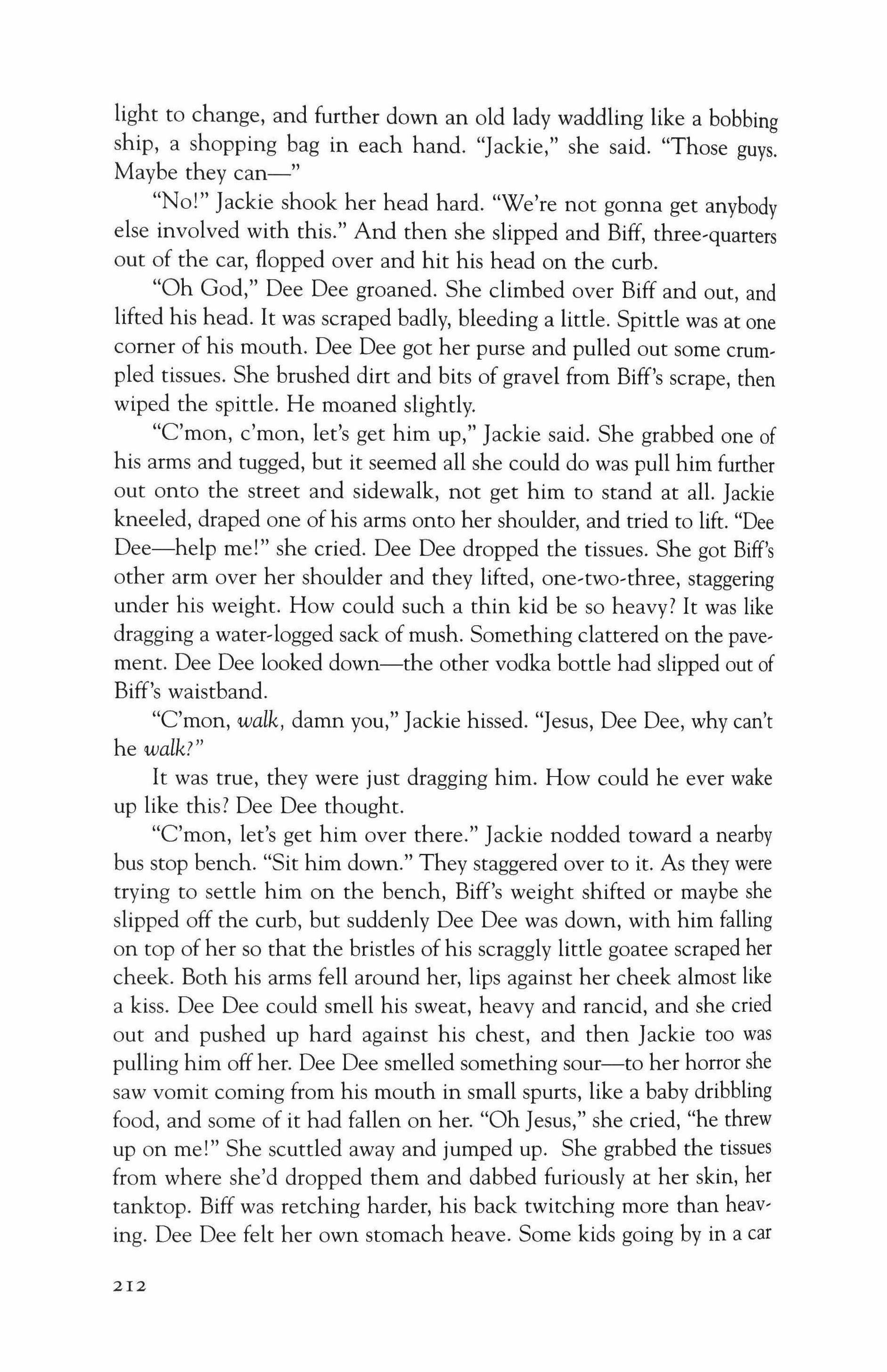
light to change, and further down an old lady waddling like a bobbing ship, a shopping bag in each hand. "Jackie," she said. "Those guys. Maybe they can-"
"No!" Jackie shook her head hard. "We're not gonna get anybody else involved with this." And then she slipped and Biff, three-quarters out of the car, flopped over and hit his head on the curb.
"Oh God," Dee Dee groaned. She climbed over Biff and out, and lifted his head. It was scraped badly, bleeding a little. Spittle was at one comer of his mouth. Dee Dee got her purse and pulled out some crumpled tissues. She brushed dirt and bits of gravel from Biff's scrape, then wiped the spittle. He moaned slightly.
"C'mon, c'mon, let's get him up," Jackie said. She grabbed one of his arms and tugged, but it seemed all she could do was pull him further out onto the street and sidewalk, not get him to stand at all. Jackie kneeled, draped one of his arms onto her shoulder, and tried to lift. "Dee Dee-help me!" she cried. Dee Dee dropped the tissues. She got Biff's other arm over her shoulder and they lifted, one-twa-three, staggering under his weight. How could such a thin kid be so heavy? It was like dragging a water-logged sack of mush. Something clattered on the pavement. Dee Dee looked down-the other vodka bottle had slipped out of Biff's waistband.
"C'mon, walk, damn you," Jackie hissed. "Jesus, Dee Dee, why can't he walk?"
It was true, they were just dragging him. How could he ever wake up like this? Dee Dee thought.
"C'mon, let's get him over there." Jackie nodded toward a nearby bus stop bench. "Sit him down." They staggered over to it. As they were trying to settle him on the bench, Biff's weight shifted or maybe she slipped off the curb, but suddenly Dee Dee was down, with him falling on top of her so that the bristles of his scraggly little goatee scraped her cheek. Both his arms fell around her, lips against her cheek almost like a kiss. Dee Dee could smell his sweat, heavy and rancid, and she cried out and pushed up hard against his chest, and then Jackie too was pulling him off her. Dee Dee smelled something sour-to her horror she saw vomit coming from his mouth in small spurts, like a baby dribbling food, and some of it had fallen on her. "Oh Jesus," she cried, "he threw up on me!" She scuttled away and jumped up. She grabbed the tissues from where she'd dropped them and dabbed furiously at her skin, her tanktop. Biff was retching harder, his back twitching more than heaving. Dee Dee felt her own stomach heave. Some kids going by in a car
212
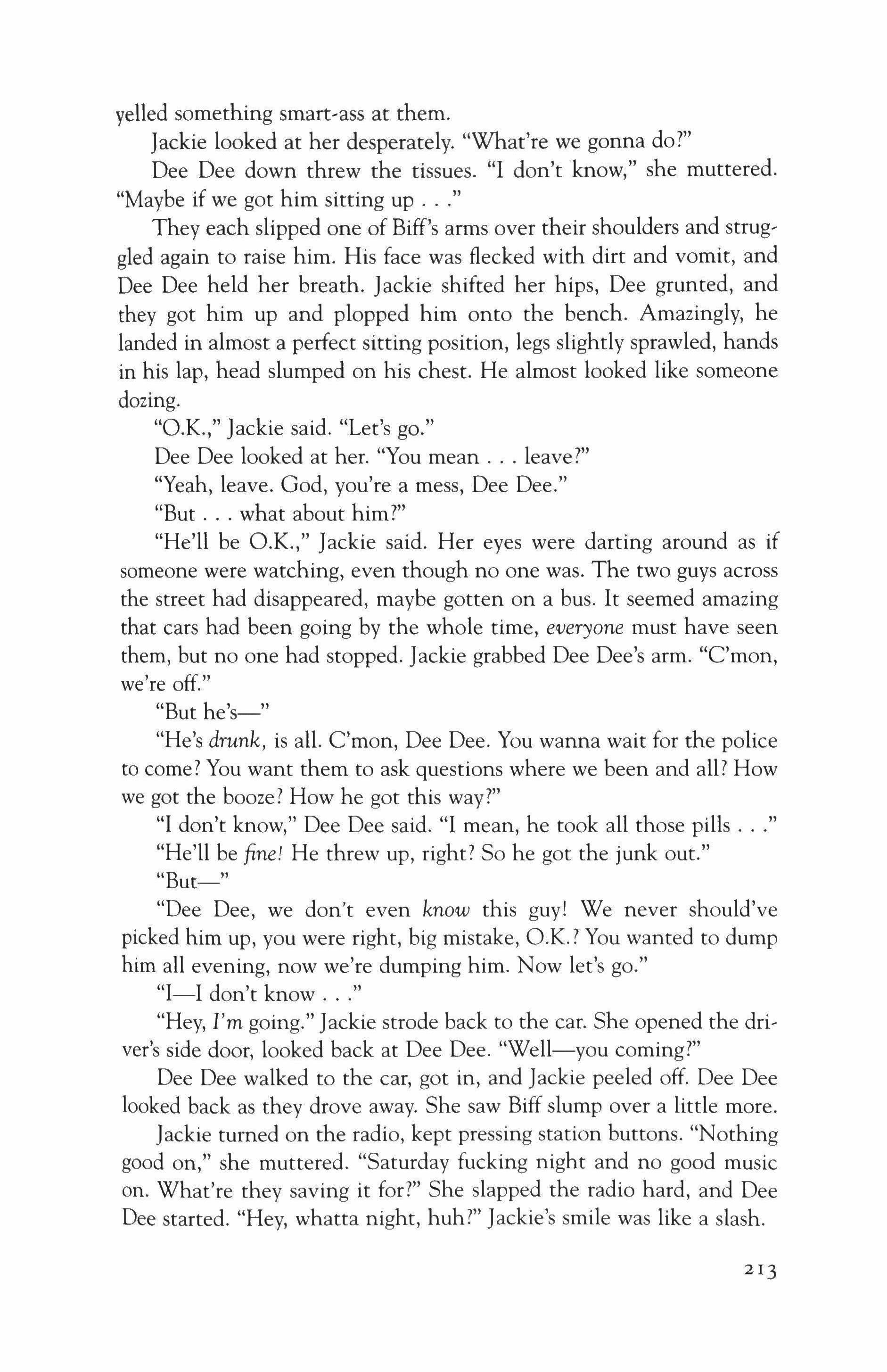
yelled something smart-ass at them.
Jackie looked at her desperately. "What're we gonna do?"
Dee Dee down threw the tissues. "I don't know," she muttered. "Maybe if we got him sitting up
They each slipped one of Biff's arms over their shoulders and struggled again to raise him. His face was flecked with dirt and vomit, and Dee Dee held her breath. Jackie shifted her hips, Dee grunted, and they got him up and plopped him onto the bench. Amazingly, he landed in almost a perfect sitting position, legs slightly sprawled, hands in his lap, head slumped on his chest. He almost looked like someone dozing.
"O.K.," Jackie said. "Let's go."
Dee Dee looked at her. "You mean leave?"
"Yeah, leave. God, you're a mess, Dee Dee."
"But what about him?"
"He'll be O.K.," Jackie said. Her eyes were darting around as if someone were watching, even though no one was. The two guys across the street had disappeared, maybe gotten on a bus. It seemed amazing that cars had been going by the whole time, everyone must have seen them, but no one had stopped. Jackie grabbed Dee Dee's arm. "C'mon, we're off."
"But he's-"
"He's drunk, is all. C'mon, Dee Dee. You wanna wait for the police to come? You want them to ask questions where we been and all? How we got the booze? How he got this way?"
"I don't know," Dee Dee said. "I mean, he took all those pills
"He'll be fine! He threw up, right? So he got the junk out."
"But-"
"Dee Dee, we don't even know this guy! We never should've picked him up, you were right, big mistake, O.K.? You wanted to dump him all evening, now we're dumping him. Now let's go."
"1-1 don't know
"Hey, I'm going." Jackie strode back to the car. She opened the driver's side door, looked back at Dee Dee. "Well-you coming?"
Dee Dee walked to the car, got in, and Jackie peeled off. Dee Dee looked back as they drove away. She saw Biff slump over a little more. Jackie turned on the radio, kept pressing station buttons. "Nothing good on," she muttered. "Saturday fucking night and no good music on. What're they saving it for?" She slapped the radio hard, and Dee Dee started. "Hey, whatta night, huh?" Jackie's smile was like a slash.
213
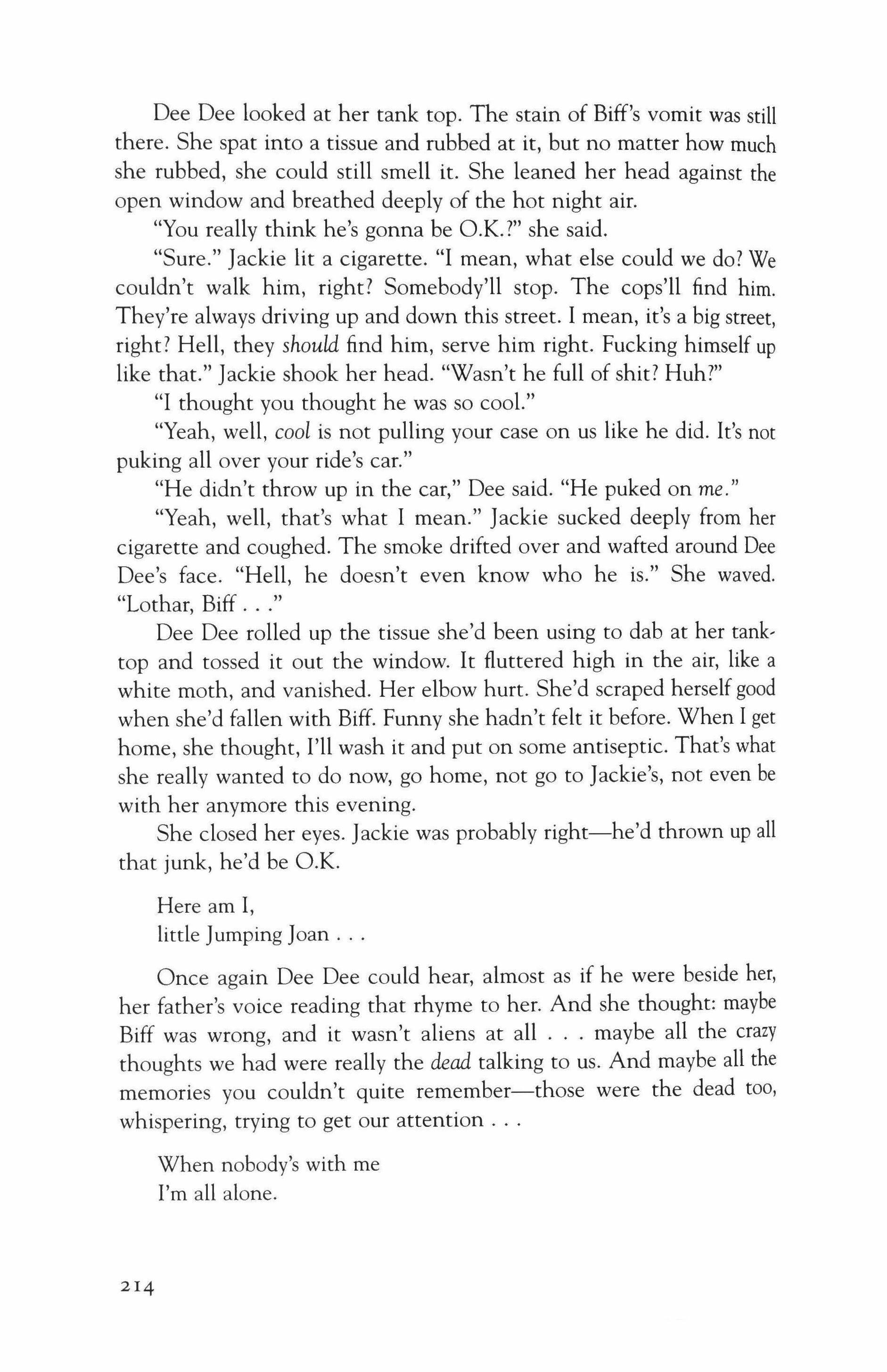
Dee Dee looked at her tank top. The stain of Biff's vomit was still there. She spat into a tissue and rubbed at it, but no matter how much she rubbed, she could still smell it. She leaned her head against the open window and breathed deeply of the hot night air.
"You really think he's gonna be O.K.?" she said.
"Sure." Jackie lit a cigarette. "I mean, what else could we do? We couldn't walk him, right? Somebody'll stop. The cops'll find him. They're always driving up and down this street. I mean, it's a big street, right? Hell, they should find him, serve him right. Fucking himself up like that." Jackie shook her head. "Wasn't he full of shit? Huh?"
"I thought you thought he was so cool."
"Yeah, well, cool is not pulling your case on us like he did. It's not puking all over your ride's car."
"He didn't throw up in the car," Dee said. "He puked on me."
"Yeah, well, that's what I mean." Jackie sucked deeply from her cigarette and coughed. The smoke drifted over and wafted around Dee Dee's face. "Hell, he doesn't even know who he is." She waved. "Lothar, Biff
Dee Dee rolled up the tissue she'd been using to dab at her tanktop and tossed it out the window. It fluttered high in the air, like a white moth, and vanished. Her elbow hurt. She'd scraped herself good when she'd fallen with Biff Funny she hadn't felt it before. When I get home, she thought, I'll wash it and put on some antiseptic. That's what she really wanted to do now, go home, not go to Jackie's, not even be with her anymore this evening.
She closed her eyes. Jackie was probably right-he'd thrown up all that junk, he'd be O.K.
Here am I, little Jumping Joan
Once again Dee Dee could hear, almost as if he were beside her, her father's voice reading that rhyme to her. And she thought: maybe Biff was wrong, and it wasn't aliens at all maybe all the crazy thoughts we had were really the dead talking to us. And maybe all the memories you couldn't quite remember-those were the dead too, whispering, trying to get our attention
When nobody's with me I'm all alone.
214
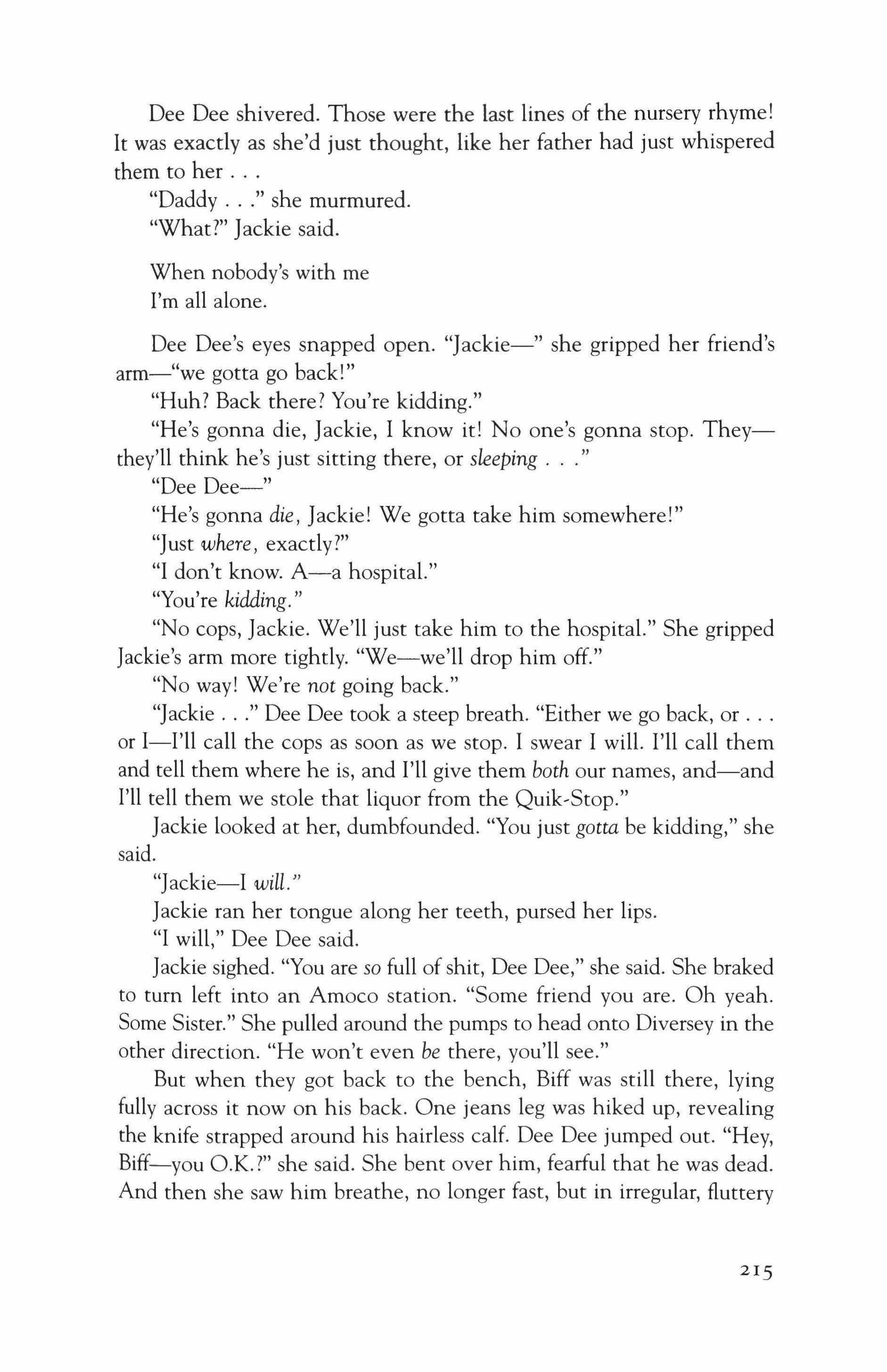
Dee Dee shivered. Those were the last lines of the nursery rhyme! It was exactly as she'd just thought, like her father had just whispered them to her
"Daddy she murmured.
"What?" Jackie said.
When nobody's with me
I'm all alone.
Dee Dee's eyes snapped open. "Jackie-" she gripped her friend's arm-"we gotta go back!"
"Huh? Back there? You're kidding."
"He's gonna die, Jackie, I know it! No one's gonna stop. Theythey'll think he's just sitting there, or sleeping
"Dee Dee-"
"He's gonna die, Jackie! We gotta take him somewhere!"
"Just where, exactly?"
"I don't know. A-a hospital."
"You're kidding."
"No cops, Jackie. We'll just take him to the hospital." She gripped Jackie's arm more tightly. "We-we'll drop him off."
"No way! We're not going back."
"Jackie Dee Dee took a steep breath. "Either we go back, or or I-I'll call the cops as soon as we stop. I swear I will. I'll call them and tell them where he is, and I'll give them both our names, and-and I'll tell them we stole that liquor from the Quik-Stop."
Jackie looked at her, dumbfounded. "You just gotta be kidding," she said.
"Jackie-I will."
Jackie ran her tongue along her teeth, pursed her lips.
"I will," Dee Dee said.
Jackie sighed. "You are so full of shit, Dee Dee," she said. She braked to tum left into an Amoco station. "Some friend you are. Oh yeah. Some Sister." She pulled around the pumps to head onto Diversey in the other direction. "He won't even be there, you'll see."
But when they got back to the bench, Biff was still there, lying fully across it now on his back. One jeans leg was hiked up, revealing the knife strapped around his hairless calf. Dee Dee jumped out. "Hey, Biff-you O.K.?" she said. She bent over him, fearful that he was dead. And then she saw him breathe, no longer fast, but in irregular, fluttery
215
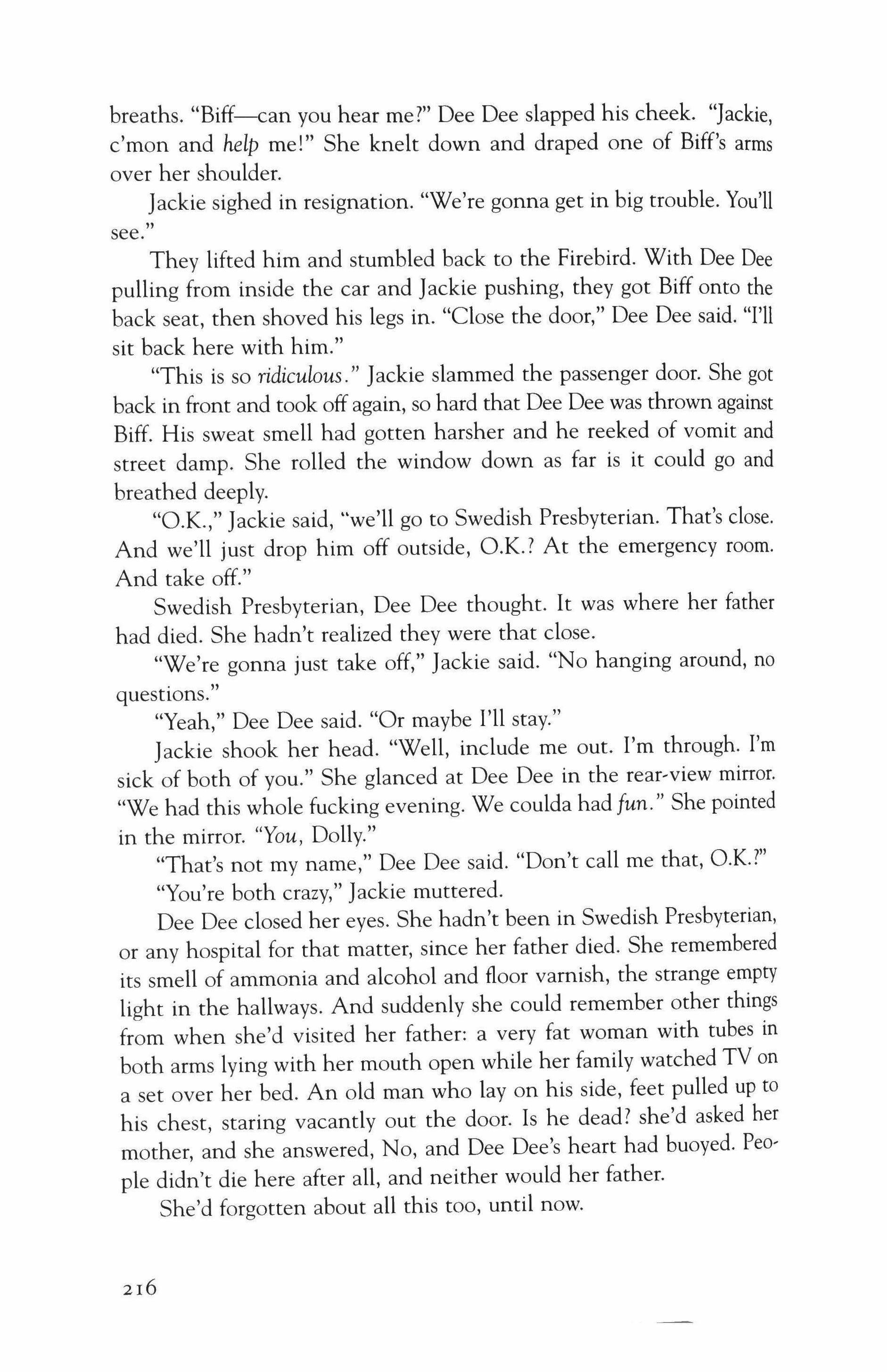
breaths. "Biff--can you hear me?" Dee Dee slapped his cheek. "Jackie, c'mon and help me!" She knelt down and draped one of Biff's arms over her shoulder.
Jackie sighed in resignation. "We're gonna get in big trouble. You'll " see.
They lifted him and stumbled back to the Firebird. With Dee Dee pulling from inside the car and Jackie pushing, they got Biff onto the back seat, then shoved his legs in. "Close the door," Dee Dee said. "I'll sit back here with him."
"This is so ridiculous." Jackie slammed the passenger door. She got back in front and took off again, so hard that Dee Dee was thrown against Biff. His sweat smell had gotten harsher and he reeked of vomit and street damp. She rolled the window down as far is it could go and breathed deeply.
"O.K.," Jackie said, "we'll go to Swedish Presbyterian. That's close. And we'll just drop him off outside, O.K.? At the emergency room. And take off."
Swedish Presbyterian, Dee Dee thought. It was where her father had died. She hadn't realized they were that close.
"We're gonna just take off," Jackie said. "No hanging around, no questions."
"Yeah," Dee Dee said. "Or maybe I'll stay."
Jackie shook her head. "Well, include me out. I'm through. I'm sick of both of you." She glanced at Dee Dee in the rear-view mirror. "We had this whole fucking evening. We coulda had fun." She pointed in the mirror. "You, Dolly."
"That's not my name," Dee Dee said. "Don't call me that, O.K.?"
"You're both crazy," Jackie muttered.
Dee Dee closed her eyes. She hadn't been in Swedish Presbyterian, or any hospital for that matter, since her father died. She remembered its smell of ammonia and alcohol and floor varnish, the strange empty light in the hallways. And suddenly she could remember other things from when she'd visited her father: a very fat woman with tubes in both arms lying with her mouth open while her family watched TV on a set over her bed. An old man who lay on his side, feet pulled up to his chest, staring vacantly out the door. Is he dead? she'd asked her mother, and she answered, No, and Dee Dee's heart had buoyed. People didn't die here after all, and neither would her father.
She'd forgotten about all this too, until now.
216
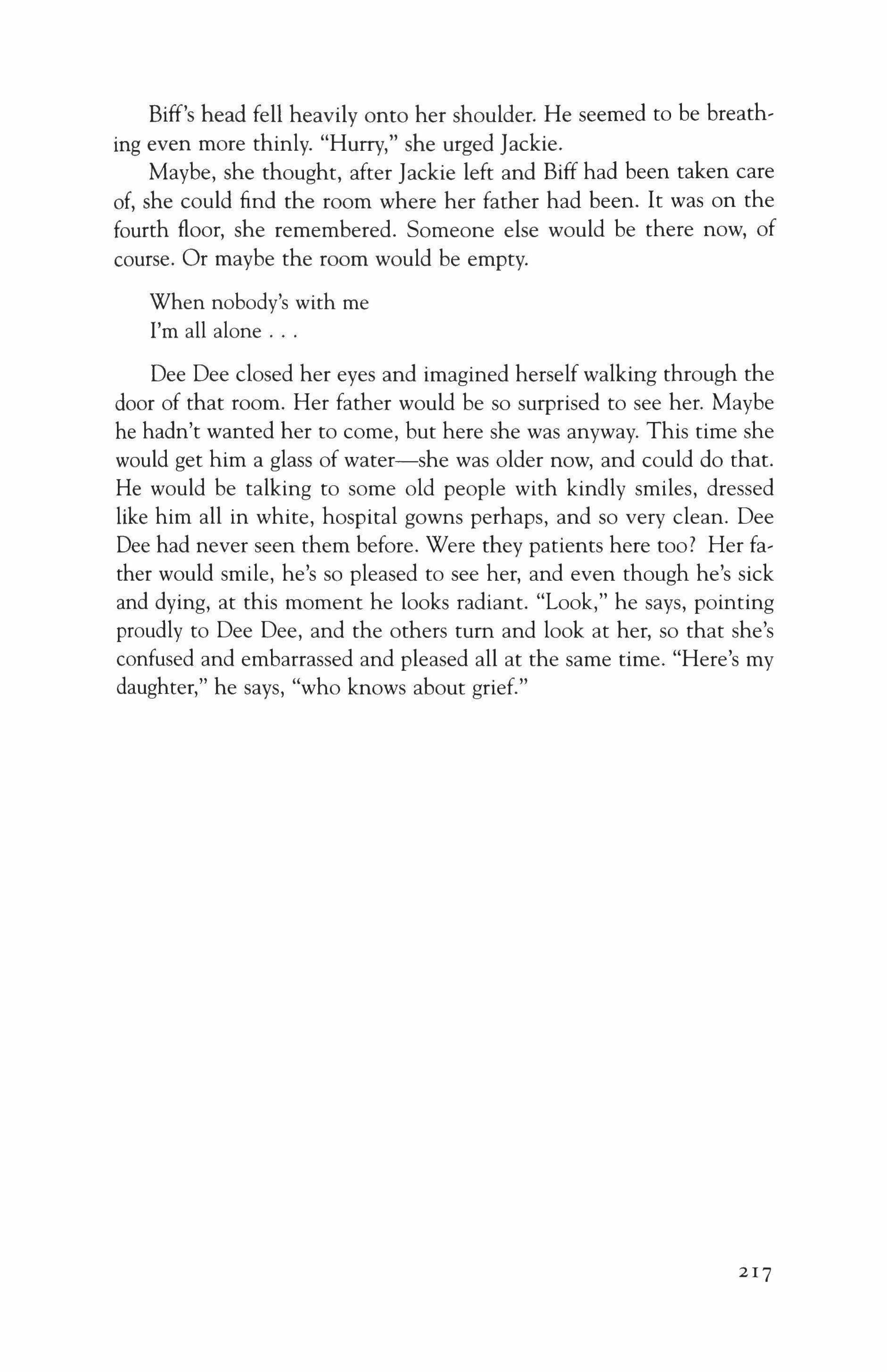
Biff's head fell heavily onto her shoulder. He seemed to be breathing even more thinly. "Hurry," she urged Jackie. Maybe, she thought, after Jackie left and Biff had been taken care of, she could find the room where her father had been. It was on the fourth floor, she remembered. Someone else would be there now, of course. Or maybe the room would be empty.
When nobody's with me
I'm all alone
Dee Dee closed her eyes and imagined herself walking through the door of that room. Her father would be so surprised to see her. Maybe he hadn't wanted her to come, but here she was anyway. This time she would get him a glass of water-she was older now, and could do that. He would be talking to some old people with kindly smiles, dressed like him all in white, hospital gowns perhaps, and so very clean. Dee Dee had never seen them before. Were they patients here too? Her father would smile, he's so pleased to see her, and even though he's sick and dying, at this moment he looks radiant. "Look," he says, pointing proudly to Dee Dee, and the others tum and look at her, so that she's confused and embarrassed and pleased all at the same time. "Here's my daughter," he says, "who knows about grief."
217
Meredith Steinbach

Statuesque
Up through her brother's sloping lower lawns, Rose Reynolds ascends through all the wooded terraces cut in and defined by beds of pink and yellow flowers, precarious walls of stone. Wrought iron fences graduate the sight of the spindled porches and pale wooden exteriors from cliff to cobalt sky. And there, descending from the widow's walk, looking out toward the crest of sea, jumpsuit yellow as a finch, leaps the spectacle: her only brother's new wife. By the time Rose has reached the house, her sister-in-law has donned her bright white tennis shoes. "Freddy, Freddy," the sister-in-law calls toward the house. "Your sister's here. And I've got you both the biggest surprise you've ever seen. Freddy, aren't you there?"
"Oh absolutely please-" the sister-in-law whines, already taking Rose's hand. "Absolutely don't look yet!" Rose shuts her eyes and opens them at once. "But oh! Of course you must. And now! That naughty Freddy's gone off to the office. I can't find him anywhere just now.
It is the absurdly beautiful sculpture that rises up and looms over both their heads-erected by what numbers of men?-that makes Rose Reynolds want to laugh, or cry, she doesn't know which. A large round table, made entirely of polished cemetery marble, stands dead center of the uppermost patio. And from its core, exploding into a fervent early summer foliage, bursts a tall, pink, marble edifice-nine feet tallthighs buried in the naturally slit, dark stone. The statue's carved male
218
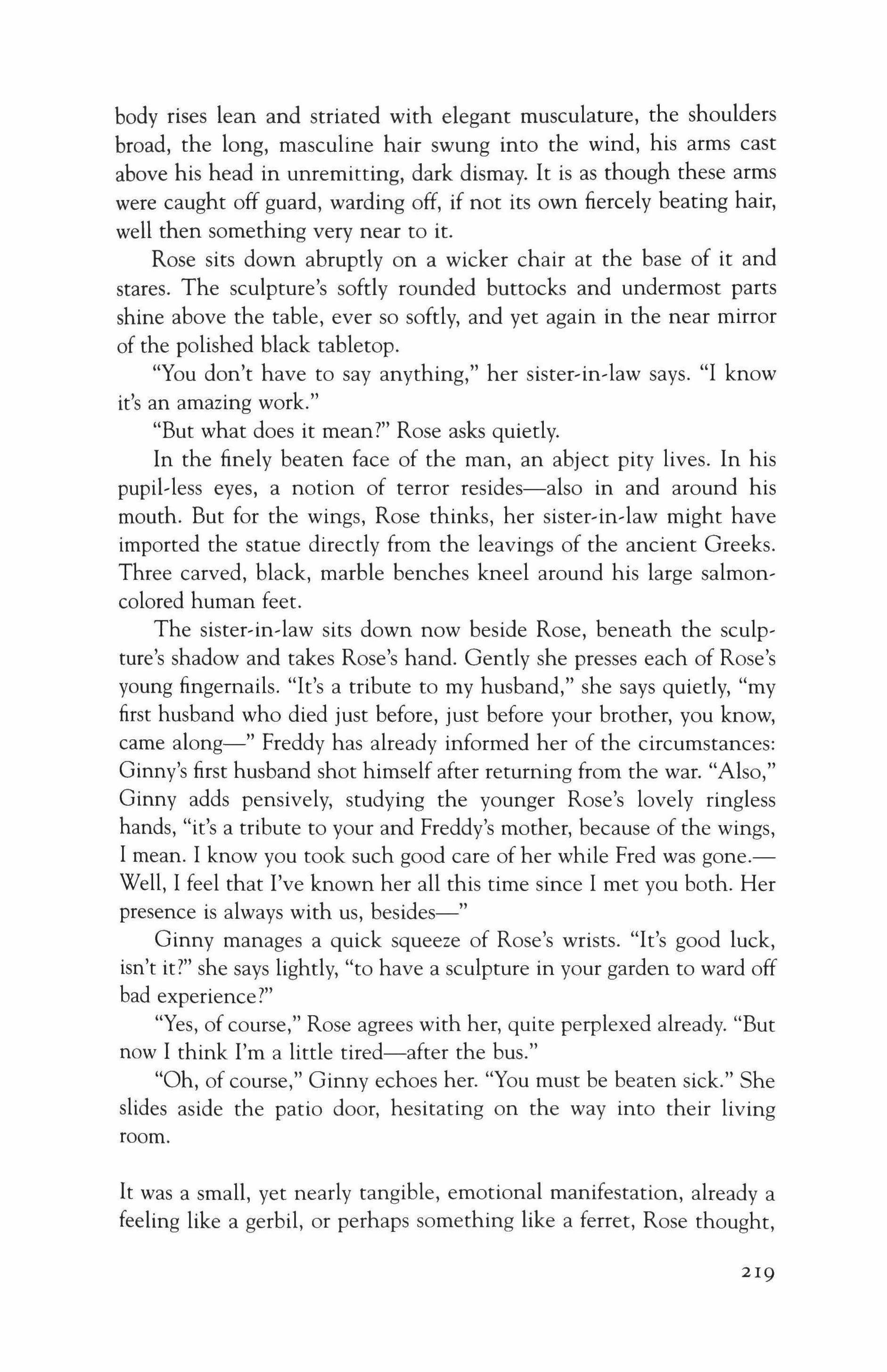
body rises lean and striated with elegant musculature, the shoulders broad, the long, masculine hair swung into the wind, his arms cast above his head in unremitting, dark dismay. It is as though these arms were caught off guard, warding off, if not its own fiercely beating hair, well then something very near to it.
Rose sits down abruptly on a wicker chair at the base of it and stares. The sculpture's softly rounded buttocks and undermost parts shine above the table, ever so softly, and yet again in the near mirror of the polished black tabletop.
"You don't have to say anything," her sister-in-law says. "I know it's an amazing work."
"But what does it mean?" Rose asks quietly.
In the finely beaten face of the man, an abject pity lives. In his pupil-less eyes, a notion of terror resides-also in and around his mouth. But for the wings, Rose thinks, her sister-in-law might have imported the statue directly from the leavings of the ancient Greeks. Three carved, black, marble benches kneel around his large salmon, colored human feet.
The sister-in-law sits down now beside Rose, beneath the sculpture's shadow and takes Rose's hand. Gently she presses each of Rose's young fingernails. "It's a tribute to my husband," she says quietly, "my first husband who died just before, just before your brother, you know, came along-" Freddy has already informed her of the circumstances: Ginny's first husband shot himself after returning from the war. "Also," Ginny adds pensively, studying the younger Rose's lovely ringless hands, "it's a tribute to your and Freddy's mother, because of the wings, I mean. I know you took such good care of her while Fred was gone.Well, I feel that I've known her all this time since I met you both. Her presence is always with us, besides-"
Ginny manages a quick squeeze of Rose's wrists. "It's good luck, isn't it?" she says lightly, "to have a sculpture in your garden to ward off bad experience?"
"Yes, of course," Rose agrees with her, quite perplexed already. "But now I think I'm a little tired-after the bus."
"Oh, of course," Ginny echoes her. "You must be beaten sick." She slides aside the patio door, hesitating on the way into their living room.
It was a small, yet nearly tangible, emotional manifestation, already a feeling like a gerbil, or perhaps something like a ferret, Rose thought,
219
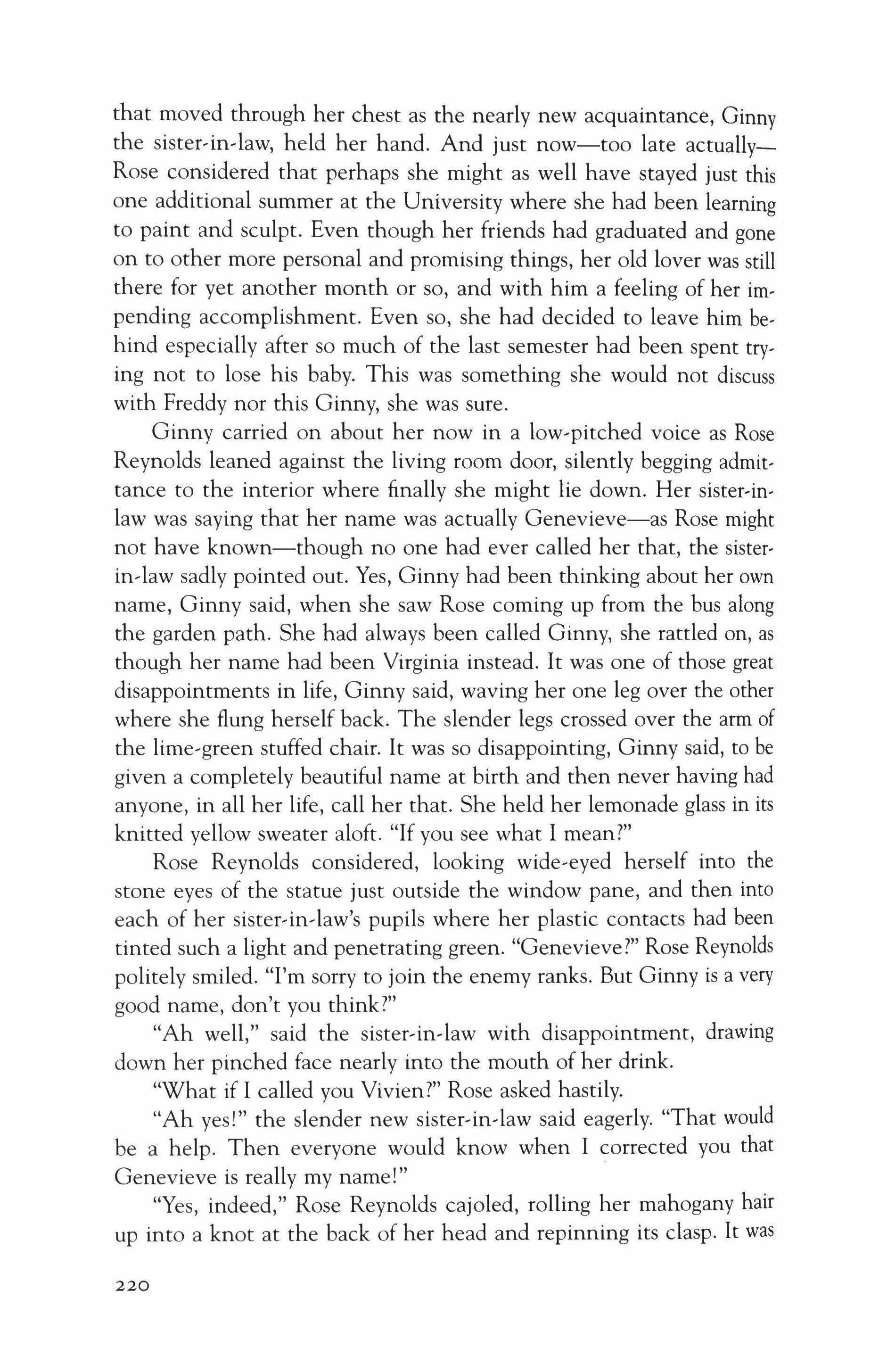
that moved through her chest as the nearly new acquaintance, Ginny the sister-in-law, held her hand. And just now-too late actuallyRose considered that perhaps she might as well have stayed just this one additional summer at the University where she had been learning to paint and sculpt. Even though her friends had graduated and gone on to other more personal and promising things, her old lover was still there for yet another month or so, and with him a feeling of her impending accomplishment. Even so, she had decided to leave him behind especially after so much of the last semester had been spent trying not to lose his baby. This was something she would not discuss with Freddy nor this Ginny, she was sure.
Ginny carried on about her now in a low-pitched voice as Rose Reynolds leaned against the living room door, silently begging admittance to the interior where finally she might lie down. Her sister-inlaw was saying that her name was actually Genevieve-as Rose might not have known-though no one had ever called her that, the sisterin-law sadly pointed out. Yes, Ginny had been thinking about her own name, Ginny said, when she saw Rose coming up from the bus along the garden path. She had always been called Ginny, she rattled on, as though her name had been Virginia instead. It was one of those great disappointments in life, Ginny said, waving her one leg over the other where she flung herself back. The slender legs crossed over the arm of the lime-green stuffed chair. It was so disappointing, Ginny said, to be given a completely beautiful name at birth and then never having had anyone, in all her life, call her that. She held her lemonade glass in its knitted yellow sweater aloft. "If you see what I mean?"
Rose Reynolds considered, looking wide-eyed herself into the stone eyes of the statue just outside the window pane, and then into each of her sister-in-law's pupils where her plastic contacts had been tinted such a light and penetrating green. "Genevieve?" Rose Reynolds politely smiled. "I'm sorry to join the enemy ranks. But Ginny is a very good name, don't you think?"
"Ah well," said the sister-in-law with disappointment, drawing down her pinched face nearly into the mouth of her drink.
"What if I called you Vivien?" Rose asked hastily.
"Ah yes!" the slender new sister-in-law said eagerly. "That would be a help. Then everyone would know when I corrected you that Genevieve is really my name!"
"Yes, indeed," Rose Reynolds cajoled, rolling her mahogany hair up into a knot at the back of her head and repinning its clasp. It was
220

as though in these last moments she had been caught and immobilized in a queue of ceaseless standup comedians, and now by association or self-preservation she'd become one herself. For a moment she went on, weak-kneed, humoring the slightly older woman in the yellow jumpsuit as best she could.
Rose Reynolds with difficulty fought off the impulse to roll her eyes. "It is a little odd, Ginny, but I suppose it might work if you said and did the things a Genevieve might do, then I suppose-"
"Oh yes!" the sister-in-law cried. "What a notion! 'Vivien,'" she tried the name on herself. "I actually like that name!"
"What utter irrelevance," Rose thought, taking pity on her brother who had been nearly lost at war and healed again against all odds, only to come home to this. Rose Reynolds leaned over and picked up her bags. A Genevieve would not have bought such a statue, Rose Reynolds thought. And a Vivien would have admired it in a museum and left it at that, instead of trying to pretend it was a tribute.
"Exactly," the new sister-in-law announced. "Vivien will be just fine."
Rose Reynolds nodded again, indicating the way in. "Do you mind, Vivien, if I go in for a moment now and rest? It's been a rather exhausting week. I'm feeling rather urgent, if you see what I mean."
On the ascent through the house to the room where she would sleep and another where she would paint, Rose Reynolds could not help but notice that the sister-in-law had had other effects on the stately home since the only other time Rose had visited it.
In the beginning of that summer then, the air was filled with a presumed pleasantness. Her brother was home from the war now and recovered, her mother was dead, her father gone now for years and years, never to return. Yes, life had moved on rapidly for them. Only a few years before, they had been riding bicycles on family outings, their mother radiant at the front, and now both her parents were gone entirely. Instead, here the tall, lightly freckled Vivien stood, in perpetual helpfulness and intended charm.
After a few days of awkwardness then, it began to seem not at all abominable for Rose to sit in Vivien's company on the back terrace near the angel Vivien had installed. Rose stretched out politely alongside her sister-in-law on their padded chairs overlooking the pool. She grew accustomed even to the unusually sweet and blended drinks her sister-in-law made for the two of them during their innocuous discussions of things like cooking and flowers. And if anything else might
221
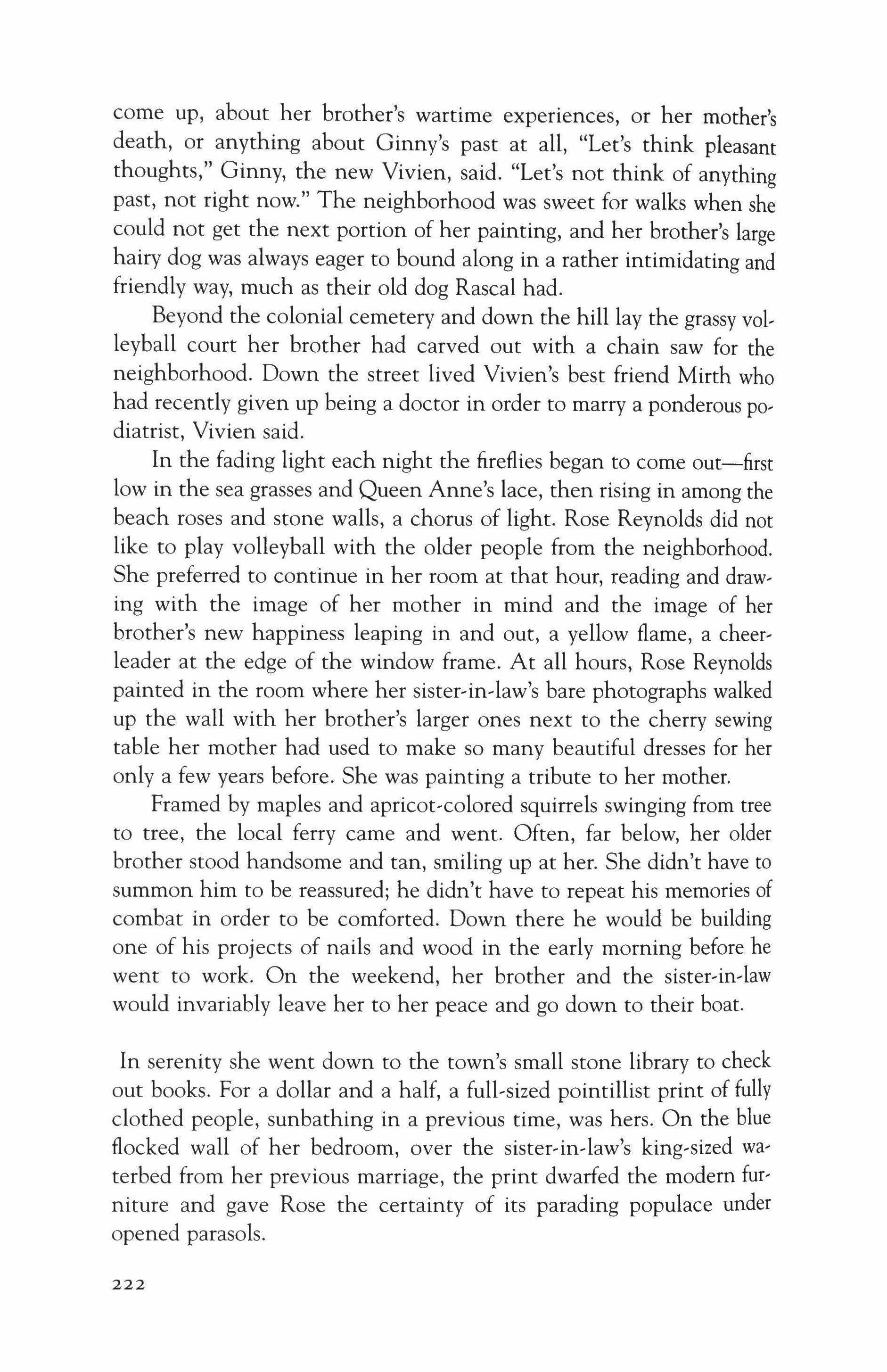
come up, about her brother's wartime experiences, or her mother's death, or anything about Ginny's past at all, "Let's think pleasant thoughts," Ginny, the new Vivien, said. "Let's not think of anything past, not right now." The neighborhood was sweet for walks when she could not get the next portion of her painting, and her brother's large hairy dog was always eager to bound along in a rather intimidating and friendly way, much as their old dog Rascal had.
Beyond the colonial cemetery and down the hill lay the grassy volleyball court her brother had carved out with a chain saw for the neighborhood. Down the street lived Vivien's best friend Mirth who had recently given up being a doctor in order to marry a ponderous podiatrist, Vivien said.
In the fading light each night the fireflies began to come out-first low in the sea grasses and Queen Anne's lace, then rising in among the beach roses and stone walls, a chorus of light. Rose Reynolds did not like to play volleyball with the older people from the neighborhood. She preferred to continue in her room at that hour, reading and drawing with the image of her mother in mind and the image of her brother's new happiness leaping in and out, a yellow flame, a cheerleader at the edge of the window frame. At all hours, Rose Reynolds painted in the room where her sister-in-law's bare photographs walked up the wall with her brother's larger ones next to the cherry sewing table her mother had used to make so many beautiful dresses for her only a few years before. She was painting a tribute to her mother.
Framed by maples and apricot-colored squirrels swinging from tree to tree, the local ferry came and went. Often, far below, her older brother stood handsome and tan, smiling up at her. She didn't have to summon him to be reassured; he didn't have to repeat his memories of combat in order to be comforted. Down there he would be building one of his projects of nails and wood in the early morning before he went to work. On the weekend, her brother and the sister-in-law would invariably leave her to her peace and go down to their boat.
In serenity she went down to the town's small stone library to check out books. For a dollar and a half, a full-sized pointillist print of fully clothed people, sunbathing in a previous time, was hers. On the blue flocked wall of her bedroom, over the sister-in-law's king-sized waterbed from her previous marriage, the print dwarfed the modern furniture and gave Rose the certainty of its parading populace under opened parasols.
222
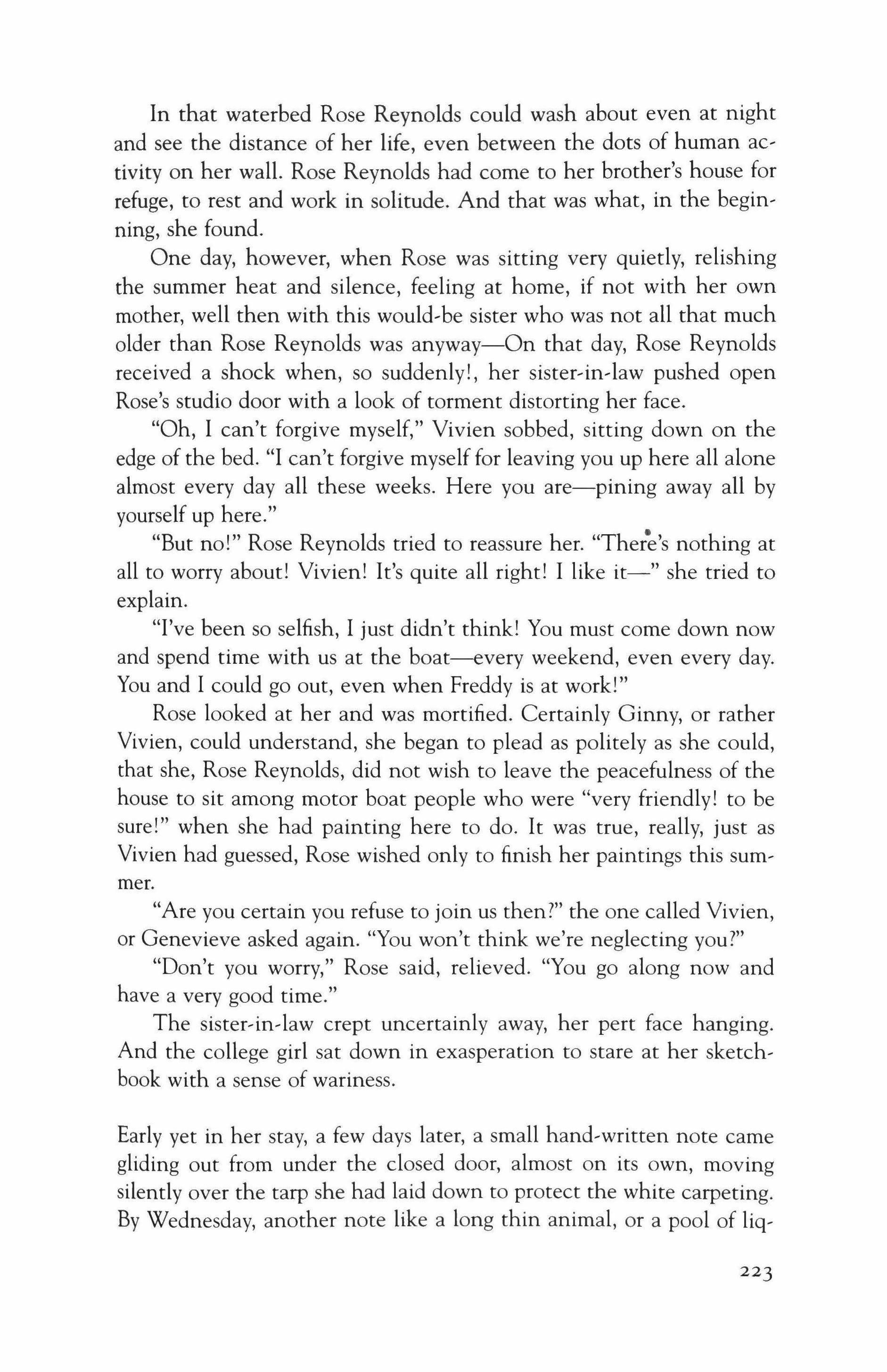
In that waterbed Rose Reynolds could wash about even at night and see the distance of her life, even between the dots of human activity on her wall. Rose Reynolds had come to her brother's house for refuge, to rest and work in solitude. And that was what, in the beginning, she found.
One day, however, when Rose was sitting very quietly, relishing the summer heat and silence, feeling at home, if not with her own mother, well then with this would-be sister who was not all that much older than Rose Reynolds was anyway-On that day, Rose Reynolds received a shock when, so suddenly!, her sister-in-law pushed open Rose's studio door with a look of torment distorting her face.
"Oh, I can't forgive myself," Vivien sobbed, sitting down on the edge of the bed. "I can't forgive myself for leaving you up here all alone almost every day all these weeks. Here you are-pining away all by yourself up here."
"But no!" Rose Reynolds tried to reassure her. "Ther�'s nothing at all to worry about! Vivien! It's quite all right! I like it-" she tried to explain.
"I've been so selfish, I just didn't think! You must come down now and spend time with us at the boat-every weekend, even every day. You and I could go out, even when Freddy is at work!"
Rose looked at her and was mortified. Certainly Ginny, or rather Vivien, could understand, she began to plead as politely as she could, that she, Rose Reynolds, did not wish to leave the peacefulness of the house to sit among motor boat people who were "very friendly! to be sure!" when she had painting here to do. It was true, really, just as Vivien had guessed, Rose wished only to finish her paintings this summer.
"Are you certain you refuse to join us then?" the one called Vivien, or Genevieve asked again. "You won't think we're neglecting you?"
"Don't you worry," Rose said, relieved. "You go along now and have a very good time."
The sister-in-law crept uncertainly away, her pert face hanging. And the college girl sat down in exasperation to stare at her sketchbook with a sense of wariness.
Early yet in her stay, a few days later, a small hand-written note came gliding out from under the closed door, almost on its own, moving silently over the tarp she had laid down to protect the white carpeting. By Wednesday, another note like a long thin animal, or a pool of liq-
223
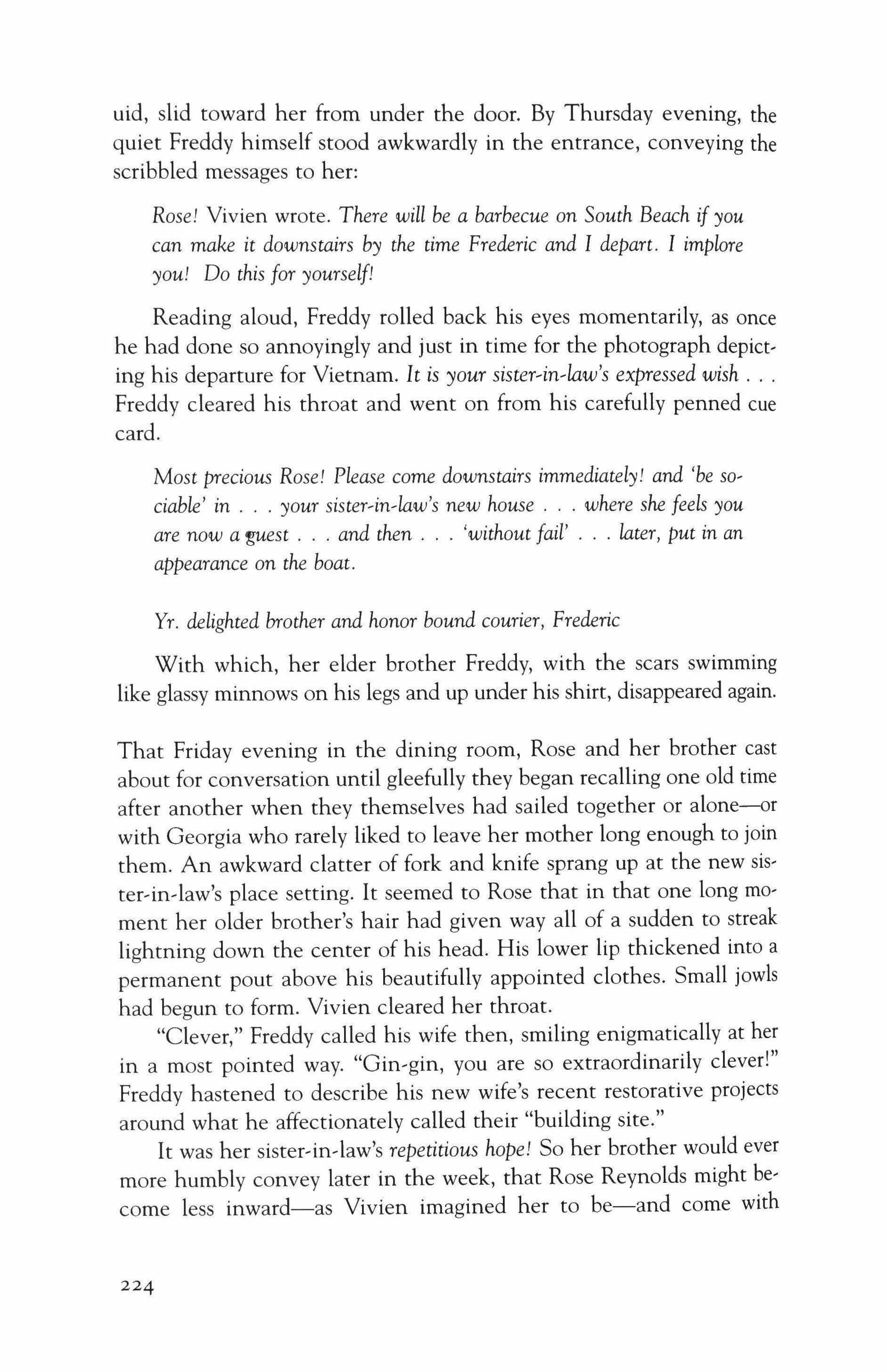
uid, slid toward her from under the door. By Thursday evening, the quiet Freddy himself stood awkwardly in the entrance, conveying the scribbled messages to her:
Rose! Vivien wrote. There will be a barbecue on South Beach if you can make it downstairs by the time Frederic and I depart. I implore you! Do this for yourself!
Reading aloud, Freddy rolled back his eyes momentarily, as once he had done so annoyingly and just in time for the photograph depicting his departure for Vietnam. It is your sister-in-law's expressed wish Freddy cleared his throat and went on from his carefully penned cue card.
Most precious Rose! Please come downstairs immediately! and 'be sociable' in your sister-in-law's new house where she feels you are now a �uest and then 'without fail' later, put in an appearance on the boat.
Yr. delighted brother and honor bound courier, Frederic
With which, her elder brother Freddy, with the scars swimming like glassy minnows on his legs and up under his shirt, disappeared again.
That Friday evening in the dining room, Rose and her brother cast about for conversation until gleefully they began recalling one old time after another when they themselves had sailed together or alone-or with Georgia who rarely liked to leave her mother long enough to join them. An awkward clatter of fork and knife sprang up at the new sister-m-law's place setting. It seemed to Rose that in that one long moment her older brother's hair had given way all of a sudden to streak lightning down the center of his head. His lower lip thickened into a permanent pout above his beautifully appointed clothes. Small jowls had begun to form. Vivien cleared her throat.
"Clever," Freddy called his wife then, smiling enigmatically at her in a most pointed way. "Gin-gin, you are so extraordinarily clever!" Freddy hastened to describe his new wife's recent restorative projects around what he affectionately called their "building site."
It was her sister-in-law's repetitious hope! So her brother would ever more humbly convey later in the week, that Rose Reynolds might become less inward-as Vivien imagined her to be-and come with
224
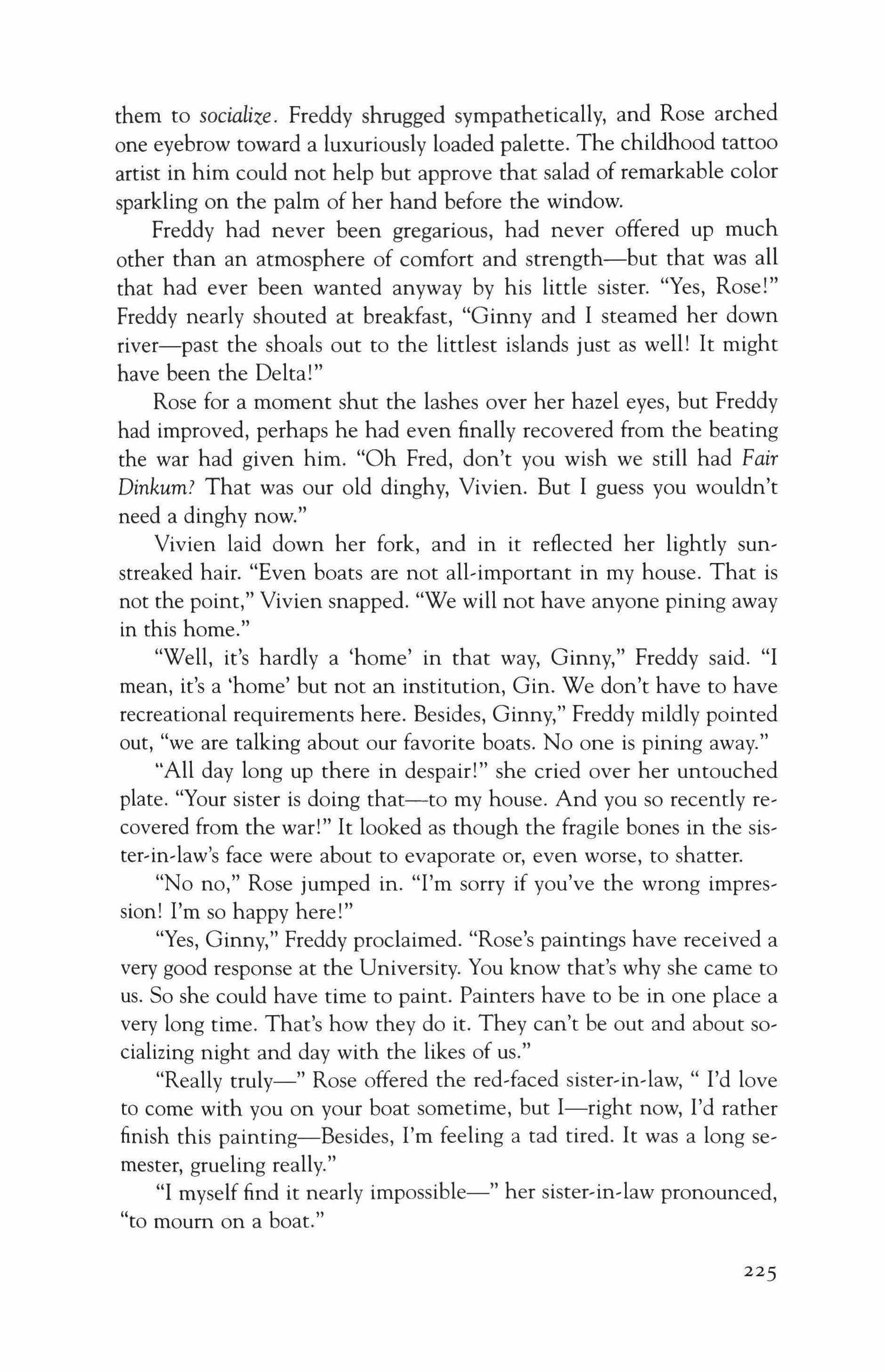
them to socialize. Freddy shrugged sympathetically, and Rose arched one eyebrow toward a luxuriously loaded palette. The childhood tattoo artist in him could not help but approve that salad of remarkable color sparkling on the palm of her hand before the window.
Freddy had never been gregarious, had never offered up much other than an atmosphere of comfort and strength-but that was all that had ever been wanted anyway by his little sister. "Yes, Rose!" Freddy nearly shouted at breakfast, "Ginny and I steamed her down river-past the shoals out to the littlest islands just as well! It might have been the Delta!"
Rose for a moment shut the lashes over her hazel eyes, but Freddy had improved, perhaps he had even finally recovered from the beating the war had given him. "Oh Fred, don't you wish we still had Fair Dinkum? That was our old dinghy, Vivien. But I guess you wouldn't need a dinghy now."
Vivien laid down her fork, and in it reflected her lightly sunstreaked hair. "Even boats are not all-important in my house. That is not the point," Vivien snapped. "We will not have anyone pining away in this home."
"Well, it's hardly a 'home' in that way, Ginny," Freddy said. "I mean, it's a 'home' but not an institution, Gin. We don't have to have recreational requirements here. Besides, Ginny," Freddy mildly pointed out, "we are talking about our favorite boats. No one is pining away."
"All day long up there in despair!" she cried over her untouched plate. "Your sister is doing that-to my house. And you so recently recovered from the war!" It looked as though the fragile bones in the sister-m-law's face were about to evaporate or, even worse, to shatter.
"No no," Rose jumped in. "I'm sorry if you've the wrong impression! I'm so happy here!"
"Yes, Ginny," Freddy proclaimed. "Rose's paintings have received a very good response at the University. You know that's why she came to us. So she could have time to paint. Painters have to be in one place a very long time. That's how they do it. They can't be out and about socializing night and day with the likes of us."
"Really truly-" Rose offered the red-faced sister-in-law, " I'd love to come with you on your boat sometime, but I-right now, I'd rather finish this painting-Besides, I'm feeling a tad tired. It was a long semester, grueling really."
"I myself find it nearly impossible-" her sister-in-law pronounced, "to mourn on a boat."
225

"Here here," Freddy agreed, and he lifted up his glass. "There is no one who will agree with you on that subject more than the two of us old salty dogs, isn't that so, Rose-girl?"
"Why, it is!" Rose nearly jumped up to say it in time, before another tear might clatter down onto the new bride's mottled cheek. "It is certainly the truest thing you can say about us, except," she said, "for one thing."
"What's that?" the married couple asked hesitantly.
"I find it impossible to mourn when 1 paint, I find it even more elevating than water, if you see what I mean."
At which point, her brother who loved water more than anything, other perhaps than his brand new bride, stared at her uncomprehendingly. "Better than water?" he pondered. "Better than water indeed?" Rose could see him rubbing the spot on his belly now with one fingertip. That would be the one, Rose was thinking, where the piece of shrapnel had entered in and left a glossy starfish.
"I don't think it would hurt Rose to be sociable once or twice a day," Vivien sniffed, tipping her spoon into the depths of her cup, ladling up a bit of tea, and staring at it meaninglessly. "It is our house, isn't it? Freddy, well, isn't it?"
"But, Gin," her brother said, "she's socializing now. She socializes with us at least three times a day."
To the siblings' astonishment then, the one regularly called Ginny put her freckled face down into her pastel flowered napkin and cried, "That is not socializing! That is not socializing!"
"All right! All right!" her brother's big bass tones erupted then, as much in trepidation as anything. But to all three of them, especially to Freddy himself, surely it sounded more like anger had erupted from his throat. "I'm certain that Rose will agree, Ginny! to coming to the boat-even today! if you insist. Won't you, Rose? Won't you please come to the boat today to make Ginny happy just this once?"
"Of course!" Rose announced immediately. "I had no idea it was such an issue. 1 can't see quite what it might mean." With which, she excused herself and went immediately to her room and lay steaming and ridiculously afloat in her sister-in-law's former marriage bed.
Just then, Freddy popped his puppy dog head in again, feeling even more self-conscious. ''There, don't be mad. You don't really love painting better than water, do you? Oh never mind, you always were completely odd. Even when you were a baby. Although, you always were a good sport. I remember some tattoos you managed to wear to school
226
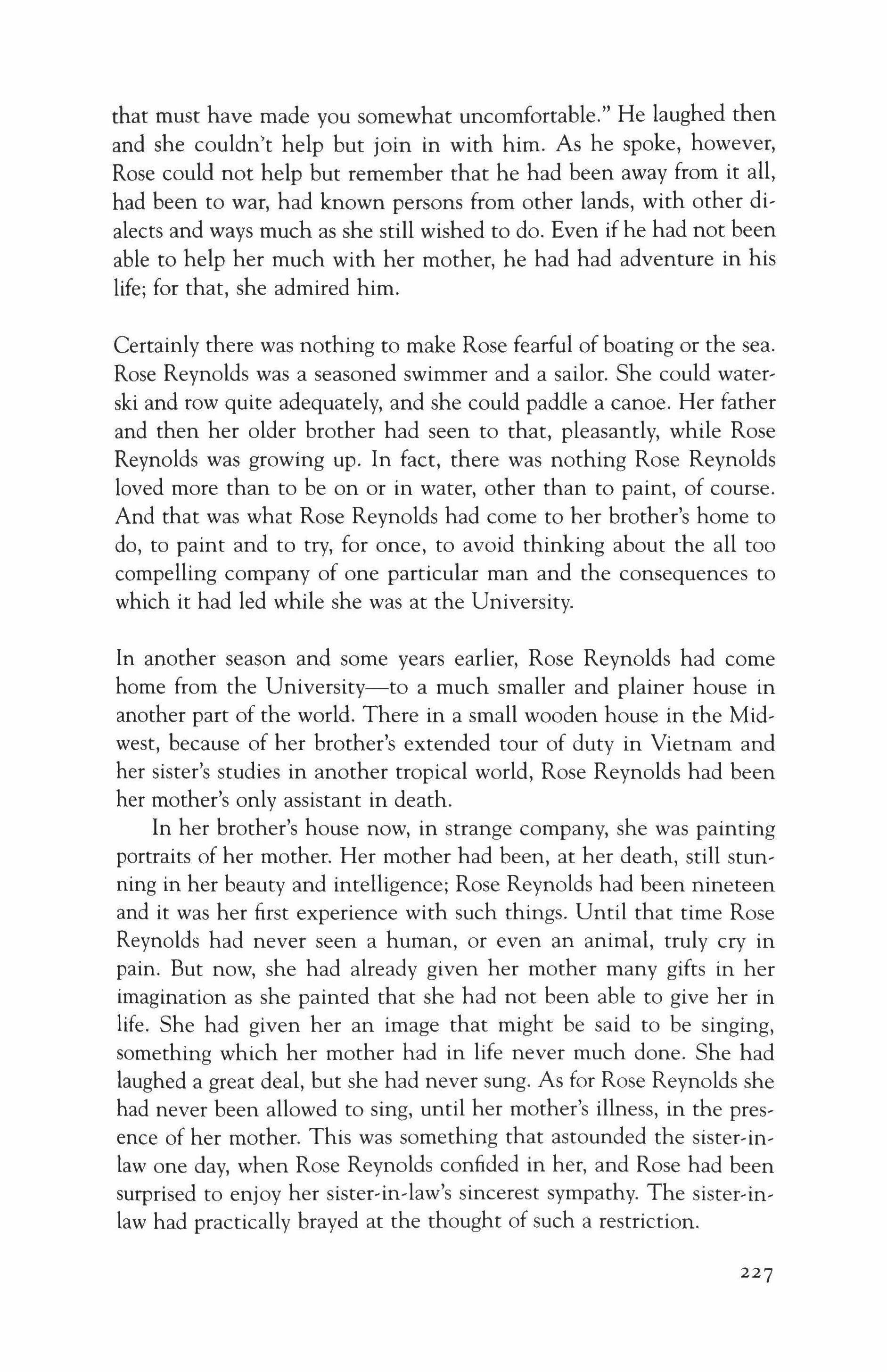
that must have made you somewhat uncomfortable." He laughed then and she couldn't help but join in with him. As he spoke, however, Rose could not help but remember that he had been away from it all, had been to war, had known persons from other lands, with other dialects and ways much as she still wished to do. Even if he had not been able to help her much with her mother, he had had adventure in his life; for that, she admired him.
Certainly there was nothing to make Rose fearful of boating or the sea. Rose Reynolds was a seasoned swimmer and a sailor. She could waterski and row quite adequately, and she could paddle a canoe. Her father and then her older brother had seen to that, pleasantly, while Rose Reynolds was growing up. In fact, there was nothing Rose Reynolds loved more than to be on or in water, other than to paint, of course. And that was what Rose Reynolds had come to her brother's home to do, to paint and to try, for once, to avoid thinking about the all too compelling company of one particular man and the consequences to which it had led while she was at the University.
In another season and some years earlier, Rose Reynolds had come home from the University-to a much smaller and plainer house in another part of the world. There in a small wooden house in the Midwest, because of her brother's extended tour of duty in Vietnam and her sister's studies in another tropical world, Rose Reynolds had been her mother's only assistant in death.
In her brother's house now, in strange company, she was painting portraits of her mother. Her mother had been, at her death, still stunning in her beauty and intelligence; Rose Reynolds had been nineteen and it was her first experience with such things. Until that time Rose Reynolds had never seen a human, or even an animal, truly cry in pain. But now, she had already given her mother many gifts in her imagination as she painted that she had not been able to give her in life. She had given her an image that might be said to be singing, something which her mother had in life never much done. She had laughed a great deal, but she had never sung. As for Rose Reynolds she had never been allowed to sing, until her mother's illness, in the presence of her mother. This was something that astounded the sister-inlaw one day, when Rose Reynolds confided in her, and Rose had been surprised to enjoy her sister-in-law's sincerest sympathy. The sister-inlaw had practically brayed at the thought of such a restriction.
227
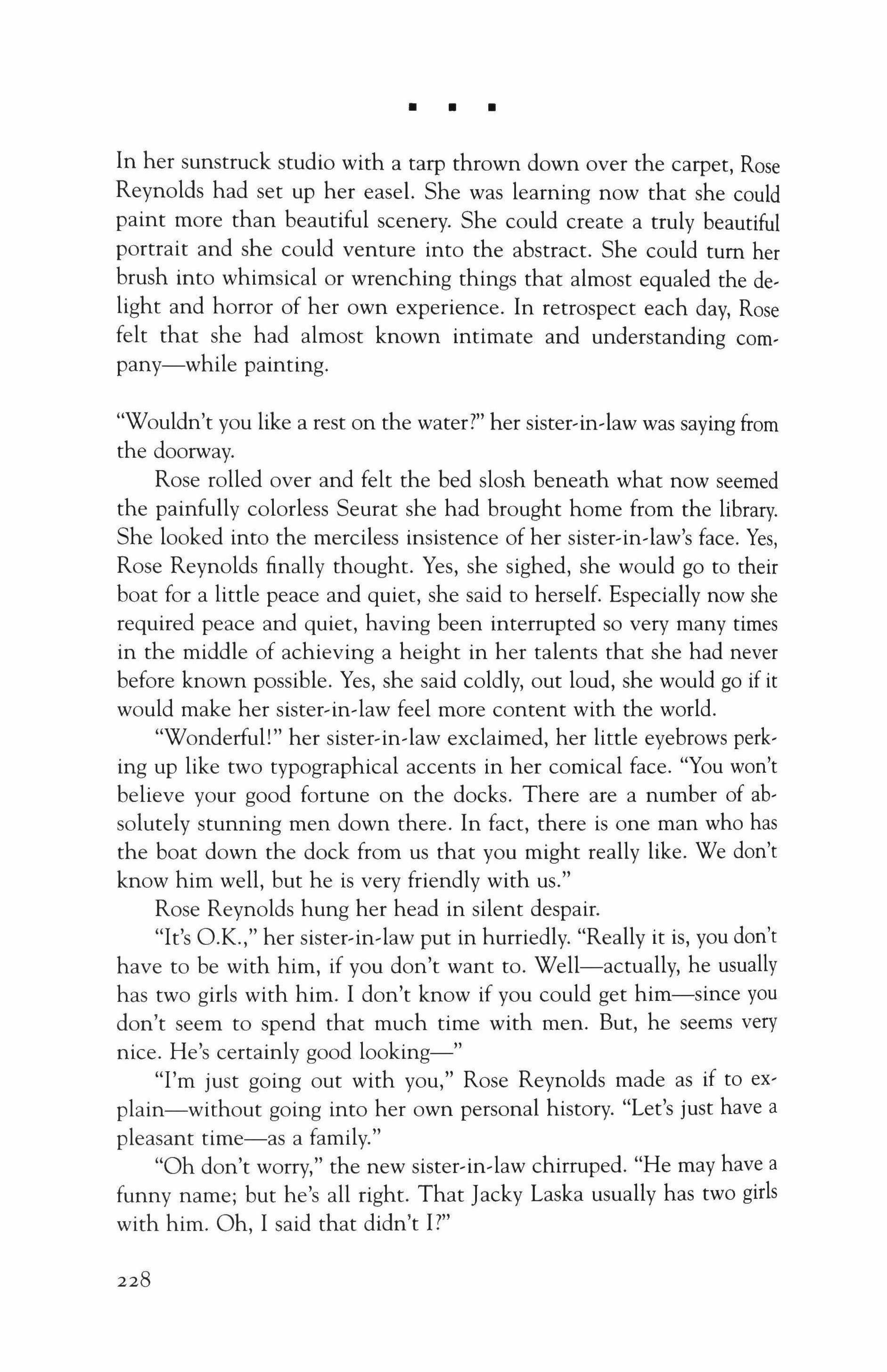
In her sunstruck studio with a tarp thrown down over the carpet, Rose Reynolds had set up her easel. She was learning now that she could paint more than beautiful scenery. She could create a truly beautiful portrait and she could venture into the abstract. She could tum her brush into whimsical or wrenching things that almost equaled the delight and horror of her own experience. In retrospect each day, Rose felt that she had almost known intimate and understanding company-while painting.
"Wouldn't you like a rest on the water!" her sister-in-law was saying from the doorway.
Rose rolled over and felt the bed slosh beneath what now seemed the painfully colorless Seurat she had brought home from the library. She looked into the merciless insistence of her sister-in-law's face. Yes, Rose Reynolds finally thought. Yes, she sighed, she would go to their boat for a little peace and quiet, she said to herself. Especially now she required peace and quiet, having been interrupted so very many times in the middle of achieving a height in her talents that she had never before known possible. Yes, she said coldly, out loud, she would go if it would make her sister-in-law feel more content with the world.
"Wonderful!" her sister-in-law exclaimed, her little eyebrows perking up like two typographical accents in her comical face. "You won't believe your good fortune on the docks. There are a number of absolutely stunning men down there. In fact, there is one man who has the boat down the dock from us that you might really like. We don't know him well, but he is very friendly with us."
Rose Reynolds hung her head in silent despair.
"It's O.K.," her sister-in-law put in hurriedly. "Really it is, you don't have to be with him, if you don't want to. Well-actually, he usually has two girls with him. I don't know if you could get him-since you don't seem to spend that much time with men. But, he seems very nice. He's certainly good looking-"
"I'm just going out with you," Rose Reynolds made as if to explain-without going into her own personal history. "Let's just have a pleasant time-as a family."
"Oh don't worry," the new sister-in-law chirruped. "He may have a funny name; but he's all right. That Jacky Laska usually has two girls with him. Oh, I said that didn't I?"
• •
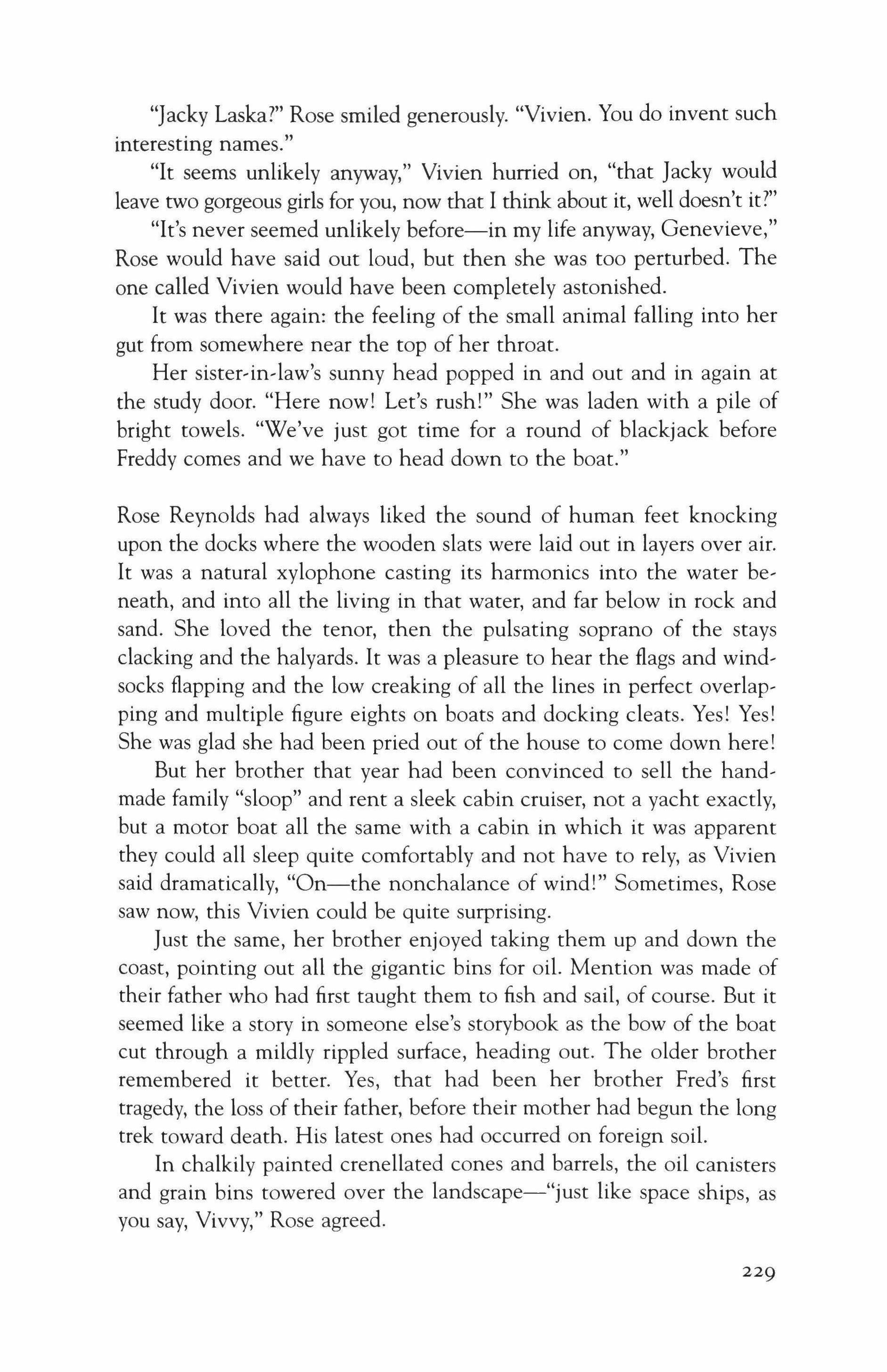
"Jacky Laska?" Rose smiled generously. "Vivien. You do invent such interesting names."
"It seems unlikely anyway," Vivien hurried on, "that Jacky would leave two gorgeous girls for you, now that I think about it, well doesn't it?"
"It's never seemed unlikely before-in my life anyway, Genevieve," Rose would have said out loud, but then she was too perturbed. The one called Vivien would have been completely astonished.
It was there again: the feeling of the small animal falling into her gut from somewhere near the top of her throat.
Her sister-in-law's sunny head popped in and out and in again at the study door. "Here now! Let's rush!" She was laden with a pile of bright towels. "We've just got time for a round of blackjack before Freddy comes and we have to head down to the boat."
Rose Reynolds had always liked the sound of human feet knocking upon the docks where the wooden slats were laid out in layers over air. It was a natural xylophone casting its harmonics into the water beneath, and into all the living in that water, and far below in rock and sand. She loved the tenor, then the pulsating soprano of the stays clacking and the halyards. It was a pleasure to hear the flags and windsocks flapping and the low creaking of all the lines in perfect overlapping and multiple figure eights on boats and docking cleats. Yes! Yes! She was glad she had been pried out of the house to come down here!
But her brother that year had been convinced to sell the handmade family "sloop" and rent a sleek cabin cruiser, not a yacht exactly, but a motor boat all the same with a cabin in which it was apparent they could all sleep quite comfortably and not have to rely, as Vivien said dramatically, "On-the nonchalance of wind!" Sometimes, Rose saw now, this Vivien could be quite surprising.
Just the same, her brother enjoyed taking them up and down the coast, pointing out all the gigantic bins for oil. Mention was made of their father who had first taught them to fish and sail, of course. But it seemed like a story in someone else's storybook as the bow of the boat cut through a mildly rippled surface, heading out. The older brother remembered it better. Yes, that had been her brother Fred's first tragedy, the loss of their father, before their mother had begun the long trek toward death. His latest ones had occurred on foreign soil.
In chalkily painted crenellated cones and barrels, the oil canisters and grain bins towered over the landscape-"just like space ships, as you say, Vivvy," Rose agreed.
229
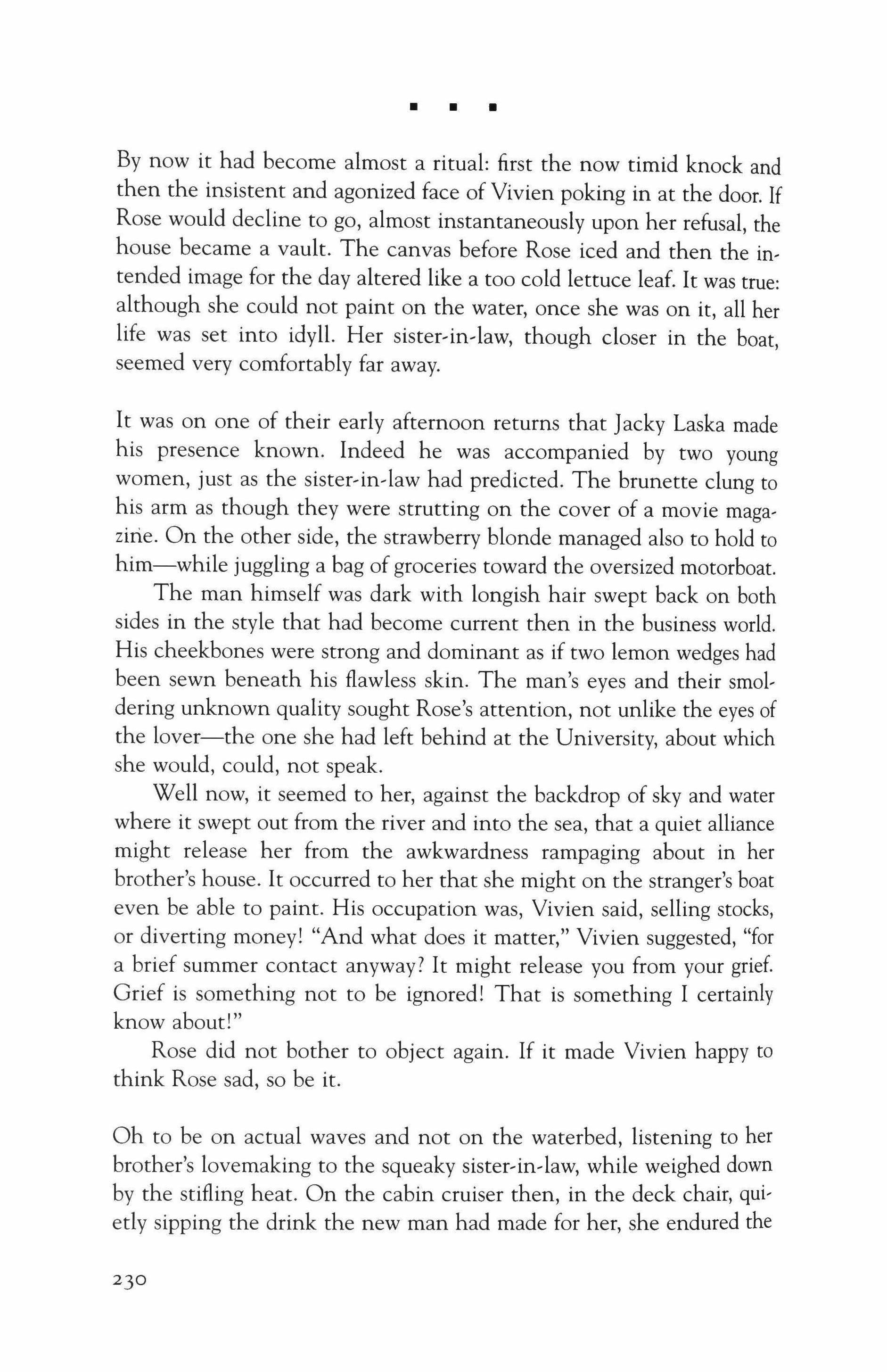
By now it had become almost a ritual: first the now timid knock and then the insistent and agonized face of Vivien poking in at the door. If Rose would decline to go, almost instantaneously upon her refusal, the house became a vault. The canvas before Rose iced and then the intended image for the day altered like a too cold lettuce leaf. It was true: although she could not paint on the water, once she was on it, all her life was set into idyll. Her sister-in-law, though closer in the boat, seemed very comfortably far away.
It was on one of their early afternoon returns that Jacky Laska made his presence known. Indeed he was accompanied by two young women, just as the sister-in-law had predicted. The brunette clung to his arm as though they were strutting on the cover of a movie magazirie. On the other side, the strawberry blonde managed also to hold to him-while juggling a bag of groceries toward the oversized motorboat.
The man himself was dark with longish hair swept back on both sides in the style that had become current then in the business world. His cheekbones were strong and dominant as if two lemon wedges had been sewn beneath his flawless skin. The man's eyes and their smoldering unknown quality sought Rose's attention, not unlike the eyes of the lover-the one she had left behind at the University, about which she would, could, not speak.
Well now, it seemed to her, against the backdrop of sky and water where it swept out from the river and into the sea, that a quiet alliance might release her from the awkwardness rampaging about in her brother's house. It occurred to her that she might on the stranger's boat even be able to paint. His occupation was, Vivien said, selling stocks, or diverting money! "And what does it matter," Vivien suggested, "for a brief summer contact anyway? It might release you from your grief. Grief is something not to be ignored! That is something I certainly know about!"
Rose did not bother to object again. If it made Vivien happy to think Rose sad, so be it.
Oh to be on actual waves and not on the waterbed, listening to her brother's lovemaking to the squeaky sister-in-law, while weighed down by the stifling heat. On the cabin cruiser then, in the deck chair, quietly sipping the drink the new man had made for her, she endured the
•
23°
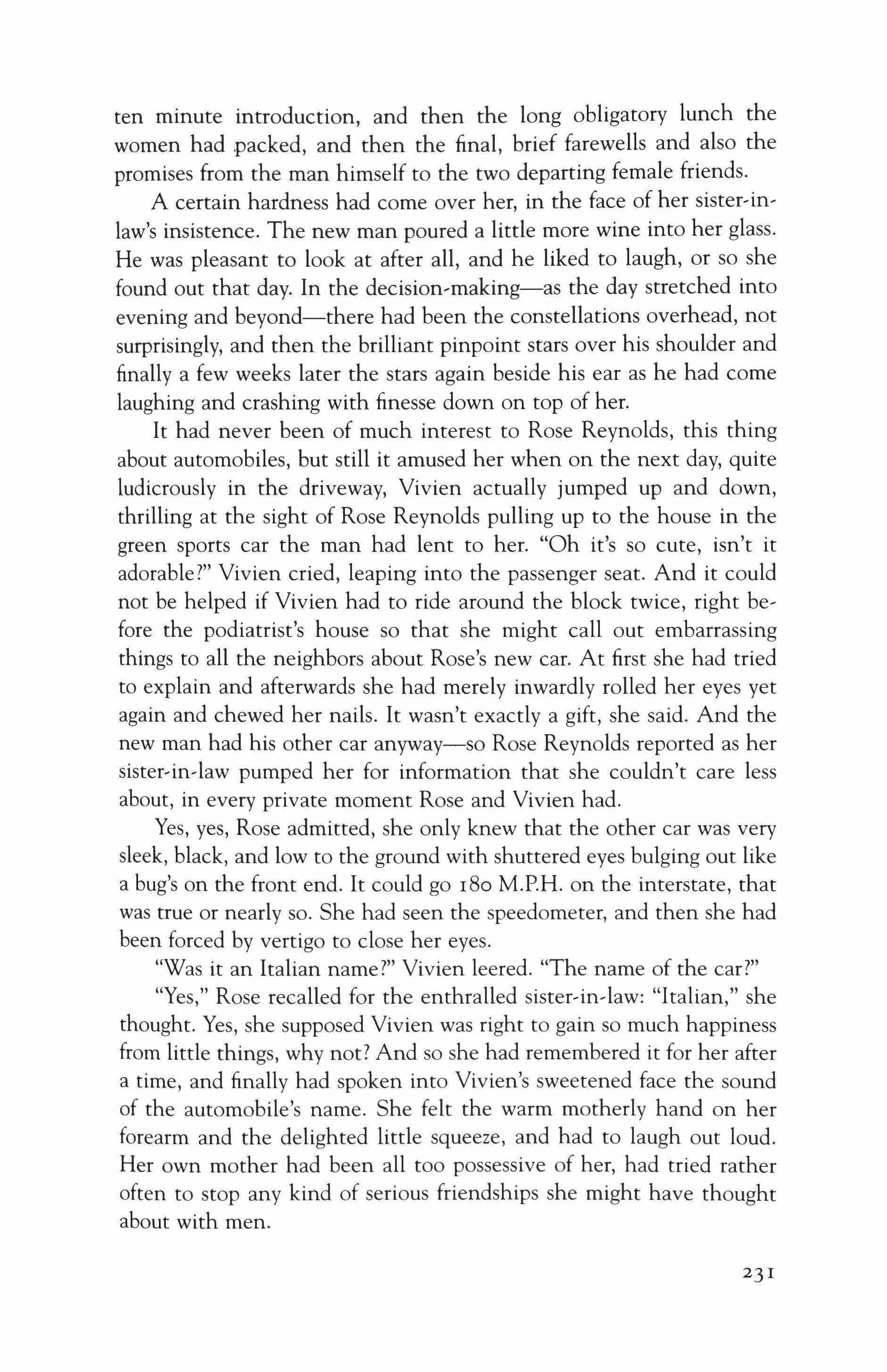
ten minute introduction, and then the long obligatory lunch the women had .packed, and then the final, brief farewells and also the promises from the man himself to the two departing female friends.
A certain hardness had come over her, in the face of her sister-inlaw's insistence. The new man poured a little more wine into her glass. He was pleasant to look at after all, and he liked to laugh, or so she found out that day. In the decision-making-as the day stretched into evening and beyond-there had been the constellations overhead, not surprisingly, and then the brilliant pinpoint stars over his shoulder and finally a few weeks later the stars again beside his ear as he had come laughing and crashing with finesse down on top of her.
It had never been of much interest to Rose Reynolds, this thing about automobiles, but still it amused her when on the next day, quite ludicrously in the driveway, Vivien actually jumped up and down, thrilling at the sight of Rose Reynolds pulling up to the house in the green sports car the man had lent to her. "Oh it's so cute, isn't it adorable?" Vivien cried, leaping into the passenger seat. And it could not be helped if Vivien had to ride around the block twice, right before the podiatrist's house so that she might call out embarrassing things to all the neighbors about Rose's new car. At first she had tried to explain and afterwards she had merely inwardly rolled her eyes yet again and chewed her nails. It wasn't exactly a gift, she said. And the new man had his other car anyway-so Rose Reynolds reported as her sister-in-law pumped her for information that she couldn't care less about, in every private moment Rose and Vivien had.
Yes, yes, Rose admitted, she only knew that the other car was very sleek, black, and low to the ground with shuttered eyes bulging out like a bug's on the front end. It could go 180 M.P.H. on the interstate, that was true or nearly so. She had seen the speedometer, and then she had been forced by vertigo to close her eyes.
"Was it an Italian name?" Vivien leered. "The name of the car?"
"Yes," Rose recalled for the enthralled sister-in-law: "Italian," she thought. Yes, she supposed Vivien was right to gain so much happiness from little things, why not? And so she had remembered it for her after a time, and finally had spoken into Vivien's sweetened face the sound of the automobile's name. She felt the warm motherly hand on her forearm and the delighted little squeeze, and had to laugh out loud. Her own mother had been all too possessive of her, had tried rather often to stop any kind of serious friendships she might have thought about with men.
231

Still neither mother nor daughter would have cared much for Jacky Laska, nor his cars, this Rose already knew, but it was neither his clothes nor his looks that set him apart.
It was true the new man, Jacky Laska, wore always the same kind of clothing. On his tall, lean frame he wore a slightly worn pair of very clean jeans, an expensive deep blue knit shirt, loose over his belt, and in cold weather a long, hand-knit, gray Irish sweater with wooden buttons fastened down the front. When he went to work he wore one of several dark gray very well tailored yet loosely fitting suits. His shoes were like small gray mirrors on his feet. His ties and rather long vests, also each one pale gray, were so lovely they were nondescript.
Rose Reynolds froze, first in the living room, trying to remain motionless as Vivien showed her newest forays into redecorating the elegant Tudor house. "You see I've put these carpet tiles on in a kind of pattern. I didn't have enough of either color so I've made a sort of quilt on the top of each chest. It's all very mod. What do you think?"
All the words drained out of Rose in disbelief as the blood rushed in a fury to her face. Vivien had affixed, with a fast-drying permanent glue, pieces of red and black shag-carpeting to the tops of the three fine antique walnut and cherry bureaus her mother had refinished with Rose's help not that many years before.
Abruptly Rose closed her mouth and crossed her arms over her chest as if she'd been trussed. The sister-in-law took hold of her and led her into another of the large high-ceilinged rooms, now to witness another of her works. "You see," Vivien was saying, "you're not the only creative person here."
Actual tears were forming at the back of Rose Reynolds' throat and a few were moving toward her eyes, for there stood the small, perfect, handmade, wooden chest, their favorite, that she and her mother had labored over so long, sanding the top and all the wooden key holes with fine papers and tooth brushes, and then applying the many coats of protection to it. There stood the perfect chest with the red and black shag carpeting standing like frightened cartoon hair straight up on the top of it.
Vivien put her arm around her now, emanating warmth. "I'm so glad you're happy these days," she said. "You deserve to be happy, you know. You've done so much for everyone. And you're so much fun when you come out of your cave."
In a daze, Rose Reynolds felt the freckled sister-in-law link her arm
232
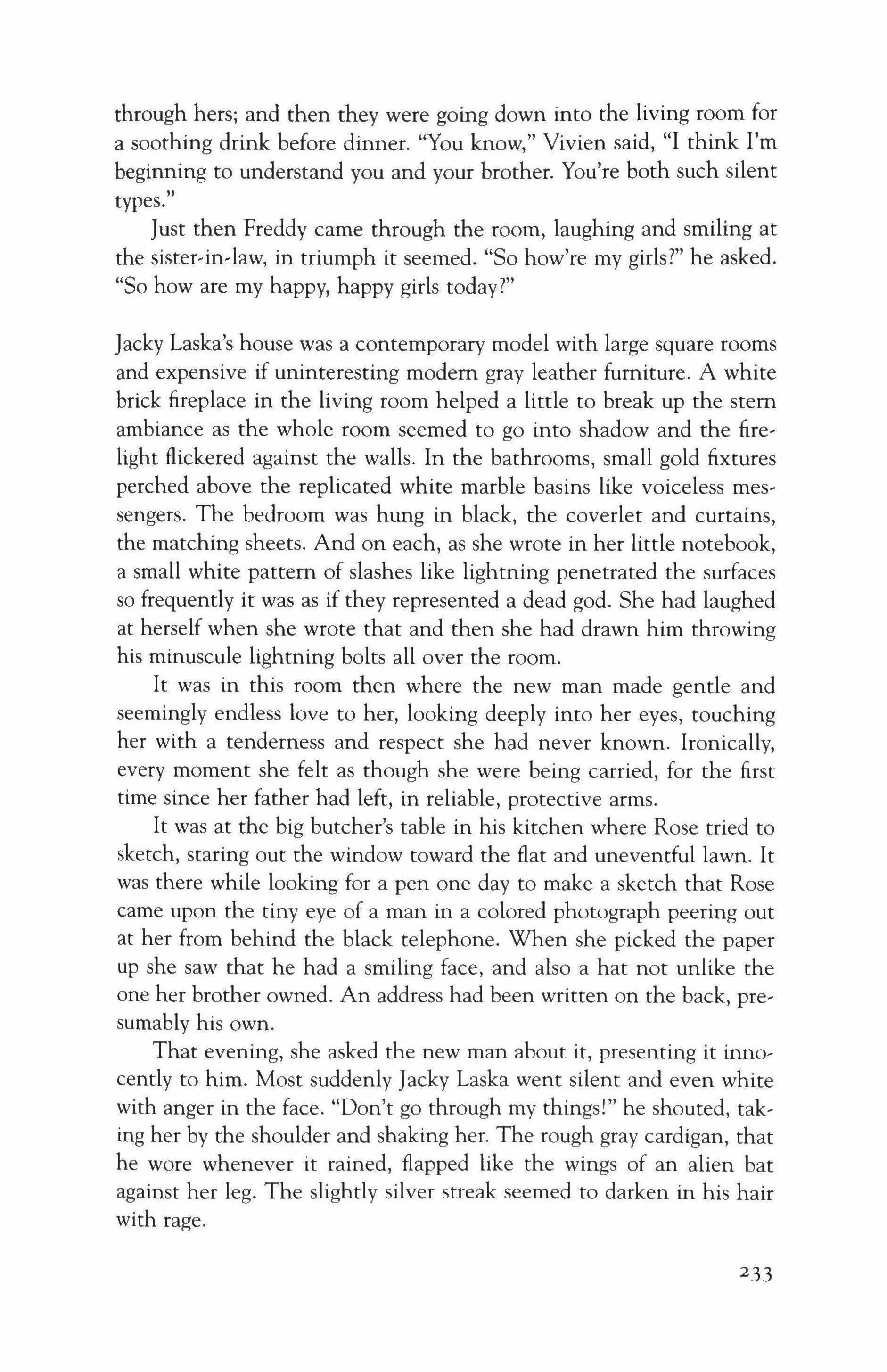
through hers; and then they were going down into the living room for a soothing drink before dinner. "You know," Vivien said, "I think I'm beginning to understand you and your brother. You're both such silent types."
Just then Freddy came through the room, laughing and smiling at the sister-in-law, in triumph it seemed. "So how're my girls?" he asked. "So how are my happy, happy girls today?"
Jacky Laska's house was a contemporary model with large square rooms and expensive if uninteresting modem gray leather furniture. A white brick fireplace in the living room helped a little to break up the stem ambiance as the whole room seemed to go into shadow and the firelight flickered against the walls. In the bathrooms, small gold fixtures perched above the replicated white marble basins like voiceless messengers. The bedroom was hung in black, the coverlet and curtains, the matching sheets. And on each, as she wrote in her little notebook, a small white pattern of slashes like lightning penetrated the surfaces so frequently it was as if they represented a dead god. She had laughed at herself when she wrote that and then she had drawn him throwing his minuscule lightning bolts all over the room.
It was in this room then where the new man made gentle and seemingly endless love to her, looking deeply into her eyes, touching her with a tenderness and respect she had never known. Ironically, every moment she felt as though she were being carried, for the first time since her father had left, in reliable, protective arms.
It was at the big butcher's table in his kitchen where Rose tried to sketch, staring out the window toward the flat and uneventful lawn. It was there while looking for a pen one day to make a sketch that Rose came upon the tiny eye of a man in a colored photograph peering out at her from behind the black telephone. When she picked the paper up she saw that he had a smiling face, and also a hat not unlike the one her brother owned. An address had been written on the back, presumably his own.
That evening, she asked the new man about it, presenting it innocently to him. Most suddenly Jacky Laska went silent and even white with anger in the face. "Don't go through my things!" he shouted, taking her by the shoulder and shaking her. The rough gray cardigan, that he wore whenever it rained, flapped like the wings of an alien bat against her leg. The slightly silver streak seemed to darken in his hair with rage.
233

"I wasn't!" she cried out at him. "It fell out from beside the telephone! Why would you leave it out, if you didn't mean for me to see 7"it.
Jacky Laska stroked her hair, very gently then, placing a long strand of it in her mouth with his fingertips and running it between her teeth and over her wet lips. This he did again and again then wiped her eyes with his slightly roughened hands. He put the photograph into his breast pocket. "It's all right," he said, offering her a glass of water. He crouched down in front of her where she sat in the kitchen window seat beneath the large open wooden shutters. "I'm sorry; I'm a little jumpy now. We have a meeting coming up. Just business, but it always makes me worry when we have a new account. Maybe we should go down to the boat and cool off for tonight." That night they slept again in his boat, rocking ever so peacefully against a different shoal.
When the two weeks until the meeting had passed, she asked him about it again. "Oh," he said, "it went fine. Nothing to it. Easy as pie. Let's go down to the club." She never again asked him about the man who had reminded her of her own brother, and soon the incident had passed from her mind.
There was such a feeling of acceptance in the household now with her sister-in-law's camaraderie and intense interest in everything Rose Reynolds had done and said. It was almost as if Georgia were back again. Her brother smiled to see them so happy together now. "Less is sometimes more," the brother said, whatever that was supposed to mean.
The house vibrated with the pair of women, chattering together, and planning small encounters in the clothing stores in preparation for summer parties and rendezvous. Rose Reynolds had never felt so ratified in a family life, even if it was an entirely different Rose Reynolds being supported here. She was doing very little drawing or painting now. Every night she was sitting at the bow of Jacky's boat, knees drawn up, arms wrapped around her slacks, the sea breeze sweeping her long dark hair back from her face. Life tingled up and down her arms, and the spiked stars shown as if they always would at the crown of her head.
It was the dancing she loved the most, after the water, of course. In the club, he had swept her along to the beat, and there she rubbed the bright red sweater that her sister-in-law had given her to wear for color against his chest.
234

She would never love anything more than water, she thought. There was a small crowd of friends now who beached their boats on the sandbar several nights a week, laughing and singing around the driftwood fire. And Rose Reynolds was singing for the first time in her life, openly, if in a crowd, without fear of being told to stop.
In the early August heat, Rose Reynolds grew irritable with the predictability of him. Even the manner with which the lover ate annoyed her now, and how he deleted certain syllables when he spoke, how he patted her endlessly when other men tried to engage them in conversation. To make it worse, he ate what Rose Reynolds considered to be junk food. And most offensive of all things: he insisted on throwing his beer cans overboard. That was reprehensible, she thought. She had chided him more than once; but the next morning after a particularly difficult encounter, finally she had acquiesced and agreed to make up with him and go to the fast food place as a kind of compromise. She was very hungry and there was a fondness for the familiar tastes of the hamburgers, the French fries and particularly the chocolate shakes from when she with her family had traveled across the plains. She was telling him about a concert of computer music she had heard at the University with a young doctor the autumn before, when Jacky Laska pulled them into the parking lot of the franchise shop with all its golden flashing lights.
"People felt the same way about the synthesizer and the organ before that," she said. "Even the harpsichord, with its remote plucking of strings must have seemed bizarre after the lute."
"I've nothing against the computer," Jacky said, getting out of the low black car and walking with her across the parking lot. "Makes things easier for me. I plan to learn all the tricks. Here," the lover said, "put this in your purse," with which he pulled from beneath his shirt a revolver where it had been tucked against the skin of his abdomen and into his belt. Stunned, Rose opened the top of her bag, just as he had said to do, and felt the weight of the instrument falling between her thumbs. When it hit the bottom of her purse she felt it bounce against her belly, rebounding rather naturally against her womb.
There the gun must have rested all day, for she didn't care to think of it until she was home again, safely in her brother's house and lying in the waterbed, reliving the moments of the day. And no! She must have dreamed it-had he put an actual gun in her purse? At once she rose up and looked into the bag where it rested harmlessly on the chair
235
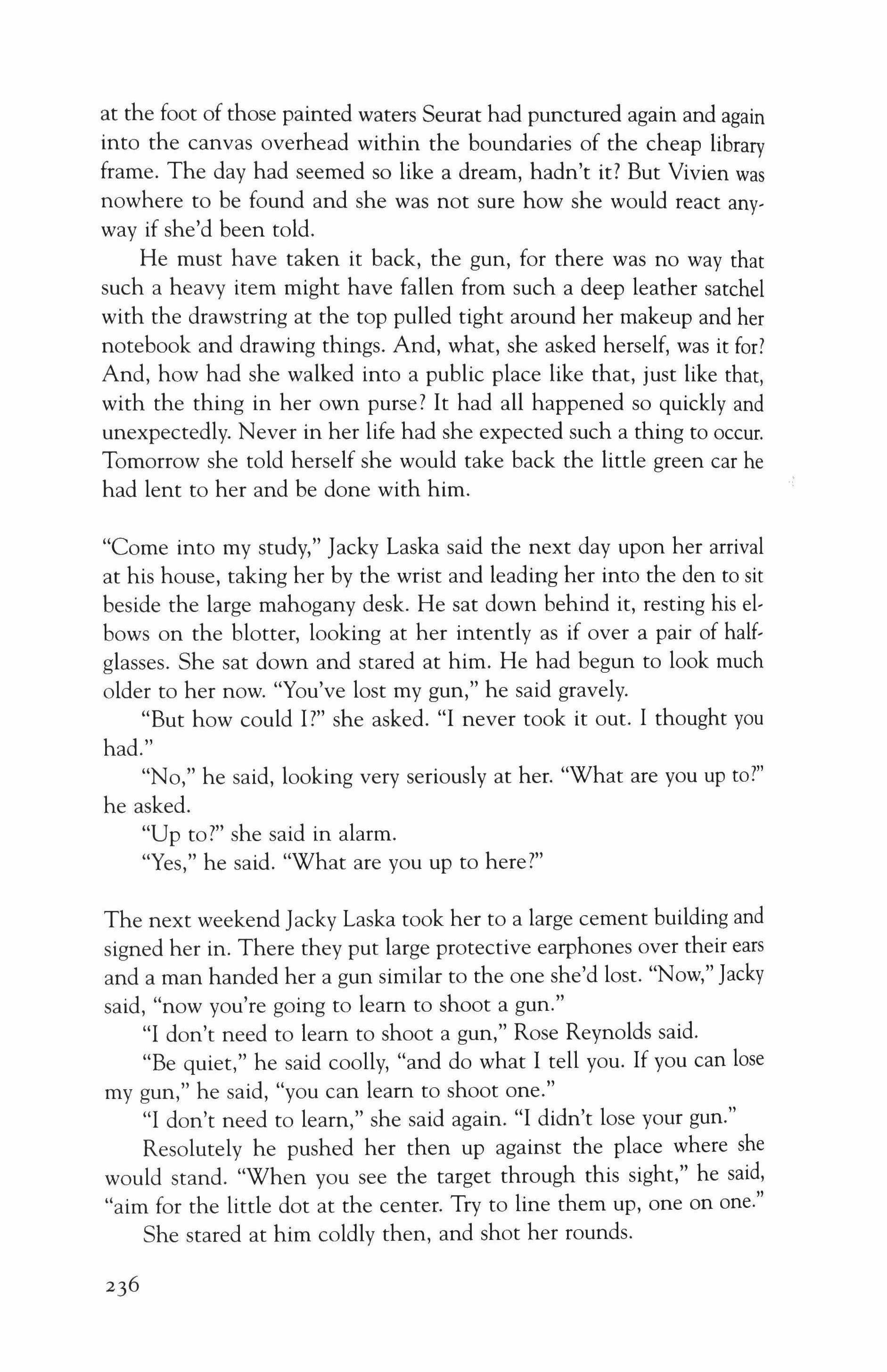
at the foot of those painted waters Seurat had punctured again and again into the canvas overhead within the boundaries of the cheap library frame. The day had seemed so like a dream, hadn't it? But Vivien was nowhere to be found and she was not sure how she would react anyway if she'd been told.
He must have taken it back, the gun, for there was no way that such a heavy item might have fallen from such a deep leather satchel with the drawstring at the top pulled tight around her makeup and her notebook and drawing things. And, what, she asked herself, was it for?
And, how had she walked into a public place like that, just like that, with the thing in her own purse? It had all happened so quickly and unexpectedly. Never in her life had she expected such a thing to occur. Tomorrow she told herself she would take back the little green car he had lent to her and be done with him.
"Come into my study," Jacky Laska said the next day upon her arrival at his house, taking her by the wrist and leading her into the den to sit beside the large mahogany desk. He sat down behind it, resting his elbows on the blotter, looking at her intently as if over a pair of halfglasses. She sat down and stared at him. He had begun to look much older to her now. "You've lost my gun," he said gravely.
"But how could I?" she asked. "I never took it out. I thought you had."
"No," he said, looking very seriously at her. "What are you up to?" he asked.
"Up to?" she said in alarm.
"Yes," he said. "What are you up to here?"
The next weekend Jacky Laska took her to a large cement building and signed her in. There they put large protective earphones over their ears and a man handed her a gun similar to the one she'd lost. "Now," Jacky said, "now you're going to learn to shoot a gun."
"I don't need to learn to shoot a gun," Rose Reynolds said.
"Be quiet," he said coolly, "and do what I tell you. If you can lose my gun," he said, "you can learn to shoot one."
"I don't need to learn," she said again. "I didn't lose your gun."
Resolutely he pushed her then up against the place where she would stand. "When you see the target through this sight," he said, "aim for the little dot at the center. Try to line them up, one on one." She stared at him coldly then, and shot her rounds.

When the target came back to them, Jacky Laska looked at her.
"I told you I didn't have to learn," she said.
"Who taught you to fire a gun?" he demanded, as if someone had stolen something from him.
"My mother," Rose Reynolds said. "My mother was an excellent shot with a rifle, and a revolver. Her grandfather taught her." Still he stared at her.
"It's not such a big deal, you know." She glared at him, in more ways than one. "I think I'd like you to give me a ride home now," she said. "I'd rather not take your car."
He took hold of her chin and looked deep into her eyes. "I don't think I'd like that terribly much," he said. "Besides I've promised us to Al."
"You've promised us?"
"Yes," he said. "You'll see."
Later that day they took the cabin cruiser out to meet his friends at the island beach. The boat, plowing through the waves, seemed both small and large at once. On shore, while he had his meetings, she gathered driftwood for the fire, and then she spread out the blanket and fell asleep. For many nights now she had been unable to sleep, even before the incident in the hamburger joint, she had been having peculiar dreams about him. She woke, startled, to find his fingers running up and down the sides of her legs. His fingers meandered into her mouth, as he liked to do whenever she tried to speak, his head over her face. Beyond his head the rosehips flowered profusely in a thorny, soft-lipped pink. "I'd like to go home soon," she said. He shook his head and smiled at her, kissing her firmly on the mouth.
"What are you thinking?" he whispered again and again in the almost stifling heat.
But she was thinking of the gun she knew she hadn't lost and another one. Of the cold barrel of it pressed into the back of a young man's throat, a young man her delightful sister-in-law had known quite well, had even married once.
"What are you thinking about me now, my sleepy head?" His weight was heavy on her as he fingered aside the crotch of her swimming suit, and then falling upon her with a single thrust he had lodged himself between her legs. Involuntarily she felt a heat rise up in her chest.
"I asked you what you were thinking?" he said again. For a moment she grappled with the thought that lay somewhere
237

behind the vision of the two microscopic targets in the balls of his eyes. In and out he went, driving her from deep sleep into a speechlessness. "What are you thinking, sweetheart?" he asked again and again.
Hoarsely she whispered it then: "Sudden death."
He closed his eyes and laughed, then opened them again. It was as if his spirit were walking into her by way of her eyes, the two of them riveted together by two solid shafts of current at the head. "Sudden death?" he laughed. "Sometimes I think you are the only person who has ever once understood me in my life." She could feel the swimming suit pulling down, against her will, under her breasts, her nipples hardening in his mouth, between his dry lips. Her legs drew up around him, automatically almost, and she could feel him all along her inner thighs and calves, and in the core of her. "There's so much to live for, my Rose," he said. His hair was silky and limp in her hands. He looked down at her like a child. "Don't ever betray me," he said. "Don't ever hurt me, Rose Reynolds. I don't know what I'd do to you. Promise me that one thing." Gingerly she held his cool buttocks in her hands then and felt him coming in and out of her with a smooth confidence that would never destroy itself.
That night she insisted on sleeping at home again and he managed to let her do as she wished. She slept alone in the waterbed. There she dreamed that he demanded she kill a rat for him at the city dump. "I won't," she said, "I won't," until he put his hand over hers and forced her to pull the trigger for him. The animal, badly hit, rolled over screaming in pain and clawed the air with its small pink childlike feet until she wept into her sister-in-law's pillowcase.
In the very early morning, before anyone else was up, Jacky called to ask yet again whether or not she had found his gun. "No," she told him, "I haven't found it, nor have I lost it." Abruptly she set the phone down into its cradle again. "I'll pick you up at six," he had managed to squeeze in.
"No," she'd said. "Don't." She had begun to think that she might ask her sister-in-law about it-whether or not Vivien had seen the gun. But every time she contemplated mentioning it, a fear came over her: a fear of the repercussive silliness that might follow such a confession. She could well imagine the reaction her brother and sister-in-law would give to hearing that she had been seeing a man who carried a gun in his belt and that she had carried it herself into such a public fast
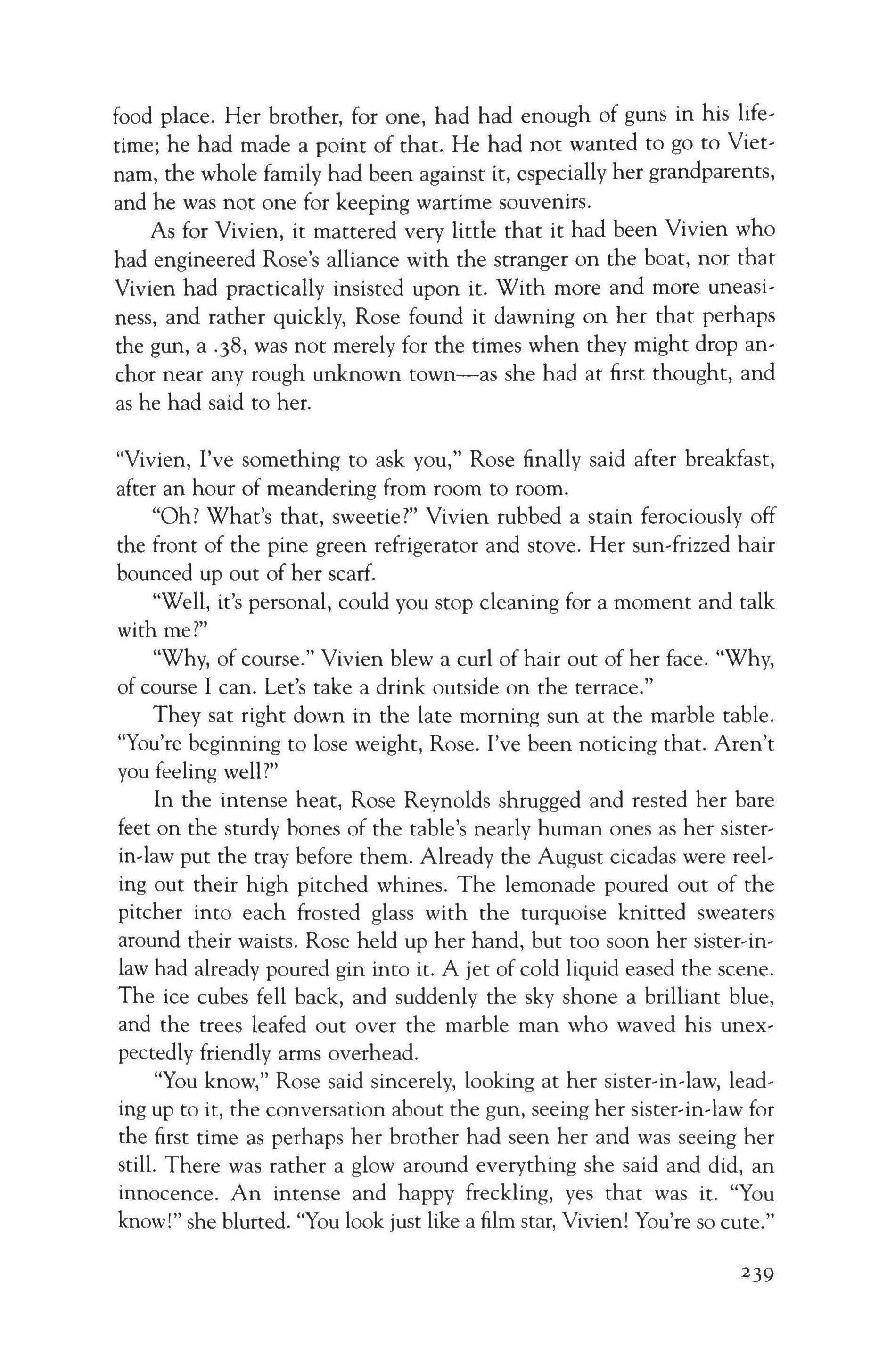
food place. Her brother, for one, had had enough of guns in his lifetime; he had made a point of that. He had not wanted to go to Vietnam, the whole family had been against it, especially her grandparents, and he was not one for keeping wartime souvenirs.
As for Vivien, it mattered very little that it had been Vivien who had engineered Rose's alliance with the stranger on the boat, nor that Vivien had practically insisted upon it. With more and more uneasiness, and rather quickly, Rose found it dawning on her that perhaps the gun, a .38, was not merely for the times when they might drop anchor near any rough unknown town-as she had at first thought, and as he had said to her.
"Vivien, I've something to ask you," Rose finally said after breakfast, after an hour of meandering from room to room.
"Oh? What's that, sweetie?" Vivien rubbed a stain ferociously off the front of the pine green refrigerator and stove. Her sun-frizzed hair bounced up out of her scarf.
"Well, it's personal, could you stop cleaning for a moment and talk with me?"
"Why, of course." Vivien blew a curl of hair out of her face. "Why, of course I can. Let's take a drink outside on the terrace."
They sat right down in the late morning sun at the marble table. "You're beginning to lose weight, Rose. I've been noticing that. Aren't you feeling well?"
In the intense heat, Rose Reynolds shrugged and rested her bare feet on the sturdy bones of the table's nearly human ones as her sisterin-law put the tray before them. Already the August cicadas were reeling out their high pitched whines. The lemonade poured out of the pitcher into each frosted glass with the turquoise knitted sweaters around their waists. Rose held up her hand, but too soon her sister-inlaw had already poured gin into it. A jet of cold liquid eased the scene. The ice cubes fell back, and suddenly the sky shone a brilliant blue, and the trees leafed out over the marble man who waved his unexpectedly friendly arms overhead.
"You know," Rose said sincerely, looking at her sister-in-law, leading up to it, the conversation about the gun, seeing her sister-in-law for the first time as perhaps her brother had seen her and was seeing her still. There was rather a glow around everything she said and did, an innocence. An intense and happy freckling, yes that was it. "You know!" she blurted. "You look just like a film star, Vivien! You're so cute."
239
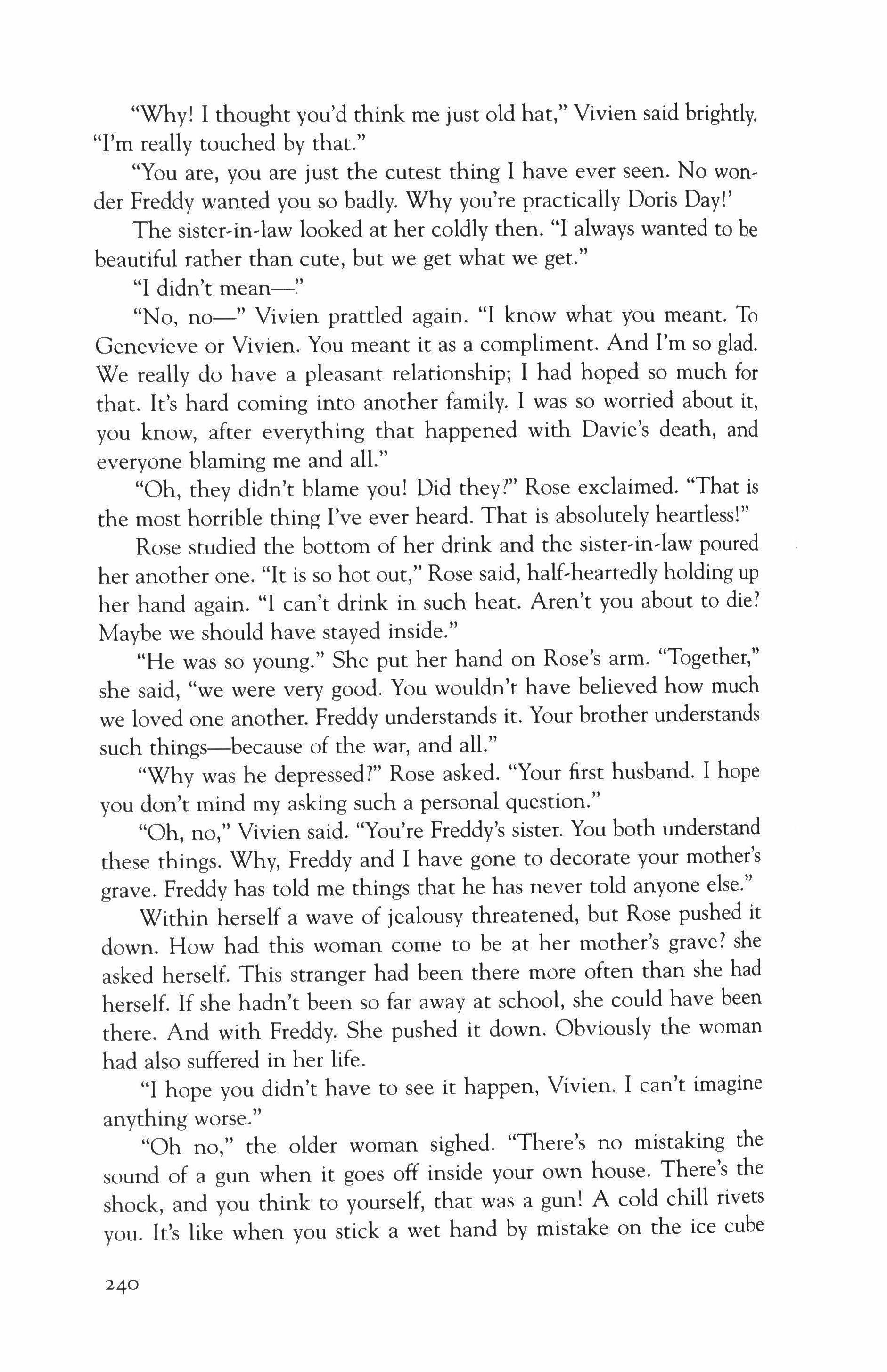
"Why! I thought you'd think me just old hat," Vivien said brightly. "I'm really touched by that."
"You are, you are just the cutest thing I have ever seen. No wonder Freddy wanted you so badly. Why you're practically Doris Day!'
The sister-in-law looked at her coldly then. "I always wanted to be beautiful rather than cute, but we get what we get."
"I didn't mean-"
"No, no-" Vivien prattled again. "I know what you meant. To Genevieve or Vivien. You meant it as a compliment. And I'm so glad. We really do have a pleasant relationship; I had hoped so much for that. It's hard coming into another family. I was so worried about it, you know, after everything that happened with Davie's death, and everyone blaming me and all."
"Oh, they didn't blame you! Did they?" Rose exclaimed. "That is the most horrible thing I've ever heard. That is absolutely heartless!"
Rose studied the bottom of her drink and the sister-in-law poured her another one. "It is so hot out," Rose said, half-heartedly holding up her hand again. "I can't drink in such heat. Aren't you about to die? Maybe we should have stayed inside."
"He was so young." She put her hand on Rose's arm. "Together," she said, "we were very good. You wouldn't have believed how much we loved one another. Freddy understands it. Your brother understands such things-because of the war, and alL"
"Why was he depressed?" Rose asked. "Your first husband. I hope you don't mind my asking such a personal question."
"Oh, no," Vivien said. "You're Freddy's sister. You both understand these things. Why, Freddy and I have gone to decorate your mother's grave. Freddy has told me things that he has never told anyone else."
Within herself a wave of jealousy threatened, but Rose pushed it down. How had this woman come to be at her mother's grave? she asked herself. This stranger had been there more often than she had herself. If she hadn't been so far away at school, she could have been there. And with Freddy. She pushed it down. Obviously the woman had also suffered in her life.
"I hope you didn't have to see it happen, Vivien. I can't imagine anything worse."
"Oh no," the older woman sighed. "There's no mistaking the sound of a gun when it goes off inside your own house. There's the shock, and you think to yourself, that was a gun! A cold chill rivets you. It's like when you stick a wet hand by mistake on the ice cube
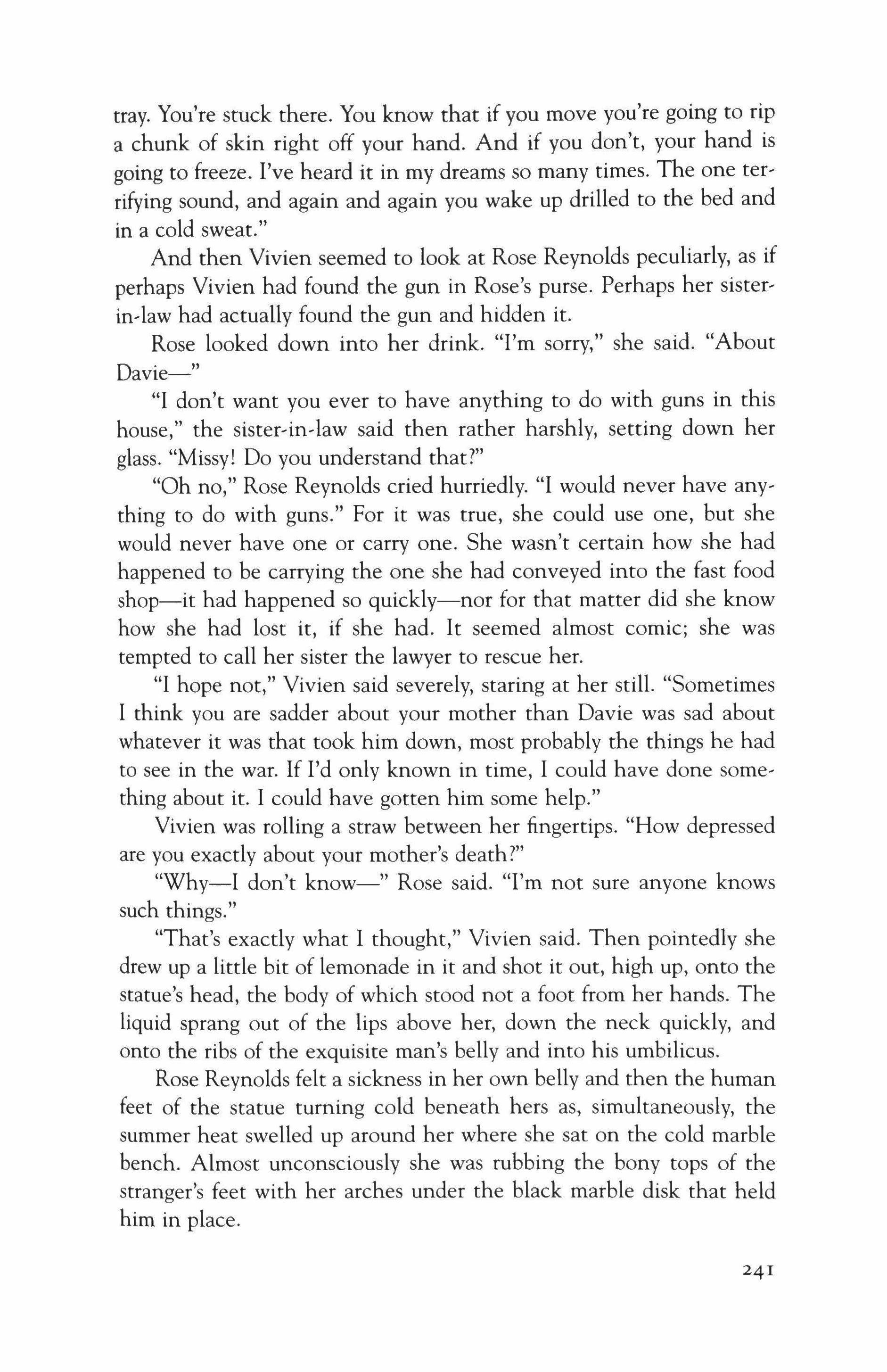
tray. You're stuck there. You know that if you move you're going to rip a chunk of skin right off your hand. And if you don't, your hand is going to freeze. I've heard it in my dreams so many times. The one terrifying sound, and again and again you wake up drilled to the bed and in a cold sweat."
And then Vivien seemed to look at Rose Reynolds peculiarly, as if perhaps Vivien had found the gun in Rose's purse. Perhaps her sisterin-law had actually found the gun and hidden it.
Rose looked down into her drink. "I'm sorry," she said. "About Davie-"
"I don't want you ever to have anything to do with guns in this house," the sister-in-law said then rather harshly, setting down her glass. "Missy! Do you understand that?"
"Oh no," Rose Reynolds cried hurriedly. "I would never have anything to do with guns." For it was true, she could use one, but she would never have one or carry one. She wasn't certain how she had happened to be carrying the one she had conveyed into the fast food shop-it had happened so quickly-nor for that matter did she know how she had lost it, if she had. It seemed almost comic; she was tempted to call her sister the lawyer to rescue her.
"I hope not," Vivien said severely, staring at her still. "Sometimes I think you are sadder about your mother than Davie was sad about whatever it was that took him down, most probably the things he had to see in the war. If I'd only known in time, I could have done something about it. I could have gotten him some help."
Vivien was rolling a straw between her fingertips. "How depressed are you exactly about your mother's death?"
"Why-I don't know-" Rose said. "I'm not sure anyone knows such things."
"That's exactly what I thought," Vivien said. Then pointedly she drew up a little bit of lemonade in it and shot it out, high up, onto the statue's head, the body of which stood not a foot from her hands. The liquid sprang out of the lips above her, down the neck quickly, and onto the ribs of the exquisite man's belly and into his umbilicus.
Rose Reynolds felt a sickness in her own belly and then the human feet of the statue turning cold beneath hers as, simultaneously, the summer heat swelled up around her where she sat on the cold marble bench. Almost unconsciously she was rubbing the bony tops of the stranger's feet with her arches under the black marble disk that held him in place.
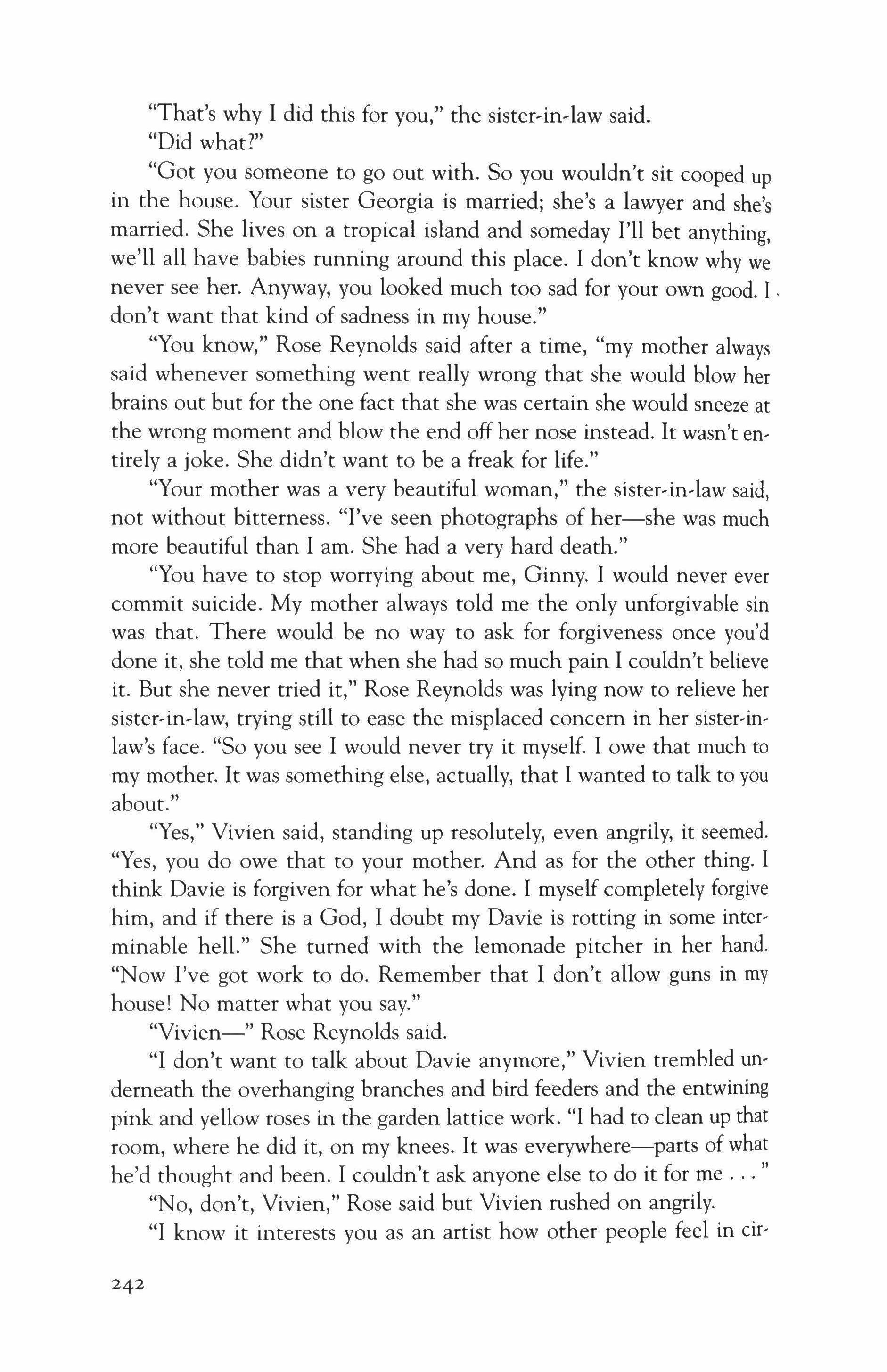
"That's why I did this for you," the sister-in-law said.
"Did what?"
"Got you someone to go out with. So you wouldn't sit cooped up in the house. Your sister Georgia is married; she's a lawyer and she's married. She lives on a tropical island and someday I'll bet anything, we'll all have babies running around this place. I don't know why we never see her. Anyway, you looked much too sad for your own good. I don't want that kind of sadness in my house."
"You know," Rose Reynolds said after a time, "my mother always said whenever something went really wrong that she would blow her brains out but for the one fact that she was certain she would sneeze at the wrong moment and blow the end off her nose instead. It wasn't entirely a joke. She didn't want to be a freak for life."
"Your mother was a very beautiful woman," the sister,in-law said, not without bitterness. "I've seen photographs of her-she was much more beautiful than I am. She had a very hard death."
"You have to stop worrying about me, Ginny. I would never ever commit suicide. My mother always told me the only unforgivable sin was that. There would be no way to ask for forgiveness once you'd done it, she told me that when she had so much pain I couldn't believe it. But she never tried it," Rose Reynolds was lying now to relieve her sister,in'law, trying still to ease the misplaced concern in her sister-inlaw's face. "So you see I would never try it myself. lowe that much to my mother. It was something else, actually, that I wanted to talk to you about."
"Yes," Vivien said, standing up resolutely, even angrily, it seemed. "Yes, you do owe that to your mother. And as for the other thing. I think Davie is forgiven for what he's done. I myself completely forgive him, and if there is a God, I doubt my Davie is rotting in some interminable hell." She turned with the lemonade pitcher in her hand. "Now I've got work to do. Remember that I don't allow guns in my house! No matter what you say."
"Vivien-" Rose Reynolds said.
"I don't want to talk about Davie anymore," Vivien trembled underneath the overhanging branches and bird feeders and the entwining pink and yellow roses in the garden lattice work. "I had to clean up that room, where he did it, on my knees. It was everywhere-parts of what he'd thought and been. I couldn't ask anyone else to do it for me
"No, don't, Vivien," Rose said but Vivien rushed on angrily.
"I know it interests you as an artist how other people feel in cir-
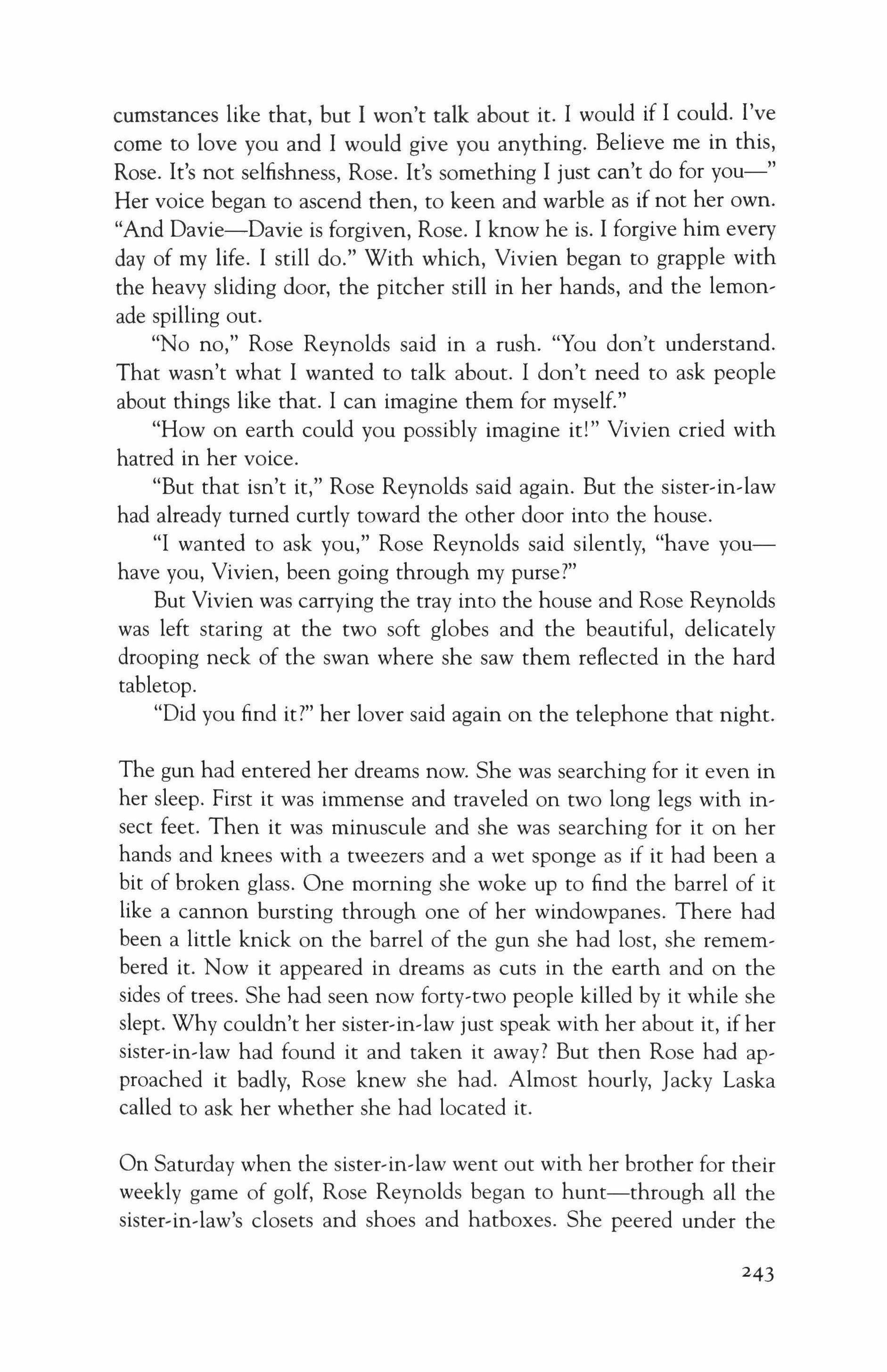
cumstances like that, but I won't talk about it. I would if I could. I've come to love you and I would give you anything. Believe me in this, Rose. It's not selfishness, Rose. It's something I just can't do for you-" Her voice began to ascend then, to keen and warble as if not her own. "And Davie-Davie is forgiven, Rose. I know he is. I forgive him every day of my life. I still do." With which, Vivien began to grapple with the heavy sliding door, the pitcher still in her hands, and the lemon' ade spilling out.
"No no," Rose Reynolds said in a rush. "You don't understand. That wasn't what I wanted to talk about. I don't need to ask people about things like that. I can imagine them for myself."
"How on earth could you possibly imagine it!" Vivien cried with hatred in her voice.
"But that isn't it," Rose Reynolds said again. But the sister-in-law had already turned curtly toward the other door into the house.
"I wanted to ask you," Rose Reynolds said silently, "have youhave you, Vivien, been going through my purse?"
But Vivien was carrying the tray into the house and Rose Reynolds was left staring at the two soft globes and the beautiful, delicately drooping neck of the swan where she saw them reflected in the hard tabletop.
"Did you find it?" her lover said again on the telephone that night.
The gun had entered her dreams now. She was searching for it even in her sleep. First it was immense and traveled on two long legs with in' sect feet. Then it was minuscule and she was searching for it on her hands and knees with a tweezers and a wet sponge as if it had been a bit of broken glass. One morning she woke up to find the barrel of it like a cannon bursting through one of her windowpanes. There had been a little knick on the barrel of the gun she had lost, she rernembered it. Now it appeared in dreams as cuts in the earth and on the sides of trees. She had seen now forty-two people killed by it while she slept. Why couldn't her sister-in-law just speak with her about it, if her sister-in-law had found it and taken it away? But then Rose had approached it badly, Rose knew she had. Almost hourly, Jacky Laska called to ask her whether she had located it.
On Saturday when the sister-in-law went out with her brother for their weekly game of golf, Rose Reynolds began to hunt-through all the sister-in-law's closets and shoes and hatboxes. She peered under the
243
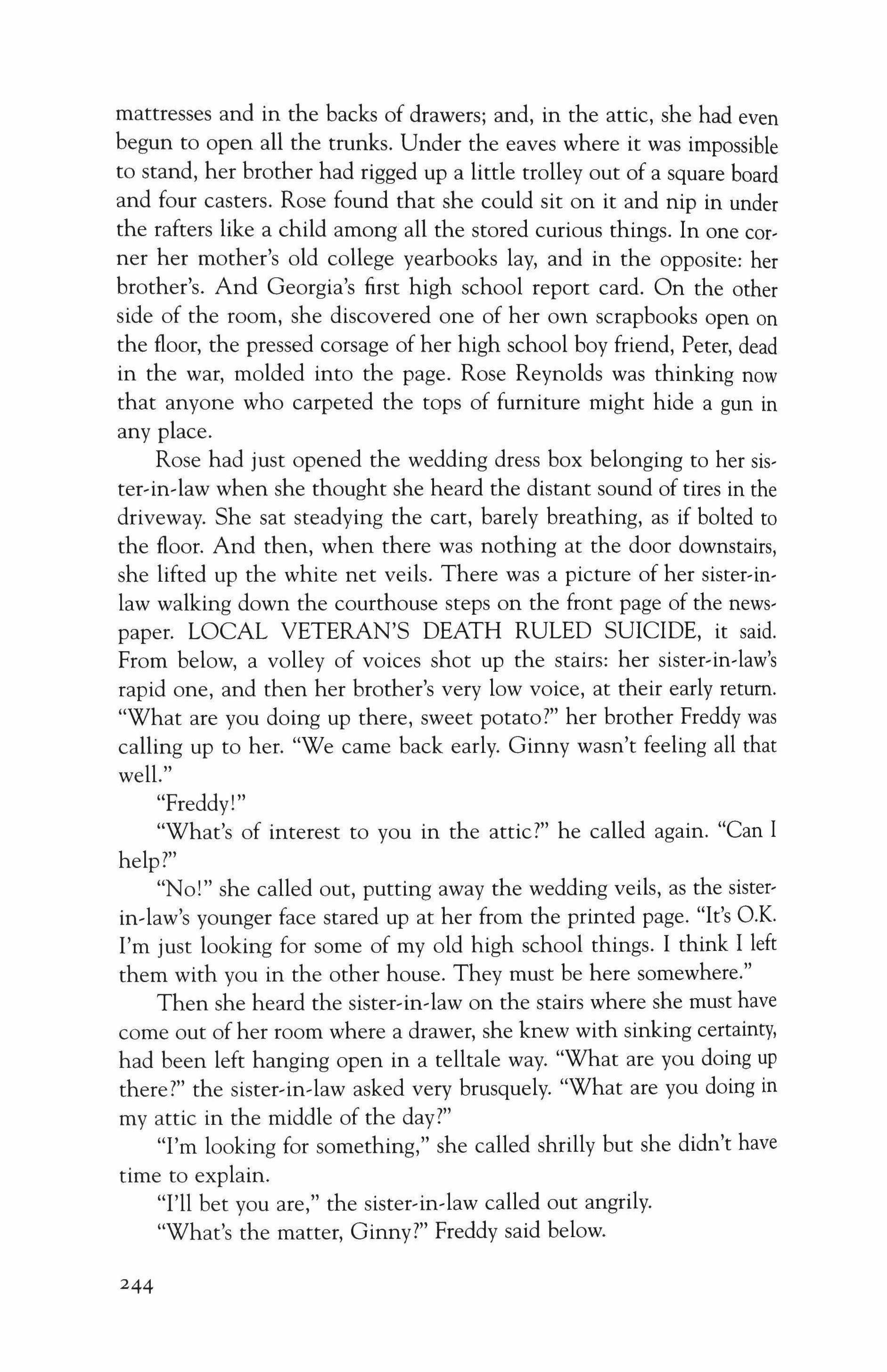
mattresses and in the backs of drawers; and, in the attic, she had even begun to open all the trunks. Under the eaves where it was impossible to stand, her brother had rigged up a little trolley out of a square board and four casters. Rose found that she could sit on it and nip in under the rafters like a child among all the stored curious things. In one corner her mother's old college yearbooks lay, and in the opposite: her brother's. And Georgia's first high school report card. On the other side of the room, she discovered one of her own scrapbooks open on the floor, the pressed corsage of her high school boy friend, Peter, dead in the war, molded into the page. Rose Reynolds was thinking now that anyone who carpeted the tops of furniture might hide a gun in any place.
Rose had just opened the wedding dress box belonging to her sister-in-law when she thought she heard the distant sound of tires in the driveway. She sat steadying the cart, barely breathing, as if bolted to the floor. And then, when there was nothing at the door downstairs, she lifted up the white net veils. There was a picture of her sister-inlaw walking down the courthouse steps on the front page of the newspaper.
LOCAL VETERAN'S DEATH RULED SUICIDE,
it said. From below, a volley of voices shot up the stairs: her sister-in-law's rapid one, and then her brother's very low voice, at their early return. "What are you doing up there, sweet potato?" her brother Freddy was calling up to her. "We came back early. Ginny wasn't feeling all that well."
"Freddy!"
"What's of interest to you in the attic?" he called again. "Can I help?"
"No!" she called out, putting away the wedding veils, as the sisterin-law's younger face stared up at her from the printed page. "It's O.K. I'm just looking for some of my old high school things. I think I left them with you in the other house. They must be here somewhere."
Then she heard the sister-in-law on the stairs where she must have come out of her room where a drawer, she knew with sinking certainty, had been left hanging open in a telltale way. "What are you doing up there?" the sister-in-law asked very brusquely. "What are you doing in my attic in the middle of the day?"
"I'm looking for something," she called shrilly but she didn't have time to explain.
"I'll bet you are," the sister-in-law called out angrily. "What's the matter, Ginny?" Freddy said below.
244
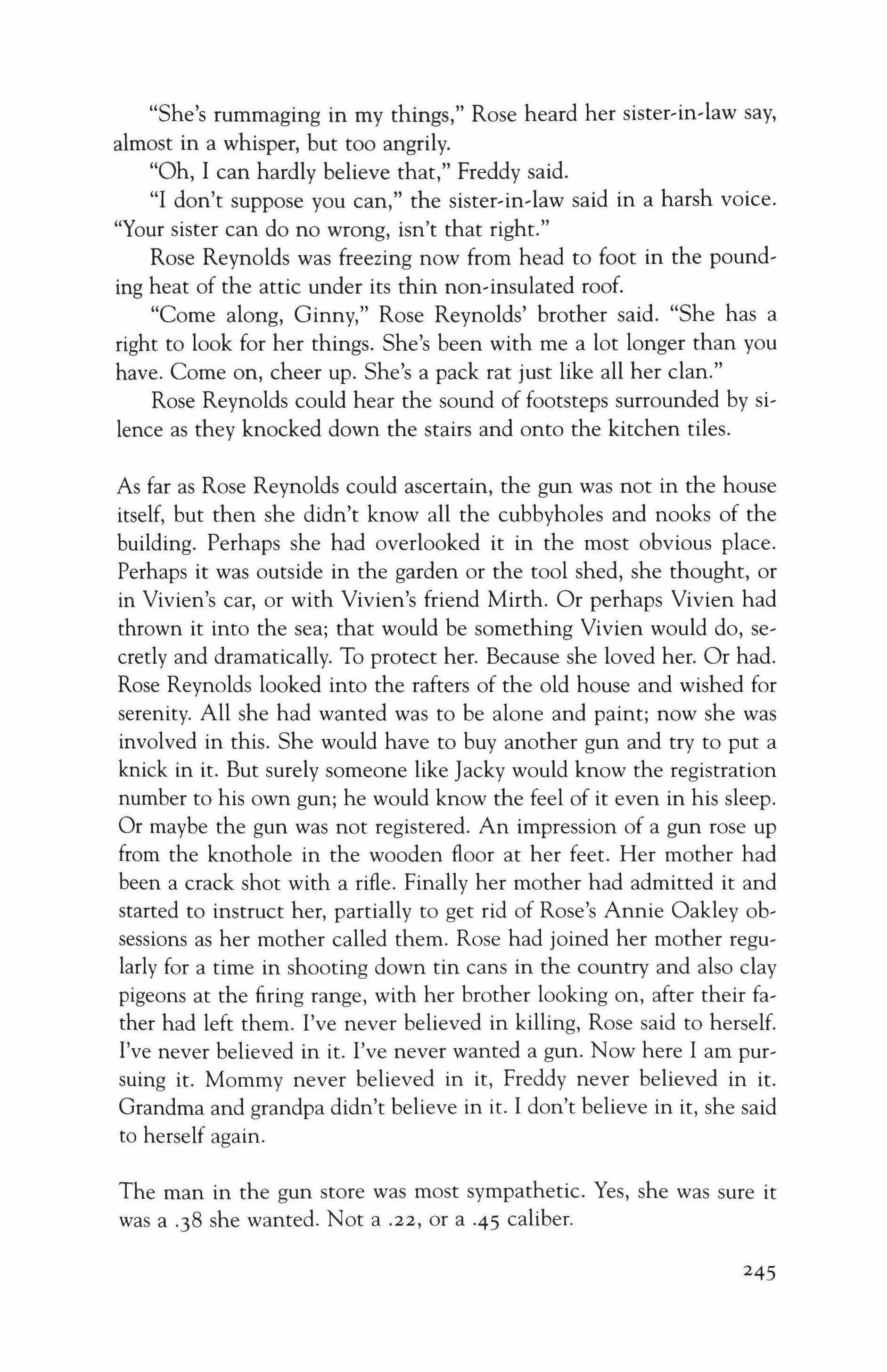
"She's rummaging in my things," Rose heard her sister-in-law say, almost in a whisper, but too angrily.
"Oh, I can hardly believe that," Freddy said.
"I don't suppose you can," the sister-in-law said in a harsh voice. "Your sister can do no wrong, isn't that right."
Rose Reynolds was freezing now from head to foot in the pound, ing heat of the attic under its thin non, insulated roof.
"Come along, Ginny," Rose Reynolds' brother said. "She has a right to look for her things. She's been with me a lot longer than you have. Come on, cheer up. She's a pack rat just like all her clan."
Rose Reynolds could hear the sound of footsteps surrounded by silence as they knocked down the stairs and onto the kitchen tiles.
As far as Rose Reynolds could ascertain, the gun was not in the house itself, but then she didn't know all the cubbyholes and nooks of the building. Perhaps she had overlooked it in the most obvious place. Perhaps it was outside in the garden or the tool shed, she thought, or in Vivien's car, or with Vivien's friend Mirth. Or perhaps Vivien had thrown it into the sea; that would be something Vivien would do, secretly and dramatically. To protect her. Because she loved her. Or had. Rose Reynolds looked into the rafters of the old house and wished for serenity. All she had wanted was to be alone and paint; now she was involved in this. She would have to buy another gun and try to put a knick in it. But surely someone like Jacky would know the registration number to his own gun; he would know the feel of it even in his sleep. Or maybe the gun was not registered. An impression of a gun rose up from the knothole in the wooden floor at her feet. Her mother had been a crack shot with a rifle. Finally her mother had admitted it and started to instruct her, partially to get rid of Rose's Annie Oakley obsessions as her mother called them. Rose had joined her mother regularly for a time in shooting down tin cans in the country and also clay pigeons at the firing range, with her brother looking on, after their fa, ther had left them. I've never believed in killing, Rose said to herself. I've never believed in it. I've never wanted a gun. Now here I am pur' suing it. Mommy never believed in it, Freddy never believed in it. Grandma and grandpa didn't believe in it. I don't believe in it, she said to herself again.
The man in the gun store was most sympathetic. Yes, she was sure it was a .38 she wanted. Not a .22, or a .45 caliber.
245

"You'll have to sign the registry," he said. "And then it takes a week."
"A week!" she said. "But it's right here. This one right here." She tapped the top of the glass cabinet. There it was right beneath her fingertips.
"In this state, you have to wait a week," he said bristling sternly. "That's the law and that's the way it's got to be."
"Couldn't you make this one exception?" she demanded of him. "I know it's unusual. I don't want to shoot anyone with it."
He looked at her oddly and set his wire-rimmed glasses up onto the front of his forehead. He looked out from under them. "And you were going to shoot horse flies with it, my dear? Or maybe you don't consider your 'flies' to be anyone in particular."
"I want it for protection," Rose said. "We've had a prowler coming around at the windows. I'm afraid at night."
"Then get yourself a boyfriend," the man said to her. And he turned his back on her. His voice came at her as if from out the back of his head. "It's stupid to live alone these days," he said.
"Are you sure I couldn't just come back in three or four days?" she asked. It was not natural for her to plead. Yet a plaintive note had entered into her voice. "Three days or four, please. He always comes around on weekends."
"I'm dead sure," he said, turning around and setting right his spectacles. "You can have it in one week, just as is according to state law. Do you want to sign the register or not?"
So Rose Reynolds had found herself leaning over to sketch her own name in her own hand in a book that she herself did not illustrate. The thought of it froze the pen above the page. "All right, all right," the man said. "You don't have to drool on it. If you're so scared why don't you call the police?"
She was to pick up the gun the following week.
On the next weekend she and Jacky took the boat down to the same beach with three or four other yachts. When they had joined the others, he told her that the old man, the one he called Uncle Vince, wanted to see them in his cabin. He took her gently by the hand-it was something touching that the man at school had hardly ever done with her, taking her by the hand; and they went into the teak-paneled room. Three armchairs were drawn up around the divan beneath a shelf of books. A chart of channels and currents was on the wall beside
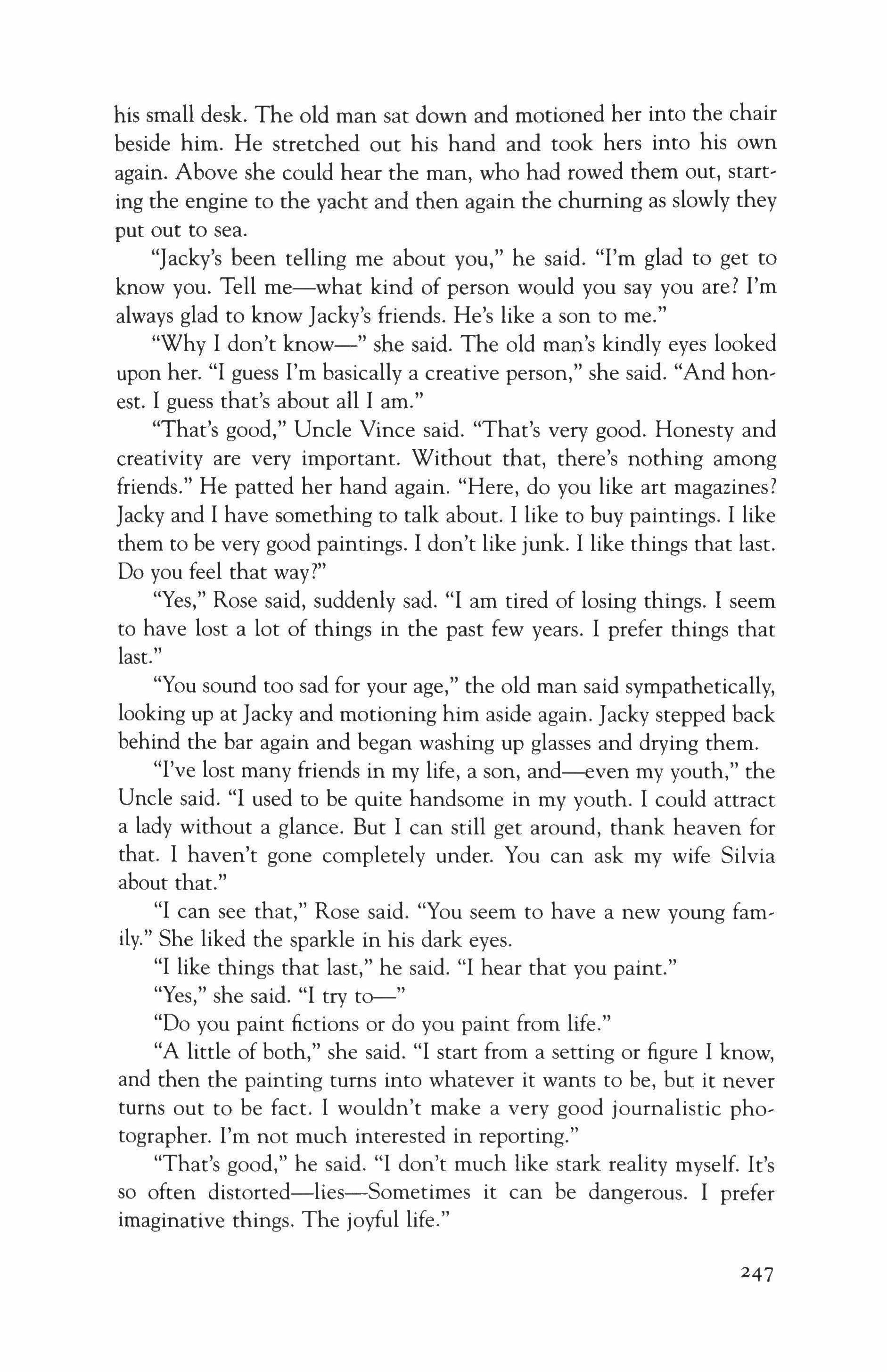
his small desk. The old man sat down and motioned her into the chair beside him. He stretched out his hand and took hers into his own again. Above she could hear the man, who had rowed them out, starting the engine to the yacht and then again the churning as slowly they put out to sea.
"Jacky's been telling me about you," he said. "I'm glad to get to know you. Tell me-what kind of person would you say you are? I'm always glad to know Jacky's friends. He's like a son to me."
"Why I don't know-" she said. The old man's kindly eyes looked upon her. "I guess I'm basically a creative person," she said. "And honest. I guess that's about all I am."
"That's good," Uncle Vince said. "That's very good. Honesty and creativity are very important. Without that, there's nothing among friends." He patted her hand again. "Here, do you like art magazines? Jacky and I have something to talk about. I like to buy paintings. I like them to be very good paintings. I don't like junk. I like things that last. Do you feel that way?"
"Yes," Rose said, suddenly sad. "I am tired of losing things. I seem to have lost a lot of things in the past few years. I prefer things that last."
"You sound too sad for your age," the old man said sympathetically, looking up at Jacky and motioning him aside again. Jacky stepped back behind the bar again and began washing up glasses and drying them.
"I've lost many friends in my life, a son, and-even my youth," the Uncle said. "I used to be quite handsome in my youth. I could attract a lady without a glance. But I can still get around, thank heaven for that. I haven't gone completely under. You can ask my wife Silvia about that."
"I can see that," Rose said. "You seem to have a new young family." She liked the sparkle in his dark eyes.
"I like things that last," he said. "I hear that you paint."
"Yes," she said. "I try to---"
"Do you paint fictions or do you paint from life."
"A little of both," she said. "I start from a setting or figure I know, and then the painting turns into whatever it wants to be, but it never turns out to be fact. I wouldn't make a very good journalistic photographer. I'm not much interested in reporting."
"That's good," he said. "I don't much like stark reality myself. It's so often distorted-lies-Sometimes it can be dangerous. I prefer imaginative things. The joyful life."
247
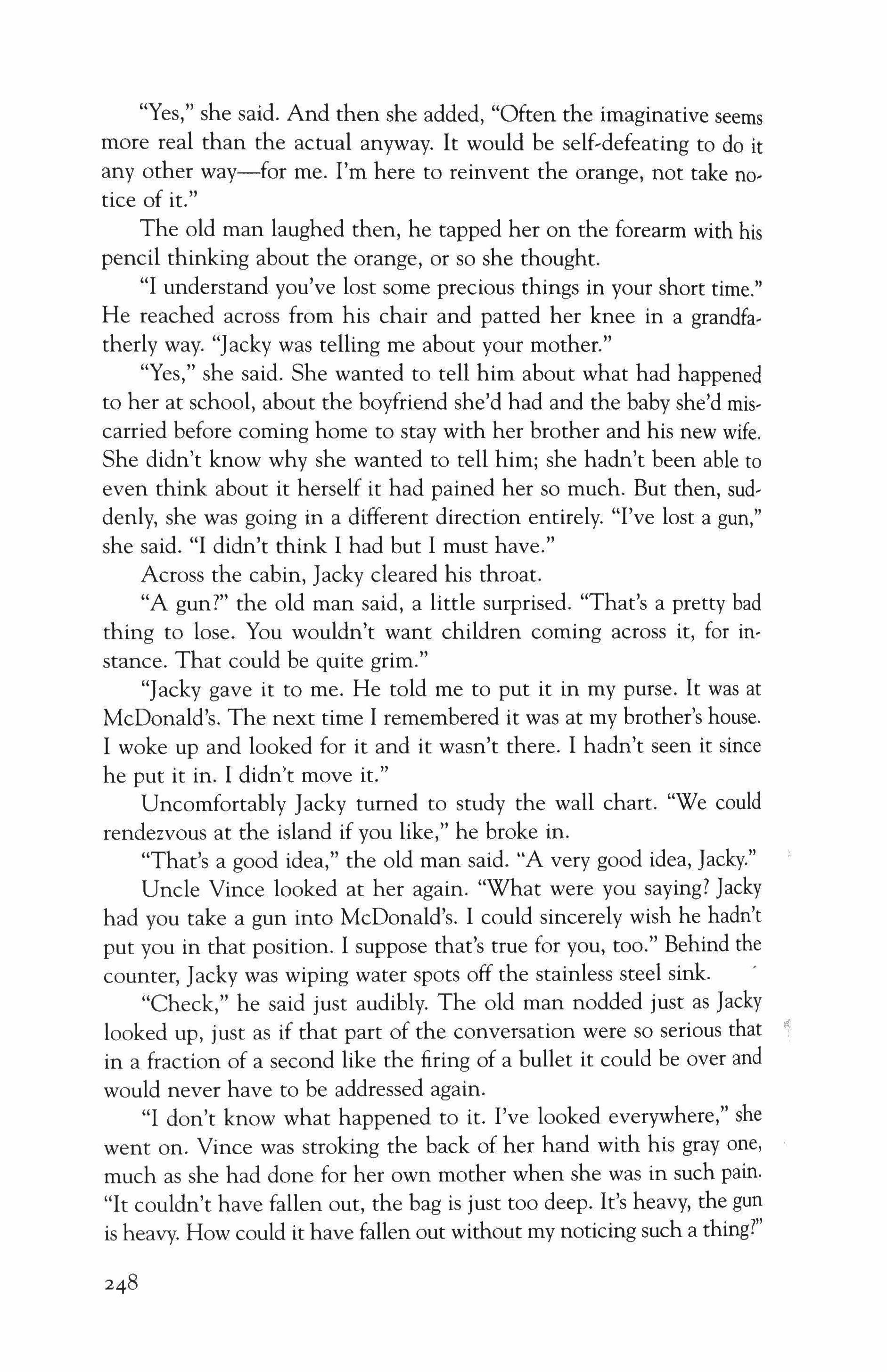
"Yes," she said. And then she added, "Often the imaginative seems more real than the actual anyway. It would be self-defeating to do it any other way-for me. I'm here to reinvent the orange, not take notice of it."
The old man laughed then, he tapped her on the forearm with his pencil thinking about the orange, or so she thought.
"I understand you've lost some precious things in your short time." He reached across from his chair and patted her knee in a grandfatherly way. "Jacky was telling me about your mother."
"Yes," she said. She wanted to tell him about what had happened to her at school, about the boyfriend she'd had and the baby she'd miscarried before coming home to stay with her brother and his new wife. She didn't know why she wanted to tell him; she hadn't been able to even think about it herself it had pained her so much. But then, suddenly, she was going in a different direction entirely. "I've lost a gun," she said. "I didn't think I had but I must have."
Across the cabin, Jacky cleared his throat.
"A gun?" the old man said, a little surprised. "That's a pretty bad thing to lose. You wouldn't want children coming across it, for instance. That could be quite grim."
"Jacky gave it to me. He told me to put it in my purse. It was at McDonald's. The next time I remembered it was at my brother's house. I woke up and looked for it and it wasn't there. I hadn't seen it since he put it in. I didn't move it."
Uncomfortably Jacky turned to study the wall chart. "We could rendezvous at the island if you like," he broke in.
"That's a good idea," the old man said. "A very good idea, Jacky."
Uncle Vince looked at her again. "What were you saying? Jacky had you take a gun into McDonald's. I could sincerely wish he hadn't put you in that position. I suppose that's true for you, too." Behind the counter, Jacky was wiping water spots off the stainless steel sink.
"Check," he said just audibly. The old man nodded just as Jacky looked up, just as if that part of the conversation were so serious that � in a fraction of a second like the firing of a bullet it could be over and would never have to be addressed again.
"I don't know what happened to it. I've looked everywhere," she went on. Vince was stroking the back of her hand with his gray one, much as she had done for her own mother when she was in such pain. "It couldn't have fallen out, the bag is just too deep. It's heavy, the gun is heavy. How could it have fallen out without my noticing such a thing?"
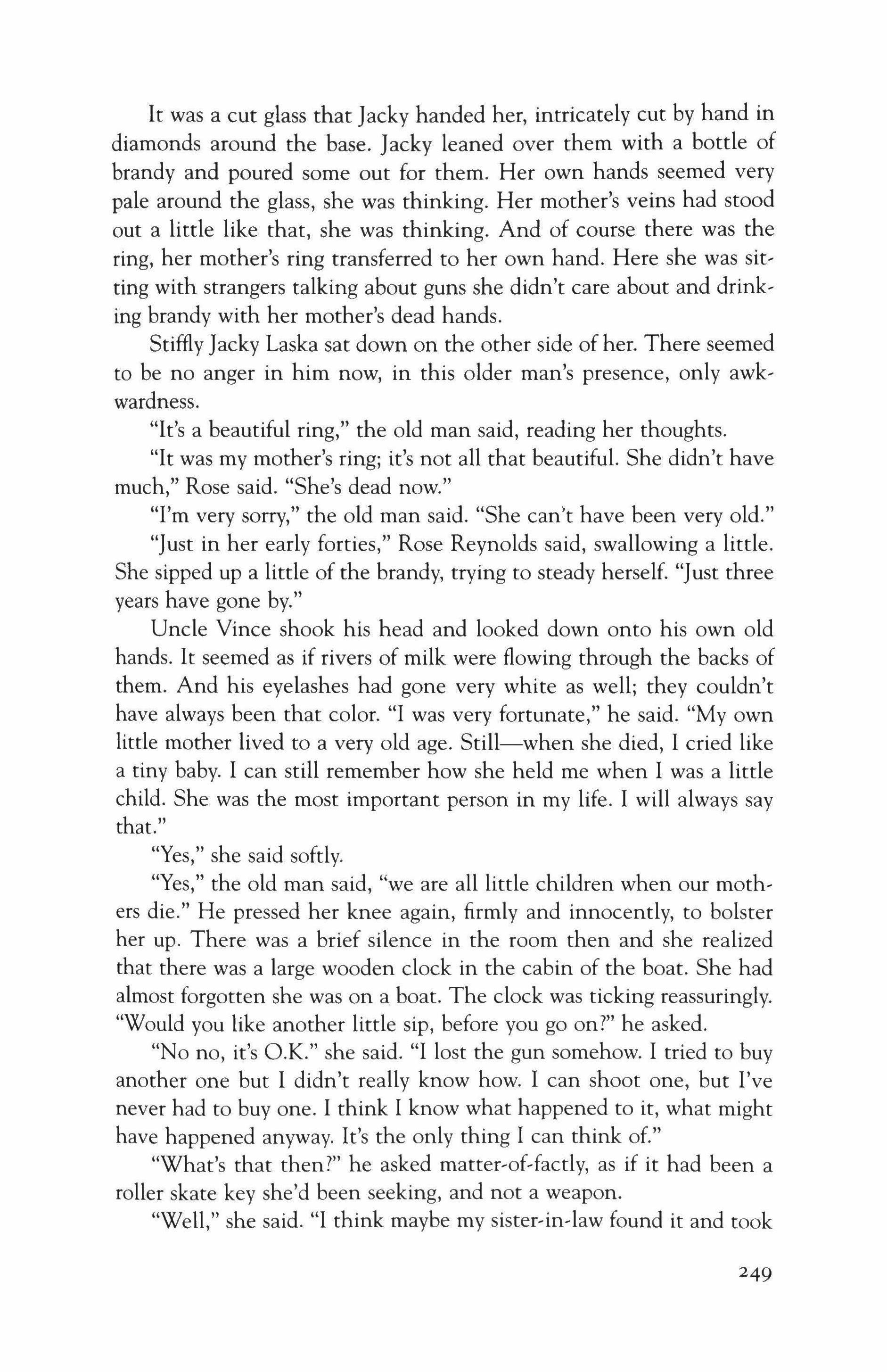
It was a cut glass that Jacky handed her, intricately cut by hand in diamonds around the base. Jacky leaned over them with a bottle of brandy and poured some out for them. Her own hands seemed very pale around the glass, she was thinking. Her mother's veins had stood out a little like that, she was thinking. And of course there was the ring, her mother's ring transferred to her own hand. Here she was sitting with strangers talking about guns she didn't care about and drinking brandy with her mother's dead hands.
Stiffly Jacky Laska sat down on the other side of her. There seemed to be no anger in him now, in this older man's presence, only awkwardness.
"It's a beautiful ring," the old man said, reading her thoughts.
"It was my mother's ring; it's not all that beautiful. She didn't have much," Rose said. "She's dead now."
"I'm very sorry," the old man said. "She can't have been very old."
"Just in her early forties," Rose Reynolds said, swallowing a little. She sipped up a little of the brandy, trying to steady herself. "Just three years have gone by."
Uncle Vince shook his head and looked down onto his own old hands. It seemed as if rivers of milk were flowing through the backs of them. And his eyelashes had gone very white as well; they couldn't have always been that color. "I was very fortunate," he said. "My own little mother lived to a very old age. Still-when she died, I cried like a tiny baby. I can still remember how she held me when I was a little child. She was the most important person in my life. I will always say that."
"Yes," she said softly.
"Yes," the old man said, "we are all little children when our mothers die." He pressed her knee again, firmly and innocently, to bolster her up. There was a brief silence in the room then and she realized that there was a large wooden clock in the cabin of the boat. She had almost forgotten she was on a boat. The clock was ticking reassuringly. "Would you like another little sip, before you go on?" he asked.
"No no, it's O.K." she said. "I lost the gun somehow. I tried to buy another one but I didn't really know how. I can shoot one, but I've never had to buy one. I think I know what happened to it, what might have happened anyway. It's the only thing I can think of."
"What's that then?" he asked matter-of-factly, as if it had been a roller skate key she'd been seeking, and not a weapon.
"Well," she said. "I think maybe my sister-in-law found it and took
249

it away. I've been trying to paint some portraits of my mother, and my sister-in-law doesn't understand that it's a good thing-all this thinking about my mother. It helps so much to paint. I'm not just painting how it was, I'm inventing a story that never occurred. It gives me peacefulness. But she won't leave me alone to do it. She thinks I'm too maudlin now."
"Maudlin, you say? She thought maybe you were going to kill yourself with that gun, Rose?"
"Yes maybe," she said.
"But no, that's incredible!" the old man said abruptly and rather loudly, sitting his chair onto its back legs. "A girl like you would never kill herself. It's not in your character. I can see it in your face. I know people. You rescue people, Rose; you can't stop from doing it. You don't kill yourself."
"Of course not," she said. "I tried to tell her. Still, she's a little jumpy. You see-her first husband shot himself. Because of the war, because of Vietnam, you see, he couldn't recover-"
"Did you ask her about the gun then?"
"No," she said. "She's very conventional in her thinking, and flamboyant. She might, well, do something too extreme for the situation."
"That is quite an unfortunate combination, as you point it out: conventional and flamboyant! An unfortunate combination," He laughed then from the belly and knit his fingers together in front ofhis sweater. She wanted to tell him about the paintings on the wall then, but they seemed quite irrelevant. She wanted to tell him everything.
"I don't really mind if she thinks I'm a lunatic-if that helps the situation, I mean. I just don't know what to do about getting the gun back without scaring her or causing her to do something irrational."
"Yes," he said. "She might try to lock you up for craziness if she thinks you're packing a gun."
Rose Reynolds looked at him with her big eyes terrified, like mirrors. "I never really thought about that," she said. "Never once did 1-"
"Now," he said. "Don't worry. It's only the remotest possibilityonly if you were to allow things to escalate. And you won't, you're a smart girl. I suggest that you simply forget about it. Your sister-in-law will have the satisfaction of thinking she rescued you from suicide. Just try to enjoy yourself while you're in her house. Forget about the gun. The more you think about it, the more absurd you'll seem. That can't possibly help you."
Jacky set his glass on the edge of the coffee table and stood up. She
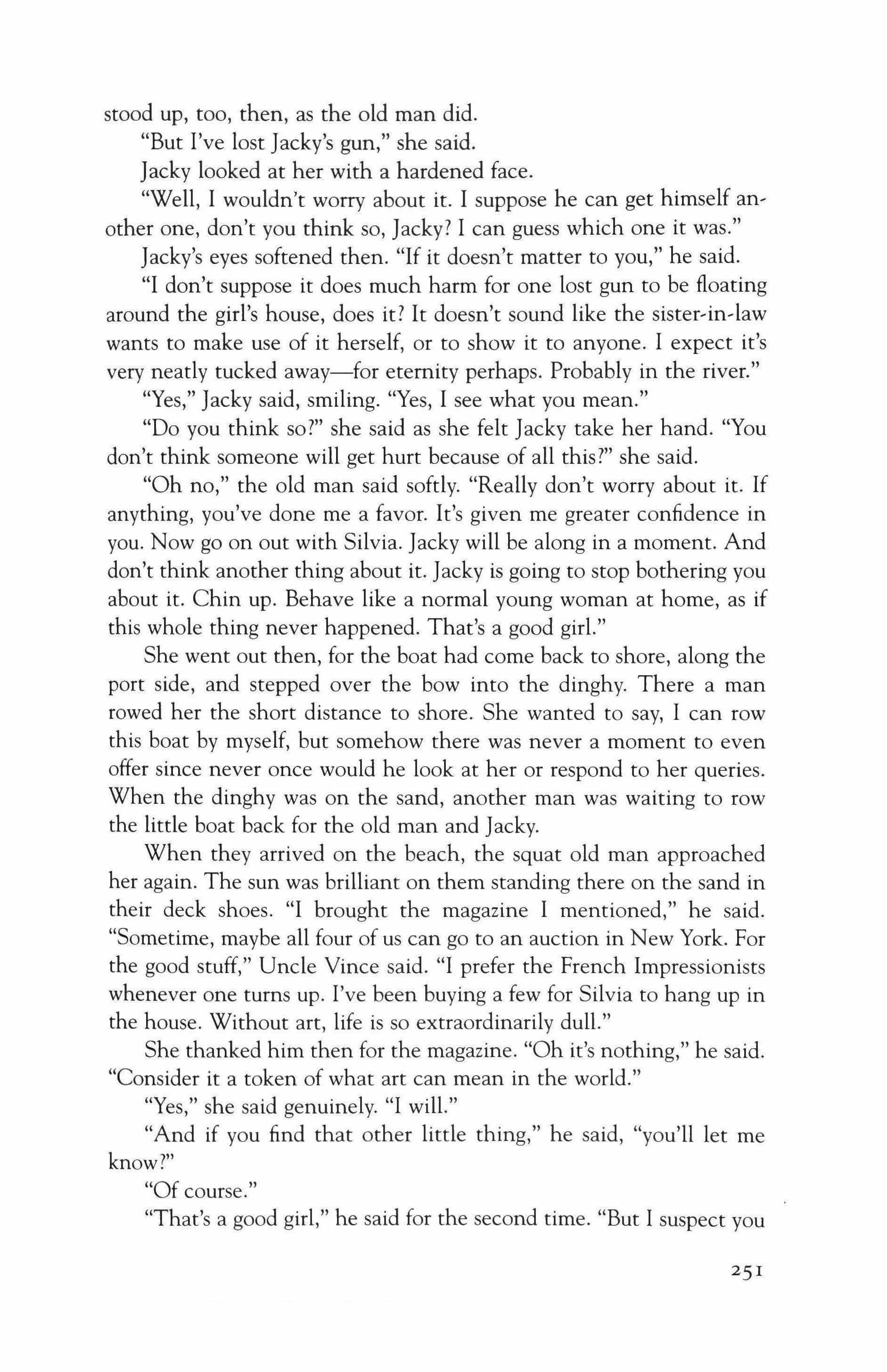
stood up, too, then, as the old man did.
"But I've lost Jacky's gun," she said.
Jacky looked at her with a hardened face.
"Well, I wouldn't worry about it. I suppose he can get himself another one, don't you think so, Jacky? I can guess which one it was."
Jacky's eyes softened then. "If it doesn't matter to you," he said.
"I don't suppose it does much harm for one lost gun to be floating around the girl's house, does it? It doesn't sound like the sister-in-law wants to make use of it herself, or to show it to anyone. I expect it's very neatly tucked away-for eternity perhaps. Probably in the river."
"Yes," Jacky said, smiling. "Yes, I see what you mean."
"Do you think so?" she said as she felt Jacky take her hand. "You don't think someone will get hurt because of all this?" she said.
"Oh no," the old man said softly. "Really don't worry about it. If anything, you've done me a favor. It's given me greater confidence in you. Now go on out with Silvia. Jacky will be along in a moment. And don't think another thing about it. Jacky is going to stop bothering you about it. Chin up. Behave like a normal young woman at home, as if this whole thing never happened. That's a good girl."
She went out then, for the boat had come back to shore, along the port side, and stepped over the bow into the dinghy. There a man rowed her the short distance to shore. She wanted to say, I can row this boat by myself, but somehow there was never a moment to even offer since never once would he look at her or respond to her queries. When the dinghy was on the sand, another man was waiting to row the little boat back for the old man and Jacky.
When they arrived on the beach, the squat old man approached her again. The sun was brilliant on them standing there on the sand in their deck shoes. "I brought the magazine I mentioned," he said. "Sometime, maybe all four of us can go to an auction in New York. For the good stuff," Uncle Vince said. "I prefer the French Impressionists whenever one turns up. I've been buying a few for Silvia to hang up in the house. Without art, life is so extraordinarily dull."
She thanked him then for the magazine. "Oh it's nothing," he said. "Consider it a token of what art can mean in the world."
"Yes," she said genuinely. "I will."
"And if you find that other little thing," he said, "you'll let me know?"
"Of course."
"That's a good girl," he said for the second time. "But I suspect you
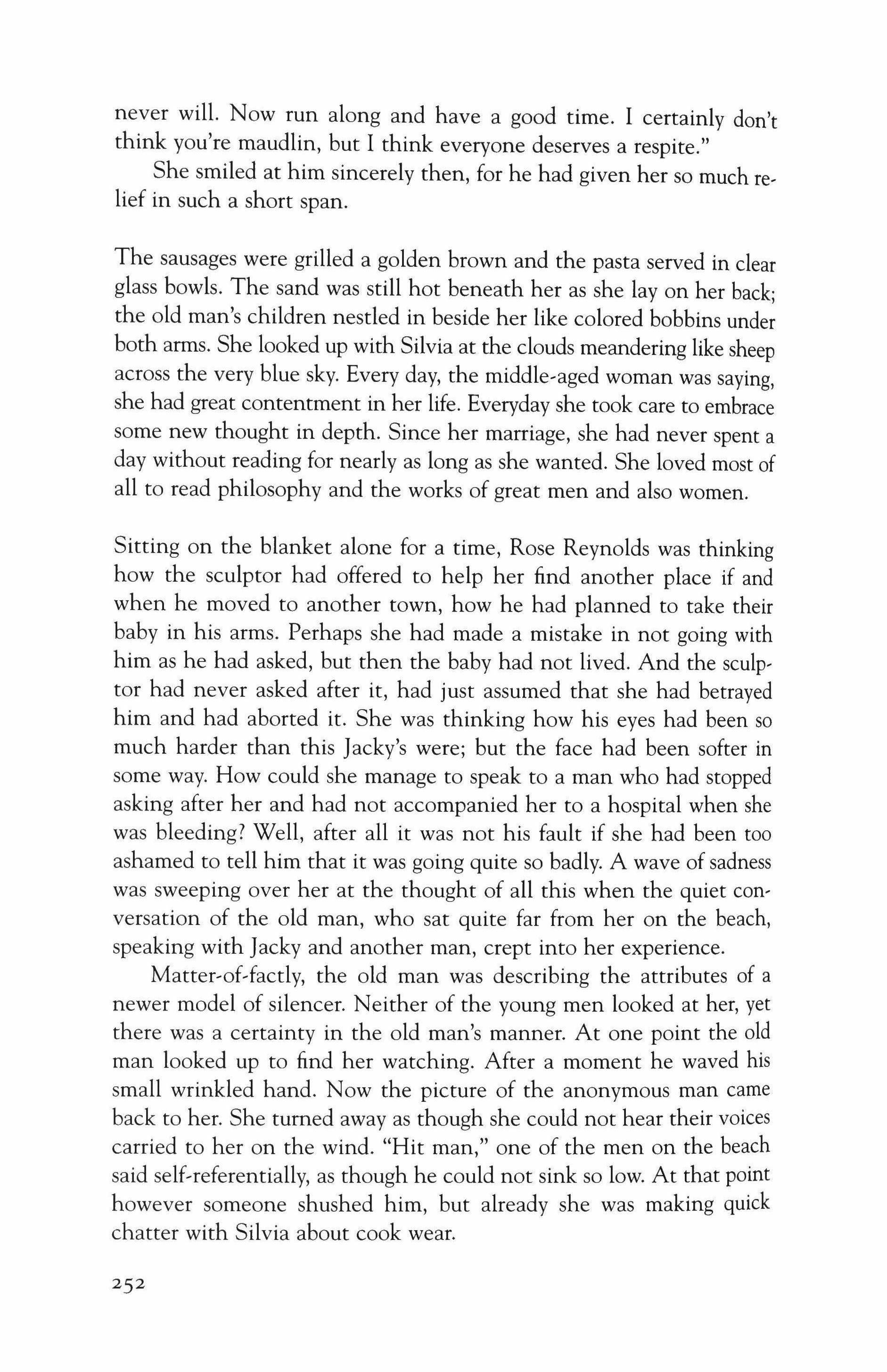
never will. Now run along and have a good time. I certainly don't think you're maudlin, but I think everyone deserves a respite."
She smiled at him sincerely then, for he had given her so much relief in such a short span.
The sausages were grilled a golden brown and the pasta served in clear glass bowls. The sand was still hot beneath her as she lay on her back; the old man's children nestled in beside her like colored bobbins under both arms. She looked up with Silvia at the clouds meandering like sheep across the very blue sky. Every day, the middle-aged woman was saying, she had great contentment in her life. Everyday she took care to embrace some new thought in depth. Since her marriage, she had never spent a day without reading for nearly as long as she wanted. She loved most of all to read philosophy and the works of great men and also women.
Sitting on the blanket alone for a time, Rose Reynolds was thinking how the sculptor had offered to help her find another place if and when he moved to another town, how he had planned to take their baby in his arms. Perhaps she had made a mistake in not going with him as he had asked, but then the baby had not lived. And the sculptor had never asked after it, had just assumed that she had betrayed him and had aborted it. She was thinking how his eyes had been so much harder than this Jacky's were; but the face had been softer in some way. How could she manage to speak to a man who had stopped asking after her and had not accompanied her to a hospital when she was bleeding? Well, after all it was not his fault if she had been too ashamed to tell him that it was going quite so badly. A wave of sadness was sweeping over her at the thought of all this when the quiet conversation of the old man, who sat quite far from her on the beach, speaking with Jacky and another man, crept into her experience. Matter-of-factly, the old man was describing the attributes of a newer model of silencer. Neither of the young men looked at her, yet there was a certainty in the old man's manner. At one point the old man looked up to find her watching. After a moment he waved his small wrinkled hand. Now the picture of the anonymous man came back to her. She turned away as though she could not hear their voices carried to her on the wind. "Hit man," one of the men on the beach said self-referentially, as though he could not sink so low. At that point however someone shushed him, but already she was making quick chatter with Silvia about cook wear.
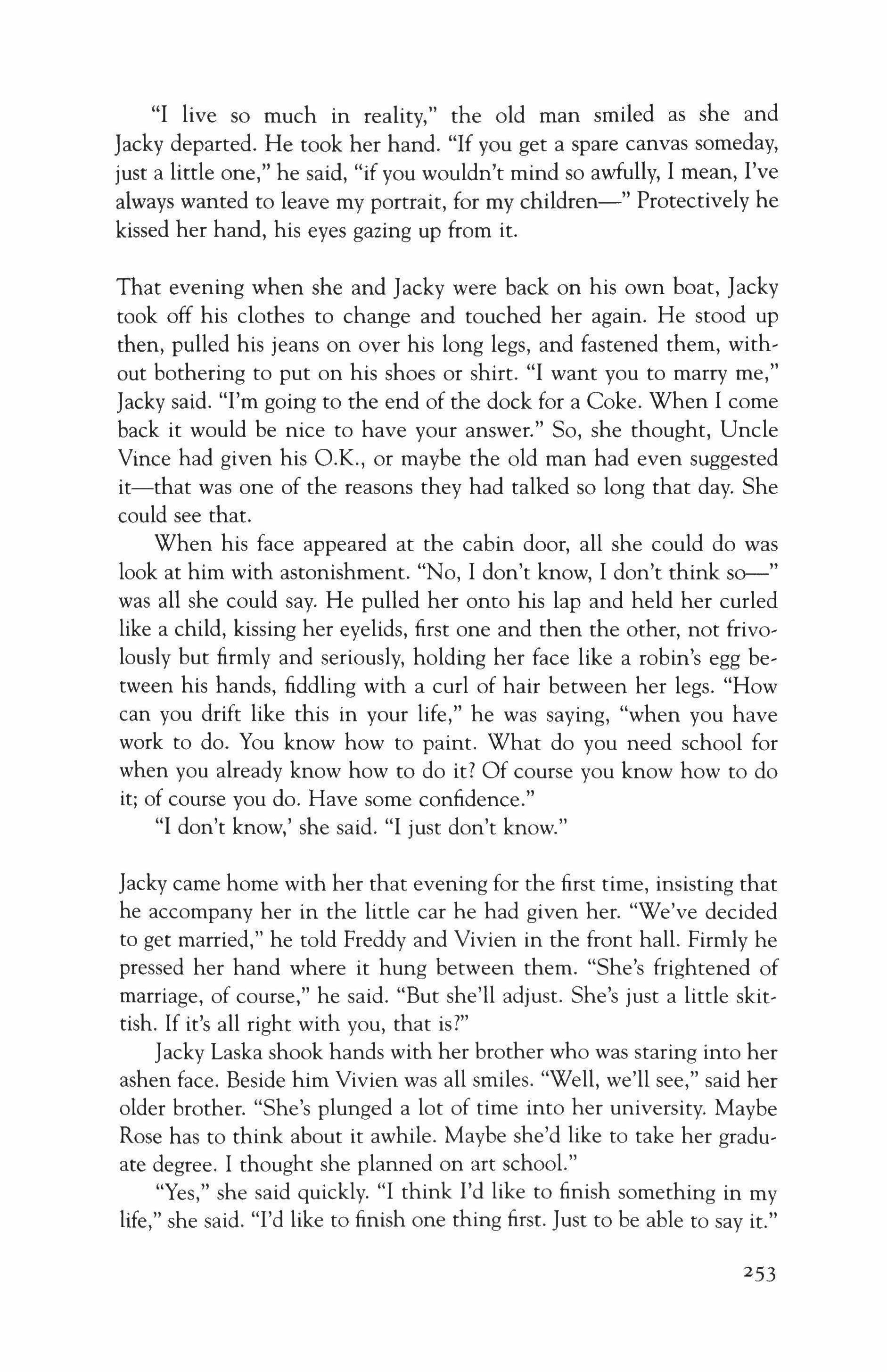
"I live so much in reality," the old man smiled as she and Jacky departed. He took her hand. "If you get a spare canvas someday, just a little one," he said, "if you wouldn't mind so awfully, I mean, I've always wanted to leave my portrait, for my children-" Protectively he kissed her hand, his eyes gazing up from it.
That evening when she and Jacky were back on his own boat, Jacky took off his clothes to change and touched her again. He stood up then, pulled his jeans on over his long legs, and fastened them, without bothering to put on his shoes or shirt. "I want you to marry me," Jacky said. "I'm going to the end of the dock for a Coke. When I come back it would be nice to have your answer." So, she thought, Uncle Vince had given his O.K., or maybe the old man had even suggested it-that was one of the reasons they had talked so long that day. She could see that.
When his face appeared at the cabin door, all she could do was look at him with astonishment. "No, I don't know, I don't think so-" was all she could say. He pulled her onto his lap and held her curled like a child, kissing her eyelids, first one and then the other, not frivolously but firmly and seriously, holding her face like a robin's egg between his hands, fiddling with a curl of hair between her legs. "How can you drift like this in your life," he was saying, "when you have work to do. You know how to paint. What do you need school for when you already know how to do it? Of course you know how to do it; of course you do. Have some confidence."
"I don't know,' she said. "I just don't know."
Jacky came home with her that evening for the first time, insisting that he accompany her in the little car he had given her. "We've decided to get married," he told Freddy and Vivien in the front hall. Firmly he pressed her hand where it hung between them. "She's frightened of marriage, of course," he said. "But she'll adjust. She's just a little skittish. If it's all right with you, that is?"
Jacky Laska shook hands with her brother who was staring into her ashen face. Beside him Vivien was all smiles. "Well, we'll see," said her older brother. "She's plunged a lot of time into her university. Maybe Rose has to think about it awhile. Maybe she'd like to take her graduate degree. 1 thought she planned on art school."
"Yes," she said quickly. "I think I'd like to finish something in my life," she said. "I'd like to finish one thing first. Just to be able to say it."
253
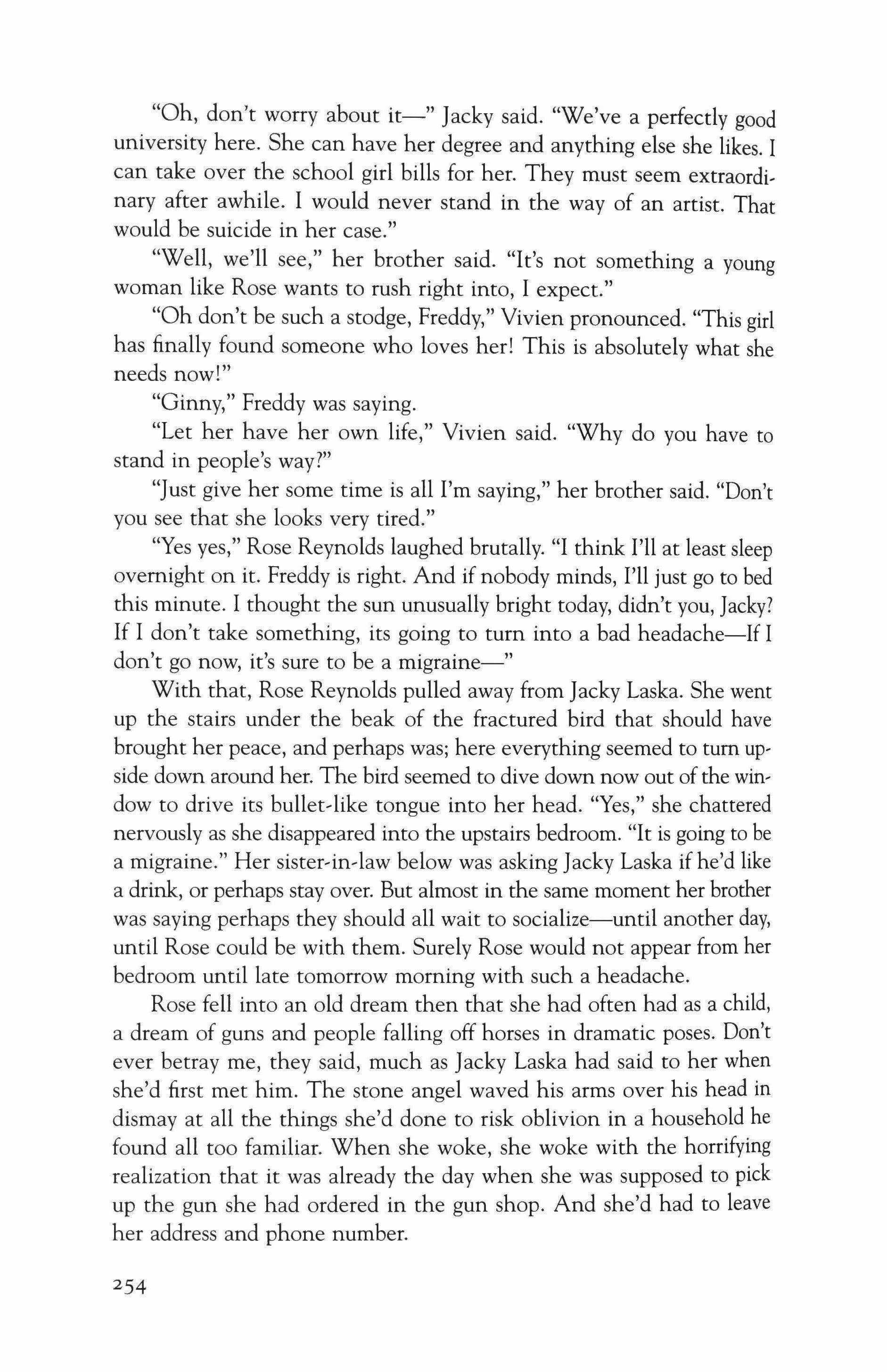
"Oh, don't worry about it-" Jacky said. "We've a perfectly good university here. She can have her degree and anything else she likes. I can take over the school girl bills for her. They must seem extraordinary after awhile. I would never stand in the way of an artist. That would be suicide in her case."
"Well, we'll see," her brother said. "It's not something a young woman like Rose wants to rush right into, I expect."
"Oh don't be such a stodge, Freddy," Vivien pronounced. "This girl has finally found someone who loves her! This is absolutely what she needs now!"
"Ginny," Freddy was saying.
"Let her have her own life," Vivien said. "Why do you have to stand in people's way?"
"Just give her some time is all I'm saying," her brother said. "Don't you see that she looks very tired."
"Yes yes," Rose Reynolds laughed brutally. "I think I'll at least sleep overnight on it. Freddy is right. And if nobody minds, I'll just go to bed this minute. I thought the sun unusually bright today, didn't you, Jacky? If I don't take something, its going to tum into a bad headache-If I don't go now, it's sure to be a migraine-"
With that, Rose Reynolds pulled away from Jacky Laska. She went up the stairs under the beak of the fractured bird that should have brought her peace, and perhaps was; here everything seemed to tum upside down around her. The bird seemed to dive down now out ofthe window to drive its bullet-like tongue into her head. "Yes," she chattered nervously as she disappeared into the upstairs bedroom. "It is going to be a migraine." Her sister-in-law below was asking Jacky Laska if he'd like a drink, or perhaps stay over. But almost in the same moment her brother was saying perhaps they should all wait to socialize-until another day, until Rose could be with them. Surely Rose would not appear from her bedroom until late tomorrow morning with such a headache.
Rose fell into an old dream then that she had often had as a child, a dream of guns and people falling off horses in dramatic poses. Don't ever betray me, they said, much as Jacky Laska had said to her when she'd first met him. The stone angel waved his arms over his head in dismay at all the things she'd done to risk oblivion in a household he found all too familiar. When she woke, she woke with the horrifying realization that it was already the day when she was supposed to pick up the gun she had ordered in the gun shop. And she'd had to leave her address and phone number.
254
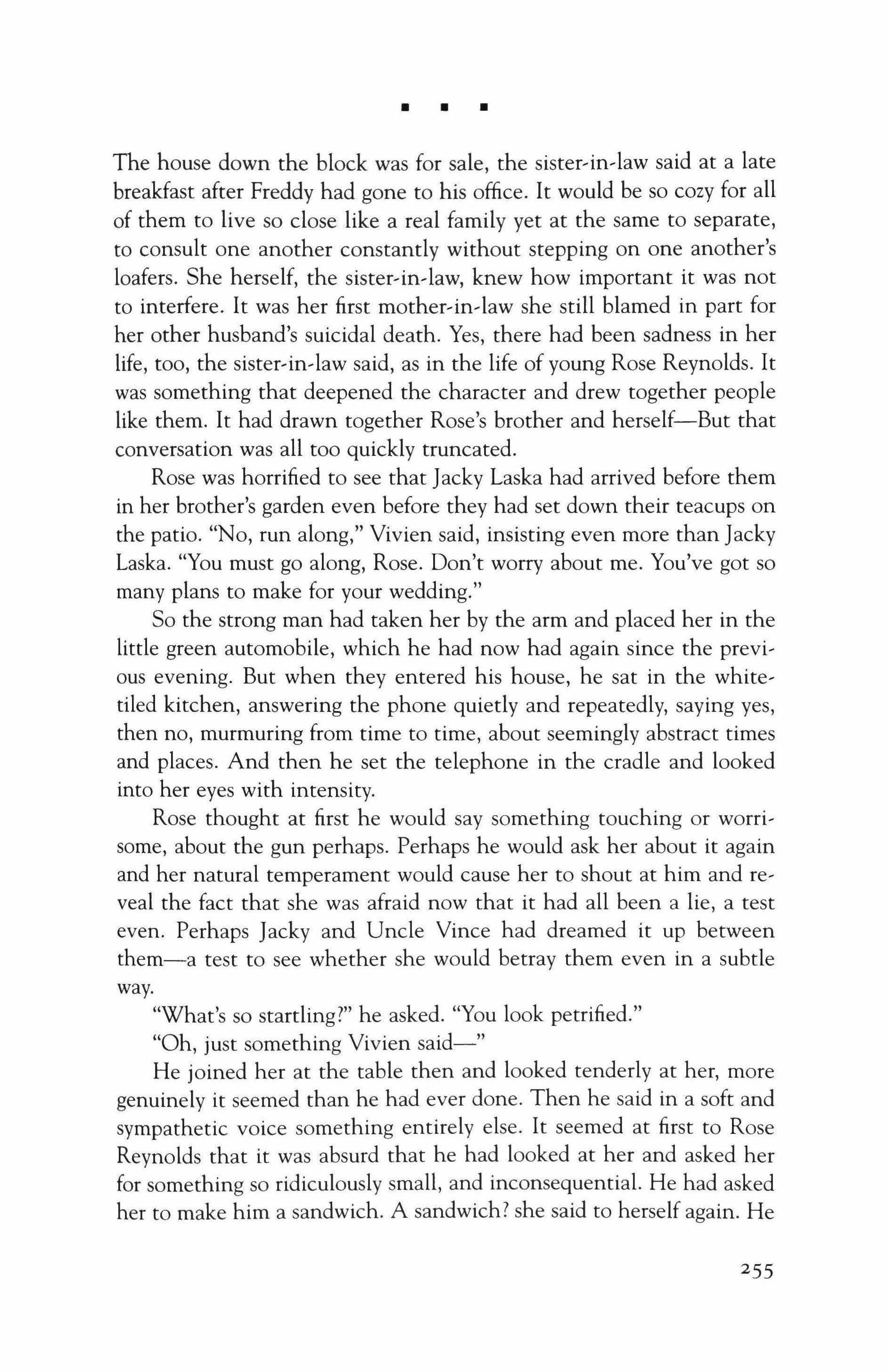
The house down the block was for sale, the sister-in-law said at a late breakfast after Freddy had gone to his office. It would be so cozy for all of them to live so close like a real family yet at the same to separate, to consult one another constantly without stepping on one another's loafers. She herself, the sister-in-law, knew how important it was not to interfere. It was her first mother-in-law she still blamed in part for her other husband's suicidal death. Yes, there had been sadness in her life, too, the sister'in'law said, as in the life of young Rose Reynolds. It was something that deepened the character and drew together people like them. It had drawn together Rose's brother and herself-But that conversation was all too quickly truncated.
Rose was horrified to see that Jacky Laska had arrived before them in her brother's garden even before they had set down their teacups on the patio. "No, run along," Vivien said, insisting even more than Jacky Laska. "You must go along, Rose. Don't worry about me. You've got so many plans to make for your wedding."
So the strong man had taken her by the arm and placed her in the little green automobile, which he had now had again since the previous evening. But when they entered his house, he sat in the white' tiled kitchen, answering the phone quietly and repeatedly, saying yes, then no, murmuring from time to time, about seemingly abstract times and places. And then he set the telephone in the cradle and looked into her eyes with intensity.
Rose thought at first he would say something touching or worrisome, about the gun perhaps. Perhaps he would ask her about it again and her natural temperament would cause her to shout at him and reveal the fact that she was afraid now that it had all been a lie, a test even. Perhaps Jacky and Uncle Vince had dreamed it up between them-a test to see whether she would betray them even in a subtle way.
"What's so startling?" he asked. "You look petrified."
"Oh, just something Vivien said-"
He joined her at the table then and looked tenderly at her, more genuinely it seemed than he had ever done. Then he said in a soft and sympathetic voice something entirely else. It seemed at first to Rose Reynolds that it was absurd that he had looked at her and asked her for something so ridiculously small, and inconsequential. He had asked her to make him a sandwich. A sandwich? she said to herself again. He
• •
255
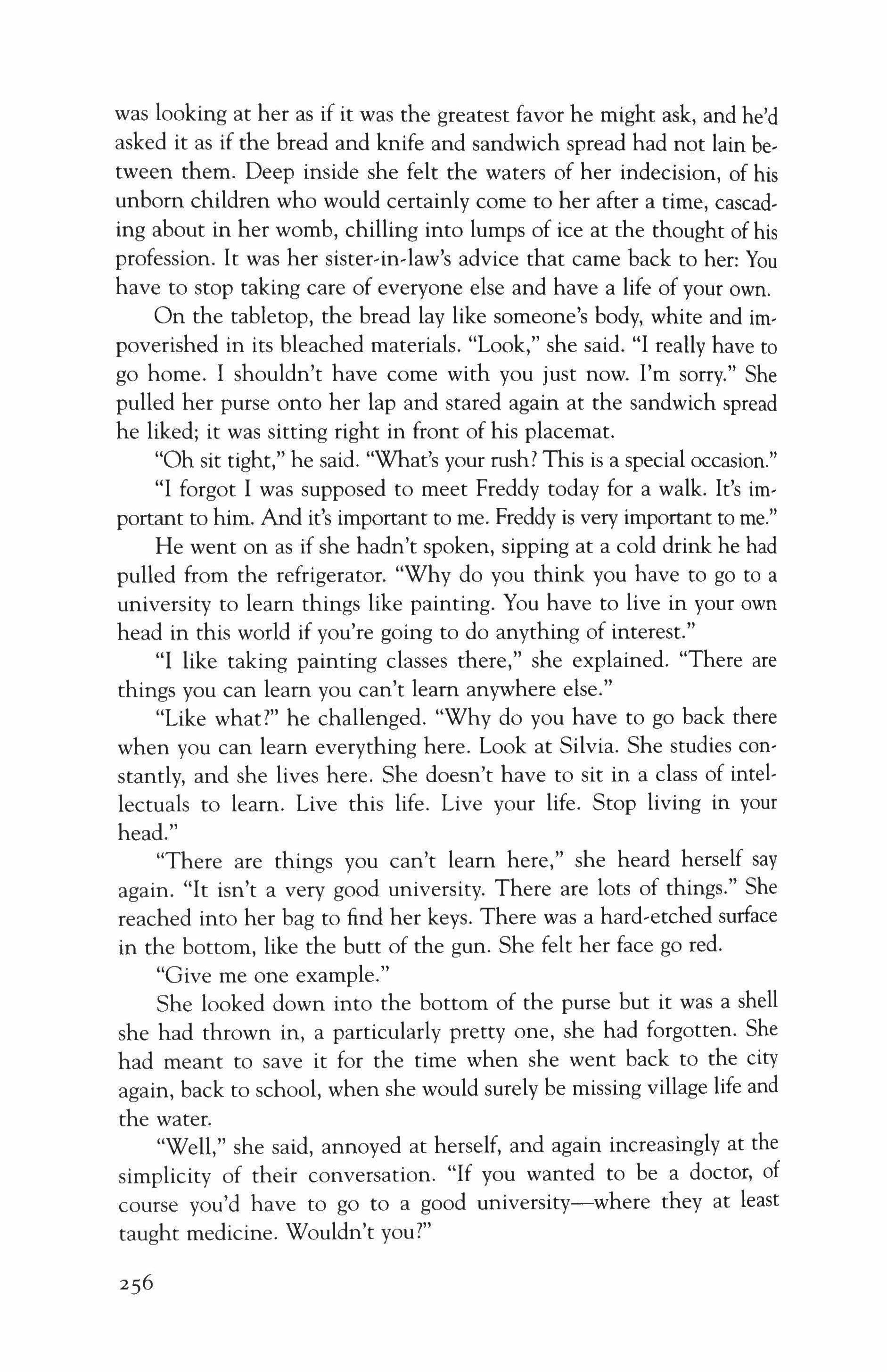
was looking at her as if it was the greatest favor he might ask, and he'd asked it as if the bread and knife and sandwich spread had not lain between them. Deep inside she felt the waters of her indecision, of his unborn children who would certainly come to her after a time, cascading about in her womb, chilling into lumps of ice at the thought of his profession. It was her sister-in-law's advice that came back to her: You have to stop taking care of everyone else and have a life of your own.
On the tabletop, the bread lay like someone's body, white and impoverished in its bleached materials. "Look," she said. "I really have to go home. I shouldn't have come with you just now. I'm sorry." She pulled her purse onto her lap and stared again at the sandwich spread he liked; it was sitting right in front of his placemat.
"Oh sit tight," he said. "What's your rush? This is a special occasion."
"I forgot I was supposed to meet Freddy today for a walk. It's important to him. And it's important to me. Freddy is very important to me."
He went on as if she hadn't spoken, sipping at a cold drink he had pulled from the refrigerator. "Why do you think you have to go to a university to learn things like painting. You have to live in your own head in this world if you're going to do anything of interest."
"I like taking painting classes there," she explained. "There are things you can learn you can't learn anywhere else."
"Like what?" he challenged. "Why do you have to go back there when you can learn everything here. Look at Silvia. She studies constantly, and she lives here. She doesn't have to sit in a class of intellectuals to learn. Live this life. Live your life. Stop living in your head."
"There are things you can't learn here," she heard herself say again. "It isn't a very good university. There are lots of things." She reached into her bag to find her keys. There was a hard-etched surface in the bottom, like the butt of the gun. She felt her face go red.
"Give me one example."
She looked down into the bottom of the purse but it was a shell she had thrown in, a particularly pretty one, she had forgotten. She had meant to save it for the time when she went back to the city again, back to school, when she would surely be missing village life and the water.
"Well," she said, annoyed at herself, and again increasingly at the simplicity of their conversation. "If you wanted to be a doctor, of course you'd have to go to a good university-where they at least taught medicine. Wouldn't you?"
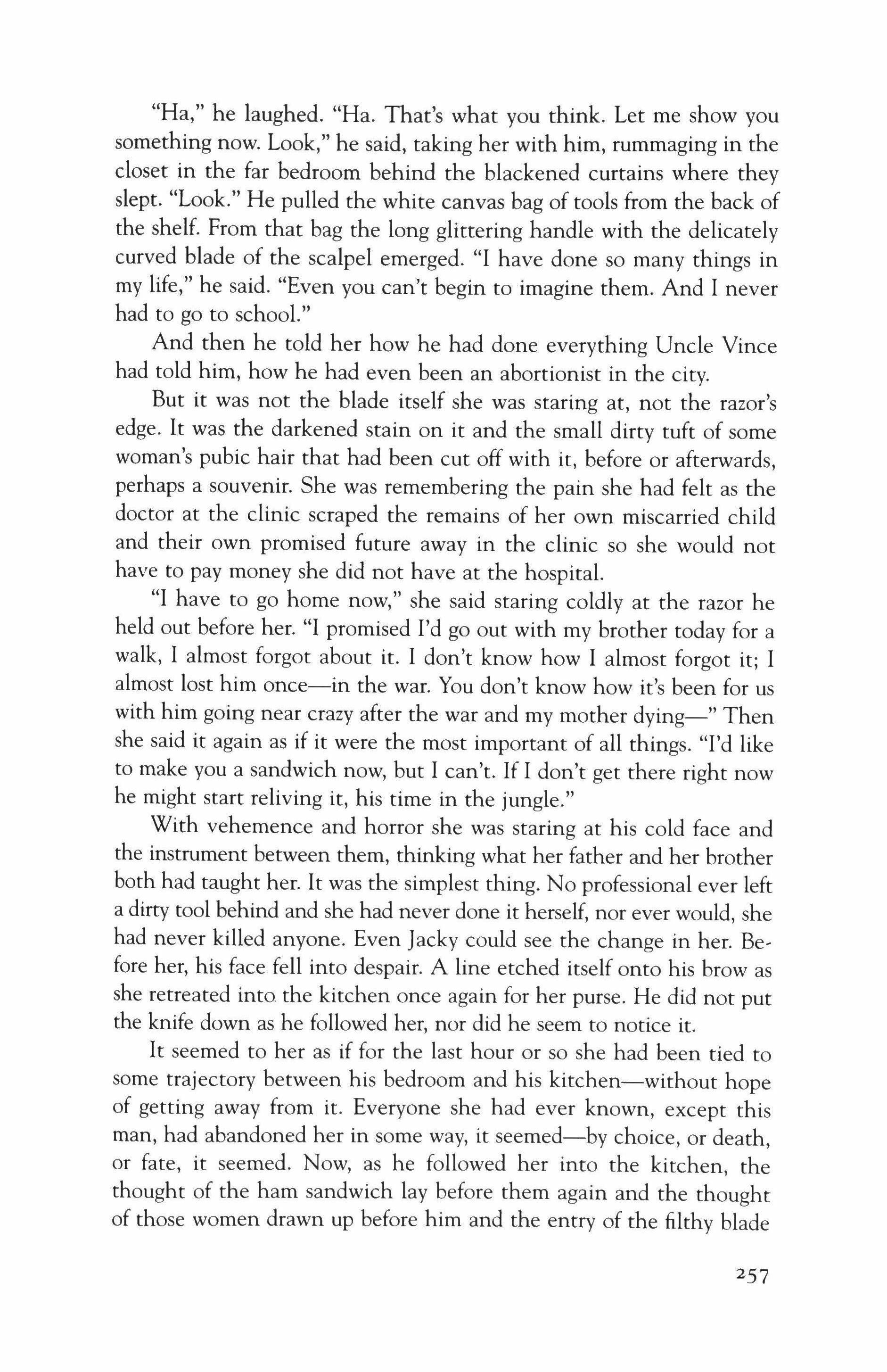
"Ha," he laughed. "Ha. That's what you think. Let me show you something now. Look," he said, taking her with him, rummaging in the closet in the far bedroom behind the blackened curtains where they slept. "Look." He pulled the white canvas bag of tools from the back of the shelf. From that bag the long glittering handle with the delicately curved blade of the scalpel emerged. "I have done so many things in my life," he said. "Even you can't begin to imagine them. And I never had to go to school."
And then he told her how he had done everything Uncle Vince had told him, how he had even been an abortionist in the city.
But it was not the blade itself she was staring at, not the razor's edge. It was the darkened stain on it and the small dirty tuft of some woman's pubic hair that had been cut off with it, before or afterwards, perhaps a souvenir. She was remembering the pain she had felt as the doctor at the clinic scraped the remains of her own miscarried child and their own promised future away in the clinic so she would not have to pay money she did not have at the hospital.
"I have to go home now," she said staring coldly at the razor he held out before her. "I promised I'd go out with my brother today for a walk, I almost forgot about it. I don't know how I almost forgot it; I almost lost him once-in the war. You don't know how it's been for us with him going near crazy after the war and my mother dying-" Then she said it again as if it were the most important of all things. "I'd like to make you a sandwich now, but I can't. If I don't get there right now he might start reliving it, his time in the jungle."
With vehemence and horror she was staring at his cold face and the instrument between them, thinking what her father and her brother both had taught her. It was the simplest thing. No professional ever left a dirty tool behind and she had never done it herself, nor ever would, she had never killed anyone. Even Jacky could see the change in her. Before her, his face fell into despair. A line etched itself onto his brow as she retreated into the kitchen once again for her purse. He did not put the knife down as he followed her, nor did he seem to notice it.
It seemed to her as if for the last hour or so she had been tied to some trajectory between his bedroom and his kitchen-without hope of getting away from it. Everyone she had ever known, except this man, had abandoned her in some way, it seemed-by choice, or death, or fate, it seemed. Now, as he followed her into the kitchen, the thought of the ham sandwich lay before them again and the thought of those women drawn up before him and the entry of the filthy blade
257
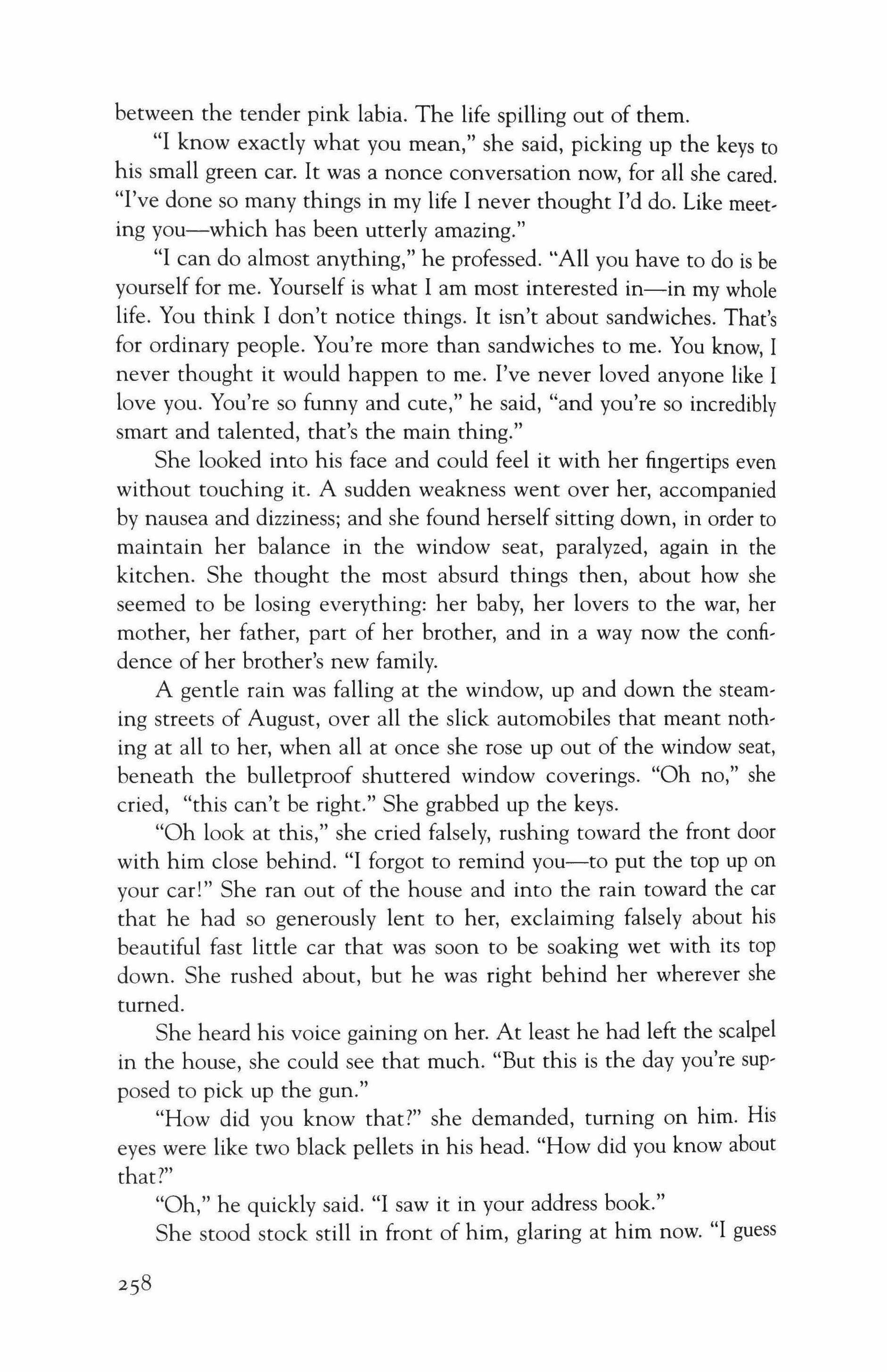
between the tender pink labia. The life spilling out of them.
"I know exactly what you mean," she said, picking up the keys to his small green car. It was a nonce conversation now, for all she cared. "I've done so many things in my life I never thought I'd do. Like meeting you-which has been utterly amazing."
"I can do almost anything," he professed. "All you have to do is be yourself for me. Yourself is what I am most interested in-in my whole life. You think I don't notice things. It isn't about sandwiches. That's for ordinary people. You're more than sandwiches to me. You know, I never thought it would happen to me. I've never loved anyone like I love you. You're so funny and cute," he said, "and you're so incredibly smart and talented, that's the main thing."
She looked into his face and could feel it with her fingertips even without touching it. A sudden weakness went over her, accompanied by nausea and dizziness; and she found herself sitting down, in order to maintain her balance in the window seat, paralyzed, again in the kitchen. She thought the most absurd things then, about how she seemed to be losing everything: her baby, her lovers to the war, her mother, her father, part of her brother, and in a way now the confidence of her brother's new family.
A gentle rain was falling at the window, up and down the steaming streets of August, over all the slick automobiles that meant nothing at all to her, when all at once she rose up out of the window seat, beneath the bulletproof shuttered window coverings. "Oh no," she cried, "this can't be right." She grabbed up the keys.
"Oh look at this," she cried falsely, rushing toward the front door with him close behind. "I forgot to remind you-to put the top up on your car!" She ran out of the house and into the rain toward the car that he had so generously lent to her, exclaiming falsely about his beautiful fast little car that was soon to be soaking wet with its top down. She rushed about, but he was right behind her wherever she turned.
She heard his voice gaining on her. At least he had left the scalpel in the house, she could see that much. "But this is the day you're supposed to pick up the gun."
"How did you know that?" she demanded, turning on him. His eyes were like two black pellets in his head. "How did you know about that?"
"Oh," he quickly said. "I saw it in your address book."
She stood stock still in front of him, glaring at him now. "I guess
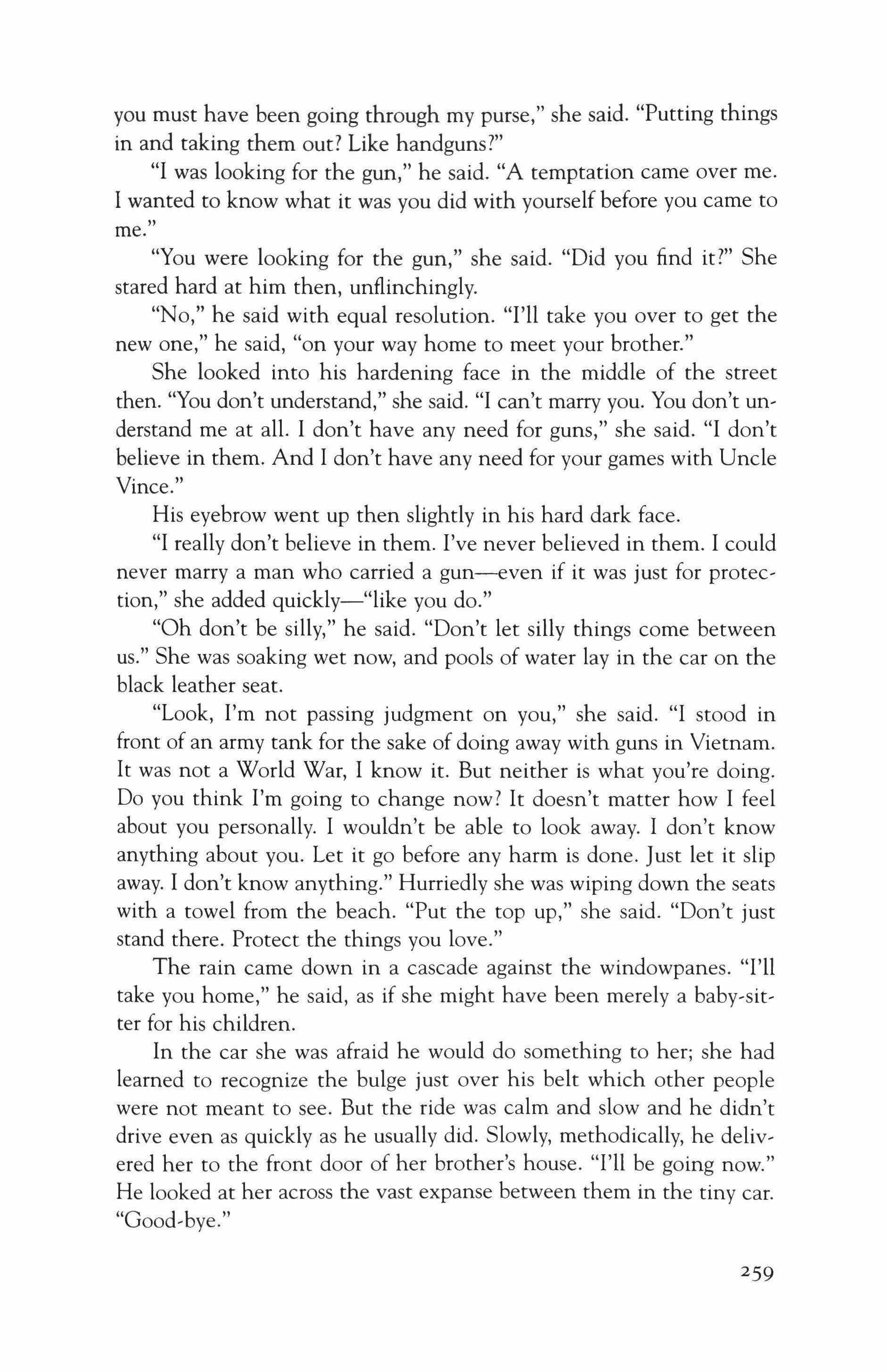
you must have been going through my purse," she said. "Putting things in and taking them out? Like handguns?"
"I was looking for the gun," he said. "A temptation came over me. I wanted to know what it was you did with yourself before you came to me.
"You were looking for the gun," she said. "Did you find it?" She stared hard at him then, unflinchingly.
"No," he said with equal resolution. "I'll take you over to get the new one," he said, "on your way home to meet your brother."
She looked into his hardening face in the middle of the street then. "You don't understand," she said. "I can't marry you. You don't understand me at all. I don't have any need for guns," she said. "I don't believe in them. And I don't have any need for your games with Uncle Vince."
His eyebrow went up then slightly in his hard dark face.
"I really don't believe in them. I've never believed in them. I could never marry a man who carried a gun-s-even if it was just for protection," she added quickly-"like you do."
"Oh don't be silly," he said. "Don't let silly things come between us." She was soaking wet now, and pools of water lay in the car on the black leather seat.
"Look, I'm not passing judgment on you," she said. "I stood in front of an army tank for the sake of doing away with guns in Vietnam. It was not a World War, I know it. But neither is what you're doing. Do you think I'm going to change now? It doesn't matter how I feel about you personally. I wouldn't be able to look away. I don't know anything about you. Let it go before any harm is done. Just let it slip away. I don't know anything." Hurriedly she was wiping down the seats with a towel from the beach. "Put the top up," she said. "Don't just stand there. Protect the things you love."
The rain came down in a cascade against the windowpanes. "I'll take you home," he said, as if she might have been merely a baby-sitter for his children.
In the car she was afraid he would do something to her; she had learned to recognize the bulge just over his belt which other people were not meant to see. But the ride was calm and slow and he didn't drive even as quickly as he usually did. Slowly, methodically, he delivered her to the front door of her brother's house. "I'll be going now." He looked at her across the vast expanse between them in the tiny car. "Good-bye."
259
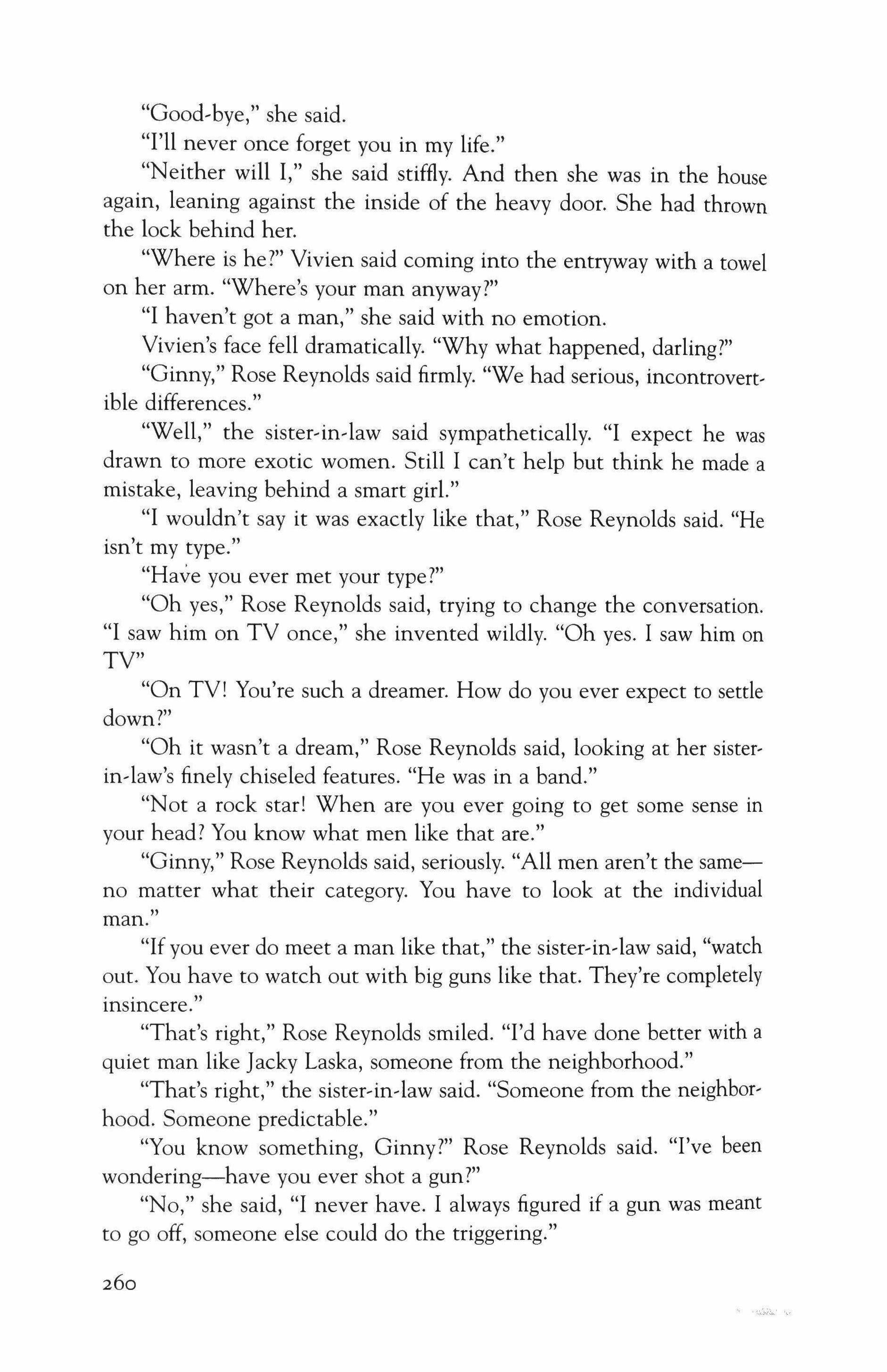
"Good-bye,' she said.
"I'll never once forget you in my life."
"Neither will I," she said stiffly. And then she was in the house again, leaning against the inside of the heavy door. She had thrown the lock behind her.
"Where is he?" Vivien said coming into the entryway with a towel on her arm. "Where's your man anyway?"
"I haven't got a man," she said with no emotion. Vivien's face fell dramatically. "Why what happened, darling?"
"Ginny," Rose Reynolds said firmly. "We had serious, incontrovertible differences."
"Well," the sister-in-law said sympathetically. "I expect he was drawn to more exotic women. Still I can't help but think he made a mistake, leaving behind a smart girl."
"I wouldn't say it was exactly like that," Rose Reynolds said. "He isn't my type."
"Have you ever met your type?"
"Oh yes," Rose Reynolds said, trying to change the conversation. "I saw him on TV once," she invented wildly. "Oh yes. I saw him on TV"
"On TV! You're such a dreamer. How do you ever expect to settle down?"
"Oh it wasn't a dream," Rose Reynolds said, looking at her sisterin-law's finely chiseled features. "He was in a band."
"Not a rock star! When are you ever going to get some sense in your head? You know what men like that are."
"Ginny," Rose Reynolds said, seriously. "All men aren't the sameno matter what their category. You have to look at the individual man."
"If you ever do meet a man like that," the sister-in-law said, "watch out. You have to watch out with big guns like that. They're completely " msmcere.
"That's right," Rose Reynolds smiled. "I'd have done better with a quiet man like Jacky Laska, someone from the neighborhood."
"That's right," the sister-in-law said. "Someone from the neighborhood. Someone predictable."
"You know something, Ginny?" Rose Reynolds said. "I've been wondering-have you ever shot a gun?"
"No," she said, "I never have. I always figured if a gun was meant to go off, someone else could do the triggering."

"Genevieve," Rose Reynolds said, staring at her new sister-in-law, "you have very dangerous ideas. You know, you emanate danger from your very bones. And you don't even know what you're doing."
"Do you think so?" the sister-in-law cried in exuberance. "Why that's the nicest thing anyone ever said to me. That's the very nicest thing."
"I didn't mean it as a compliment," Rose Reynolds said, but the sis, ter-m-law laughed and poured herself a drink on her way through the living room. On the patio she shot another spurt of lemonade into the summer air. In her bright green jumpsuit she sat down on one of the marble benches, where the dappled light moved through the maple trees in a golden stream, first over the statue of the man behind her, and then onto her hair.
"You know," Vivien said, "I nearly convinced your brother to have you committed during the middle of this summer, you were acting so strange," she said. "But then you got so happy suddenly. Now when I look back on it, I think what a terrible mistake that would have been."
"Good grief," Rose Reynolds coughed, as if it would have been a joke, being locked away for the rest of her life like that on a mistaken whim. It had never truly occurred to her that the old man might have been right. Perhaps she should have been grateful for that. But a hard pebble had begun to settle inside of her, a disagreeable rage.
"How did you get so much power in your life?" coldly she asked her sister-in-law, "How does it work with people like you, Ginny?"
"It's hard to say," the sister'in,law laughed, pouring from a bottle of gin into her lemonade, and working the zipper up and down on the front of her top a little, as if she had been fiddling with a necklace or someone's ring. "Sometimes I think I'm twisted inside out, but per' fectly, ever so perfectly. I thank God I was born myself and not some' one weak like Davie." And then she looked straight up into the angel's face. "My poor Davie," she keened and then she started to cry. Tears dribbled down her chin and onto the marble disk that encased the man. "You know they made him from a photograph. It looks just like him, it really does. My poor Davie. I'm so lucky your brother under, stands. He lost so many good friends."
But all Rose Reynolds could say was, "You were really going to throw my life entirely away. You were going to destroy it, just like that? Without even talking with me? You were really going to have me put away for not marrying that horrifying man?"
"No no, not just like that," the sister-in-law was crying. The tears

ran down. "With a lot of anxiety. You can't believe the pain I've had in my life. The pain is so great sometimes I can't bear living it. I should have seen it coming, Davie. I should have stopped it."
When Rose Reynolds stopped staring off over the wrought iron railing, after she had walked around the gardens and the pool to return, she found that the sister-in-law was crying still; she was sitting on the marble table top itself, her arms and legs enveloping the naked torso like a vine, her sobbing face pressed into the belly of the winged man.
"Me? Me? You were really going to lock me up in an asylum-for not appeasing you?" Rose Reynolds muttered at the woman's back. She stood aside then and walked into the house-away from her brother's wife shattering around the marble statue in her new backyard, while she herself, Rose Reynolds, was shaking inwardly from head to foot. And when to her great surprise the knock came at the front door, she opened it. It was unclear at first for whom these policemen were meant or why her sister-in-law had called them. Rose merely pointed toward the yard and, as they went, picked up her purse and walked toward the street, the sloping hills, and the bus that would, she hoped, carry her away in time enough.
Ricardo Pau Llosa
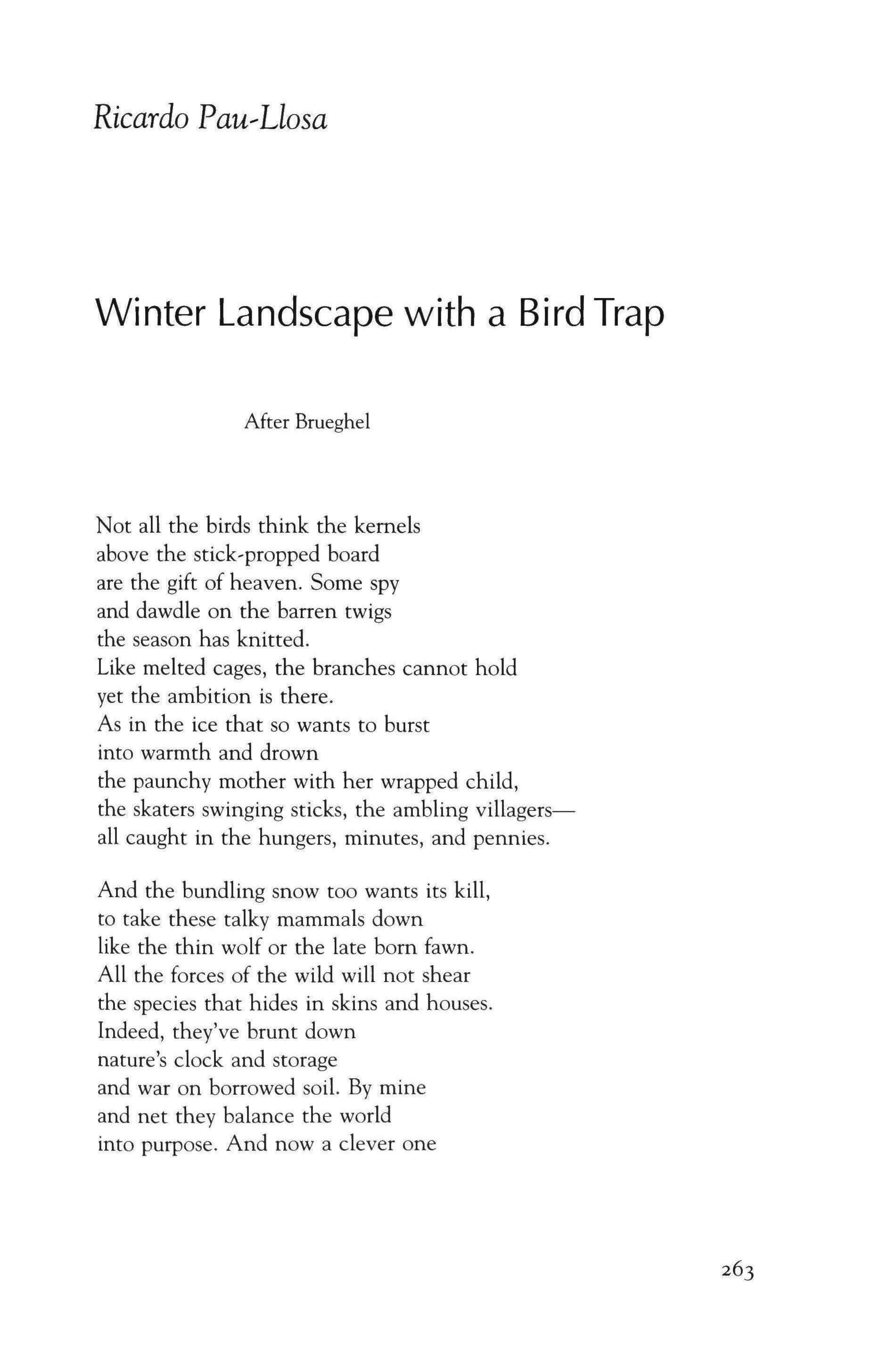
Winter Landscape with a Bird Trap
After Brueghel
Not all the birds think the kernels above the stick-propped board are the gift of heaven. Some spy and dawdle on the barren twigs the season has knitted. Like melted cages, the branches cannot hold yet the ambition is there. As in the ice that so wants to burst into warmth and drown the paunchy mother with her wrapped child, the skaters swinging sticks, the ambling villagersall caught in the hungers, minutes, and pennies.
And the bundling snow too wants its kill, to take these talky mammals down like the thin wolf or the late born fawn. All the forces of the wild will not shear the species that hides in skins and houses. Indeed, they've brunt down nature's clock and storage and war on borrowed soil. By mine and net they balance the world into purpose. And now a clever one
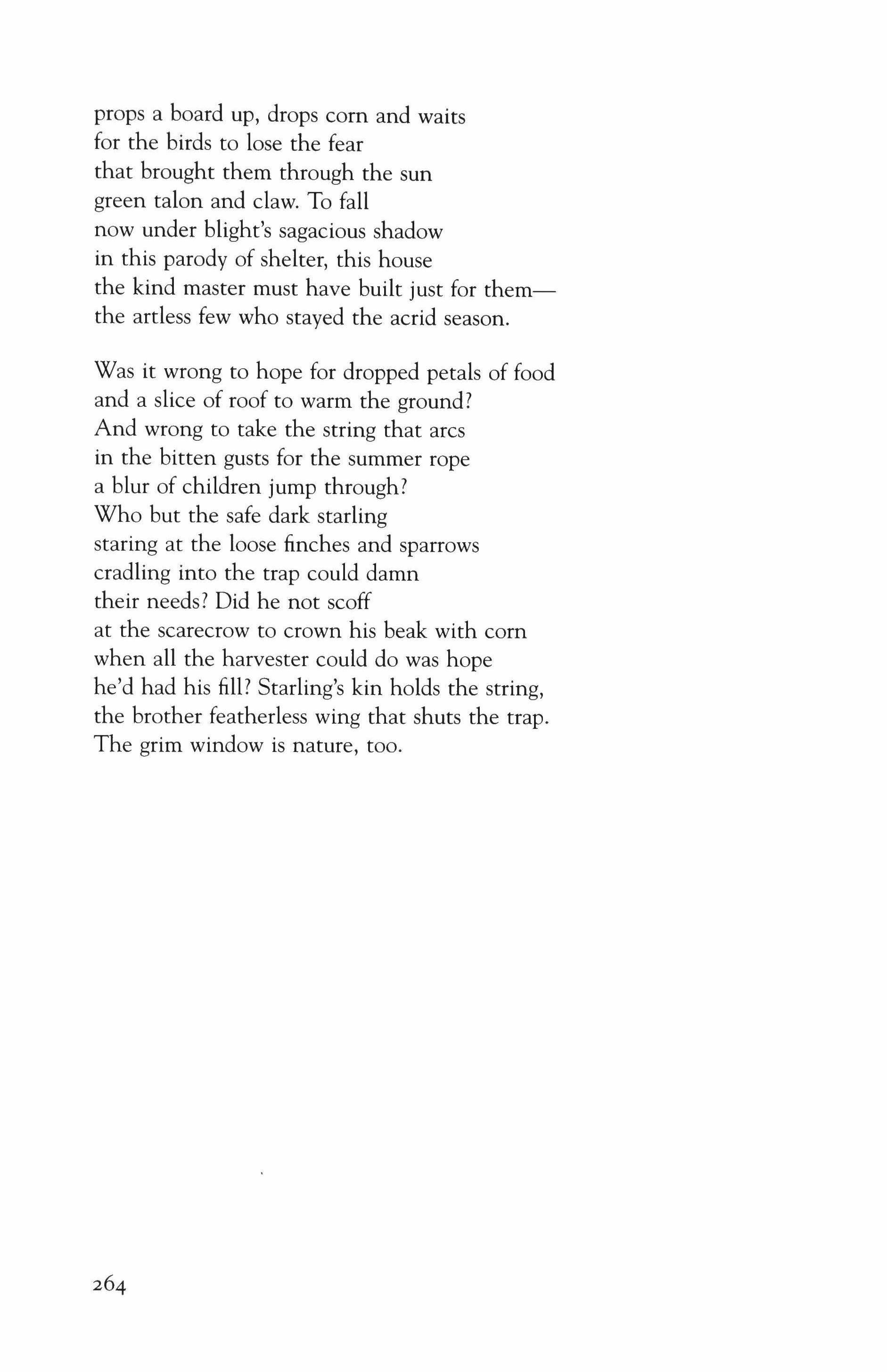
props a board up, drops corn and waits for the birds to lose the fear that brought them through the sun green talon and claw. To fall now under blight's sagacious shadow in this parody of shelter, this house the kind master must have built just for themthe artless few who stayed the acrid season.
Was it wrong to hope for dropped petals of food and a slice of roof to warm the ground? And wrong to take the string that arcs in the bitten gusts for the summer rope a blur of children jump through? Who but the safe dark starling staring at the loose finches and sparrows cradling into the trap could damn their needs? Did he not scoff at the scarecrow to crown his beak with corn when all the harvester could do was hope he'd had his fill? Starling's kin holds the string, the brother featherless wing that shuts the trap. The grim window is nature, too.
Parable Hunter
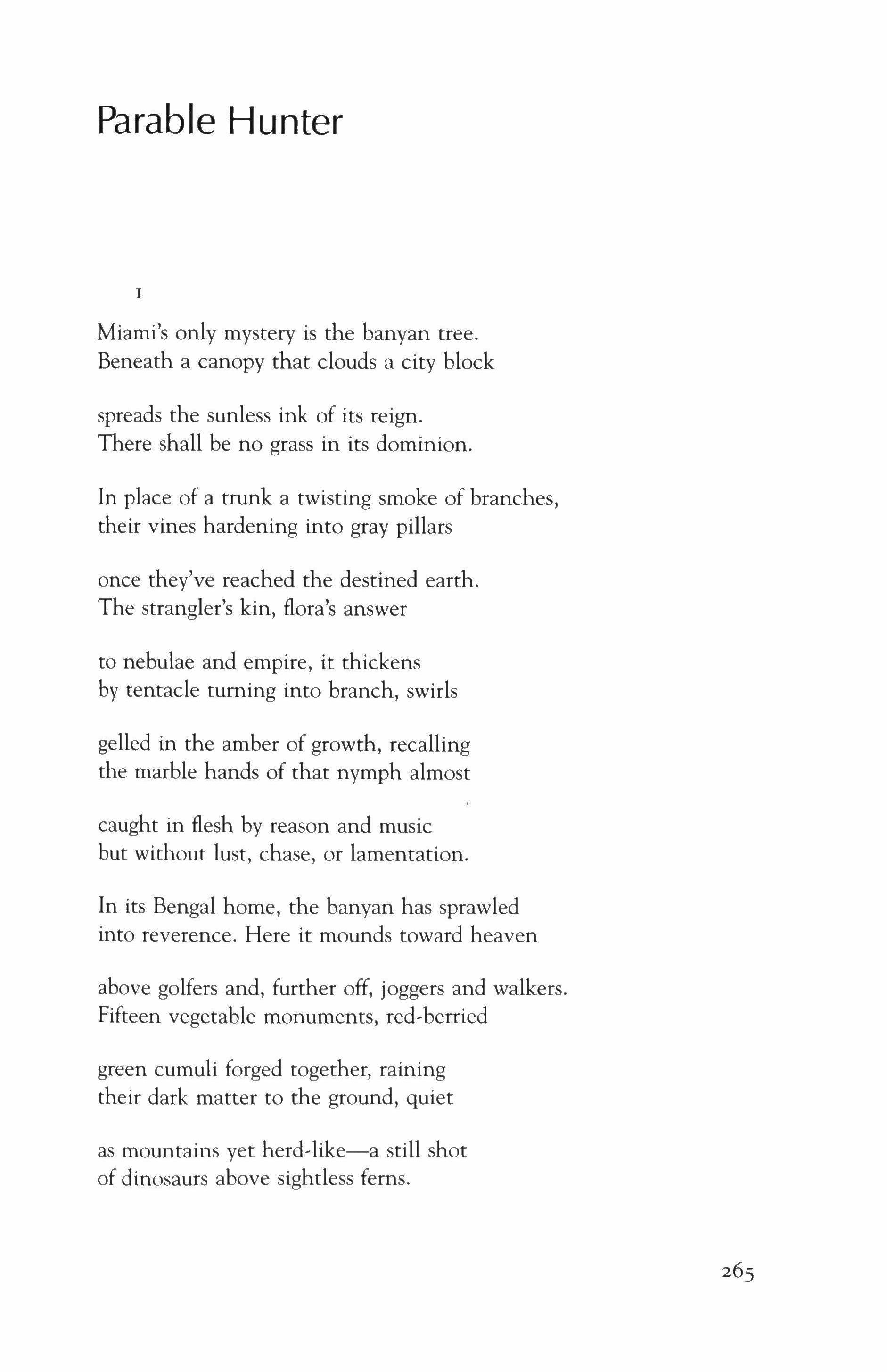
Miami's only mystery is the banyan tree. Beneath a canopy that clouds a city block
spreads the sunless ink of its reign. There shall be no grass in its dominion.
In place of a trunk a twisting smoke of branches, their vines hardening into gray pillars
once they've reached the destined earth. The strangler's kin, flora's answer
to nebulae and empire, it thickens by tentacle turning into branch, swirls
gelled in the amber of growth, recalling the marble hands of that nymph almost
caught in flesh by reason and music but without lust, chase, or lamentation.
In its Bengal home, the banyan has sprawled into reverence. Here it mounds toward heaven
above golfers and, further off, joggers and walkers. Fifteen vegetable monuments, red-berried
green cumuli forged together, raining their dark matter to the ground, quiet
as mountains yet herd-like-a still shot of dinosaurs above sightless ferns.
Tiny golfers smoke and chat about their rim, scattered like dropped coins
on the regulation green, its shades shifting like an estuary in failing light.
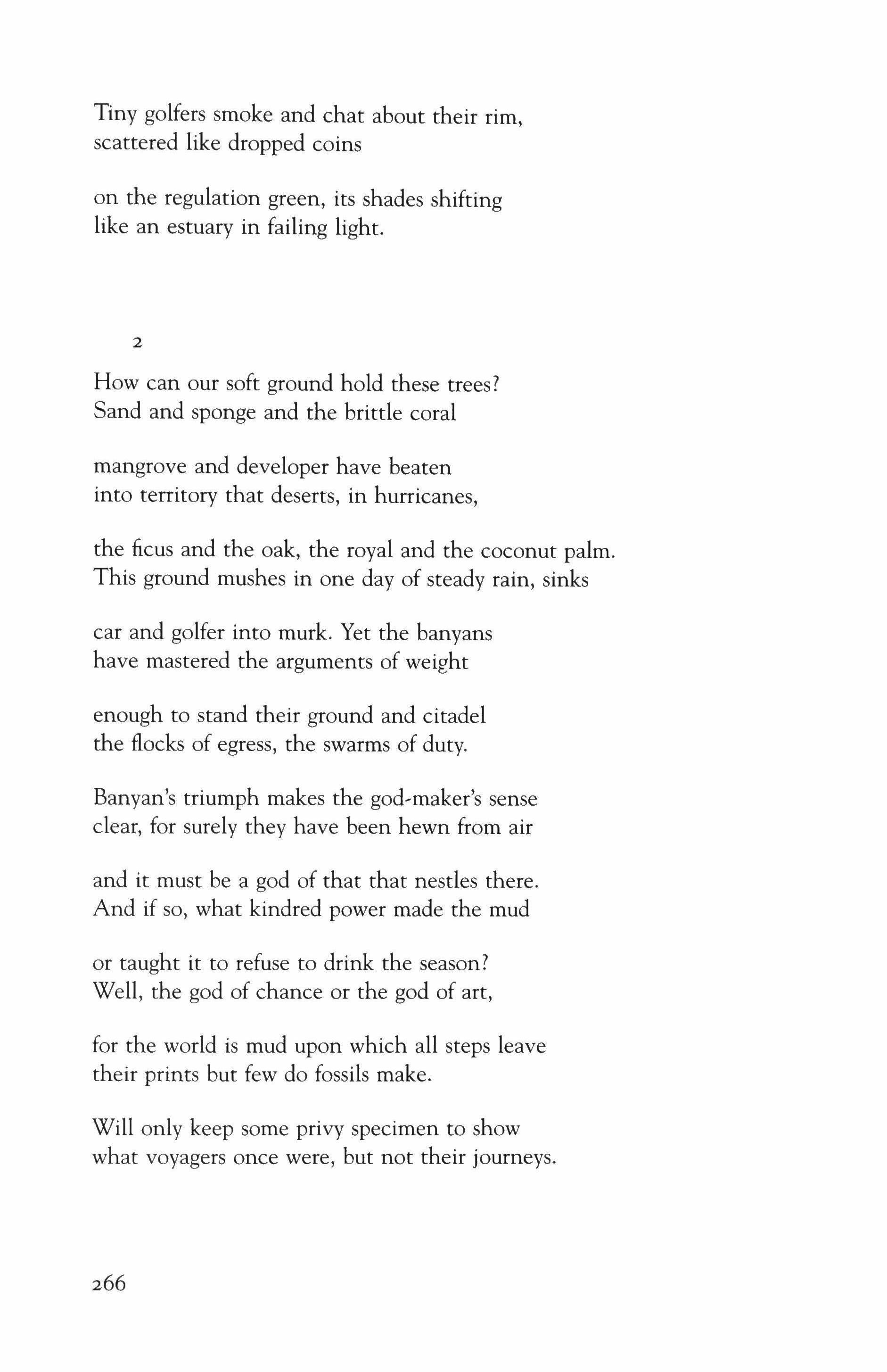
2
How can our soft ground hold these trees?
Sand and sponge and the brittle coral
mangrove and developer have beaten into territory that deserts, in hurricanes, the ficus and the oak, the royal and the coconut palm. This ground mushes in one day of steady rain, sinks
car and golfer into murk. Yet the banyans have mastered the arguments of weight
enough to stand their ground and citadel the flocks of egress, the swarms of duty.
Banyan's triumph makes the god-maker's sense clear, for surely they have been hewn from air
and it must be a god of that that nestles there. And if so, what kindred power made the mud
or taught it to refuse to drink the season?
Well, the god of chance or the god of art, for the world is mud upon which all steps leave their prints but few do fossils make.
Will only keep some privy specimen to show what voyagers once were, but not their journeys.
266
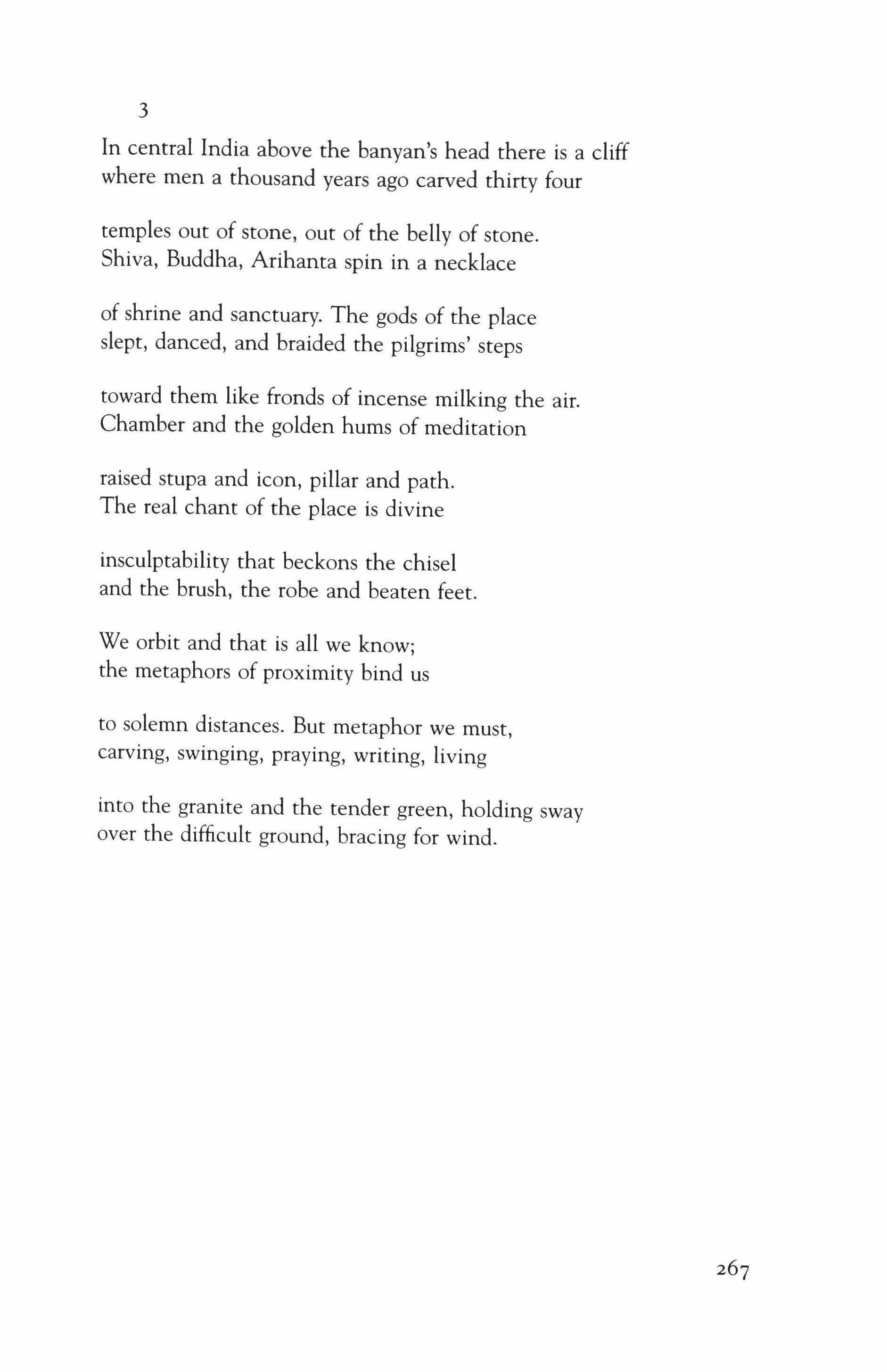
In central India above the banyan's head there is a cliff where men a thousand years ago carved thirty four temples out of stone, out of the belly of stone. Shiva, Buddha, Arihanta spin in a necklace of shrine and sanctuary. The gods of the place slept, danced, and braided the pilgrims' steps toward them like fronds of incense milking the air. Chamber and the golden hums of meditation raised stupa and icon, pillar and path. The real chant of the place is divine insculptability that beckons the chisel and the brush, the robe and beaten feet. We orbit and that is all we know; the metaphors of proximity bind us to solemn distances. But metaphor we must, carving, swinging, praying, writing, living into the granite and the tender green, holding sway over the difficult ground, bracing for wind.
3
Conjuring Bear
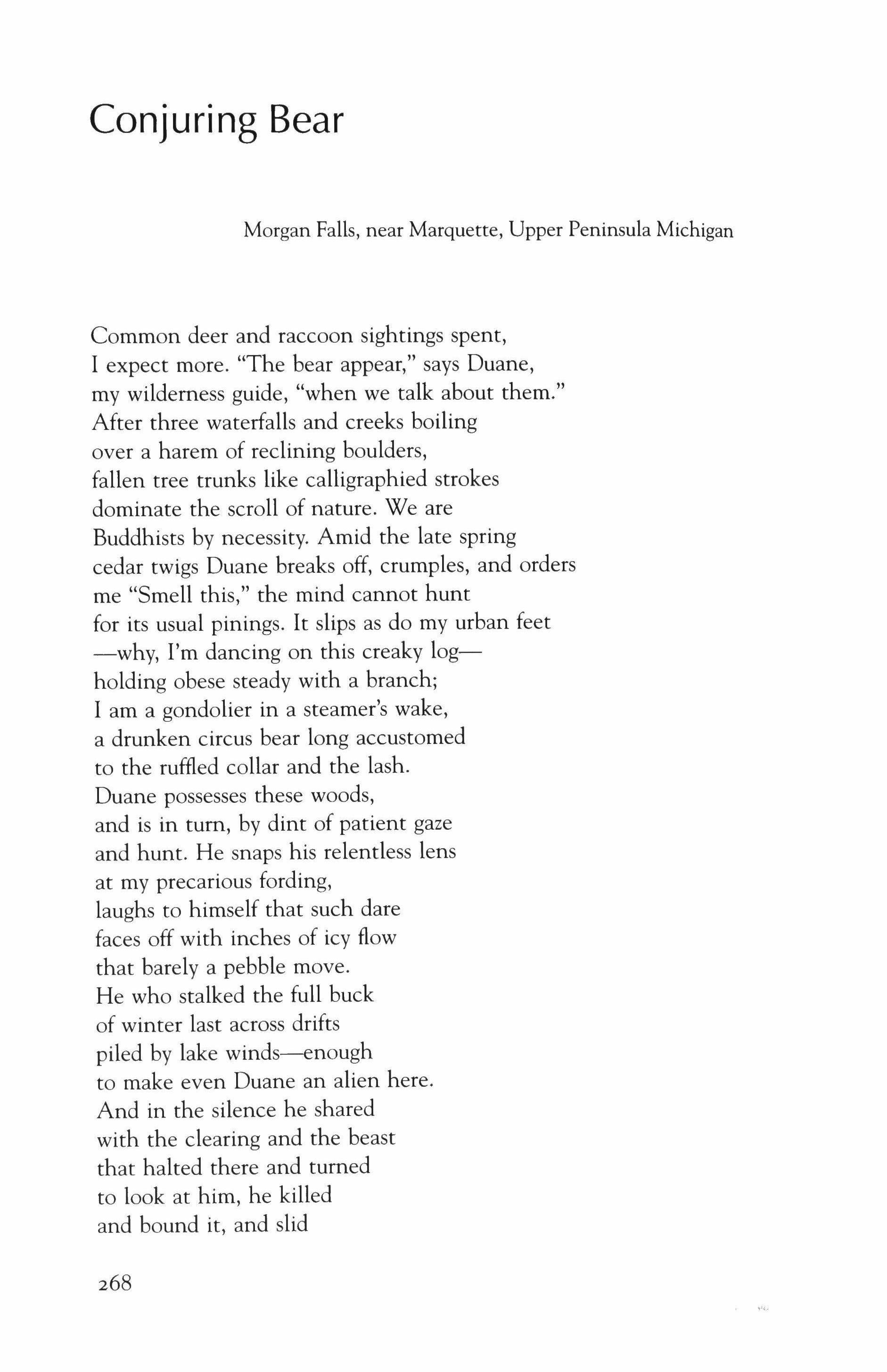
Morgan Falls, near Marquette, Upper Peninsula Michigan
Common deer and raccoon sightings spent, I expect more. "The bear appear," says Duane, my wilderness guide, "when we talk about them." After three waterfalls and creeks boiling over a harem of reclining boulders, fallen tree trunks like calligraphied strokes dominate the scroll of nature. We are Buddhists by necessity. Amid the late spring cedar twigs Duane breaks off, crumples, and orders me "Smell this," the mind cannot hunt for its usual pinings. It slips as do my urban feet -why, I'm dancing on this creaky logholding obese steady with a branch; I am a gondolier in a steamer's wake, a drunken circus bear long accustomed to the ruffled collar and the lash. Duane possesses these woods, and is in tum, by dint of patient gaze and hunt. He snaps his relentless lens at my precarious fording, laughs to himself that such dare faces off with inches of icy flow that barely a pebble move. He who stalked the full buck of winter last across drifts piled by lake winds-enough to make even Duane an alien here. And in the silence he shared with the clearing and the beast that halted there and turned to look at him, he killed and bound it, and slid
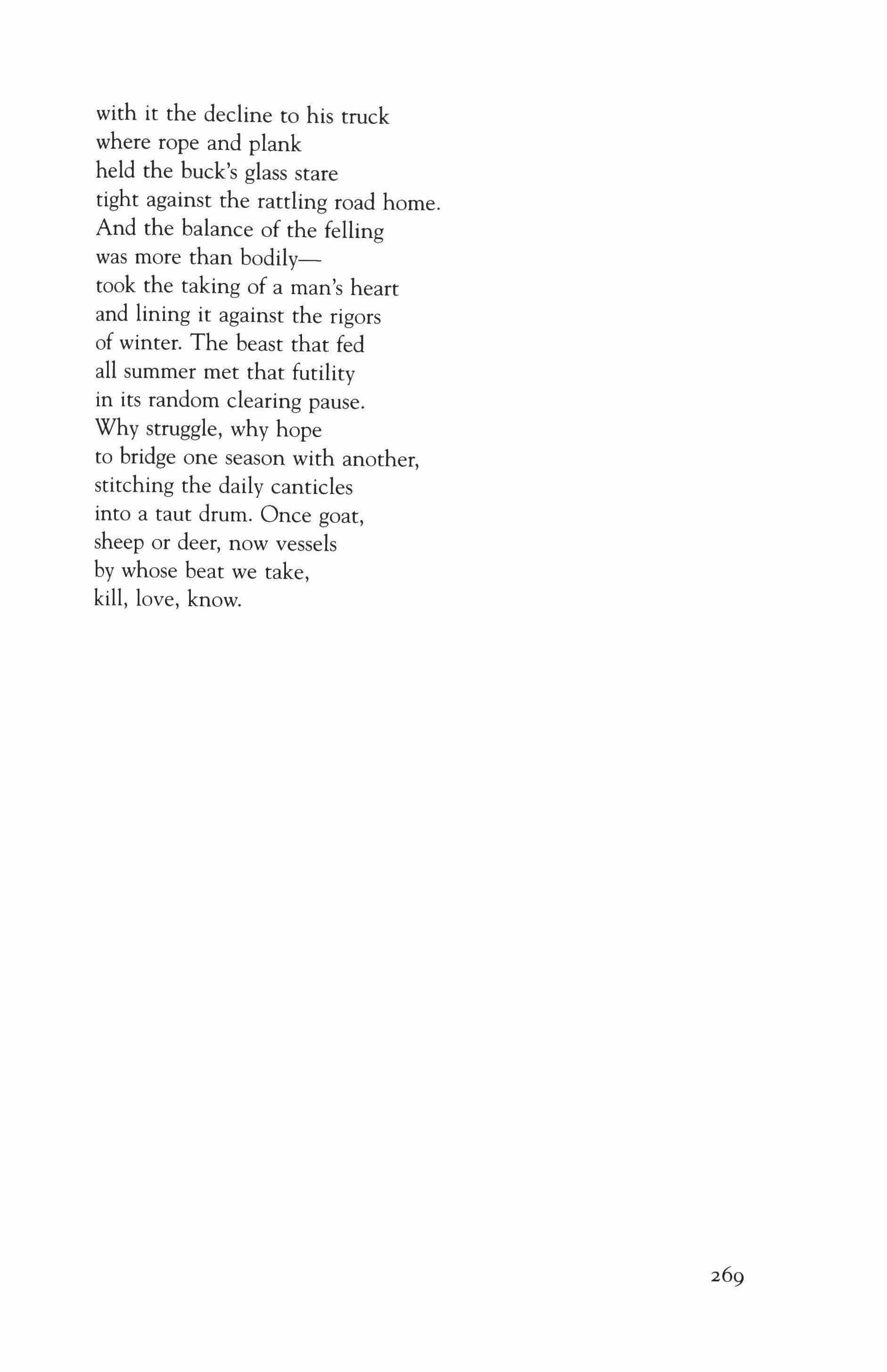
with it the decline to his truck where rope and plank held the buck's glass stare tight against the rattling road home. And the balance of the felling was more than bodilytook the taking of a man's heart and lining it against the rigors of winter. The beast that fed all summer met that futility in its random clearing pause. Why struggle, why hope to bridge one season with another, stitching the daily canticles into a taut drum. Once goat, sheep or deer, now vessels by whose beat we take, kill, love, know.
]onathan Fink
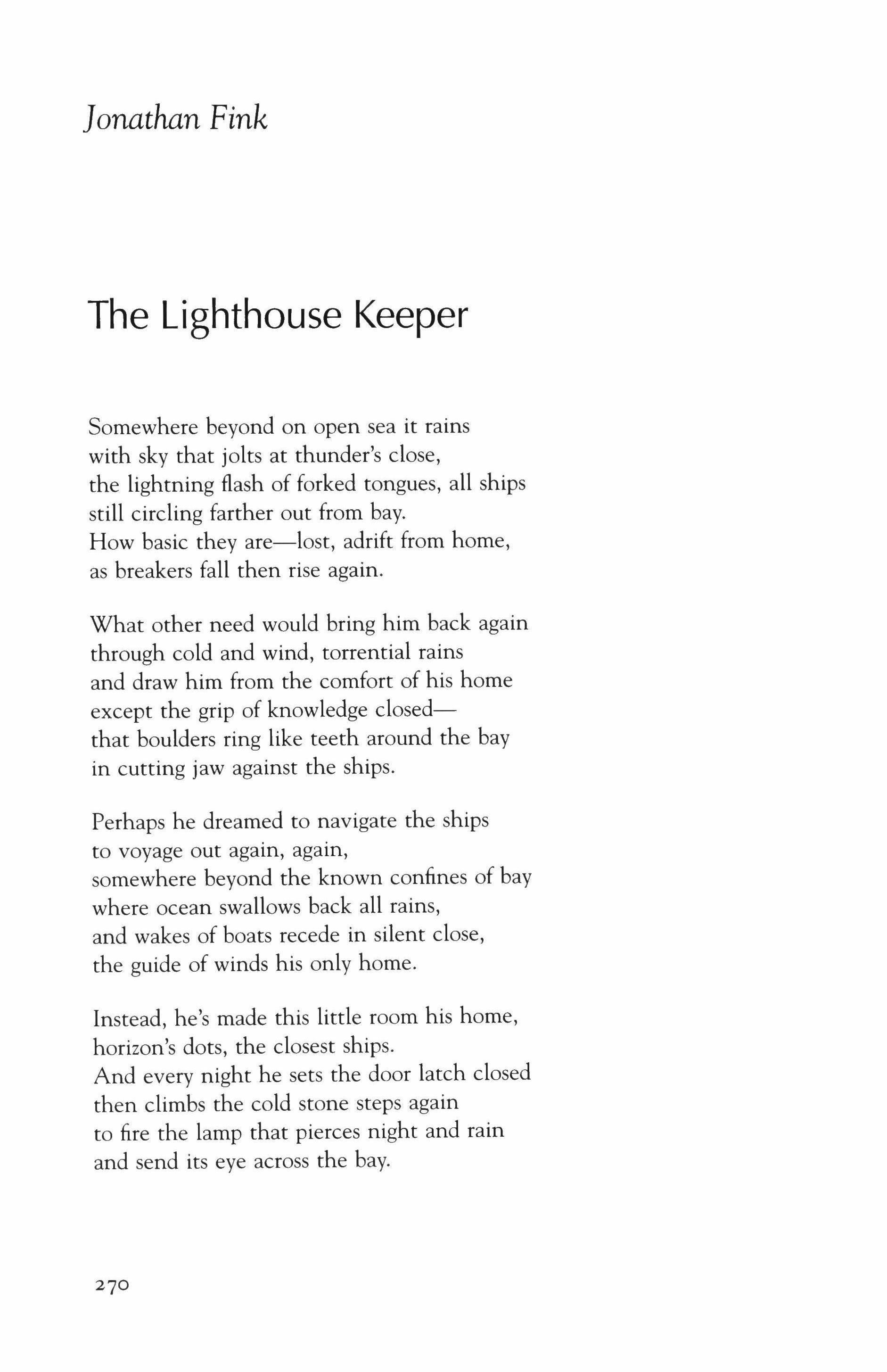
The Lighthouse Keeper
Somewhere beyond on open sea it rains with sky that jolts at thunder's close, the lightning flash of forked tongues, all ships still circling farther out from bay. How basic they are-lost, adrift from home, as breakers fall then rise again.
What other need would bring him back again through cold and wind, torrential rains and draw him from the comfort of his home except the grip of knowledge closedthat boulders ring like teeth around the bay in cutting jaw against the ships.
Perhaps he dreamed to navigate the ships to voyage out again, again, somewhere beyond the known confines of bay where ocean swallows back all rains, and wakes of boats recede in silent close, the guide of winds his only home.
Instead, he's made this little room his home, horizon's dots, the closest ships. And every night he sets the door latch closed then climbs the cold stone steps again to fire the lamp that pierces night and rain and send its eye across the bay.

Consider how the lighthouse looks from baydescending beam, the sky its home. Within the torrents, blackness, swells of rain the sailors writhing with their ships still cry out loud at light's first sight again, the ancient sign of journey's close.
Yet what can lighthouse keeper speak of close? The sailors, once they reach the bay, already have forgotten him again, absconding landward to their homes. And what can stop the constant flux of ships unbidden and abrupt as rain?
With close of night descending on the bay and ships forever lost in rain, he gives again the thankless gift of home.
Passage
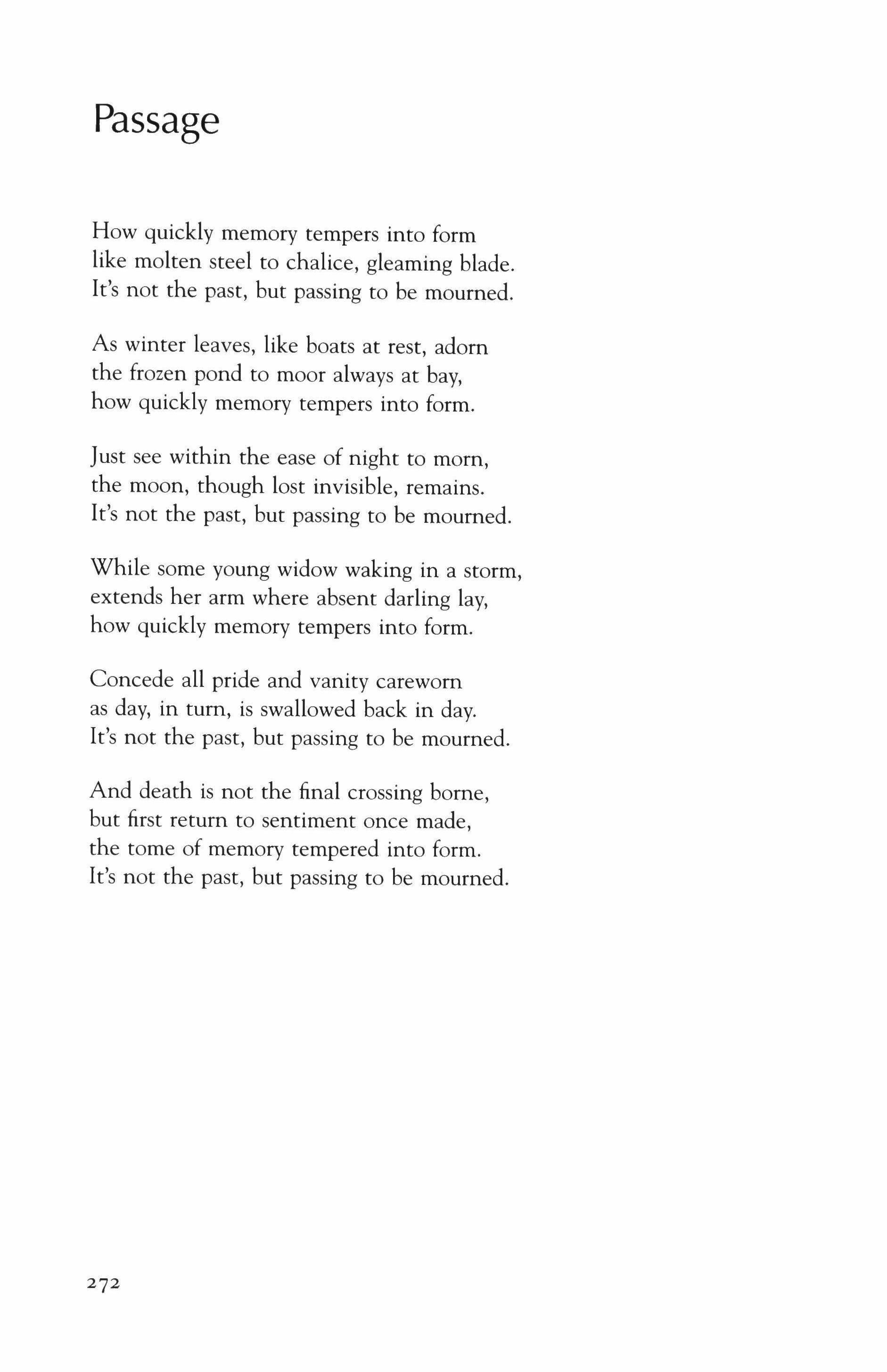
How quickly memory tempers into form like molten steel to chalice, gleaming blade. It's not the past, but passing to be mourned.
As winter leaves, like boats at rest, adorn the frozen pond to moor always at bay, how quickly memory tempers into form.
Just see within the ease of night to morn, the moon, though lost invisible, remains. It's not the past, but passing to be mourned.
While some young widow waking in a storm, extends her arm where absent darling lay, how quickly memory tempers into form.
Concede all pride and vanity careworn as day, in turn, is swallowed back in day. It's not the past, but passing to be mourned.
And death is not the final crossing borne, but first return to sentiment once made, the tome of memory tempered into form. It's not the past, but passing to be mourned.
R. D. Skillings
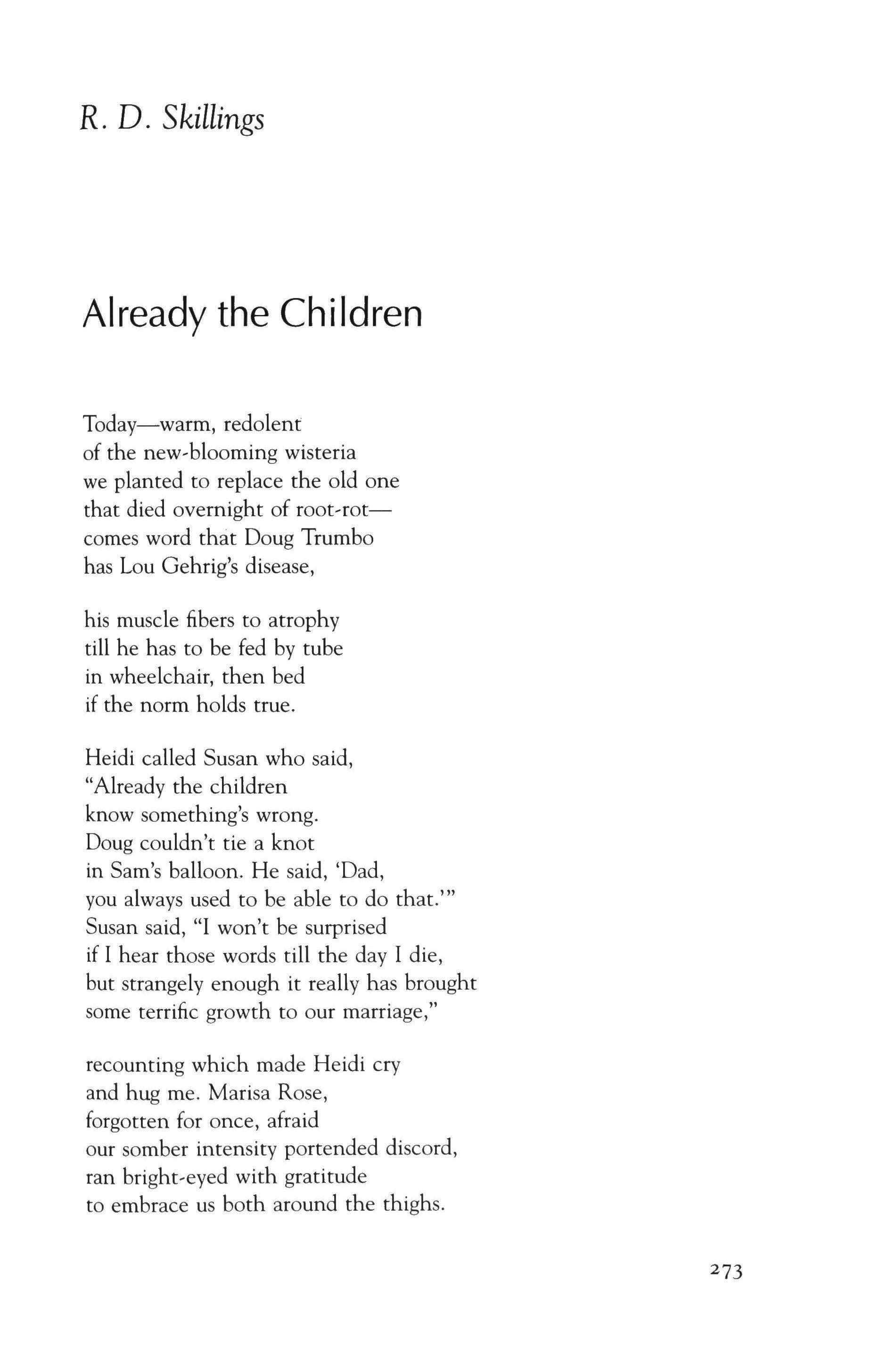
Already the Children
Today-warm, redolent of the new-blooming wisteria we planted to replace the old one that died overnight of root-rot-scomes word that Doug Trumbo has Lou Gehrig's disease, his muscle fibers to atrophy till he has to be fed by tube in wheelchair, then bed if the norm holds true.
Heidi called Susan who said, "Already the children know something's wrong. Doug couldn't tie a knot in Sam's balloon. He said, 'Dad, you always used to be able to do that.'" Susan said, "I won't be surprised if I hear those words till the day I die, but strangely enough it really has brought some terrific growth to our marriage,"
recounting which made Heidi cry and hug me. Marisa Rose, forgotten for once, afraid our somber intensity portended discord, ran bright-eyed with gratitude to embrace us both around the thighs.
273
All Things Shimmering There
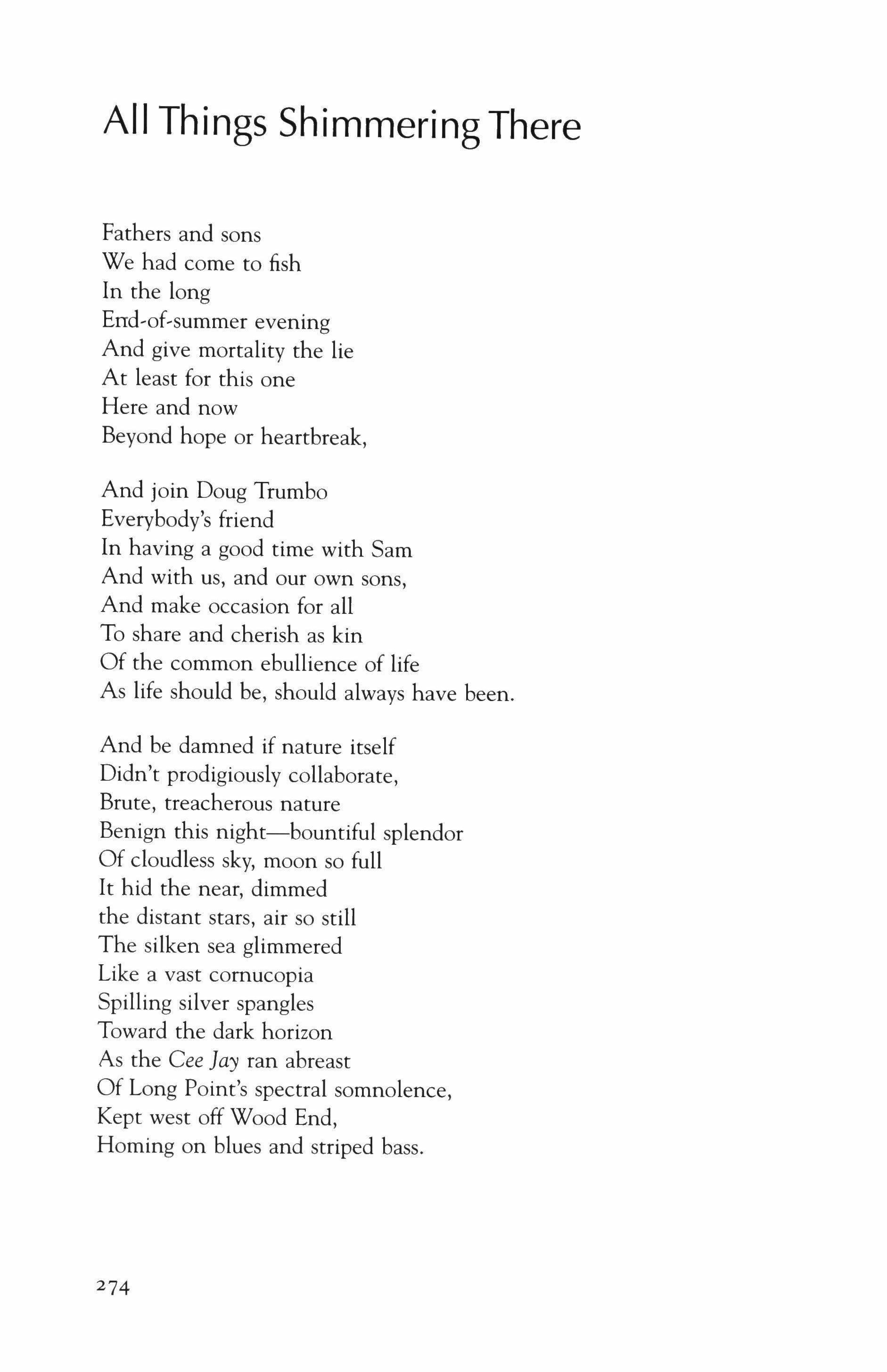
Fathers and sons
We had come to fish
In the long End-of-summer evening
And give mortality the lie
At least for this one
Here and now
Beyond hope or heartbreak,
And join Doug Trumbo
Everybody's friend
In having a good time with Sam
And with us, and our own sons, And make occasion for all
To share and cherish as kin
Of the common ebullience of life
As life should be, should always have been.
And be damned if nature itself
Didn't prodigiously collaborate, Brute, treacherous nature
Benign this night-bountiful splendor
Of cloudless sky, moon so full It hid the near, dimmed the distant stars, air so still The silken sea glimmered
Like a vast cornucopia
Spilling silver spangles
Toward the dark horizon
As the Cee Jay ran abreast
Of Long Point's spectral somnolence, Kept west off Wood End, Homing on blues and striped bass.
274

It was warm, felt so balmy There might have been Palms and palmettos astern Instead of pitch pines and compass grass, Seasons of ice and gales ahead.
Round about all was clear and calm, And none lost nor tried to subdue The awed, marveling tone Of contrapuntal accord In their voices
That never the whole trip Slackened or ceased
Lauding how rare, how providential, How perfect an evening this evening was.
Impatience adrift in tranquillity, Jason Mauro caught the first fish, Then all was concentrated turbulence As one after another striped bass Struck, fought and got reeled in, Came thrashing aboard, gaffed from: its element Into alien air, jolted down Upon bottom more unyielding Than any since their birth In the rocky river-beds of the north.
Mouths ripped free of hooks, Kicked and shuffled from underfoot, They ended together, Stowed between the rows of center benches, Of no more immediate interest Than which might be longest, Weigh most. Once, twice, thrice They coiled and thumped their tails, Then bore without comprehension Their lone, incommunicable fate,
275
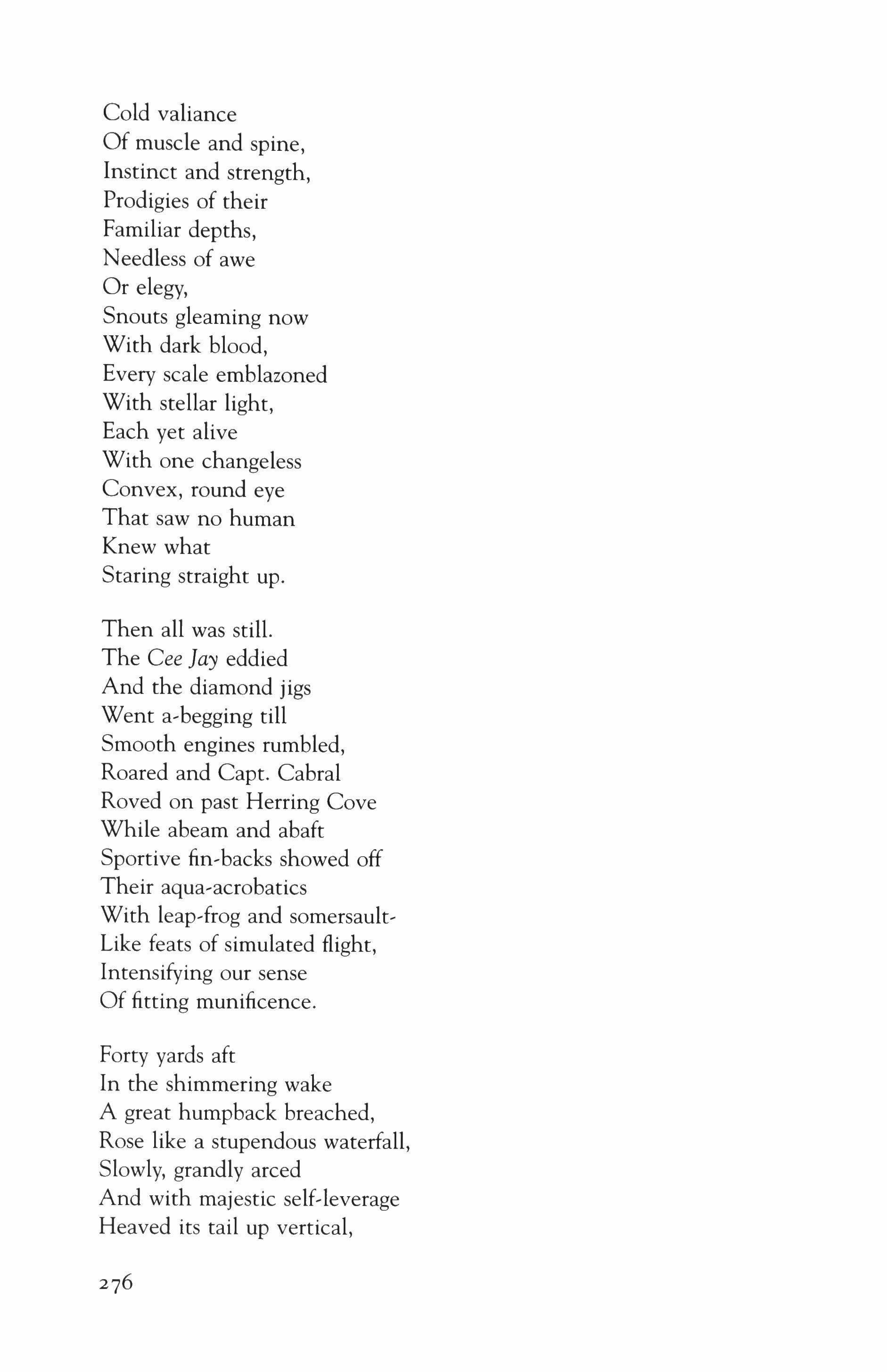
Cold valiance
Of muscle and spine, Instinct and strength, Prodigies of their Familiar depths, Needless of awe
Or elegy, Snouts gleaming now
With dark blood, Every scale emblazoned
With stellar light, Each yet alive
With one changeless
Convex, round eye
That saw no human Knew what
Staring straight up.
Then all was still.
The Cee Jay eddied And the diamond jigs
Went a-begging till Smooth engines rumbled, Roared and Capt. Cabral
Roved on past Herring Cove
While abeam and abaft
Sportive fin-backs showed off Their aqua-acrobatics
With leap-frog and somersault
Like feats of simulated flight, Intensifying our sense Of fitting munificence.
Forty yards aft
In the shimmering wake
A great humpback breached, Rose like a stupendous waterfall, Slowly, grandly arced
And with majestic self-leverage
Heaved its tail up vertical,
Stood on its brow, Flukes splayed to the sky, stalled, Then with resistless acceleration
Slid beneath the silver swell
Hardly lifting a lip of foam, Unseen by eyes fore-vigilant

Though soon,
Engines throttled down and cut, The boat lost way and softly rode
Atop a roiled and raging chop
All gaped at cleft and gripped
By rival, wild identities,
Then with greedy haste unreeled
A shallow school of diamond jigs
To tempt the frenzied bluefish
From their panicked sand-eel prey-
Blues, those vicious biters, Gluttons that like full-belied
Romans at a bacchanal
Regurgitate to gorge again, Puke, gorge, puke and gorge
Till nothing's left and they Haste elsewhere after more.
Three inch steel hooks
Stuff no gut; but a single gulp
Sates the gobbler, whereat
It's yank, gaff, rip, thump and flop
A few last times on the gory boards
Umeasured among the royal bass
That to be kept must be of size, yet
All alike bound for the human gullet.
These piscatorial rites played out tirelessly
Heedless of deepening chill
Beneath the high, stark moon
Though it seemed but a fleeting glimpse
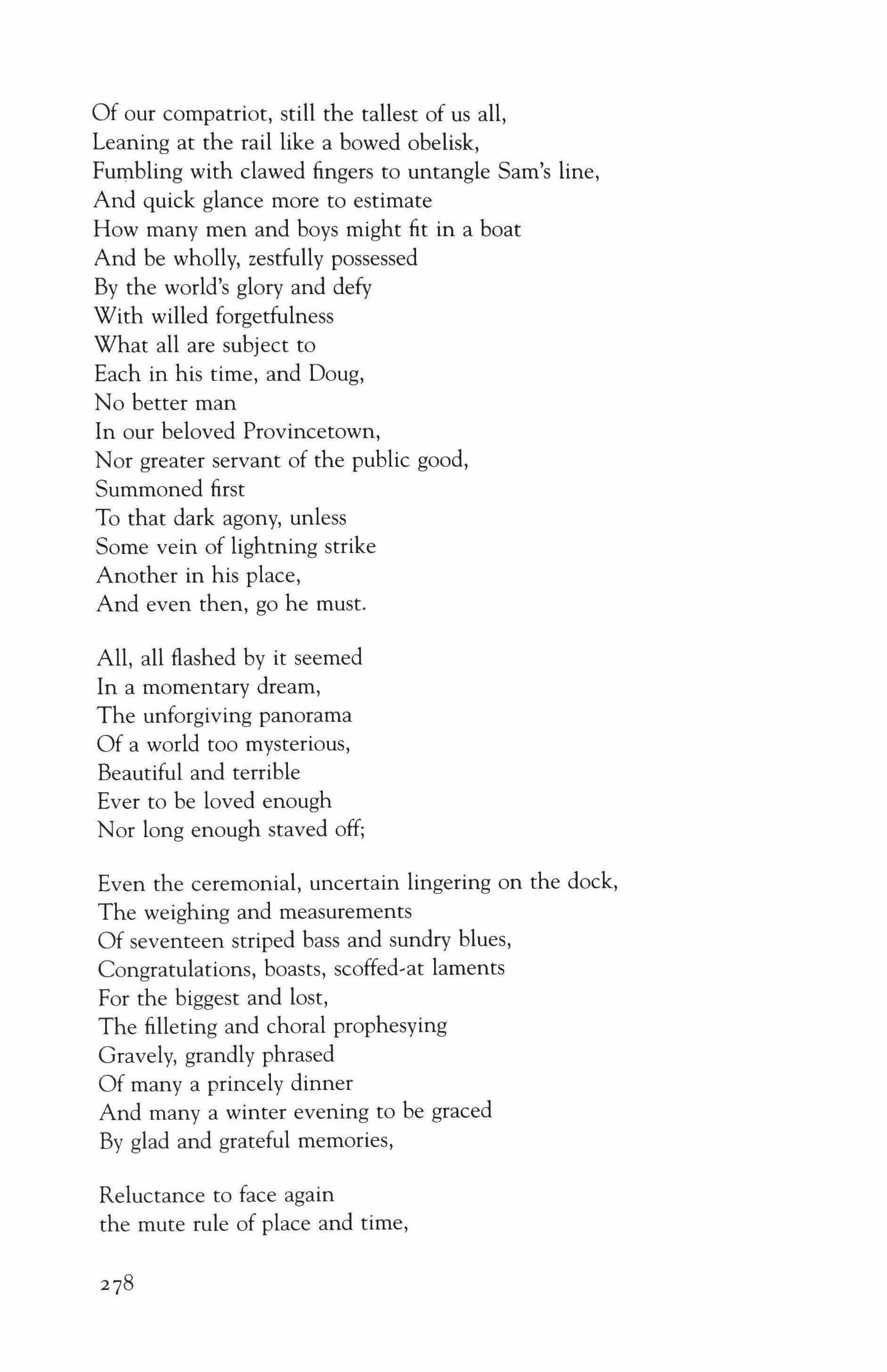
Of our compatriot, still the tallest of us all, Leaning at the rail like a bowed obelisk, Fumbling with clawed fingers to untangle Sam's line, And quick glance more to estimate How many men and boys might fit in a boat And be wholly, zestfully possessed By the world's glory and defy With willed forgetfulness
What all are subject to Each in his time, and Doug, No better man
In our beloved Provincetown, Nor greater servant of the public good, Summoned first
To that dark agony, unless Some vein of lightning strike Another in his place, And even then, go he must.
All, all flashed by it seemed In a momentary dream, The unforgiving panorama Of a world too mysterious, Beautiful and terrible Ever to be loved enough Nor long enough staved off;
Even the ceremonial, uncertain lingering on the dock, The weighing and measurements Of seventeen striped bass and sundry blues, Congratulations, boasts, scoffed-at laments
For the biggest and lost, The filleting and choral prophesying Gravely, grandly phrased Of many a princely dinner
And many a winter evening to be graced By glad and grateful memories,
Reluctance to face again the mute rule of place and time,
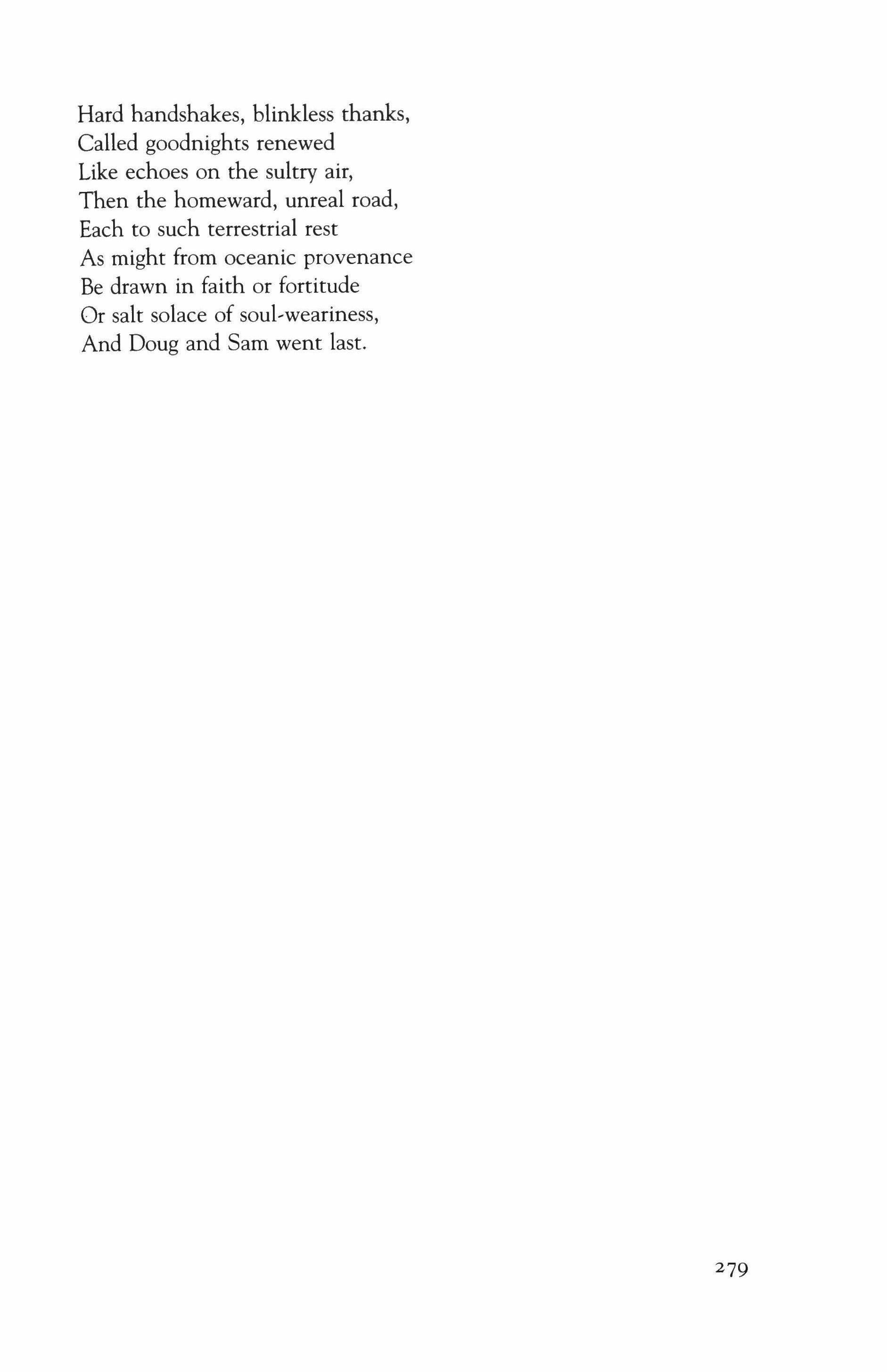
Hard handshakes, blinkless thanks, Called goodnights renewed Like echoes on the sultry air, Then the homeward, unreal road, Each to such terrestrial rest
As might from oceanic provenance Be drawn in faith or fortitude Or salt solace of soul-weariness, And Doug and Sam went last.
279
It's Not the Deaths
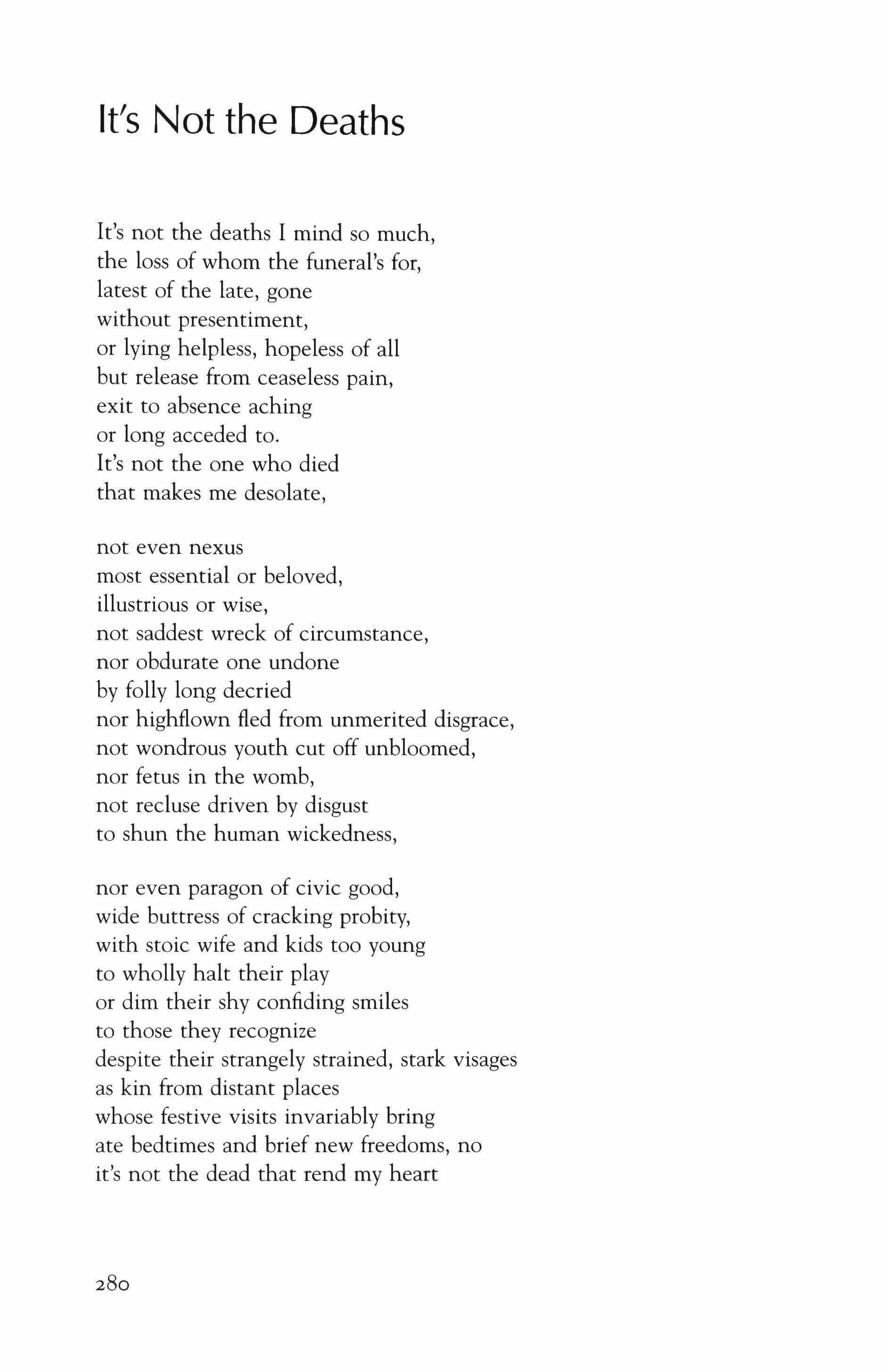
It's not the deaths I mind so much, the loss of whom the funeral's for, latest of the late, gone without presentiment, or lying helpless, hopeless of all but release from ceaseless pain, exit to absence aching or long acceded to. It's not the one who died that makes me desolate, not even nexus most essential or beloved, illustrious or wise, not saddest wreck of circumstance, nor obdurate one undone by folly long decried nor highflown fled from unmerited disgrace, not wondrous youth cut off unbloomed, nor fetus in the womb, not recluse driven by disgust to shun the human wickedness,
nor even paragon of civic good, wide buttress of cracking probity, with stoic wife and kids too young to wholly halt their play or dim their shy confiding smiles to those they recognize despite their strangely strained, stark visages as kin from distant places whose festive visits invariably bring ate bedtimes and brief new freedoms, no it's not the dead that rend my heart
280
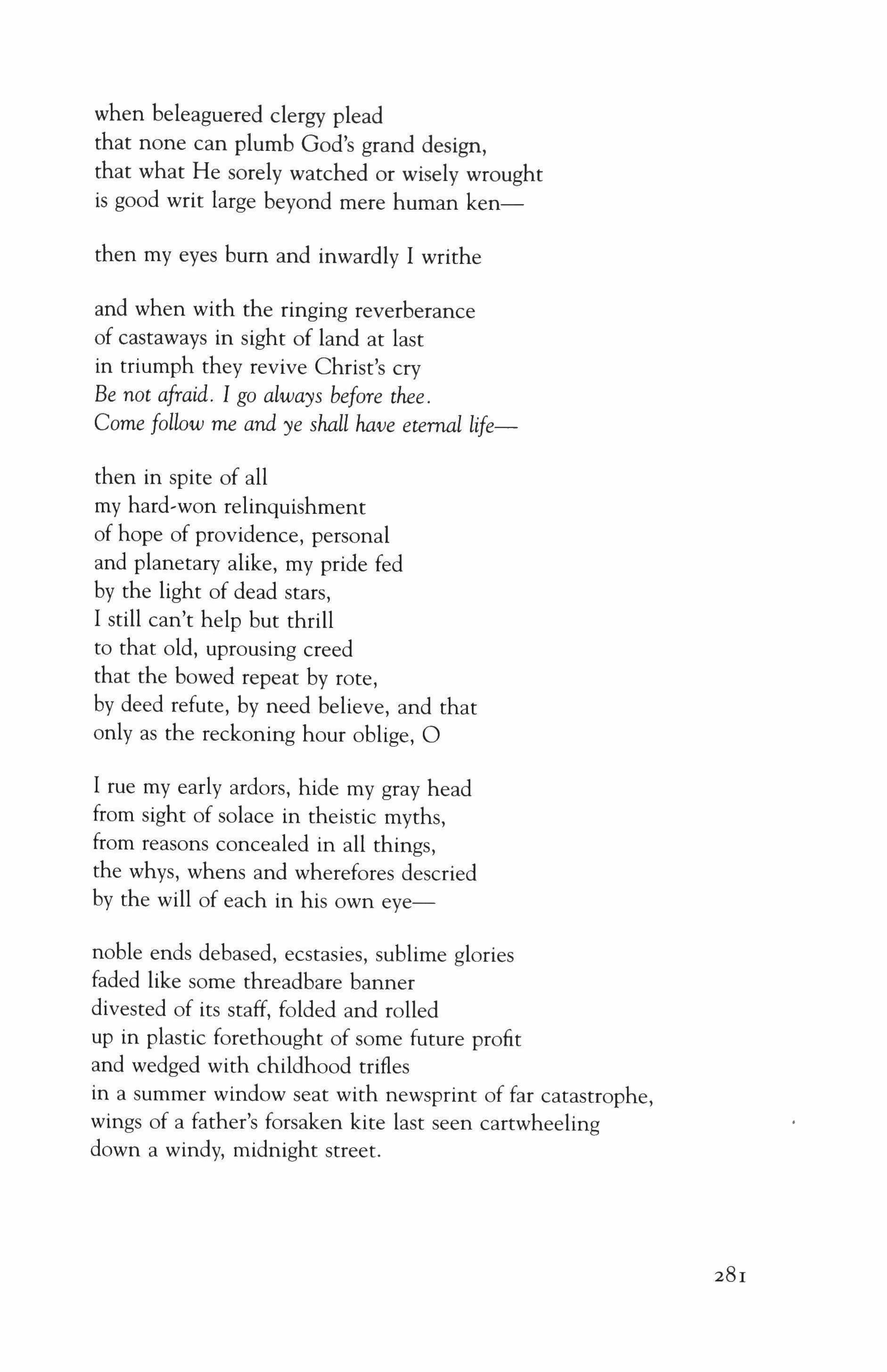
when beleaguered clergy plead that none can plumb God's grand design, that what He sorely watched or wisely wrought is good writ large beyond mere human ken-
then my eyes bum and inwardly I writhe and when with the ringing reverberance of castaways in sight of land at last in triumph they revive Christ's cry Be not afraid. I go always before thee. Come follow me and ye shall have eternal life-
then in spite of all my hard-won relinquishment of hope of providence, personal and planetary alike, my pride fed by the light of dead stars, I still can't help but thrill to that old, uprousing creed that the bowed repeat by rote, by deed refute, by need believe, and that only as the reckoning hour oblige, 0
I rue my early ardors, hide my gray head from sight of solace in theistic myths, from reasons concealed in all things, the whys, whens and wherefores descried by the will of each in his own eye-
noble ends debased, ecstasies, sublime glories faded like some threadbare banner divested of its staff, folded and rolled up in plastic forethought of some future profit and wedged with childhood trifles in a summer window seat with newsprint of far catastrophe, wings of a father's forsaken kite last seen cartwheeling down a windy, midnight street.
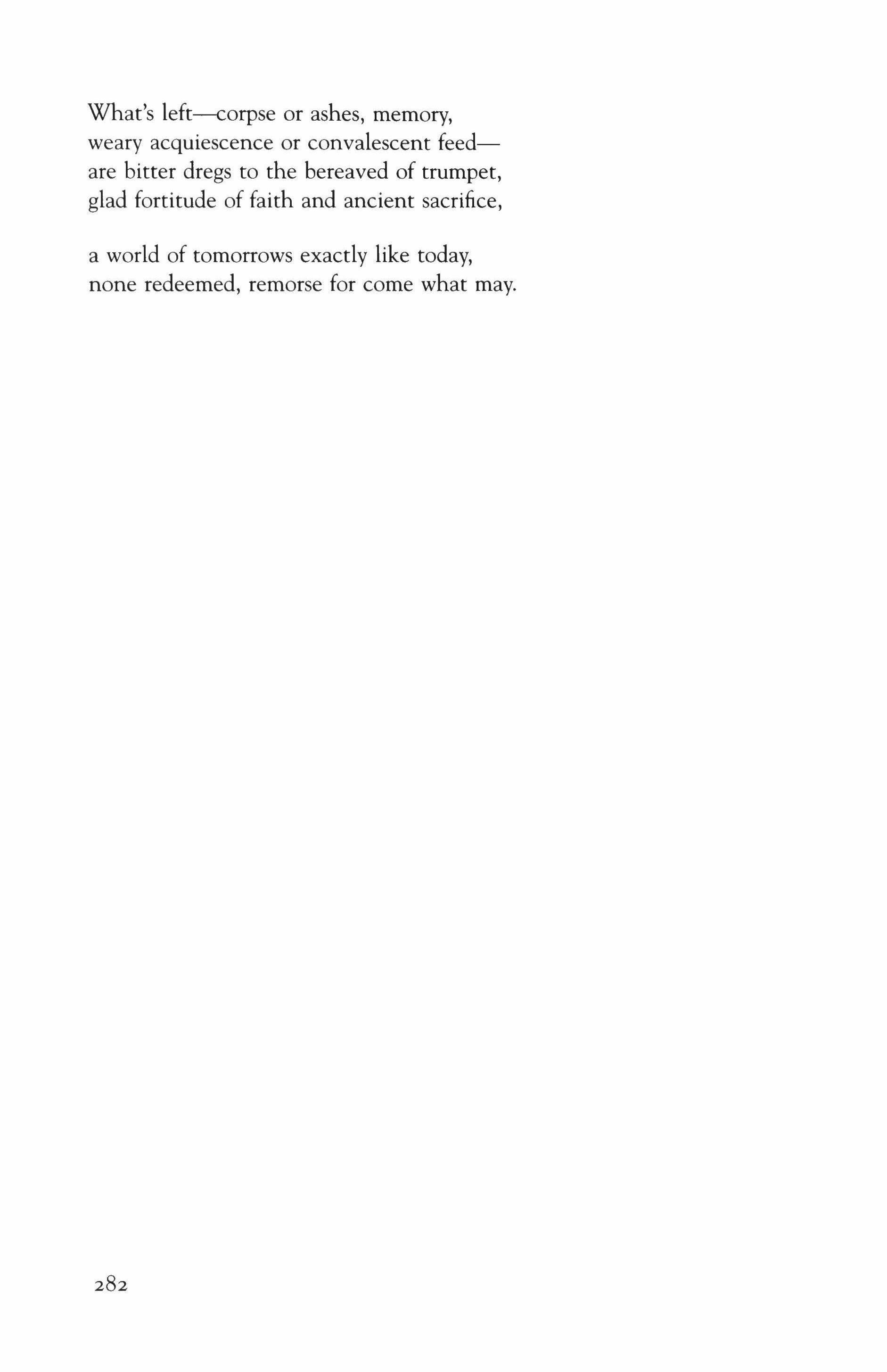
What's left--corpse or ashes, memory, weary acquiescence or convalescent feedare bitter dregs to the bereaved of trumpet, glad fortitude of faith and ancient sacrifice,
a world of tomorrows exactly like today, none redeemed, remorse for come what may.
Everybody's Friend, 43, of ALS

Wrenched between disbelief and dread
We met him on the street or at the A&P, sustained his clumsy hesitance, his sagging clothes, his eyes a-shine in their darkened sockets. We stood
and faced the wreck of everybody's friend, fought not to stare ourselves dumb hunting richer words than we had in us of courage, strength and commonality unthinned by pity or lament. We braced
to out-wait his agony, meanwhile study how to lose his loud guffawing badinage, quizzical grin, wry wisdom, and how till then to fend from mind the grim particulars of what proceeded out of sight
till we next heard of new diminishments, new travail and countermeasures,
then went to see him fearfully and came away reassured and shrived for at home with his family in the house that he had built his grace and humor never failed him, nor us, and we were fortunate, all passing-as far as we could tellwith no more fanfare or fuss than the rest of his conscientious life in Christ.
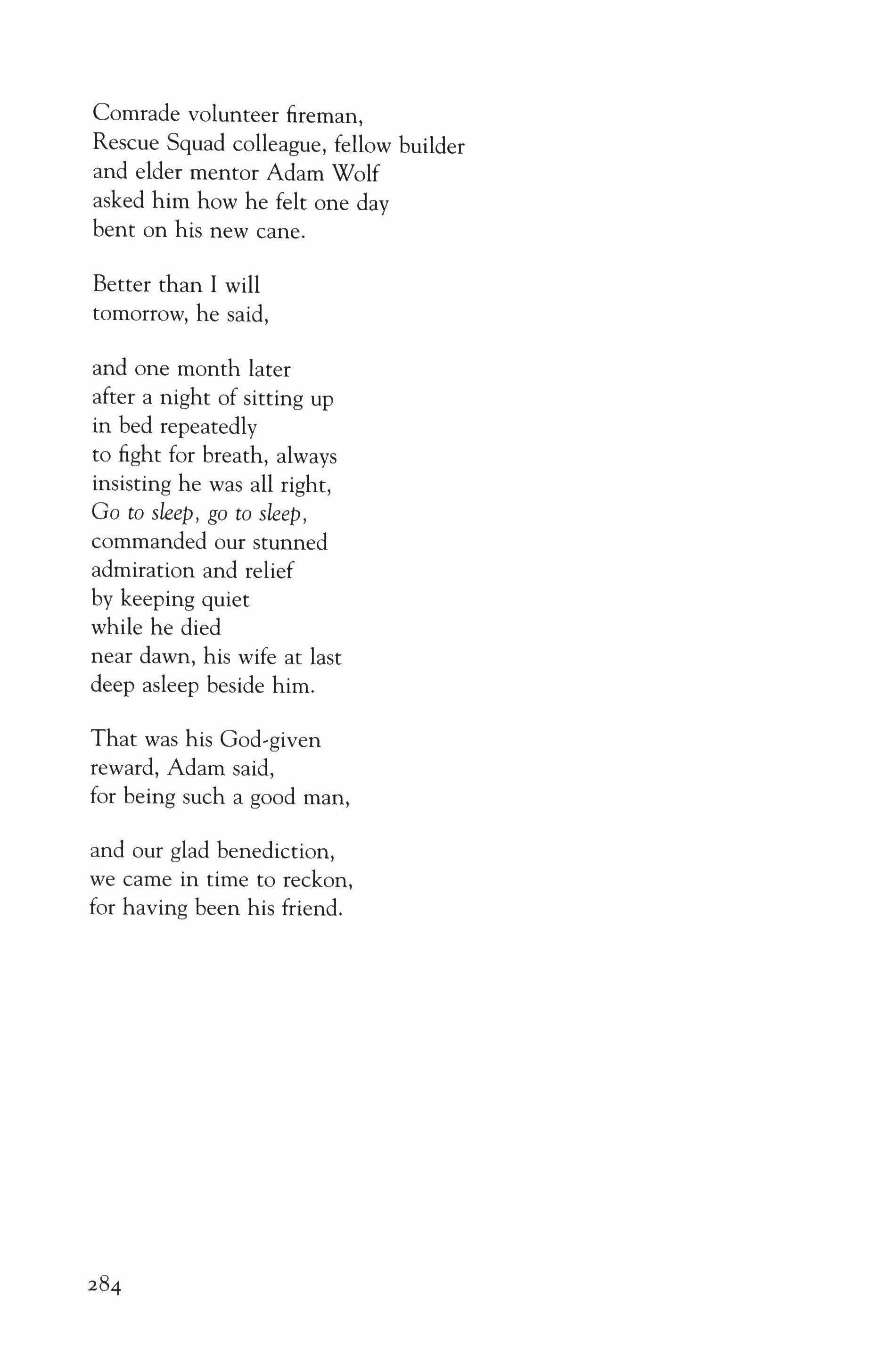
Comrade volunteer fireman, Rescue Squad colleague, fellow builder and elder mentor Adam Wolf asked him how he felt one day bent on his new cane.
Better than I will tomorrow, he said, and one month later after a night of sitting up in bed repeatedly to fight for breath, always insisting he was all right, Go to sleep, go to sleep, commanded our stunned admiration and relief by keeping quiet while he died near dawn, his wife at last deep asleep beside him.
That was his God-given reward, Adam said, for being such a good man, and our glad benediction, we came in time to reckon, for having been his friend.
Gail Mazur
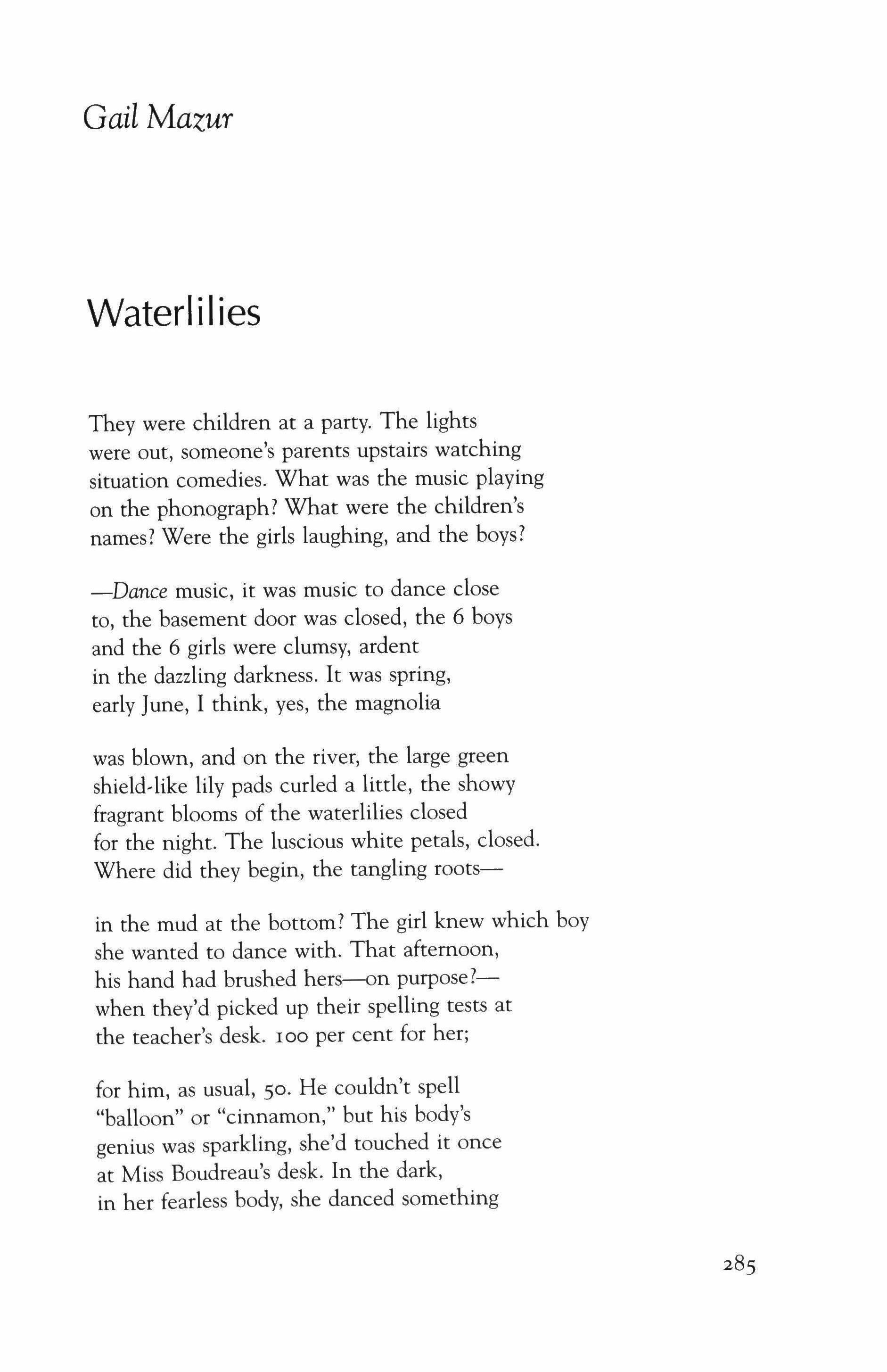
Waterlilies
They were children at a party. The lights were out, someone's parents upstairs watching situation comedies. What was the music playing on the phonograph? What were the children's names? Were the girls laughing, and the boys?
-Dance music, it was music to dance close to, the basement door was closed, the 6 boys and the 6 girls were clumsy, ardent in the dazzling darkness. It was spring, early June, I think, yes, the magnolia was blown, and on the river, the large green shield-like lily pads curled a little, the showy fragrant blooms of the waterlilies closed for the night. The luscious white petals, closed. Where did they begin, the tangling roots-
in the mud at the bottom? The girl knew which boy she wanted to dance with. That afternoon, his hand had brushed hers-on purpose?when they'd picked up their spelling tests at the teacher's desk. 100 per cent for her;
for him, as usual, 50. He couldn't spell "balloon" or "cinnamon," but his body's genius was sparkling, she'd touched it once at Miss Boudreau's desk. In the dark, in her fearless body, she danced something
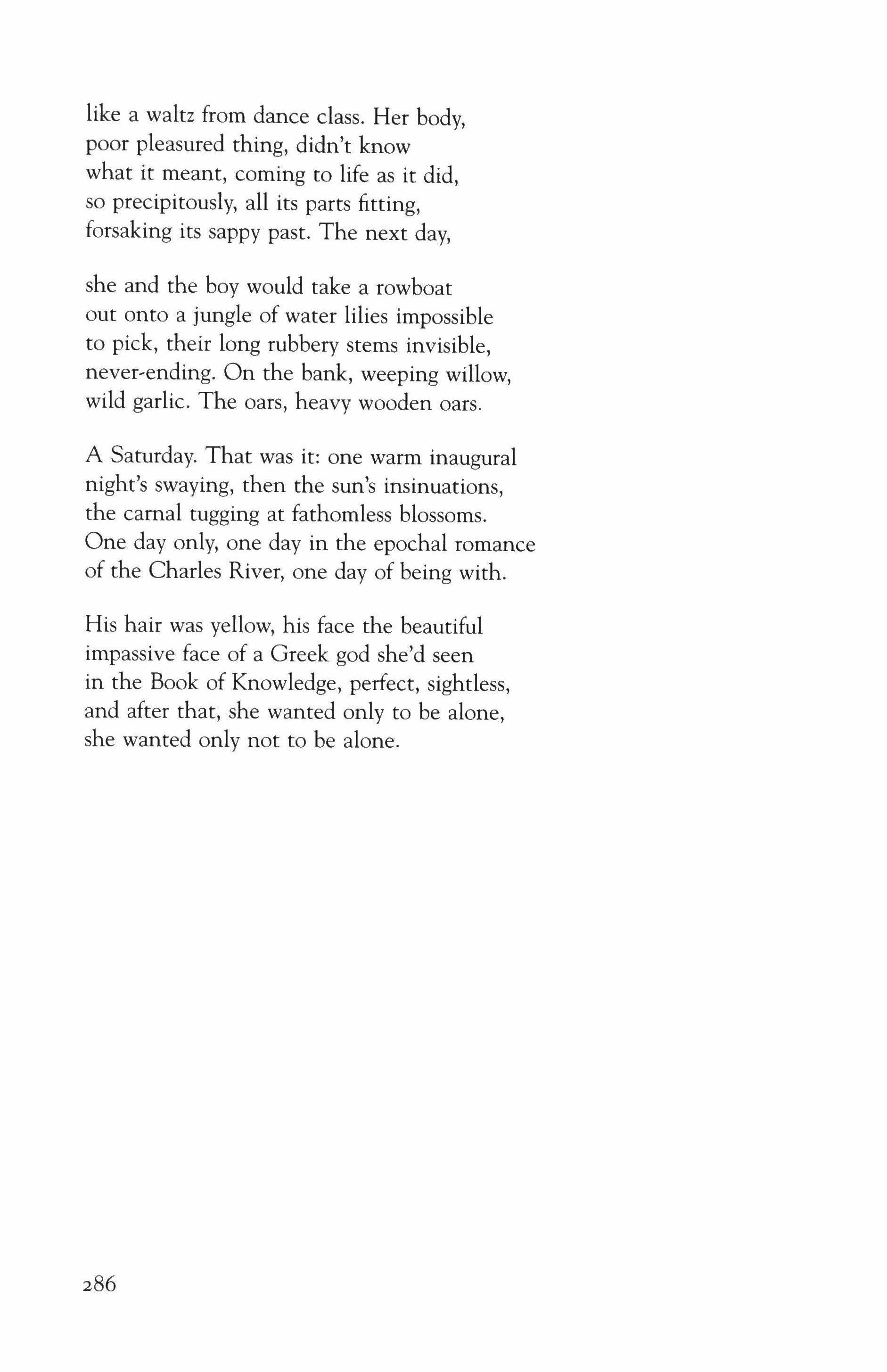
like a waltz from dance class. Her body, poor pleasured thing, didn't know what it meant, coming to life as it did, so precipitously, all its parts fitting, forsaking its sappy past. The next day, she and the boy would take a rowboat out onto a jungle of water lilies impossible to pick, their long rubbery stems invisible, never-ending. On the bank, weeping willow, wild garlic. The oars, heavy wooden oars.
A Saturday. That was it: one warm inaugural night's swaying, then the sun's insinuations, the carnal tugging at fathomless blossoms. One day only, one day in the epochal romance of the Charles River, one day of being with.
His hair was yellow, his face the beautiful impassive face of a Greek god she'd seen in the Book of Knowledge, perfect, sightless, and after that, she wanted only to be alone, she wanted only not to be alone.
286
A Small Door
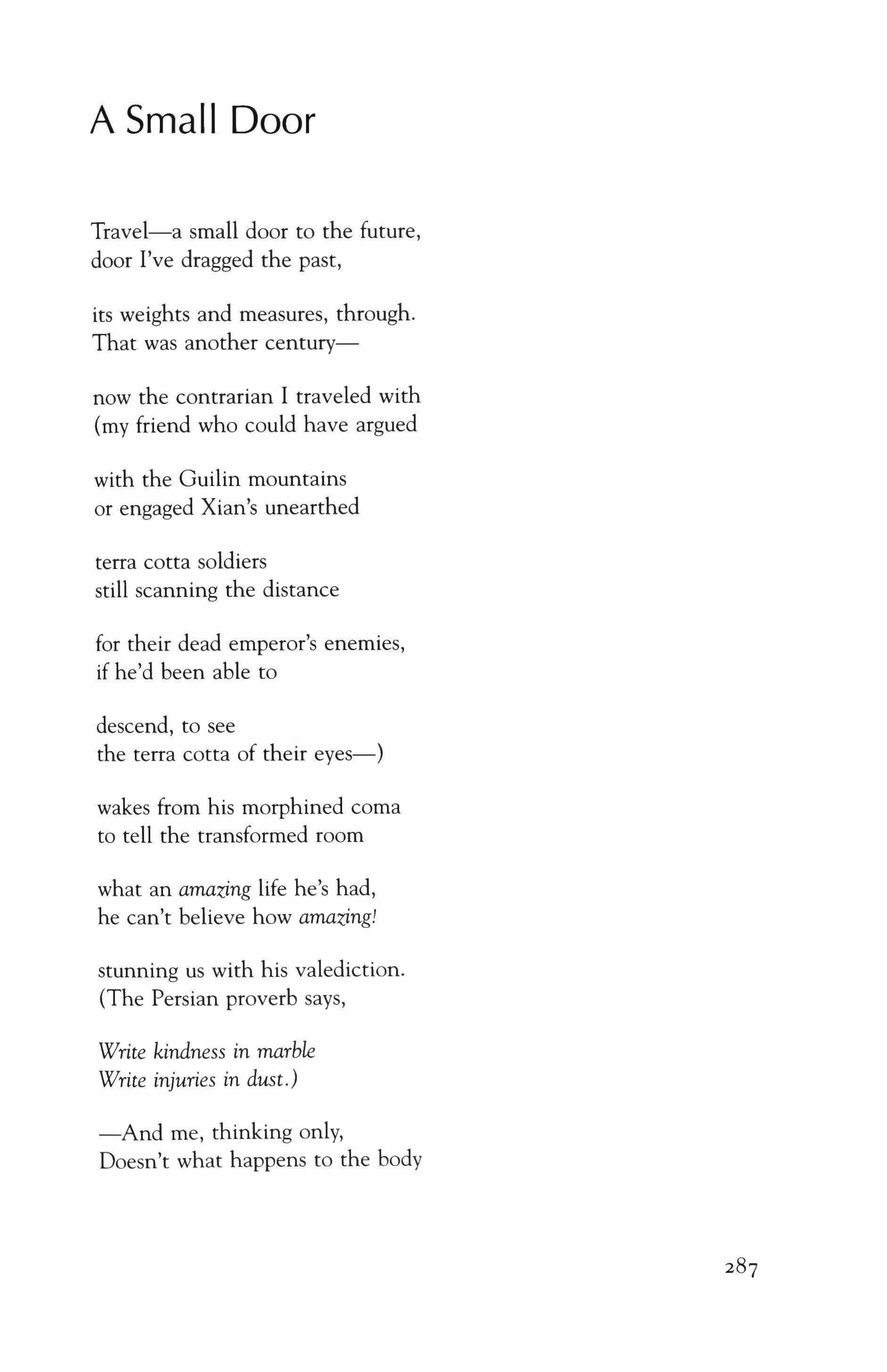
Travel-a small door to the future, door I've dragged the past, its weights and measures, through. That was another centurynow the contrarian I traveled with (my friend who could have argued with the Guilin mountains or engaged Xian's unearthed terra cotta soldiers still scanning the distance for their dead emperor's enemies, if he'd been able to descend, to see the terra cotta of their eyes-) wakes from his morphined coma to tell the transformed room what an amazing life he's had, he can't believe how amazing!
stunning us with his valediction. (The Persian proverb says, Write kindness in marble Write injuries in dust.)
-And me, thinking only, Doesn't what happens to the body

clip the spirit, too? Then he sits up, sips a coke, and visits. His life I think, clear, shapely, ended in death's hospitable loggia, as if the life of argument, the quarrel, had really been the form, the path, the reconciliation.
To Whoever May Be Concerned:
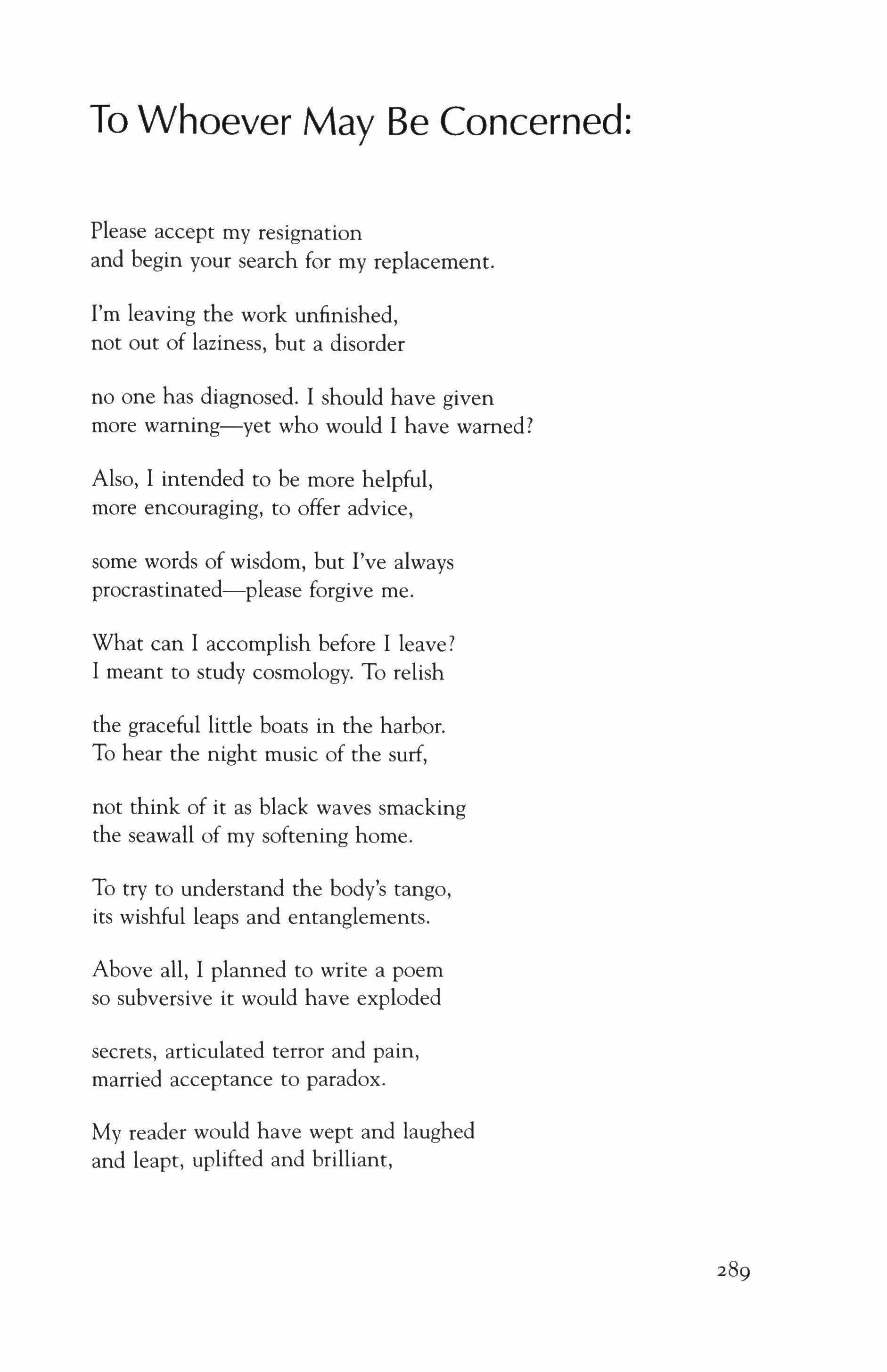
Please accept my resignation and begin your search for my replacement.
I'm leaving the work unfinished, not out of laziness, but a disorder
no one has diagnosed. I should have given more warning-yet who would I have warned?
Also, I intended to be more helpful, more encouraging, to offer advice, some words of wisdom, but I've always procrastinated-please forgive me.
What can I accomplish before I leave? I meant to study cosmology. To relish the graceful little boats in the harbor. To hear the night music of the surf, not think of it as black waves smacking the seawall of my softening home.
To try to understand the body's tango, its wishful leaps and entanglements.
Above all, I planned to write a poem so subversive it would have exploded secrets, articulated terror and pain, married acceptance to paradox.
My reader would have wept and laughed and leapt, uplifted and brilliant,
back into life. So much for intentions. You'll find a thousand drafts locked
in my files. I've taped the key to the underside of the keyboard.
The work is yours now. I hope you can make something come of it.
I didn't know how.
Yours,

Deborah Cummins
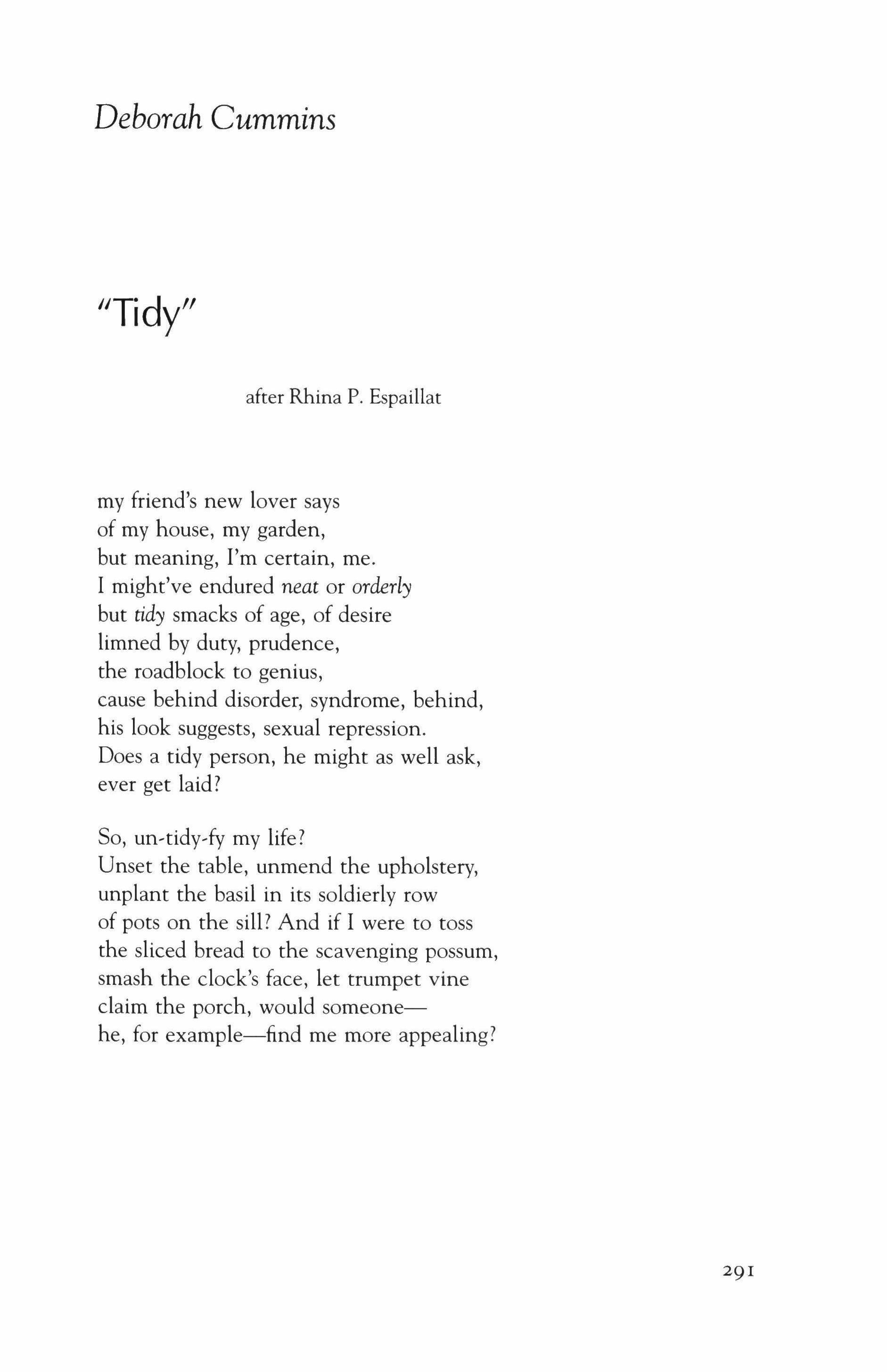
"Tidy"
after Rhina P. Espaillat
my friend's new lover says of my house, my garden, but meaning, I'm certain, me. I might've endured neat or orderly but tidy smacks of age, of desire limned by duty, prudence, the roadblock to genius, cause behind disorder, syndrome, behind, his look suggests, sexual repression. Does a tidy person, he might as well ask, ever get laid?
So, un-tidy-fy my life?
Unset the table, unmend the upholstery, unplant the basil in its soldierly row of pots on the sill? And if I were to toss the sliced bread to the scavenging possum, smash the clock's face, let trumpet vine claim the porch, would someonehe, for example-find me more appealing?
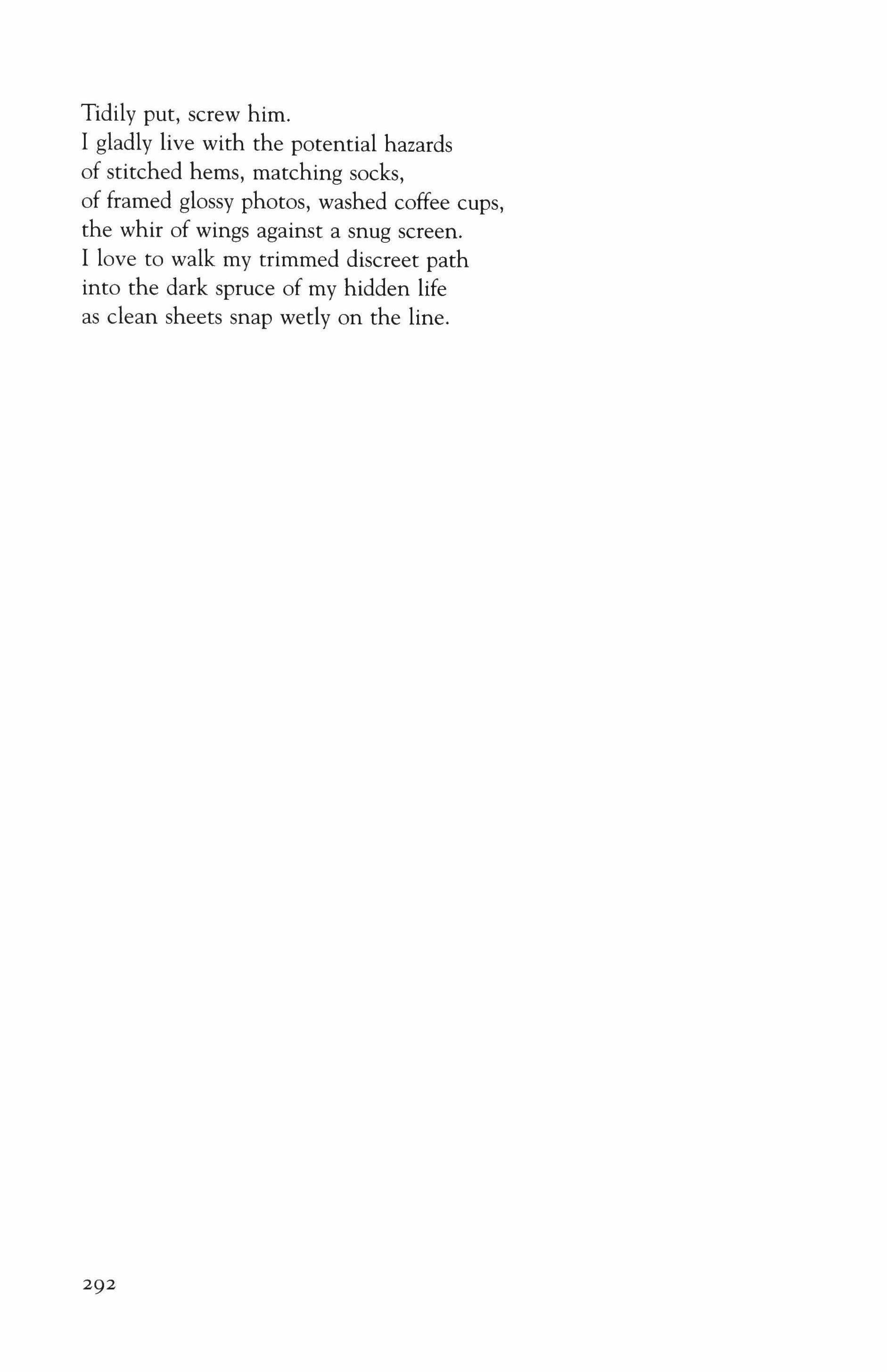
Tidily put, screw him.
I gladly live with the potential hazards of stitched hems, matching socks, of framed glossy photos, washed coffee cups, the whir of wings against a snug screen. I love to walk my trimmed discreet path into the dark spruce of my hidden life as clean sheets snap wetly on the line.
Ross Martin from Blue Metal Cart
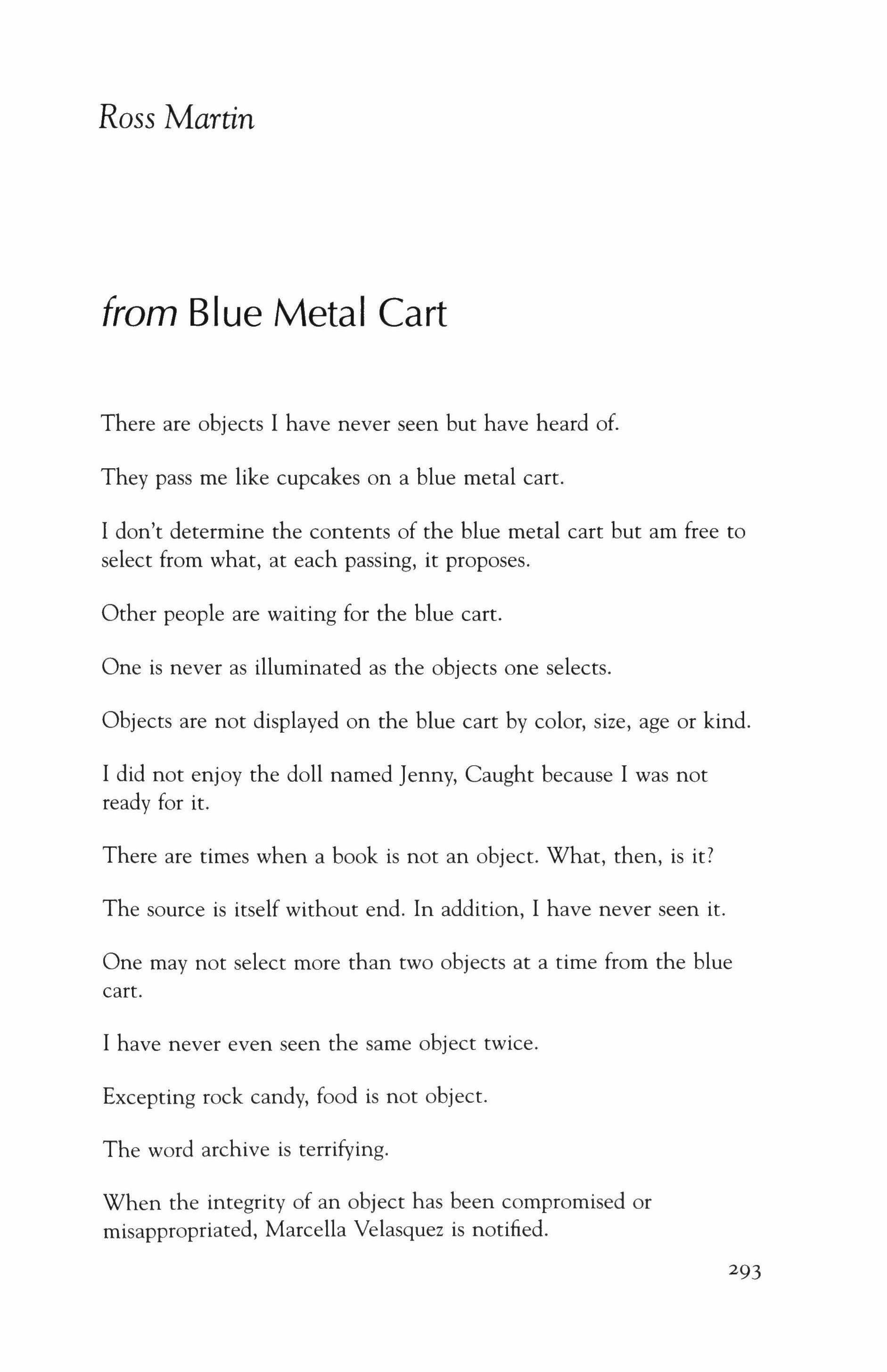
There are objects I have never seen but have heard of.
They pass me like cupcakes on a blue metal cart.
I don't determine the contents of the blue metal cart but am free to select from what, at each passing, it proposes.
Other people are waiting for the blue cart.
One is never as illuminated as the objects one selects.
Objects are not displayed on the blue cart by color, size, age or kind.
I did not enjoy the doll named Jenny, Caught because I was not ready for it.
There are times when a book is not an object. What, then, is it?
The source is itself without end. In addition, I have never seen it.
One may not select more than two objects at a time from the blue cart.
I have never even seen the same object twice.
Excepting rock candy, food is not object.
The word archive is terrifying.
When the integrity of an object has been compromised or misappropriated, Marcella Velasquez is notified.
293

Some objects can be compromised to conceal paraphernalia, the discovery of which is grounds for solitary.
Six books I almost selected from the blue cart but will never see again:
I. Field Guide to North American Monsters, Vol. 2
2. How You Know You're Here
3· All Mothers Are Working Mothers: 1973 MGNA Quarterly Report
4· Caterpillars and Magnifying Glasses: Using Solar Rays To Your Advantage
5. What Jenny Got Caught Doing
6. Houses the Angels Don't Get To
The blue cart circulates on Mondays, Thursdays and Fridays.
Hygiene goes largely unmonitored.
Operators of the blue cart have little patience for those who delay momentum.
Operators of the blue cart have predilections of their own.
If the blue cart does not arrive on schedule, I become frustrated and masturbate quietly.
The source is near.
If one borrows an object from the blue cart, one must return to the cart another object of equal emotional value. In this way the source achieves equilibrium.
The method by which objects from the source are selected for the blue cart seems arbitrary. This, I believe, is intended.
The notion of a card catalogue is vague yet comforting.
I would fit in the source but not on the blue cart.
Marcella Velasquez is prohibited from making suggestions from the blue cart.
The blue cart doesn't care about you singular, only you plural.
294
David Yezzi
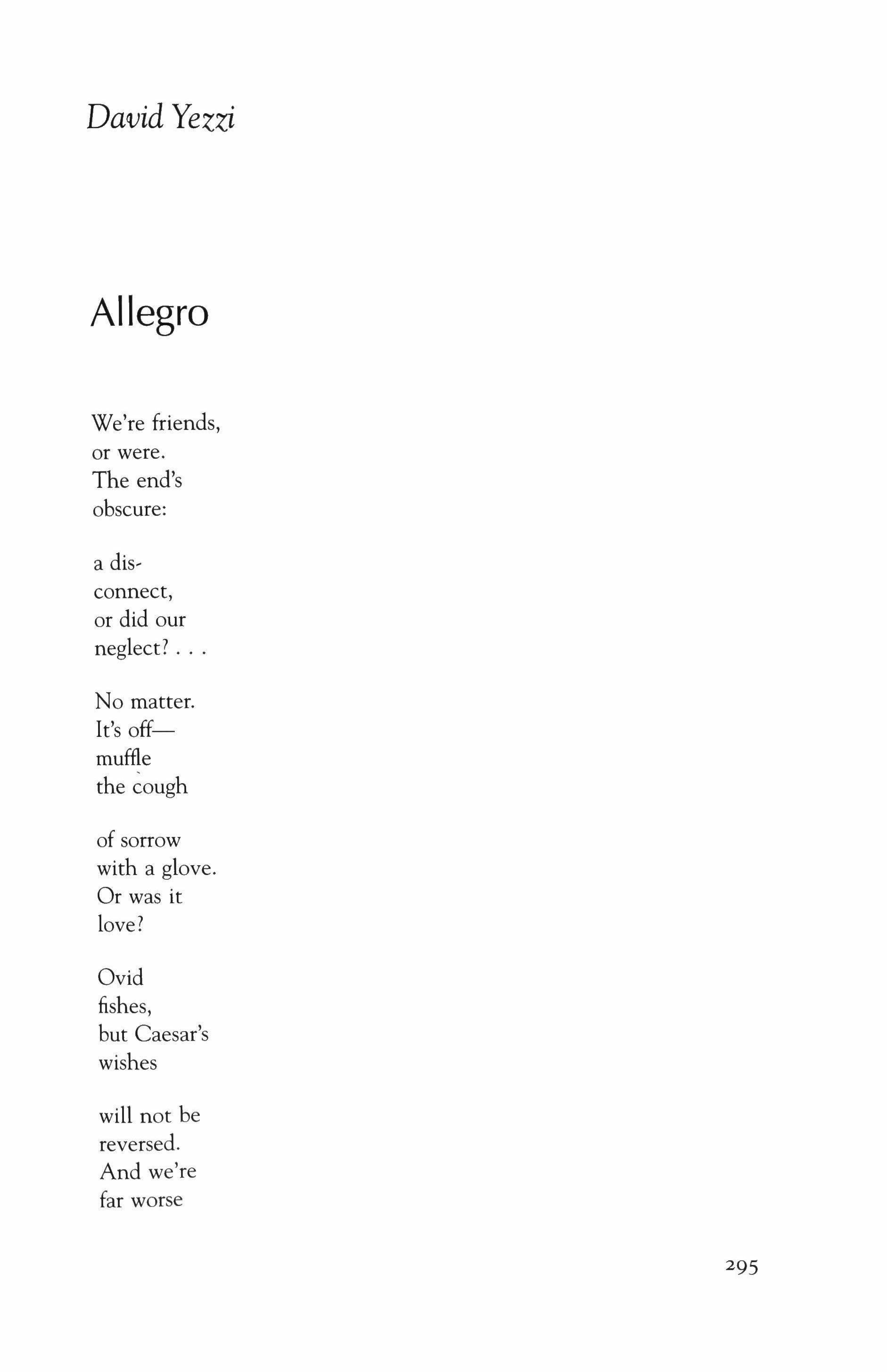
Allegro
We're friends, or were. The end's obscure: a disconnect, or did our neglect?
No matter. It's offmuffle the cough of sorrow with a glove. Or was it love?
Ovid fishes, but Caesar's wishes will not be reversed. And we're far worse
295
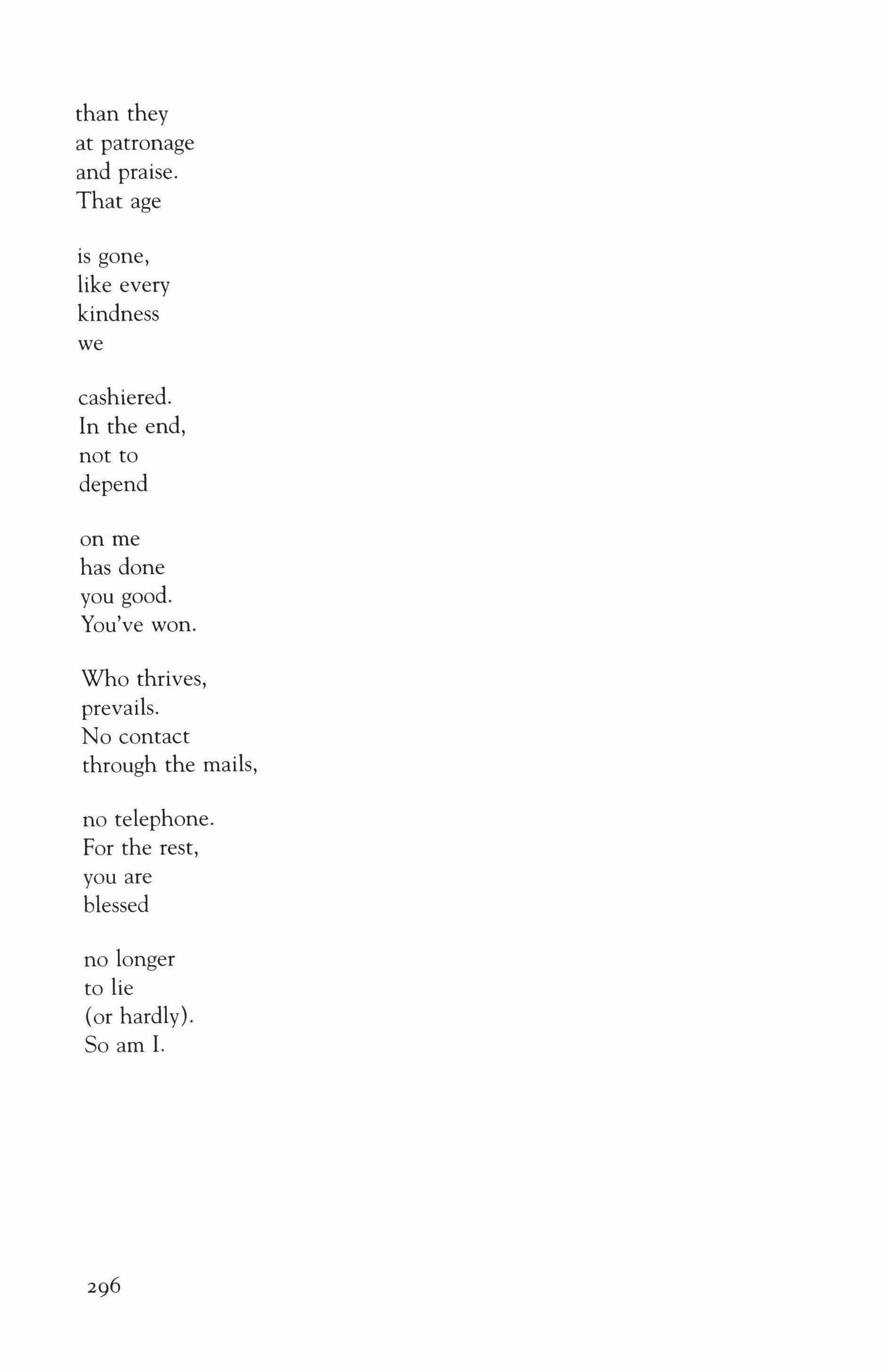
than they at patronage and praise. That age is gone, like every kindness we cashiered. In the end, not to depend on me has done you good. You've won.
Who thrives, prevails. No contact through the mails, no telephone. For the rest, you are blessed no longer to lie (or hardly). So am I.
Oracle of the Great Oak
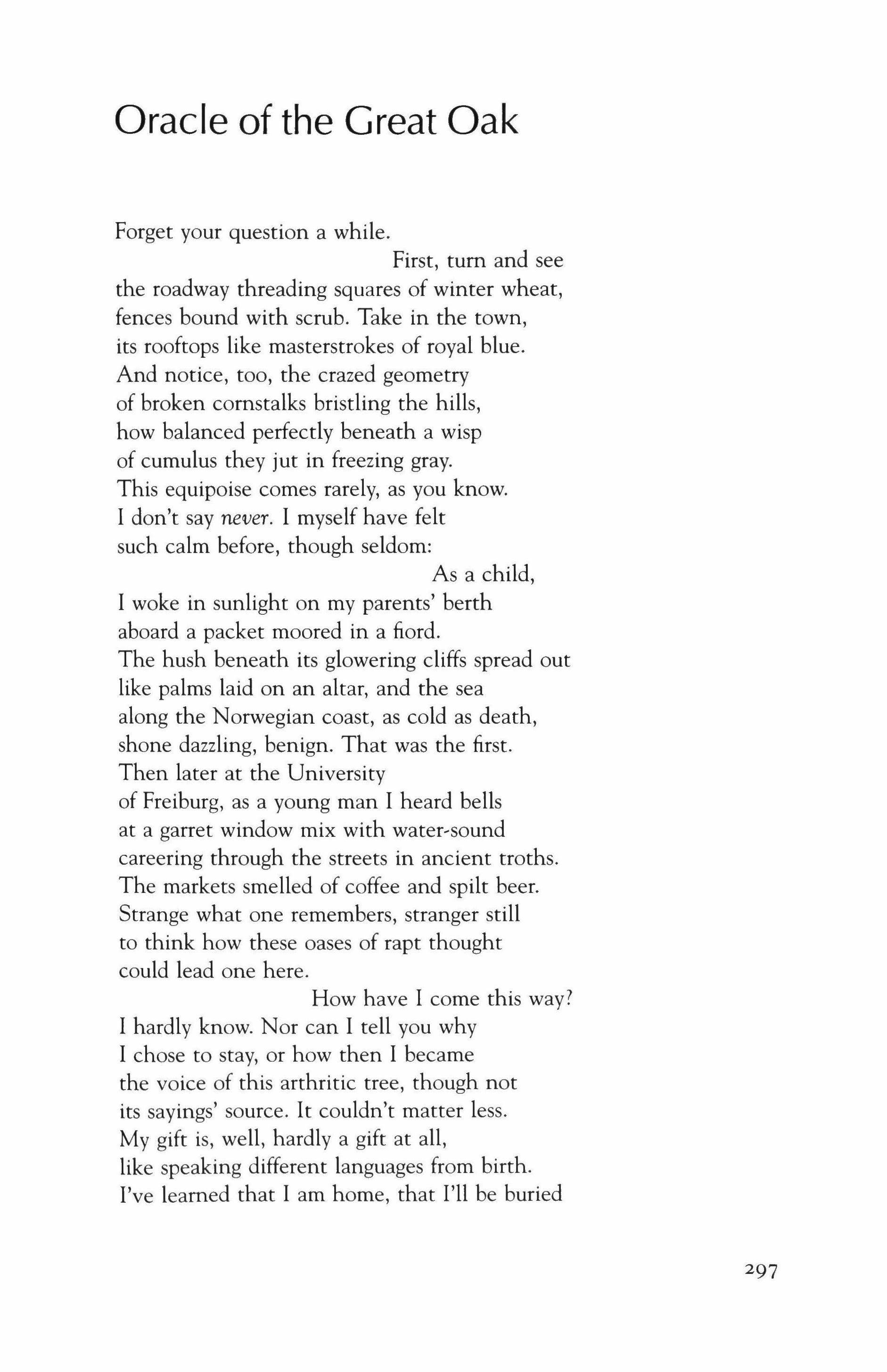
Forget your question a while.
First, tum and see the roadway threading squares of winter wheat, fences bound with scrub. Take in the town, its rooftops like masterstrokes of royal blue. And notice, too, the crazed geometry of broken cornstalks bristling the hills, how balanced perfectly beneath a wisp of cumulus they jut in freezing gray. This equipoise comes rarely, as you know. I don't say never. I myself have felt such calm before, though seldom:
As a child, I woke in sunlight on my parents' berth aboard a packet moored in a fiord.
The hush beneath its glowering cliffs spread out like palms laid on an altar, and the sea along the Norwegian coast, as cold as death, shone dazzling, benign. That was the first. Then later at the University of Freiburg, as a young man I heard bells at a garret window mix with water-sound careering through the streets in ancient troths. The markets smelled of coffee and spilt beer. Strange what one remembers, stranger still to think how these oases of rapt thought could lead one here.
How have I come this way?
I hardly know. Nor can I tell you why I chose to stay, or how then I became the voice of this arthritic tree, though not its sayings' source. It couldn't matter less.
My gift is, well, hardly a gift at all, like speaking different languages from birth. I've learned that I am home, that I'll be buried
297
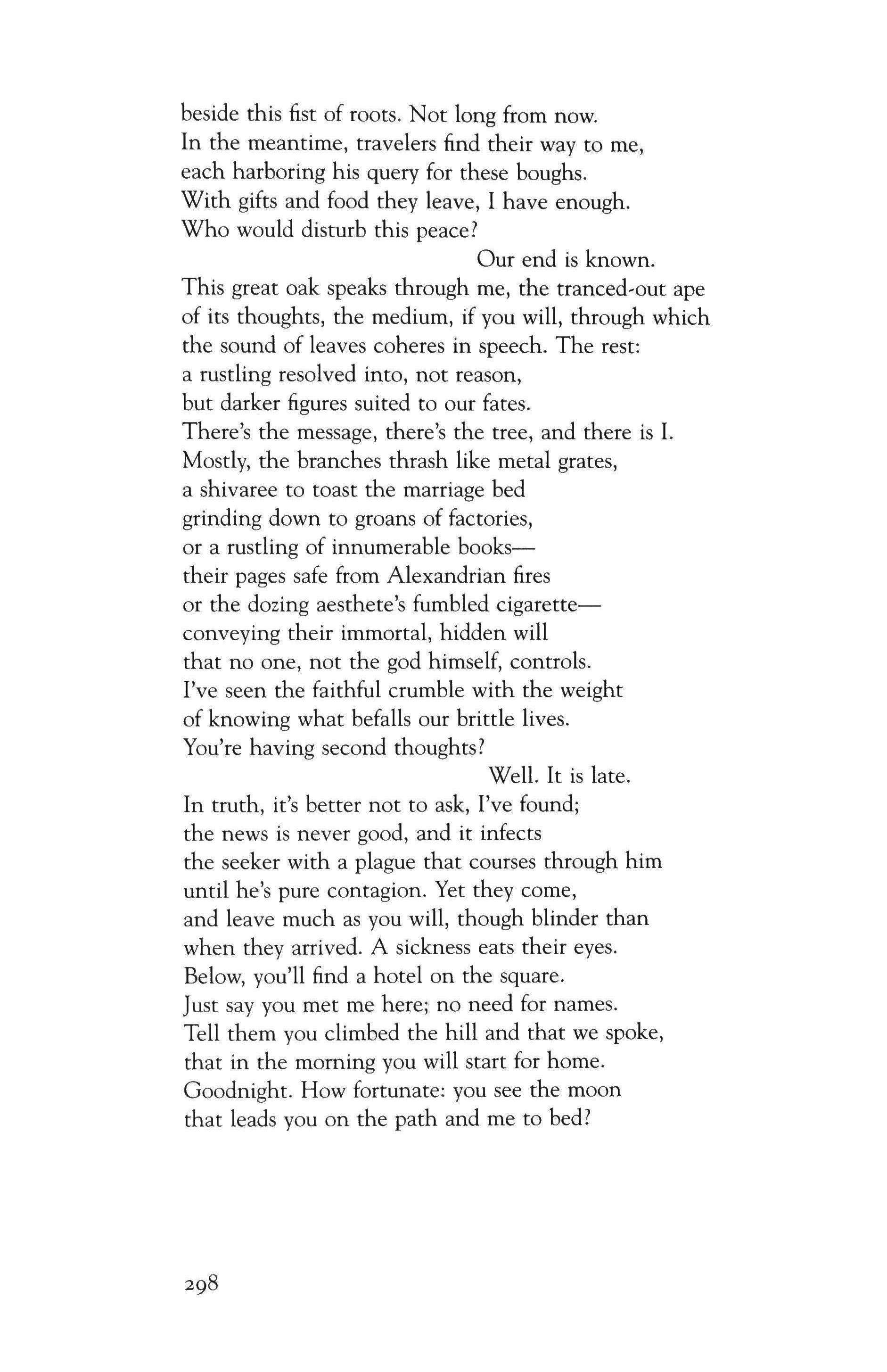
beside this fist of roots. Not long from now. In the meantime, travelers find their way to me, each harboring his query for these boughs. With gifts and food they leave, I have enough. Who would disturb this peace?
Our end is known. This great oak speaks through me, the tranced-out ape of its thoughts, the medium, if you will, through which the sound of leaves coheres in speech. The rest: a rustling resolved into, not reason, but darker figures suited to our fates. There's the message, there's the tree, and there is l. Mostly, the branches thrash like metal grates, a shivaree to toast the marriage bed grinding down to groans of factories, or a rustling of innumerable bookstheir pages safe from Alexandrian fires or the dozing aesthete's fumbled cigaretteconveying their immortal, hidden will that no one, not the god himself, controls. I've seen the faithful crumble with the weight of knowing what befalls our brittle lives. You're having second thoughts?
Well. It is late. In truth, it's better not to ask, I've found; the news is never good, and it infects the seeker with a plague that courses through him until he's pure contagion. Yet they come, and leave much as you will, though blinder than when they arrived. A sickness eats their eyes. Below, you'll find a hotel on the square. Just say you met me here; no need for names. Tell them you climbed the hill and that we spoke, that in the morning you will start for home. Goodnight. How fortunate: you see the moon that leads you on the path and me to bed?
The Double

On Sheep Meadow an old man picks his way past sunning bodies, which, though it's early April, fill the grass. The wind lifts up his coattails, flings them sidelong, flapping against his cane, in the distance.
And as he comes across the wide expanse of green he seems to float over blowing shoals, walking on the risen Styx, and hunched, for old men tire easily (he is tired) on windy passages.
But wind has power to blur the wobbly world: a tall man certainly, but hardly oldmy age, in fact. How had there been a cane? Unless the brain works with the eye to fill in for gaps we find.
Now close, he looks like me. Strange to think that he's no nearer age and death than I, the young man walking out of the older man like a snake skin shed, the same one he will wear again someday.
299

Gary Adelman teaches English at the University of Illinois at Urbana-Champaign. His recent books are RetellingDostoyevsky: Literary Responses and Other Observations (2001) and Reclaiming Dostoyevsky: Contemporary Writers Speak Out (2002), both from Bucknell University Press. John Balaban is the author of eleven books of poetry and prose, including four volumes which together have won the Academy of American Poets' Lamont prize a National Poetry Series Selection, and two nominations for the National Book Award. His Locusts at the Edge ofSummer: New and Selected Poems won the William Carlos Williams Award from the Poetry Society of America. Jason Brown is the author of Driving the Heart and Other Stories (Norton, 1999). He teaches at the University of Arizona. Deborah Cummins is the author of Beyond the Reach (BKMK Press, 2002). Her numerous awards include a 2002 Illinois Arts Council Fellowship in Poetry. She is president ofthe Modern Poetry Association. Lydia R. Diamond is an award-winning resident playwright at Chicago Dramatists. Her most recent production, The Gift Horse, premiered at the Goodman Theatre last year and was the first place recipient of the Theodore Ward Prize. She teaches at Columbia College. Stuart Dybek is the author of three books offiction, most recently I Sailed with Mag300
ellan (Farrar, Straus & Giroux, 2004). He has a book of poems forthcoming in 2004, also from Farrar, Straus & Giroux. Jonathan Fink teaches at Boston University. His poems have appeared in Poetry, the New England Review, and other journals. Laurence Goldstein has published three books of poetry, most recently Cold Reading (Copper Beech, 1995); three books of literary criticism, most recently The American Poet at the Movies: A Critical History (University of Michigan Press, 2001). He is professor of English at the University of Michigan, where he has edited the Michigan Quarterly Review since 1977. Debora Greger's sixth collection of poetry, GOD, was published by Penguin in 2001. Cristina Henriquez is a recent graduate ofthe Iowa's Writer's Workshop. Edward Hirsch's sixth book of poems is Lay Back the Darkness (Knopf, 2003). His most recent prose work is The Demon and the Angel (Harcourt, 2002). David Michael Kaplan is the author ofComfort (Viking-Penguin, 1987), Skating in the Dark (Pantheon, 1991), and Revision: A Creative Approach to Writing and Rewriting Fiction (Story Press, 1997). His stories have been anthologized in Best American Short Stories, The O. Henry Prize Stories, and the Scribner Anthology ofContemporary American Fiction. He teaches fiction writing at Loyola University Chicago. Laurence Lieberman has published twelve books of poetry and three books of criticism. His recent books include Flightfrom the Mother Stone (University of Arkansas Press, 2000), The Regatta in the Skies: Selected Long Poems (University of Georgia Press, 1999), Compass of the Dying (Arkansas, 1998), and Beyond the Muse of
CONTRIBUTORS
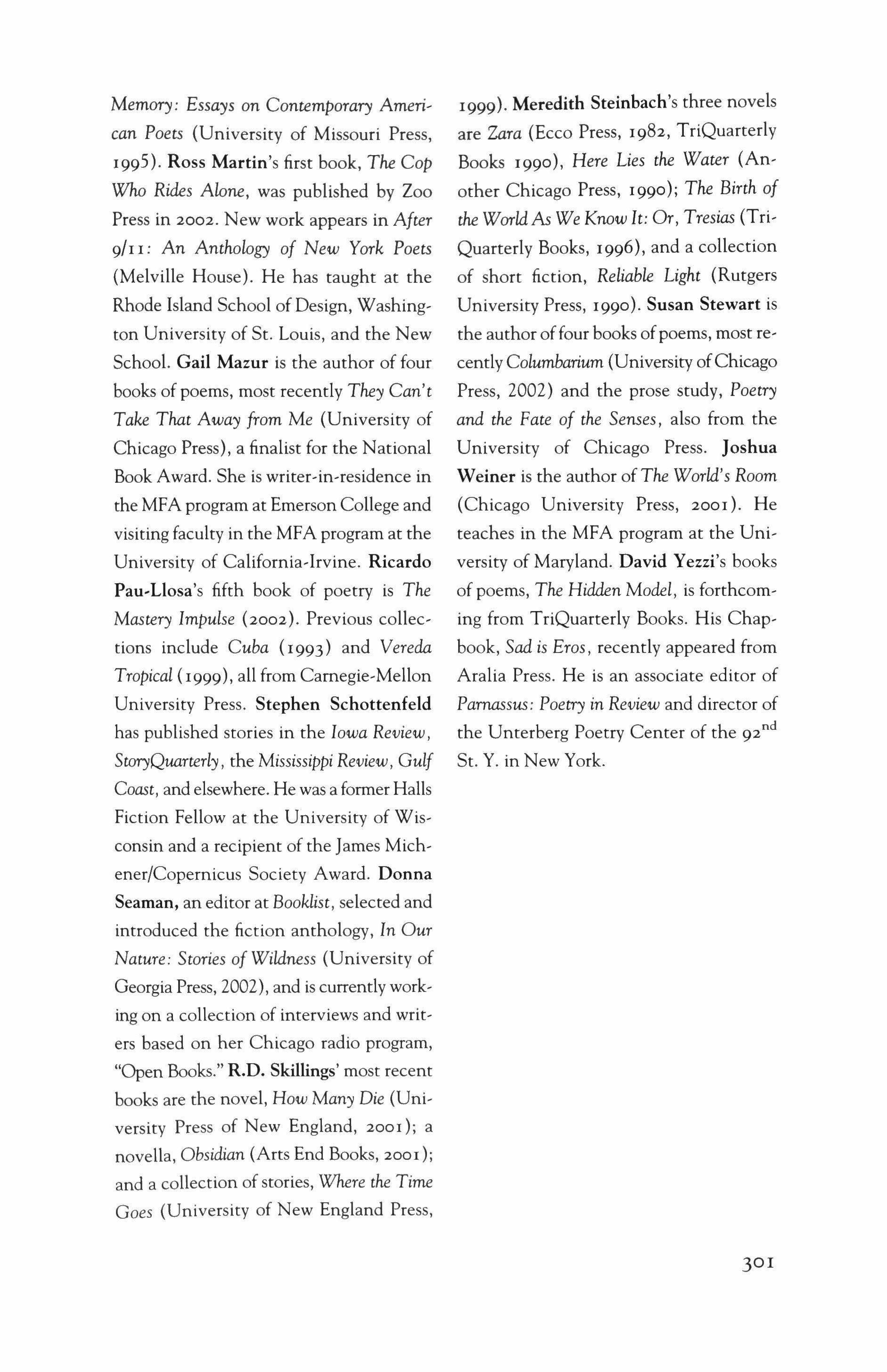
Memory: Essays on Contemporary American Poets (University of Missouri Press, 1995). Ross Martin's first book, The Cop Who Rides Alone, was published by Zoo Press in 2002. New work appears in After 9/11: An Anthology of New York Poets (Melville House). He has taught at the Rhode Island School ofDesign, Washington University of St. Louis, and the New School. Gail Mazur is the author of four books of poems, most recently They Can't Take That Away from Me (University of Chicago Press), a finalist for the National Book Award. She is writer-in-residence in the MFA program at Emerson College and visiting faculty in the MFA program at the University of California-Irvine. Ricardo Pau-Llosa's fifth book of poetry is The Mastery Impulse (2002). Previous collections include Cuba (1993) and Vereda Tropical ( 1 999), all from Carnegie-Mellon University Press. Stephen Schottenfeld has published stories in the Iowa Review, StoryQuarterly, the MississiPPi Review, Gulf Coast, and elsewhere. He was a former Halls Fiction Fellow at the University of Wisconsin and a recipient of the James Michener/Copernicus Society Award. Donna Seaman, an editor at Booklist, selected and introduced the fiction anthology, In Our Nature: Stories of Wildness (University of Georgia Press, 2002), and is currently working on a collection of interviews and writers based on her Chicago radio program, "Open Books." R.D. Skillings' most recent books are the novel, How Many Die (University Press of New England, 2001); a novella, Obsidian (Arts End Books, 2001); and a collection of stories, Where the Time Goes (University of New England Press,
1999)' Meredith Steinbach's three novels are Zara (Ecco Press, 1982, TriQuarterly Books 1990), Here Lies the Water (Another Chicago Press, 1990); The Birth of the World As We Know It: Or, Tresias (TriQuarterly Books, 1996), and a collection of short fiction, Reliable Light (Rutgers University Press, 1990). Susan Stewart is the author offour books ofpoems, most recently Columbarium (University ofChicago Press, 2002) and the prose study, Poetry and the Fate of the Senses, also from the University of Chicago Press. Joshua Weiner is the author ofThe World's Room (Chicago University Press, 2001). He teaches in the MFA program at the University of Maryland. David Yezzi's books of poems, The Hidden Model, is forthcoming from TriQuarterly Books. His Chapbook, Sad is Eros, recently appeared from Aralia Press. He is an associate editor of Pamassus: Poetry in Review and director of the Unterberg Poetry Center of the 92nd St. Y. in New York.
30I
Subscriptions
Three issues per year. Individuals: one year $24; two years $44; life $600. Institutions: one year $36; two years $68. Overseas: $5 per year additional. Price of back issues varies. Sample copies $5. Address correspondence and subscriptions to TriQuarterly, Northwestern University, 2020 Ridge Ave., Evanston, IL 602084302. Phone (847) 491-7614.
Submissions
The editors invite submissions of fiction, poetty and literary essays, which must be postmarked between October I and March 31; manuscripts postmarked between April I and September 30 will not be read. No manuscripts will be returned unless accompanied by a stamped, self-addressed envelope. All manuscripts accepted for publication become the property of TriQuarterly, unless otherwise indicated.
Reprints
Reprints of issues I-IS of TriQuarterly are available in full format from Kraus Reprint Company, Route 100, Millwood, NY 10546, and all issues in microfilm from University Microfilms International, 300 North Zeeb Road, Ann Arbor, MI 48106.
Indexing
TriQuarterly is indexed in the Humanities Index (H. W. Wilson Co.), the American Humanities Index (Whitson Publishing Co.), Historical Abstracts, MLA, EBSCO Publishing (Peabody, MA) and Information Access Co. (Foster City, CAl.
Distributors
Our national distributors to retail trade are Ingram Periodicals (La Vergne, TN); B. DeBoer (Nutley, NJ); Ubiquity (Brooklyn, NY); Armadillo (Los Angeles, CAl.
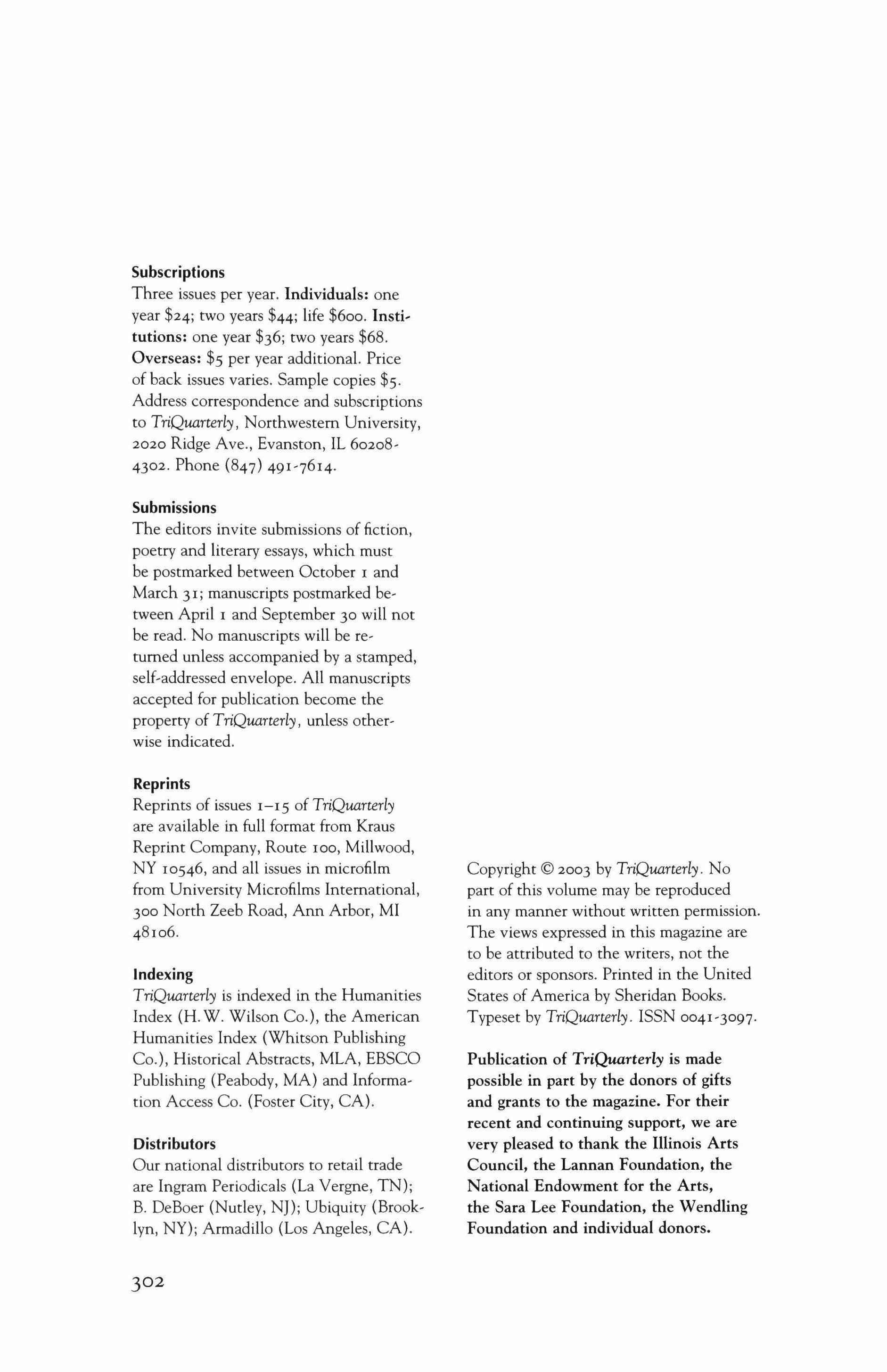
Copyright © 2003 by TriQuarcerly. No part of this volume may be reproduced in any manner without written permission. The views expressed in this magazine are to be attributed to the writers, not the editors or sponsors. Printed in the United States of America by Sheridan Books. Typeset by TriQuarterly. ISSN 0041-3097.
Publication of TriQuarterly is made possible in part by the donors of gifts and grants to the magazine. For their recent and continuing support, we are very pleased to thank the Illinois Arts Council, the Lannan Foundation, the National Endowment for the Arts, the Sara Lee Foundation, the Wendling Foundation and individual donors.
302
II" .e nice lot of fiction to read. Congratulations on the mcqozlne." - RUST HILLS
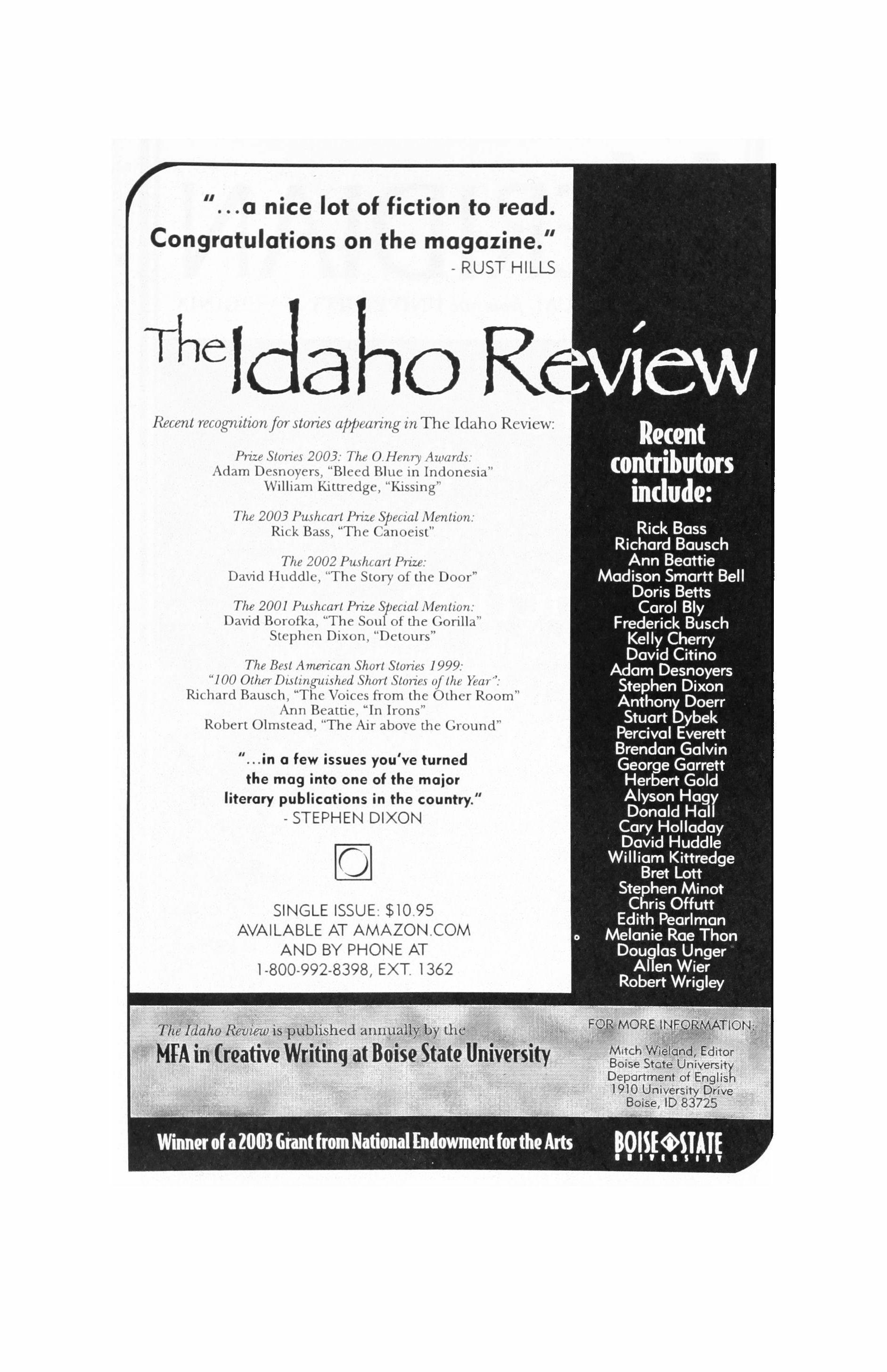
Recent recognitionfor stories appearing in The Idaho Review:
Prize Stories 2003: The O.Henry Awards: Adam Desnoyers, "Bleed Blue in Indonesia" William Kittredge, "Kissing"
The 2003 Pushcart Prize SPecial Mention: Rick Bass, "The Canoeist"
The 2002 Pushcart Prize: David Huddle, "The Story of the Door"
The 2001 Pushcart Prize Special Mention: David Borofka, "The Sour of the Gorilla" Stephen Dixon, "Detours"
The Best American Short Stories 1999: "100 Other Distinguished Short Stories of the Year": Richard Bausch, "The Voices from the Other Room" Ann Beanie, "In Irons" Robert Olmstead, "The Air above the Ground"
in a few issues you've turned the mag into one of the major literary publications in the country." - STEPHEN DIXON
SINGLE ISSUE $10.95
AVAILABLE AT AMAZON.COM AND BY PHONE AT 1-800-992-8398, EXT 1362
ERIDIAN
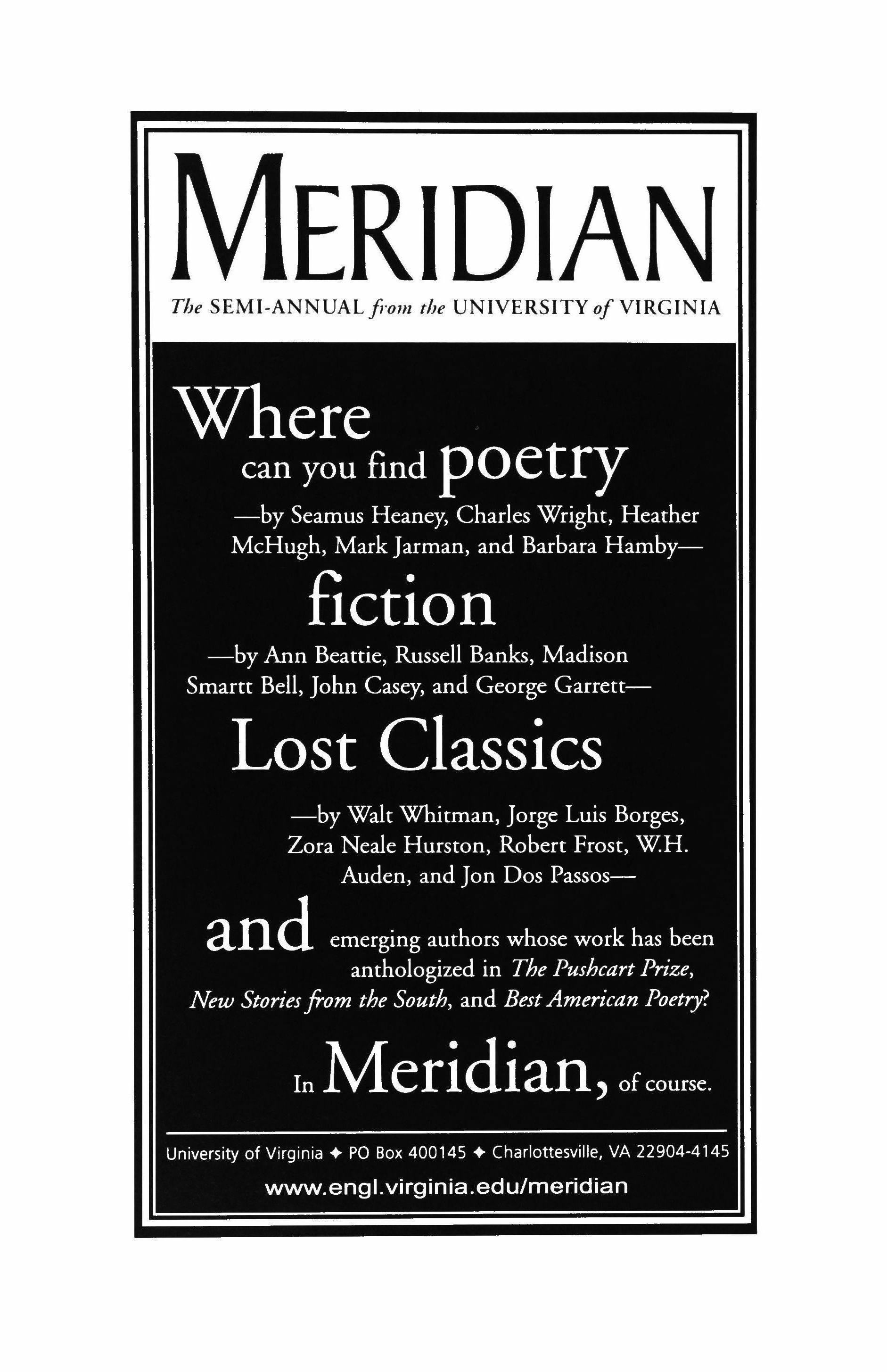
-by Seamus Heaney, Charles Wright, Heather McHugh, Mark Jarman, and Barbara Hamby-
-by Ann Beattie, Russell Banks, Madison Smartt Bell, John Casey, and George Garrett-
-by Walt Whitman, Jorge Luis Borges, Zora Neale Hurston, Robert Frost, WHo Auden, and Jon Dos Passos-
The SEMI-ANNUAL from the UNIVERSITY of VIRGINIA Where can you find poetry
fiction
Lost Classics
and emerging authors whose work has been anthologized in The Pushcart Prize, New Storiesfrom the South, and BestAmerican Poetry? In Meridian, of course. University of Virginia. PO Box 400145. Charlottesville, VA 22904-4145 www.engl.virginia.edu/meridian

joshua Weiner
Stuart Dybek
Lydia R. Diamond
Laurence Gold.ftein
Edward Hinch
Inter I leu ed b)
Donn I (}Nunan
Gary Adelman
Susan Stewart
Debora Gre$er
john Balaban
Laurence Lieberman

Stephen Schottenfeld
fason Brown
Fristina Henriquez
David Michael Kaplan
Meredith Steinbach
Ricardo Pau-Uosa
jonathan Fink
R. D. Skilli77,!J.f
Gail Mazur
Deborah Cummins
RoH Martin
David Yezzi
TriQuarterlyl17 $11.95



















































































































































































































































































































